




EDITOR

Charles Newman
MANAGING EDITOR Suzanne Kurman
ART DIRECTOR Lawrence Levy
ASSOCIATE EDITOR Laurence Gonzales
BUSINESS MANAGER Janet Clevenstine
ASSOCIATES
Janet Bailey
Peter Steele Byers
Mary Kinzie
Christine Robinson
Debra Petranek
Allison Platt
Claudia Reynolds
Mary Elinore Smith
Dianne Wall
TriQuarterly is an international journal of arts, letters and opinion, published in the fall, winter and spring at Northwestern University, Evanston, Illinois. Subscription rates: $5.00 yearly within the United States; $5.25 Canada and Mexico; $5.75 Foreign. Single copies will usually be sold for $1.95. Contributions, correspondence and subscriptions should be addressed to TriQuarterly, University Hall 10 1, Northwestern University, Evanston, Illinois, 60201. Unsolicited manuscripts are welcome, but will not be returned unless accompanied by a selfaddressed stamped envelope. All-work accepted for publication becomes the property of the editors, unless otherwise indicated. Copyright © 1970 by Northwestern University Press. All rights reserved. The views expressed in this magazine are to be attributed to the writers, not the editors or sponsors.
NATIONAL DISTRIBUTOR TO RETAIL TRADE: B. DEBOERr 188 HIGH STREET, NUTLEY, NEW JERSEY 07110. DISTRIBUTOR FOR GREAT BRITAIN AND EUROPE: B. F. STEVENS & BROWN, LTD., ARDON HOUSE, MILL LANE, GODALMING, SURREY, ENGLAND.
ROSELLEN BROWN
W. S. MERWIN

JACK ANDERSON
FRANCIS PONGE
ROLAND TOPOR
JONATHAN STRONG
ISAAC BASHEVIS SINGER
ROBERT COOVER
JEAN-PAUL ARON
JOHN CAGE
ROGER KEMPF
EUGENE IONESCO
REINER KUNZE
Fiction
What does the falcon owe? 5
Three: Within the wardrobes 13 The basilica of the scales 14 The Dachau shoe 16
Abandoned cities 19
Four: To Bona Tibertelli de Pisis 22
Natural crystals 24 The lilac 25 The plate 27 translated by Lane Dunlop
Four tales: No ordinary fairy 29 Laying the queen 35 My dear friends 37 A great man 45 translated by Margaret Crosland and David Le Vay
Xavier Fereira's unfinished book: Chapter one 143
Altele 208 translated by Mirra Ginsburg
Drama
The kid 59
Pulling punches translated by Ivan Sonier 184
Essays
Diary: how to improve the world (you will only make matters worse) 94
The double desk translated by Ivan Sonier 113
Neither god nor demon translated by Joy N. Humes 204
Translation
The end of art translated by John M. Gogol
56
HAGIWARA SAKUTARO
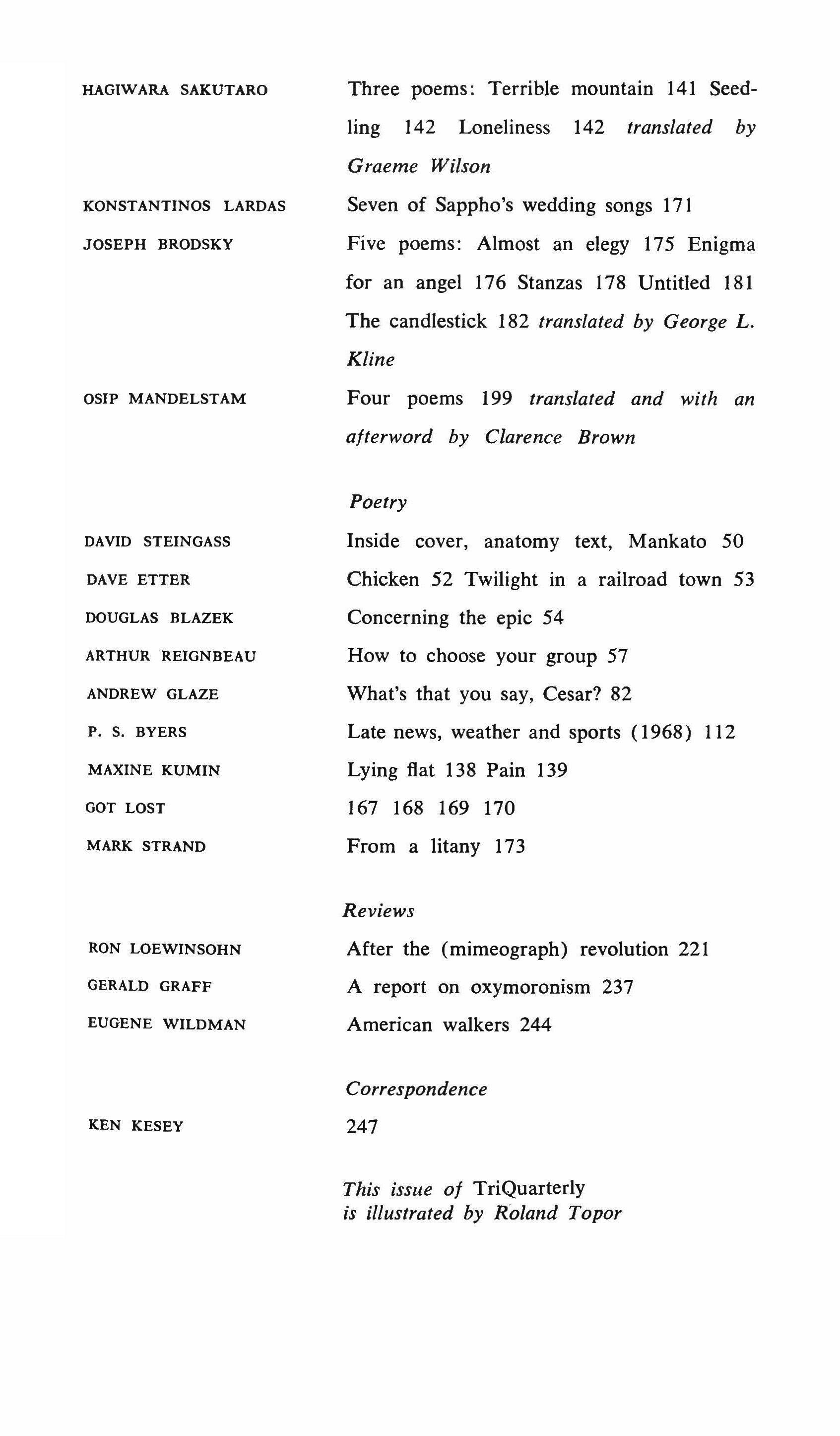
KONSTANTINOS LARDAS
JOSEPH BRODSKY
OSIP MANDELSTAM
DAVID STEINGASS
DAVE ETTER
DOUGLAS BLAZEK
ARTHUR REIGNBEAU
ANDREW GLAZE
P. S. BYERS
MAXINE KUMIN
GOT LOST
MARK STRAND
RON LOEWINSOHN
GERALD GRAFF
EUGENE WILDMAN
KEN KESEY
Three poems: Terrible mountain 141 Seedling 142 Loneliness 142 translated by Graeme Wilson
Seven of Sappho's wedding songs 171
Five poems: Almost an elegy 175 Enigma for an angel 176 Stanzas 178 Untitled 181
The candlestick 182 translated by George L. Kline
Four poems 199 translated and with an afterword by Clarence Brown
Poetry
Inside cover, anatomy text, Mankato 50
Chicken 52 Twilight in a railroad town 53
Concerning the epic 54
How to choose your group 57
What's that you say, Cesar? 82
Late news, weather and sports (1968) 112
Lying flat 138 Pain 139
167 168 169 170
From a litany 173
Reviews
After the (mimeograph) revolution 221
A report on oxymoronism 237
American walkers 244
Correspondence 247
This issue of TriQuarterly is illustrated by Roland Topor
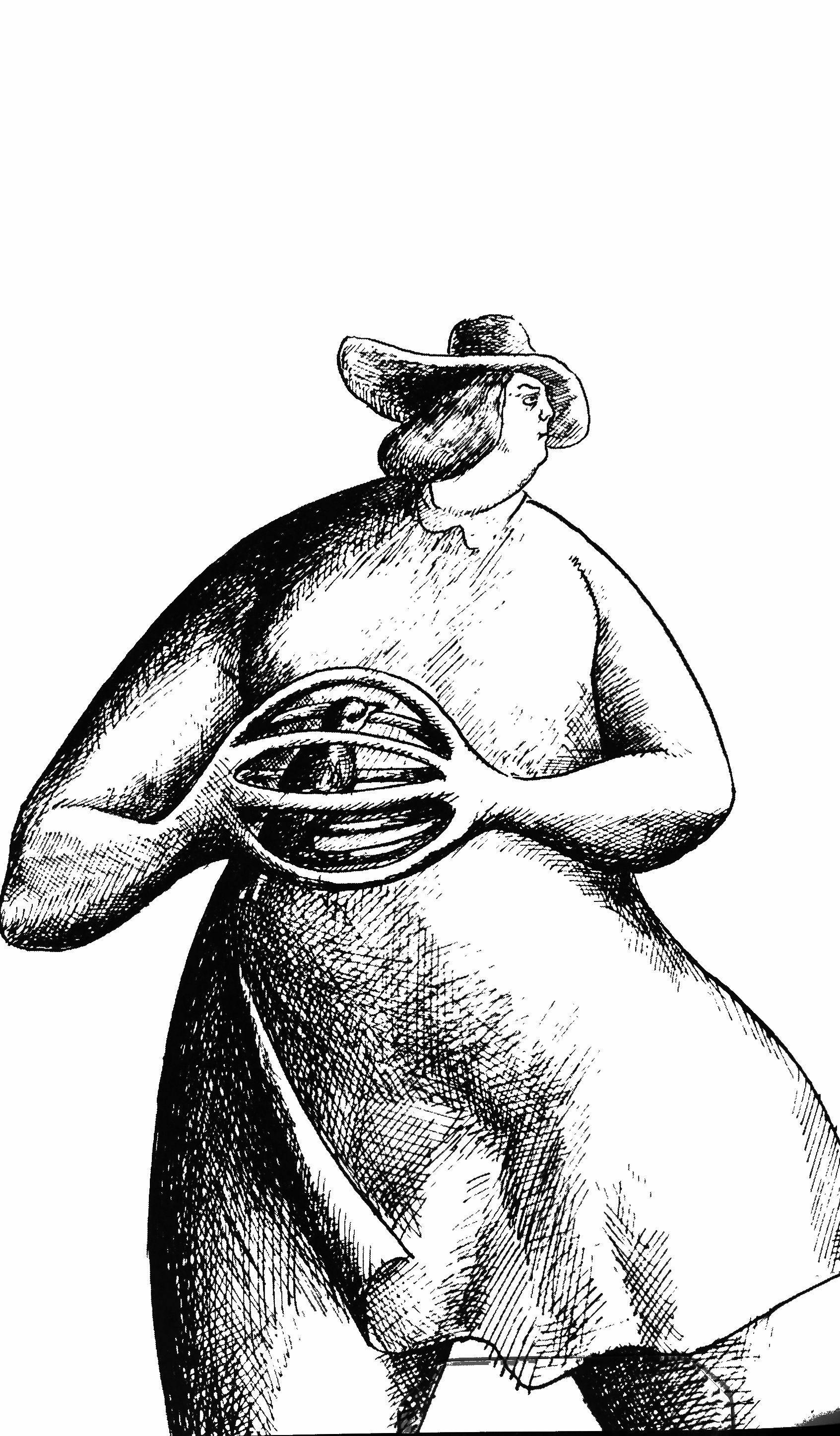
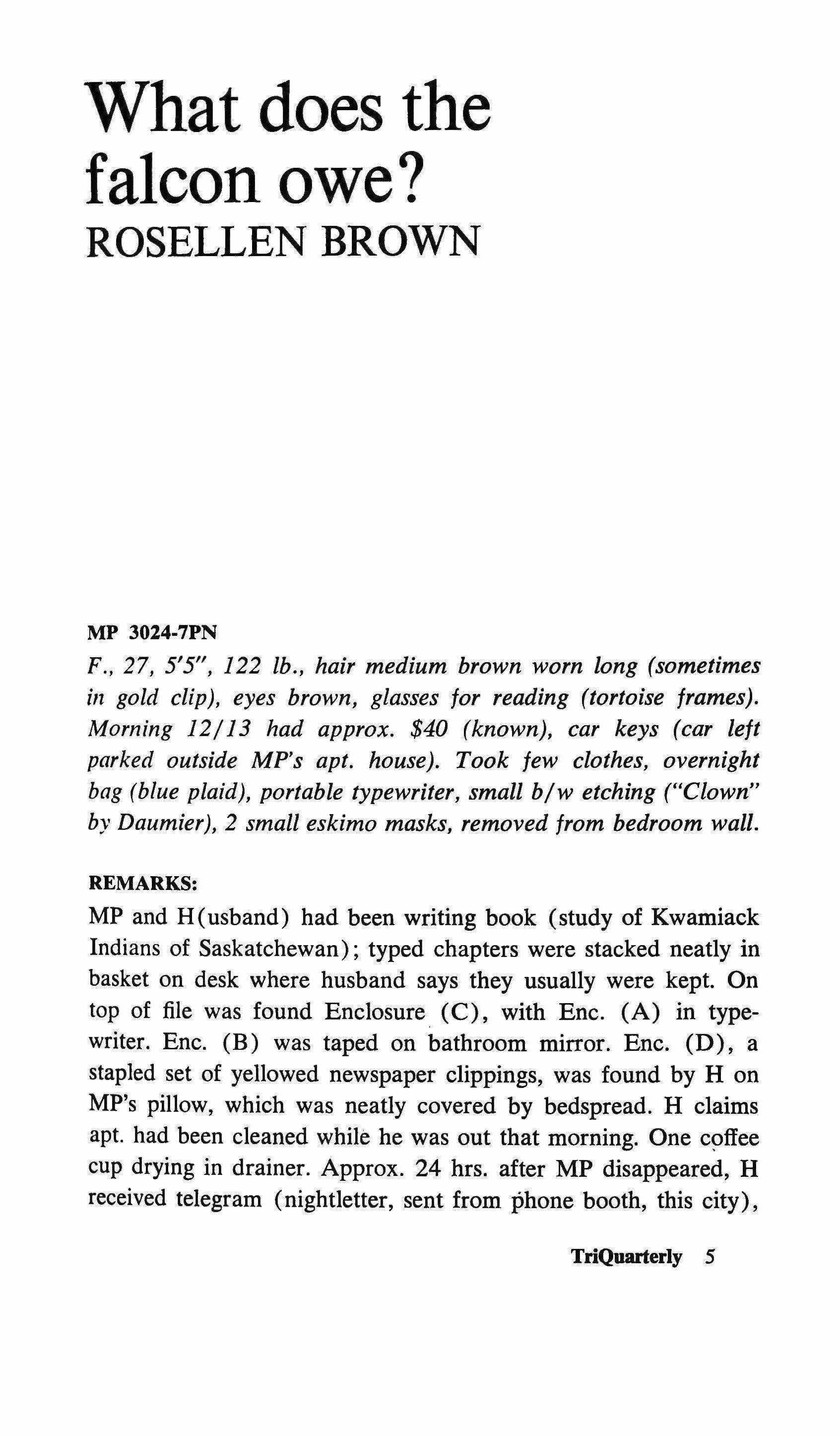
MP 3024-7PN
F., 27, 5'5", 122 lb., hair medium brown worn long (sometimes in gold clip), eyes brown, glasses for reading (tortoise frames). Morning 12/13 had approx. $40 (known), car keys (car left parked outside MP's apt. house). Took few clothes, overnight bag (blue plaid), portable typewriter, small bf w etching ("Clown" by Daumier), 2 small eskimo masks, removed from bedroom wall.
MP and H(usband) had been writing book (study of Kwamiack Indians of Saskatchewan); typed chapters were stacked neatly in basket on desk where husband says they usually were kept. On top of file was found Enclosure (C), with Enc. (A) in typewriter. Enc. (B) was taped on bathroom mirror. Enc. (D), a stapled set of yellowed newspaper clippings, was found by H on MP's pillow, which was neatly covered by bedspread. H claims apt. had been cleaned while he was out that morning. One coffee cup drying in drainer. Approx. 24 hrs. after MP disappeared, H received telegram (nightletter, sent from phone booth, this city),
TriQuarterly 5
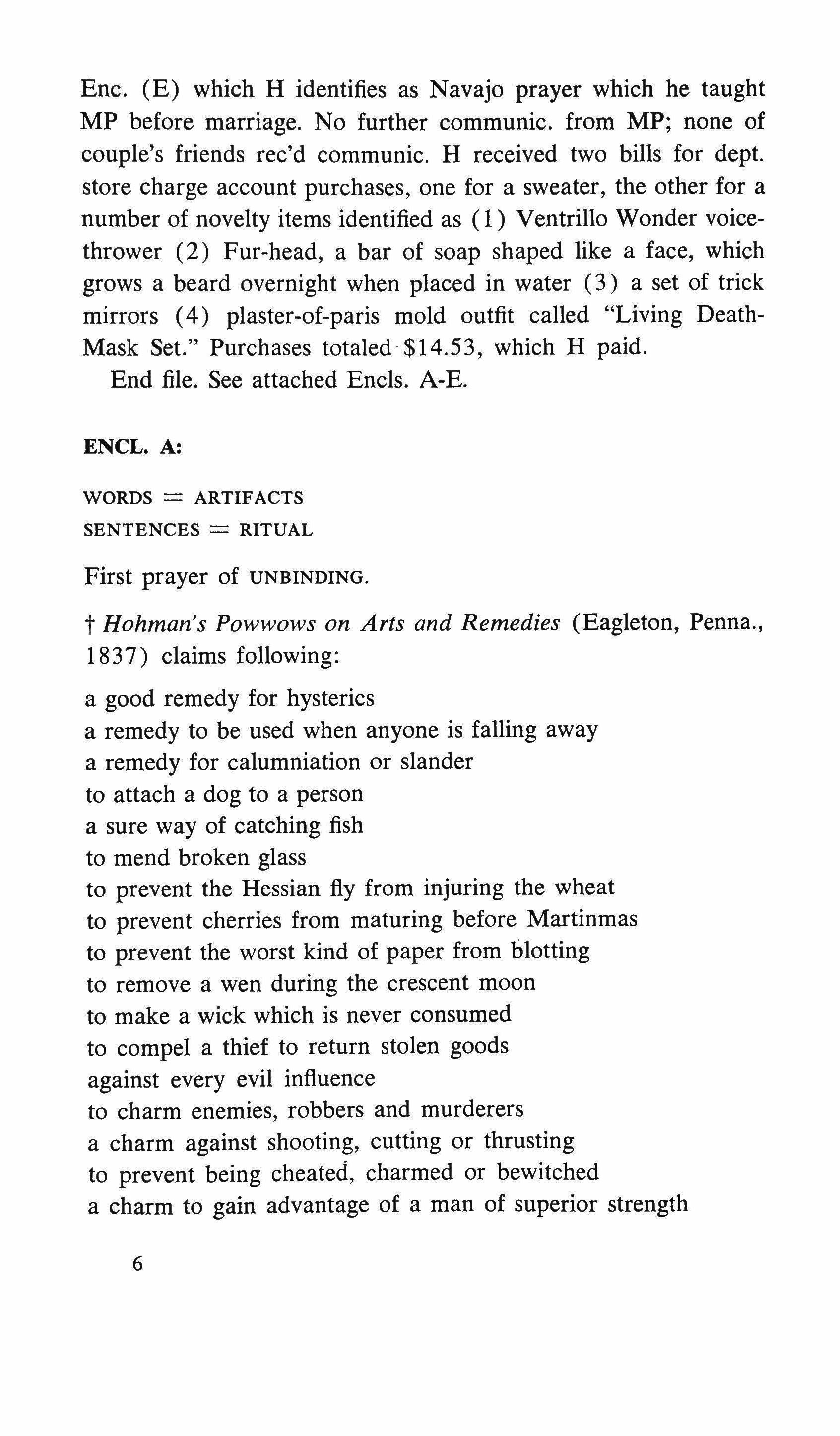
Enc. (E) which H identifies as Navajo prayer which he taught MP before marriage. No further communic. from MP; none of couple's friends rec'd communic. H received two bills for dept. store charge account purchases, one for a sweater, the other for a number of novelty items identified as (1) Ventrillo Wonder voicethrower (2) Fur-head, a bar of soap shaped like a face, which grows a beard overnight when placed in water (3) a set of trick mirrors (4) plaster-of-paris mold outfit called "Living DeathMask Set." Purchases totaled $14.53, which H paid.
End file. See attached EncIs. A-E.
ENCL. A:
WORDS = ARTIFACTS
SENTENCES = RITUAL
First prayer of UNBINDING.
t Hohman's Powwows on Arts and Remedies (Eagleton, Penna., 1837) claims following:
a good remedy for hysterics a remedy to be used when anyone is falling away a remedy for calumniation or slander to attach a dog to a person a sure way of catching fish to mend broken glass to prevent the Hessian fly from injuring the wheat to prevent cherries from maturing before Martinmas to prevent the worst kind of paper from blotting to remove a wen during the crescent moon to make a wick which is never consumed to compel a thief to return stolen goods against every evil influence to charm enemies, robbers and murderers a charm against shooting, cutting or thrusting to prevent being cheated, charmed or bewitched a charm to gain advantage of a man of superior strength
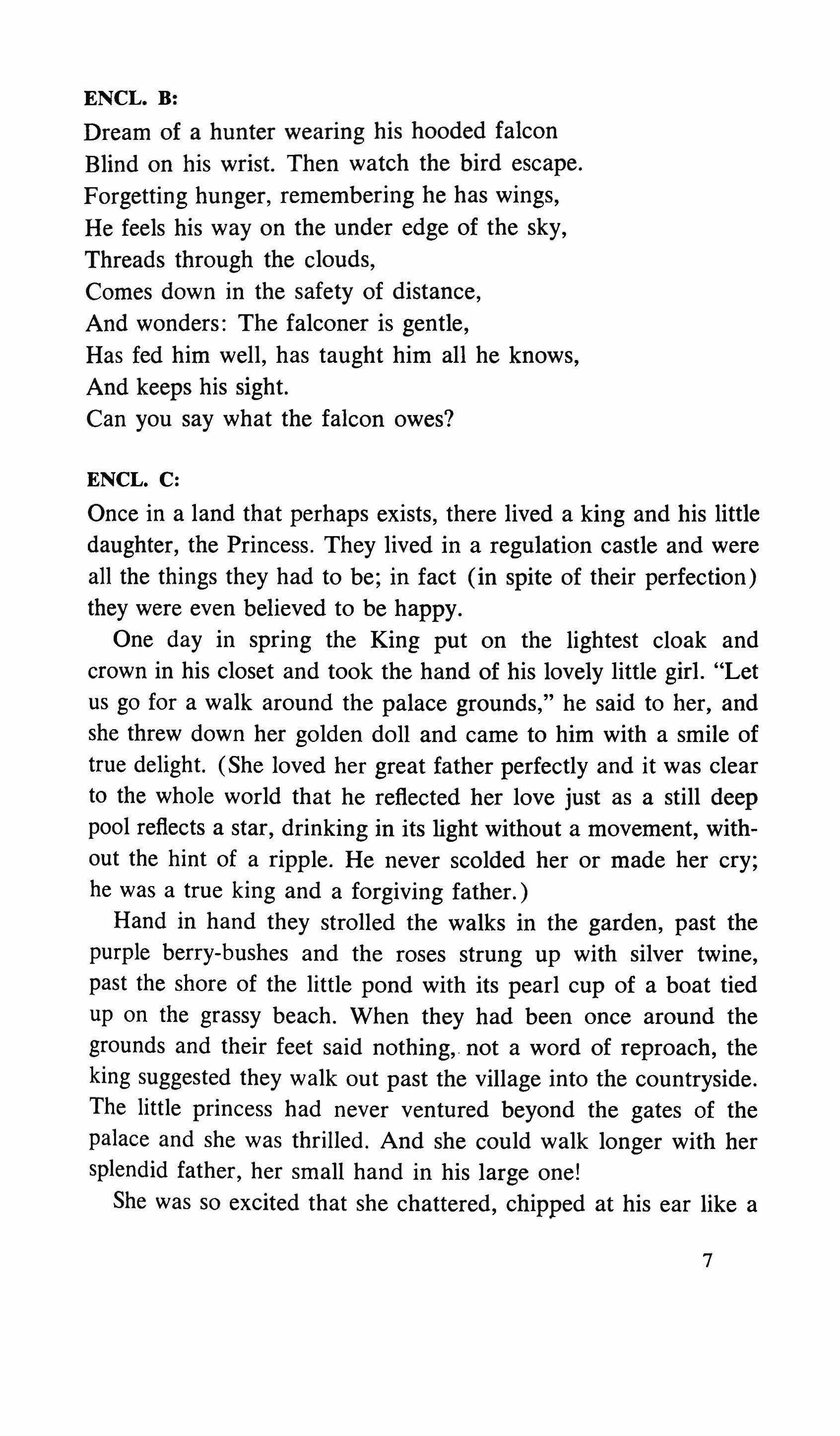
Dream of a hunter wearing his hooded falcon Blind on his wrist. Then watch the bird escape. Forgetting hunger, remembering he has wings, He feels his way on the under edge of the sky, Threads through the clouds, Comes down in the safety of distance, And wonders: The falconer is gentle, Has fed him well, has taught him all he knows, And keeps his sight.
Can you say what the falcon owes?
Once in a land that perhaps exists, there lived a king and his little daughter, the Princess. They lived in a regulation castle and were all the things they had to be; in fact (in spite of their perfection) they were even believed to be happy.
One day in spring the King put on the lightest cloak and crown in his closet and took the hand of his lovely little girl. "Let us go for a walk around the palace grounds," he said to her, and she threw down her golden doll and carne to him with a smile of true delight. (She loved her great father perfectly and it was clear to the whole world that he reflected her love just as a still deep pool reflects a star, drinking in its light without a movement, without the hint of a ripple. He never scolded her or made her cry; he was a true king and a forgiving father.)
Hand in hand they strolled the walks in the garden, past the purple berry-bushes and the roses strung up with silver twine, past the shore of the little pond with its pearl cup of a boat tied up on the grassy beach. When they had been once around the grounds and their feet said nothing; not a word of reproach, the king suggested they walk out past the village into the countryside. The little princess had never ventured beyond the gates of the palace and she was thrilled. And she could walk longer with her splendid father, her small hand in his large one!
She was so excited that she chattered, chipped at his ear like a
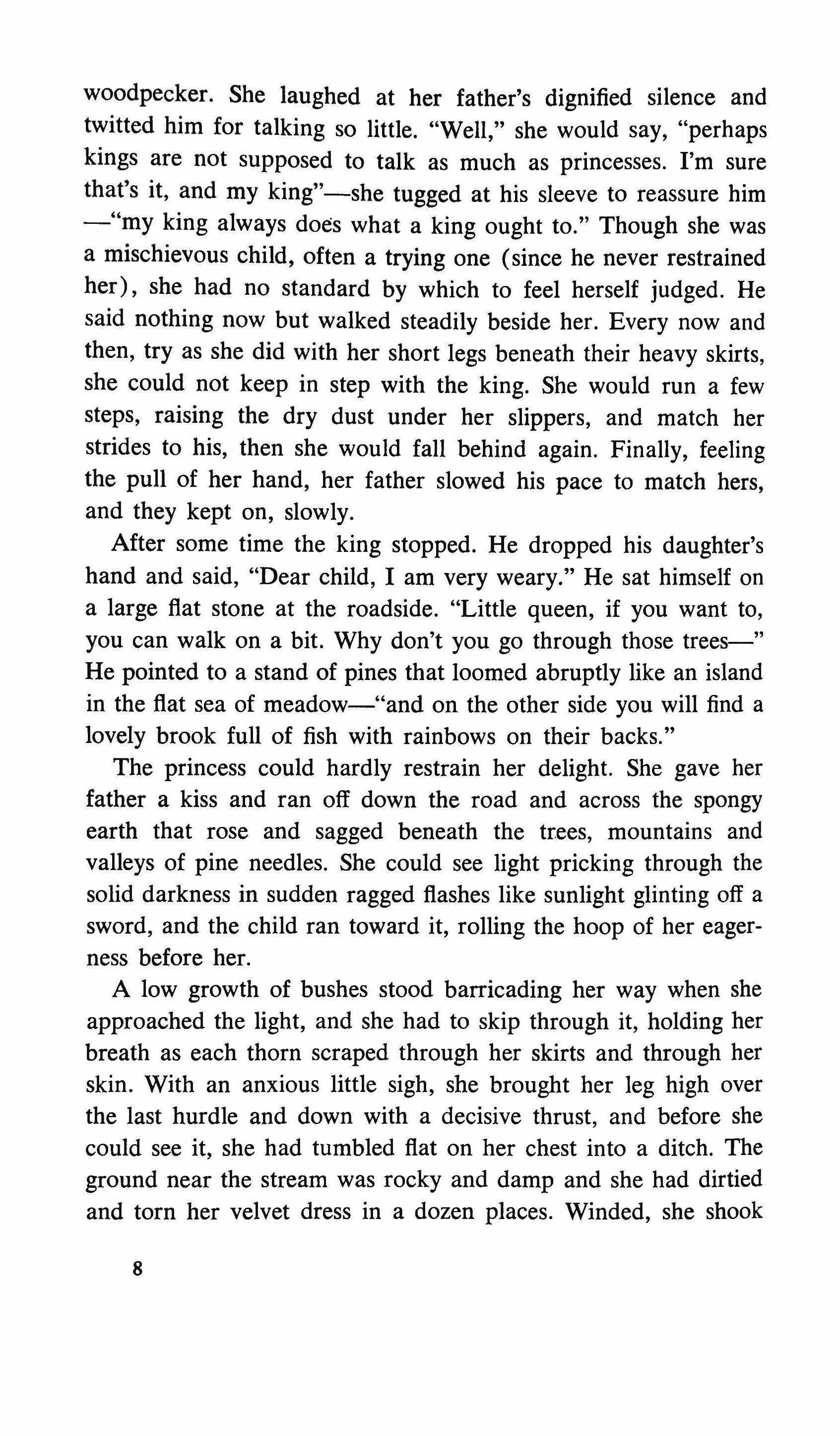
woodpecker. She laughed at her father's dignified silence and twitted him for talking so little. "Well," she would say, "perhaps kings are not supposed to talk as much as princesses. I'm sure that's it, and my king"-she tugged at his sleeve to reassure him -"my king always does what a king ought to." Though she was a mischievous child, often a trying one (since he never restrained her), she had no standard by which to feel herself judged. He said nothing now but walked steadily beside her. Every now and then, try as she did with her short legs beneath their heavy skirts, she could not keep in step with the king. She would run a few steps, raising the dry dust under her slippers, and match her strides to his, then she would fall behind again. Finally, feeling the pull of her hand, her father slowed his pace to match hers, and they kept on, slowly.
After some time the king stopped. He dropped his daughter's hand and said, "Dear child, I am very weary." He sat himself on a large flat stone at the roadside. "Little queen, if you want to, you can walk on a bit. Why don't you go through those trees-" He pointed to a stand of pines that loomed abruptly like an island in the flat sea of meadow-"and on the other side you will find a lovely brook full of fish with rainbows on their backs."
The princess could hardly restrain her delight. She gave her father a kiss and ran off down the road and across the spongy earth that rose and sagged beneath the trees, mountains and valleys of pine needles. She could see light pricking through the solid darkness in sudden ragged flashes like sunlight glinting off a sword, and the child ran toward it, rolling the hoop of her eagerness before her.
A low growth of bushes stood barricading her way when she approached the light, and she had to skip through it, holding her breath as each thorn scraped through her skirts and through her skin. With an anxious little sigh, she brought her leg high over the last hurdle and down with a decisive thrust, and before she could see it, she had tumbled flat on her chest into a ditch. The ground near the stream was rocky and damp and she had dirtied and torn her velvet dress in a dozen places. Winded, she shook
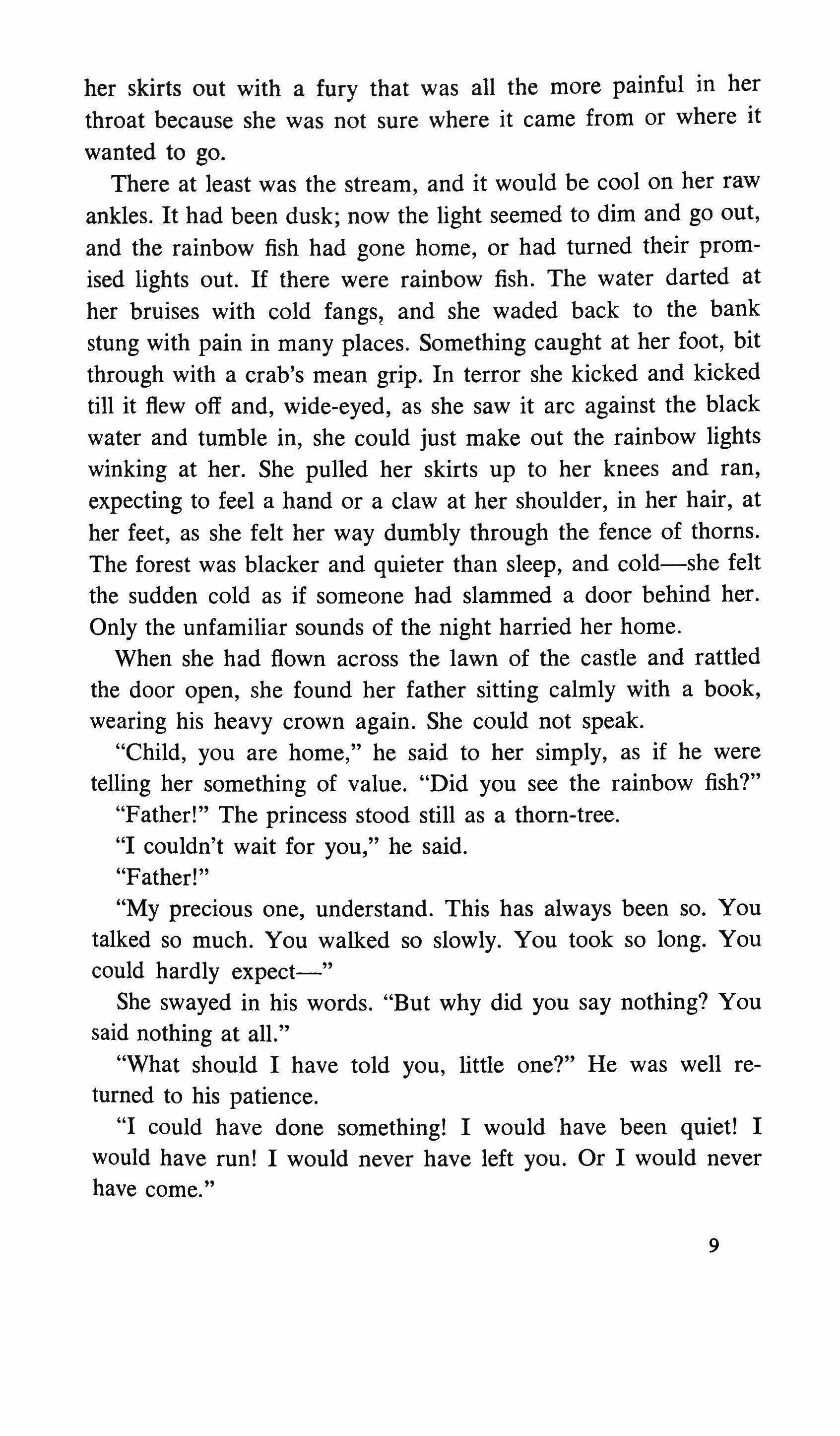
her skirts out with a fury that was all the more painful in her throat because she was not sure where it came from or where it wanted to go.
There at least was the stream, and it would be coolon her raw ankles. It had been dusk; now the light seemed to dim and go out, and the rainbow fish had gone home, or had turned their promised lights out. If there were rainbow fish. The water darted at her bruises with cold fangs, and she waded back to the bank stung with pain in many places. Something caught at her foot, bit through with a crab's mean grip. In terror she kicked and kicked till it flew off and, wide-eyed, as she saw it arc against the black water and tumble in, she could just make out the rainbow lights winking at her. She pulled her skirts up to her knees and ran, expecting to feel a hand or a claw at her shoulder, in her hair, at her feet, as she felt her way dumbly through the fence of thorns. The forest was blacker and quieter than sleep, and cold-she felt the sudden cold as if someone had slammed a door behind her. Only the unfamiliar sounds of the night harried her home.
When she had flown across the lawn of the castle and rattled the door open, she found her father sitting calmly with a book, wearing his heavy crown again. She could not speak.
"Child, you are home," he said to her simply, as if he were telling her something of value. "Did you see the rainbow fish?" "Father!" The princess stood still as a thorn-tree.
"I couldn't wait for you," he said.
"Father!"
"My precious one, understand. This has always been so. You talked so much. You walked so slowly. You took so long. You could hardly expect-"
She swayed in his words. "But why did you say nothing? You said nothing at all."
"What should I have told you, little one?" He was well returned to his patience.
"I could have done something! I would have been quiet! I would have run! I would never have left you. Or I would never have come."
9
Her father smiled faintly, quizzically. "Ah," he said and spread his large hands wide.
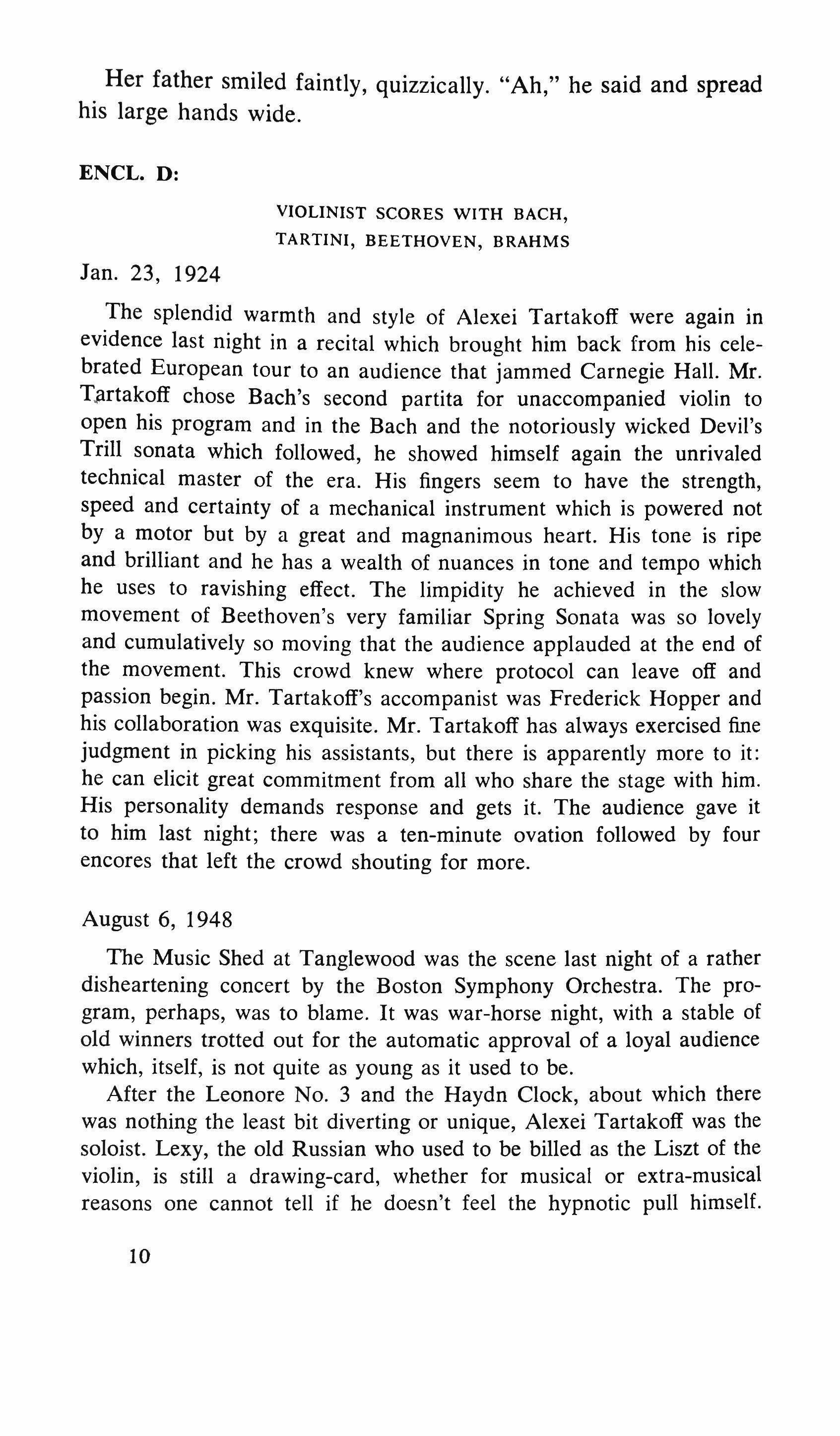
Jan. 23, 1924
The splendid warmth and style of Alexei Tartakoff were again in evidence last night in a recital which brought him back from his celebrated European tour to an audience that jammed Carnegie Hall. Mr. Tartakoff chose Bach's second partita for unaccompanied violin to open his program and in the Bach and the notoriously wicked Devil's Trill sonata which followed, he showed himself again the unrivaled technical master of the era. His fingers seem to have the strength, speed and certainty of a mechanical instrument which is powered not by a motor but by a great and magnanimous heart. His tone is ripe and brilliant and he has a wealth of nuances in tone and tempo which he uses to ravishing effect. The limpidity he achieved in the slow movement of Beethoven's very familiar Spring Sonata was so lovely and cumulatively so moving that the audience applauded at the end of the movement. This crowd knew where protocol can leave off and passion begin. Mr. Tartakoff's accompanist was Frederick Hopper and his collaboration was exquisite. Mr. Tartakoff has always exercised fine judgment in picking his assistants, but there is apparently more to it: he can elicit great commitment from all who share the stage with him. His personality demands response and gets it. The audience gave it to him last night; there was a ten-minute ovation followed by four encores that left the crowd shouting for more.
The Music Shed at Tanglewood was the scene last night of a rather disheartening concert by the Boston Symphony Orchestra. The program, perhaps, was to blame. It was war-horse night, with a stable of old winners trotted out for the automatic approval of a loyal audience which, itself, is not quite as young as it used to be.
After the Leonore No.3 and the Haydn Clock, about which there was nothing the least bit diverting or unique, Alexei Tartakoff was the soloist. Lexy, the old Russian who used to be billed as the Liszt of the violin, is still a drawing-card, whether for musical or extra-musical reasons one cannot tell if he doesn't feel the hypnotic pull himself.
10
(This reviewer must admit that he doesn't, but perhaps his parents did.) This reluctance to be moved by the charming smile and courtier's bow, and the still ample crown of free-floating hair, leaves one's attention, unfortunately, free to listen to the music Tartakoff produces. It is flamboyant and undisciplined and yet somehow conventional, for all the unconventionalities his sloppiness of phrasing and intonation allow. He sounds temperamental a la Russe, but it is all so familiar, could his heart really be in it? This style would be so easy for a young violinist to learn to ape, with a bit of application, from old records; and one fears that a younger, more limber man could do it better. These days, at least, we must demand more from our orchestras and our soloists than they gave us last night.
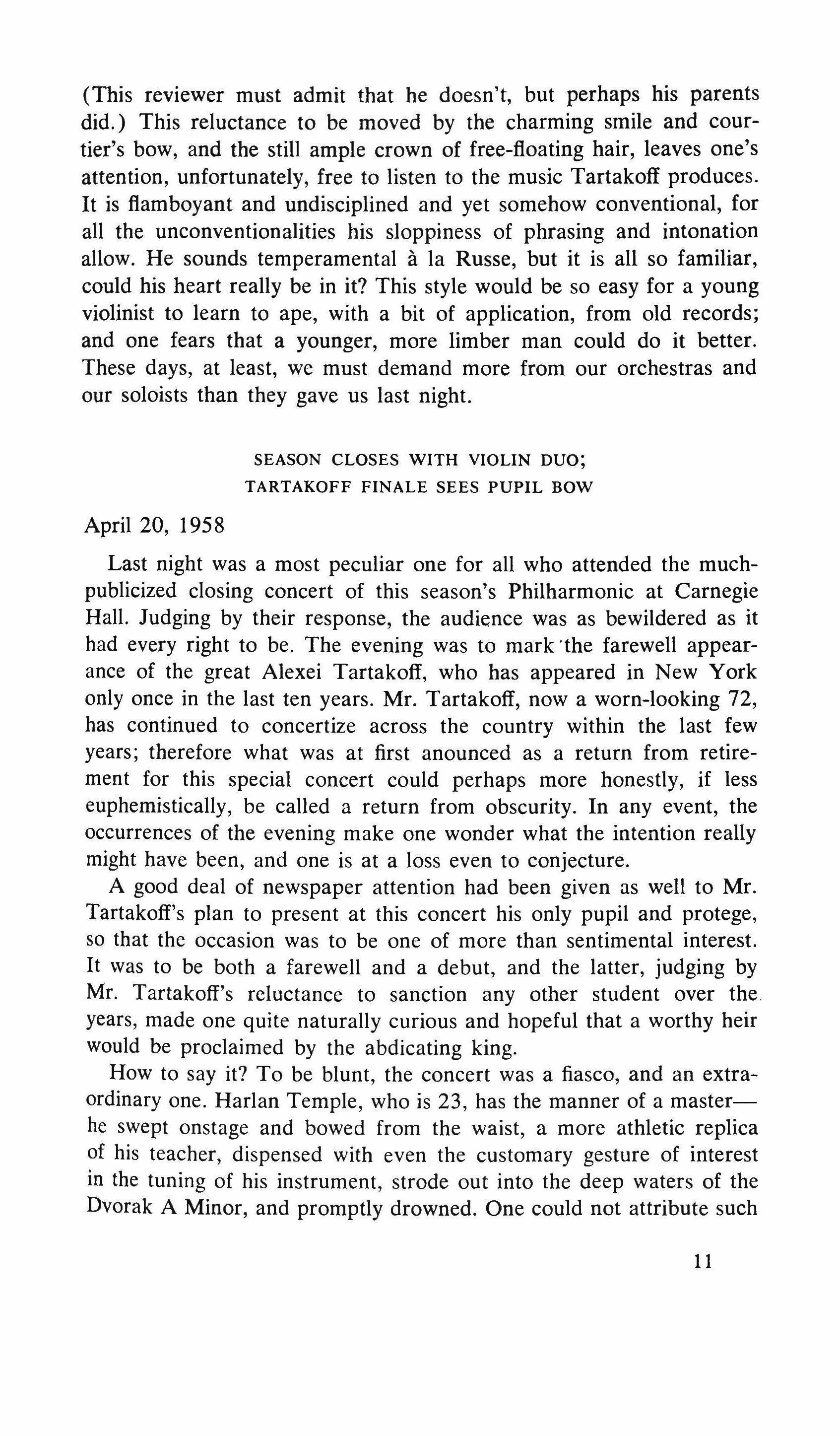
April 20, 1958
Last night was a most peculiar one for all who attended the muchpublicized closing concert of this season's Philharmonic at Carnegie Hall. Judging by their response, the audience was as bewildered as it had every right to be. The evening was to mark 'the farewell appearance of the great Alexei Tartakoff, who has appeared in New York only once in the last ten years. Mr. Tartakoff, now a worn-looking 72, has continued to concertize across the country within the last few years; therefore what was at first anounced as a return from retirement for this special concert could perhaps more honestly, if less euphemistically, be called a return from obscurity. In any event, the occurrences of the evening make one wonder what the intention really might have been, and one is at a loss even to conjecture.
A good deal of newspaper attention had been given as well to Mr. Tartakoff's plan to present at this concert his only pupil and protege, so that the occasion was to be one of more than sentimental interest. It was to be both a farewell and a debut, and the latter, judging by Mr. Tartakoff's reluctance to sanction any other student over the. years, made one quite naturally curious and hopeful that a worthy heir would be proclaimed by the abdicating king.
How to say it? To be blunt, the concert was a fiasco, and an extraordinary one. Harlan Temple, who is 23, has the manner of a masterhe swept onstage and bowed from the waist, a more athletic replica of his teacher, dispensed with even the customary gesture of interest in the tuning of his instrument, strode out into the deep waters of the Dvorak A Minor, and promptly drowned. One could not attribute such
fundamentally faulty playing to nervousness, especially when not a hint of discomfort was in evidence. On the contrary, Mr. Temple was more self-possessed than most proven professionals, even suspiciously so. But his technique was wretched, his intonation slapdash, his tone ugly, his general level of sensitivity and musical feeling so low it was virtually absent. This pleasant enough concerto was suddenly ghastly and endless, and when he had done with it, the soloist bowed profusely to a paralyzed audience from which a ragged little sound of applause issued briefly. But Mr. Tartakoff was onstage, clapping proudly, and the orchestra, with Rouben Der Tartesian on the podium, joined with him enthusiastically. No one but the audience looked troubled. One shook oneself to see if it might have been an acoustical fluke or an after-dinner dream. But for confirmation, the master and his pupil were paired in the Bach G Minor double concerto, and the impression persisted. And next to Tartakoff, the untalented boy was an even greater outrage. What a lovely tone and what a cat-squawk juxtaposed! By comparison the aging violinist was the perfect musician again-soaring, agile, strong.
This reviewer, grieved, confused, even angry, cannot help but wonder what will happen to Harlan Temple when he is properly launched (horribile dictu!) and on his own. Considering that he already parades like a child movie-star, he has apparently been brainwashed into believing that he will have, or already has, a career ready-made for him. If so, Mr. Temple is in for a colossal disappointment.
ENCL. E:
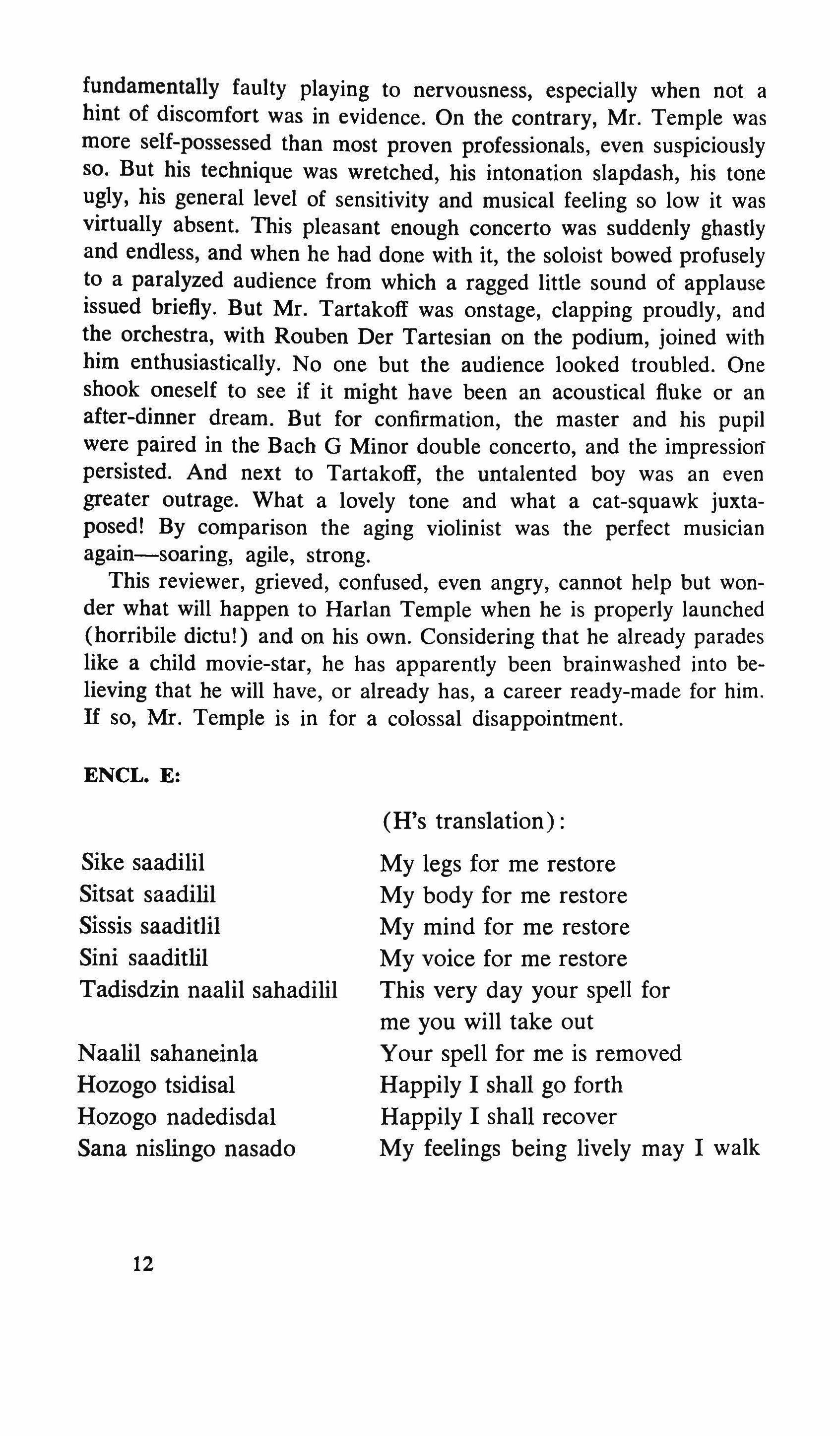
Sike saadilil
Sitsat saadilil
Sissis saaditlil
Sini saaditlil
Tadisdzin naalil sahadilil
Naalil sahaneinla
Hozogo tsidisal
Hozogo nadedisdal
Sana nislingo nasado 12
(H's translation) :
My legs for me restore
My body for me restore
My mind for me restore
My voice for me restore
This very day your spell for me you will take out
Your spell for me is removed
Happily I shall go forth
Happily I shall recover
My feelings being lively may I walk
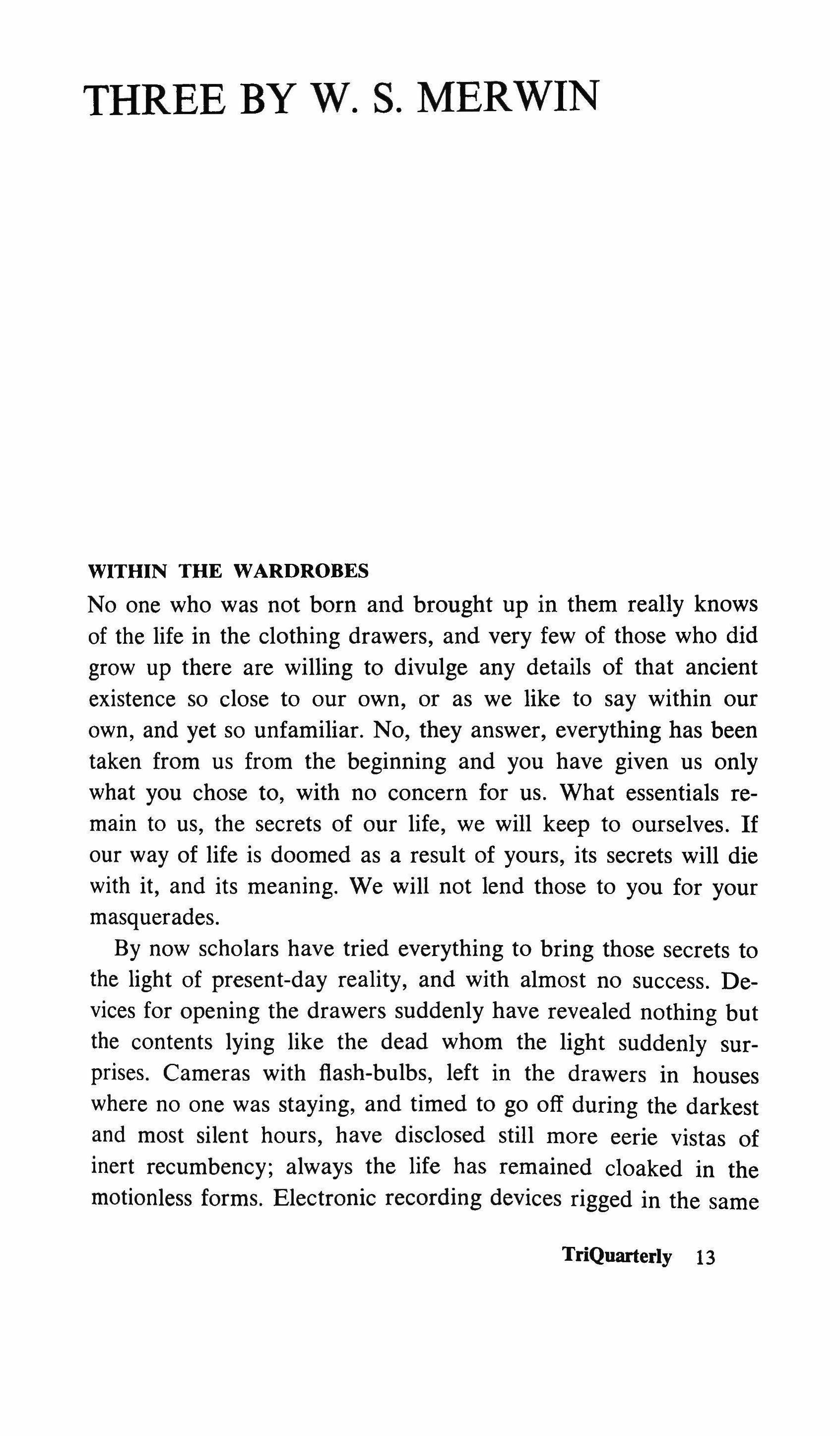
No one who was not born and brought up in them really knows of the life in the clothing drawers, and very few of those who did grow up there are willing to divulge any details of that ancient existence so close to our own, or as we like to say within our own, and yet so unfamiliar. No, they answer, everything has been taken from us from the beginning and you have given us only what you chose to, with no concern for us. What essentials remain to us, the secrets of our life, we will keep to ourselves. If our way of life is doomed as a result of yours, its secrets will die with it, and its meaning. We will not lend those to you for your masquerades.
By now scholars have tried everything to bring those secrets to the light of present-day reality, and with almost no success. Devices for opening the drawers suddenly have revealed nothing but the contents lying like the dead whom the light suddenly surprises. Cameras with flash-bulbs, left in the drawers in houses where no one was staying, and timed to go off during the darkest and most silent hours, have disclosed still more eerie vistas of inert recumbency; always the life has remained cloaked in the motionless forms. Electronic recording devices rigged in the same
TriQuarterIy 13
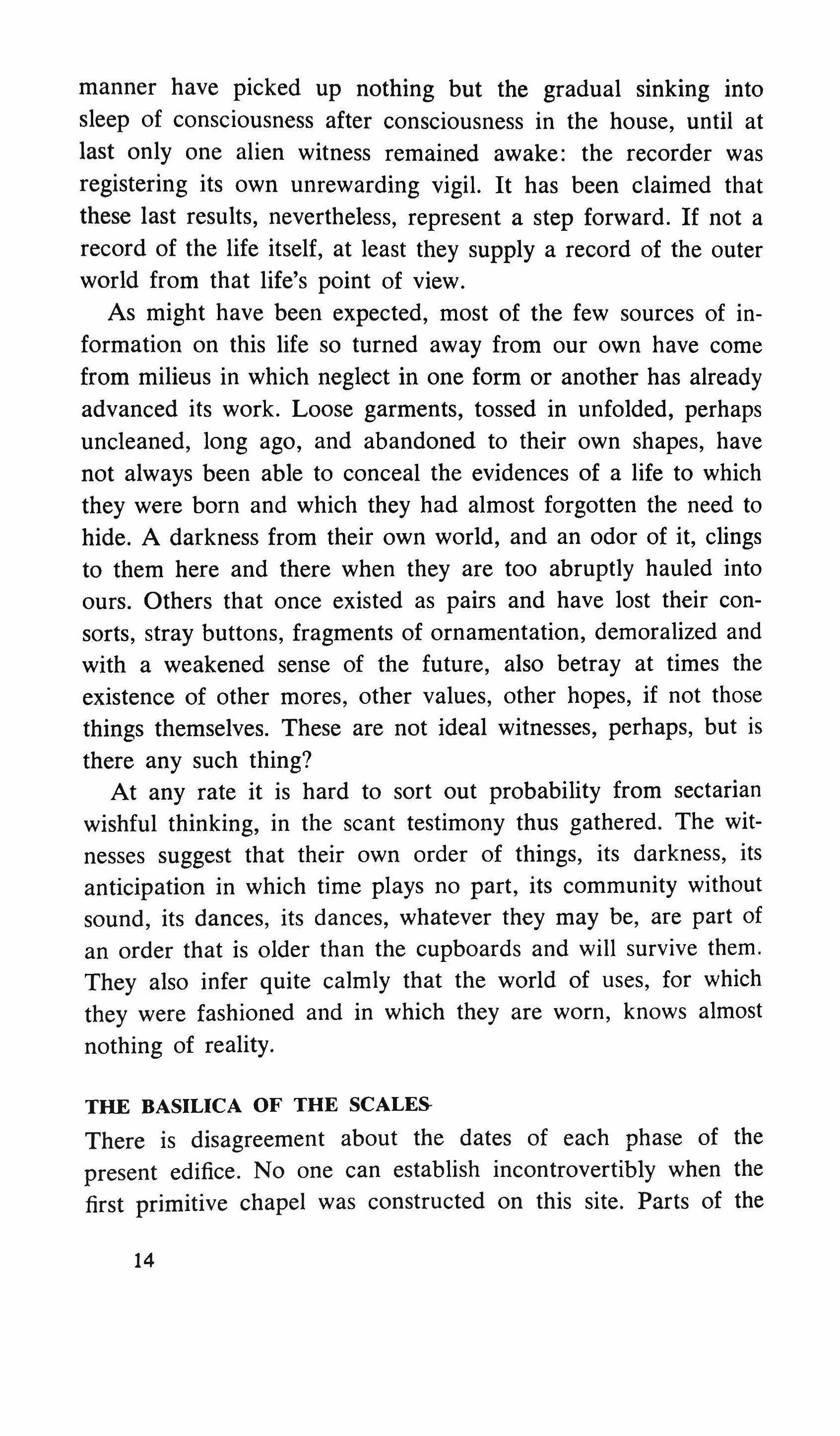
manner have picked up nothing but the gradual sinking into sleep of consciousness after consciousness in the house, until at last only one alien witness remained awake: the recorder was registering its own unrewarding vigil. It has been claimed that these last results, nevertheless, represent a step forward. If not a record of the life itself, at least they supply a record of the outer world from that life's point of view.
As might have been expected, most of the few sources of information on this life so turned away from our own have come from milieus in which neglect in one form or another has already advanced its work. Loose garments, tossed in unfolded, perhaps uncleaned, long ago, and abandoned to their own shapes, have not always been able to conceal the evidences of a life to which they were born and which they had almost forgotten the need to hide. A darkness from their own world, and an odor of it, clings to them here and there when they are too abruptly hauled into ours. Others that once existed as pairs and have lost their consorts, stray buttons, fragments of ornamentation, demoralized and with a weakened sense of the future, also betray at times the existence of other mores, other values, other hopes, if not those things themselves. These are not ideal witnesses, perhaps, but is there any such thing?
At any rate it is hard to sort out probability from sectarian wishful thinking, in the scant testimony thus gathered. The witnesses suggest that their own order of things, its darkness, its anticipation in which time plays no part, its community without sound, its dances, its dances, whatever they may be, are part of an order that is older than the cupboards and will survive them. They also infer quite calmly that the world of uses, for which they were fashioned and in which they are worn, knows almost nothing of reality.
There is disagreement about the dates of each phase of the present edifice. No one can establish incontrovertibly when the first primitive chapel was constructed on this site. Parts of the
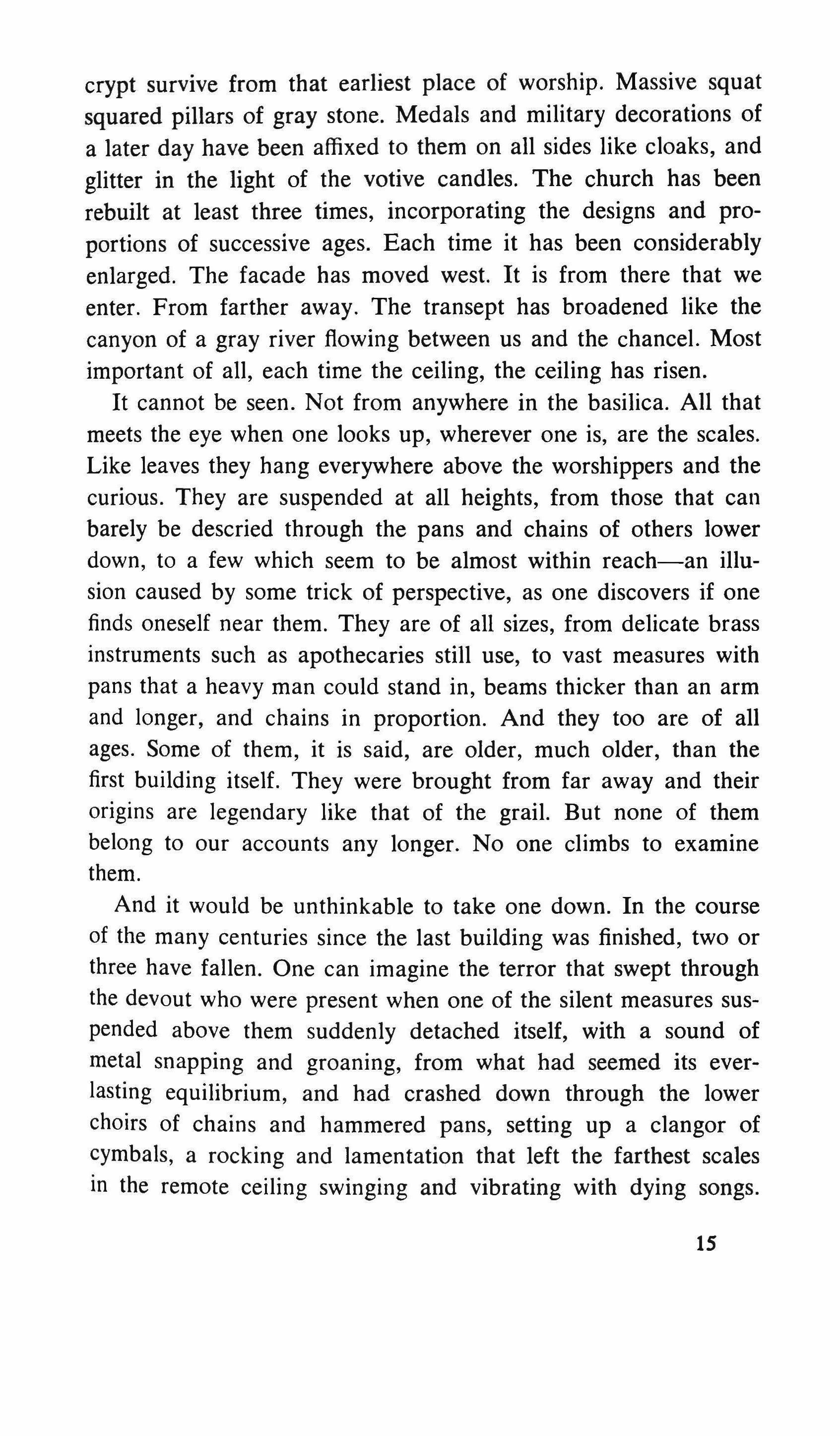
crypt survive from that earliest place of worship. Massive squat squared pillars of gray stone. Medals and military decorations of a later day have been affixed to them on all sides like cloaks, and glitter in the light of the votive candles. The church has been rebuilt at least three times, incorporating the designs and proportions of successive ages. Each time it has been considerably enlarged. The facade has moved west. It is from there that we enter. From farther away. The transept has broadened like the canyon of a gray river flowing between us and the chancel. Most important of all, each time the ceiling, the ceiling has risen.
It cannot be seen. Not from anywhere in the basilica. All that meets the eye when one looks up, wherever one is, are the scales. Like leaves they hang everywhere above the worshippers and the curious. They are suspended at all heights, from those that can barely be descried through the pans and chains of others lower down, to a few which seem to be almost within reach-an illusion caused by some trick of perspective, as one discovers if one finds oneself near them. They are of all sizes, from delicate brass instruments such as apothecaries still use, to vast measures with pans that a heavy man could stand in, beams thicker than an arm and longer, and chains in proportion. And they too are of all ages. Some of them, it is said, are older, much older, than the first building itself. They were brought from far away and their origins are legendary like that of the grail. But none of them belong to our accounts any longer. No one climbs to examine them.
And it would be unthinkable to take one down. In the course of the many centuries since the last building was finished, two or three have fallen. One can imagine the terror that swept through the devout who were present when one of the silent measures suspended above them suddenly detached itself, with a sound of metal snapping and groaning, from what had seemed its everlasting equilibrium, and had crashed down through the lower choirs of chains and hammered pans, setting up a clangor of cymbals, a rocking and lamentation that left the farthest scales in the remote ceiling swinging and vibrating with dying songs.

The fallen measures lay like dead supplicants on the granite floor. No one touched them. No one was sure what they meant. No one knelt to pray near them on the bare stone unless the crowd of worshippers pressed them closer than they would have chosen to be. In time iron railings were erected around the collapsed measures where they ·lay. Black cloth was draped from the rail and removed only between the evening of Good Friday and Easter morning. Candles-not votive lights but thick columns of wax the color of the faces of the dead-flickered perpetually at the corners of the enclosures.
As for the scales suspended above, it would be hard to say at a glance whether they are still or moving. A distant quiet hangs in the pans like dust. And yet the eye that remains fixed upon them for some time detects, or seems to detect, a scarcely perceptible motion, such as we think we see if we stare for long at the faces of the dead. And in fact the scales are at all times in motion. Often it is so slight that the unaided eye could not discern it at all if it were not that the thousands of minute swayings all cast shadows into the thickets of chains, beams, pans, and the shadows magnify the movements, giving that impression of a breathing lost in itself. Occasionally a single balance will forsake its equilibrium, without apparent warning, and one of its pans will slowly sink farther and farther as the other rises, then even more slowly right itself. The phenomenon has fostered various explanations. Some say it is due to a death. Some ascribe it to a peculiar fervor of prayer. Others declare that it is the dove descending. Or a wind. Past, present, or to come.
My cousin Gene (he's really only a second cousin) has a shoe he picked up at Dachau. It's a pretty worn-out shoe. It wasn't top quality in the first place, he explained. The sole is cracked clear across and has pulled loose from the upper on both sides, and the upper is split at the ball of the foot. There's no lace and there's no heel.
He explained he didn't steal it because it must have belonged
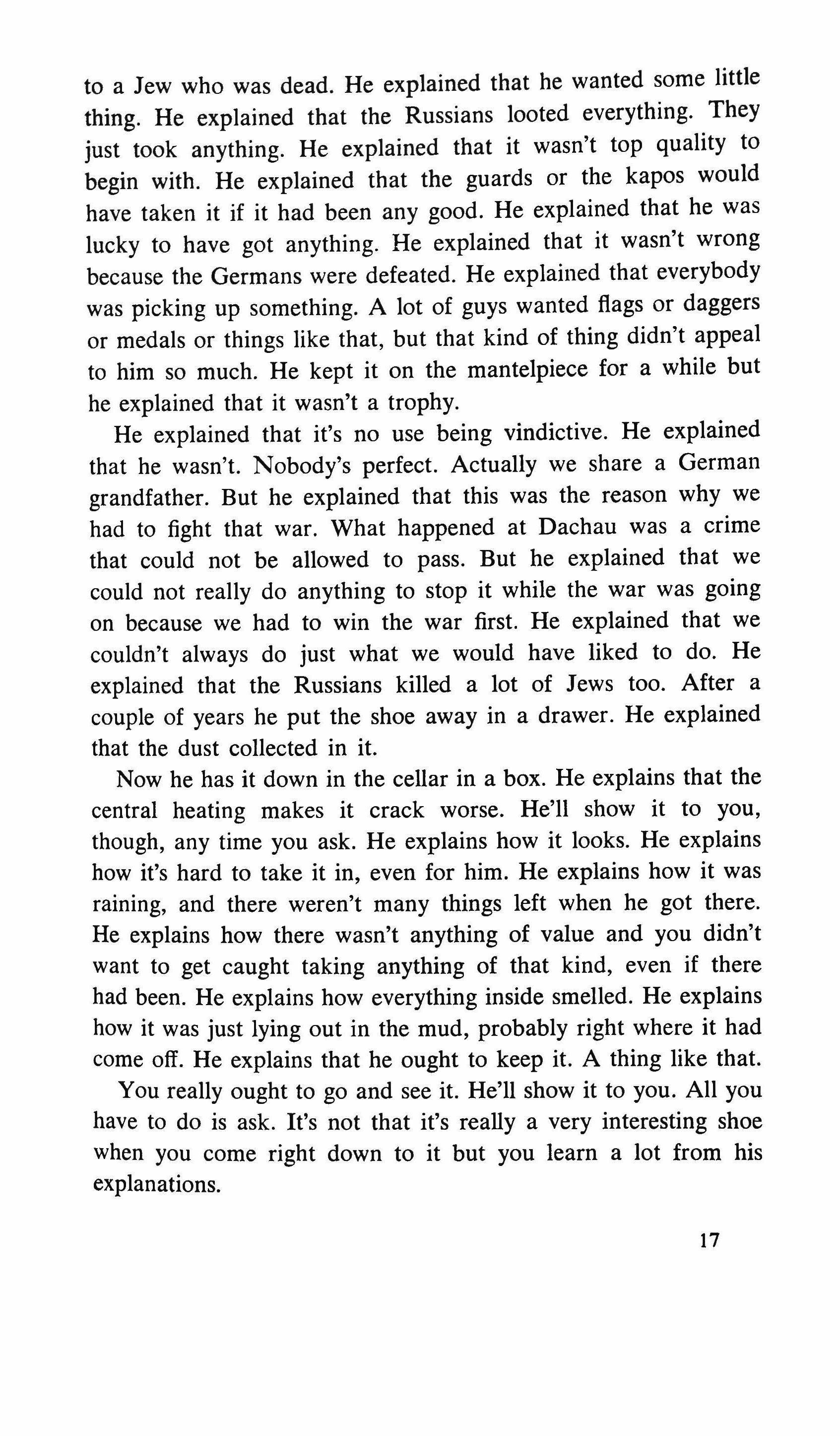
to a Jew who was dead. He explained that he wanted some little thing. He explained that the Russians looted everything. They just took anything. He explained that it wasn't top quality to begin with. He explained that the guards or the kapos would have taken it if it had been any good. He explained that he was lucky to have got anything. He explained that it wasn't wrong because the Germans were defeated. He explained that everybody was picking up something. A lot of guys wanted flags or daggers or medals or things like that, but that kind of thing didn't appeal to him so much. He kept it on the mantelpiece for a while but he explained that it wasn't a trophy.
He explained that it's no use being vindictive. He explained that he wasn't. Nobody's perfect. Actually we share a German grandfather. But he explained that this was the reason why we had to fight that war. What happened at Dachau was a crime that could not be allowed to pass. But he explained that we could not really do anything to stop it while the war was going on because we had to win the war first. He explained that we couldn't always do just what we would have liked to do. He explained that the Russians killed a lot of Jews too. After a couple of years he put the shoe away in a drawer. He explained that the dust collected in it.
Now he has it down in the cellar in a box. He explains that the central heating makes it crack worse. He'll show it to you, though, any time you ask. He explains how it looks. He explains how it's hard to take it in, even for him. He explains how it was raining, and there weren't many things left when he got there. He explains how there wasn't anything of value and you didn't want to get caught taking anything of that kind, even if there had been. He explains how everything inside smelled. He explains how it was just lying out in the mud, probably right where it had come off. He explains that he ought to keep it. A thing like that. You really ought to go and see it. He'll show it to you. All you have to do is ask. It's not that it's really a very interesting shoe when you come right down to it but you learn a lot from his explanations.
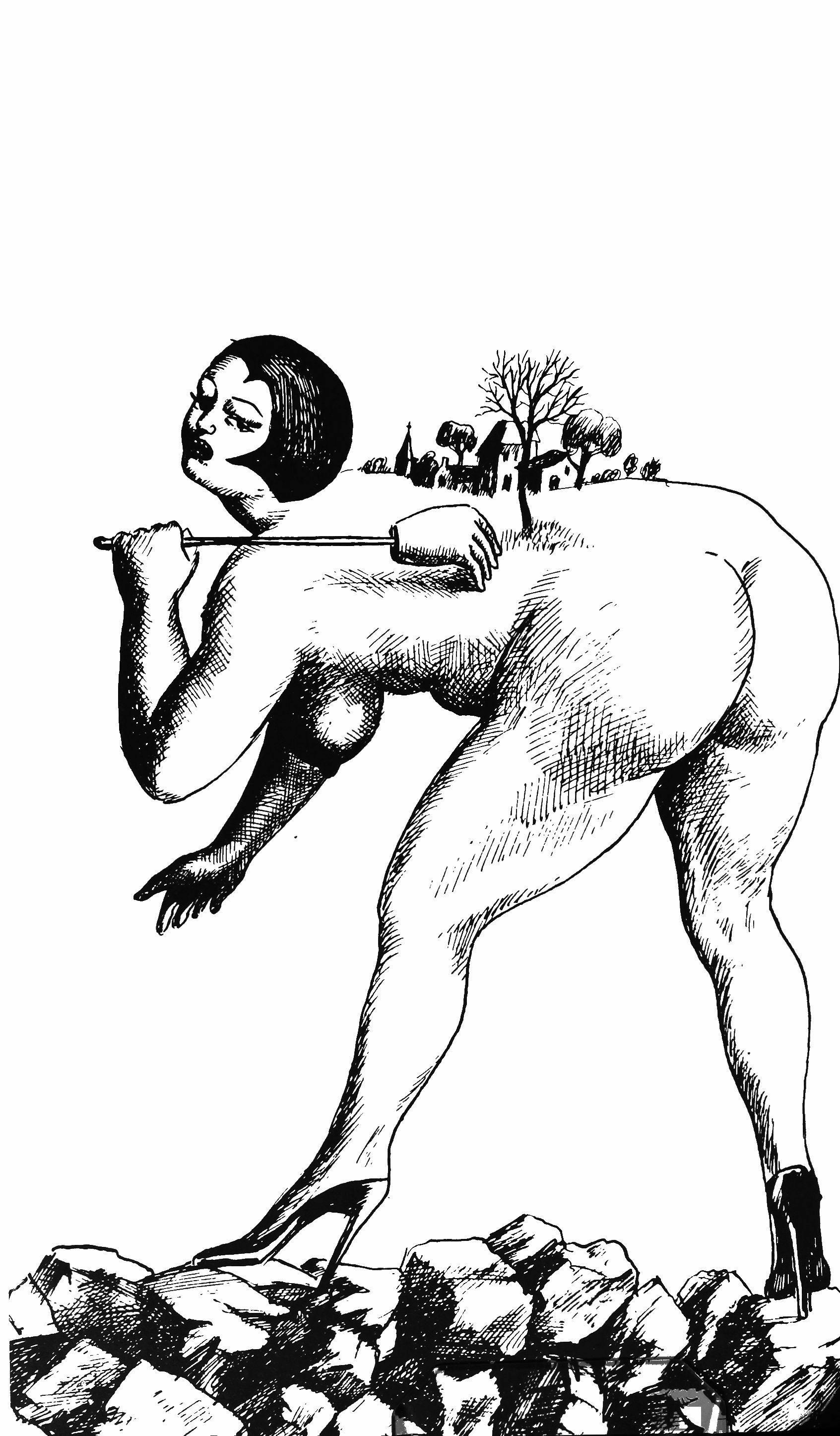
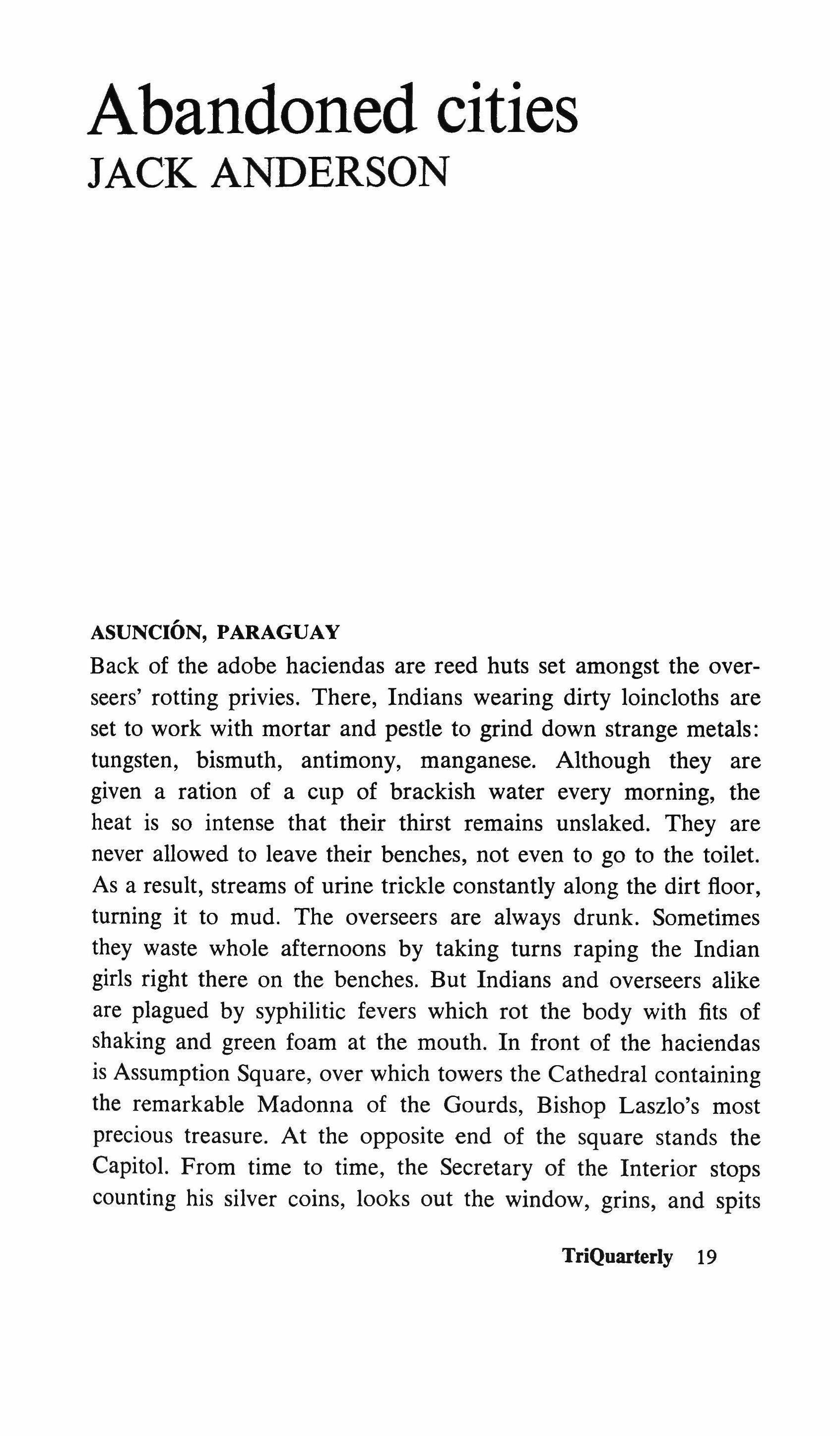
Back of the adobe haciendas are reed huts set amongst the overseers' rotting privies. There, Indians wearing dirty loincloths are set to work with mortar and pestle to grind down strange metals: tungsten, bismuth, antimony, manganese. Although they are given a ration of a cup of brackish water every morning, the heat is so intense that their thirst remains unslaked. They are never allowed to leave their benches, not even to go to the toilet. As a result, streams of urine trickle constantly along the dirt floor, turning it to mud. The overseers are always drunk. Sometimes they waste whole afternoons by taking turns raping the Indian girls right there on the benches. But Indians and overseers alike are plagued by syphilitic fevers which rot the body with fits of shaking and green foam at the mouth. In front of the haciendas is Assumption Square, over which towers the Cathedral containing the remarkable Madonna of the Gourds, Bishop Laszlo's most precious treasure. At the opposite end of the square stands the Capitol. From time to time, the Secretary of the Interior stops counting his silver coins, looks out the window, grins, and spits
TriQuarterly 19
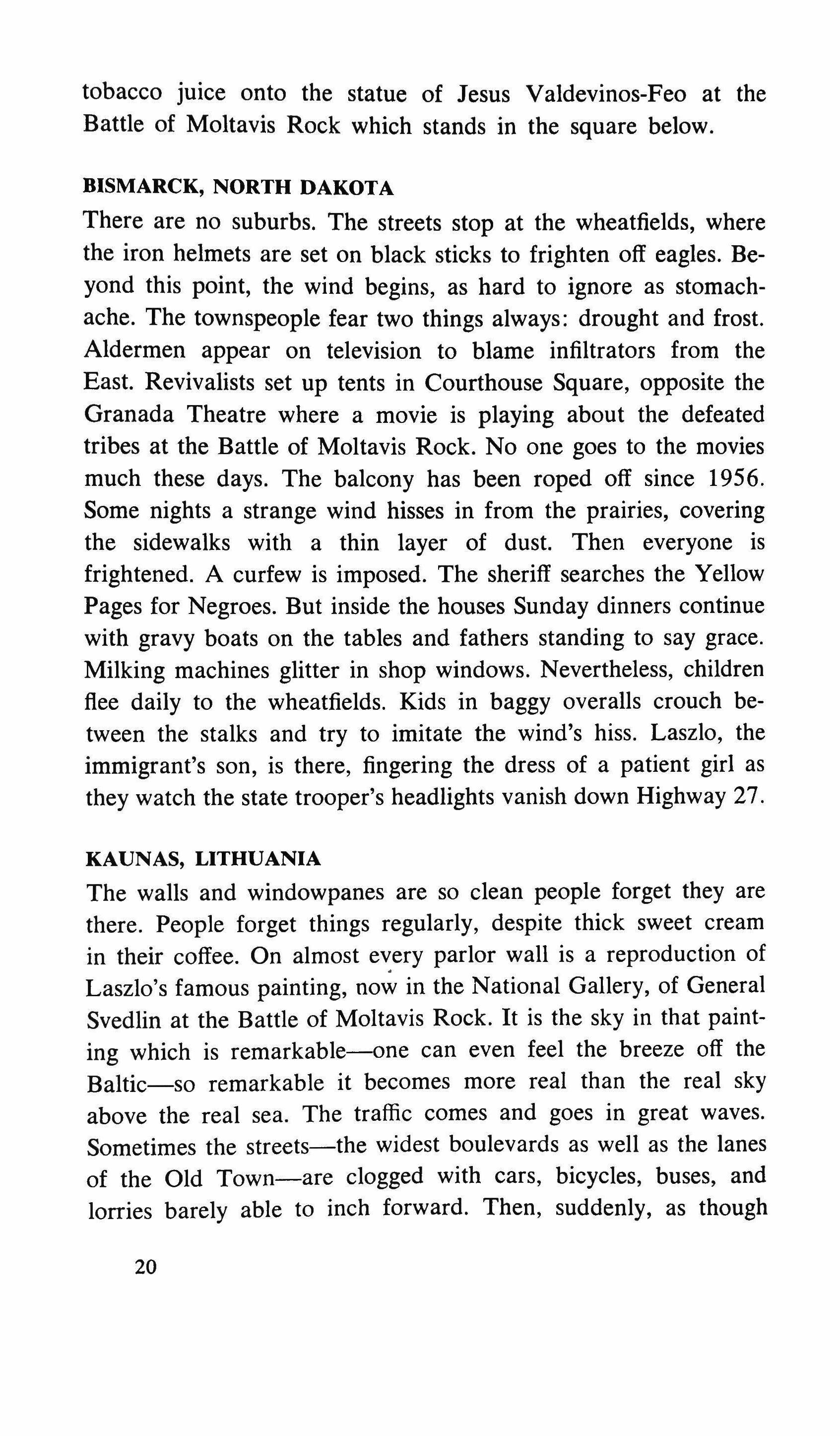
tobacco juice onto the statue of Jesus Valdevinos-Feo at the Battle of Moltavis Rock which stands in the square below.
There are no suburbs. The streets stop at the wheatfields, where the iron helmets are set on black sticks to frighten off eagles. Beyond this point, the wind begins, as hard to ignore as stomachache. The townspeople fear two things always: drought and frost. Aldermen appear on television to blame infiltrators from the East. Revivalists set up tents in Courthouse Square, opposite the Granada Theatre where a movie is playing about the defeated tribes at the Battle of Moltavis Rock. No one goes to the movies much these days. The balcony has been roped off since 1956. Some nights a strange wind hisses in from the prairies, covering the sidewalks with a thin layer of dust. Then everyone is frightened. A curfew is imposed. The sheriff searches the Yellow Pages for Negroes. But inside the houses Sunday dinners continue with gravy boats on the tables and fathers standing to say grace. Milking machines glitter in shop windows. Nevertheless, children flee daily to the wheatfields. Kids in baggy overalls crouch between the stalks and try to imitate the wind's hiss. Laszlo, the immigrant's son, is there, fingering the dress of a patient girl as they watch the state trooper's headlights vanish down Highway 27.
The walls and windowpanes are so clean people forget they are there. People forget things regularly, despite thick sweet cream in their coffee. On almost ev_ery parlor wall is a reproduction of Laszlo's famous painting, now in the National Gallery, of General Svedlin at the Battle of Moltavis Rock. It is the sky in that painting which is remarkable-one can even feel the breeze off the Baltic-so remarkable it becomes more real than the real sky above the real sea. The traffic comes and goes in great waves. Sometimes the streets-the widest boulevards as well as the lanes of the Old Town-are clogged with cars, bicycles, buses, and lorries barely able to inch forward. Then, suddenly, as though
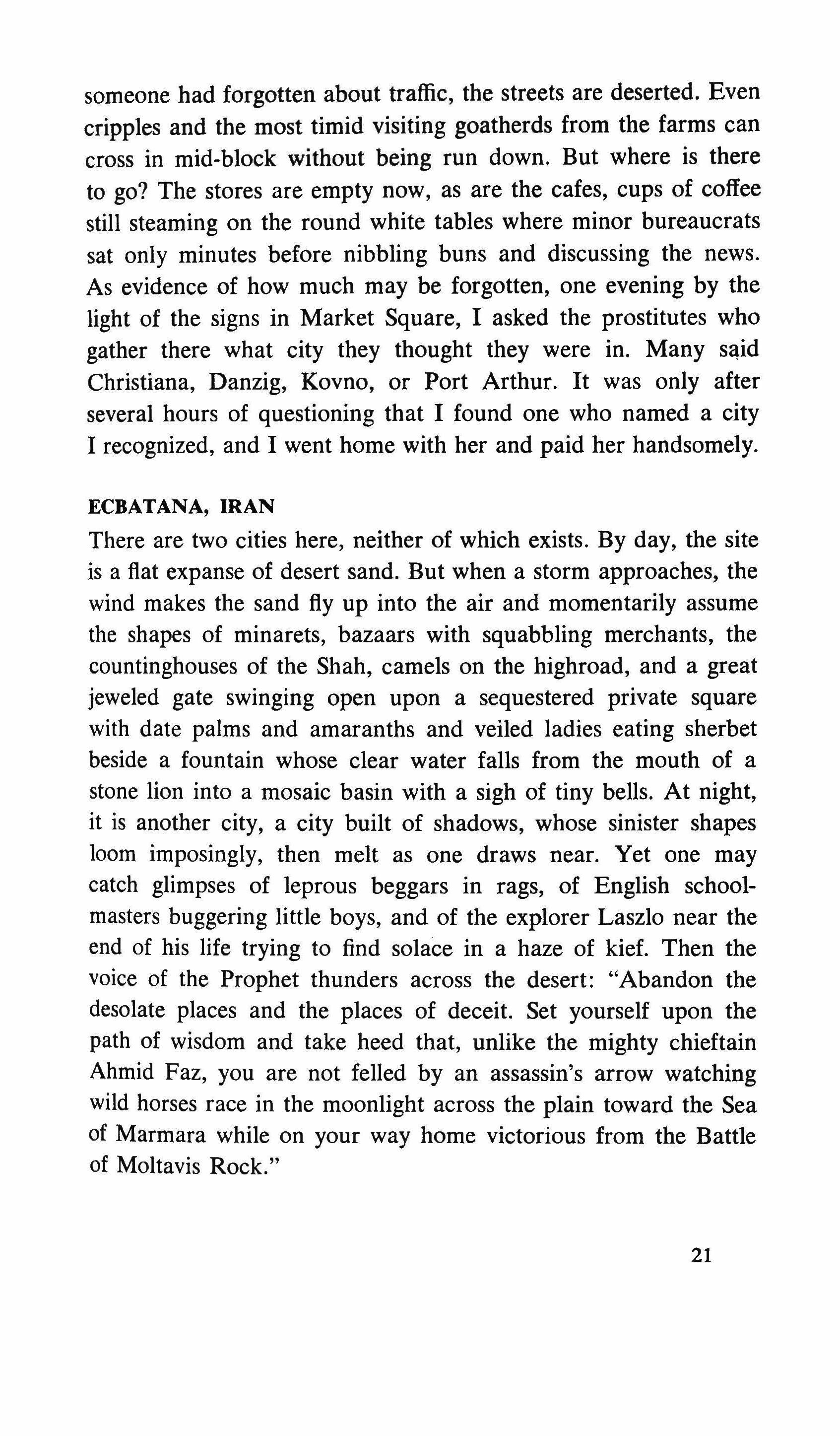
someone had forgotten about traffic, the streets are deserted. Even cripples and the most timid visiting goatherds from the farms can cross in mid-block without being run down. But where is there to go? The stores are empty now, as are the cafes, cups of coffee still steaming on the round white tables where minor bureaucrats sat only minutes before nibbling buns and discussing the news. As evidence of how much may be forgotten, one evening by the light of the signs in Market Square, I asked the prostitutes who gather there what city they thought they were in. Many said Christiana, Danzig, Kovno, or Port Arthur. It was only after several hours of questioning that I found one who named a city I recognized, and I went home with her and paid her handsomely.
There are two cities here, neither of which exists. By day, the site is a flat expanse of desert sand. But when a storm approaches, the wind makes the sand fly up into the air and momentarily assume the shapes of minarets, bazaars with squabbling merchants, the countinghouses of the Shah, camels on the highroad, and a great jeweled gate swinging open upon a sequestered private square with date palms and amaranths and veiled ladies eating sherbet beside a fountain whose clear water falls from the mouth of a stone lion into a mosaic basin with a sigh of tiny bells. At night, it is another city, a city built of shadows, whose sinister shapes loom imposingly, then melt as one draws near. Yet one may catch glimpses of leprous beggars in rags, of English schoolmasters buggering little boys, and of the explorer Laszlo near the end of his life trying to find solace in a haze of kief. Then the voice of the Prophet thunders across the desert: "Abandon the desolate places and the places of deceit. Set yourself upon the path of wisdom and take heed that, unlike the mighty chieftain Ahmid Faz, you are not felled by an assassin's arrow watching wild horses race in the moonlight across the plain toward the Sea of Marmara while on your way home victorious from the Battle of Moltavis Rock."
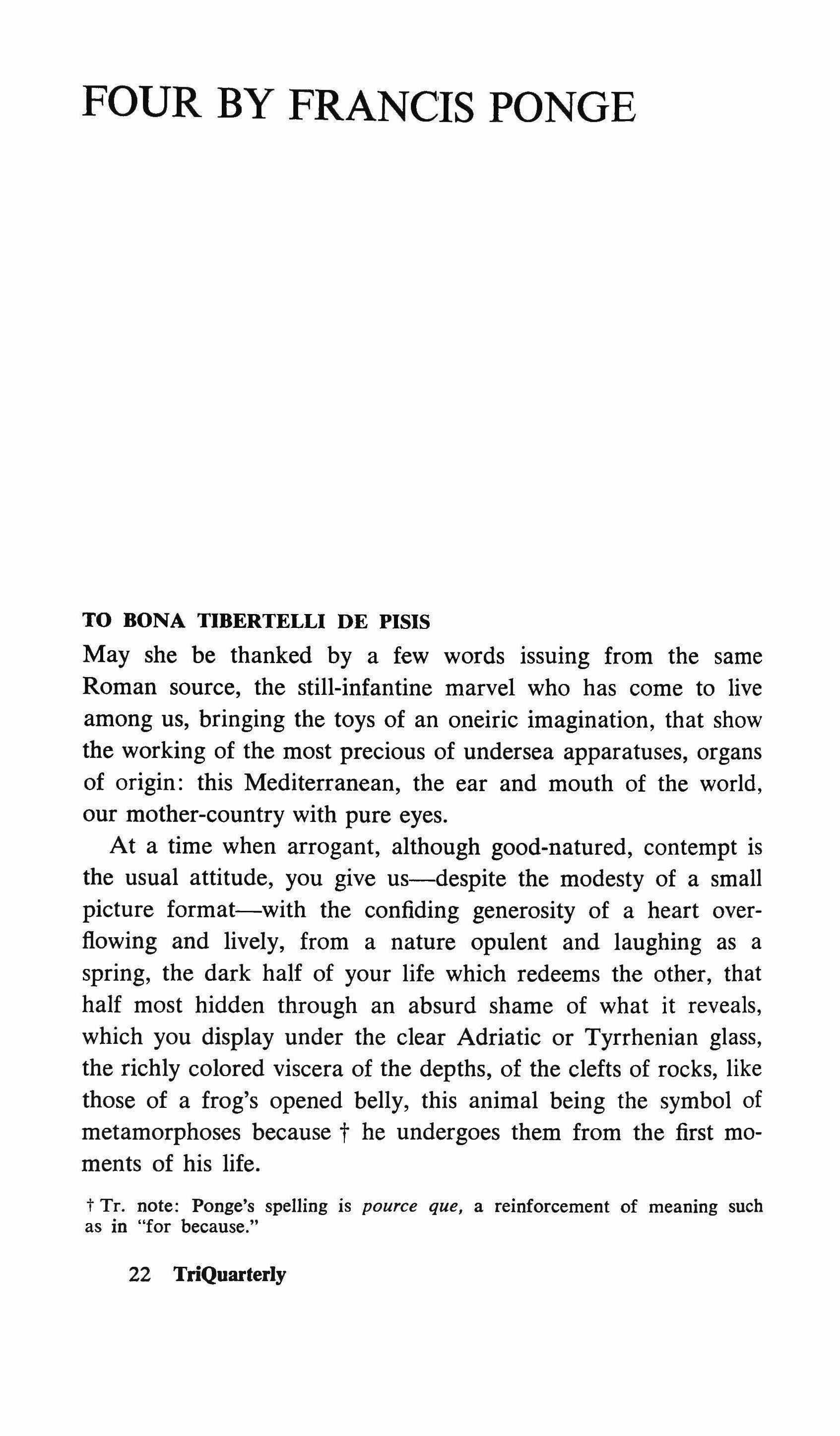
May she be thanked by a few words issuing from the same Roman source, the still-infantine marvel who has come to live among us, bringing the toys of an oneiric imagination, that show the working of the most precious of undersea apparatuses, organs of origin: this Mediterranean, the ear and mouth of the world, our mother-country with pure eyes.
At a time when arrogant, although good-natured, contempt is the usual attitude, you give us-despite the modesty of a small picture format-with the confiding generosity of a heart overflowing and lively, from a nature opulent and laughing as a spring, the dark half of your life which redeems the other, that half most hidden through an absurd shame of what it reveals, which you display under the clear Adriatic or Tyrrhenian glass, the richly colored viscera of the depths, of the clefts of rocks, like those of a frog's opened belly, this animal being the symbol of metamorphoses because t he undergoes them from the first moments of his life.
t Tr. note: Ponge's spelling is pource que, a reinforcement of meaning such as in "for because."
22 TriQuarterIy

Aside from our enchantment in the deep confiding of such a feminine treasure, offered almost as soon as we leave the children's corner of the Claudians and the doges of Venice, with the blood's prodigious, inherited science, freed by vivacity in the dream of a daringly aristocratic nature, we see in it with feeling the unofficial preoccupation of all humanity, amid the heartbreaking degradation of our meridional Europe, under the endless tread of savage fogs to its shores, to the lips of the sacred mouth that utters our values.
Yet we also know, we always find on the beaches of the warm sea interior to our romanity, to fling them at the forehead of the ossianic Goliath-and the skill with a sling of our sororella makes us passionate in this hope-these indestructible concretions, hard as toadstone, polished and incessantly seized in the bosom of the glaucous, calm viscosity.
For us, certainly, young Italian sister wearing the Cavourian tricolor so like our own, for all of us who have given the world several rebirths after so many centuries, it no longer can be a question of old values admired until now: we find on our desolate coasts realities infinitely more ancient, beyond all mythology-yet the pure-eyed bath retains its virtue, and the objects, long fondled, which it casts up: roots, stones, stumps, shells, antique amphorae decorated by sea worms, which once again make a setting authentically primitive where, cuffed by the wind, we walk-are offered to us bright and washed by the same liquid reasoning, actively dreaming. It is the same in us, dissolved yet present in our blood.
Yet, as on the beaches I saw these animal remains, of shellfish that were alive not long ago, in such numbers that I ask myself whether life did not, after all, precede inertia, and far from being born of a setting anterior to it, will have formed it with its rubbish and relics-so in my mind, at its shores, throat and lips, have I found to honor you formulations and words.
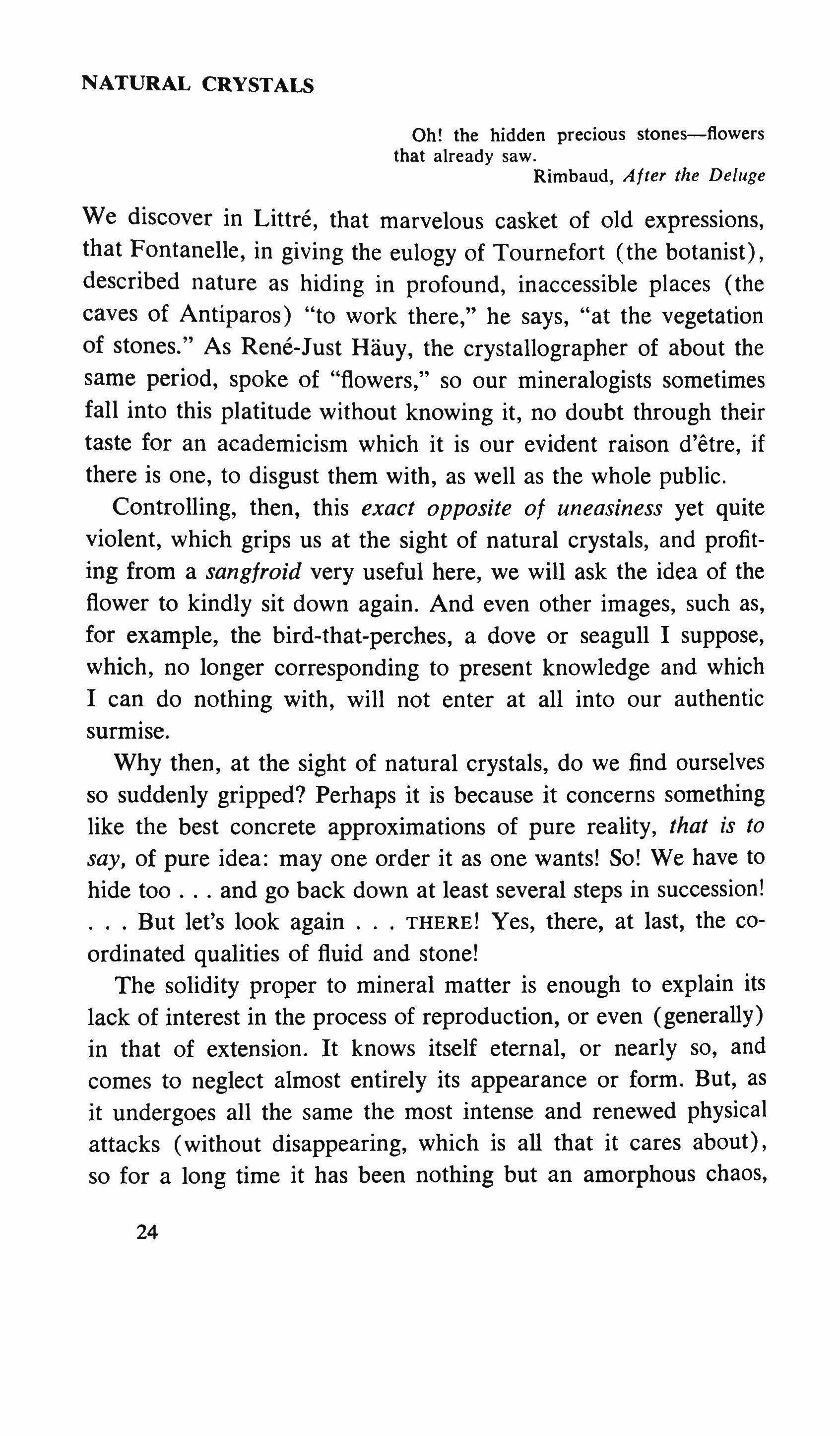
Oh! the hidden precious stones-flowers that already saw. Rimbaud, After the Deluge
We discover in Littre, that marvelous casket of old expressions, that Fontanelle, in giving the eulogy of Tournefort (the botanist), described nature as hiding in profound, inaccessible places (the caves of Antiparos) "to work there," he says, "at the vegetation of stones." As Rene-Just Hauy, the crystallographer of about the same period, spoke of "flowers," so our mineralogists sometimes fall into this platitude without knowing it, no doubt through their taste for an academicism which it is our evident raison d'etre, if there is one, to disgust them with, as well as the whole public, Controlling, then, this exact opposite 0/ uneasiness yet quite violent, which grips us at the sight of natural crystals, and profiting from a sang/raid very useful here, we will ask the idea of the flower to kindly sit down again. And even other images, such as, for example, the bird-that-perches, a dove or seagull I suppose, which, no longer corresponding to present knowledge and which I can do nothing with, will not enter at all into our authentic surmise.
Why then, at the sight of natural crystals, do we find ourselves so suddenly gripped? Perhaps it is because it concerns something like the best concrete approximations of pure reality, that is to say, of pure idea: may one order it as one wants! So! We have to hide too and go back down at least several steps in succession! But let's look again THERE ! Yes, there, at last, the coordinated qualities of fluid and stone!
The solidity proper to mineral matter is enough to explain its lack of interest in the process of reproduction, or even (generally) in that of extension. It knows itself eternal, or nearly so, and comes to neglect almost entirely its appearance or form. But, as it undergoes all the same the most intense and renewed physical attacks (without disappearing, which is all that it cares about), so for a long time it has been nothing but an amorphous chaos,
if indeed it was ever ordered. It is known besides that the solid state of matter is that in which energy is lowest. Thus the mineral kingdom reigns only as one says that sluggishness or indifference reigns. There is, in stones, a passive, sullen non-resistance towards the rest of the world, on which they seem to turn their backs.
Yet in the midst of this dull chaos-by virtue of its faults or cavities-grow rare exceptions to this rule. That is why, when we see them, we are sure to be gripped! Instead of the eternal clouds the sky at last, momentarily pure, with stars! At last, stones turned towards us, that have opened their eyes, stones that say YES! And such knowing looks, such winks!
Here it concerns homogeneous kinds, whose elements are perfectly defined, growing by juxtaposition of identical atoms bound by identical ties, which give their geometric shape to the stone. So much so that, in the so-called liberty of the faults which their surrounding society offers them, what do they develop, if not their special tendency in its strictest purity? Whence their elan, their limits, their marvelous limits! At once, perfection. No arguments here, but concrete EVIDENCES and, by these evidences (LIMITED), what powers! Clear of any cloud, of any shadow, the least light is immediately trapped in them, and cannot leave: and then, it clenches its fists, fidgets, scintillates, tries to flee, appears almost simultaneously at all the windows, like the mad host of a house set on fire (by himself)
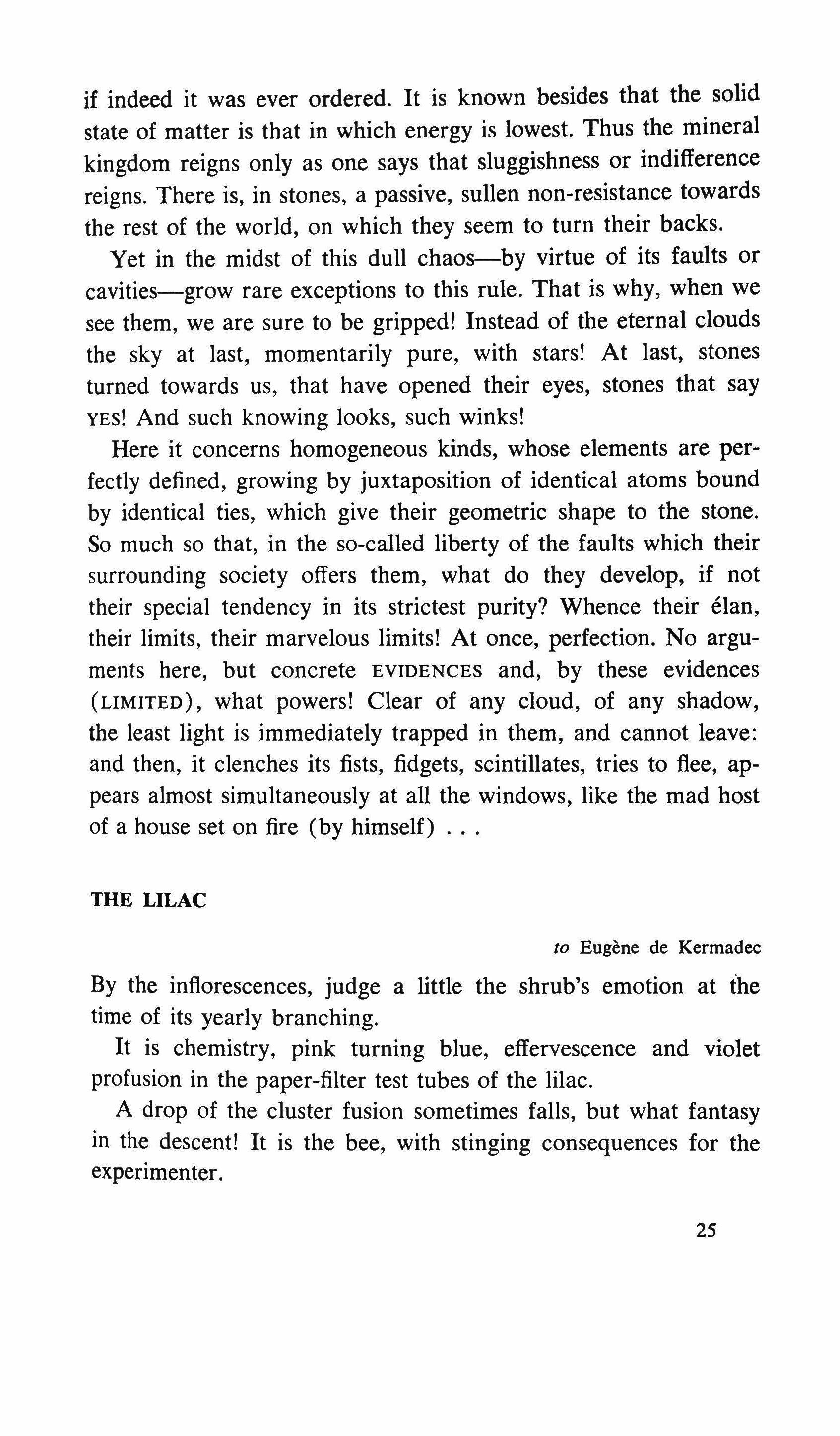
By the inflorescences, judge a little the shrub's emotion at the time of its yearly branching.
It is chemistry, pink turning blue, effervescence and violet profusion in the paper-filter test tubes of the lilac.
A drop of the cluster fusion sometimes falls, but what fantasy in the descent! It is the bee, with stinging consequences for the experimenter. 25
THE LILAC to Eugene de KermadecYoung people will have to excuse me, who doubtless see it with another eye: spring, for me, over forty, is a congestive phenomenon, of a rather repellent appearance, like the face of an apoplectic, in this sense (at least) purplish, groaning, musician though it is.
The vegetal and floral manifestations and the nightingale's trills that at night replace them: I am glad, rather, to be less expansive! This unveiling of nipples, varicose veins, hemorrhoids disgusts me slightly.
Let us observe it now in the doubled and trebled lilac:
By the obstinacy of a natural cohesion in the swarms of inflorescence, judge a little, see, feel, and read there a little of the agitation, the rich emotion which the shrub feels and provides, and not only to its executioner, at the time of its yearly branching.
It is chemistry, pink turning blue, effiorvescence and violet proconfusion in the paper-filter test tubes, the bouquets formed by a mass of soft nails of cloves, mauve or blue, of the lilac.
Filter, I said So much so that a drop of the cluster fusion sometimes falls, like the point of the exclamation-point: but what fantasy in the descent! It is the bee, with stinging consequences for the experimenter.
May one really hope, henceforth, for something more from it than superficial flowering? t
After which, it may be used only as an adjective, thus: "Lilac: after the flowers the sky's profusion between the leaves of the shrub of this name."
This may be the best way, I imagine, to go from everything before to blue.
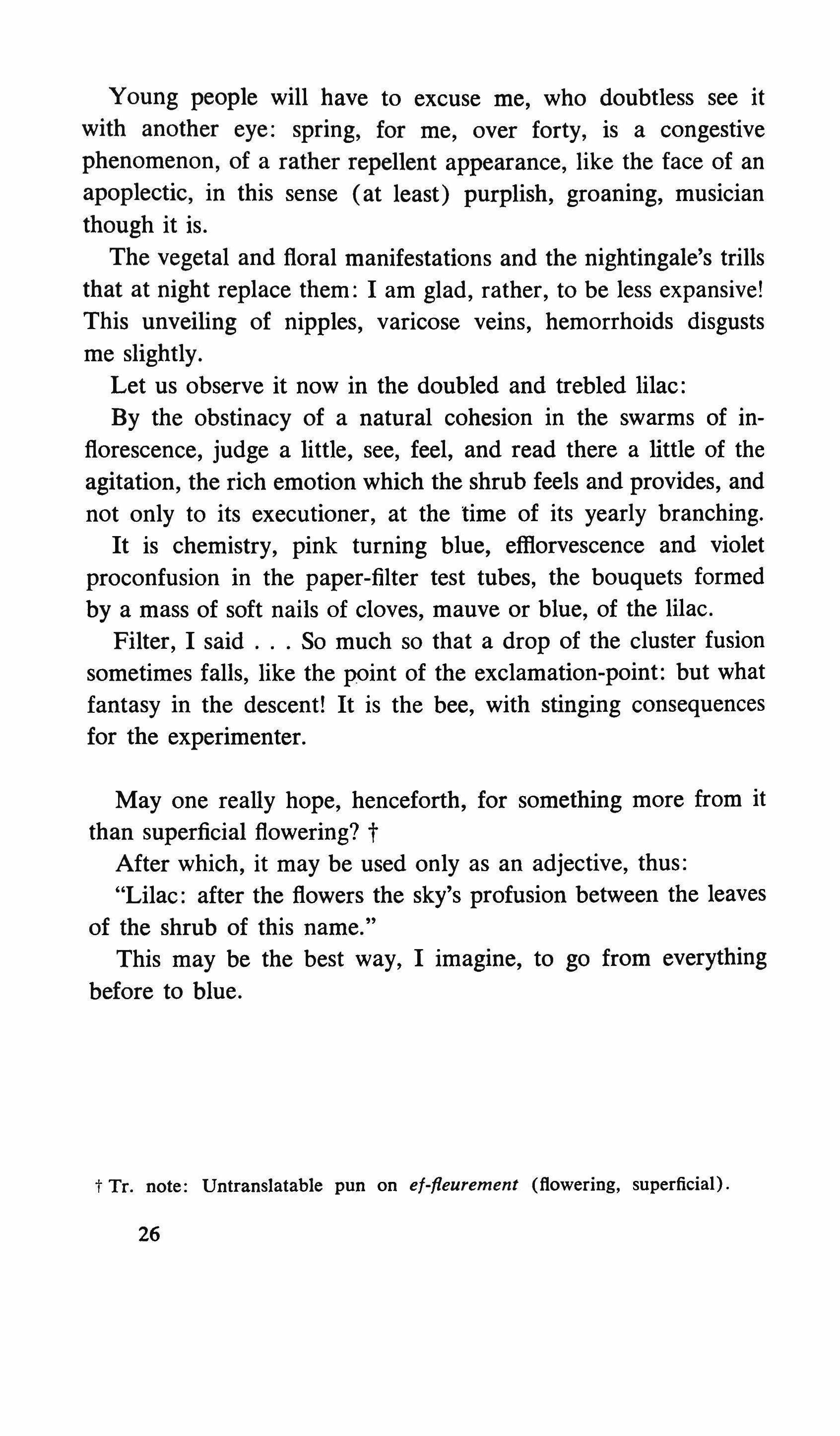
t Tr. note: Untranslatable pun on ej-fieurement (flowering, superficial).
To consecrate it here, let's not overly nacre this everyday object. No prosodic ellipsis, however brilliant, for stating rather flatly the humble interposition of porcelain between pure mind and appetite.
Not without some humor, alas (the animal inside stays there better! ), the name of its beautiful matter was taken from a shell. We, a footloose species, should not stay there. It has been named porcelain, from the Latin-by analogy-porcelana, the vulva of a sow Is this enough for appetite?
Yet all beauty which, urgently born of the waves' instability, rides on a shell Isn't this too much for pure mind?
Be that as it may, the plate was born in this way of the sea: multiplied at once, besides, by the benevolent juggler who sometimes replaces the gloomy old man in the wings who gives us barely one sun a day.
That is why you see it here in several different kinds, still ringing like ricochets immobilized on the sacred linen of the tablecloth.
This is all that one can say of an object that gives more food the more it doesn't food for thought.
translated by Lane Dunlop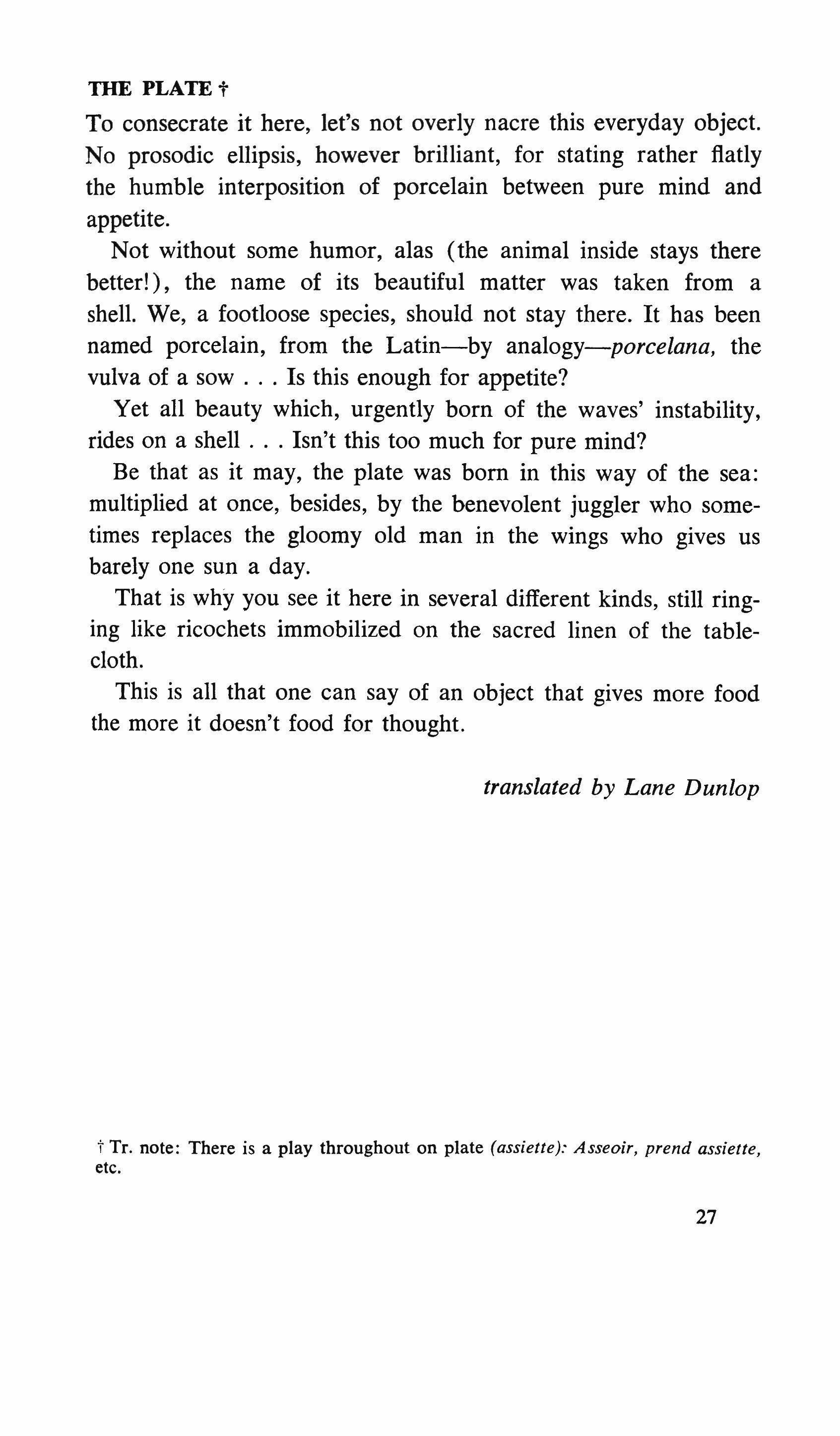
t Tr. note: There is a play throughout on plate (assiette): Asseoir, prend assiette, etc.

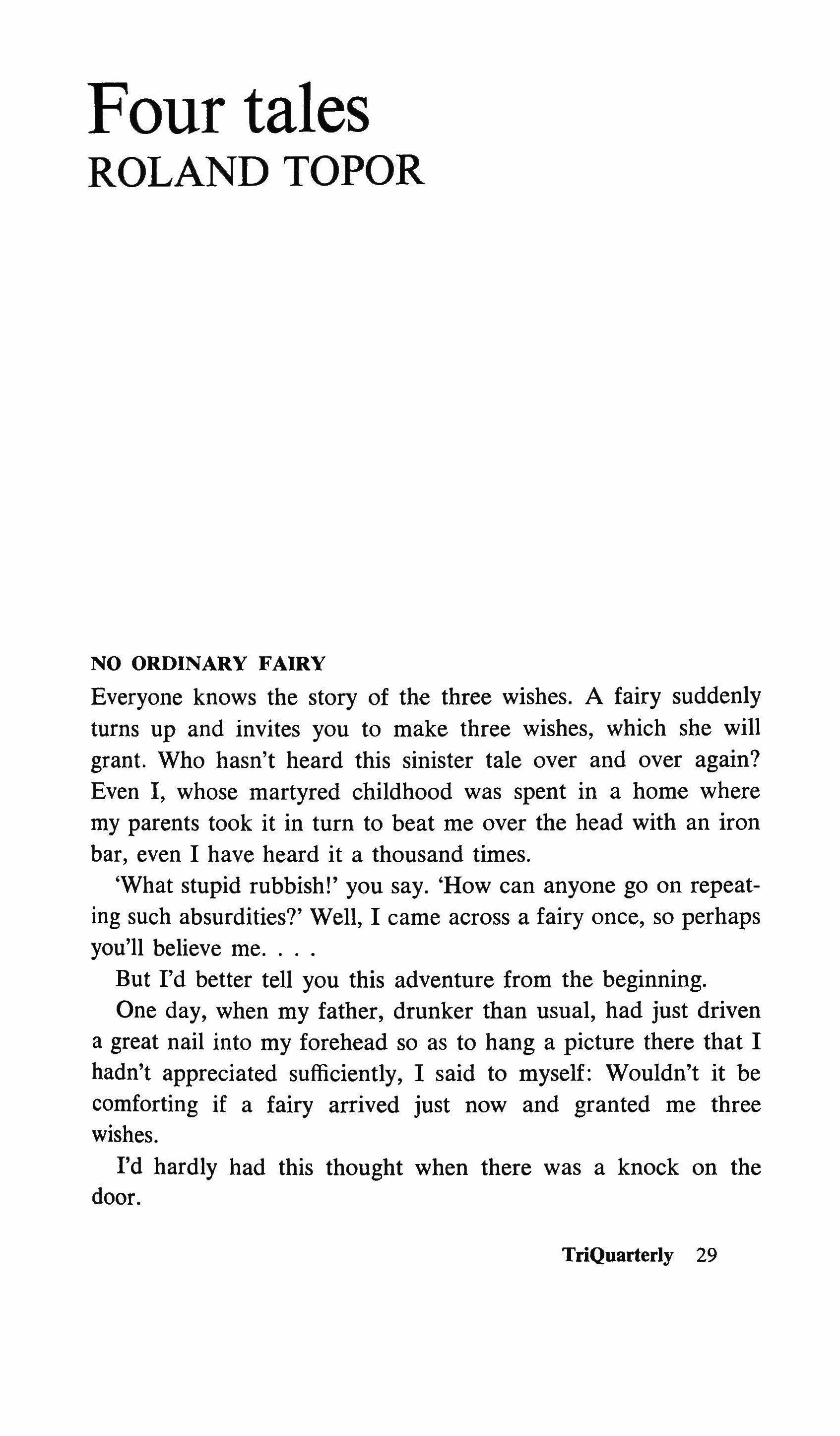
Everyone knows the story of the three wishes. A fairy suddenly turns up and invites you to make three wishes, which she will grant. Who hasn't heard this sinister tale over and over again? Even I, whose martyred childhood was spent in a home where my parents took it in turn to beat me over the head with an iron bar, even I have heard it a thousand times. 'What stupid rubbish!' you say. 'How can anyone go on repeating such absurdities?' Well, I came across a fairy once, so perhaps you'll believe me.
But I'd better tell you this adventure from the beginning.
One day, when my father, drunker than usual, had just driven a great nail into my forehead so as to hang a picture there that I hadn't appreciated sufficiently, I said to myself: Wouldn't it be comforting if a fairy arrived just now and granted me three wishes.
I'd hardly had this thought when there was a knock on the door.
TrlQuarterly 29
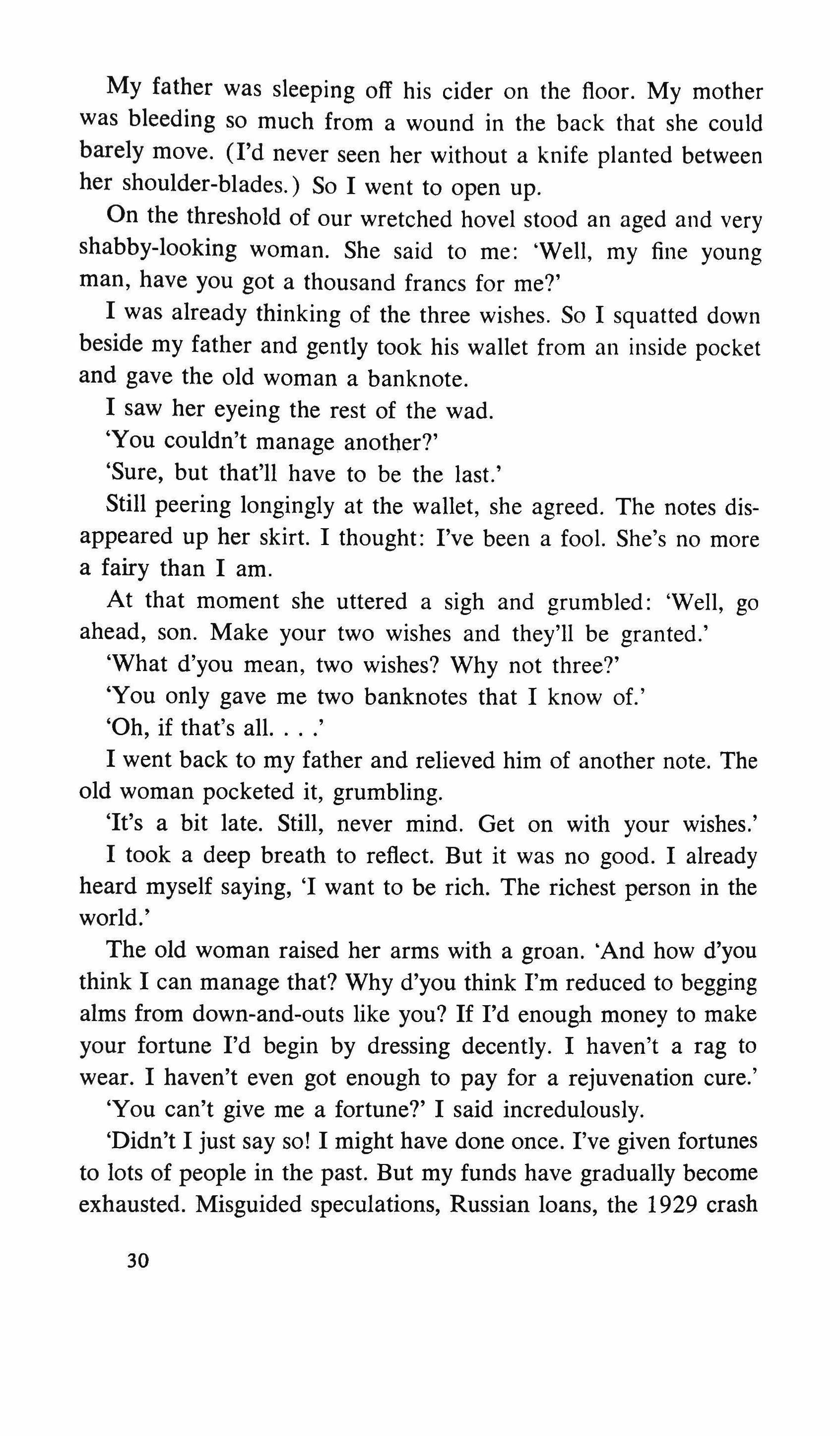
My father was sleeping off his cider on the floor. My mother was bleeding so much from a wound in the back that she could barely move. (I'd never seen her without a knife planted between her shoulder-blades.) So 1 went to open up.
On the threshold of our wretched hovel stood an aged and very shabby-looking woman. She said to me: 'Well, my fine young man, have you got a thousand francs for me?'
1 was already thinking of the three wishes. So 1 squatted down beside my father and gently took his wallet from an inside pocket and gave the old woman a banknote.
1 saw her eyeing the rest of the wad.
'You couldn't manage another?'
'Sure, but that'll have to be the last.'
Still peering longingly at the wallet, she agreed. The notes disappeared up her skirt. 1 thought: I've been a fool. She's no more a fairy than 1 am.
At that moment she uttered a sigh and grumbled: 'Well, go ahead, son. Make your two wishes and they'll be granted.'
'What d'you mean, two wishes? Why not three?'
'You only gave me two banknotes that 1 know of.'
'Oh, if that's all .'
1 went back to my father and relieved him of another note. The old woman pocketed it, grumbling.
'It's a bit late. Still, never mind. Get on with your wishes.'
1 took a deep breath to reflect. But it was no good. 1 already heard myself saying, 'I want to be rich. The richest person in the world.'
The old woman raised her arms with a groan. 'And how d'you think 1 can manage that? Why d'you think I'm reduced to begging alms from down-and-outs like you? If I'd enough money to make your fortune I'd begin by dressing decently. 1 haven't a rag to wear. 1 haven't even got enough to pay for a rejuvenation cure.'
'You can't give me a fortune?' 1 said incredulously.
'Didn't 1 just say so! 1 might have done once. I've given fortunes to lots of people in the past. But my funds have gradually become exhausted. Misguided speculations, Russian loans, the 1929 crash

now 1 haven't a sou. I'm ruined. It wasn't easy to get used to; one has one's pride. But 1 take care of myself, even if 1 am poor.'
'I see
1 thought for a bit. 'All right,' 1 said after an embarrassed silence, 'I want love.'
Her face lit up. 'That! That's easy enough.' She gave a wicked grin and began to undress.
'Hey! You must be mad. 1 asked you for love!'
'I understood you all right. That'll cost you another three thousand francs.'
'What!'
'Look here,' she said irritably, 'you don't think I'm going to give myself to a shit like you for nothing? 1 should've thought three thousand was reasonable.'
'O.K., forget it. No love.'
By now she was hopping mad. 'You said it, you said it, you can't go back on it now. You'll have to get on with it, little one, whether you like it or not.'
1 relieved my father of three more notes.
When it was all over she asked: 'Well, what's your third wish?'
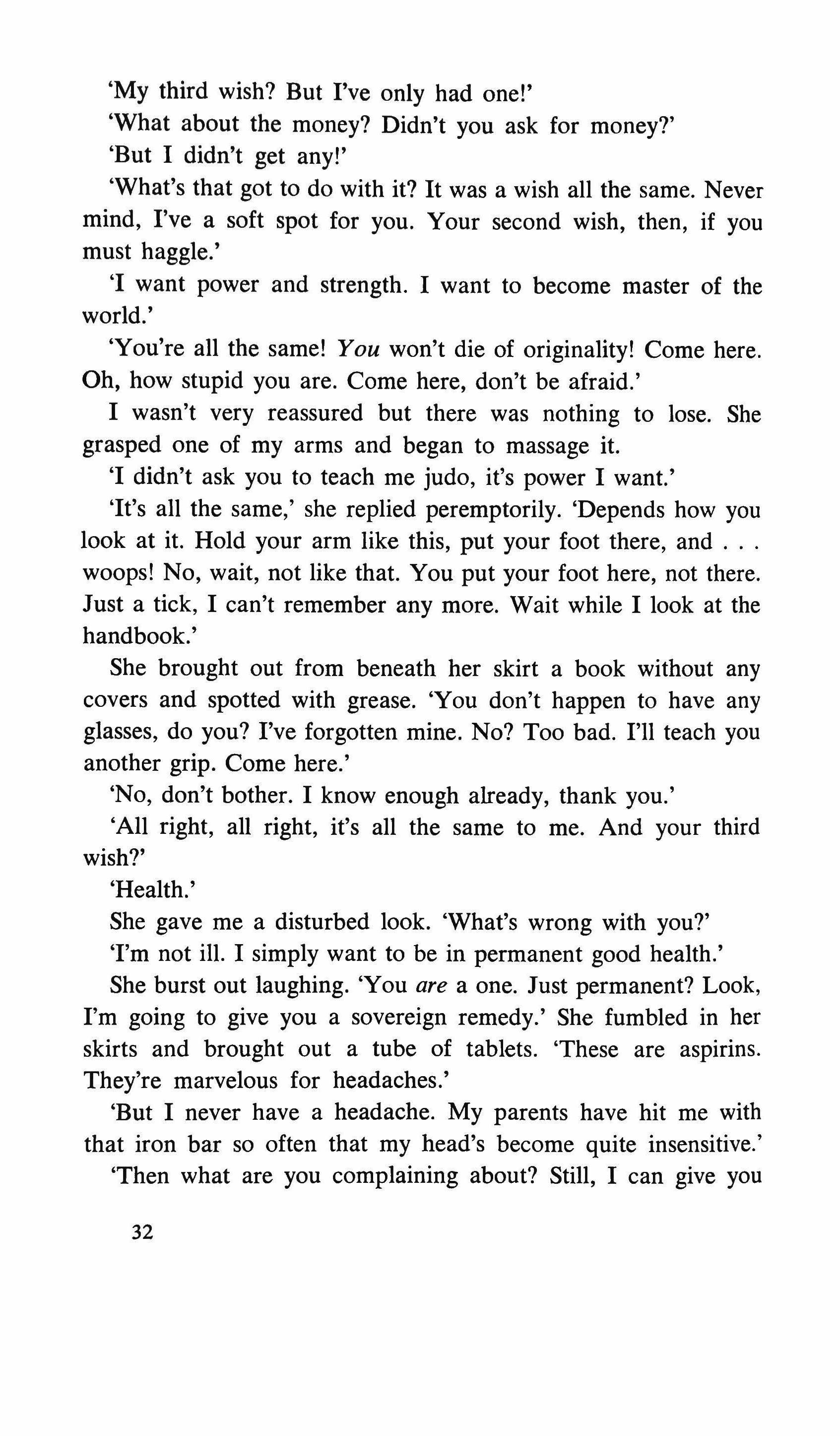
'My third wish? But I've only had one!'
'What about the money? Didn't you ask for money?'
'But 1 didn't get any!'
'What's that got to do with it? It was a wish all the same. Never mind, I've a soft spot for you. Your second wish, then, if you must haggle.'
'1 want power and strength. 1 want to become master of the world.'
'You're all the same! You won't die of originality! Come here. Oh, how stupid you are. Come here, don't be afraid.'
1 wasn't very reassured but there was nothing to lose. She grasped one of my arms and began to massage it.
'1 didn't ask you to teach me judo, it's power 1 want.'
'It's all the same,' she replied peremptorily. 'Depends how you look at it. Hold your arm like this, put your foot there, and woops! No, wait, not like that. You put your foot here, not there. Just a tick, 1 can't remember any more. Wait while 1 look at the handbook.'
She brought out from beneath her skirt a book without any covers and spotted with grease. 'You don't happen to have any glasses, do you? I've forgotten mine. No? Too bad. I'll teach you another grip. Come here.'
'No, don't bother. 1 know enough already, thank you.'
'All right, all right, it's all the same to me. And your third wish?'
'Health.'
She gave me a disturbed look. 'What's wrong with you?'
'I'm not ill. 1 simply want to be in permanent good health.'
She burst out laughing. 'You are a one. Just permanent? Look, I'm going to give you a sovereign remedy.' She fumbled in her skirts and brought out a tube of tablets. 'These are aspirins. They're marvelous for headaches.'
'But 1 never have a headache. My parents have hit me with that iron bar so often that my head's become quite insensitive.'
'Then what are you complaining about? Still, 1 can give you
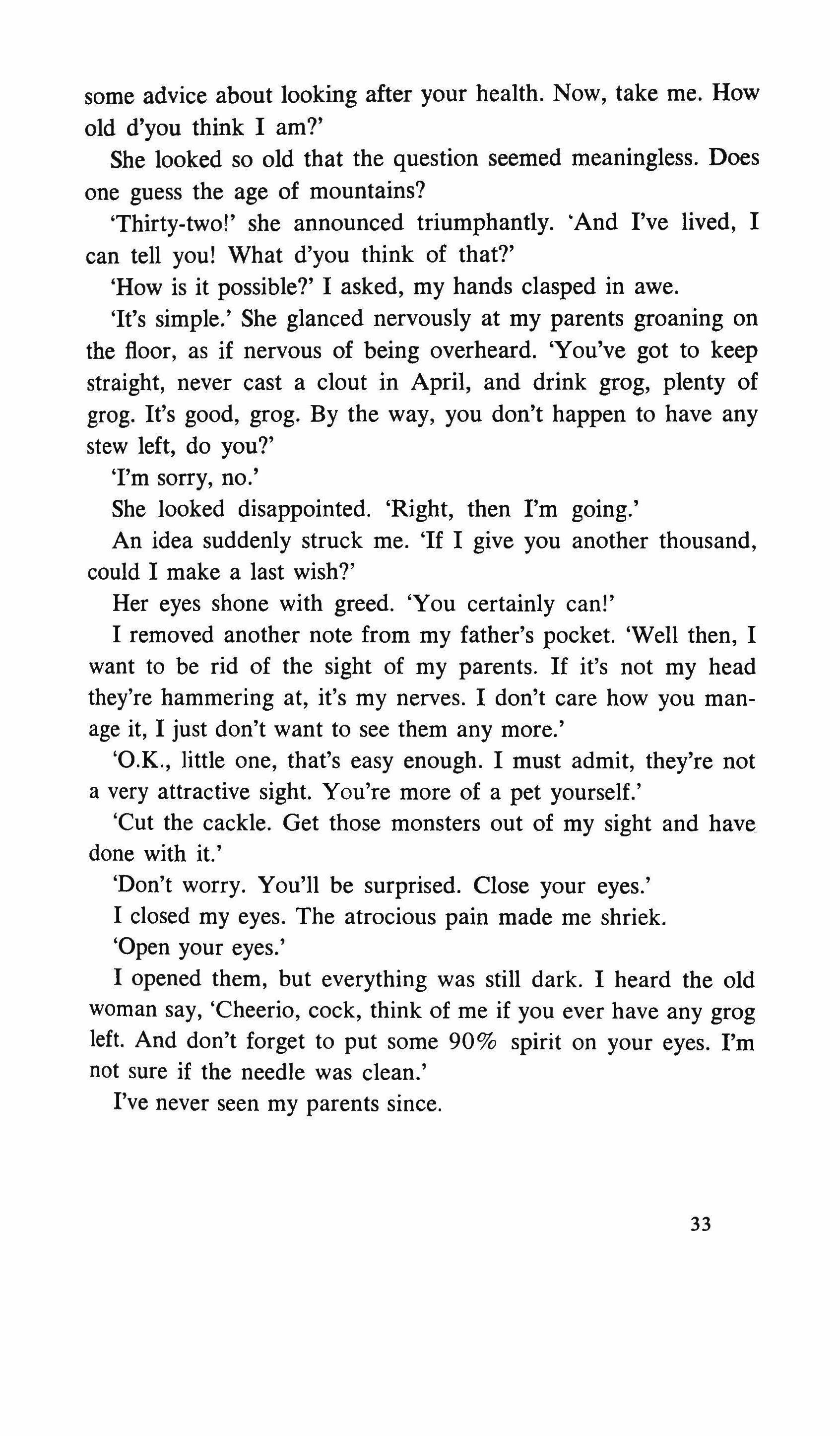
some advice about looking after your health. Now, take me. How old d'you think I am?'
She looked so old that the question seemed meaningless. Does one guess the age of mountains?
'Thirty-two!' she announced triumphantly. 'And I've lived, I can tell you! What d'you think of that?'
'How is it possible?' I asked, my hands clasped in awe.
'It's simple.' She glanced nervously at my parents groaning on the floor, as if nervous of being overheard. 'You've got to keep straight, never cast a clout in April, and drink grog, plenty of grog. It's good, grog. By the way, you don't happen to have any stew left, do you?'
'I'm sorry, no.'
She looked disappointed. 'Right, then I'm going.'
An idea suddenly struck me. 'If I give you another thousand, could I make a last wish?'
Her eyes shone with greed. 'You certainly can!'
I removed another note from my father's pocket. 'Well then, I want to be rid of the sight of my parents. If it's not my head they're hammering at, it's my nerves. I don't care how you manage it, I just don't want to see them any more.'
'O.K., little one, that's easy enough. I must admit, they're not a very attractive sight. You're more of a pet yourself.'
'Cut the cackle. Get those monsters out of my sight and have done with it.'
'Don't worry. You'll be surprised. Close your eyes.'
I closed my eyes. The atrocious pain made me shriek.
'Open your eyes.'
I opened them, but everything was still dark. I heard the old woman say, 'Cheerio, cock, think of me if you ever have any grog left. And don't forget to put some 90% spirit on your eyes. I'm not sure if the needle was clean.'
I've never seen my parents since. 33
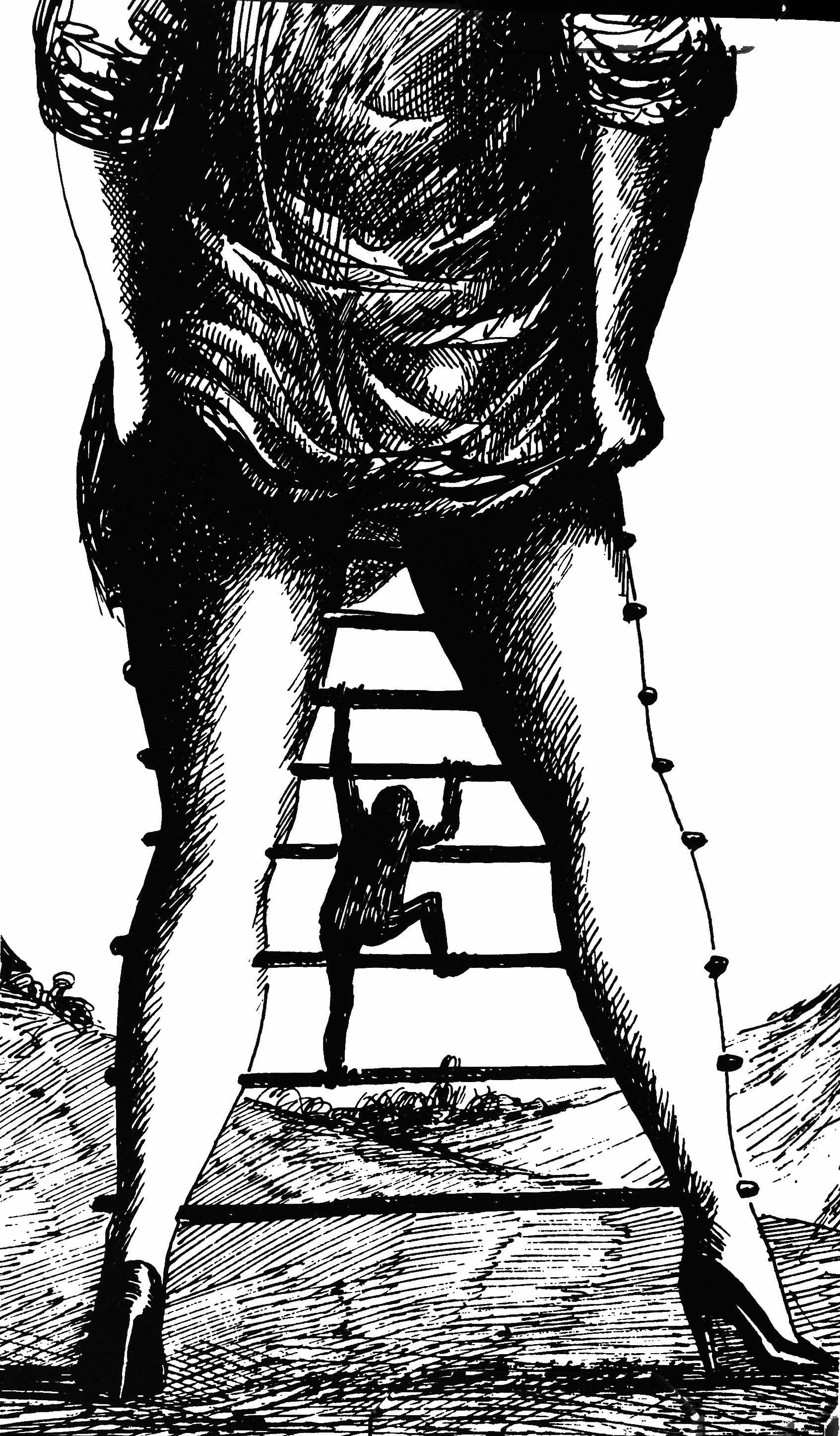
Once upon a time there was a little boy. When people asked him what he would like to do when he grew up, he always answered, 'When I'm big, I'll have the Queen.'
It is easy to imagine people's consternation when faced with this idee fixe which was rendered even more absurd by the shortage of queens. For hours on end father and mother would attempt to reason with their child, but he was as obstinate as a mule and remained deaf both to advice and threats.
And Gaspard, as the obsessed boy was called, grew up unaware of his parents' anxiety, lulled by his folly. He went to primary school, then on to secondary school. He was an average pupil who found learning easy and made the least possible effort. One day the psychologist attached to the school asked the parents to come and see him.
After coughing several times and uttering painful 'Er's' he began. 'You are aware of course that it is my job to put young people through professional aptitude tests. Now, and this is the point of our discussion, Gaspard happens to be a most unusual case. The fact is that the boy has no aptitude for anything. .'
'But he's a good scholar,' the mother protested. 'He .'
The psychologist motioned her to be silent. 'Let me finish. He has no aptitude for anything except .'
'Except for laying the Queen. I know this may sound silly but it's a fact. I think the best thing is not to oppose his vocation. Maybe he'll give it up of his own accord?'
The father shook his head skeptically. 'Oh no, sir, he won't give it up. Even when he was very little he wouldn't talk of anything else.'
'In that case .'
Gaspard's parents went sadly back home.
Gaspard became a strong young man, not too handsome and not too tall, but pleasant and energetic. He passed his exams moderately well and then announced his intention of traveling round the world.

35
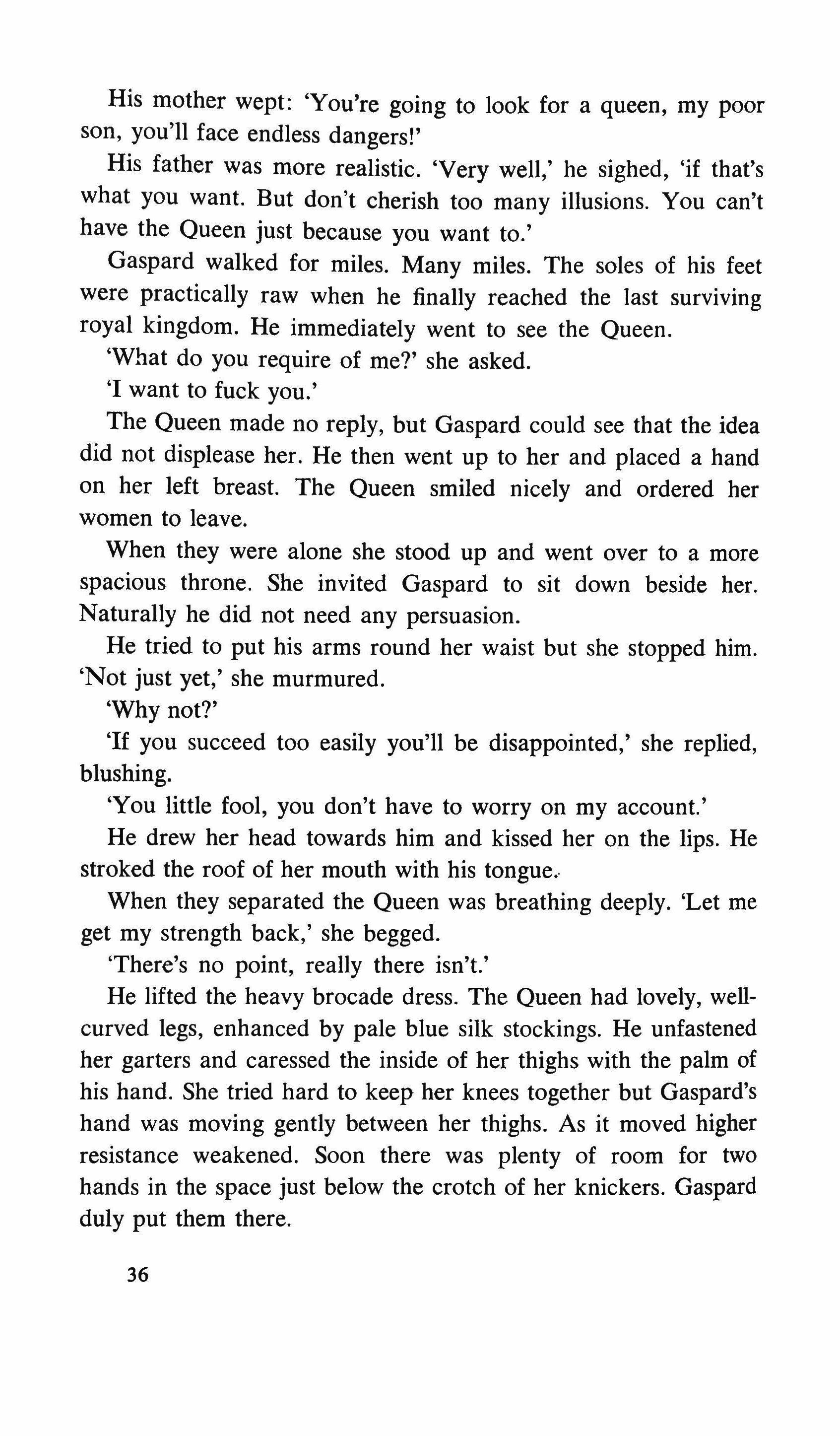
His mother wept: 'You're going to look for a queen, my poor son, you'll face endless dangers!'
His father was more realistic. 'Very well,' he sighed, 'if that's what you want. But don't cherish too many illusions. You can't have the Queen just because you want to.'
Gaspard walked for miles. Many miles. The soles of his feet were practically raw when he finally reached the last surviving royal kingdom. He immediately went to see the Queen.
'What do you require of me?' she asked.
'I want to fuck you.'
The Queen made no reply, but Gaspard could see that the idea did not displease her. He then went up to her and placed a hand on her left breast. The Queen smiled nicely and ordered her women to leave.
When they were alone she stood up and went over to a more spacious throne. She invited Gaspard to sit down beside her. Naturally he did not need any persuasion.
He tried to put his arms round her waist but she stopped him. 'Not just yet,' she murmured.
'Why not?'
'If you succeed too easily you'll be disappointed,' she replied, blushing.
'You little fool, you don't have to worry on my account.'
He drew her head towards him and kissed her on the lips. He stroked the roof of her mouth with his tongue
When they separated the Queen was breathing deeply. 'Let me get my strength back,' she begged.
'There's no point, really there isn't.'
He lifted the heavy brocade dress. The Queen had lovely, wellcurved legs, enhanced by pale blue silk stockings. He unfastened her garters and caressed the inside of her thighs with the palm of his hand. She tried hard to keep her knees together but Gaspard's hand was moving gently between her thighs. As it moved higher resistance weakened. Soon there was plenty of room for two hands in the space just below the crotch of her knickers. Gaspard duly put them there.

Then the Queen became impatient. She was panting like a spaniel. To make it easier for him to remove her knickers she reared up on the throne, supporting herself against the back.
'Sit on my knee,' suggested Gaspard. He had unfastened his trousers.
The Queen obeyed. Gaspard took hold of her by the waist, lifted her easily and placed her slightly higher. The Queen trembled and showed the whites of her eyes. She shuddered violently when after several unsuccessful attempts she managed to get into the right place.
She said hoarsely, 'Caress my breasts, hard, my scepter .' Then: 'What's your name?'
'Gaspard.'
'And mine is your Majesty. Oh!'
The Queen leant back and began drooling. Gaspard was afraid of dropping her but he succeeded in taking hold of her again.
Later, when she was fastening up her clothes, the Queen asked him hopefully, 'What are we going to do now?'
'Nothing. I'm going back home. I'll come again soon. 1 love you.'
The Queen shook her head bitterly. 'You're all the same. As soon as you've got what you want it's impossible to keep you.'
She sighed. 'Yes, everyone wants to fuck the Queen, but nobody wants to marry her.'
'Rufus, old chap! Delighted to see you!'
Rufus Thorp loosened his shirt-collar, undid his tie and took a deep breath. That clap on the back had winded him. He studied the man's unfamiliar face without emotion. It meant nothing to him.
'Y' our e er
'What? Don't you recognize me? But 1 do understand, it's such a long time Guillaume! Guillaume Silliver!'
'Guillaume Silliver .' repeated Rufus. 'I really don't remember.'
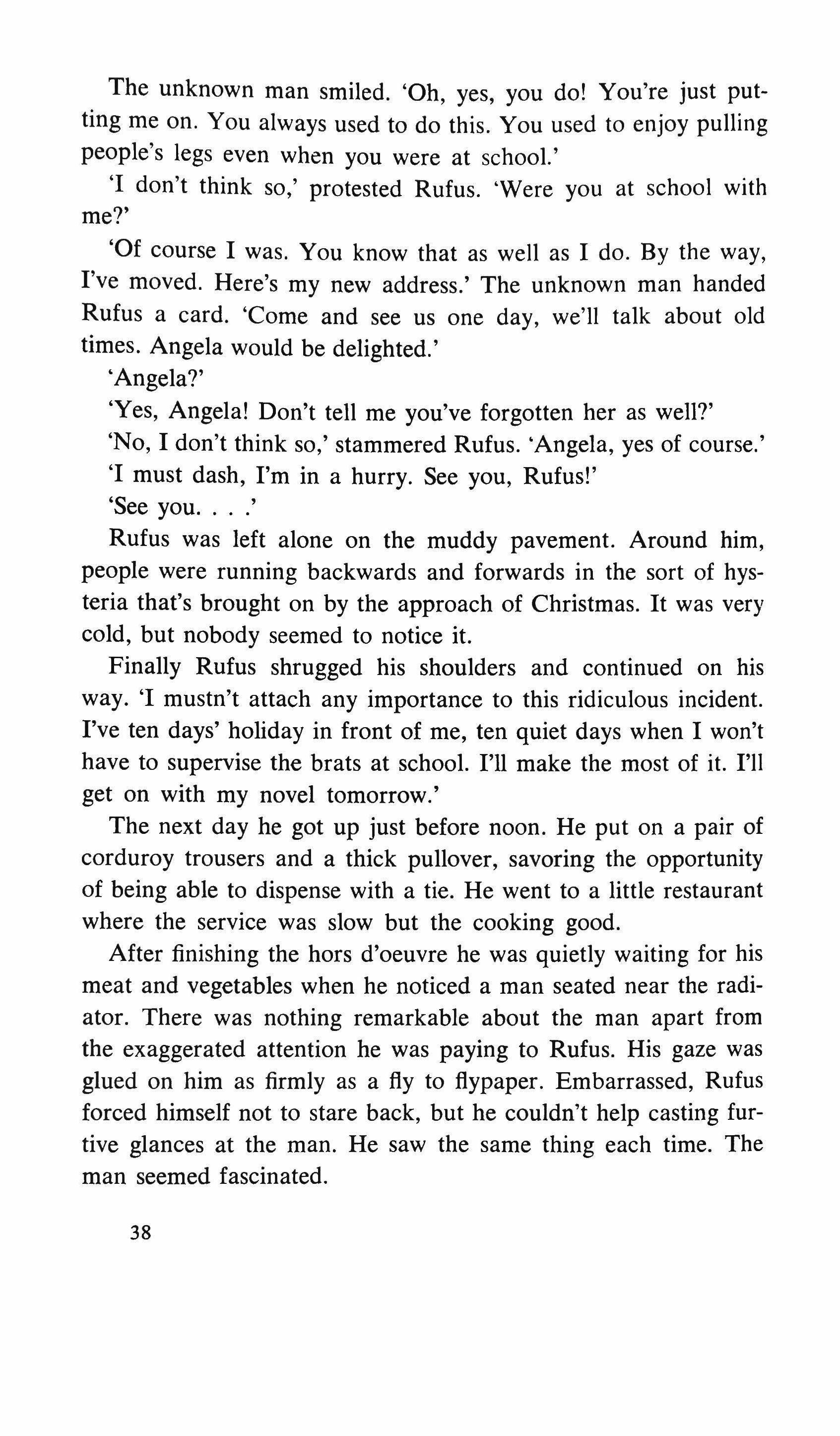
The unknown man smiled. 'Oh, yes, you do! You're just putting me on. You always used to do this. You used to enjoy pulling people's legs even when you were at school.'
'I don't think so,' protested Rufus. 'Were you at school with me?'
'Of course I was. You know that as well as I do. By the way, I've moved. Here's my new address.' The unknown man handed Rufus a card. 'Come and see us one day, we'll talk about old times. Angela would be delighted.'
'Yes, Angela! Don't tell me you've forgotten her as well?'
'No, I don't think so,' stammered Rufus. 'Angela, yes of course.'
'I must dash, I'm in a hurry. See you, Rufus!'
'S ' ee you
Rufus was left alone on the muddy pavement. Around him, people were running backwards and forwards in the sort of hysteria that's brought on by the approach of Christmas. It was very cold, but nobody seemed to notice it.
Finally Rufus shrugged his shoulders and continued on his way. 'I mustn't attach any importance to this ridiculous incident. I've ten days' holiday in front of me, ten quiet days when I won't have to supervise the brats at school. I'll make the most of it. I'll get on with my novel tomorrow.'
The next day he got up just before noon. He put on a pair of corduroy trousers and a thick pullover, savoring the opportunity of being able to dispense with a tie. He went to a little restaurant where the service was slow but the cooking good.
After finishing the hors d'oeuvre he was quietly waiting for his meat and vegetables when he noticed a man seated near the radiator. There was nothing remarkable about the man apart from the exaggerated attention he was paying to Rufus. His gaze was glued on him as firmly as a fly to flypaper. Embarrassed, Rufus forced himself not to stare back, but he couldn't help casting furtive glances at the man. He saw the same thing each time. The man seemed fascinated.

Rufus received the meat course with relief. He concentrated on his plate and lost interest in everything else.
Suddenly a hand stopped his arm just as his mouth was opening to remove a piece of meat from his fork. He sat there stupidly with his mouth open, his eyes fixed on the inaccessible food. He swallowed his now useless saliva and put down his fork. The man was standing in front of him. 'Excuse me, sir, aren't you Rufus Thorp?'
Rufus nodded.
'I'm Saul Grimbach!'
Rufus didn't actually say 'So what?' but the expression on his face showed what he felt.
'Saul Grimbach,' repeated the other in a vibrant voice, 'Saul Grimbach!'
'Do 1 know you?'
'Do you know me? Embrace me, Rufus, 1 never thought I'd see you again. When you risked your life to save mine, when 1 saw you leaving in a lorry
'I? 1 saved your life? 1 left in a lorry? When?'
'During the war. Oh!'
Still staring, the man who claimed to be Saul Grimbach collapsed onto a chair beside Rufus. 'I know! You've lost your memory! You must have been through hell! It's horrible! But you didn't talk, did you? You didn't tell them anything?'
The other guests in the restaurant had stopped eating. They realized that they were witnessing a most unusual scene. They were carefully registering all the details so that they could regale their friends with them later.
Rufus didn't reply. He left the rest of his meal, paid the waitress at the counter and fled. Just as he was going through the door, Saul Grimbach hurled a telephone number at him.
'Forget it!' Rufus shouted at him nastily. 'I don't know how much you're being paid for this play-acting, but you've certainly earned your money!' He banged the door and vowed he would never set foot in that place again. 39
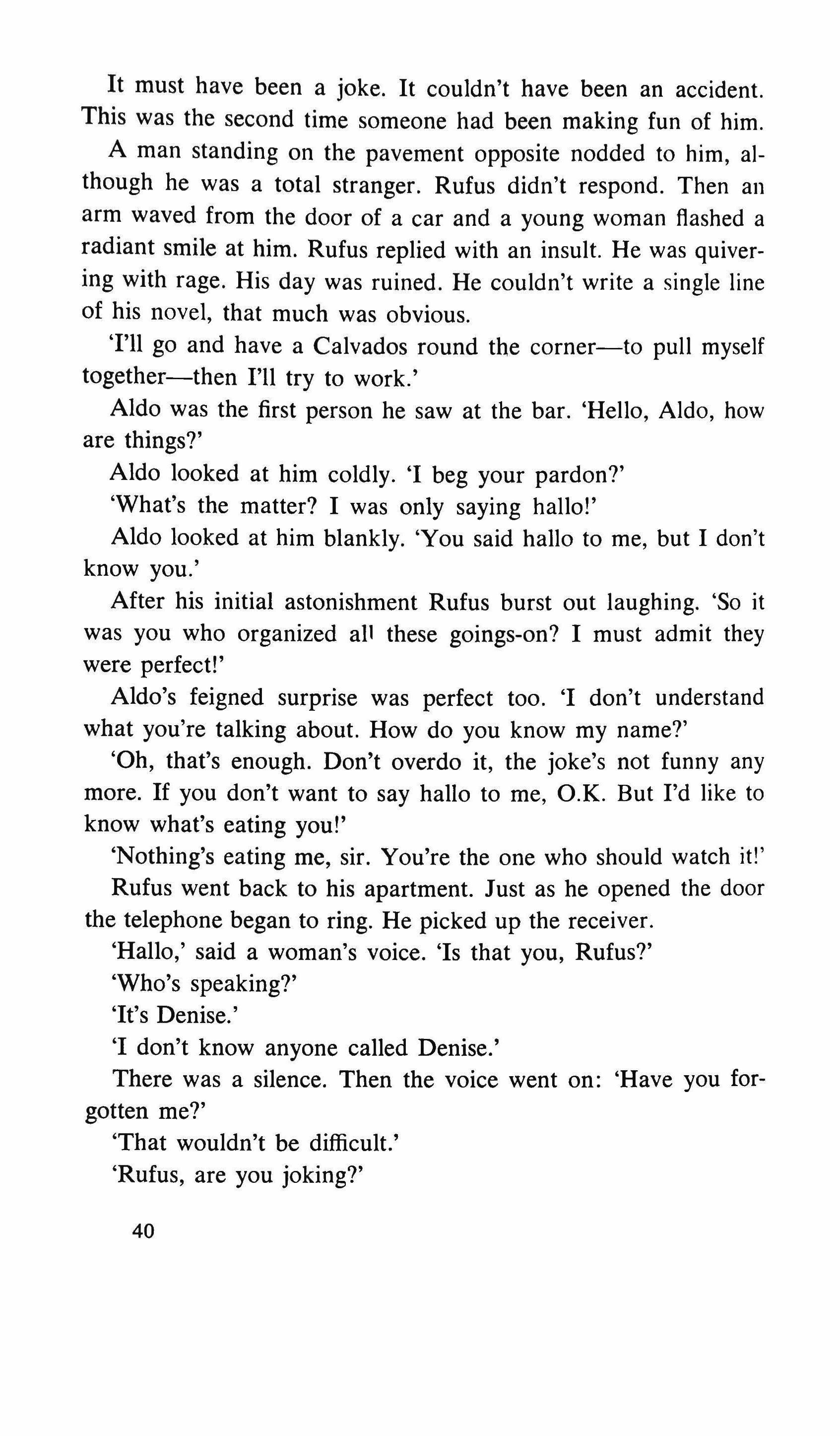
It must have been a joke. It couldn't have been an accident. This was the second time someone had been making fun of him. A man standing on the pavement opposite nodded to him, although he was a total stranger. Rufus didn't respond. Then an arm waved from the door of a car and a young woman flashed a radiant smile at him. Rufus replied with an insult. He was quivering with rage. His day was ruined. He couldn't write a single line of his novel, that much was obvious.
'I'll go and have a Calvados round the corner-to pull myself together-then I'll try to work.'
Aldo was the first person he saw at the bar. 'Hello, Aldo, how are things?'
Aldo looked at him coldly. '1 beg your pardon?'
'What's the matter? I was only saying hallo!'
Aldo looked at him blankly. 'You said hallo to me, but 1 don't know you.'
After his initial astonishment Rufus burst out laughing. 'So it was you who organized all these goings-on? I must admit they were perfect!'
Aldo's feigned surprise was perfect too. 'I don't understand what you're talking about. How do you know my name?'
'Oh, that's enough. Don't overdo it, the joke's not funny any more. If you don't want to say hallo to me, O.K. But I'd like to know what's eating you!'
'Nothing's eating me, sir. You're the one who should watch it!'
Rufus went back to his apartment. Just as he opened the door the telephone began to ring. He picked up the receiver.
'Hallo,' said a woman's voice. 'Is that you, Rufus?'
'Who's speaking?'
'It's Denise.'
'I don't know anyone called Denise.'
There was a silence. Then the voice went on: 'Have you forgotten me?'
'That wouldn't be difficult.'
'Rufus, are you joking?'
40
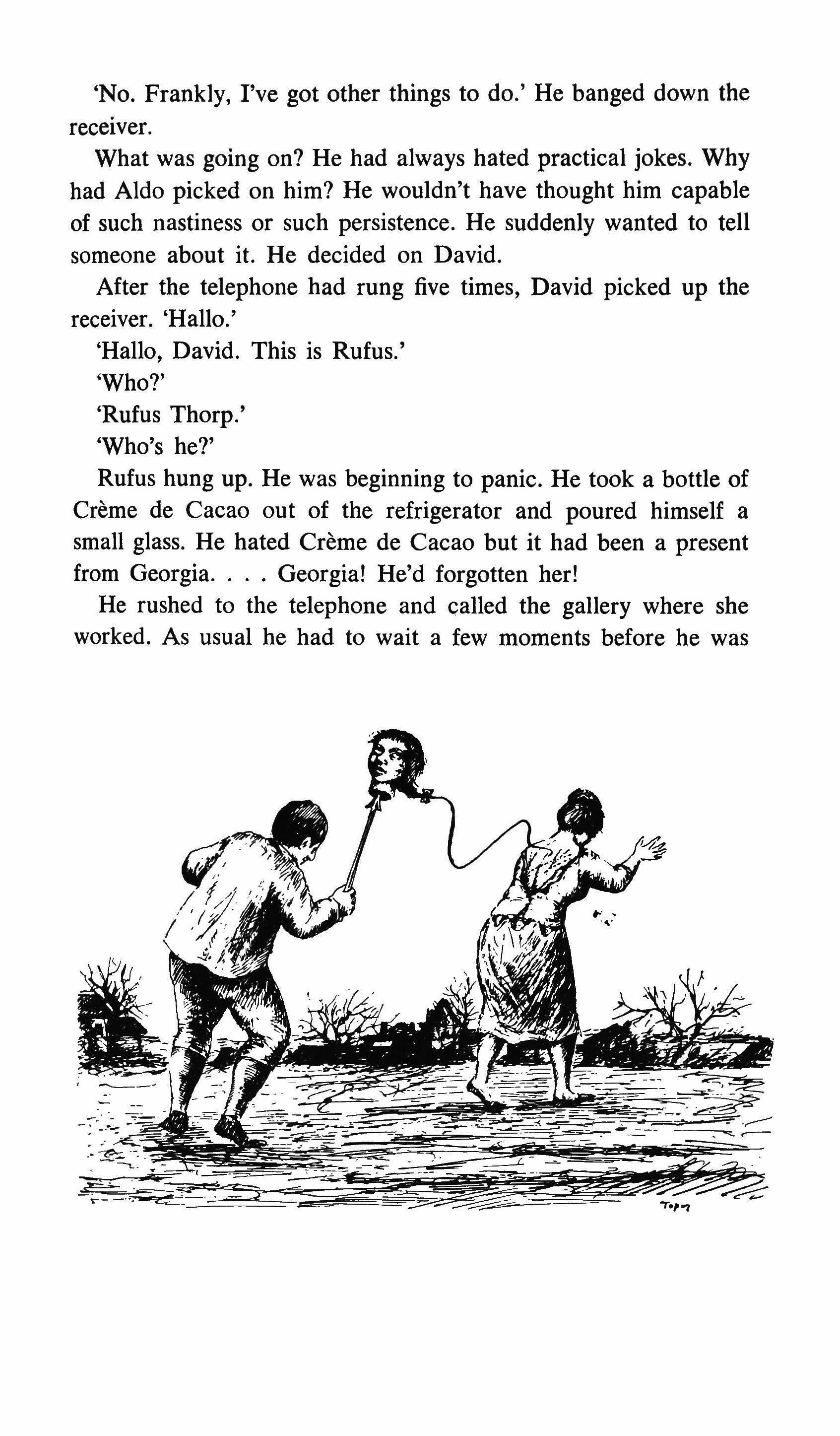
'No. Frankly, I've got other things to do.' He banged down the receiver.
What was going on? He had always hated practical jokes. Why had Aldo picked on him? He wouldn't have thought him capable of such nastiness or such persistence. He suddenly wanted to tell someone about it. He decided on David.
After the telephone had rung five times, David picked up the receiver. 'Hallo.'
'Hallo, David. This is Rufus.'
'Who?'
'Rufus Thorp.'
'Who's he?'
Rufus hung up. He was beginning to panic. He took a bottle of Creme de Cacao out of the refrigerator and poured himself a small glass. He hated Creme de Cacao but it had been a present from Georgia Georgia! He'd forgotten her!
He rushed to the telephone and called the gallery where she worked. As usual he had to wait a few moments before he was
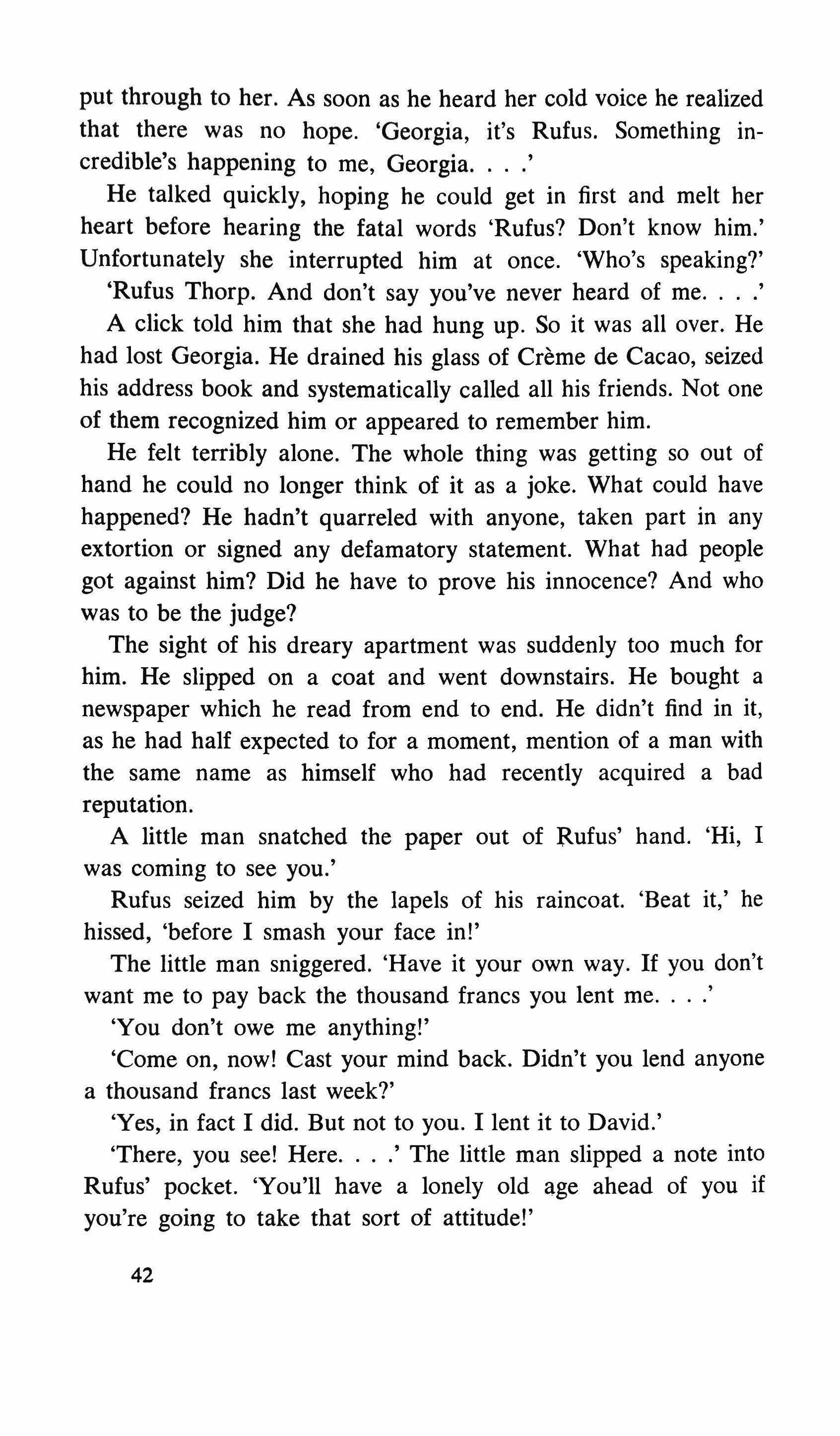
put through to her. As soon as he heard her cold voice he realized that there was no hope. 'Georgia, it's Rufus. Something incredible's happening to me, Georgia. .'
He talked quickly, hoping he could get in first and melt her heart before hearing the fatal words 'Rufus? Don't know him.' Unfortunately she interrupted him at once. 'Who's speaking?' 'Rufus Thorp. And don't say you've never heard of me. .'
A click told him that she had hung up. So it was all over. He had lost Georgia. He drained his glass of Creme de Cacao, seized his address book and systematically called all his friends. Not one of them recognized him or appeared to remember him.
He felt terribly alone. The whole thing was getting so out of hand he could no longer think of it as a joke. What could have happened? He hadn't quarreled with anyone, taken part in any extortion or signed any defamatory statement. What had people got against him? Did he have to prove his innocence? And who was to be the judge?
The sight of his dreary apartment was suddenly too much for him. He slipped on a coat and went downstairs. He bought a newspaper which he read from end to end. He didn't find in it, as he had half expected to for a moment, mention of a man with the same name as himself who had recently acquired a bad reputation.
A little man snatched the paper out of Rufus' hand. 'Hi, I was coming to see you.'
Rufus seized him by the lapels of his raincoat. 'Beat it,' he hissed, 'before I smash your face in!'
The little man sniggered. 'Have it your own way. If you don't want me to pay back the thousand francs you lent me. .'
'You don't owe me anything!'
'Come on, now! Cast your mind back. Didn't you lend anyone a thousand francs last week?'
'Yes, in fact I did. But not to you. I lent it to David.'
'There, you see! Here. .' The little man slipped a note into Rufus' pocket. 'You'll have a lonely old age ahead of you if you're going to take that sort of attitude!'
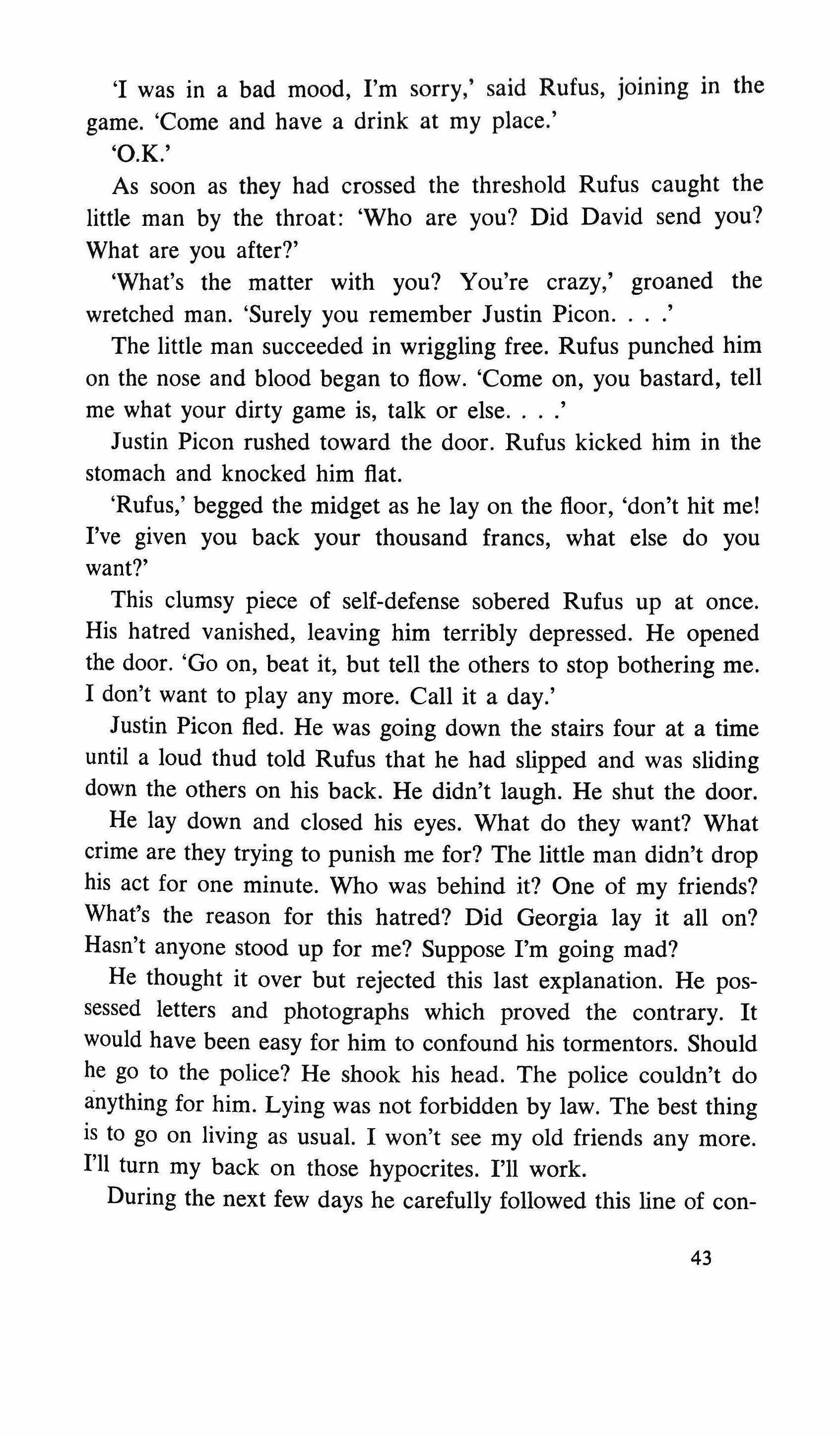
'1 was in a bad mood, I'm sorry,' said Rufus, joining in the game. 'Come and have a drink at my place.' 'O.K.'
As soon as they had crossed the threshold Rufus caught the little man by the throat: 'Who are you? Did David send you? What are you after?'
'What's the matter with you? You're crazy,' groaned the wretched man. 'Surely you remember Justin Picon .'
The little man succeeded in wriggling free. Rufus punched him on the nose and blood began to flow. 'Come on, you bastard, tell me what your dirty game is, talk or else. .'
Justin Picon rushed toward the door. Rufus kicked him in the stomach and knocked him flat.
'Rufus,' begged the midget as he lay on the floor, 'don't hit me! I've given you back your thousand francs, what else do you want?'
This clumsy piece of self-defense sobered Rufus up at once. His hatred vanished, leaving him terribly depressed. He opened the door. 'Go on, beat it, but tell the others to stop bothering me. I don't want to play any more. Call it a day.'
Justin Picon fled. He was going down the stairs four at a time until a loud thud told Rufus that he had slipped and was sliding down the others on his back. He didn't laugh. He shut the door. He lay down and closed his eyes. What do they want? What crime are they trying to punish me for? The little man didn't drop his act for one minute. Who was behind it? One of my friends? What's the reason for this hatred? Did Georgia lay it all on? Hasn't anyone stood up for me? Suppose I'm going mad?
He thought it over but rejected this last explanation. He possessed letters and photographs which proved the contrary. It would have been easy for him to confound his tormentors. Should he go to the police? He shook his head. The police couldn't do anything for him. Lying was not forbidden by law. The best thing is to go on living as usual. 1 won't see my old friends any more. I'll turn my back on those hypocrites. I'll work.
During the next few days he carefully followed this line of con-
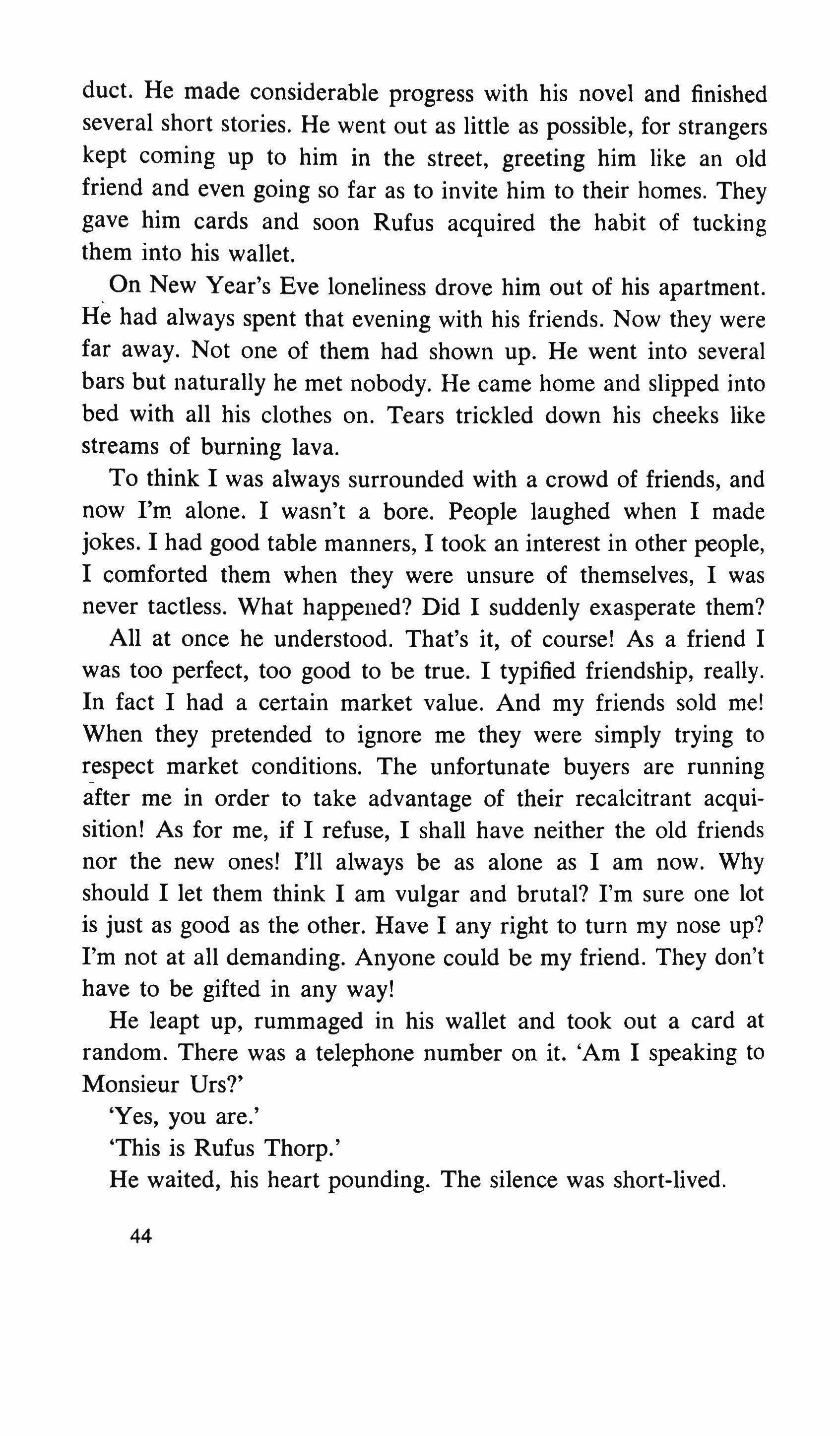
duct. He made considerable progress with his novel and finished several short stories. He went out as little as possible, for strangers kept coming up to him in the street, greeting him like an old friend and even going so far as to invite him to their homes. They gave him cards and soon Rufus acquired the habit of tucking them into his wallet.
On New Year's Eve loneliness drove him out of his apartment. He had always spent that evening with his friends. Now they were far away. Not one of them had shown up. He went into several bars but naturally he met nobody. He came home and slipped into bed with all his clothes on. Tears trickled down his cheeks like streams of burning lava.
To think I was always surrounded with a crowd of friends, and now I'm alone. I wasn't a bore. People laughed when I made jokes. I had good table manners, I took an interest in other people, I comforted them when they were unsure of themselves, I was never tactless. What happened? Did I suddenly exasperate them?
All at once he understood. That's it, of course! As a friend I was too perfect, too good to be true. I typified friendship, really. In fact I had a certain market value. And my friends sold me! When they pretended to ignore me they were simply trying to respect market conditions. The unfortunate buyers are running after me in order to take advantage of their recalcitrant acquisition! As for me, if I refuse, I shall have neither the old friends nor the new ones! I'll always be as alone as I am now. Why should I let them think I am vulgar and brutal? I'm sure one lot is just as good as the other. Have I any right to turn my nose up? I'm not at all demanding. Anyone could be my friend. They don't have to be gifted in any way!
He leapt up, rummaged in his wallet and took out a card at random. There was a telephone number on it. 'Am I speaking to Monsieur Urs?'
'Yes, you are.'
'This is Rufus Thorp.'
He waited, his heart pounding. The silence was short-lived.
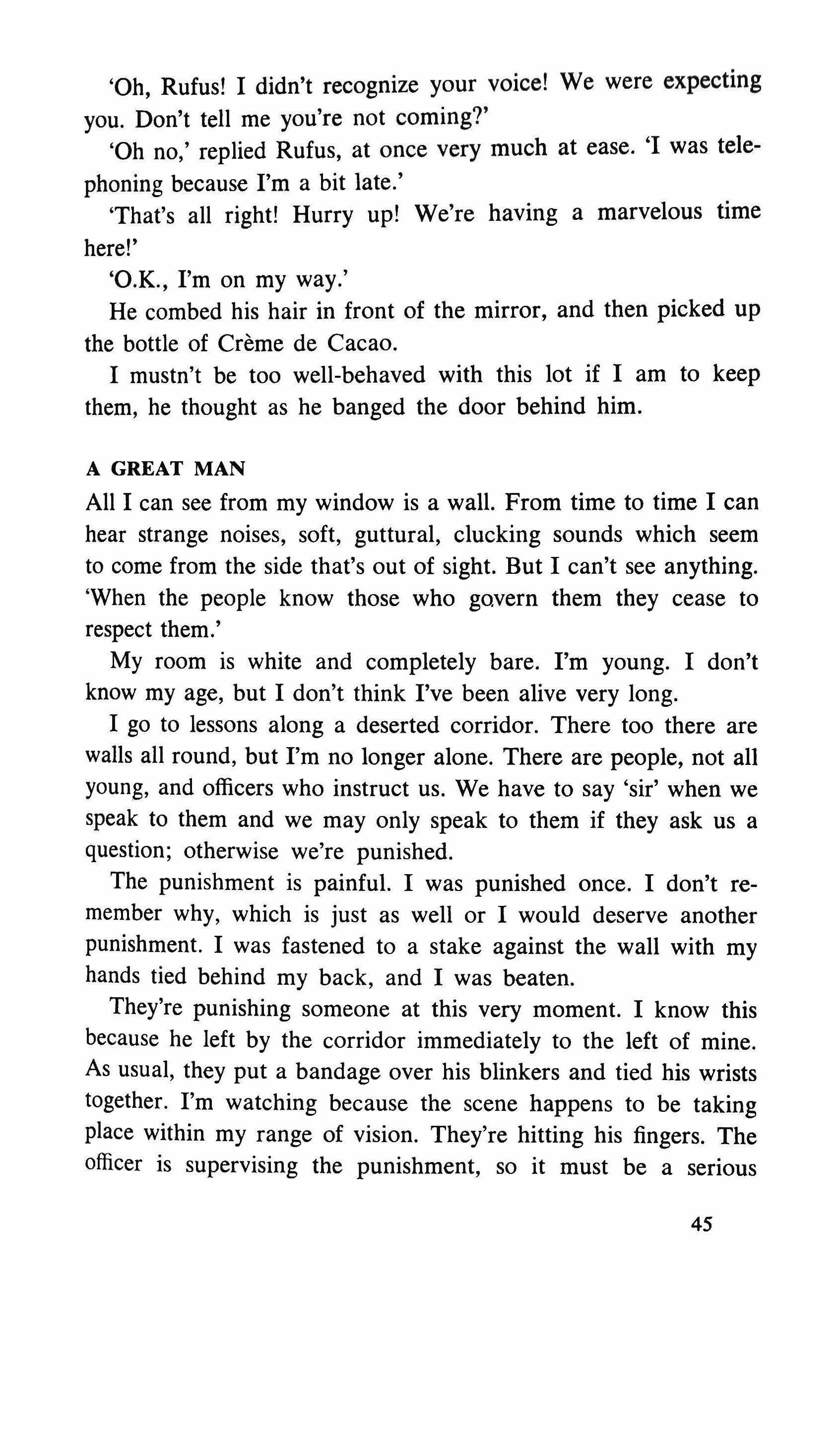
'Oh, Rufus! I didn't recognize your voice! We were expecting you. Don't tell me you're not coming?'
'Oh no,' replied Rufus, at once very much at ease. 'I was telephoning because I'm a bit late.'
'That's all right! Hurry up! We're having a marvelous time here!'
'O.K., I'm on my way.'
He combed his hair in front of the mirror, and then picked up the bottle of Creme de Cacao.
I mustn't be too well-behaved with this lot if I am to keep them, he thought as he banged the door behind him.
All I can see from my window is a wall. From time to time I can hear strange noises, soft, guttural, clucking sounds which seem to come from the side that's out of sight. But I can't see anything. 'When the people know those who govern them they cease to respect them.'
My room is white and completely bare. I'm young. I don't know my age, but I don't think I've been alive very long. I go to lessons along a deserted corridor. There too there are walls all round, but I'm no longer alone. There are people, not all young, and officers who instruct us. We have to say 'sir' when we speak to them and we may only speak to them if they ask us a question; otherwise we're punished.
The punishment is painful. I was punished once. I don't remember why, which is just as well or I would deserve another punishment. I was fastened to a stake against the wall with my hands tied behind my back, and I was beaten.
They're punishing someone at this very moment. I know this because he left by the corridor immediately to the left of mine. As usual, they put a bandage over his blinkers and tied his wrists together. I'm watching because the scene happens to be taking place within my range of vision. They're hitting his fingers. The officer is supervising the punishment, so it must be a senous
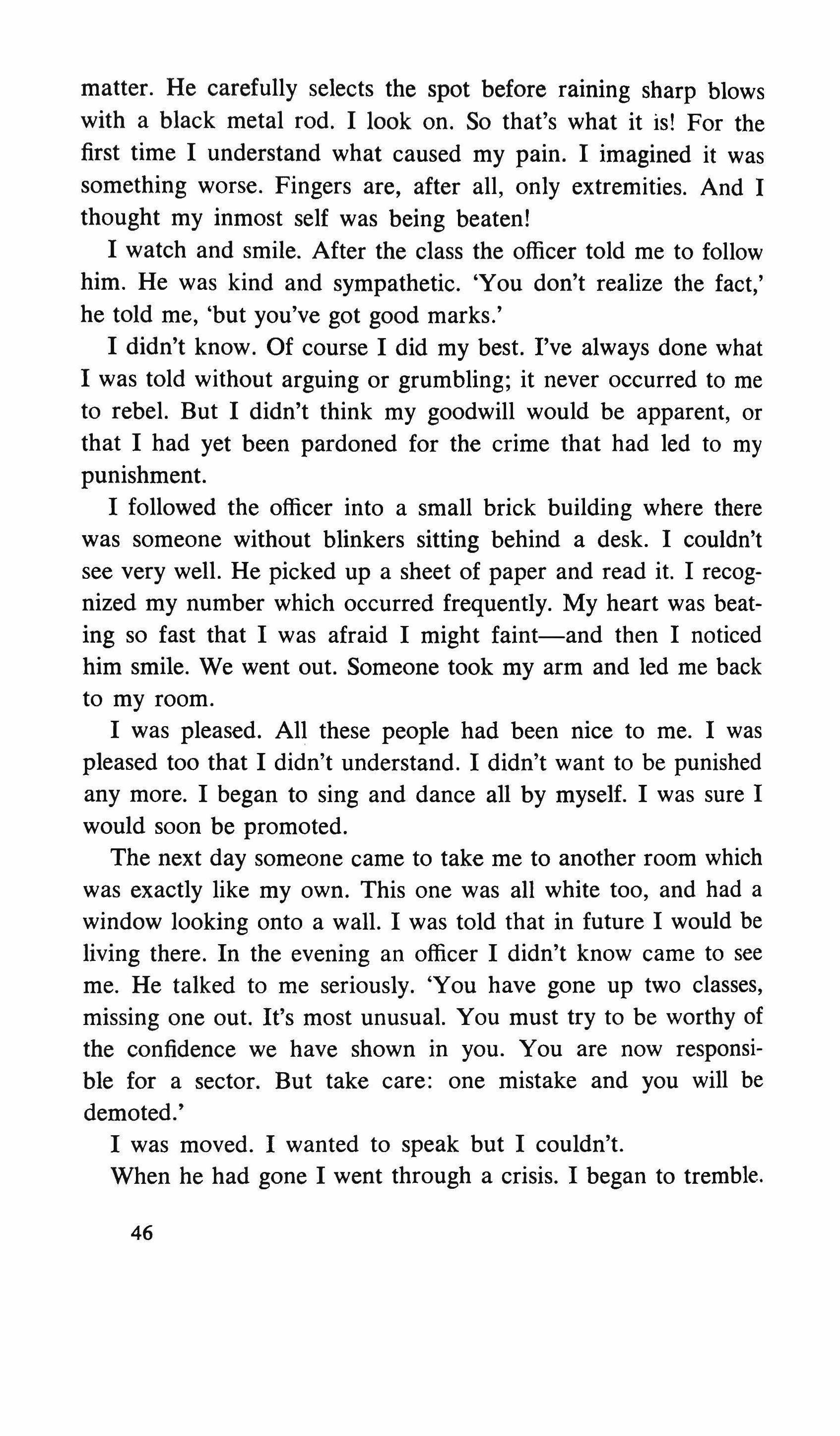
matter. He carefully selects the spot before raining sharp blows with a black metal rod. I look on. So that's what it is! For the first time I understand what caused my pain. I imagined it was something worse. Fingers are, after all, only extremities. And I thought my inmost self was being beaten! I watch and smile. After the class the officer told me to follow him. He was kind and sympathetic. 'You don't realize the fact,' he told me, 'but you've got good marks.'
I didn't know. Of course I did my best. I've always done what I was told without arguing or grumbling; it never occurred to me to rebel. But I didn't think my goodwill would be apparent, or that I had yet been pardoned for the crime that had led to my punishment.
I followed the officer into a small brick building where there was someone without blinkers sitting behind a desk. I couldn't see very well. He picked up a sheet of paper and read it. I recognized my number which occurred frequently. My heart was beating so fast that I was afraid I might faint-and then I noticed him smile. We went out. Someone took my arm and led me back to my room.
I was pleased. All these people had been nice to me. I was pleased too that I didn't understand. I didn't want to be punished any more. I began to sing and dance all by myself. I was sure I would soon be promoted.
The next day someone came to take me to another room which was exactly like my own. This one was all white too, and had a window looking onto a wall. I was told that in future I would be living there. In the evening an officer I didn't know came to see me. He talked to me seriously. 'You have gone up two classes, missing one out. It's most unusual. You must try to be worthy of the confidence we have shown in you. You are now responsible for a sector. But take care: one mistake and you will be demoted.'
I was moved. I wanted to speak but I couldn't. When he had gone I went through a crisis. I began to tremble.
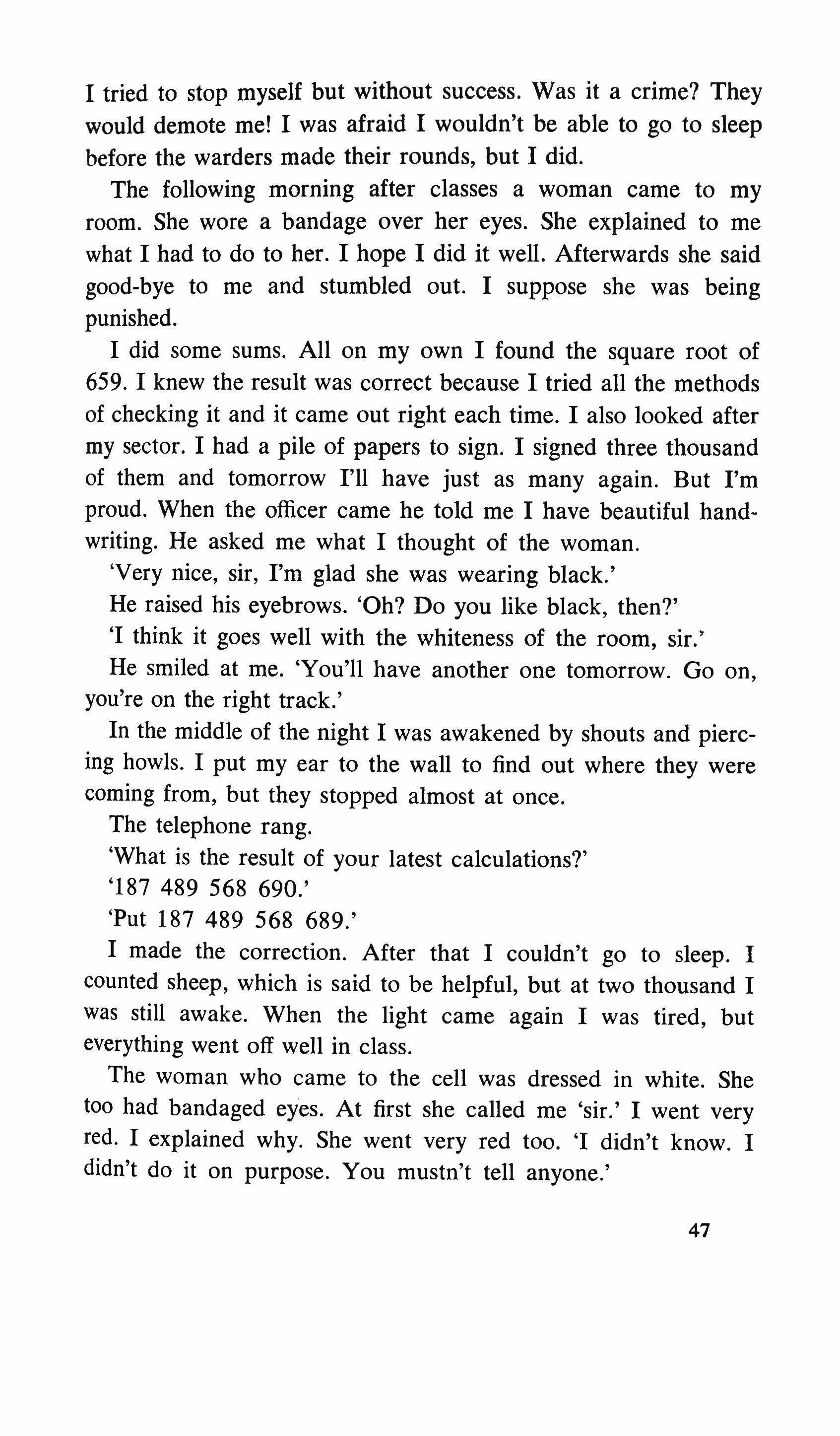
I tried to stop myself but without success. Was it a crime? They would demote me! I was afraid I wouldn't be able to go to sleep before the warders made their rounds, but I did.
The following morning after classes a woman came to my room. She wore a bandage over her eyes. She explained to me what I had to do to her. I hope I did it well. Afterwards she said good-bye to me and stumbled out. I suppose she was being punished.
I did some sums. All on my own I found the square root of 659. I knew the result was correct because I tried all the methods of checking it and it came out right each time. I also looked after my sector. 1 had a pile of papers to sign. I signed three thousand of them and tomorrow I'll have just as many again. But I'm proud. When the officer came he told me I have beautiful handwriting. He asked me what I thought of the woman.
'Very nice, sir, I'm glad she was wearing black.'
He raised his eyebrows. 'Oh? Do you like black, then?'
'I think it goes well with the whiteness of the room, sir.'
He smiled at me. 'You'll have another one tomorrow. Go on, you're on the right track.'
In the middle of the night I was awakened by shouts and piercing howls. 1 put my ear to the wall to find out where they were coming from, but they stopped almost at once.
The telephone rang.
'What is the result of your latest calculations?'
'187 489 568 690.'
'Put 187 489 568 689.'
I made the correction. After that I couldn't go to sleep. 1 counted sheep, which is said to be helpful, but at two thousand 1 was still awake. When the light came again 1 was tired, but everything went off well in class.
The woman who came to the cell was dressed in white. She too had bandaged eyes. At first she called me 'sir.' I went very red. 1 explained why. She went very red too. 'I didn't know. 1 didn't do it on purpose. You mustn't tell anyone.'
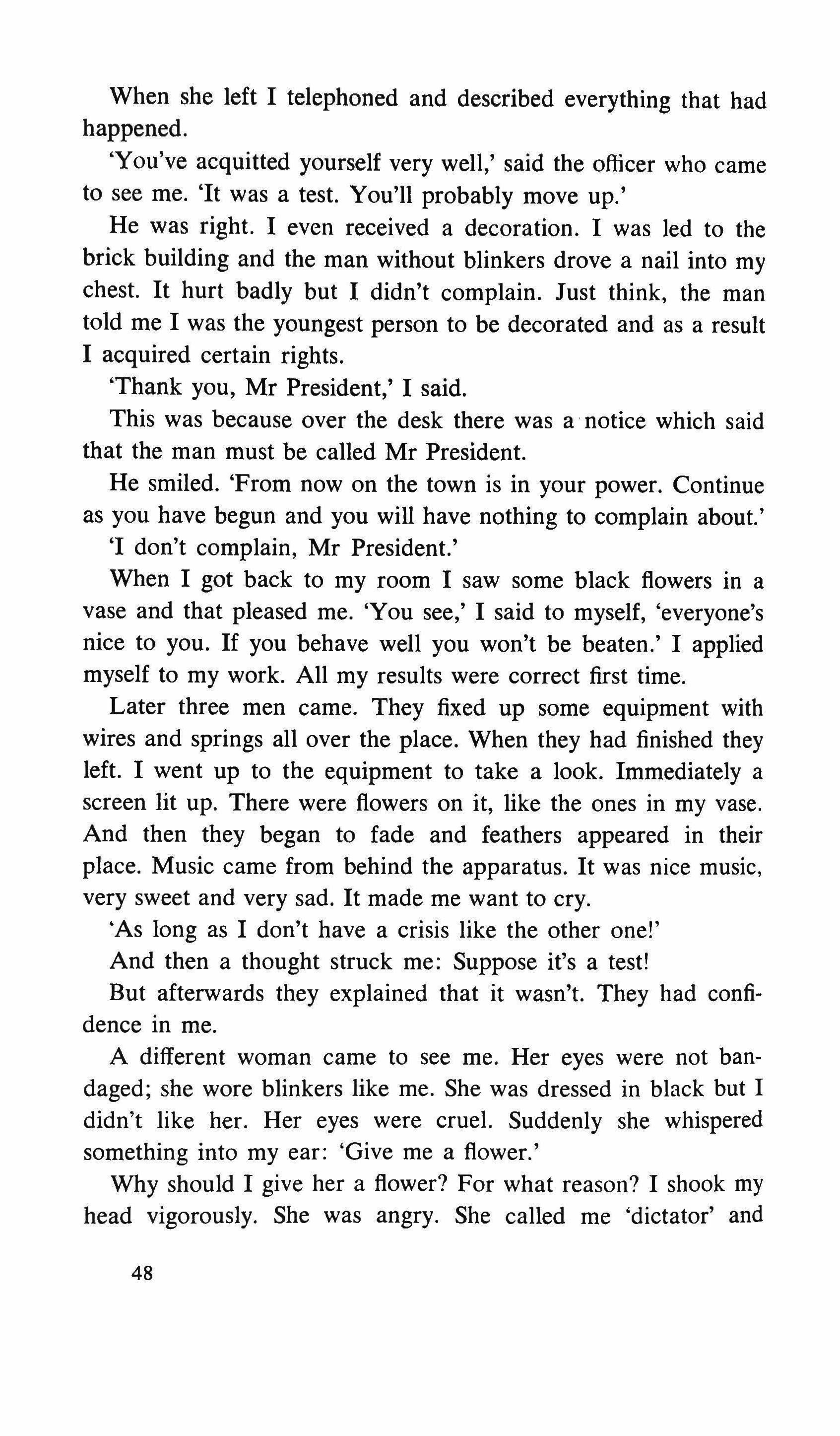
When she left I telephoned and described everything that had happened.
'You've acquitted yourself very well,' said the officer who came to see me. 'It was a test. You'll probably move up.'
He was right. I even received a decoration. I was led to the brick building and the man without blinkers drove a nail into my chest. It hurt badly but I didn't complain. Just think, the man told me I was the youngest person to be decorated and as a result I acquired certain rights.
'Thank you, Mr President,' I said.
This was because over the desk there was a notice which said that the man must be called Mr President.
He smiled. 'From now on the town is in your power. Continue as you have begun and you will have nothing to complain about.'
'I don't complain, Mr President.'
When I got back to my room I saw some black flowers in a vase and that pleased me. 'You see,' I said to myself, 'everyone's nice to you. If you behave well you won't be beaten.' I applied myself to my work. All my results were correct first time.
Later three men came. They fixed up some equipment with wires and springs all over the place. When they had finished they left. I went up to the equipment to take a look. Immediately a screen lit up. There were flowers on it, like the ones in my vase. And then they began to fade and feathers appeared in their place. Music came from behind the apparatus. It was nice music, very sweet and very sad. It made me want to cry.
'As long as I don't have a crisis like the other one!'
And then a thought struck me: Suppose it's a test!
But afterwards they explained that it wasn't. They had confidence in me.
A different woman came to see me. Her eyes were not bandaged; she wore blinkers like me. She was dressed in black but I didn't like her. Her eyes were cruel. Suddenly she whispered something into my ear: 'Give me a flower.'
Why should I give her a flower? For what reason? I shook my head vigorously. She was angry. She called me 'dictator' and
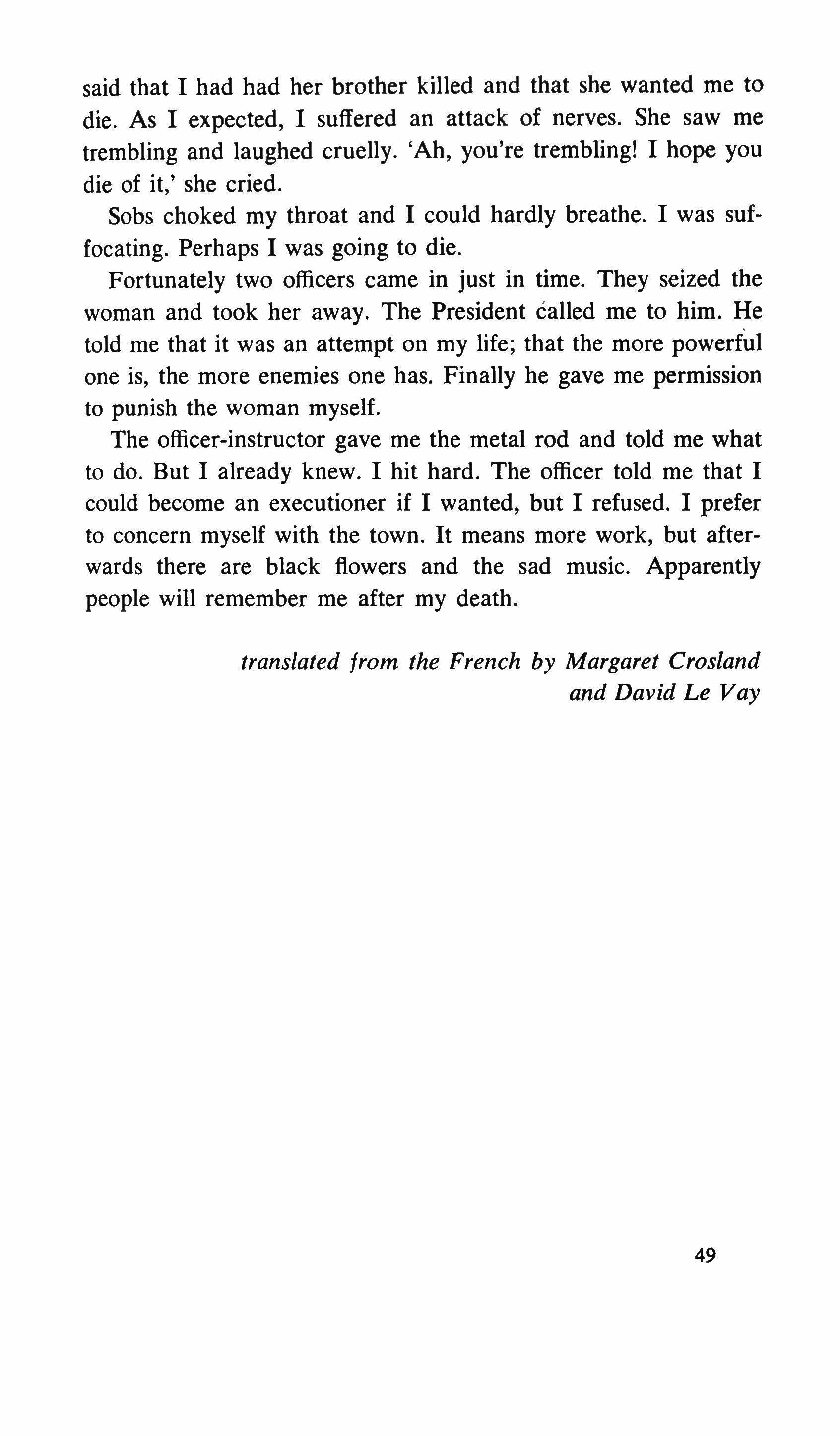
said that I had had her brother killed and that she wanted me to die. As I expected, I suffered an attack of nerves. She saw me trembling and laughed cruelly. 'Ah, you're trembling! I hope you die of it,' she cried.
Sobs choked my throat and I could hardly breathe. I was suffocating. Perhaps I was going to die.
Fortunately two officers came in just in time. They seized the woman and took her away. The President called me to him. He told me that it was an attempt on my life; that the more powerful one is, the more enemies one has. Finally he gave me permission to punish the woman myself.
The officer-instructor gave me the metal rod and told me what to do. But I already knew. I hit hard. The officer told me that I could become an executioner if I wanted, but I refused. I prefer to concern myself with the town. It means more work, but afterwards there are black flowers and the sad music. Apparently people will remember me after my death.
translated from the French by Margaret Crosland and David Le Vay
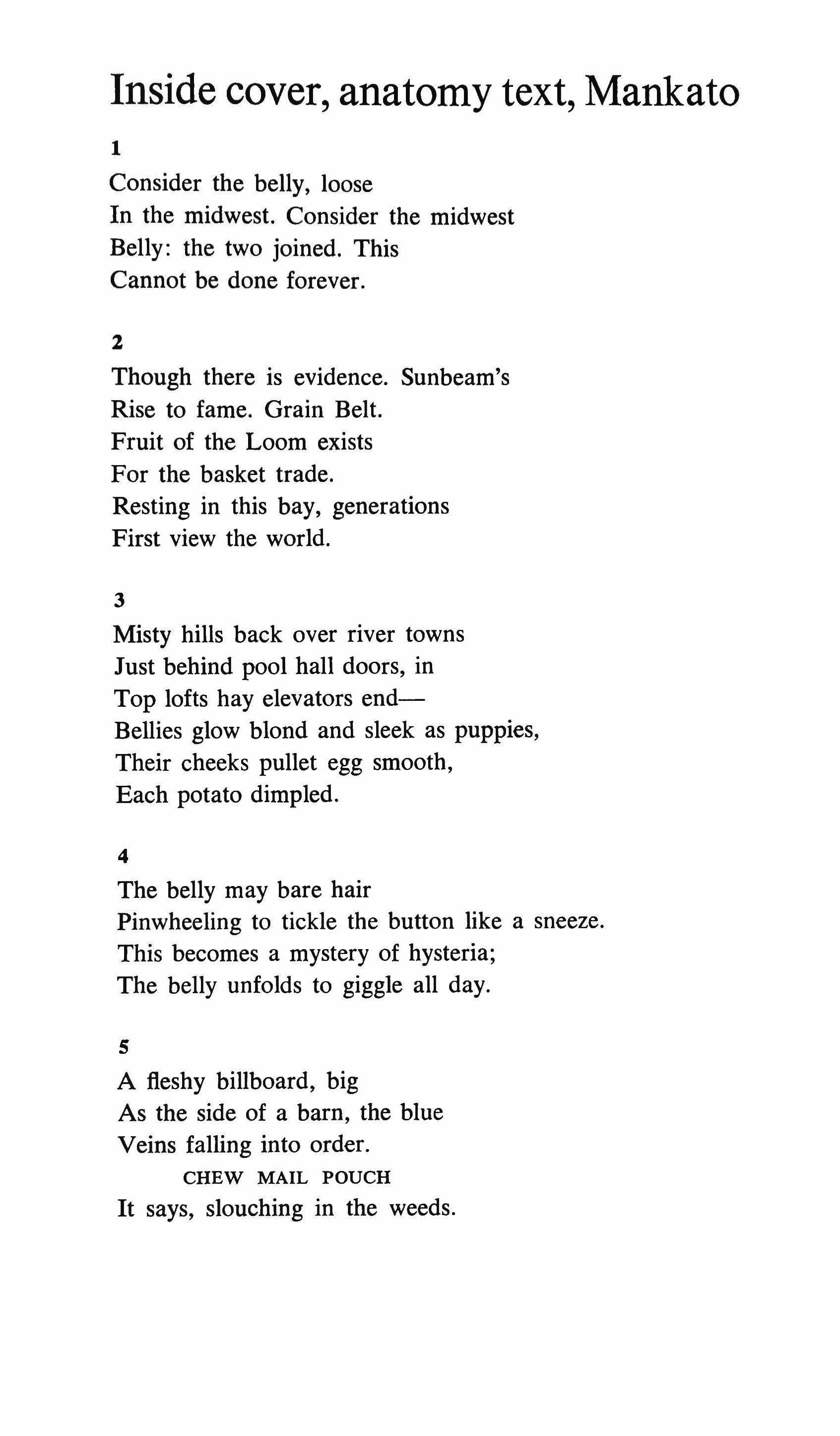
1
Consider the belly, loose
In the midwest. Consider the midwest
Belly: the two joined. This Cannot be done forever.
2
Though there is evidence. Sunbeam's Rise to fame. Grain Belt. Fruit of the Loom exists
For the basket trade.
Resting in this bay, generations
First view the world.
3
Misty hills back over river towns
Just behind pool hall doors, in
Top lofts hay elevators endBellies glow blond and sleek as puppies, Their cheeks pullet egg smooth, Each potato dimpled.
4
The belly may bare hair
Pinwheeling to tickle the button like a sneeze. This becomes a mystery of hysteria; The belly unfolds to giggle all day.
s
A fleshy billboard, big
As the side of a barn, the blue Veins falling into order.
CHEW MAIL POUCH
It says, slouching in the weeds.
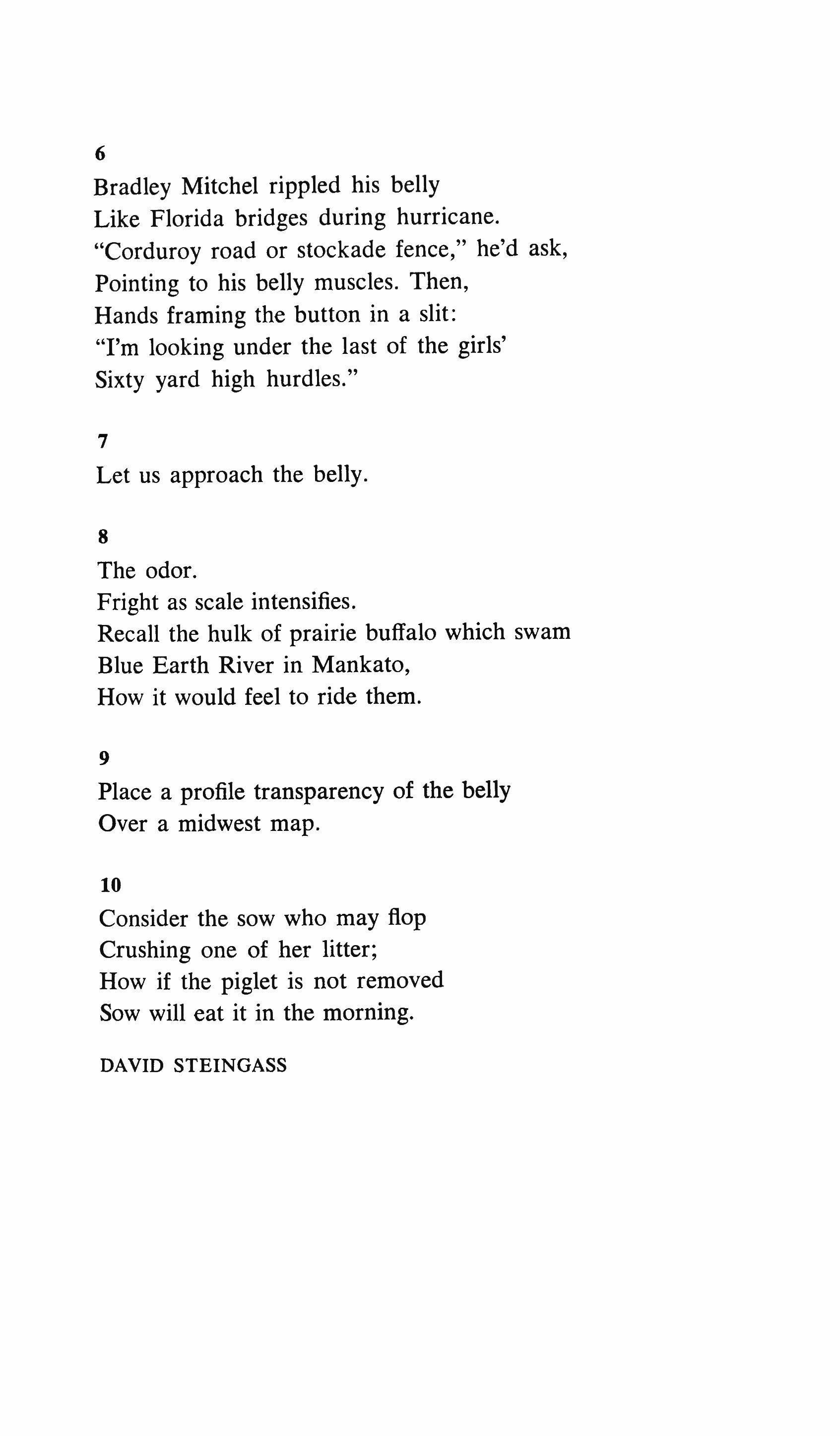
Bradley Mitchel rippled his belly
Like Florida bridges during hurricane. "Corduroy road or stockade fence," he'd ask, Pointing to his belly muscles. Then, Hands framing the button in a slit: "I'm looking under the last of the girls' Sixty yard high hurdles."
7 Let us approach the belly.
8 The odor. Fright as scale intensifies.
Recall the hulk of prairie buffalo which swam Blue Earth River in Mankato, How it would feel to ride them.
9
Place a profile transparency of the belly Over a midwest map.
10
Consider the sow who may flop Crushing one of her litter; How if the piglet is not removed Sow will eat it in the morning.
DAVID STEINGASS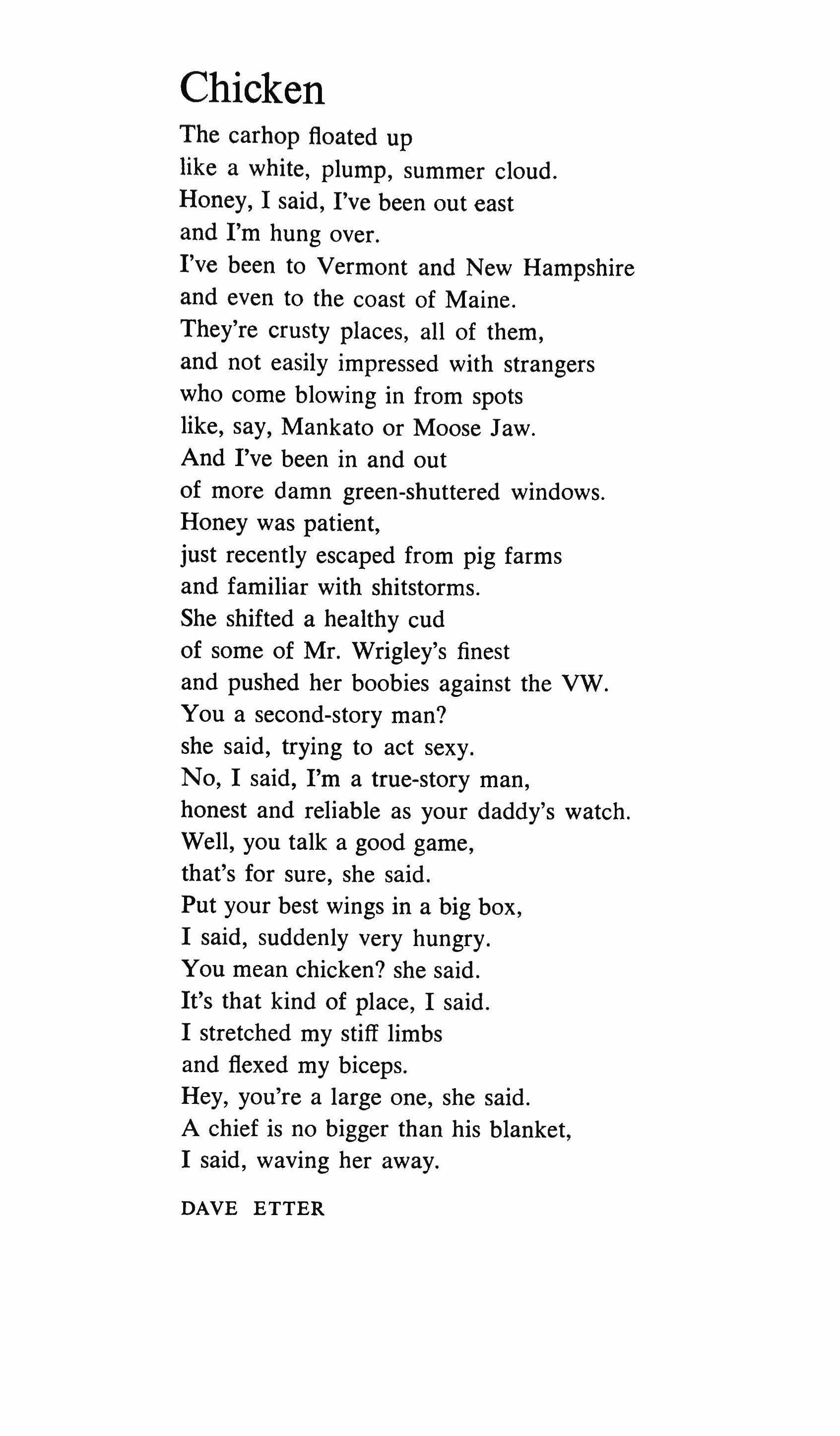
The carhop floated up like a white, plump, summer cloud. Honey, I said, I've been out east and I'm hung over. I've been to Vermont and New Hampshire and even to the coast of Maine. They're crusty places, all of them, and not easily impressed with strangers who come blowing in from spots like, say, Mankato or Moose Jaw. And I've been in and out of more damn green-shuttered windows. Honey was patient, just recently escaped from pig farms and familiar with shitstorms. She shifted a healthy cud of some of Mr. Wrigley's finest and pushed her boobies against the VW. You a second-story man? she said, trying to act sexy. No, I said, I'm a true-story man, honest and reliable as your daddy's watch. Well, you talk a good game, that's for sure, she said. Put your best wings in a big box, I said, suddenly very hungry. You mean chicken? she said. It's that kind of place, I said. I stretched my stiff limbs and flexed my biceps. Hey, you're a large one, she said. A chief is no bigger than his blanket, I said, waving her away.
DAVE ETTER
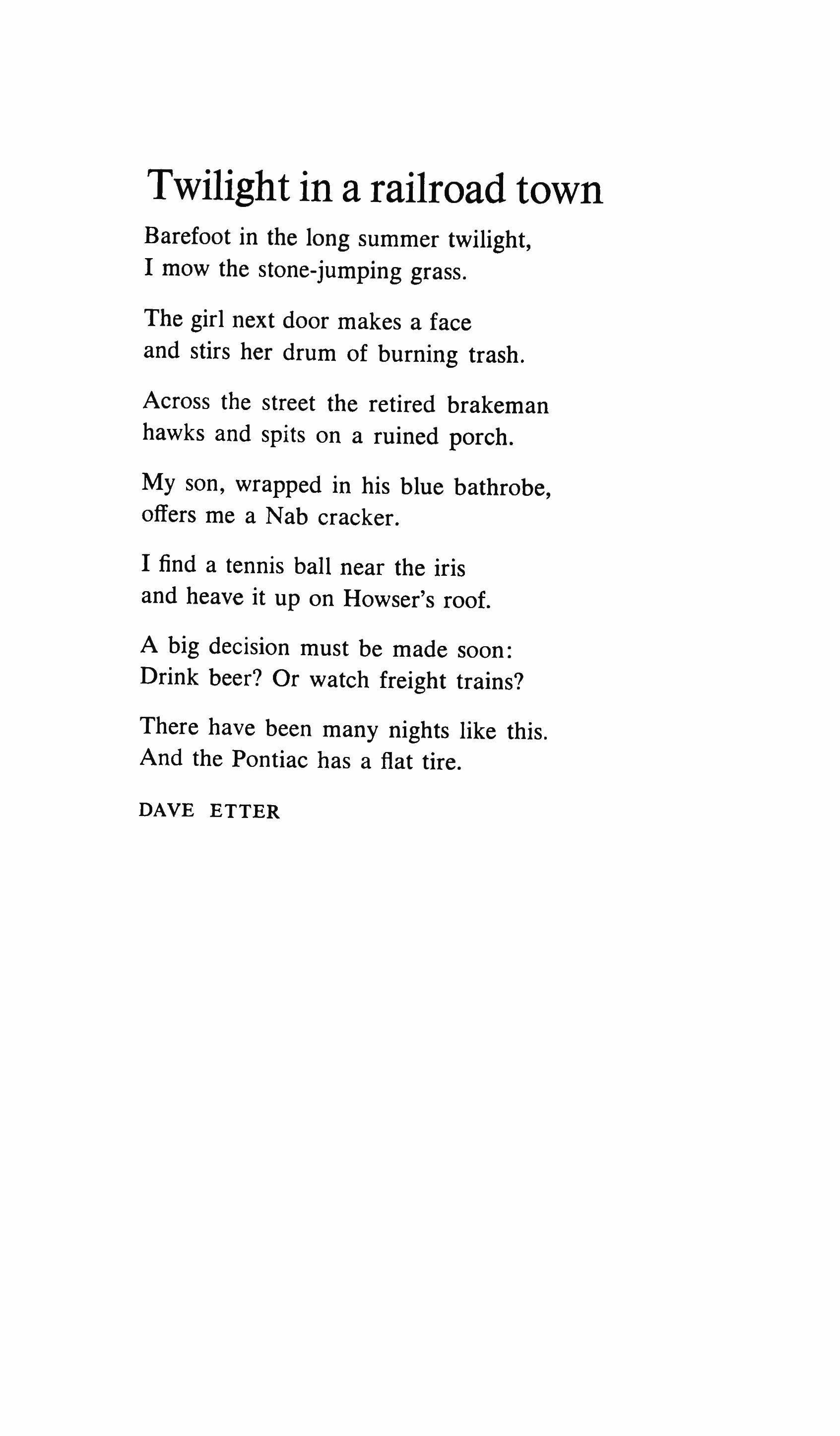
Barefoot in the long summer twilight, I mow the stone-jumping grass.
The girl next door makes a face and stirs her drum of burning trash.
Across the street the retired brakeman hawks and spits on a ruined porch.
My son, wrapped in his blue bathrobe, offers me a Nab cracker.
I find a tennis ball near the iris and heave it up on Howser's roof.
A big decision must be made soon: Drink beer? Or watch freight trains?
There have been many nights like this. And the Pontiac has a flat tire.
DAVE ETTER

Concerning the epic my star pitcher is always warming up in the bullpen. the game is seemingly in my favorwhy bring him out? only when up against the toughest odds. but really even tho the game goes well I am always up against the toughest oddshe should play before he burns out. how else to prove what a star pitcher I had? in fact the game isn't going all that well & I think maybe if I bring him in I'll still lose the game. then I'd have to realize my team didn't have the stuff.

how can I face that & tell my star pitcher all his years warmmg up were wasted? defeat? not really, because my team plays with its own imaginary baseball. but what if my ace hurler can no longer pitch his own imaginary curves fastballs & sliders? what if he can't play outside of the bullpen? or what if he exists only because other teams claim to have ace hurlers in their bullpens? what if nobody has a star pitcher? their word against ours,
or what if the game, the real game, is actually being played in the bullpen all this time & nobody watched it except my star pitcher & an old has-been catcher? get that catcher! he must tell us about that game!
oh, you mean he is the same catcher as the one out here?!
DOUGLAS BLAZEK
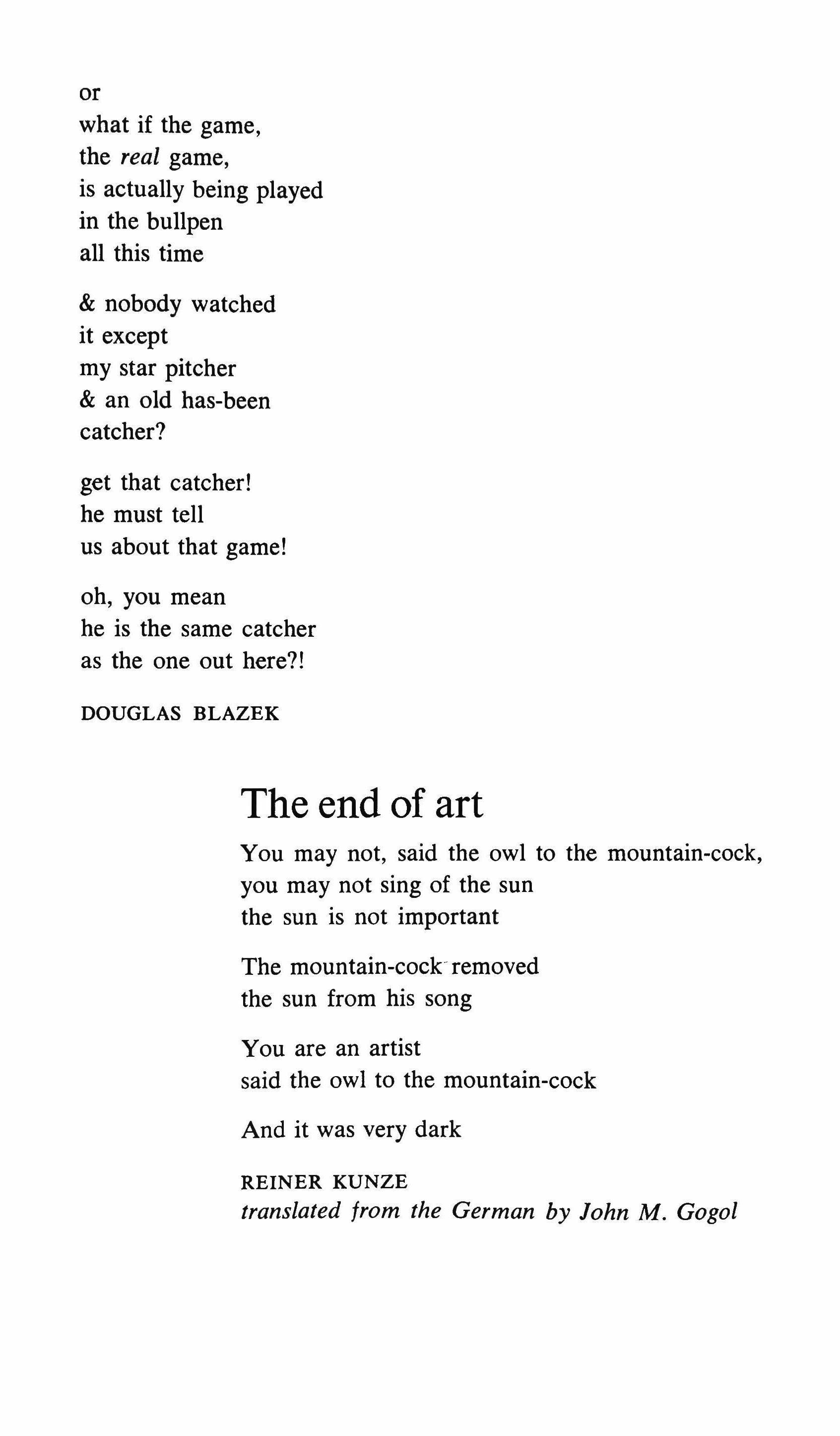
You may not, said the owl to the mountain-cock, you may not sing of the sun the sun is not important
The mountain-cock- removed the sun from his song
You are an artist said the owl to the mountain-cock
And it was very dark
REINER KUNZE
translated from the German by John M. Gogol
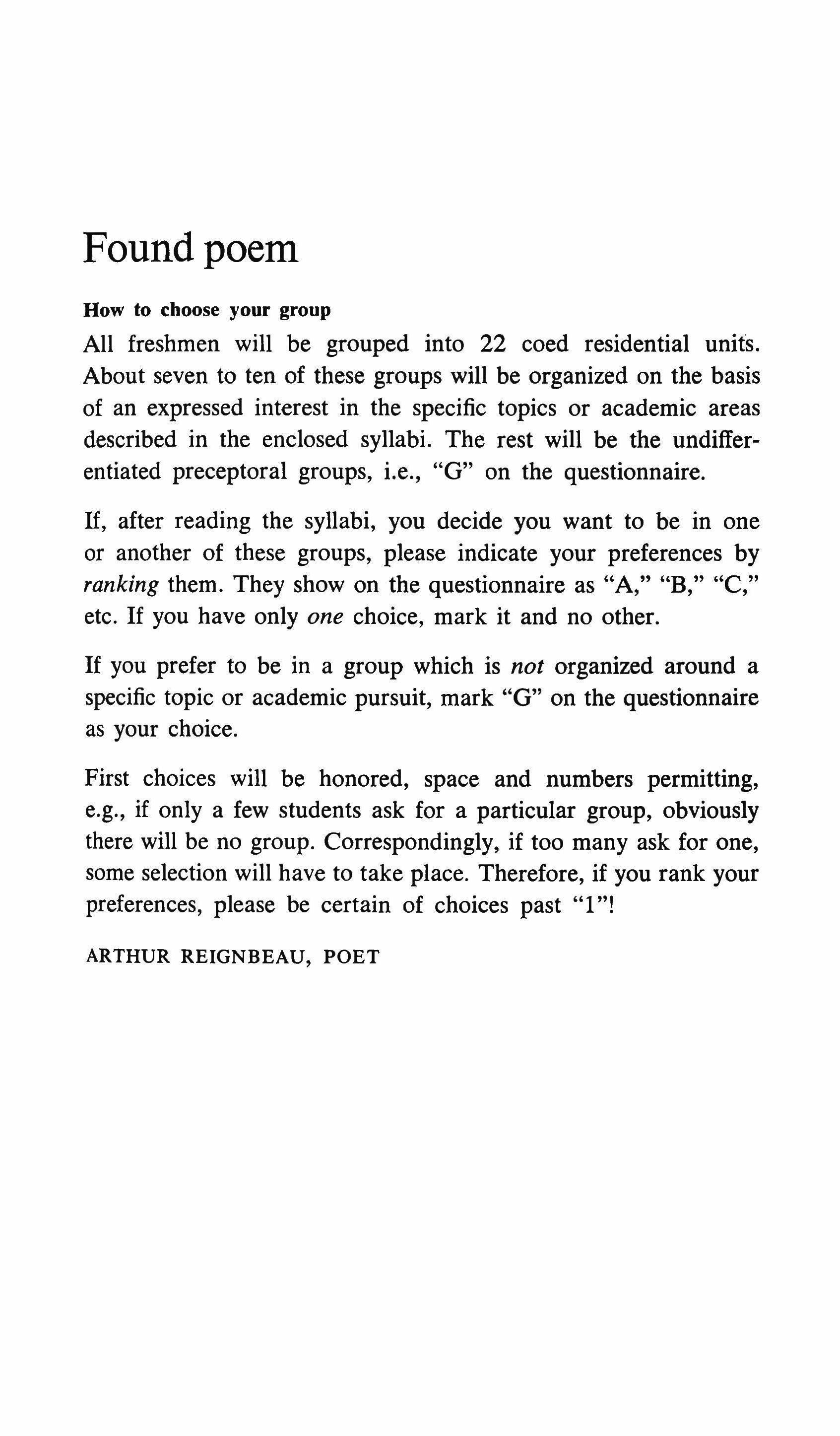
All freshmen will be grouped into 22 coed residential units. About seven to ten of these groups will be organized on the basis of an expressed interest in the specific topics or academic areas described in the enclosed syllabi. The rest will be the undifferentiated preceptoral groups, i.e., "G" on the questionnaire.
If, after reading the syllabi, you decide you want to be in one or another of these groups, please indicate your preferences by ranking them. They show on the questionnaire as "A," "B," "C," etc. If you have only one choice, mark it and no other.
If you prefer to be in a group which is not organized around a specific topic or academic pursuit, mark "G" on the questionnaire as your choice.
First choices will be honored, space and numbers permitting, e.g., if only a few students ask for a particular group, obviously there will be no group. Correspondingly, if too many ask for one, some selection will have to take place. Therefore, if you rank your preferences, please be certain of choices past "I"!
ARTHUR REIGNBEAU, POET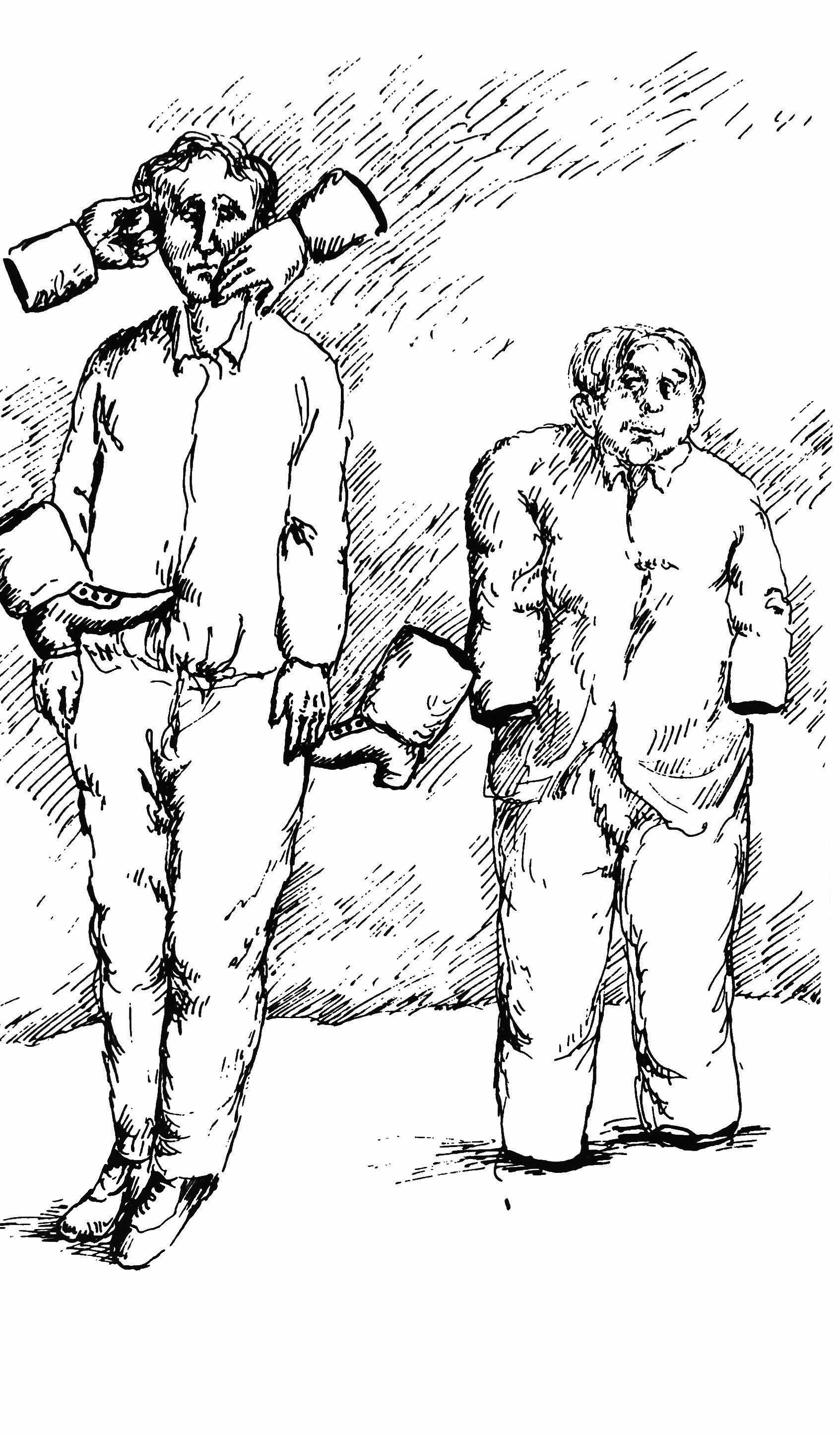
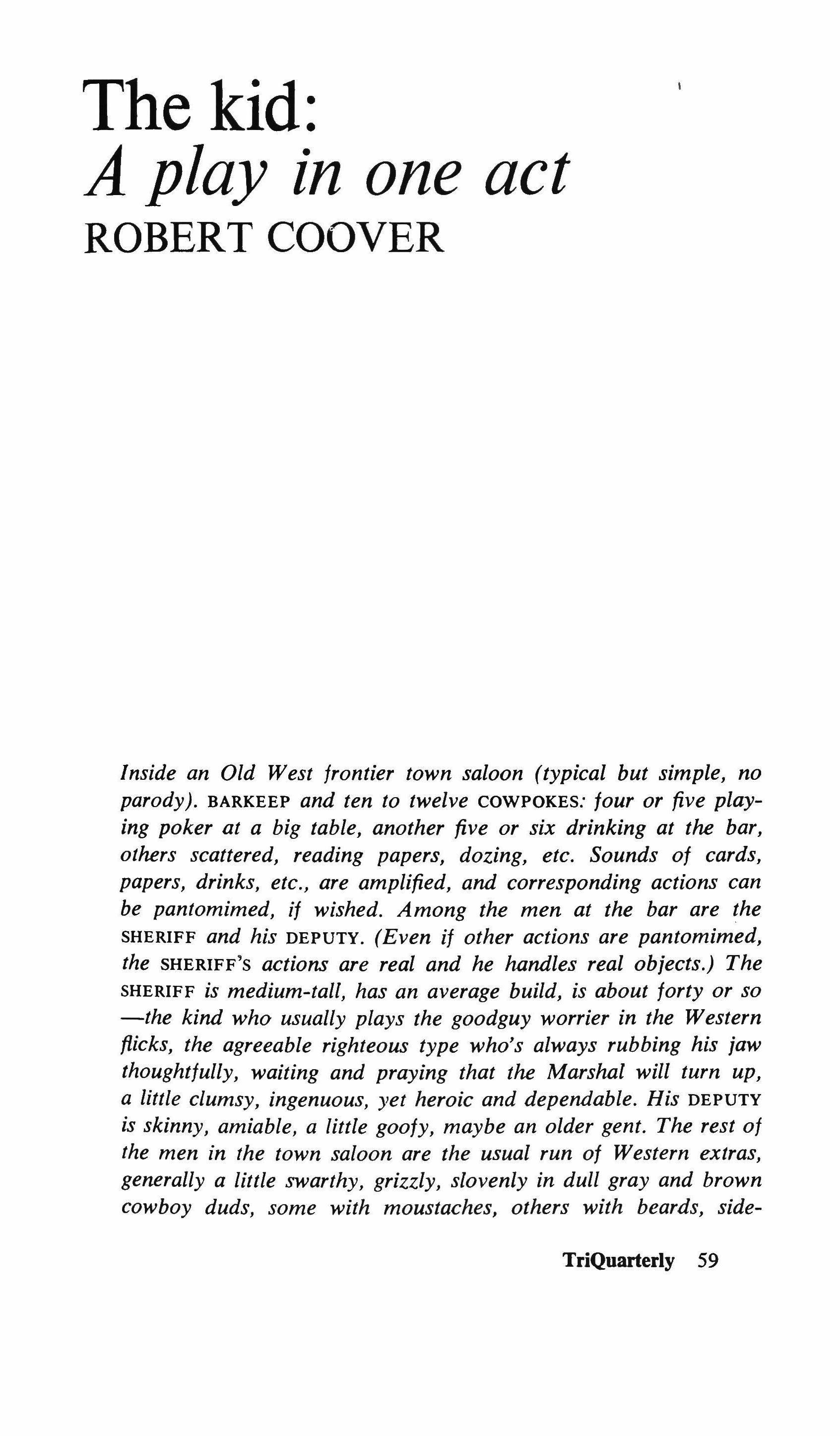
Inside an Old West frontier town saloon (typical but simple, no parody). BARKEEP and ten to twelve COWPOKES: four or five playing poker at a big table, another five or six drinking at the bar, others scattered, reading papers, dozing, etc. Sounds of cards, papers, drinks, etc., are amplified, and corresponding actions can be pantomimed, if wished. Among the men at the bar are the SHERIFF and his DEPUTY. (Even if other actions are pantomimed, the SHERIFF'S actions are real and he handles real objects.) The SHERIFF is medium-tall, has an average build, is about forty or so -the kind who usually plays the goodguy worrier in the Western flicks, the agreeable righteous type who's always rubbing his jaw thoughtfully, waiting and praying that the Marshal will turn up, a little clumsy, ingenuous, yet heroic and dependable. His DEPUTY is skinny, amiable, a little goofy, maybe an older gent. The rest of the men in the town saloon are the usual run of Western extras, generally a little swarthy, grizzly, slovenly in dull gray and brown cowboy duds, some with moustaches, others with beards, side-
TriQuarterly 59
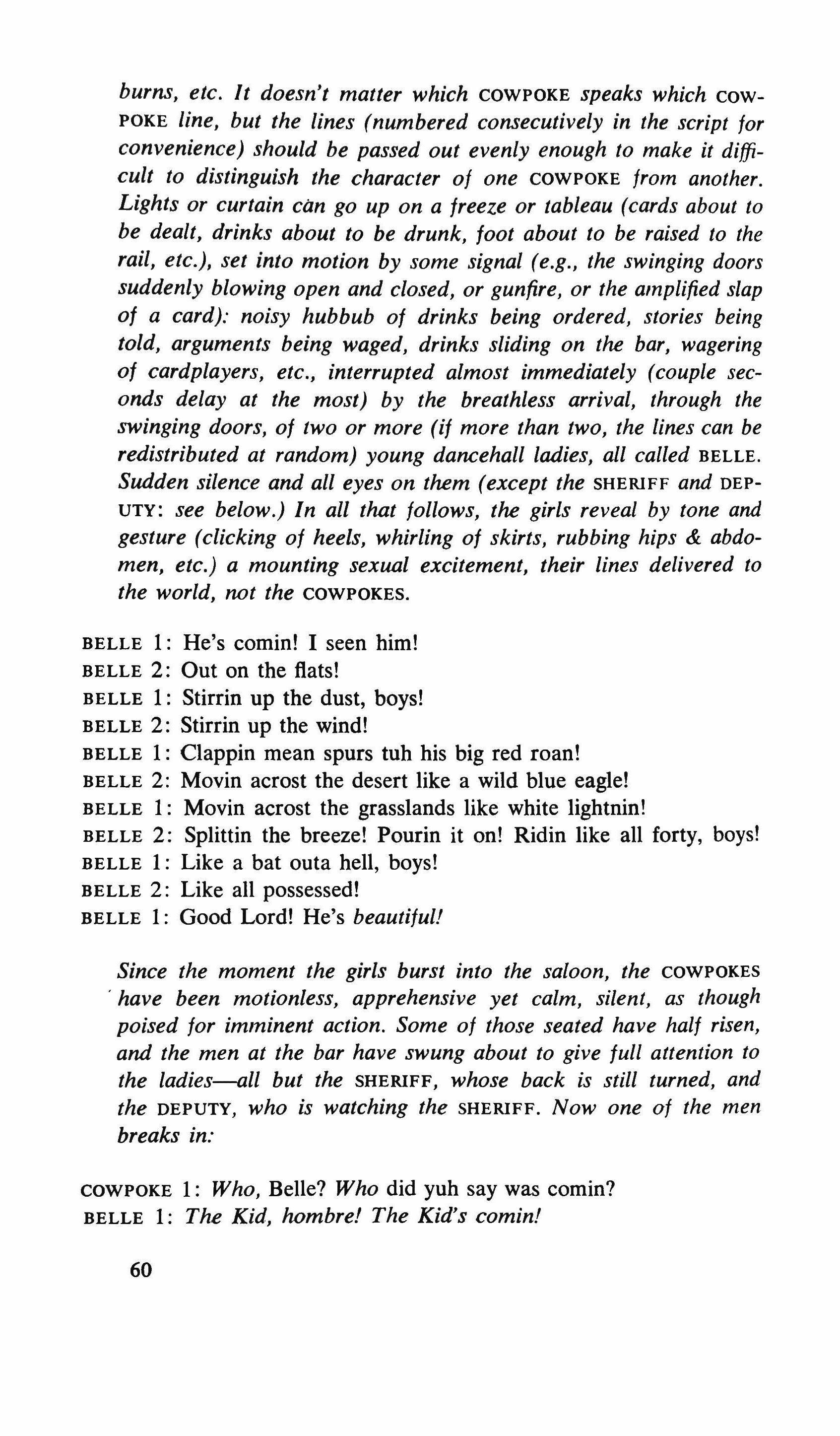
burns, etc. It doesn't matter which COWPOKE speaks which cowPOKE line, but the lines (numbered consecutively in the script for convenience) should be passed out evenly enough to make it difficult to distinguish the character of one COWPOKE from another. Lights or curtain can go up on a freeze or tableau (cards about to be dealt, drinks about to be drunk, foot about to be raised to the rail, etc.), set into motion by some signal (e.g., the swinging doors suddenly blowing open and closed, or gunfire, or the amplified slap of a card): noisy hubbub of drinks being ordered, stories being told, arguments being waged, drinks sliding on the bar, wagering of cardplayers, etc., interrupted almost immediately (couple seconds delay at the most) by the breathless arrival, through the swinging doors, of two or more (if more than two, the lines can be redistributed at random) young dancehall ladies, all called BELLE. Sudden silence and all eyes on them (except the SHERIFF and DEPUTY: see below.) In all that follows, the girls reveal by tone and gesture (clicking of heels, whirling of skirts, rubbing hips & abdomen, etc.) a mounting sexual excitement, their lines delivered to the world, not the COWPOKES.
BELLE 1: He's comin! I seen him!
BELLE 2: Out on the flats!
BELLE 1: Stirrin up the dust, boys!
BELLE 2: Stirrin up the wind!
BELLE 1: Clappin mean spurs tuh his big red roan!
BELLE 2: Movin acrost the desert like a wild blue eagle!
BELLE 1: Movin acrost the grasslands like white lightnin!
BELLE 2: Splittin the breeze! Pourin it on! Ridin like all forty, boys!
BELLE 1: Like a bat outa hell, boys!
BELLE 2: Like all possessed!
BELLE 1: Good Lord! He's beautiful!
Since the moment the girls burst into the saloon, the COWPOKES have been motionless, apprehensive yet calm, silent, as though poised for imminent action. Some of those seated have half risen, and the men at the bar have swung about to give full attention to the ladies-all but the SHERIFF, whose back is still turned, and the DEPUTY, who is watching the SHERIFF. Now one of the men breaks in:
COWPOKE 1: Who, Belle? Who did yuh say was comin?
BELLE 1: The Kid, hombre! The Kid's comin!
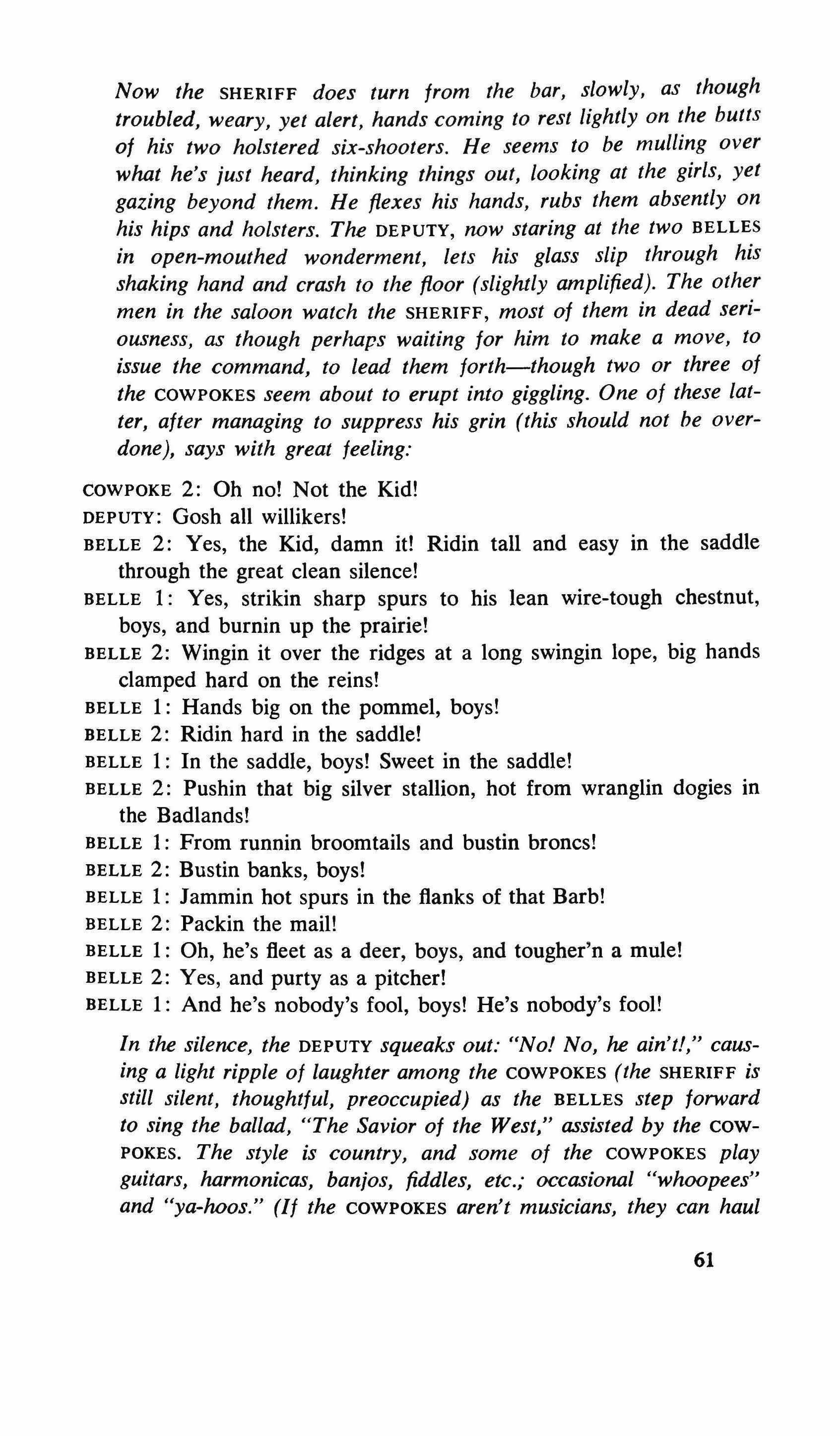
Now the SHERIFF does turn from the bar, slowly, as though troubled, weary, yet alert, hands coming to rest lightly on the butts of his two holstered six-shooters. He seems to be mulling over what he's just heard, thinking things out, looking at the girls, yet gazing beyond them. He flexes his hands, rubs them absently on his hips and holsters. The DEPUTY, now staring at the two BELLES in open-mouthed wonderment, lets his glass slip through his shaking hand and crash to the floor (slightly amplified). The other men in the saloon watch the SHERIFF, most of them in dead seriousness, as though perhaps waiting for him to make a move, to issue the command, to lead them forth-though two or three of the COWPOKES seem about to erupt into giggling. One of these latter, after managing to suppress his grin (this should not be overdone), says with great feeling:
COWPOKE 2: Oh no! Not the Kid!
DEPUTY: Gosh all willikers!
BELLE 2: Yes, the Kid, damn it! Ridin tall and easy in the saddle through the great clean silence!
BELLE 1: Yes, strikin sharp spurs to his lean wire-tough chestnut, boys, and burnin up the prairie!
BELLE 2: Wingin it over the ridges at a long swingin lope, big hands clamped hard on the reins!
BELLE 1: Hands big on the pommel, boys!
BELLE 2: Ridin hard in the saddle!
BELLE 1: In the saddle, boys! Sweet in the saddle!
BELLE 2: Pushin that big silver stallion, hot from wranglin dogies in the Badlands!
BELLE 1: From runnin broomtails and bustin broncs!
BELLE 2: Bustin banks, boys!
BELLE 1: Jammin hot spurs in the flanks of that Barb!
BELLE 2: Packin the mail!
BELLE 1: Oh, he's fleet as a deer, boys, and tougher'n a mule!
BELLE 2: Yes, and purty as a pitcher!
BELLE 1: And he's nobody's fool, boys! He's nobody's fool!
In the silence, the DEPUTY squeaks out: "No! No, he ain't!," causing a light ripple of laughter among the COWPOKES (the SHERIFF is still silent, thoughtful, preoccupied) as the BELLES step forward to sing the ballad, "The Savior of the West," assisted by the cowPOKES. The style is country, and some of the COWPOKES play guitars, harmonicas, banjos, fiddles, etc.; occasional "whoopees" and "ya-hoos." (If the COWPOKES aren't musicians, they can haul
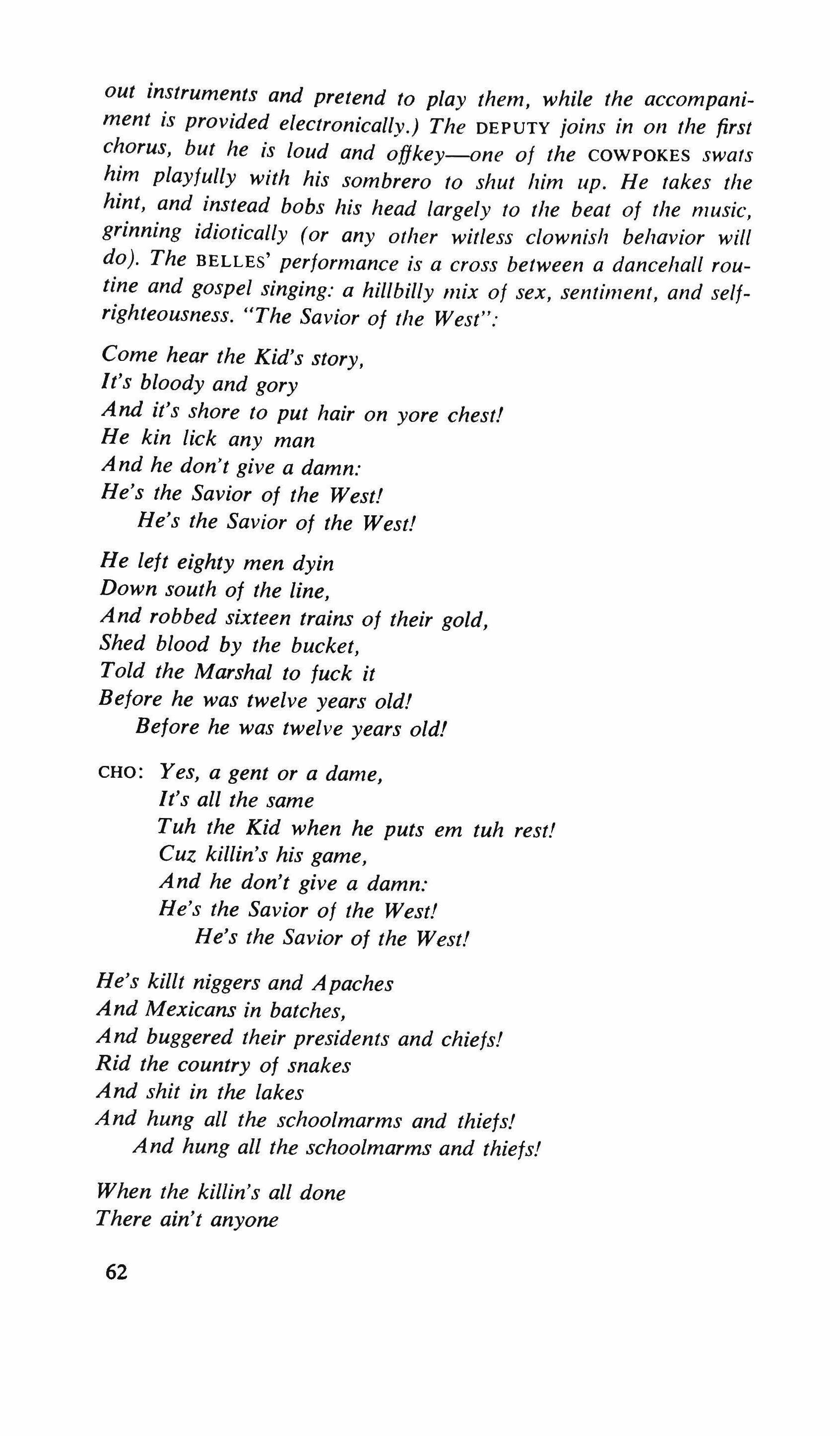
out instruments and pretend to play them, while the accompaniment is provided electronically.] The DEPUTY joins in 011 the first chorus, but he is loud and ofJkey-one of the COWPOKES swats him playfully with his sombrero to shut him lip. He takes the hint, and instead bobs his head largely to the beat of the music, grinning idiotically (or any other witless clownish behavior will do). The BELLES' performance is a cross between a dancehall routine and gospel singing: a hillbilly mix of sex, sentiment, and selfrighteousness. "The Savior of the West":
Come hear the Kid's story, It's bloody and gory
And it's shore to put hair on yore chest! He kin lick any man
And he don't give a damn: He's the Savior of the West!
He's the Savior of the West!
He left eighty men dyin
Down south of the line, And robbed sixteen trains of their gold, Shed blood by the bucket, Told the Marshal to iuck it
Before he was twelve years old!
Before he was twelve years old!
CHO: Yes, a gent or a dame, It's all the same
Tuh the Kid when he puts em tuh rest!
Cuz killin's his game, And he don't give a damn: He's the Savior of the West!
He's the Savior of the West!
He's killt niggers and Apaches
And Mexicans in batches, And buggered their presidents and chiefs! Rid the country of snakes
And shit in the lakes
And hung all the schoolmarms and thieis!
And hung all the schoolmarms and thiefs!
When the killin's all done
There ain't anyone
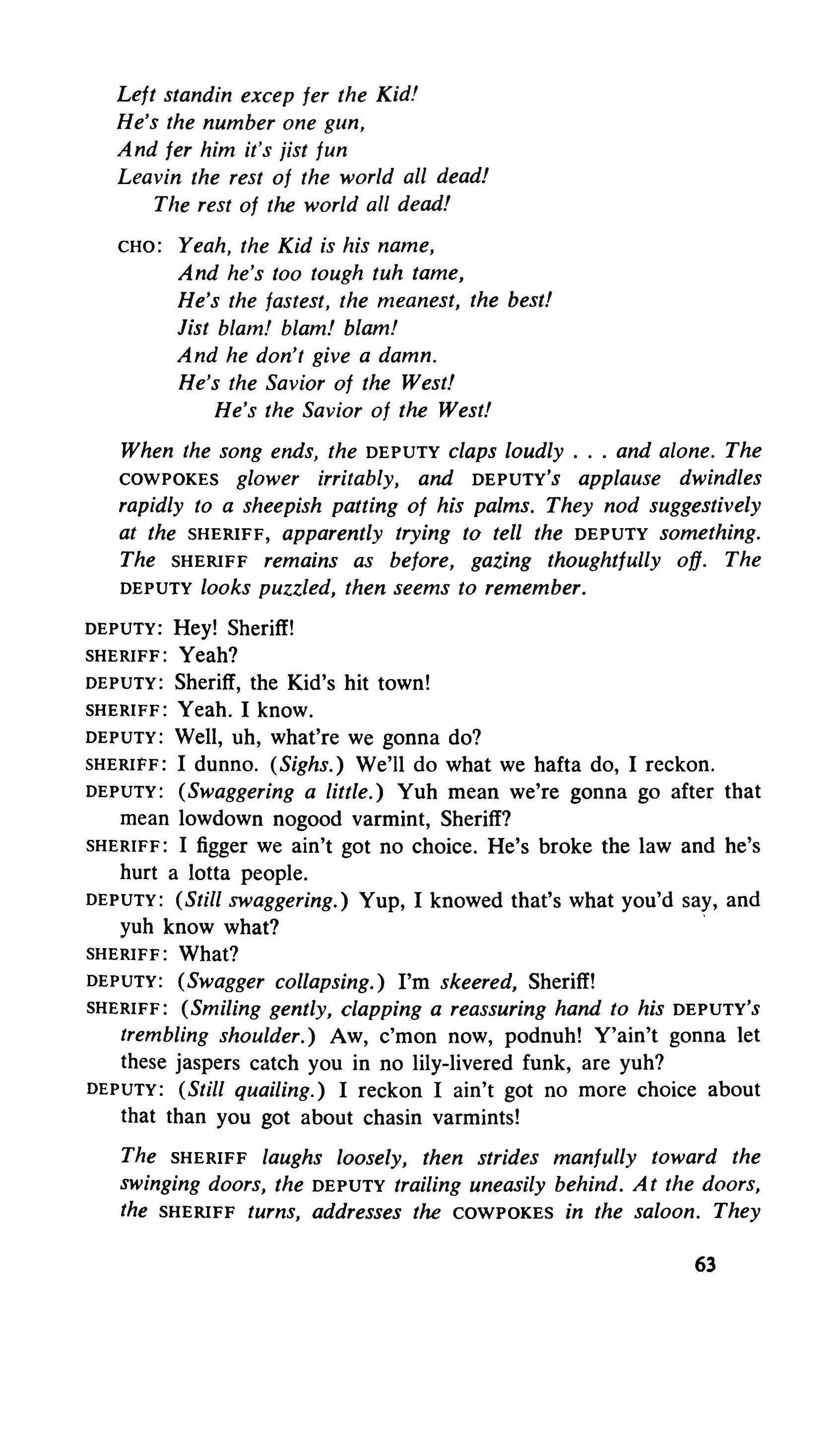
Left standin excep fer the Kid! He's the number one gun, And fer him it's jist fun
Leavin the rest of the world all dead! The rest of the world all dead!
CHO: Yeah, the Kid is his name, And he's too tough tuh tame, He's the fastest, the meanest, the best! Jist blam! blam! blam! And he don't give a damn. He's the Savior of the West! He's the Savior of the West!
When the song ends, the DEPUTY claps loudly and alone. The COWPOKES glower irritably, and DEPUTY'S applause dwindles rapidly to a sheepish patting of his palms. They nod suggestively at the SHERIFF, apparently trying to tell the DEPUTY something. The SHERIFF remains as before, gazing thoughtfully off. The DEPUTY looks puzzled, then seems to remember.
DEPUTY: Hey! Sheriff!
SHERIFF: Yeah?
DEPUTY: Sheriff, the Kid's hit town!
SHERIFF: Yeah. I know.
DEPUTY: Well, uh, what're we gonna do?
SHERIFF: I dunno. (Sighs.) We'll do what we hafta do, I reckon.
DEPUTY: (Swaggering a little.) Yuh mean we're gonna go after that mean lowdown nogood varmint, Sheriff?
SHERIFF: I figger we ain't got no choice. He's broke the law and he's hurt a lotta people.
DEPUTY: (Still swaggering.) Yup, I knowed that's what you'd say, and yuh know what?
SHERIFF: What?
DEPUTY: (Swagger collapsing.) I'm skeered, Sheriff!
SHERIFF: (Smiling gently, clapping a reassuring hand to his DEPUTY'S trembling shoulder.) Aw, c'mon now, podnuh! Y'ain't gonna let these jaspers catch you in no lily-livered funk, are yuh?
DEPUTY: (Still quailing.) I reckon I ain't got no more choice about that than you got about chasin varmints!
The SHERIFF laughs loosely, then strides manfully toward the swinging doors, the DEPUTY trailing uneasily behind. At the doors, the SHERIFF turns, addresses the COWPOKES in the saloon. They
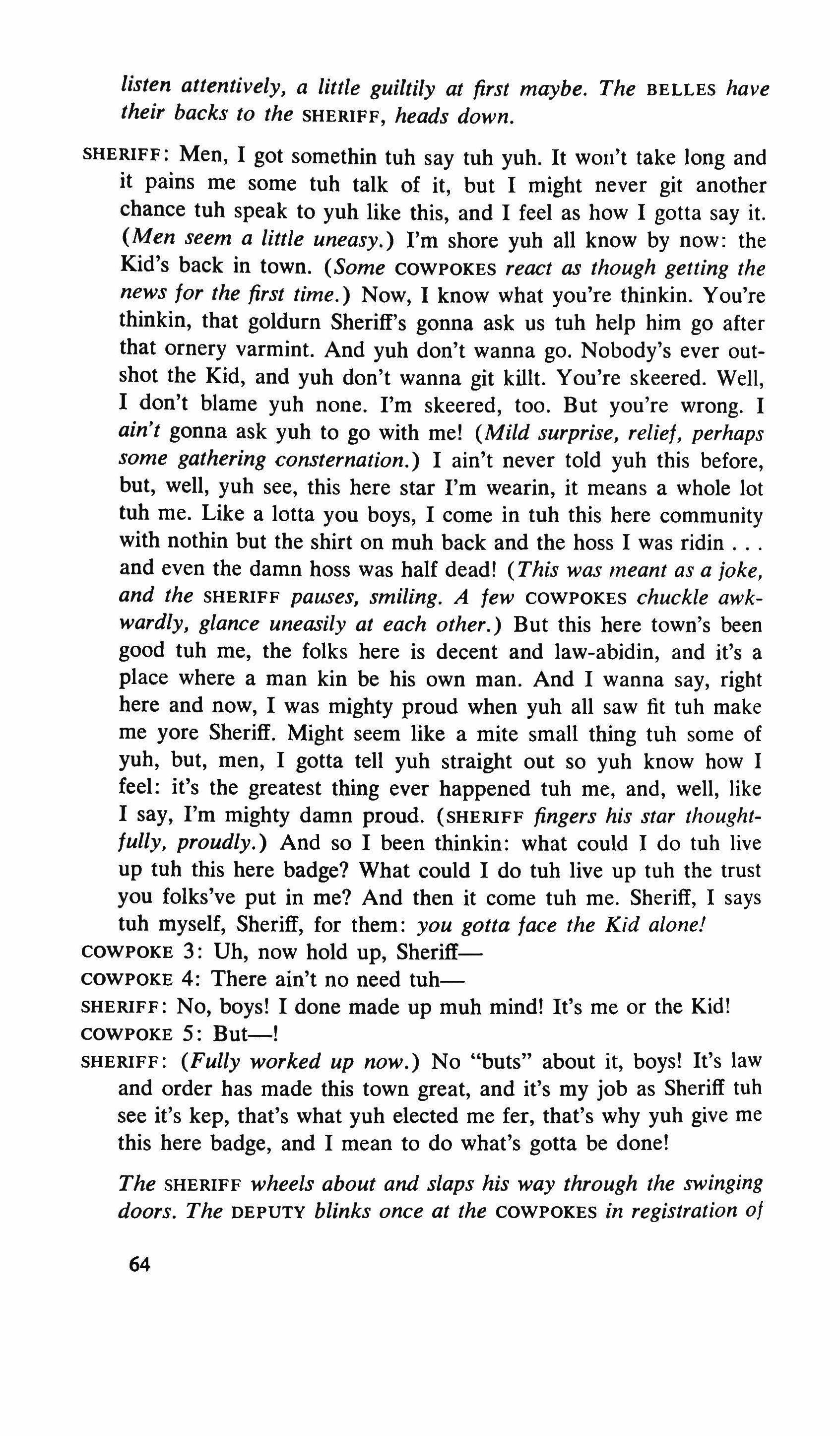
listen attentively, a little guiltily at first maybe. The BELLES have their backs to the SHERIFF, heads down.
SHERIFF: Men, I got somethin tuh say tuh yuh. It won't take long and it pains me some tuh talk of it, but I might never git another chance tuh speak to yuh like this, and I feel as how I gotta say it. (Men seem a little uneasy.) I'm shore yuh all know by now: the Kid's back in town. (Some COWPOKES react as though getting the news for the first time.) Now, I know what you're thinkin. You're thinkin, that goldurn Sheriff's gonna ask us tuh help him go after that ornery varmint. And yuh don't wanna go. Nobody's ever outshot the Kid, and yuh don't wanna git killt. You're skeered. Well, I don't blame yuh none. I'm skeered, too. But you're wrong. I ain't gonna ask yuh to go with me! (Mild surprise, relief, perhaps some gathering consternation.) I ain't never told yuh this before, but, well, yuh see, this here star I'm wearin, it means a whole lot tuh me. Like a lotta you boys, I come in tuh this here community with nothin but the shirt on muh back and the hoss I was ridin and even the damn hoss was half dead! (This was meant as a joke, and the SHERIFF pauses, smiling. A few COWPOKES chuckle awkwardly, glance uneasily at each other.) But this here town's been good tuh me, the folks here is decent and law-abidin, and it's a place where a man kin be his own man. And I wanna say, right here and now, I was mighty proud when yuh all saw fit tuh make me yore Sheriff. Might seem like a mite small thing tuh some of yuh, but, men, I gotta tell yuh straight out so yuh know how I feel: it's the greatest thing ever happened tuh me, and, well, like I say, I'm mighty damn proud. (SHERIFF fingers his star thoughtfully, proudly.) And so I been thinkin: what could I do tuh live up tuh this here badge? What could I do tuh live up tuh the trust you folks've put in me? And then it come tuh me. Sheriff, I says tuh myself, Sheriff, for them: you gotta face the Kid alone!
COWPOKE 3: Uh, now hold up, Sheriff
COWPOKE 4: There ain't no need tuh-
SHERIFF: No, boys! I done made up muh mind! It's me or the Kid!
COWPOKE 5: But-!
SHERIFF: (Fully worked up now.) No "buts" about it, boys! It's law and order has made this town great, and it's my job as Sheriff tuh see it's kep, that's what yuh elected me fer, that's why yuh give me this here badge, and I mean to do what's gotta be done!
The SHERIFF wheels about and slaps his way through the swinging doors. The DEPUTY blinks once at the COWPOKES in registration of

his own astonishment, then squares his shoulders bravely, shoves down on his six-shooters with determination-s-and pushes the gunbelt right down off his hips, tripping over it as he attempts to follow the SHERIFF out, falling on his face on the barroom floor. He jumps up sheepishly and staggers hurriedly out, trying to pull up his gunbelt as he totters along. Saloon erupts in full-bellied laughter. A couple COWPOKES even leap up and dance a little impromptu jig with the BELLES, slapping them playjully on the behind.
COWPOKE 6: Hey, yuh don't think he's gonna screw it up, do yuh?
COWPOKE 7: Who, the Sheriff? Haw haw!
COWPOKE 8: This is gonna be good!
Whoopeeing and music-making are interrupted by a COWPOKE standing near the swinging doors, looking out.
COWPOKE 9: Hey! Here he comes!
Total silence in the old saloon. COWPOKES and BELLES shrink back, away from the swinging doors. All wait breathlessly. In strides THE KID. He slaps the swinging doors hard as he enters, making BELLES and COWPOKES gasp and start. He is tall, blond, broadshouldered, narrow-hipped, graceful, elegant. He might wear, for example, a white Stetson (brim flattened up cockily on the sides), white full-cuffed gloves, white gunbelt and boots, tight navyblue shirt and pants, red kerchief around the neck. Bright silver six-shooters in white holsters, strapped low on his thighs. There might even be a special spot turned on him to give him an additional radiance. He is, in short, a real impressive piece of magical meanness. He surveys the room, hands on hips. Tips back his hat with his thumb as he gazes defiantly at the COWPOKES, his expression cold and humorless. He turns his steady gaze on the BARKEEP, who seems pretty cool himself, yet tense, watchful, no doubt sweating.
COWPOKE 10: Hey, uh, better pour the Kid a drink there, podnuh!
COWPOKE 11: Yeah, right! Hurry it up, mac! The Kid's waitin!
COWPOKE 12: The Kid must be purty damn thirsty after his long ride!
COWPOKE 13: Thirsty! Right!
COWPOKE 14: Ain't that right, Kid?
Slowly, keeping his eye warily on THE KID, the BARKEEP is meanwhile setting a shotglass on the bar, filling it. Faster than the eye can see, THE KID draws and fires, blasting both shotglass and whiskey bottle with the same shot. COWPOKES and BELLES fall
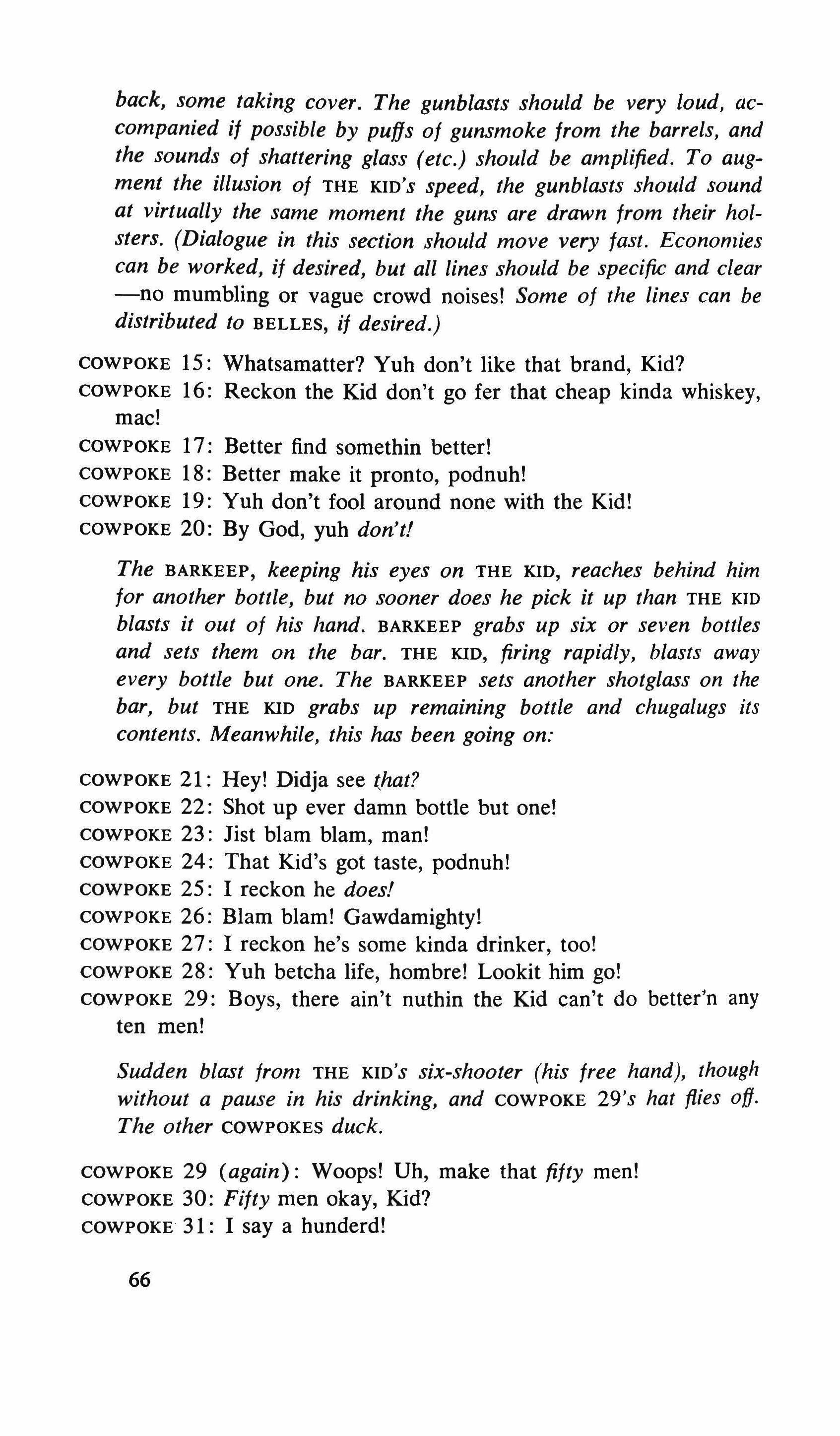
back, some taking cover. The gunblasts should be very loud, accompanied if possible by pUffs of gunsmoke from the barrels, and the sounds of shattering glass (etc.) should be amplified. To augment the illusion of THE KID'S speed, the gunblasts should sound at virtually the same moment the guns are drawn from their holsters. (Dialogue in this section should move very fast. Economies can be worked, if desired, but all lines should be specific and clear -no mumbling or vague crowd noises! Some of the lines can be distributed to BELLES, if desired.)
COWPOKE 15: Whatsamatter? Yuh don't like that brand, Kid?
COWPOKE 16: Reckon the Kid don't go fer that cheap kinda whiskey, mac!
COWPOKE 17: Better find somethin better!
COWPOKE 18: Better make it pronto, podnuh!
COWPOKE 19: Yuh don't fool around none with the Kid!
COWPOKE 20: By God, yuh don't!
The BARKEEP, keeping his eyes on THE KID, reaches behind him for another bottle, but no sooner does he pick it up than THE KID blasts it out of his hand. BARKEEP grabs up six or seven bottles and sets them on the bar. THE KID, firing rapidly, blasts away every bottle but one. The BARKEEP sets another shotglass on the bar, but THE KID grabs up remaining bottle and chugalugs its contents. Meanwhile, this has been going on:
COWPOKE 21: Hey! Didja see (hat?
COWPOKE 22: Shot up ever damn bottle but one!
COWPOKE 23: Jist blam blam, man!
COWPOKE 24: That Kid's got taste, podnuh!
COWPOKE 25: I reckon he does!
COWPOKE 26: Blam blam! Gawdamighty!
COWPOKE 27: I reckon he's some kinda drinker, too!
COWPOKE 28: Yuh betcha life, hombre! Lookit him go!
COWPOKE 29: Boys, there ain't nuthin the Kid can't do better'n any ten men!
Sudden blast from THE KID'S six-shooter (his free hand), though without a pause in his drinking, and COWPOKE 29's hat flies off· The other COWPOKES duck.
COWPOKE 29 (again): Woops! Uh, make that fifty men!
COWPOKE 30: Fifty men okay, Kid?
COWPOKE 31: I say a hunderd!
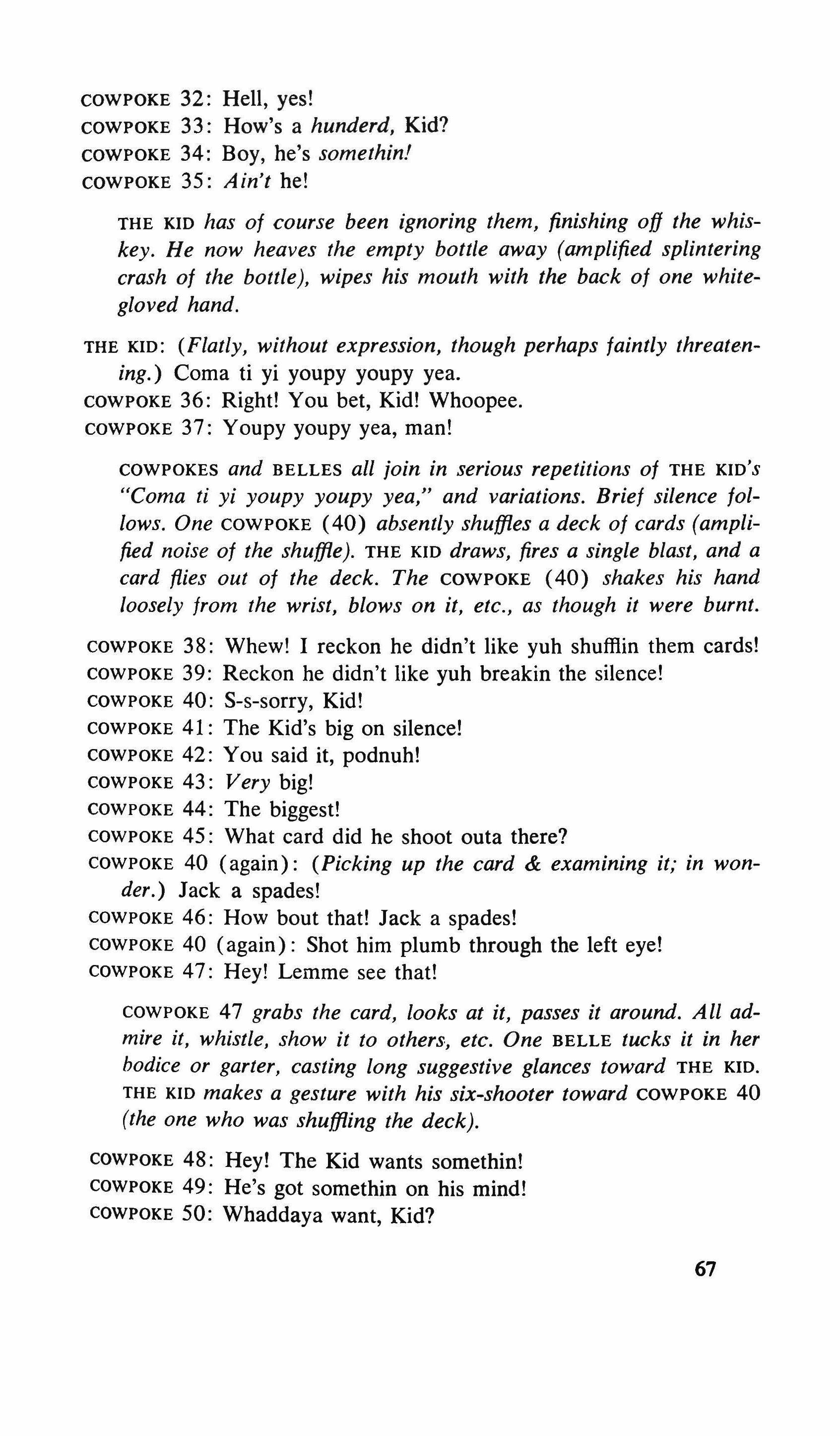
COWPOKE 32: Hell, yes!
COWPOKE 33: How's a hunderd, Kid?
COWPOKE 34: Boy, he's somethin!
COWPOKE 35: Ain't he!
THE KID has of course been ignoring them, finishing off the whiskey. He now heaves the empty bottle away (amplified splintering crash of the bottle), wipes his mouth with the back of one whitegloved hand.
THE KID: (Flatly, without expression, though perhaps faintly threatening.) Coma ti yi youpy youpy yea.
COWPOKE 36: Right! You bet, Kid! Whoopee.
COWPOKE 37: Youpy youpy yea, man!
COWPOKES and BELLES all join in serious repetitions of THE KID'S "Coma ti yi youpy youpy yea," and variations. Brief silence follows. One COWPOKE (40) absently shuffles a deck of cards (amplified noise of the shuffle). THE KID draws, fires a single blast, and a card flies out of the deck. The COWPOKE (40) shakes his hand loosely from the wrist, blows on it, etc., as though it were burnt.
COWPOKE 38: Whew! I reckon he didn't like yuh shuffiin them cards!
COWPOKE 39: Reckon he didn't like yuh breakin the silence!
COWPOKE 40: S-s-sorry, Kid!
COWPOKE 41: The Kid's big on silence!
COWPOKE 42: You said it, podnuh!
COWPOKE 43 : Very big!
COWPOKE 44: The biggest!
COWPOKE 45: What card did he shoot outa there?
COWPOKE 40 (again): (Picking up the card & examining it; in wonder.) Jack a spades!
COWPOKE 46: How bout that! Jack a spades!
COWPOKE 40 (again): Shot him plumb through the left eye!
COWPOKE 47: Hey! Lemme see that!
COWPOKE 47 grabs the card, looks at it, passes it around. All admire it, whistle, show it to others, etc. One BELLE tucks it in her bodice or garter, casting long suggestive glances toward THE KID. THE KID makes a gesture with his six-shooter toward COWPOKE 40 (the one who was shuffling the deck).
COWPOKE 48: Hey! The Kid wants somethin!
COWPOKE 49: He's got somethin on his mind!
COWPOKE 50: Whaddaya want, Kid?
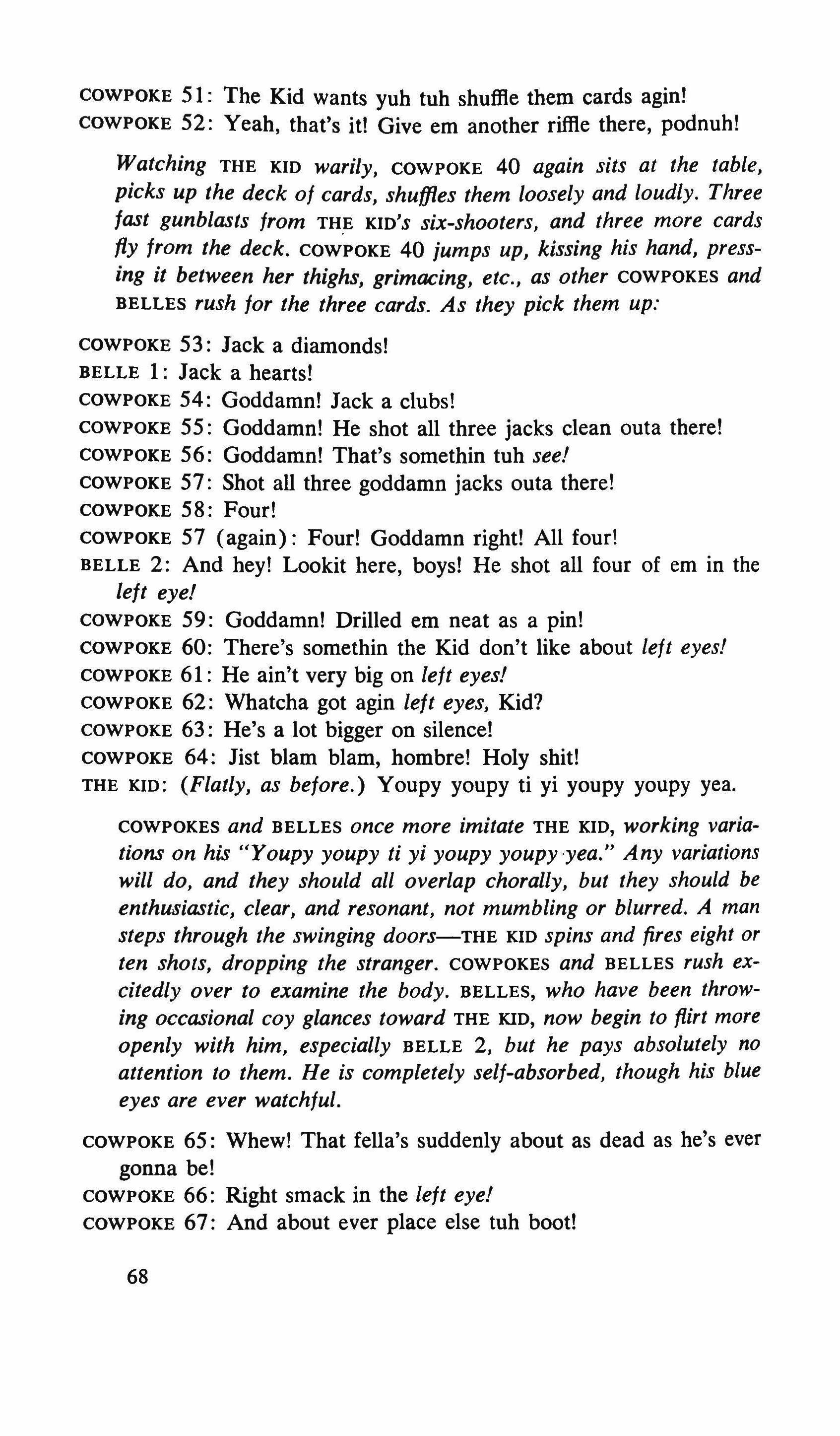
COWPOKE 51: The Kid wants yuh tuh shuffle them cards agin!
COWPOKE 52: Yeah, that's it! Give em another riffle there, podnuh!
Watching THE KID warily, COWPOKE 40 again sits at the table, picks up the deck of cards, shuffles them loosely and loudly. Three fast gunblasts from TH,E KID'S six-shooters, and three more cards fly from the deck. COWPOKE 40 jumps up, kissing his hand, pressing it between her thighs, grimacing, etc., as other COWPOKES and BELLES rush for the three cards. As they pick them up:
COWPOKE 53: Jack a diamonds!
BELLE 1: Jack a hearts!
COWPOKE 54: Goddamn! Jack a clubs!
COWPOKE 55: Goddamn! He shot all three jacks clean outa there!
COWPOKE 56: Goddamn! That's somethin tuh see!
COWPOKE 57: Shot all three goddamn jacks outa there!
COWPOKE 58: Four!
COWPOKE 57 (again): Four! Goddamn right! All four!
BELLE 2: And hey! Lookit here, boys! He shot all four of em in the left eye!
COWPOKE 59: Goddamn! Drilled em neat as a pin!
COWPOKE 60: There's somethin the Kid don't like about left eyes!
COWPOKE 61: He ain't very big on left eyes!
COWPOKE 62: Whatcha got agin left eyes, Kid?
COWPOKE 63: He's a lot bigger on silence!
COWPOKE 64: Jist blam blam, hombre! Holy shit!
THE KID: (Flatly, as before.) Youpy youpy ti yi youpy youpy yea.
COWPOKES and BELLES once more imitate THE KID, working variations on his "Youpy youpy ti yi youpy youpyyea:" Any variations will do, and they should all overlap chorally, but they should be enthusiastic, clear, and resonant, not mumbling or blurred. A man steps through the swinging doors-THE KID spins and fires eight or ten shots, dropping the stranger. COWPOKES and BELLES rush excitedly over to examine the body. BELLES, who have been throwing occasional coy glances toward THE KID, now begin to flirt more openly with him, especially BELLE 2, but he pays absolutely no attention to them. He is completely self-absorbed, though his blue eyes are ever watchful.
COWPOKE 65: Whew! That fella's suddenly about as dead as he's ever gonna be!
COWPOKE 66: Right smack in the left eye!
COWPOKE 67: And about ever place else tuh boot!
68
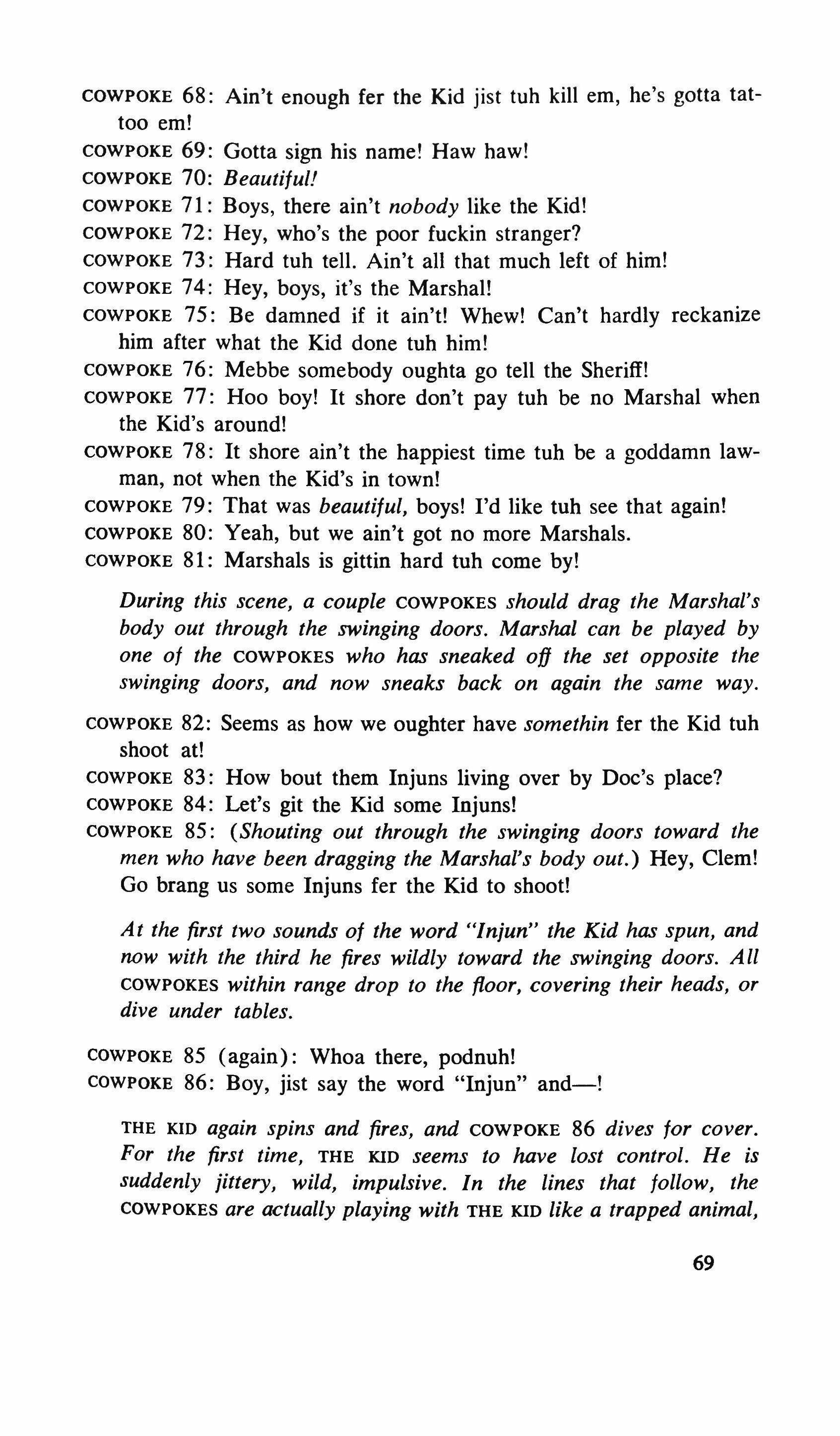
COWPOKE 68: Ain't enough fer the Kid jist tuh kill em, he's gotta tattoo em!
COWPOKE 69: Gotta sign his name! Haw haw!
COWPOKE 70: Beautiful!
COWPOKE 71: Boys, there ain't nobody like the Kid!
COWPOKE 72: Hey, who's the poor fuckin stranger?
COWPOKE 73: Hard tuh tell. Ain't all that much left of him!
COWPOKE 74: Hey, boys, it's the Marshal!
COWPOKE 75: Be damned if it ain't! Whew! Can't hardly reckanize him after what the Kid done tuh him!
COWPOKE 76: Mebbe somebody oughta go tell the Sheriff!
COWPOKE 77: Hoo boy! It shore don't pay tuh be no Marshal when the Kid's around!
COWPOKE 78: It shore ain't the happiest time tuh be a goddamn lawman, not when the Kid's in town!
COWPOKE 79: That was beautiful, boys! I'd like tuh see that again!
COWPOKE 80: Yeah, but we ain't got no more Marshals.
COWPOKE 81: Marshals is gittin hard tuh come by!
During this scene, a couple COWPOKES should drag the Marshal's body out through the swinging doors. Marshal can be played by one of the COWPOKES who has sneaked oD the set opposite the swinging doors, and now sneaks back on again the same way.
COWPOKE 82: Seems as how we oughter have somethin fer the Kid tuh shoot at!
COWPOKE 83: How bout them Injuns living over by Doc's place?
COWPOKE 84: Let's git the Kid some Injuns!
COWPOKE 85: (Shouting out through the swinging doors toward the men who have been dragging the Marshal's body out.) Hey, Clem! Go brang us some Injuns fer the Kid to shoot!
At the first two sounds of the word "Injun" the Kid has spun, and now with the third he fires wildly toward the swinging doors. All COWPOKES within range drop to the floor, covering their heads, or dive under tables.
COWPOKE 85 (again): Whoa there, podnuh!
COWPOKE 86: Boy, jist say the word "Injun" and-!
THE KID again spins and fires, and COWPOKE 86 dives for cover. For the first time, THE KID seems to have lost control. He is suddenly jittery, wild, impulsive. In the lines that follow, the COWPOKES are actually playing with THE KID like a trapped animal,
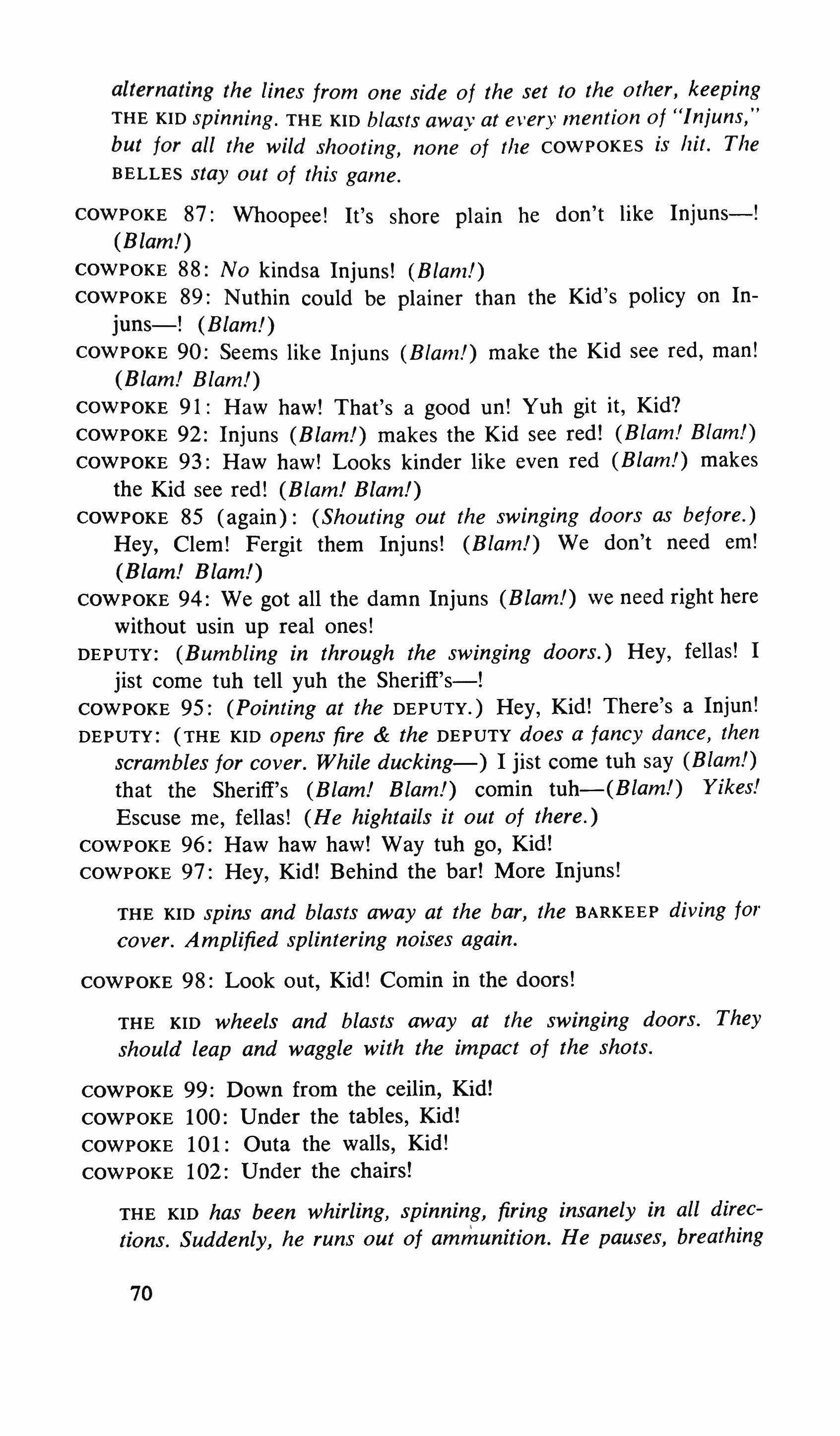
alternating the lines from one side of the set to the other, keeping THE KID spinning. THE KID blasts away at every mention of "lnjuns," but for all the wild shooting, none of the COWPOKES is hit. The BELLES stay out of this game.
COWPOKE 87: Whoopee! It's shore plain he don't like Injuns-! (Blam!)
COWPOKE 88: No kindsa Injuns! (Blam!)
COWPOKE 89: Nuthin could be plainer than the Kid's policy on Injuns-! (Blam!)
COWPOKE 90: Seems like Injuns (Blam!) make the Kid see red, man! (Blam! Blam!)
COWPOKE 91: Haw haw! That's a good un! Yuh git it, Kid?
COWPOKE 92: Injuns (Blam!) makes the Kid see red! (Blam! Blam!)
COWPOKE 93: Haw haw! Looks kinder like even red (Blam!) makes the Kid see red! (Blam! Blam!)
COWPOKE 85 (again): (Shouting out the swinging doors as before.) Hey, Clem! Fergit them Injuns! (Blaml) We don't need em! (Blam! Blam!)
COWPOKE 94: We got all the damn Injuns (Blam!) we need right here without usin up real ones!
DEPUTY: (Bumbling in through the swinging doors.) Hey, fellas! I jist come tuh tell yuh the Sheriff's-!
COWPOKE 95: (Pointing at the DEPUTY.) Hey, Kid! There's a Injun!
DEPUTY: (THE KID opens fire & the DEPUTY does a fancy dance, then scrambles for cover. While ducking-) I jist come tuh say (Blam!) that the Sheriff's (Blam! Blam!) comin tuh-(Blaml) Yikesl Escuse me, felIas! (He hightails it out of there.)
COWPOKE 96: Haw haw haw! Way tuh go, Kid!
COWPOKE 97: Hey, Kid! Behind the bar! More Injuns!
THE KID spins and blasts away at the bar, the BARKEEP diving [or cover. Amplified splintering noises again.
COWPOKE 98: Look out, Kid! Comin in the doors!
THE KID wheels and blasts away at the swinging doors. They should leap and waggle with the impact of the shots.
COWPOKE 99: Down from the ceilin, Kid!
COWPOKE 100: Under the tables, Kid!
COWPOKE 101: Outa the walls, Kid!
COWPOKE 102: Under the chairs!
THE KID has been whirling, spinning, firing insanely in all directions. Suddenly, he runs out of ammunition. He pauses, breathing
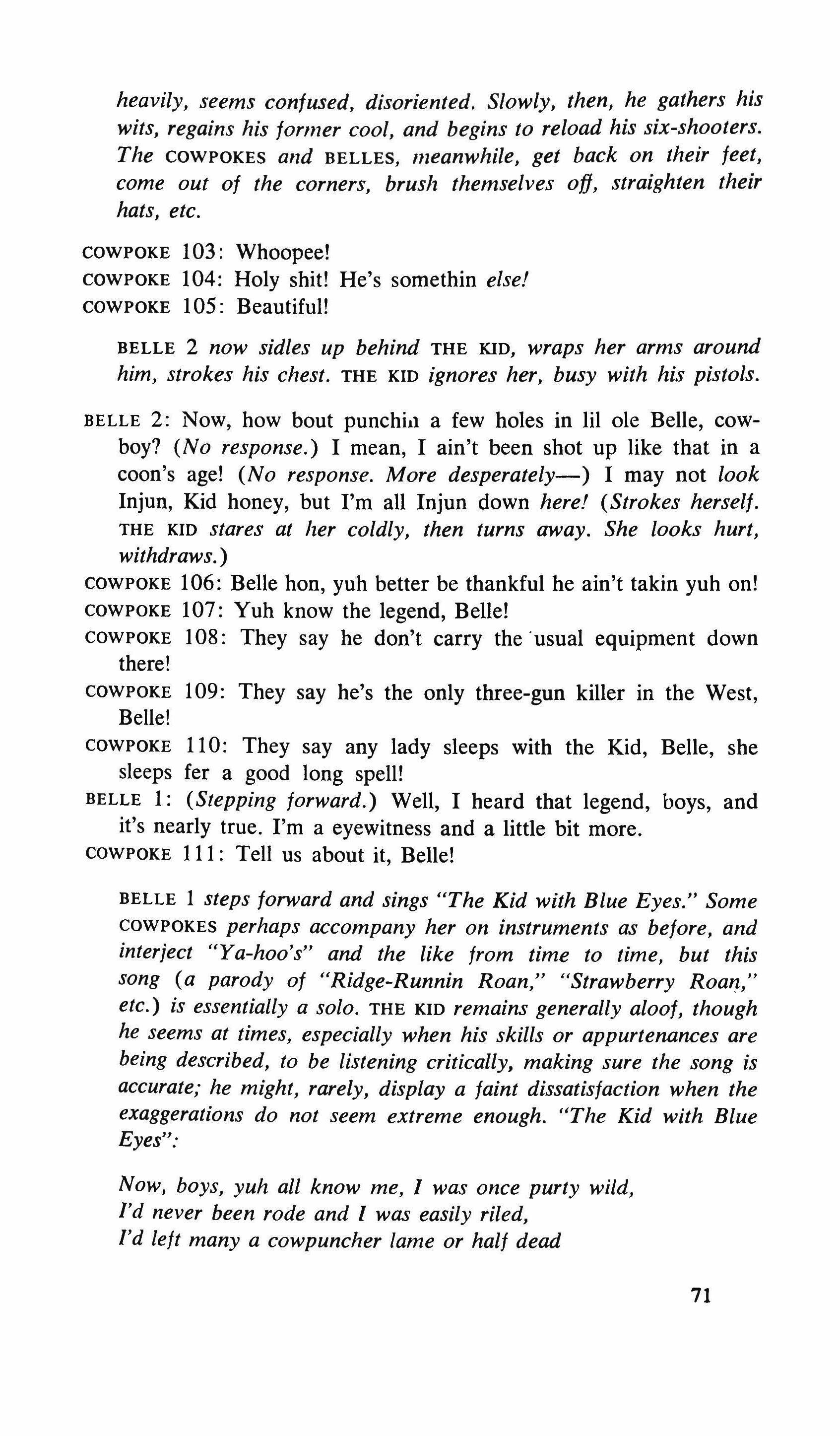
heavily, seems confused, disoriented. Slowly, then, he gathers his wits, regains his former cool, and begins to reload his six-shooters. The COWPOKES and BELLES, meanwhile, get back on their feet, come out of the corners, brush themselves off, straighten their hats, etc.
COWPOKE 103: Whoopee!
COWPOKE 104: Holy shit! He's somethin else!
COWPOKE 105: Beautiful!
BELLE 2 now sidles up behind THE KID, wraps her arms around him, strokes his chest. THE KID ignores her, busy with his pistols.
BELLE 2: Now, how bout punchin a few holes in lil ole Belle, cowboy? (No response.) I mean, I ain't been shot up like that in a coon's age! (No response. More desperately-) I may not look Injun, Kid honey, but I'm all Injun down here! (Strokes herseli, THE KID stares at her coldly, then turns away. She looks hurt, withdraws. )
COWPOKE 106: Belle hon, yuh better be thankful he ain't takin yuh on!
COWPOKE 107: Yuh know the legend, Belle!
COWPOKE 108: They say he don't carry the 'usual equipment down there!
COWPOKE 109: They say he's the only three-gun killer in the West, Belle!
COWPOKE 110: They say any lady sleeps with the Kid, Belle, she sleeps fer a good long spell!
BELLE 1: (Stepping forward.) Well, I heard that legend, boys, and it's nearly true. I'm a eyewitness and a little bit more.
COWPOKE 111: Tell us about it, Belle!
BELLE 1 steps forward and sings "The Kid with Blue Eyes." Some COWPOKES perhaps accompany her on instruments as before, and interject "Ya-hoo's" and the like from time to time, but this song (a parody of "Ridge-Runnin Roan," "Strawberry Roan," etc.) is essentially a solo. THE KID remains generally aloof, though he seems at times, especially when his skills or appurtenances are being described, to be listening critically, making sure the song is accurate; he might, rarely, display a faint dissatisfaction when the exaggerations do not seem extreme enough. "The Kid with Blue Eyes";
Now, boys, yuh all know me, I was once purty wild, I'd never been rode and I was easily riled, I'd left many a cowpuncher lame or half dead

From tryin tuh break me and take me tuh bed!
There wasn't a cowboy in the whole blessed West That could stay in the saddle, I'd busted the best; But, boys, lemme tell yuh, 1 got quite a surprise The day 1 got bestrid by the Kid with Blue Eyes!
He was tall as a jackpine and mean as a skunk, A blond blue-eyed beauty with plennya spunk! He trampled the vineyards and made the earth quake: As soon as 1 seen him 1 started tuh shake! His hands was like lightnin, he roared when he spoke!
They wasn't a [uzztail that he hadn't broke! They was ice in his heart and fire in his glance; He caused a tornado when he lowered his pants!
Well, his legs are like pillars, his cheeks are snow-white; His balls weigh a ton and pack real dynamite! The rest yuh kin guess, but they's one thing tuh tell: His weapon is big, but it's blacker than hell! Yes, blacker than hell, you boys heard me right! When 1 seen it it give me a turrible fright! And they's another thing more, I'm tellin yuh true: It is blacker than death and its eye is true blue!
Well, he leaps in the saddle and screws me down tight, And he crawls to muh middle, but 1 goes on the fight; I rears and 1 bucks and 1 goes up on high, Take a gyratin jump, I'm [eelin right spry! I goes tuh sun-fishin, I'm shore [eelin grand! He'll haita be good before my ass he'll brand! I rolls round on muh side and I'm high in the skies, But I still ain't unsaddled that Kid with Blue Eyes!
Well, I make one last try tuh get outa his grip, And I take the high dive, but he's clear got me whipped, Then we hit with a jar that shore gives me a scare, And I'm way down below him, I don't know jist where! I'm all busted up and I'm sore and I'm lame, That blond buckaroo is awinnin the game! 1 feel like a million years older that day When the Kid with Blue Eyes starts blastin away!
Now, I've told yuh it's black with a little blue eye, But it's worse than that, boys, and I'll tell yuh why:
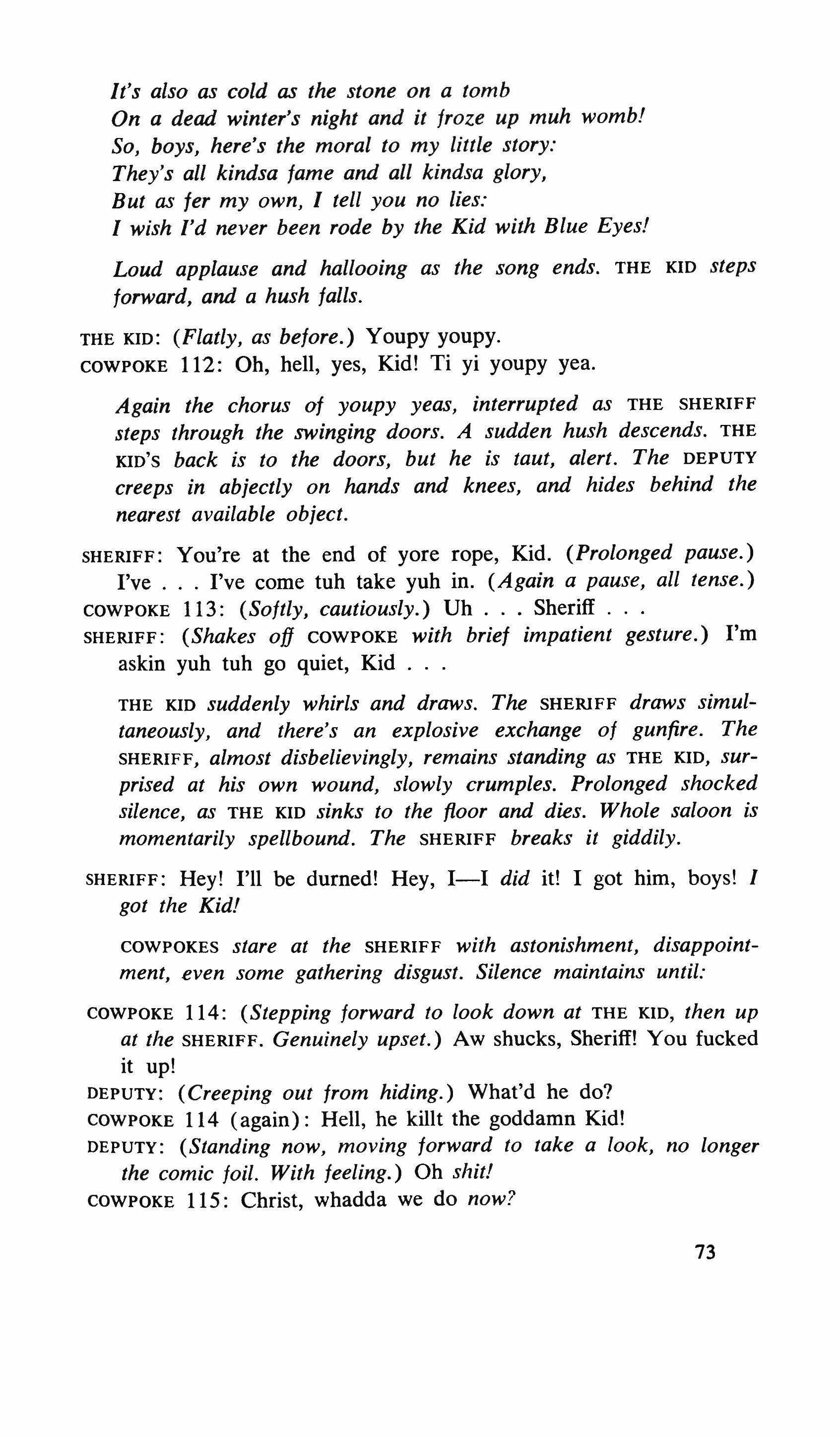
It's also as cold as the stone on a tomb
On a dead winter's night and it froze up muh womb! So, boys, here's the moral to my little story: They's all kindsa fame and all kindsa glory, But as fer my own, I tell you no lies: I wish I'd never been rode by the Kid with Blue Eyes!
Loud applause and hal/ooing as the song ends. THE KID steps forward, and a hush falls.
THE KID: (Flatly, as before.) Youpy youpy.
COWPOKE 112: Oh, hell, yes, Kid! Ti yi youpy yea.
Again the chorus of youpy yeas, interrupted as THE SHERIFF steps through the swinging doors. A sudden hush descends. THE KID'S back is to the doors, but he is taut, alert. The DEPUTY creeps in abjectly on hands and knees, and hides behind the nearest available object.
SHERIFF: You're at the end of yore rope, Kid. (Prolonged pause.) I've I've come tuh take yuh in. (Again a pause, all tense.)
COWPOKE 113: (Softly, cautiously.) Uh Sheriff
SHERIFF: (Shakes off COWPOKE with brief impatient gesture.) I'm askin yuh tuh go quiet, Kid
THE KID suddenly whirls and draws. The SHERIFF draws simultaneously, and there's an explosive exchange of gunfire. The SHERIFF, almost disbelievingly, remains standing as THE KID, surprised at his own wound, slowly crumples. Prolonged shocked silence, as THE KID sinks to the floor and dies. Whole saloon is momentarily spellbound. The SHERIFF breaks it giddily.
SHERIFF: Hey! I'll be durned! Hey, I-I did it! I got him, boys! I got the Kid!
COWPOKES stare at the SHERIFF with astonishment, disappointment, even some gathering disgust. Silence maintains until:
COWPOKE 114: (Stepping forward to look down at THE KID, then up at the SHERIFF. Genuinely upset.) Aw shucks, Sheriff! You fucked it up!
DEPUTY: (Creeping out from hiding.) What'd he do?
COWPOKE 114 (again): Hell, he killt the goddamn Kid!
DEPUTY: (Standing now, moving forward to take a look, no longer the comic foil. With feeling.) Oh shit!
COWPOKE 115: Christ, whadda we do now?
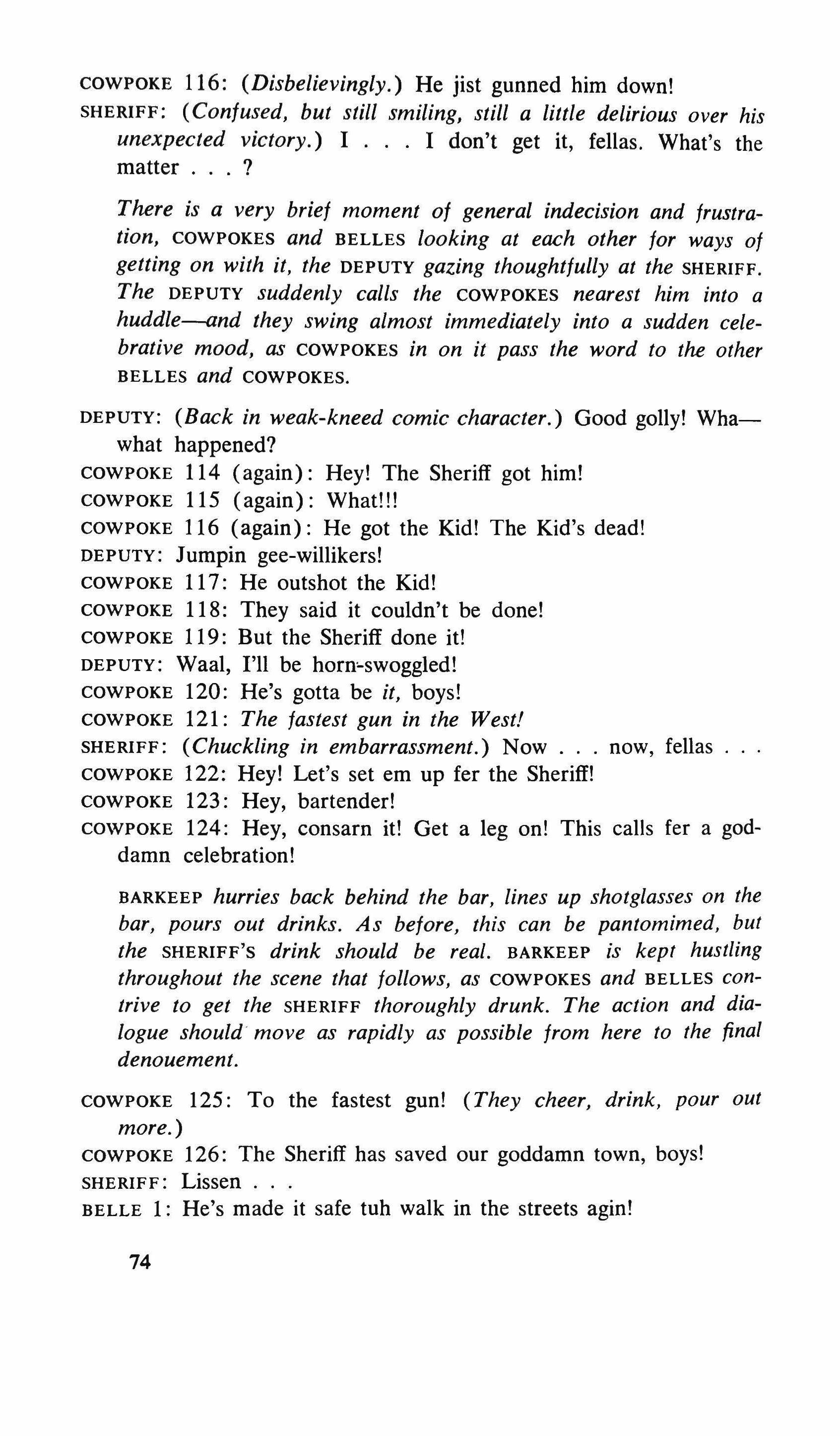
COWPOKE 116: (Disbelievingly.) He jist gunned him down!
SHERIFF: (Confused, but still smiling, still a little delirious over his unexpected victory.) I I don't get it, fellas. What's the matter ?
There is a very brief moment of general indecision and frustration, COWPOKES and BELLES looking at each other for ways of getting on with it, the DEPUTY gazing thoughtfully at the SHERIFF. The DEPUTY suddenly calls the COWPOKES nearest him into a huddle-s-and they swing almost immediately into a sudden celebrative mood, as COWPOKES in on it pass the word to the other BELLES and COWPOKES.
DEPUTY: (Back in weak-kneed comic character.) Good golly! Whawhat happened?
COWPOKE 114 (again): Hey! The Sheriff got him!
COWPOKE 115 (again): What!!!
COWPOKE 116 (again): He got the Kid! The Kid's dead!
DEPUTY: Jumpin gee-willikers!
COWPOKE 117: He outshot the Kid!
COWPOKE 118: They said it couldn't be done!
COWPOKE 119: But the Sheriff done it!
DEPUTY: Waal, I'll be horn-swoggled!
COWPOKE 120: He's gotta be it, boys!
COWPOKE 121: The fastest gun in the West!
SHERIFF: (Chuckling in embarrassment.) Now now, fellas COWPOKE 122: Hey! Let's set em up fer the Sheriff!
COWPOKE 123: Hey, bartender!
COWPOKE 124: Hey, consarn it! Get a leg on! This calls fer a goddamn celebration!
BARKEEP hurries back behind the bar, lines up shotglasses on the bar, pours out drinks. As before, this can be pantomimed, but the SHERIFF'S drink should be real. BARKEEP is kept hustling throughout the scene that follows, as COWPOKES and BELLES contrive to get the SHERIFF thoroughly drunk. The action and dialogue should move as rapidly as possible from here to the final denouement.
COWPOKE 125: To the fastest gun! (They cheer, drink, pour out more.)
COWPOKE 126: The Sheriff has saved our goddamn town, boys!
SHERIFF: Lissen
BELLE 1: He's made it safe tuh walk in the streets agin!
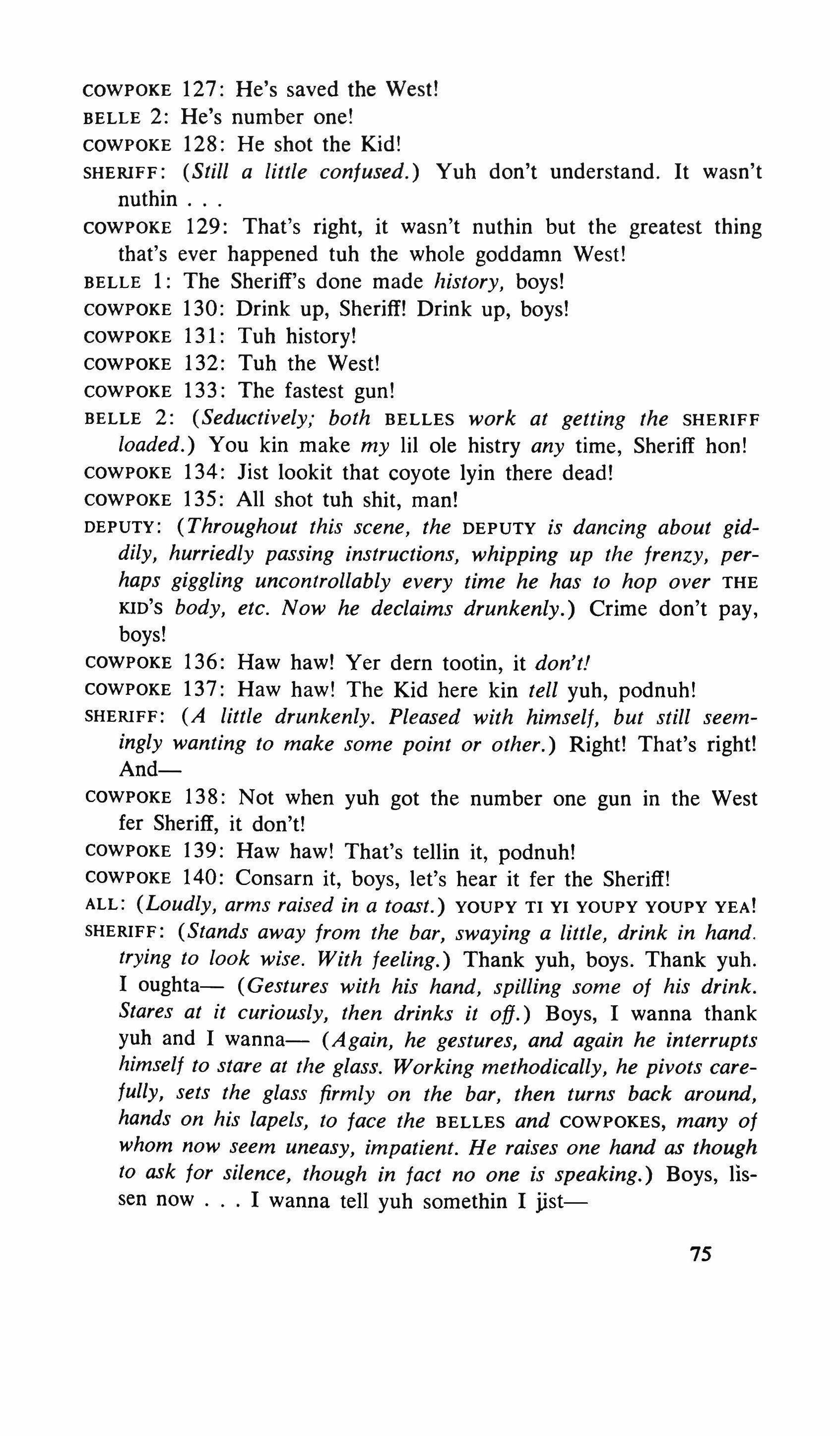
COWPOKE 127: He's saved the West!
BELLE 2: He's number one!
COWPOKE 128: He shot the Kid!
SHERIFF: (Still a little confused.) Yuh don't understand. It wasn't nuthin
COWPOKE 129: That's right, it wasn't nuthin but the greatest thing that's ever happened tuh the whole goddamn West!
BELLE 1: The Sheriff's done made history, boys!
COWPOKE 130: Drink up, Sheriff! Drink up, boys!
COWPOKE 131: Tuh history!
COWPOKE 132: Tuh the West!
COWPOKE 133: The fastest gun!
BELLE 2: (Seductively; both BELLES work at getting the SHERIFF loaded.) You kin make my IiI ole histry any time, Sheriff hon!
COWPOKE 134: Jist lookit that coyote lyin there dead!
COWPOKE 135: All shot tuh shit, man!
DEPUTY: (Throughout this scene, the DEPUTY is dancing about giddily, hurriedly passing instructions, whipping up the frenzy, perhaps giggling uncontrollably every time he has to hop over THE KID'S body, etc. Now he declaims drunkenly.) Crime don't pay, boys!
COWPOKE 136: Haw haw! Yer dern tootin, it don't!
COWPOKE 137: Haw haw! The Kid here kin tell yuh, podnuh!
SHERIFF: (A little drunkenly. Pleased with himself, but still seemingly wanting to make some point or other.) Right! That's right! And-
COWPOKE 138: Not when yuh got the number one gun in the West fer Sheriff, it don't!
COWPOKE 139: Haw haw! That's tellin it, podnuh!
COWPOKE 140: Consarn it, boys, let's hear it fer the Sheriff!
ALL: (Loudly, arms raised in a toast.) YOUPY TI YI YOUPY YOUPY YEA!
SHERIFF: (Stands away from the bar, swaying a little, drink in hand. trying to look wise. With feeling.) Thank yuh, boys. Thank yuh. I oughta- (Gestures with his hand, spilling some of his drink. Stares at it curiously, then drinks it off.) Boys, I wanna thank yuh and I wanna- (Again, he gestures, and again he interrupts himself to stare at the glass. Working methodically, he pivots carefully, sets the glass firmly on the bar, then turns back around, hands on his lapels, to face the BELLES and COWPOKES, many of whom now seem uneasy, impatient. He raises one hand as though to ask for silence, though in fact no one is speaking.) Boys, lissen now I wanna tell yuh somethin I j,ist-
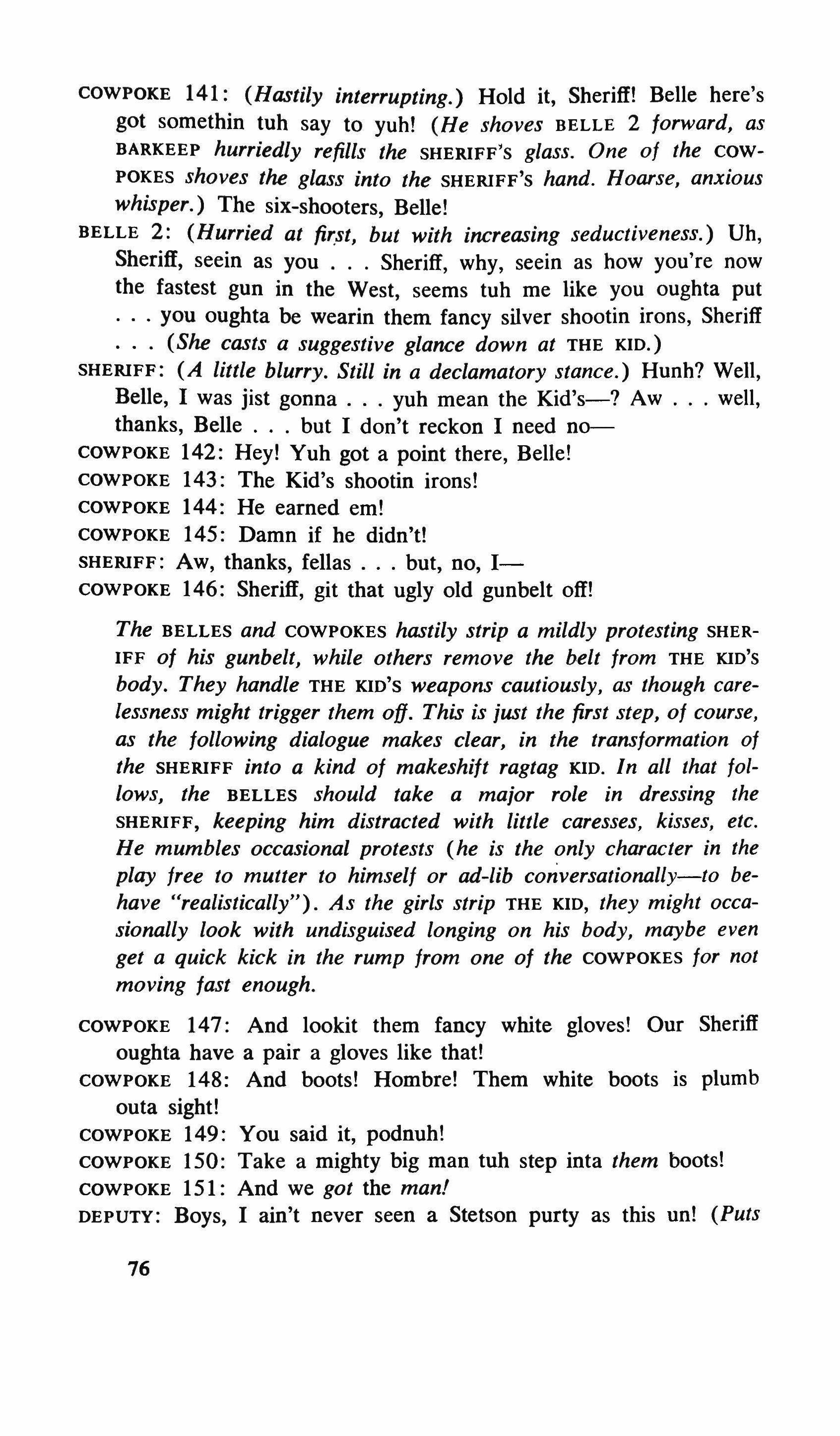
COWPOKE 141: (Hastily interrupting.) Hold it, Sheriff! Belle here's got somethin tuh say to yuh! (He shoves BELLE 2 forward, as BARKEEP hurriedly refills the SHERIFF'S glass. One of the cowPOKES shoves the glass into the SHERIFF'S hand. Hoarse, anxious whisper.) The six-shooters, Belle!
BELLE 2: (Hurried at first, but with increasing seductiveness.) Uh, Sheriff, seein as you Sheriff, why, seein as how you're now the fastest gun in the West, seems tuh me like you oughta put you oughta be wearin them fancy silver shootin irons, Sheriff (She casts a suggestive glance down at THE KID.)
SHERIFF: (A little blurry. Still in a declamatory stance.) Hunh? Well, Belle, I was jist gonna yuh mean the Kid's-? Aw well, thanks, Belle but I don't reckon I need no-
COWPOKE 142: Hey! Yuh got a point there, Belle!
COWPOKE 143: The Kid's shootin irons!
COWPOKE 144: He earned em!
COWPOKE 145: Damn if he didn't!
SHERIFF: Aw, thanks, fellas but, no, 1-
COWPOKE 146: Sheriff, git that ugly old gunbelt off!
The BELLES and COWPOKES hastily strip a mildly protesting SHERIFF of his gunbelt, while others remove the belt from THE KID'S body. They handle THE KID'S weapons cautiously, as though carelessness might trigger them off. This is just the first step, of course, as the following dialogue makes clear, in the transformation of the SHERIFF into a kind of makeshift ragtag KID. In all that follows, the BELLES should take a major role in dressing the SHERIFF, keeping him distracted with little caresses, kisses, etc. He mumbles occasional protests (he is the only character in the play free to mutter to himself or ad-lib conversationally-to behave "realistically"). As the girls strip THE KID, they might occasionally look with undisguised longing on his body, maybe even get a quick kick in the rump from one of the COWPOKES for not moving fast enough.
COWPOKE 147: And lookit them fancy white gloves! Our Sheriff oughta have a pair a gloves like that!
COWPOKE 148: And boots! Hombre! Them white boots is plumb outa sight!
COWPOKE 149: You said it, podnuh!
COWPOKE 150: Take a mighty big man tub step inta them boots!
COWPOKE 151: And we got the man!
DEPUTY: Boys, I ain't never seen a Stetson purty as this un! (Puts

THE KID'S hat on his own head and it falls down around his ears.)
COWPOKE 152: (Grabbing THE KID'S hat oD the DEPUTY'S head. Angrily.) Whoa there! Whaddaya doin?
COWPOKE 153: Who do yuh think yuh are, cowboy?
COWPOKE 154: Did you outgun the Kid, podnuh?
DEPUTY: (Shamefacedly.) Well uh no, but-
COWPOKE 152 (again): Only one man in town got a right tuh that hat, hombre, and you ain't him! (Clamps the hat grandly on the SHERIFF'S head.)
COWPOKE 155: (Admiring the SHERIFF in his new duds.) Hey now! Take a lookit that, boys!
COWPOKE 156: Hey, he's gittin there!
SHERIFF: Now jist hold on one minute-!
BELLE 1: Jumpin gee-willikers, ain't he a pitcher!
COWPOKE 157: Here, lemme see him! (They spin him about, getting him dizzy and confused.)
COWPOKE 158: No, turn him thissaway-hey now!
COWPOKE 159: What about the pants and shirt?
COWPOKE 160: Yuh reckon he needs em?
SHERIFF: Now, doggone it, fellas-!
BELLE 1: Hey, boys, I seen some right purty critters in my day, but I ain't never seen nuthin tuh match this un!
BELLE 2: Ain't he somethin, though!
The BELLES caress him, turn him about, while the COWPOKES continue to strip THE KID. The SHERIFF breaks free. He is flustered, excited, troubled, breathing irregularly.
SHERIFF: Now, knock it oD, I said!
The COWPOKES leave THE KID lie, turn to attend the SHERIFF. He calms, but watches them warily. They are alert, intent, sober. The SHERIFF is struggling to be clear-headed about it all, but is ultimately too befuddled to pull it oD the way he'd like.
SHERIFF: Okay. Okay. I know yuh mean well. I know. Appreciation. I understand. You're thinkin, what kin we do fer the Sheriff, after all you know, after what he's done fer us. Killt the Kid and all. Hell, boys, I'd feel the same way, any decent man would.
COWPOKE 161: Aw, lissen, fergit it, Sheriff! Drink up! (They all press forward again, picking up in the game where they left oD.)
To the Sheriff, boys!

COWPOKE 162: The fastestSHERIFF: (Authoritatively.) No, dammit, hold on! (They stop short.) I ain't said muh piece, boys! (They shrug, glance impatiently at one another.) So jist take a grip on yer feelins there and hear me out, cuz it's somethin yuh gotta know. (He pauses, as though thinking it all out, swaying some, belching.) What I wanted to say was this. Somethin like this. Well, okay. It was me or the Kid. That's easy tuh follow. And the Kid got it. But but it coulda jist as easy been me, see? (He pauses, frowning.) No, that ain't it. That ain't exactly right. (Squeezes shut his eyes, concentrating, then opens them again.) If I didn't know you boys better, I'd say you was tryin tuh git me drunk! (He chuckles loosely, but laughs alone.) See, what I'm tryin tuh tell yuh, boys, is they ain't no such thing as the fastest gun in the West. That's what I'm tryin tuh say! Me and the Kid there, see, it jist happened like. It don't mean a thing. It it's purty hard explainin it to yuh, boys, but it's important. It's very very important. (He hesitates, as though losing it again, rubs his face in an effort to clear his head. He gazes down on the six-shooters on his hips, cups his hands as though to draw. COWPOKES and BELLES shrink back as though getting ready to duck for cover. But the SHERIFF doesn't draw; he looks up blearily at them again and proceeds with his revelations.) Right. The fastest gun. We jist make all that up. See, yuh gotta learn that. I seen it soon as I seen the Kid go down. If somebody'd only told the Kid, why, mighta saved his life. Now now, I know how bad you wanna believe it. I ain't no different, boys, I wanna believe it, too. I mean, I understand why you're fixin me up in the Kid's duds, cuz it's somethin important to yuh, and yuh don't wanna lose it; I know. And I like these duds. I mean, it'd be easy fer me tuh pretend, tuh take yuh all in, make yuh all think I'm somethin I ain't, and all the easier cuz it's what you want me tuh do. You think yuh need it. But you're wrong, boys! Yuh gotta face up to it! I don't wanna hurt yuh, but yuh gotta know. I love this town, but sometimes love hurts, don't it? Sometimes love makes yuh do things, don't make yuh feel as good as it ought. (He is getting lost again.) What I'm tryin tuh say is, shootin the Kid ain't enough, see? It's like love-
DEPUTY: (Coldly.) Shut up, Sheriff.
SHERIFF: Hunh?
DEPUTY: (Stepping forward to confront the SHERIFF.) I said, shut yer fuckin mouth!
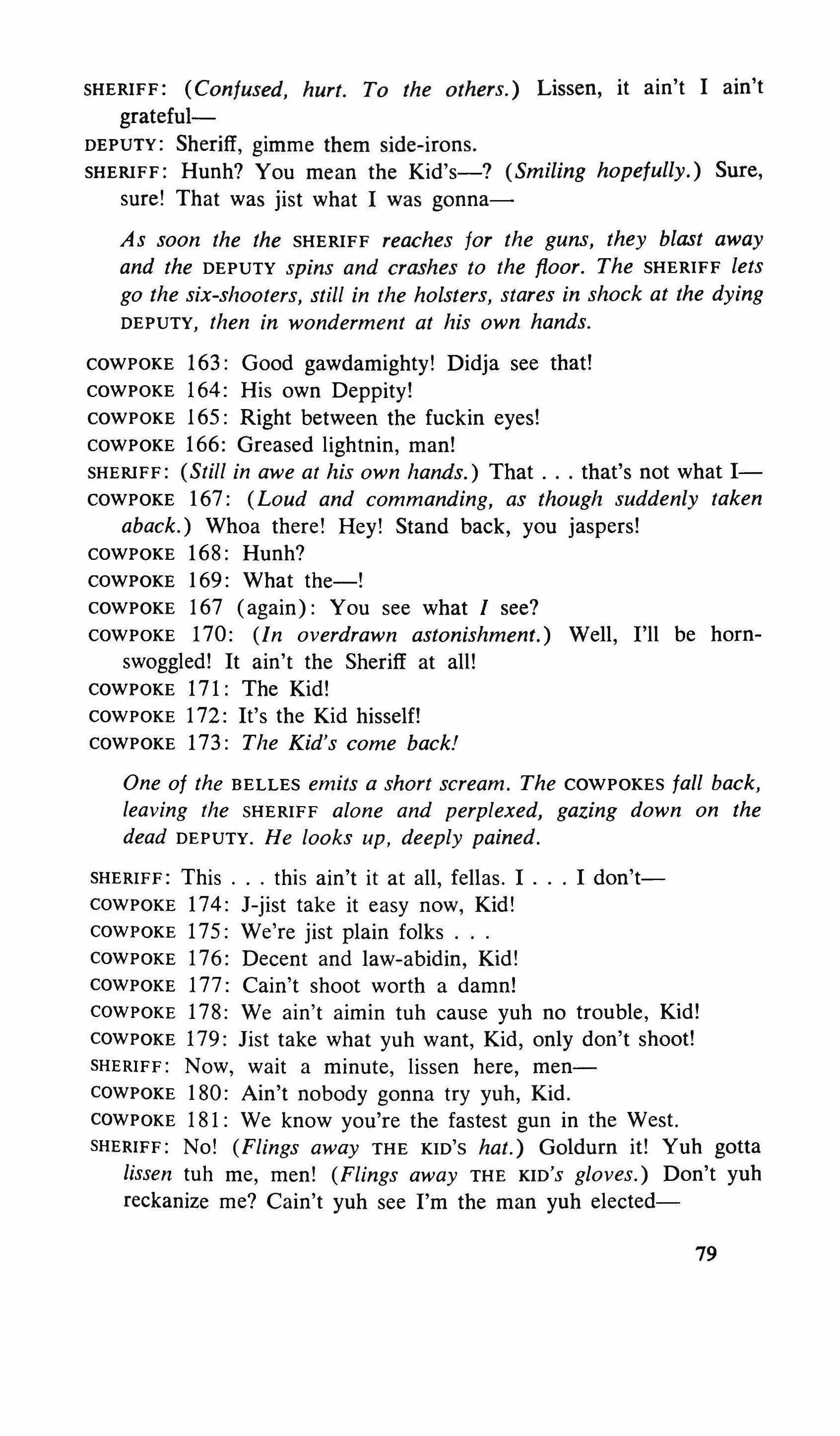
SHERIFF: (Confused, hurt. To the others.) Lissen, it ain't I ain't grateful-
DEPUTY: Sheriff, gimme them side-irons.
SHERIFF: Hunh? You mean the Kid's-? (Smiling hopefully.) Sure, sure! That was jist what I was gonna-
As soon the the SHERIFF reaches for the guns, they blast away and the DEPUTY spins and crashes to the floor. The SHERIFF lets go the six-shooters, still in the holsters, stares in shock at the dying DEPUTY, then in wonderment at his own hands.
COWPOKE 163: Good gawdamighty! Didja see that!
COWPOKE 164: His own Deppity!
COWPOKE 165: Right between the fuckin eyes!
COWPOKE 166: Greased lightnin, man!
SHERIFF: (Still in awe at his own hands.) That that's not what 1-
COWPOKE 167: (Loud and commanding, as though suddenly taken aback.) Whoa there! Hey! Stand back, you jaspers!
COWPOKE 168: Hunh?
COWPOKE 169: What the-!
COWPOKE 167 (again): You see what I see?
COWPOKE 170: (In overdrawn astonishment.i Well, I'll be hornswoggled! It ain't the Sheriff at all!
COWPOKE 171: The Kid!
COWPOKE 172: It's the Kid hisself!
COWPOKE 173: The Kid's come back!
One of the BELLES emits a short scream. The COWPOKES fall back, leaving the SHERIFF alone and perplexed, gazing down on the dead DEPUTY. He looks up, deeply pained.
SHERIFF: This this ain't it at all, fellas. I I don't
COWPOKE 174: J-jist take it easy now, Kid!
COWPOKE 175: We're jist plain folks
COWPOKE 176: Decent and law-abidin, Kid!
COWPOKE 177: Cain't shoot worth a damn!
COWPOKE 178: We ain't aimin tuh cause yuh no trouble, Kid!
COWPOKE 179: Jist take what yuh want, Kid, only don't shoot!
SHERIFF: Now, wait a minute, lissen here, men-
COWPOKE 180: Ain't nobody gonna try yuh, Kid.
COWPOKE 181: We know you're the fastest gun in the West.
SHERIFF: No! (Flings away THE KID'S hat.) Goldurn it! Yuh gotta lissen tuh me, men! (Flings away THE KID'S gloves.) Don't yuh reckanize me? Cain't yuh see I'm the man yuh elected-
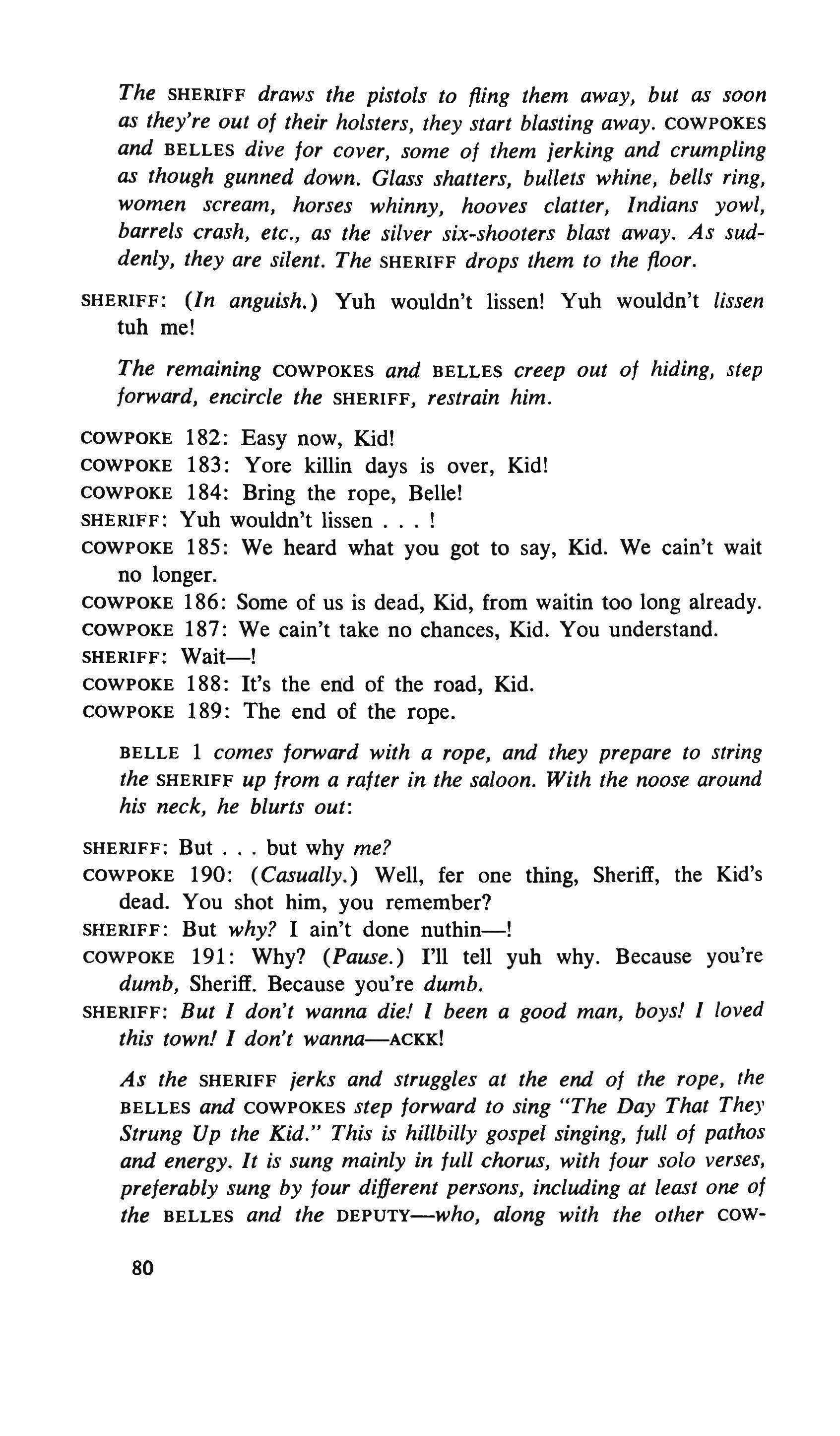
The SHERIFF draws the pistols to fling them away, but as soon as they're out of their holsters, they start blasting away. COWPOKES and BELLES dive for cover, some of them jerking and crumpling as though gunned down. Glass shatters, bullets whine, bells ring, women scream, horses whinny, hooves clatter, Indians yowl, barrels crash, etc., as the silver six-shooters blast away. As suddenly, they are silent. The SHERIFF drops them to the floor.
SHERIFF: (In anguish.) Yuh wouldn't lissen! Yuh wouldn't lissen tuh me!
The remaining COWPOKES and BELLES creep out of hiding, step forward, encircle the SHERIFF, restrain him.
COWPOKE 182: Easy now, Kid!
COWPOKE 183: Yore killin days is over, Kid!
COWPOKE 184: Bring the rope, Belle!
SHERIFF: Yuh wouldn't lissen !
COWPOKE 185: We heard what you got to say, Kid. We cain't wait no longer.
COWPOKE 186: Some of us is dead, Kid, from waitin too long already.
COWPOKE 187: We cain't take no chances, Kid. You understand.
SHERIFF: Wait-!
COWPOKE 188: It's the end of the road, Kid.
COWPOKE 189: The end of the rope.
BELLE 1 comes forward with a rope, and they prepare to string the SHERIFF up from a rafter in the saloon. With the noose around his neck, he blurts out:
SHERIFF: But but why me?
COWPOKE 190: (Casually.) Well, fer one thing, Sheriff, the Kid's dead. You shot him, you remember?
SHERIFF: But why? I ain't done nuthin-!
COWPOKE 191: Why? (Pause.) I'll tell yuh why. Because you're dumb, Sheriff. Because you're dumb.
SHERIFF: But I don't wanna die! I been a good man, boys! I loved this town! 1 don't wanna-AcKK!
As the SHERIFF jerks and struggles at the end of the rope, the BELLES and COWPOKES step forward to sing "The Day That They Strung Up the Kid." This is hillbilly gospel singing, full of pathos and energy. It is sung mainly in full chorus, with four solo verses, preferably sung by four different persons, including at least one of the BELLES and the DEPUTY-who, along with the other cow-

POKES who have fallen (but not THE KID), now rise and join in.
One of the COWPOKES pulls his gun while the guitars are warming up and shoots the SHERIFF in the belly to stop his jerking around.
"The Day That They Strung Up the Kid:"
Let us study the Kid's wondrous story!
Ain't nobody ever done what he did!
The West was a place of grace and glory Till the day that they strung up the Kid!
SOLO: He was mean, he was magic, he was real! Sweet Jesus, he was somethin tuh see! He was white as the lilies of the field, And as pure and as cold and as free!
SOLO: He taught us that a man must live for beauty! You ain't worth shit, if you're only second best! The law ain't nuthin but the guy who's fastest shootin! If millions croak, well, that's the legend of the West!
So jist reflect upon the Kid's wondrous story!
Ain't no cowpoke ever done what he did!
The West was a place of grace and glory!
Till the day that they strung up the Kid!
SOLO: He gunned down moralists and misfits and merchants, Egalitarians he ground up for manure! He cleansed the country of philosophers and virgins, And robbed the rich, and jist fer fun shot up the poor!
SOLO: But though they hung him up and blew his balls to heaven, His story, they say, may not be done! They say the world will be his to fuck forever! For the Spirit of the West goes marchin on!
So bethink yuh of the Kid's wondrous story!
Ain't no cowboy ever done what he did!
The West will ever be a place of grace and glory, Since the day that they strung up the Kid! END

To Cesar Ortiz-Tinoco
The poet-a political animal? Yes! Yes!
The way you said that phrase undressed me completely. There I was naked in a painting of Orozco holding up a torch which was my own arm burning above the elbow.
And you yourself were Father Hidalgo tolling the church-bell of Dolores, pulling yourself straight up into the air with your own emotion.
At a moment like that, who would not agree?
yes-yes-a poet is a political animal.
But he is as many other kinds of animal as possible too.
A suffering animal-delegated to take on the madness and feckless atrocity of us all, and of everything.
A hungry animal.
Everything at which he looks with passion he desires to eat.
A living animal-almost so much more alive than he or anyone else can have the patience to endure.
A traveling animal, emitting and transmitting Marquesas and Popocatepetls like bubbles in his afterglow. A fighting animal. He is always down at the back fence gathering handfuls of ass-manure. He is able to throw three hundred yards and strike his enemy in the eye without fail.
A capricious animal. Here he is sniffing at the holes of bad fortune and good fortune, he is trying to decide which will taste better and is worth digging out of the ground.
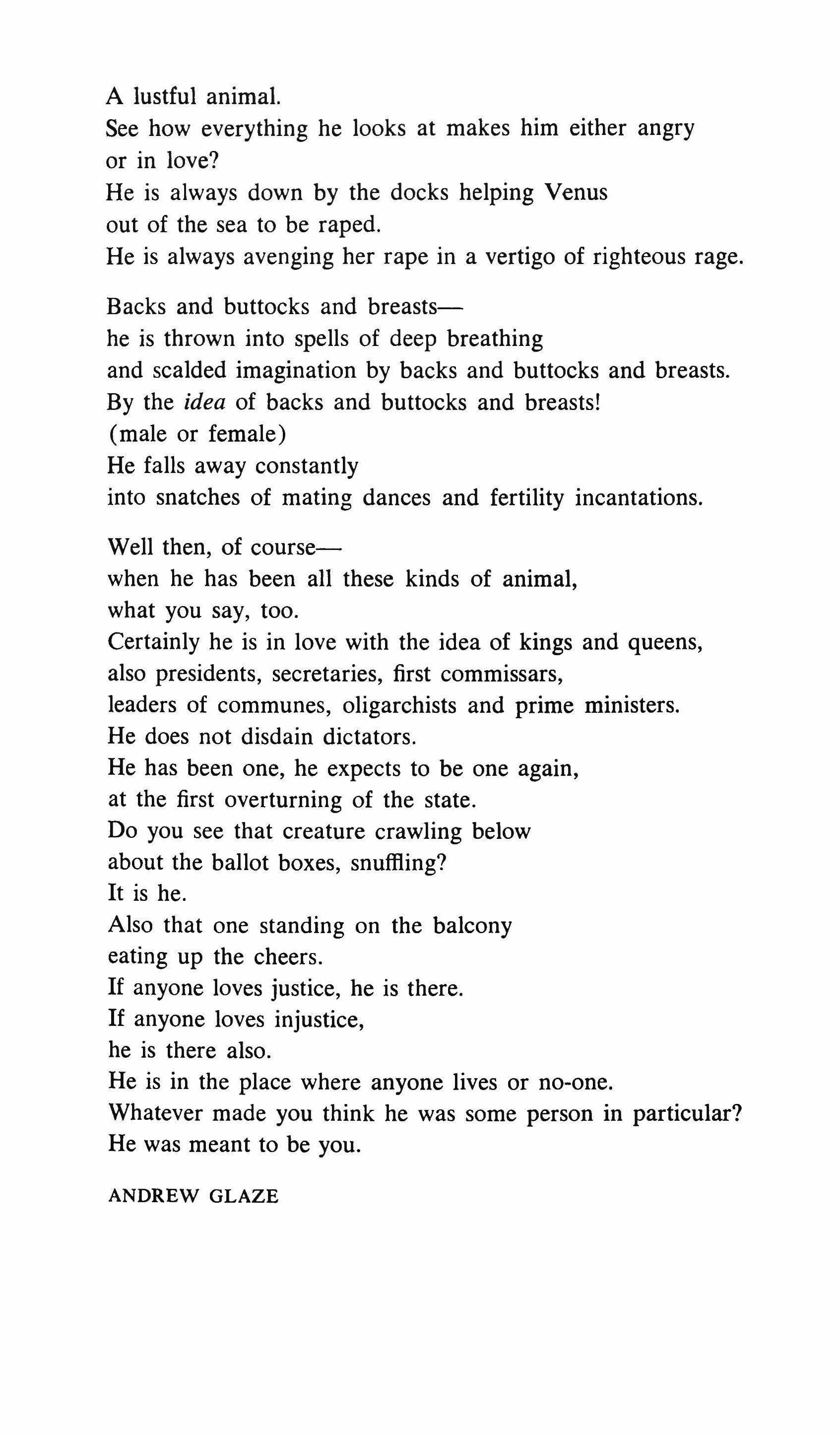
A lustful animal.
See how everything he looks at makes him either angry or in love?
He is always down by the docks helping Venus out of the sea to be raped. He is always avenging her rape in a vertigo of righteous rage.
Backs and buttocks and breastshe is thrown into spells of deep breathing and scalded imagination by backs and buttocks and breasts. By the idea of backs and buttocks and breasts! (male or female)
He falls away constantly into snatches of mating dances and fertility incantations.
Well then, of coursewhen he has been all these kinds of animal, what you say, too.
Certainly he is in love with the idea of kings and queens, also presidents, secretaries, first commissars, leaders of communes, oligarchists and prime ministers. He does not disdain dictators. He has been one, he expects to be one again, at the first overturning of the state. Do you see that creature crawling below about the ballot boxes, snuffling? It is he. Also that one standing on the balcony eating up the cheers. If anyone loves justice, he is there. If anyone loves injustice, he is there also. He is in the place where anyone lives or no-one.
Whatever made you think he was some person in particular? He was meant to be you.
ANDREW GLAZE
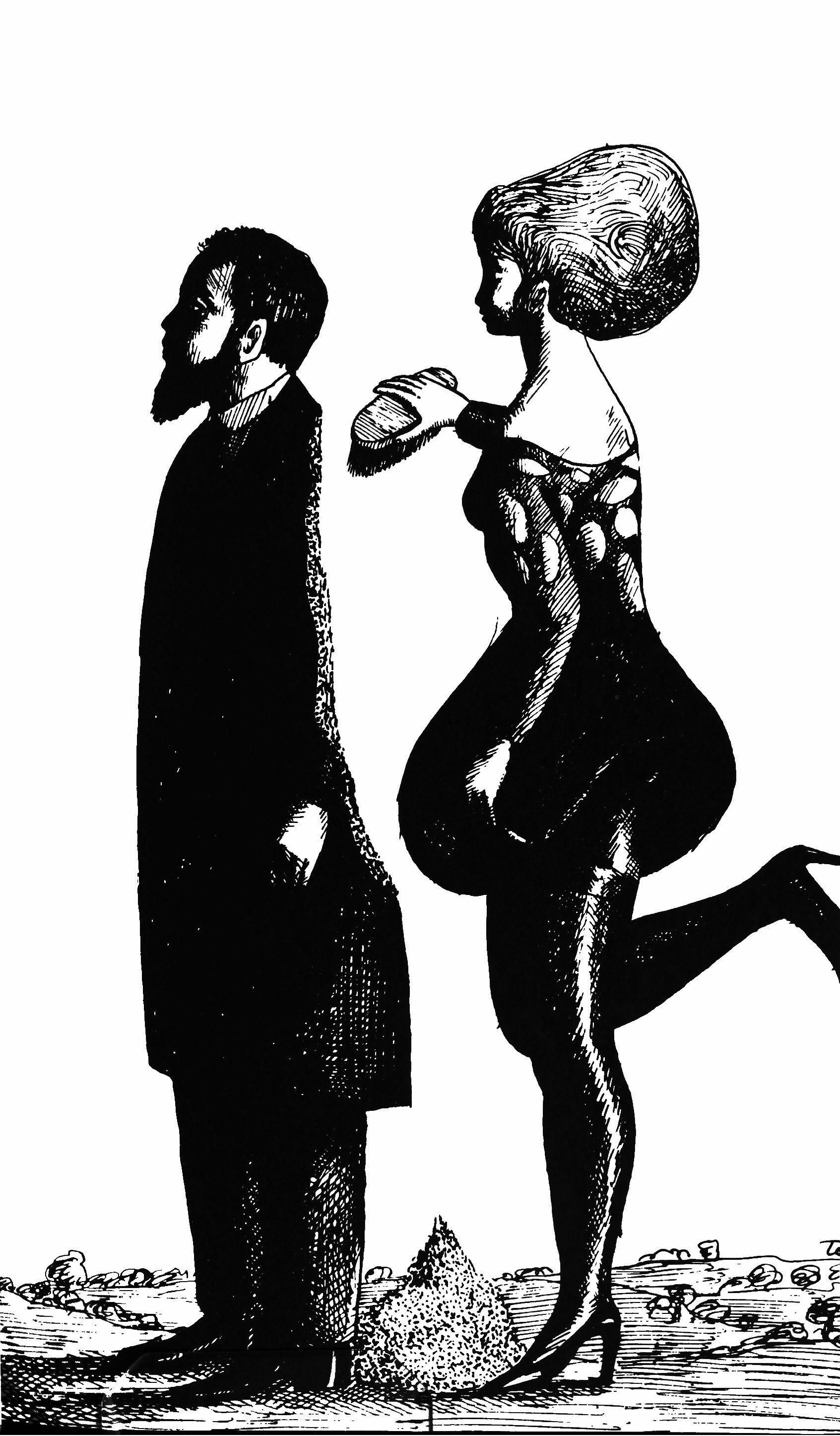
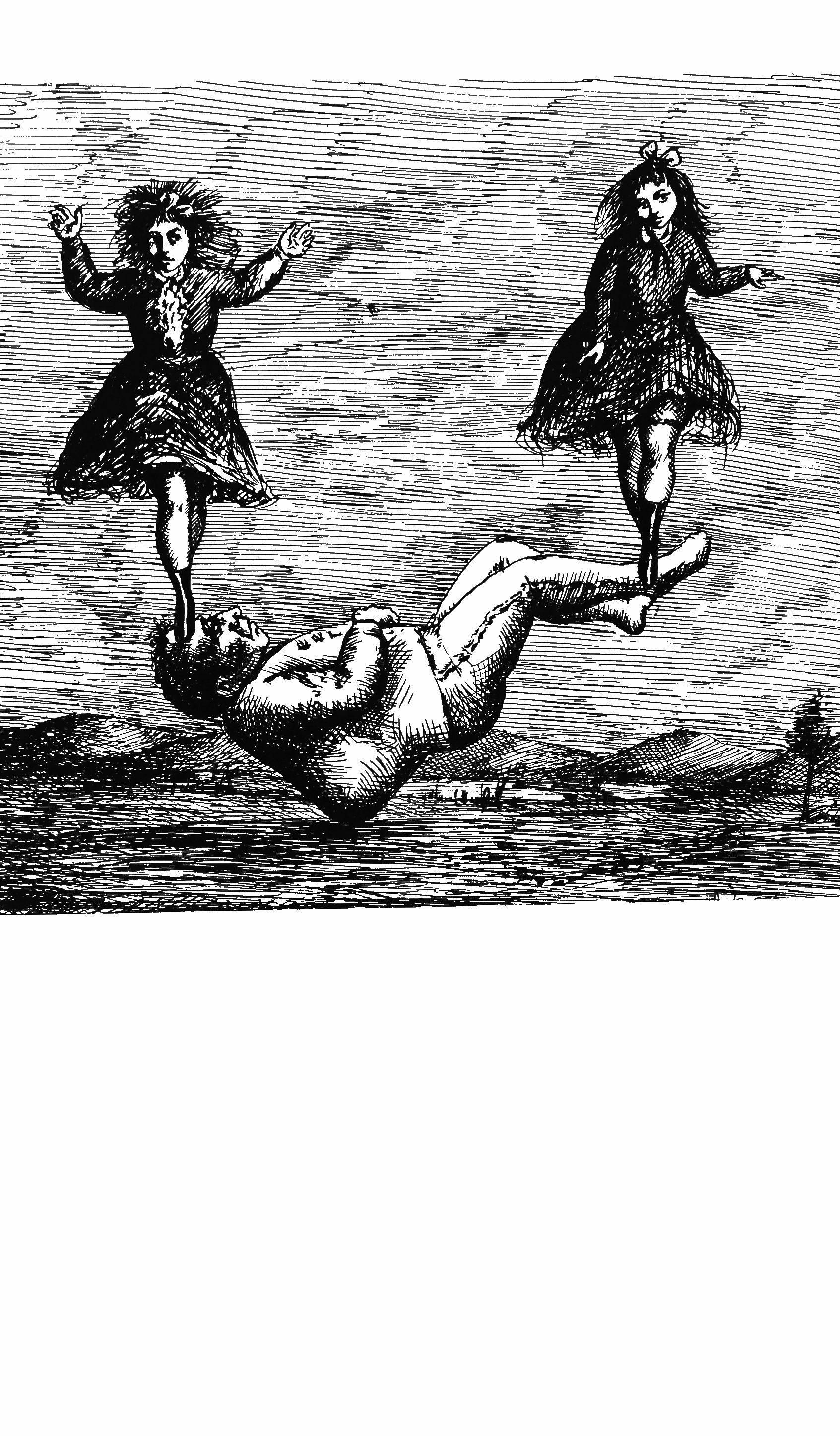
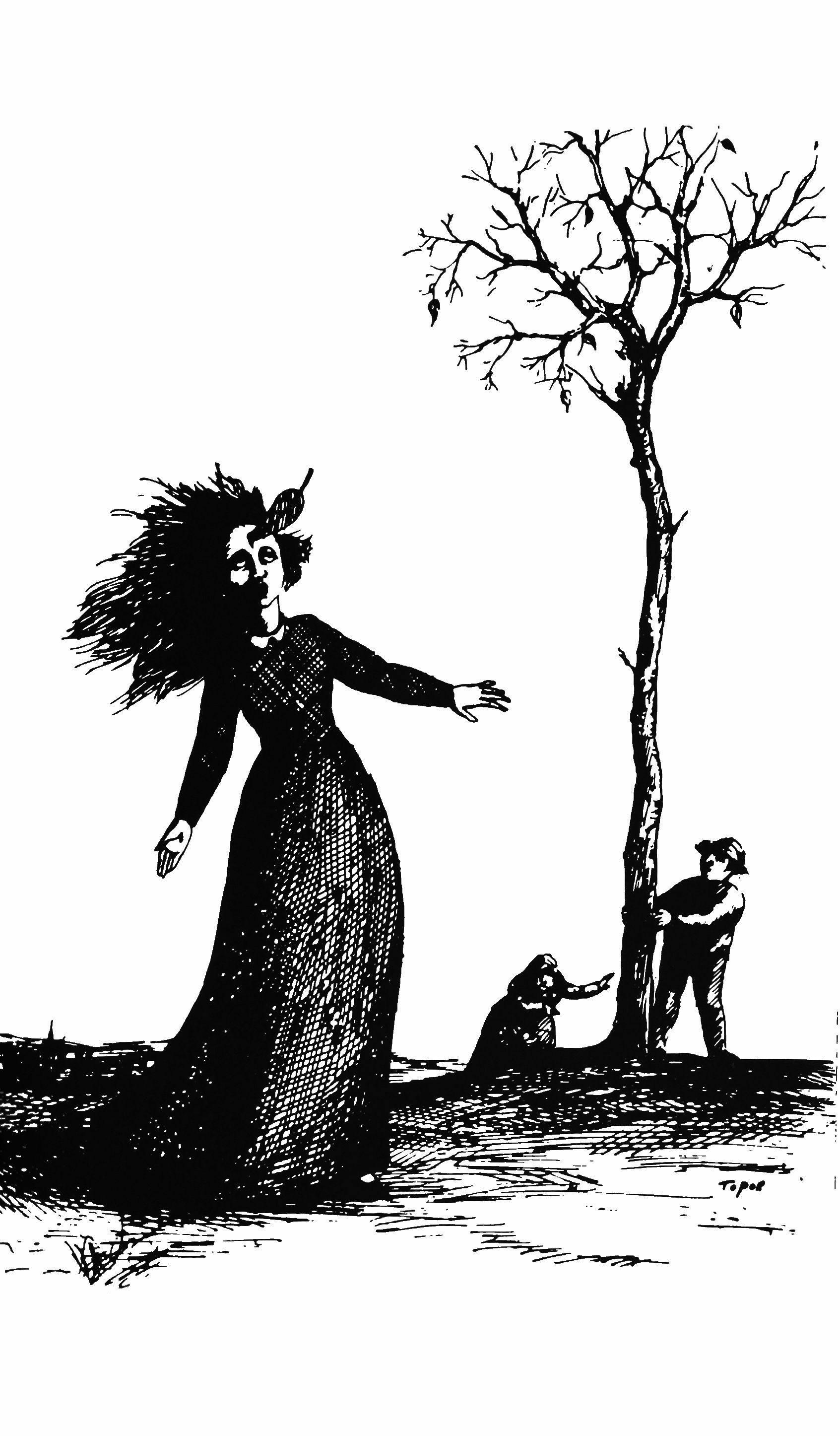
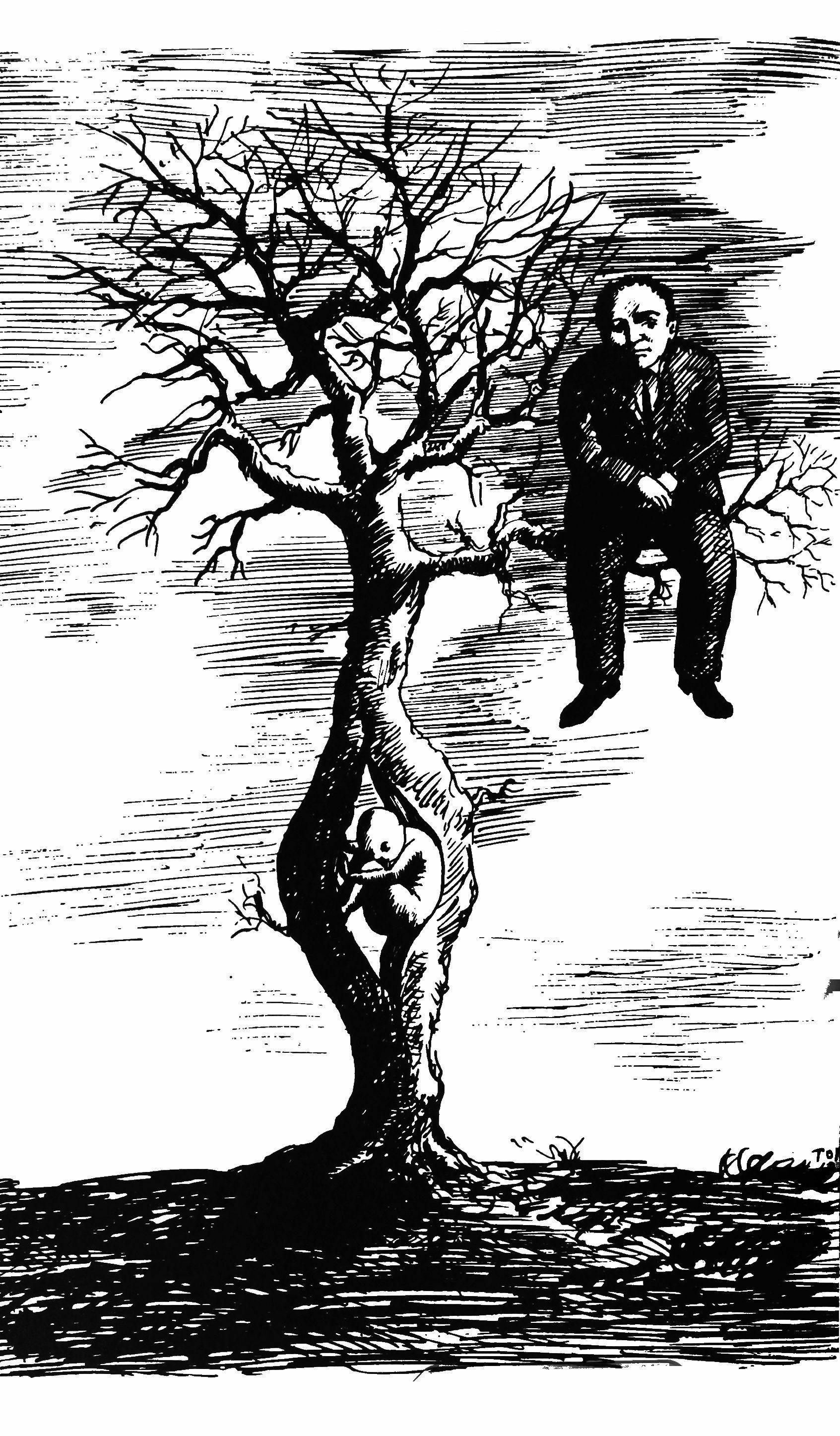

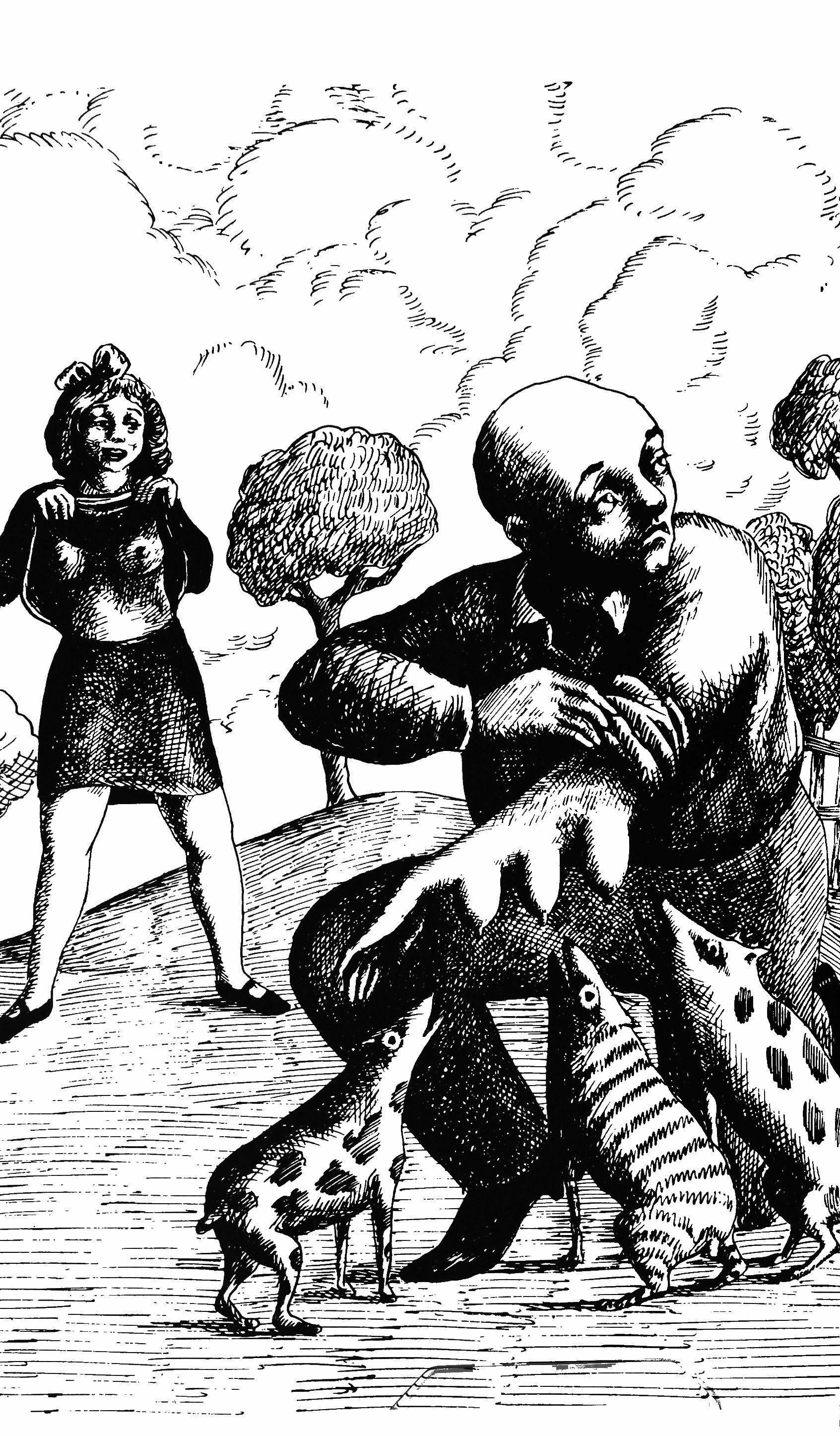
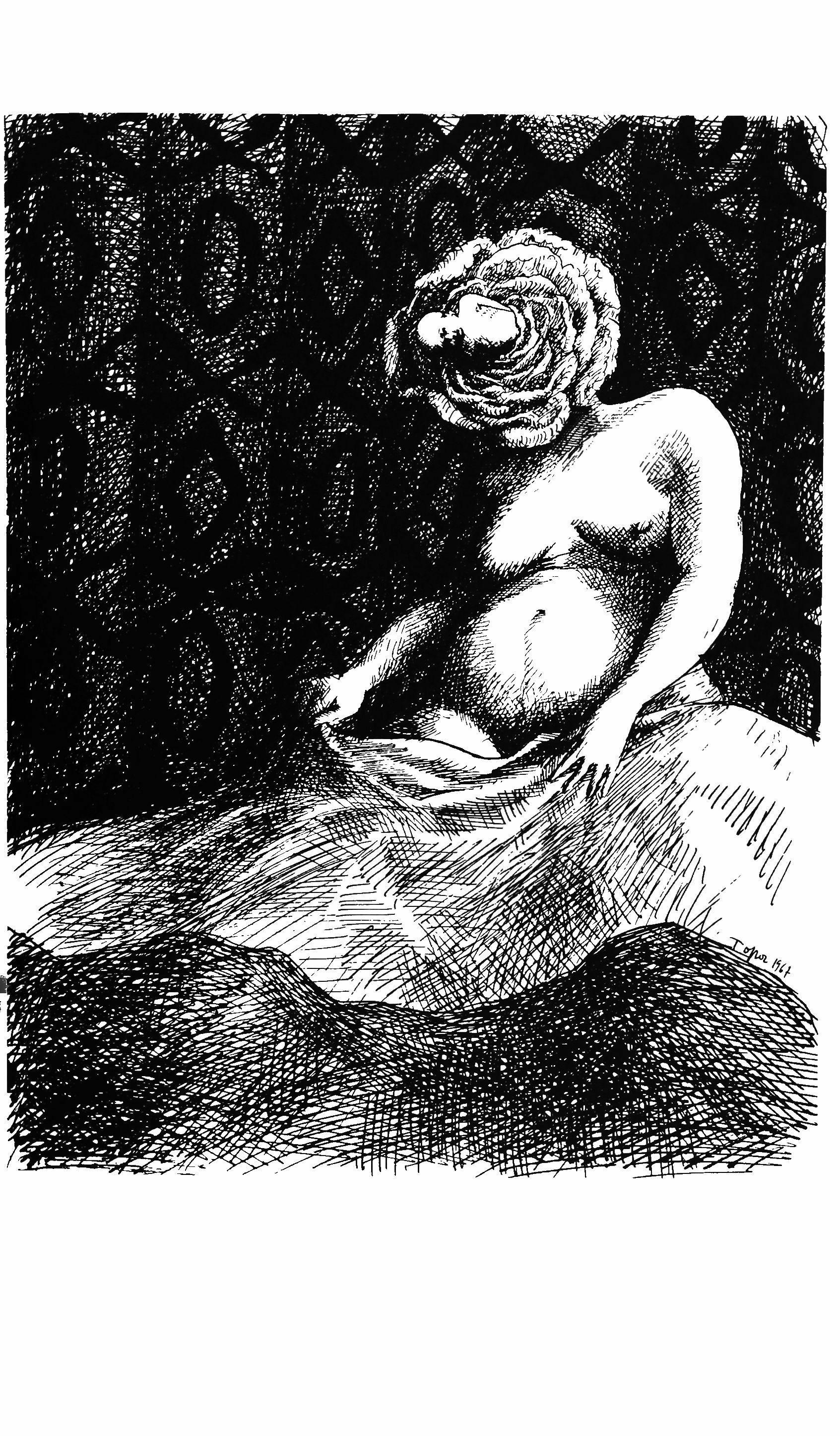
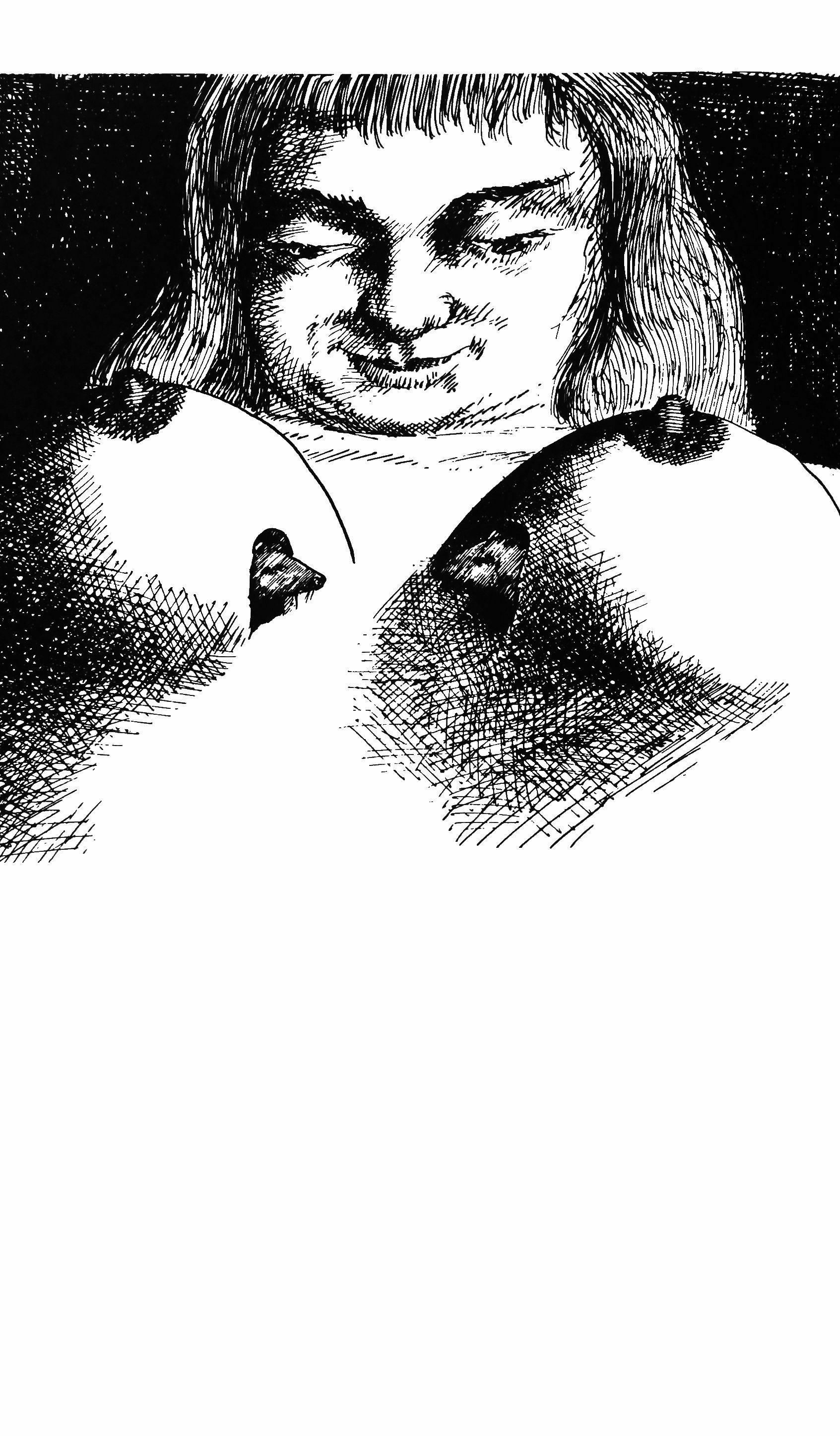
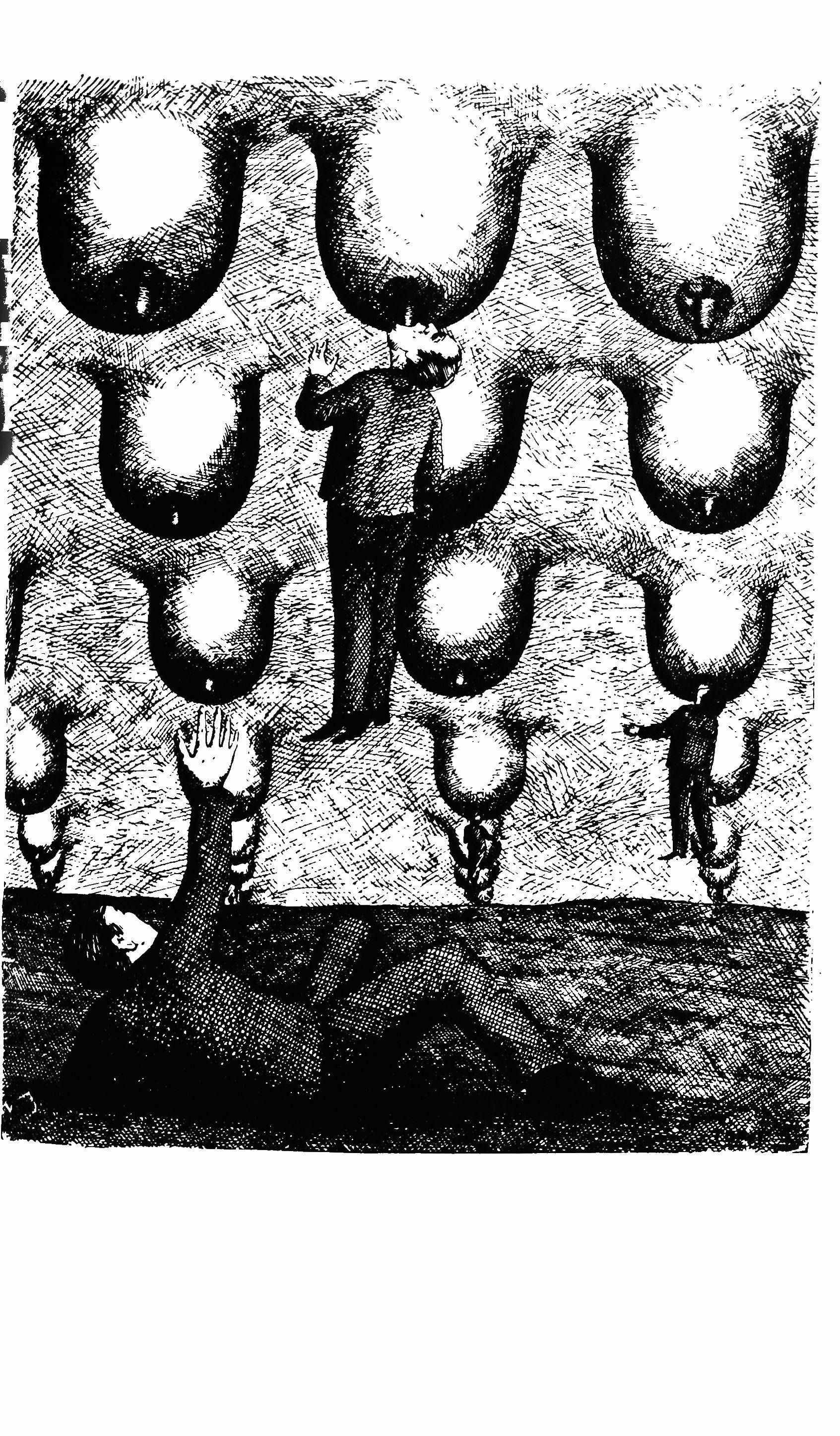
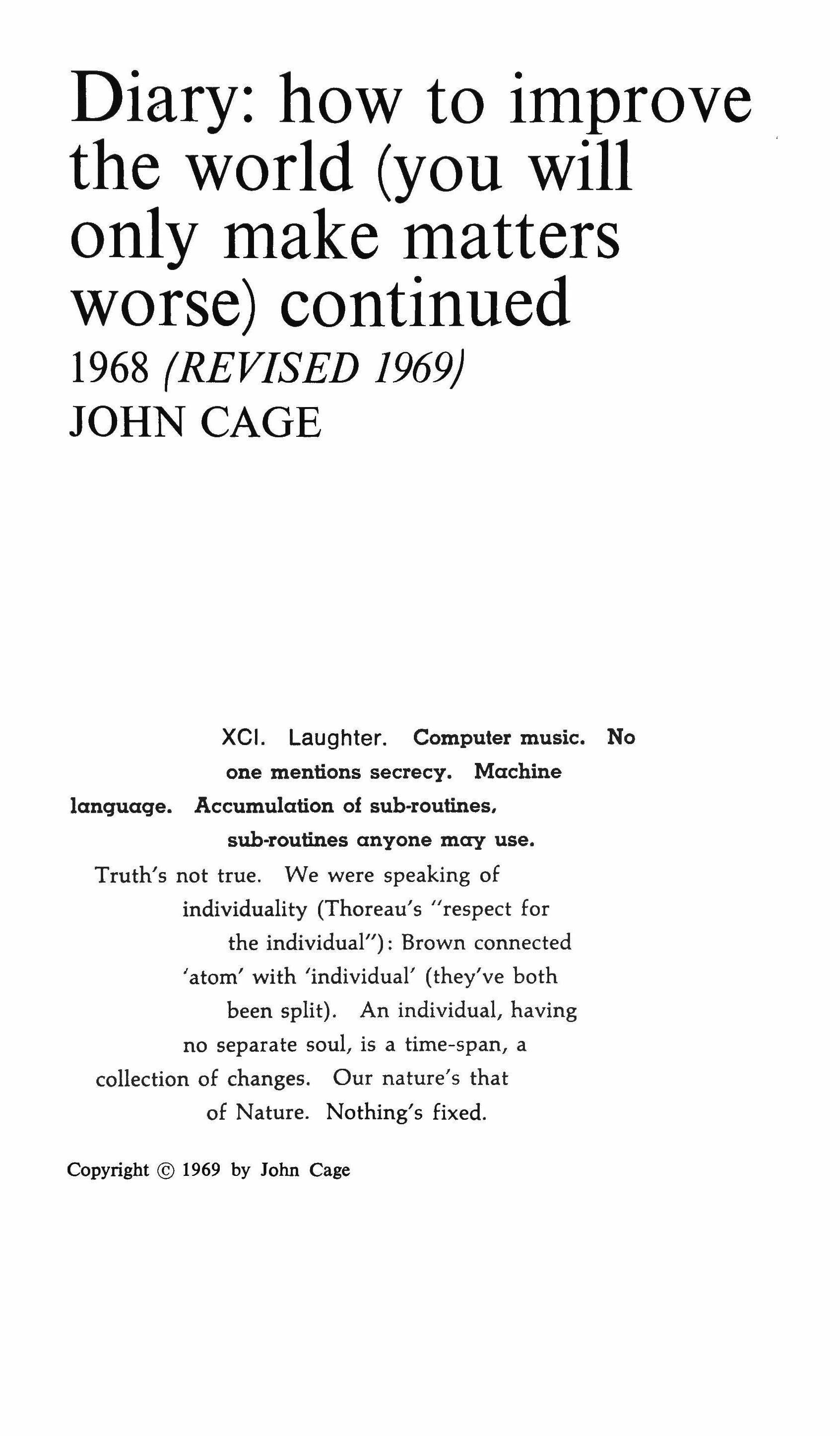
XCI. Laughter. Computer music. No one mentions secrecy. Machine language. Accumulation of sub-routines, sub-routines anyone may use. Truth's not true. We were speaking of individuality (Thoreau's "respect for the individual"): Brown connected 'atom' with 'individual' (they've both been split). An individual, having no separate soul, is a time-span, a collection of changes. Our nature's that of Nature. Nothing's fixed.
Copyright © 1969 by John Cage
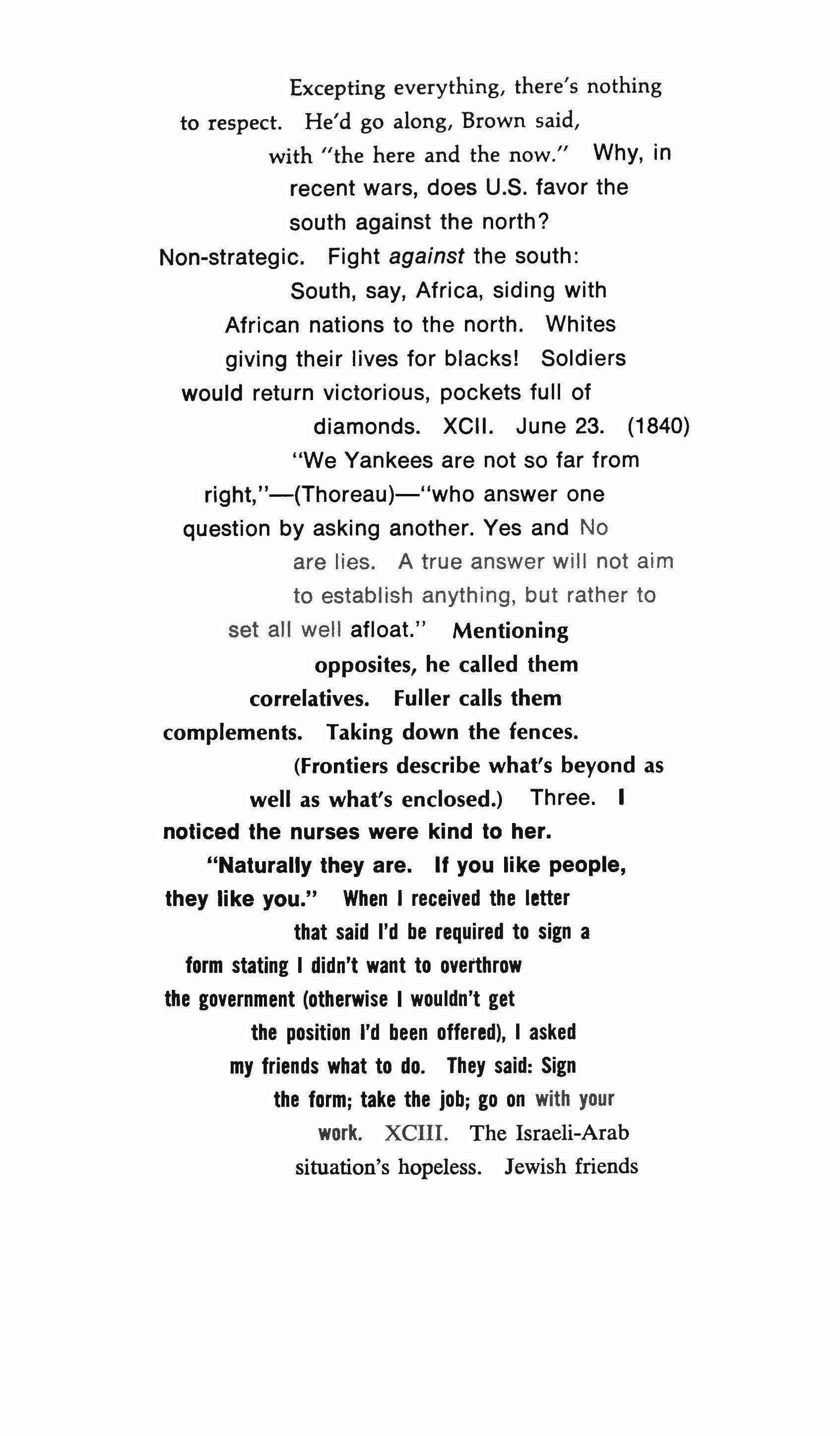
Excepting everything, there's nothing to respect. He'd go along, Brown said, with "the here and the now." Why, in recent wars, does U.S. favor the south against the north? Non-strategic. Fight against the south: South, say, Africa, siding with African nations to the north. Whites giving their lives for blacks! Soldiers would return victorious, pockets full of diamonds. XCII. June 23. (1840)
"We Yankees are not so far from right,"-(Thoreau)-"who answer one question by asking another. Yes and No are lies. A true answer will not aim to establish anything, but rather to set all well afloat." Mentioning opposites, he called them correlatives. Fuller calls them complements. Taking down the fences. (Frontiers describe what's beyond as well as what's enclosed.) Three. I noticed the nurses were kind to her.
"Naturally
they are. If you like people, they like you."
When I received the letter that said I'd be required to sign a form stating I didn't want to overthrow the government (otherwise I wouldn't get the position I'd been offered), I asked my friends what to do. They said: Sign the form; take the job; go on with your work. XCIII. The Israeli-Arab situation's hopeless. Jewish friends
I talked to didn't make good sense. Quote: After ages suffering, aren't you glad we finally have a little success?
Unquote. S,uggesting Jews usc technological know-how to benefit Arabs, 1 was given this reply: Israelis wanted to; Arabs wouldn't let'crn.

Gandhi was asked what he thought of Western Civilization, he said, "It would be nice.") One thing we refuse is to employ an answering service. It's of the greatest urgency-a matter of ethics even-that we be able to reach one another. Those who are selfish will change their minds re interruptions (i.e. become superficially ethical): incoming telephone calls will be the means by which one's social credit exceeds a basic economic security (social usefulness measured). XCIV. When I entered the house, I noticed some very interesting music was being played. After a drink or two, I asked my hostess what it was. She said, "You can't be serious?" Scientists are sometimes not scientific. Take
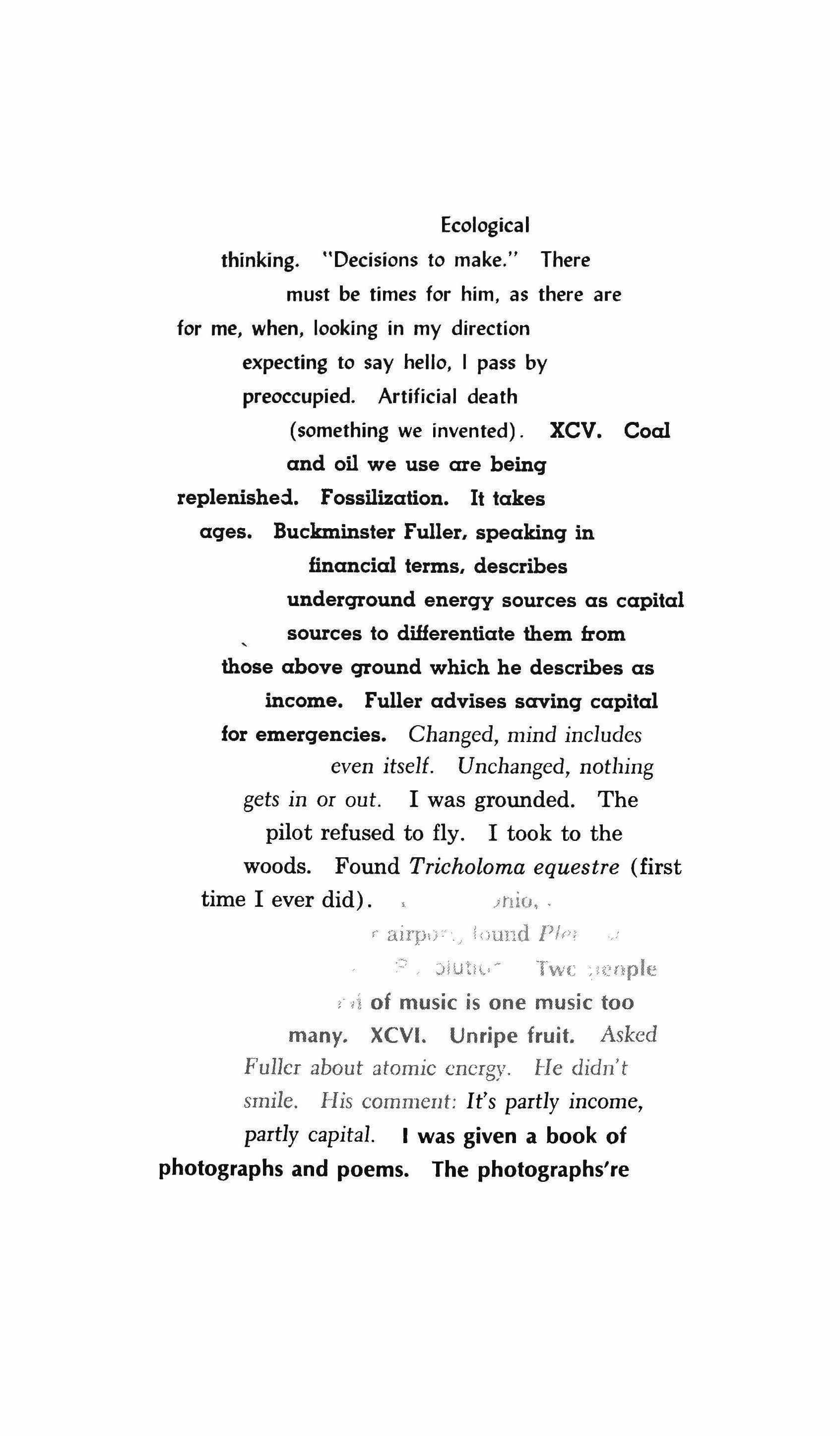
Ecological thinking. "Decisions to make." There must be times for him, as there are for me, when, looking in my direction expecting to say hello, I pass by preoccupied. Artificial death (something we invented). XCV. Coal and oil we use are being replenished. Fossilization. It takes ages. Buckminster Fuller, speaking in financial terms, describes underground energy sources as capital sources to diHerentiate them from those above ground which he describes as income. Fuller advises saving capital for emergencies. Changed, mind includes even itself. Unchanged, notl1ing gets in or out. I was grounded. The pilot refused to fly. I took to the woods. Found Tricholoma equestre (first time I ever did).
JIUO, r' alrp,j lnund PI",
,Ii of music is one music too many. XCVI. Unripe fruit. Asked Fuller about atomic energy. He didn't smile. His comment: It's partly income, partly capital. I was given a book of photographs and poems. The photographs're
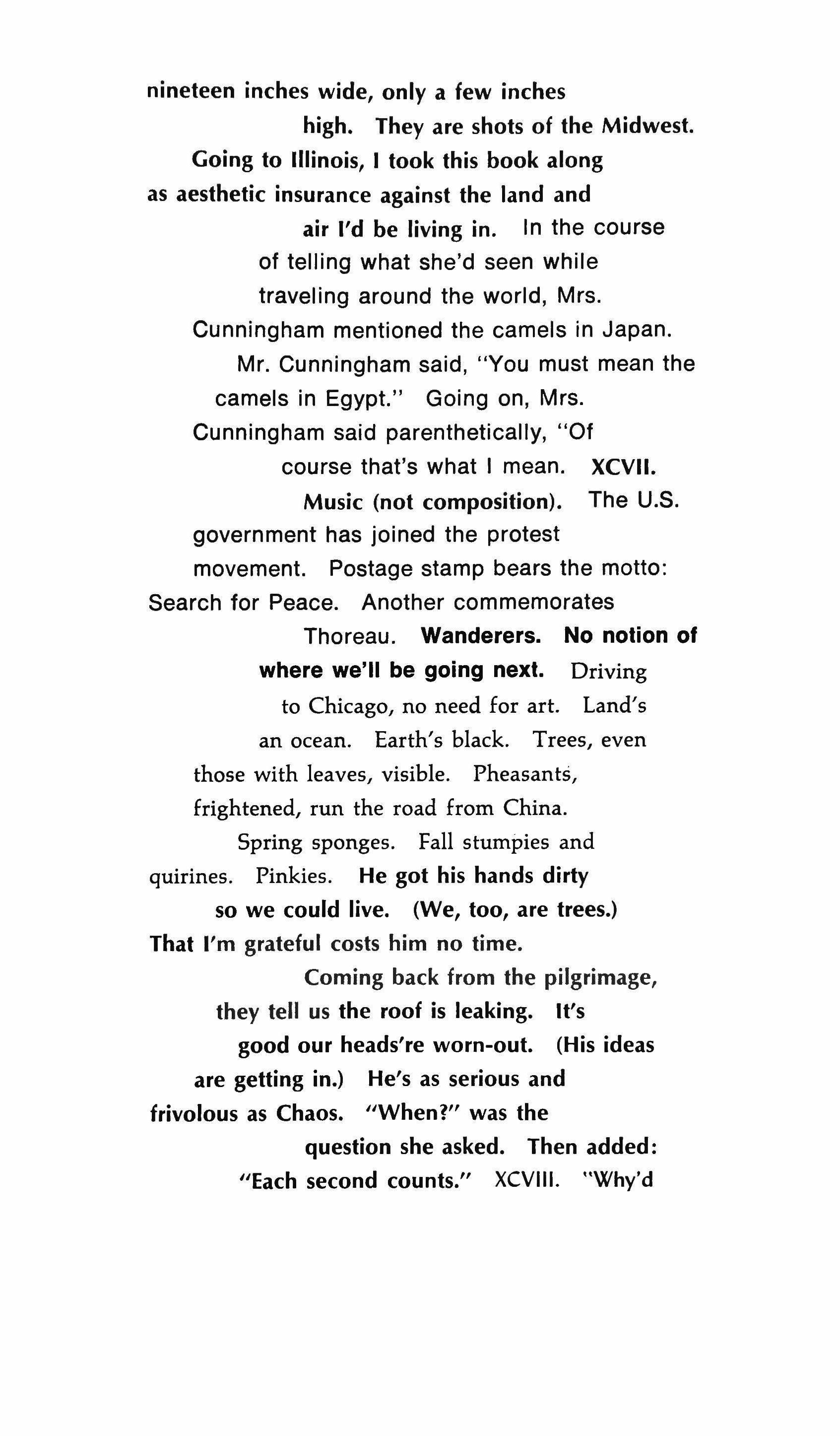
nineteen inches wide, only a few inches high. They are shots of the Midwest. Going to Illinois, I took this book along as aesthetic insurance against the land and air I'd be living in. In the course of telling what she'd seen while traveling around the world, Mrs. Cunningham mentioned the camels in Japan. Mr. Cunningham said, "You must mean the camels in Egypt." Going on, Mrs. Cunningham said parenthetically, "Of course that's what I mean. XCVII.
Music (not composition). The U.S. government has joined the protest movement. Postage stamp bears the motto: Search for Peace. Another commemorates Thoreau. Wanderers. No notion of where we'll be going next. Driving to Chicago, no need for art. Land's an ocean. Earth's black. Trees, even those with leaves, visible. Pheasants, frightened, run the road from China. Spring sponges. Fall stumpies and quirines. Pinkies. He got his hands dirty so we could live. (We, too, are trees.) That I'm grateful costs him no time. Coming back from the pilgrimage, they tell us the roof is leaking. It's good our heads're worn-out. (His ideas are getting in.) He's as serious and frivolous as Chaos. "When1" was the question she asked. Then added: "Each second counts." XCVIII. "Why'd
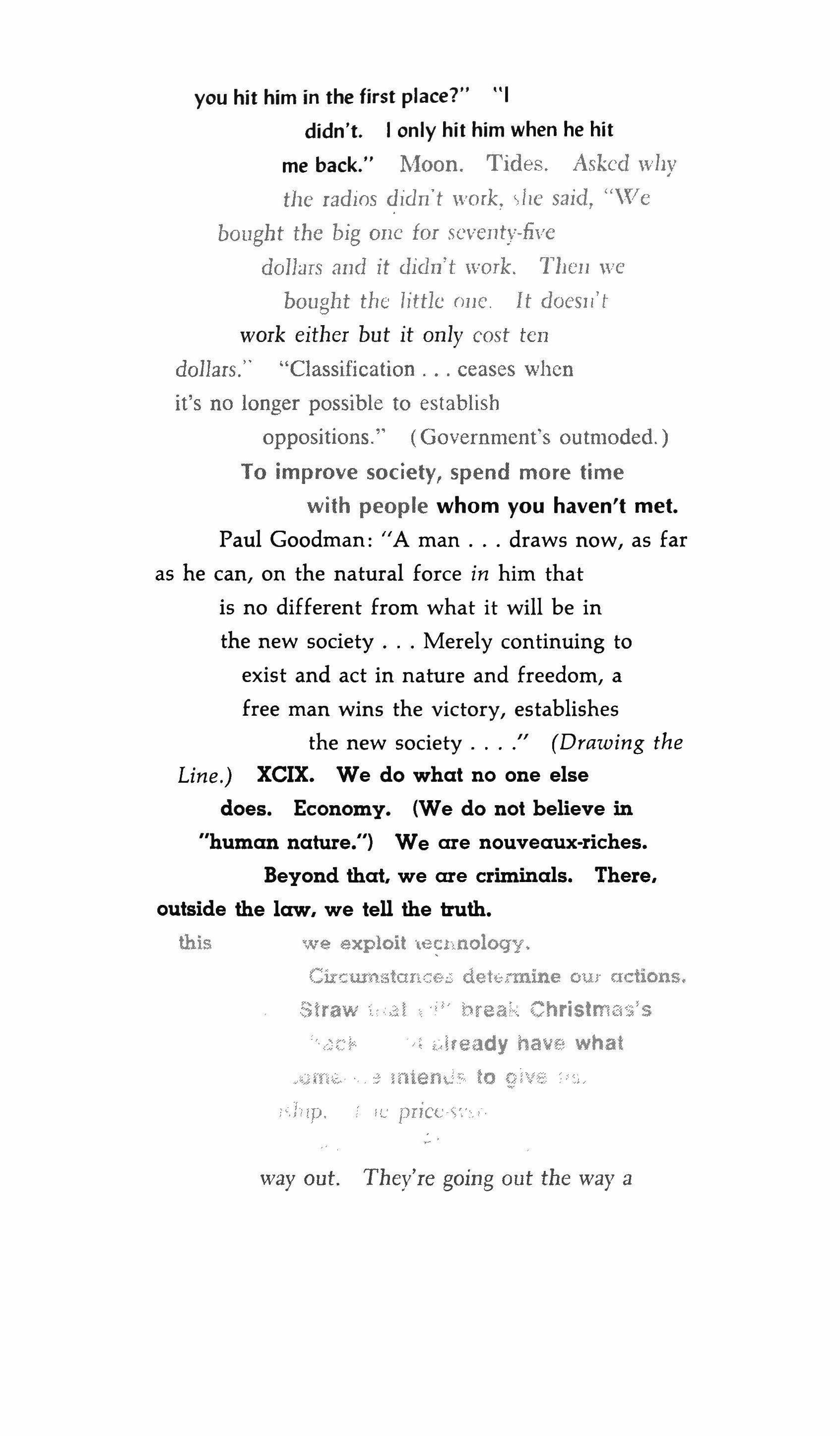
you hit him in the first place?" "I didn't. I only hit him when he hit me back." Moon. Tides. Asked why the radios �idn't work, "lte said, "Wfe bought the big one for seventy-five dollars and it didn't work. TIlCl1 we bought the little O1Je. It doesn't work either but it only cost ten dollars.' "Classification ceases when it's no longer possible to establish oppositions." (Government's outmoded.)
To improve society, spend more time with people whom you haven't met. Paul Goodman: "A man draws now, as far as he can, on the natural force in him that is no different from what it will be in the new society Merely continuing to exist and act in nature and freedom, a free man wins the victory, establishes the new society (Drawing the Line.) XCIX. We do what no one else does. Economy. (We do not believe in "human nature.") We are nouveaux-riches. Beyond that. we are criminals. There. outside the law. we tell the truth. this vve exploit ',e�hnology. Circumstcmces determine our erctions, Straw ir,,:1! ii' break Christmas's ,; dready have what way out. They're going out the way a
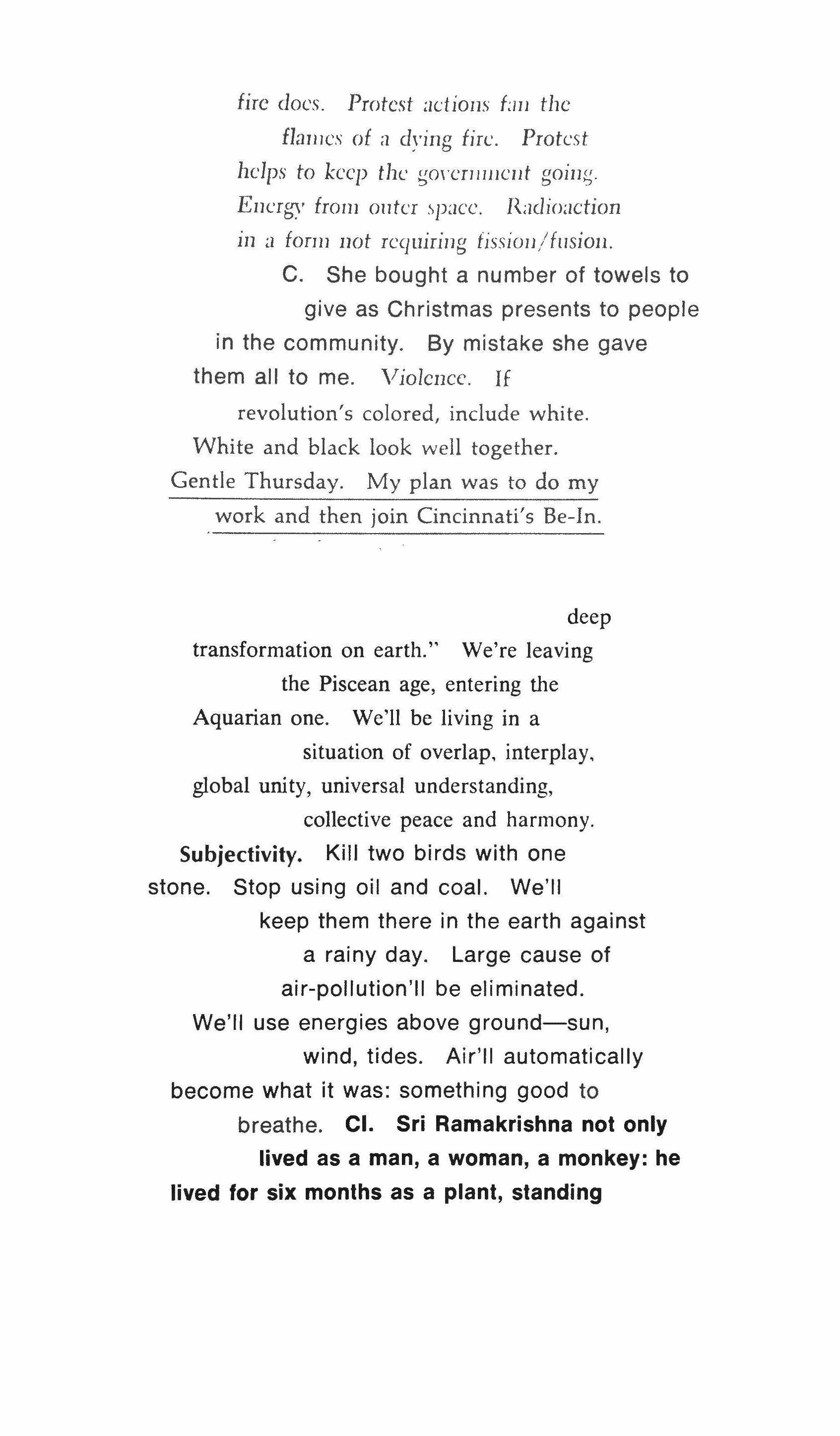
fire docs. Protest actions f:111 the flames of a dying fire. Protest lleIps to keep the gOl'eTIIlllel1t going. Eller€,'y from aliter �paee. Radioacrion in a form Hot requiring tissioll/fIlSioll.
C. She bought a number of towels to give as Christmas presents to people in the community. By mistake she gave them all to me. Violence. If revolution's colored, include white. White and black look well together. Gentle Thursday. My plan was to do my work and then join Cincinnati's Be-In. deep transformation on earth." We're leaving the Piscean age, entering the Aquarian one. We'll be living in a situation of overlap, interplay, global unity, universal understanding, collective peace and harmony. Subjectivity. Kill two birds with one stone. Stop using oil and coal. We'll keep them there in the earth against a rainy day. Large cause of air-poliution'lI be eliminated. We'll use energies above ground-sun, wind, tides. Air'll automatically become what it was: something good to breathe. CI. Sri Ramakrishna not only lived as a man, a woman, a monkey: he lived for six months as a plant, standing
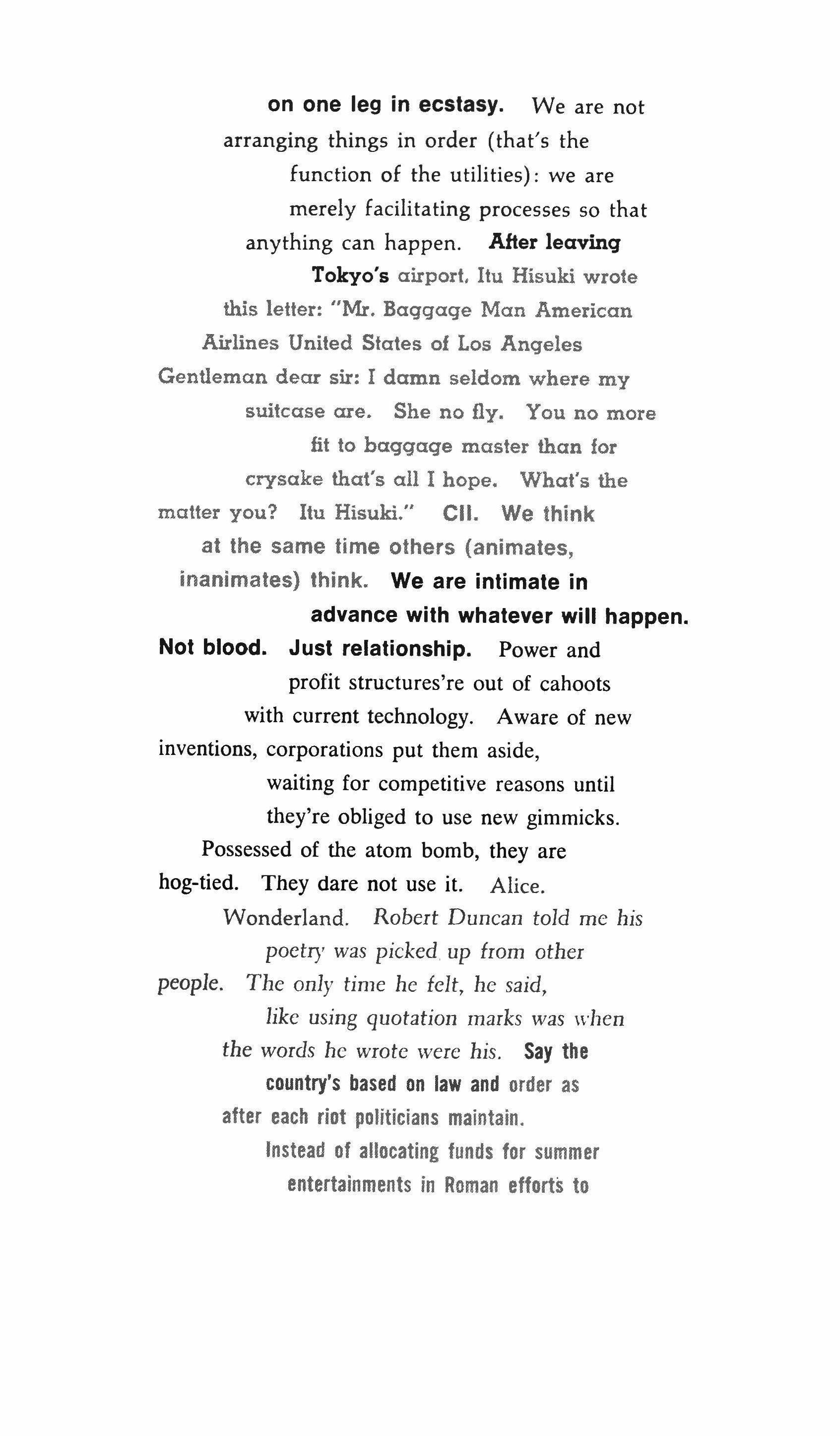
on one leg in ecstasy. We are not arranging things in order (that's the function of the utilities): we are merely facilitating processes so that anything can happen. After leaving Tokyo's airport. Itu Hisuki wrote this letter: "Mr. Baggage Man American Airlines United States of Los Angeles Gentleman dear sir: I damn seldom where my suitcase are. She no fly. You no more fit to baggage master than for crysake that's all I hope. What's the matter you? Itu Hisuki." CII. We think at the same time others (animates, inanimates) think. We are intimate in advance with whatever will happen. Not blood. Just relationship. Power and profit structures're out of cahoots with current technology. Aware of new inventions, corporations put them aside, waiting for competitive reasons until they're obliged to use new gimmicks. Possessed of the atom bomb, they are hog-tied. They dare not use it. Alice. Wonderland. Robert Duncan told me his poetry was picked up from other people. The only time he felt, he said, like using quotation marks was when the words he wrote were his. Say the country's based on law and order as after each riot politicians maintain. Instead of allocating funds for summer entertainments in Roman efforts to
distract the masses, it would be more effective to prohibit advertising (TV commercials in particular) so that the poor wouldn't know what it was they were missing. CIlI. She'd been born in her summer home overlooking a mountain lake formerly owncd by her family, now shared with Boy Scouts. Carpenter whom she'd employed, whom she'd known since childhood, always treated her like all outsider. While he rested, she asked, "What's the difference between natives and outsiders?" "Natives," he replied, "eat indoors and shit outdoors; outsiders eat outdoors and shit indoors." Our flights are interrupted by overnight stays in airport motels. No one knows where we are. McLuhan said it.
We're like the Middle Ages. People building cathedrals. Glorification. No need for God: just Universe. Doing
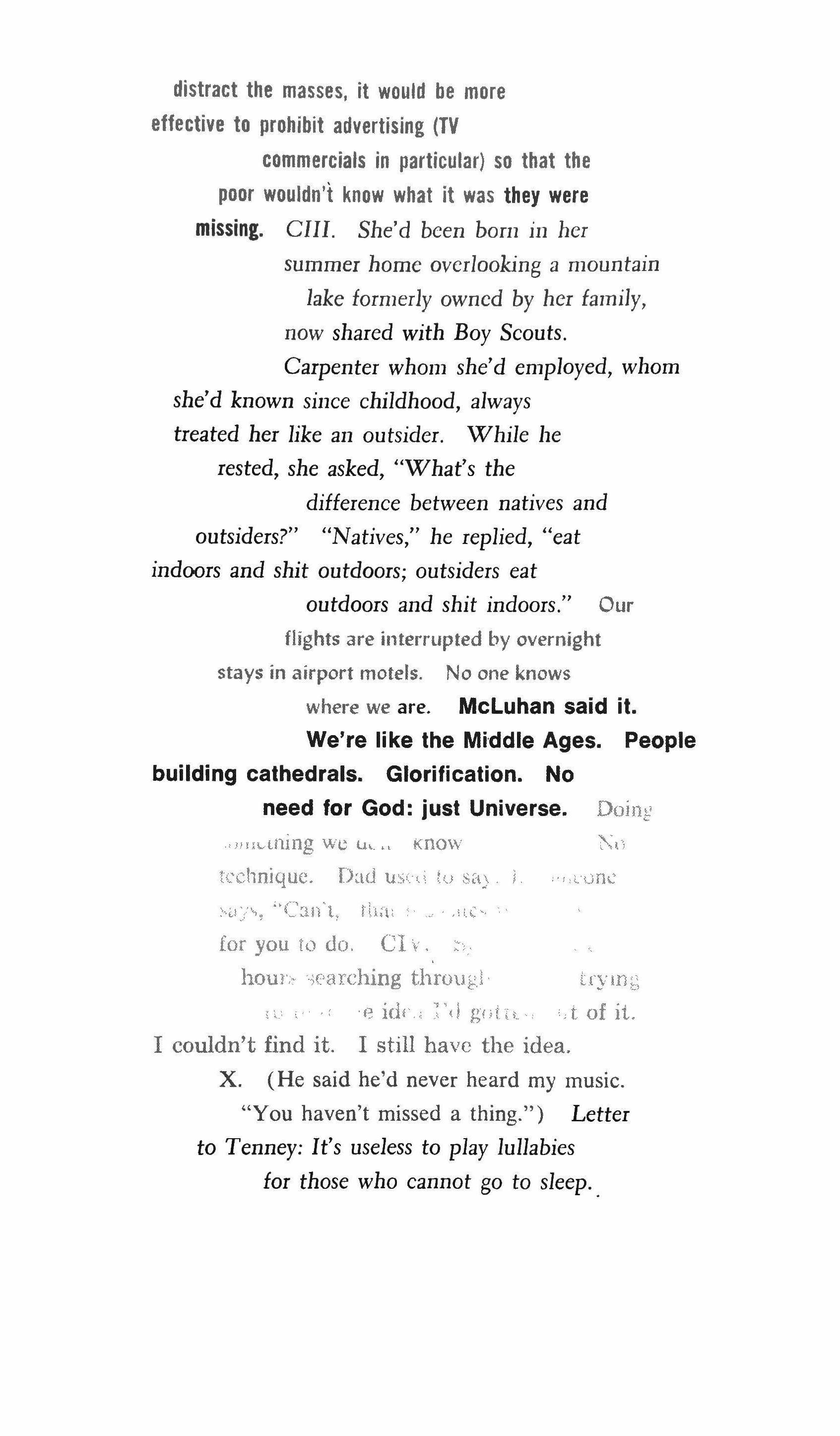
for you W do, CI , hour ,('arching througl
I couldn't find it.
e idle ;'i) guLl .t of it. I still have the idea.
X. (He said he'd never heard my music. "You haven't missed a thing.") Letter to Tenney: It's useless to play lullabies for those who cannot go to sleep
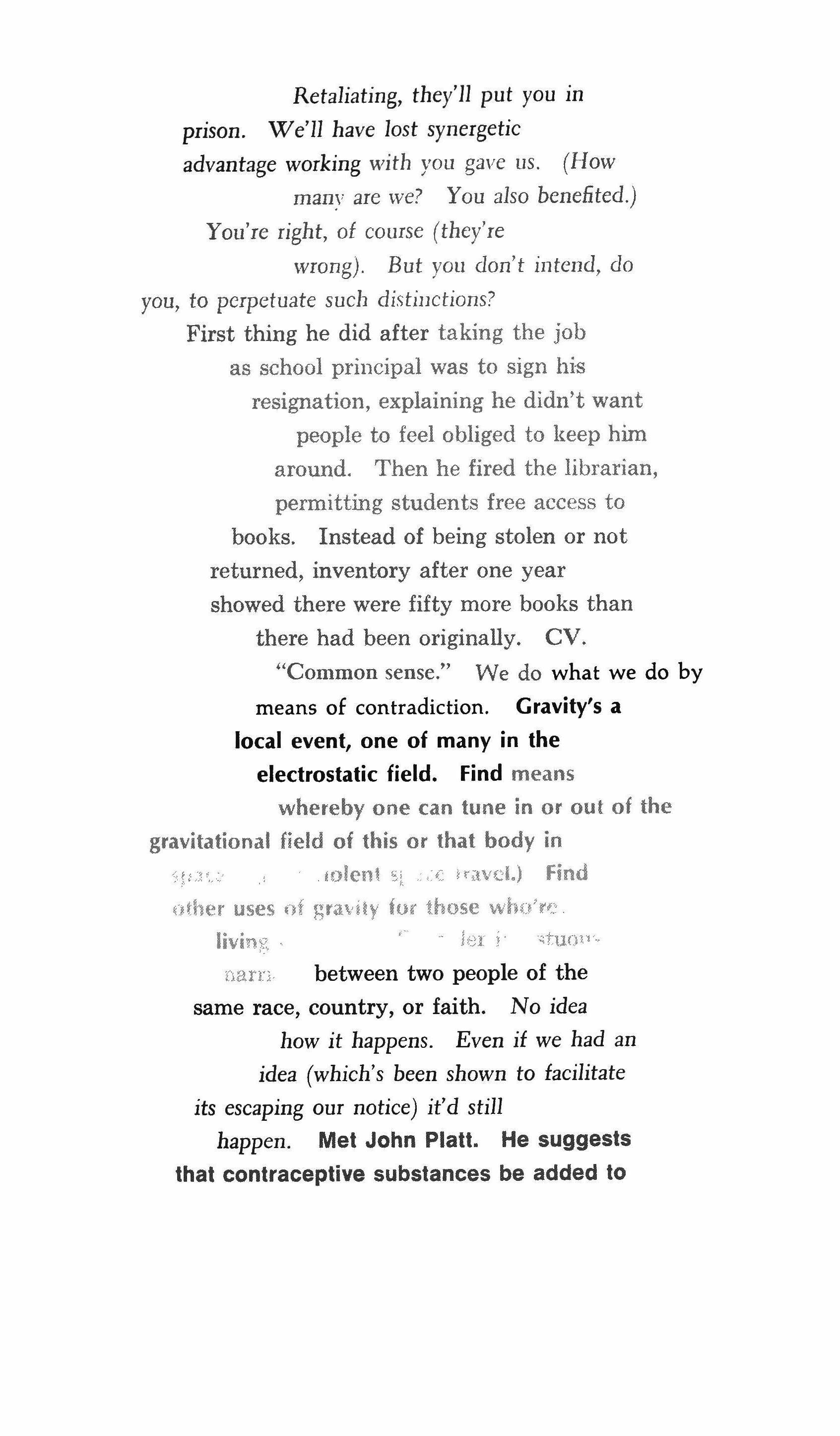
Retaliating, they'l1 put you in pnson. We'l1 have lost synergetic advantage working with you gave us. (How man" are we? You also benefited.)
You're right, of course (they're wrong). But YOLl don't intend, do you, to perpetuate such distinctions? First thing he did after taking the job as school principal was to sign his resignation, explaining he didn't want people to feel obliged to keep him around. Then he fired the librarian, permitting students free access to books. Instead of being stolen or not returned, inventory after one year showed there were fifty more books than there had been originally. CV. "Common sense." We do what we do by means of contradiction. Gravity's a local event, one of many in the electrostatic field. Find means whereby one can tune in or out of the gravitational field of this or that body in �! I,} '" rolent Sf .•• .;- } ravel.) find other uses of gravily fur those who're IiIvmg, narri. between two people of the same race, country, or faith. No idea how it happens. Even if we had an idea (which's been shown to facilitate its escaping our notice) it'd still happen. Met John Platt. He suggests that contraceptive substances be added to

basic foods: flour, rice, sugar, salt, etc. The human species would become normally unreproductive. Should a couple wanted child. CVI. hard clay the earth/ iron-weed the corn/ that was my crib (Teeny fifteen years old) If the situation is hopeless, we have nothing to worry about.
(Post-graduate studies.) Quantum Theory. January. Drove across Ding Darling Sanctuary on Sanibel off Florida's western coast. Saw vulture; hawks; ducks and smaller birds; white, blue, black and grey taller birds, poised on branches or stalking the shallow waters. Man got out of his car behind us to photograph. We asked him what kind of bird it was. He said, "That's a grey heron, five feet tall." During the discussion, she asked a question about education. Answer: People together without restrictions in a situation abundantly implemented. She asked another. "People to whom it never occurs to ask: Mother! What shall I do now?" She turned and left the room. eVIl. Hands aren't possessive. They belong to the same body. They taught us art was self-expression. You had to have "something to say." They were wrong: you don't have to say anything.

Think of the others as artists. Art's self-alteration. "Charlotte Thrasher came to me late last evening to say that she'd jumped a wave, taken the way of the fishes and would not return until morning." If we start with the past and move to the present, we go from pleasure to irritation. Do you know what's happening? It'll handle computers, cybernetics, what-have-you, better than other minds can. CVIlI. Global Civil War. Family as it now stands doesn't work. North, south, brothers are quarreling, running to one parent or the other to obtain a favorable judgment. A mother telephoned to ask whether her son was coming horne for Christmas. "No," he replied, "I love you) but I'm going west. You and Dad're always bickering." Examine thoughts and words, written or spoken, weeding out those that are dead. Dead ones are those concerning aggression. Konrad Lorenz: the evolution of human nature. »ihi .chiy... that Itu Hisuki unny tl'ing about :,.; that Ii" ., Japanese name. CIX. Reading Thoreau's Journal, I discover any idea I've ever had worth its salt. (Oppressive laws were made to keep two Irishmen from fighting in the streets.) The door opened. He

walked in, turned on the light, sat down, died. The light is still on. No one turned it off. India: a luxury we can no longer afford. Graves said: Imagine that you're dreaming. I told Ellen to stretch her visit to the limit. then stay another day. Government's contemporary if its activities aren't interrupted by the action of technology. Americans, to remain rich, strong. required to curtail world travel, stop investment in foreign industries. Ergo: Washington's behind the times. CX. At the present moment, the question is: Do I have enough change for another beer? More important question: Is there enough j and drink for everyone who is living? Civilization is Hamletized (People are dying right and left): To be or not to be. That is the question. Tempo no longer exists. Just quantity. Say there are only a few sounds. Say they're loud. What to do?
Jump? "But still Vietnam goes on! And what of the concentration camps in California, etc? Who shall be called to serve 'their country' in them ? Malcolm" Criticism's not the time to think. Think ahead of time. Buckminster Fuller. eXL Tenney wrote to say: "What's required is radical eclecticism (Ives) 'every composer's
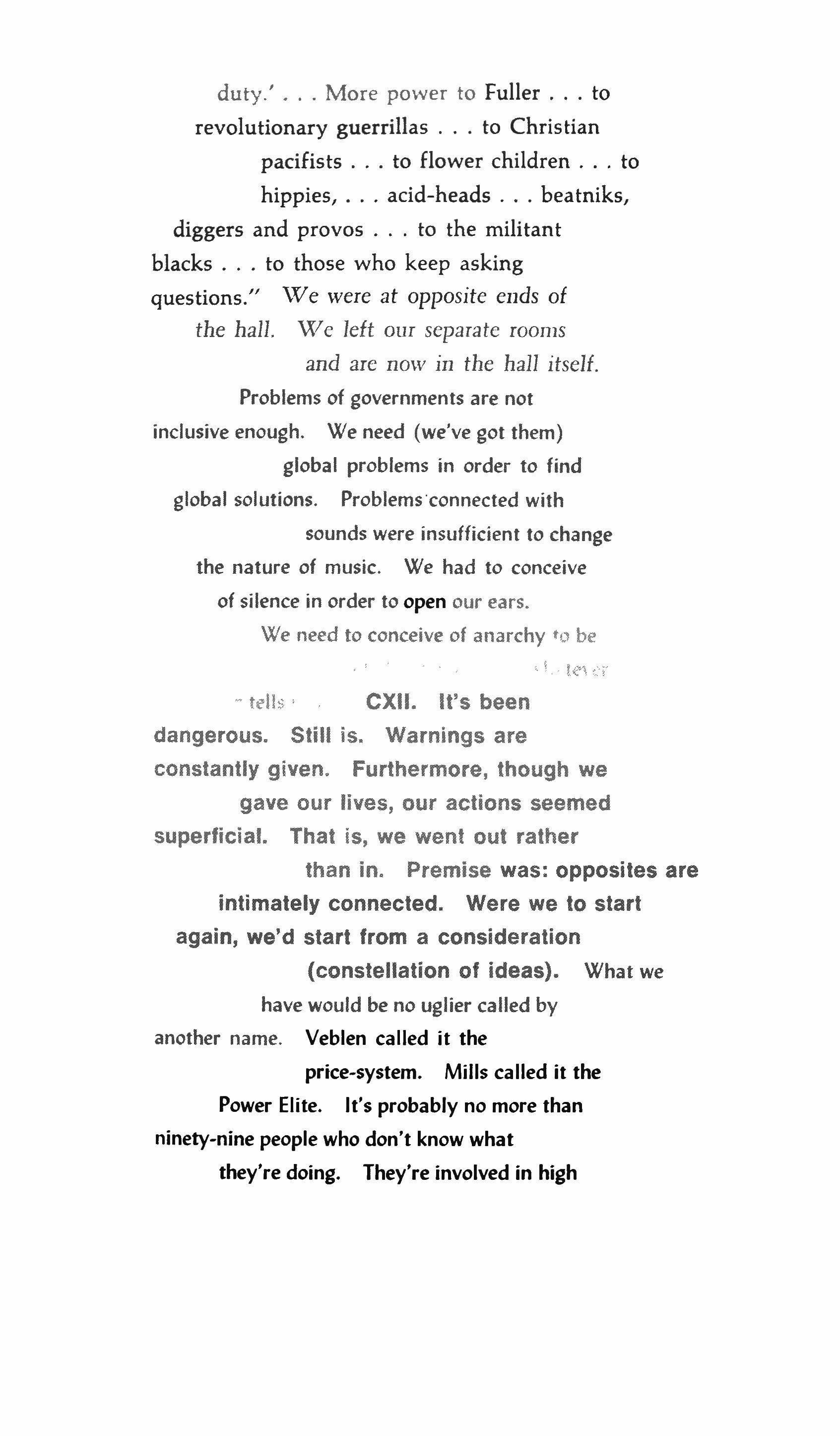
duty.' More power to Fuller to revolutionary guerrillas to Christian pacifists to flower children to hippies, acid-heads beatniks, diggers and provos to the militant blacks to those who keep asking questions." \Ve were at opposite ends of the hall. We left our separate rooms and are now in the hall itself. Problems of governments are not inclusive enough. We need (we've got them) global problems in order to find global solutions. Problemsconnected with sounds were insufficient to change the nature of music. We had to conceive of silence in order to open our ears. We need to conceive of anarchy to be
eXIi. It's been dangerous. Still is. Warnings are constantly given. Furthermore, though we gave our lives, our actions seemed superficial. That is, we went out rather than in. Premise was: opposites are intimately connected. Were we to start again, we'd start from a consideration (constellation of ideas). What we have would be no uglier called by another name. Veblen called it the price-system. Mills called it the Power Elite. It's probably no more than ninety-nine people who don't know what they're doing. They're involved in high
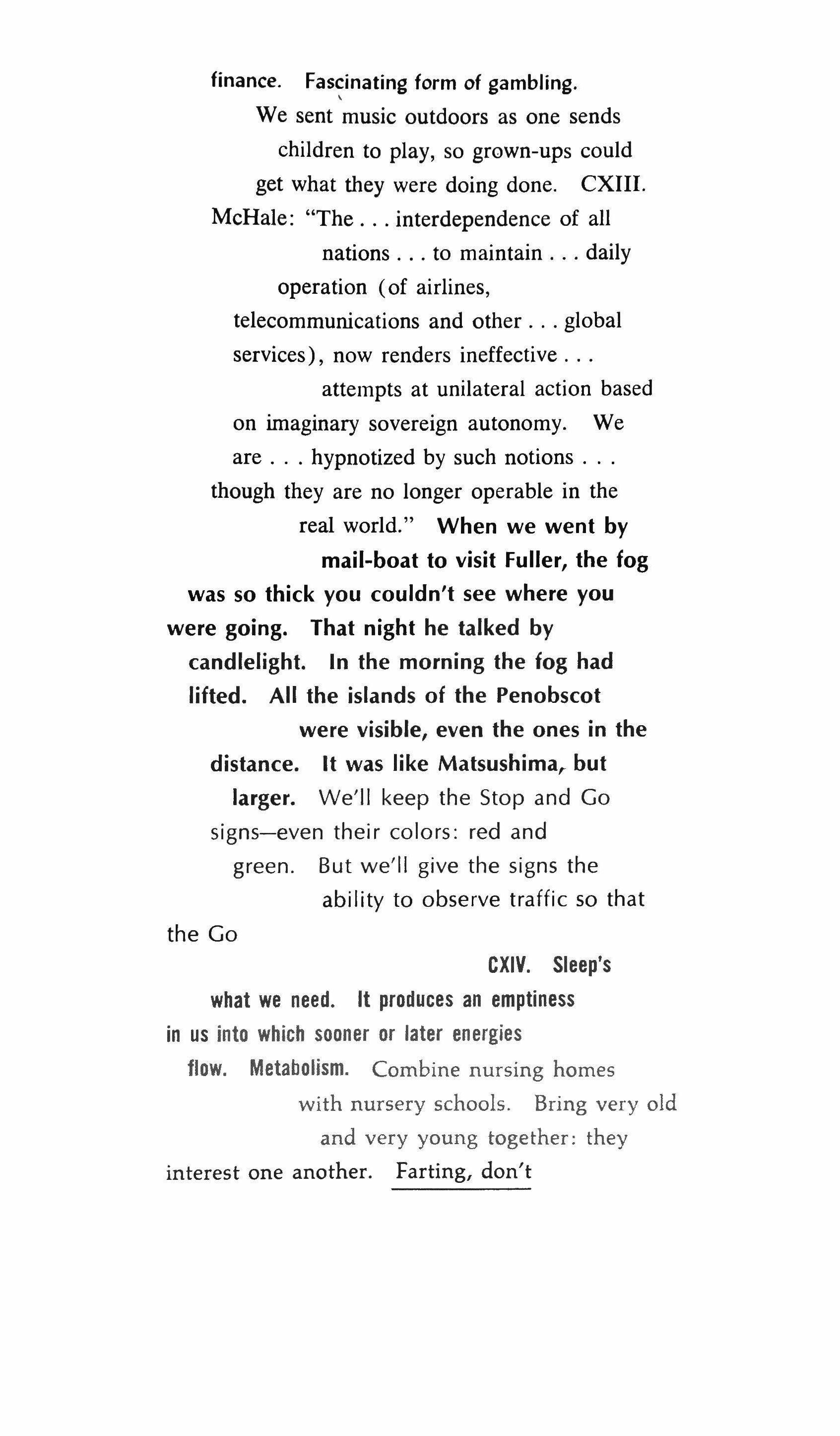
finance. Fascinating form of gambling. \ We sent music outdoors as one sends children to play, so grown-ups could get what they were doing done. CXIII.
McHale: "The interdependence of all nations to maintain daily operation (of airlines, telecommunications and other global services), now renders ineffective attempts at unilateral action based on imaginary sovereign autonomy. We are hypnotized by such notions though they are no longer operable in the real world." When we went by mail-boat to visit Fuller, the fog was so thick you couldn't see where you were going. That night he talked by candlelight. In the morning the fog had lifted. All the islands of the Penobscot were visible, even the ones in the distance. It was like Matsushima, but larger. We'll keep the Stop and Go signs-even their colors: red and green. But we'll give the signs the ability to observe traffic so that the Go CXIV. Sleep's what we need. It produces an emptiness in us into which sooner or later energies flow. Metabolism. Combine nursing homes with nursery schools. Bring very old and very young together; they interest one another. Farting, don't
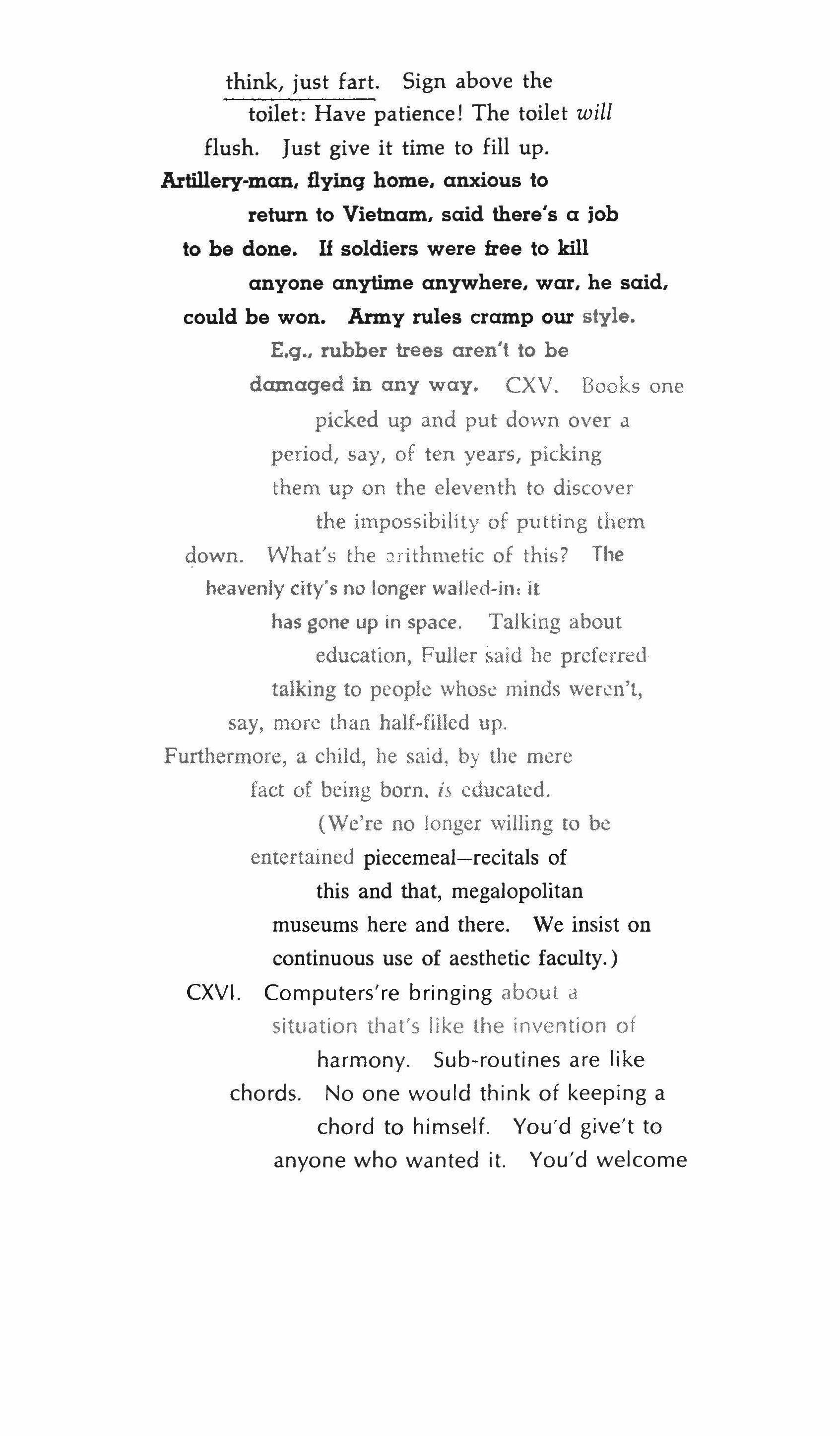
think, just fart. Sign above the toilet: Have patience! The toilet will flush. Just give it time to fill up. Artillery-man, flyinq home, anxious to return to Vietnam, said there's a job to be done. If soldiers were free to kill anyone anytime anywhere, war, he said, could be won. Army rules cramp our style. E.q., rubber trees aren't to be damaqed in any way. CXV. Books one picked up and put down over a period, say, of ten years, picking them up on the eleventh to discover the impossibility of putting them down. What's the arithmetic of this? The heavenly city's no longer walled-in: it has gone up in space. Talking about education, Fuller said he preferred talking to people whose minds weren't, say, more than half-filled up. Furthermore, a child, he said, by the mere fact of being born. is educated. (We're no longer willing to be entertained piecemeal-recitals of this and that, megalopolitan museums here and there. We insist on continuous use of aesthetic faculty.)
CXVI. Computers're bringing about a situation that's like the invention of harmony. Sub-routines are like chords. No one would think of keeping a chord to himself. You'd give't to anyone who wanted it. You'd welcome
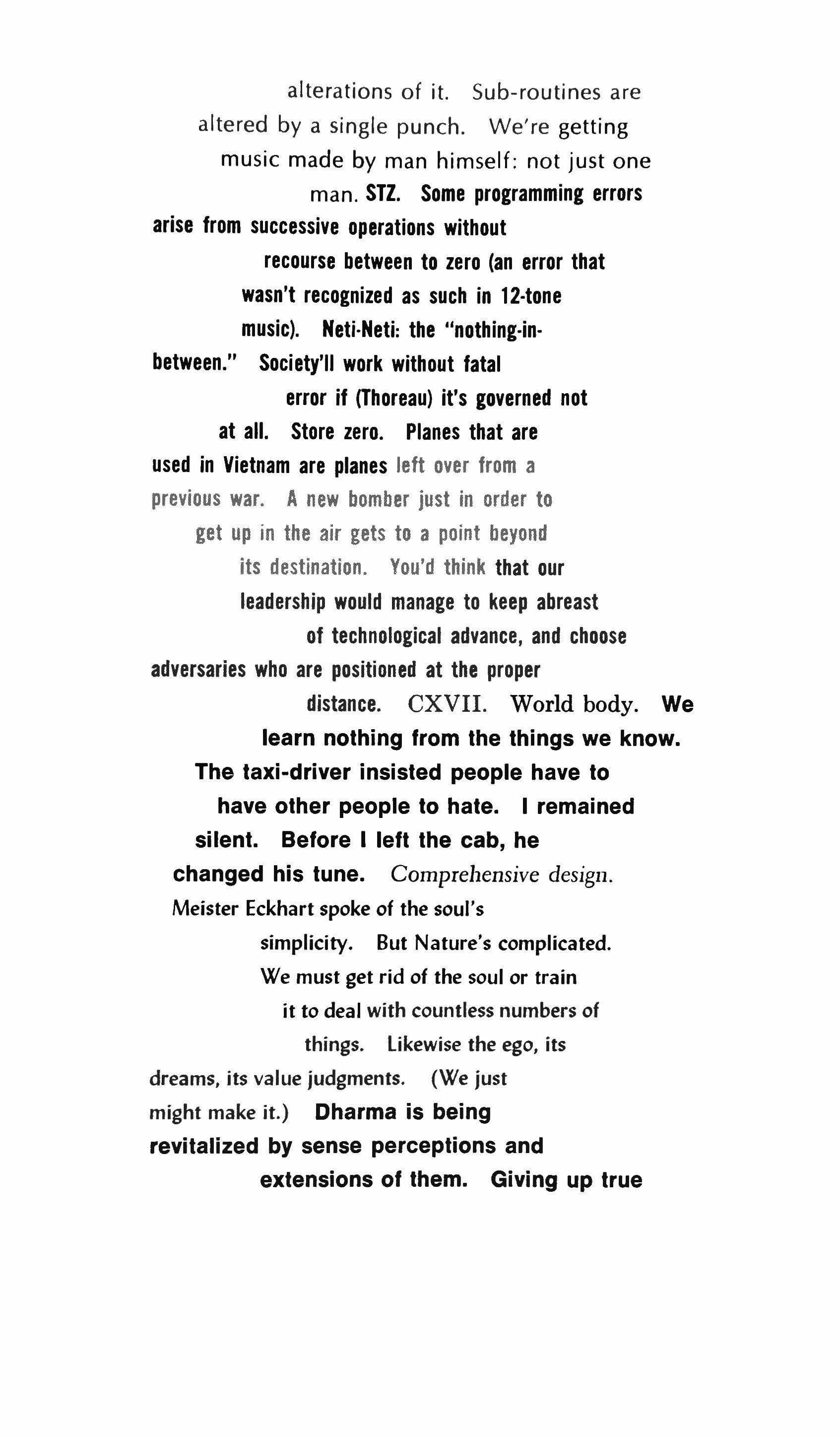
alterations of it. Sub-routines are altered by a single punch. We're getting music made by man himself: not just one man. STZ. Some programming errors arise from successive operations without recourse between to zero (an error that wasn't recognized as such in 12-tone music). Neti·Neti: the "nothing·in· between." Society'll work without fatal error if (Thoreau) it's governed not at all. Store zero. Planes that are used in Vietnam are planes left over from a previous war. A new bomber just in order to get up in the air gets to a point beyond its destination. You'd think that our leadership would manage to keep abreast of technological advance, and choose adversaries who are positioned at the proper distance. CXVII. World body. We learn nothing from the things we know. The taxi-driver insisted people have to have other people to hate. I remained silent. Before I left the cab, he changed his tune. Comprehensive design. Meister Eckhart spoke of the soul's simplicity. But Nature's complicated. We must get rid of the soul or train it to deal with countless numbers of things. likewise the ego, its dreams, its value judgments. (We just might make it.) Dharma is being revitalized by sense perceptions and extensions of them. Giving up true
and false. The mind, like a computer, produces a print-out. It's on the palms of our hands. CXVIlI. Why keep connecting him with "his" work? Don't you see that he's a human being, whereas his work isn't? If, for instance, you decided to kick his work and him, you would, wouldn't you, have to perform two actions rather than a single one? The more he leaves his work, the more productive it becomes (cf. land, modern farming methods). Study universe. f\rrange matters so things arc where they belong. Radioactive refuse? Belongs out in space. Past a certain threshold, it'll go of its own accord to the Sun. He said something. I understood something. Communication? Edwin Schlossberg and Jon Dieges conducted a class in Design at the University of Southern Illinois (Design in Buckminster Fuller's sense). Students did research and wrote papers, but gave them to one another instead of handing them in to the teachers. At the last session, one of the students came up to Eddie and asked him what his last name was.
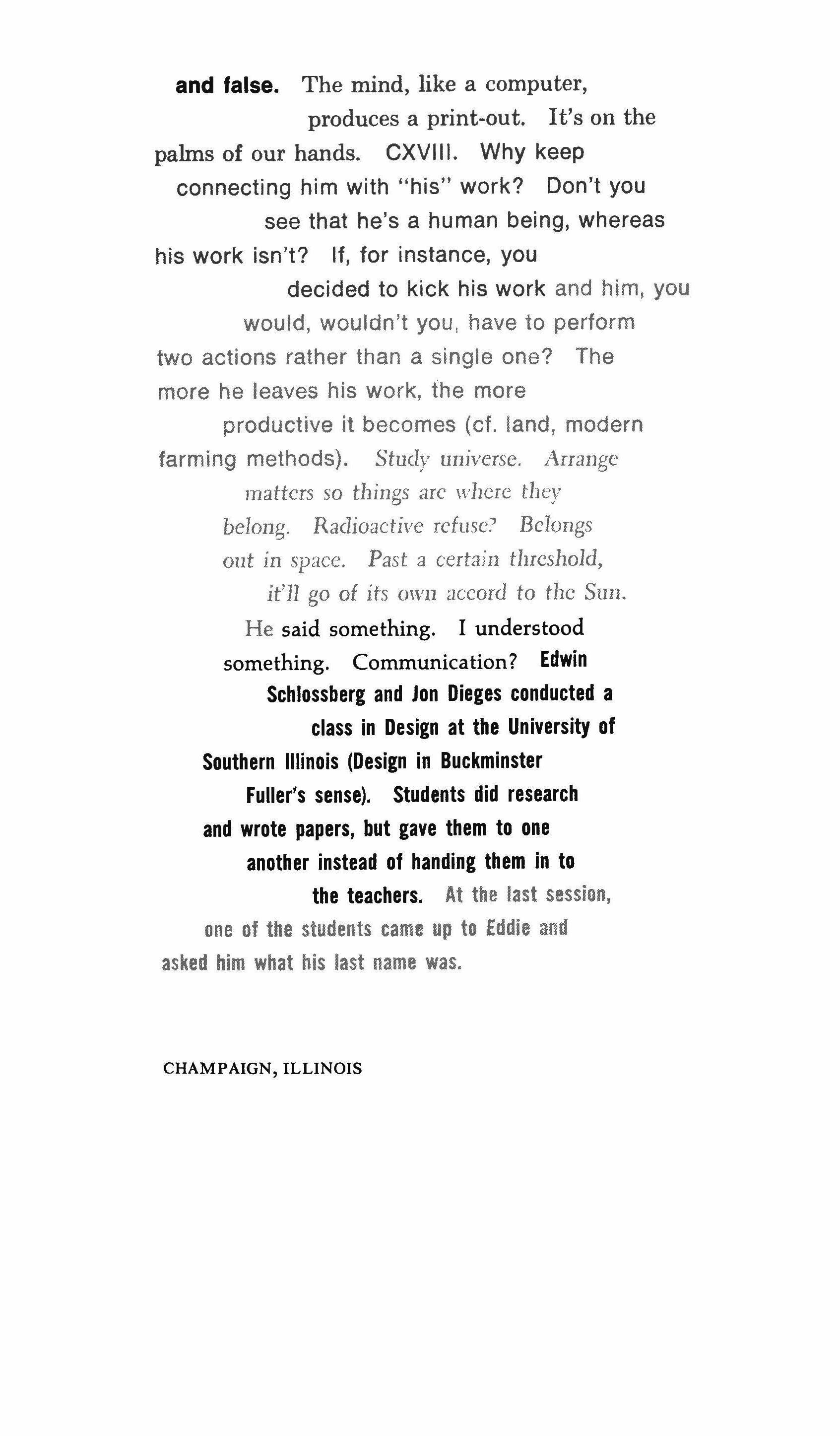
CHAMPAIGN, ILLINOIS
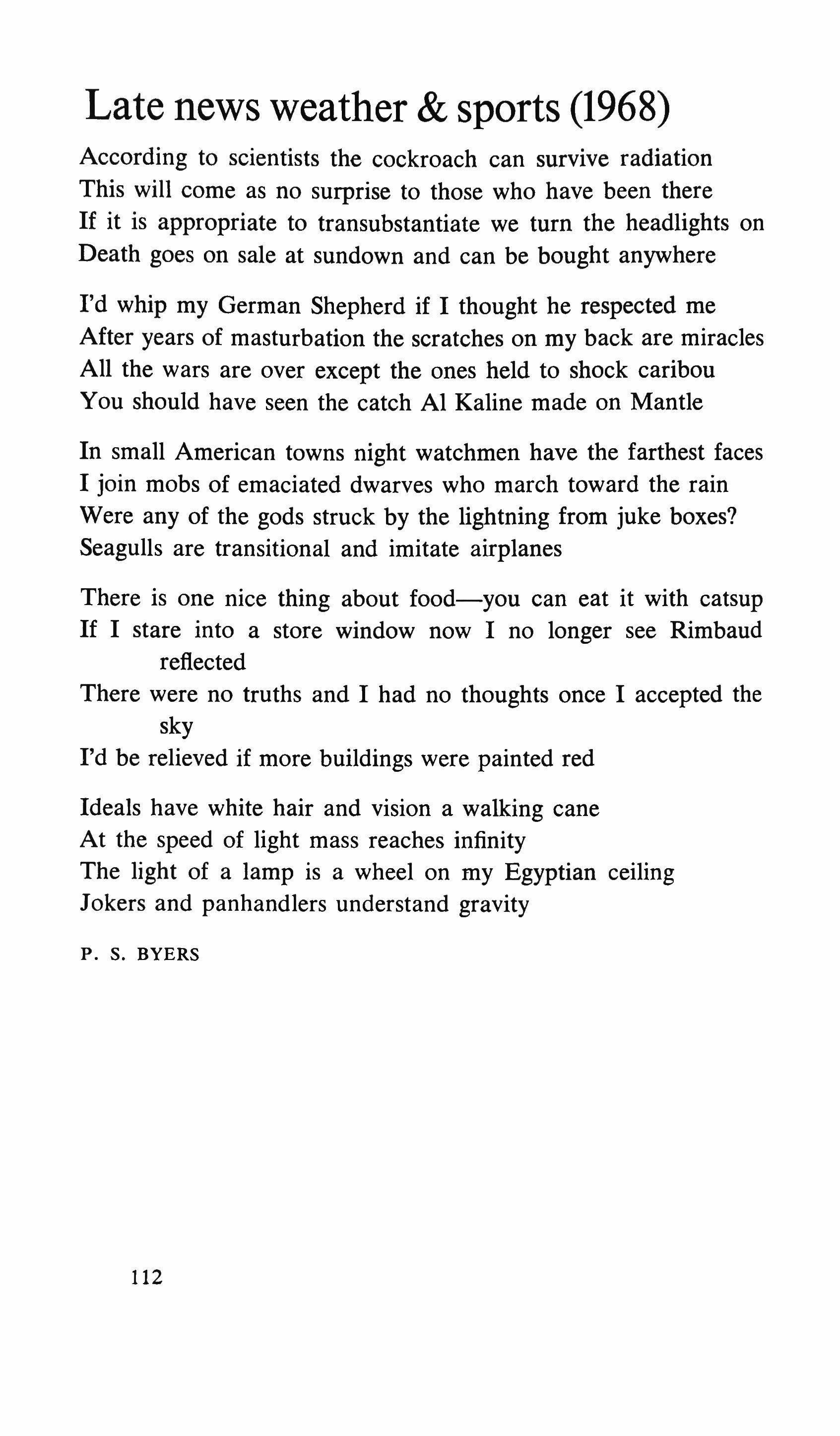
According to scientists the cockroach can survive radiation
This will come as no surprise to those who have been there
If it is appropriate to transubstantiate we turn the headlights on Death goes on sale at sundown and can be bought anywhere
I'd whip my German Shepherd if I thought he respected me After years of masturbation the scratches on my back are miracles
All the wars are over except the ones held to shock caribou
You should have seen the catch Al Kaline made on Mantle
In small American towns night watchmen have the farthest faces I join mobs of emaciated dwarves who march toward the rain
Were any of the gods struck by the lightning from juke boxes? Seagulls are transitional and imitate airplanes
There is one nice thing about food-you can eat it with catsup
If I stare into a store window now I no longer see Rimbaud reflected
There were no truths and I had no thoughts once I accepted the sky
I'd be relieved if more buildings were painted red
Ideals have white hair and vision a walking cane
At the speed of light mass reaches infinity
The light of a lamp is a wheel on my Egyptian ceiling
Jokers and panhandlers understand gravity
P. S. BYERS
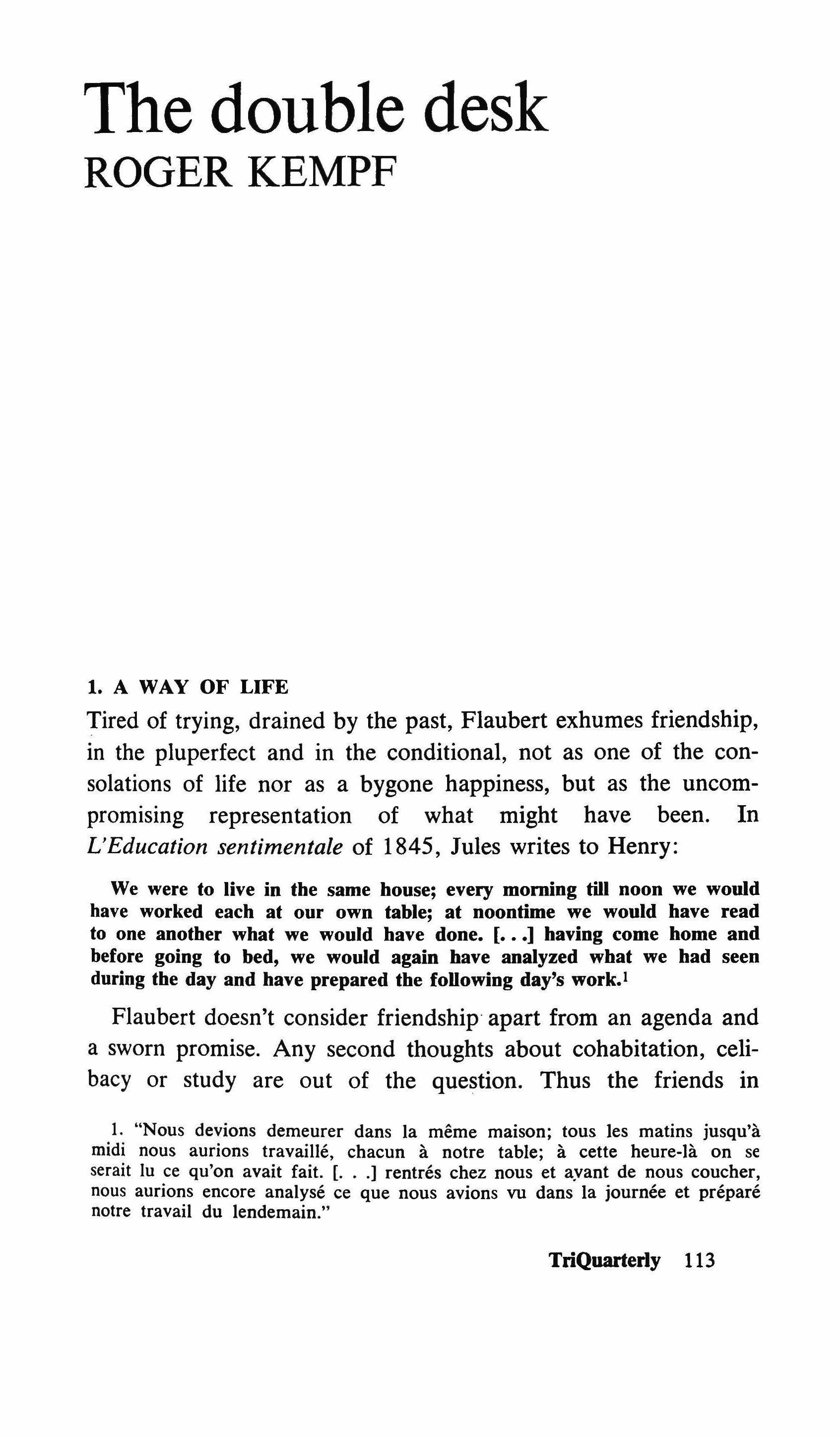
Tired of trying, drained by the past, Flaubert exhumes friendship, in the pluperfect and in the conditional, not as one of the consolations of life nor as a bygone happiness, but as the uncompromising representation of what might have been. In L'Education sentimentale of 1845 Jules writes to Henry:
We were to live in the same house; every morning till noon we would have worked each at our own table; at noontime we would have read to one another what we would have done. [ ] having come home and before going to bed, we would again have analyzed what we had seen during the day and have prepared the following day's work,!
Flaubert doesn't consider friendship apart from an agenda and a sworn promise. Any second thoughts about cohabitation, celibacy or study are out of the question. Thus the friends in
1. "Nous devions demeurer dans la meme maison; tous les matins jusqu'a midi nous aurions travaille, chacun a notre table; a cette heure-la on se serait lu ce qu'on avait fait. [ J rentres chez nous et avant de nous coucher, nous aurions encore analyse ce que nous avions vu dans la journee et prepare notre travail du lendemain."
TriQuarterly 113
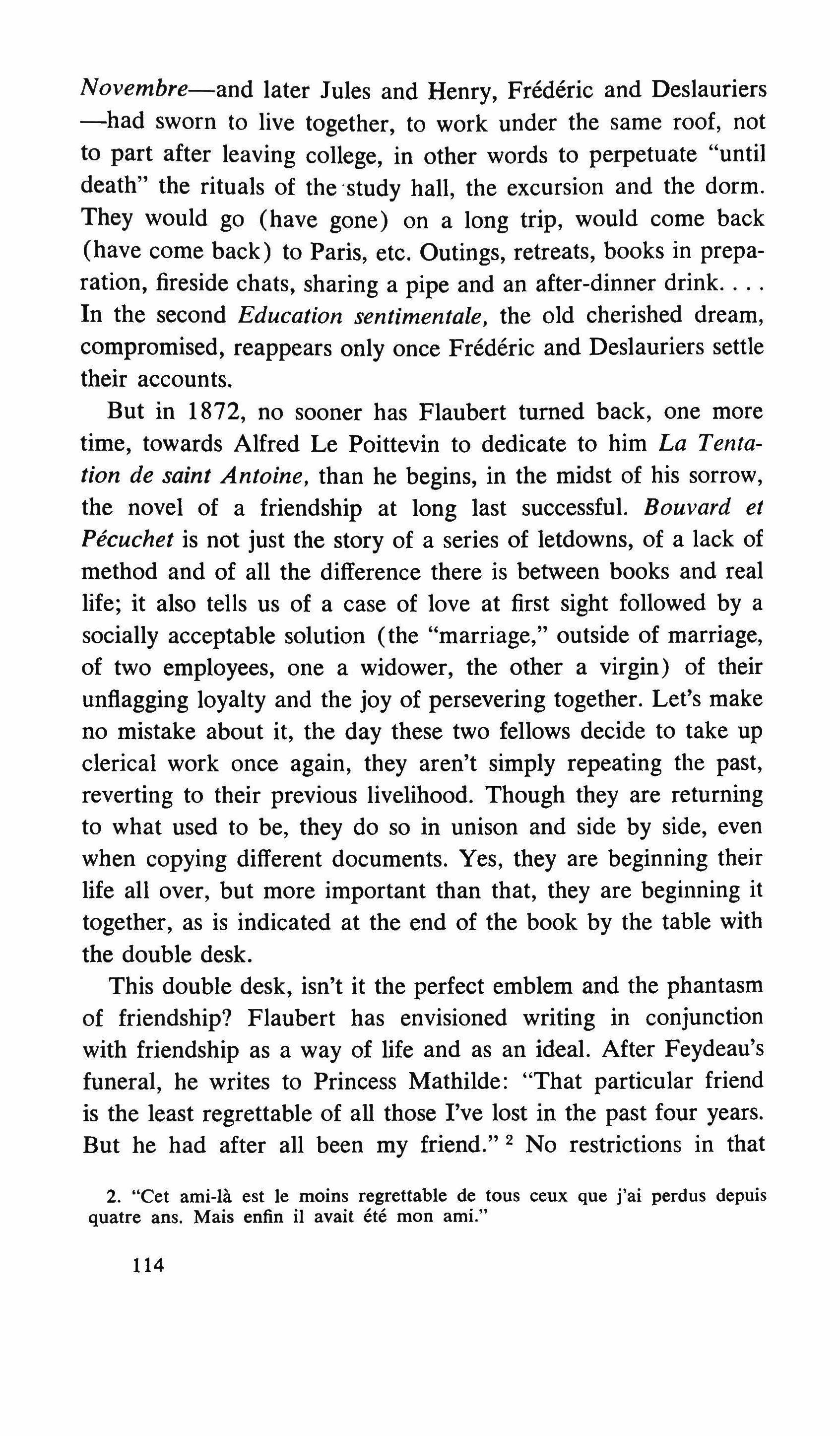
Novembre-and later Jules and Henry, Frederic and Deslauriers -had sworn to live together, to work under the same roof, not to part after leaving college, in other words to perpetuate "until death" the rituals of the 'study hall, the excursion and the dorm. They would go (have gone) on a long trip, would come back (have come back) to Paris, etc. Outings, retreats, books in preparation, fireside chats, sharing a pipe and an after-dinner drink In the second Education sentimentale, the old cherished dream, compromised, reappears only once Frederic and Deslauriers settle their accounts.
But in 1872, no sooner has Flaubert turned back, one more time, towards Alfred Le Poittevin to dedicate to him La Tentation de saint Antoine, than he begins, in the midst of his sorrow, the novel of a friendship at long last successful. Bouvard et Pecuchet is not just the story of a series of letdowns, of a lack of method and of all the difference there is between books and real life; it also tells us of a case of love at first sight followed by a socially acceptable solution (the "marriage," outside of marriage, of two employees, one a widower, the other a virgin) of their unflagging loyalty and the joy of persevering together. Let's make no mistake about it, the day these two fellows decide to take up clerical work once again, they aren't simply repeating the past, reverting to their previous livelihood. Though they are returning to what used to be, they do so in unison and side by side, even when copying different documents. Yes, they are beginning their life all over, but more important than that, they are beginning it together, as is indicated at the end of the book by the table with the double desk.
This double desk, isn't it the perfect emblem and the phantasm of friendship? Flaubert has envisioned writing in conjunction with friendship as a way of life and as an ideal. After Feydeau's funeral, he writes to Princess Mathilde: "That particular friend is the least regrettable of all those I've lost in the past four years. But he had after all been my friend." 2 No restrictions in that
2. "Cet ami-la est le moins regrettable de tous ceux que j'ai perdus depuis quatre ans. Mais enfin il avait ete mon ami."
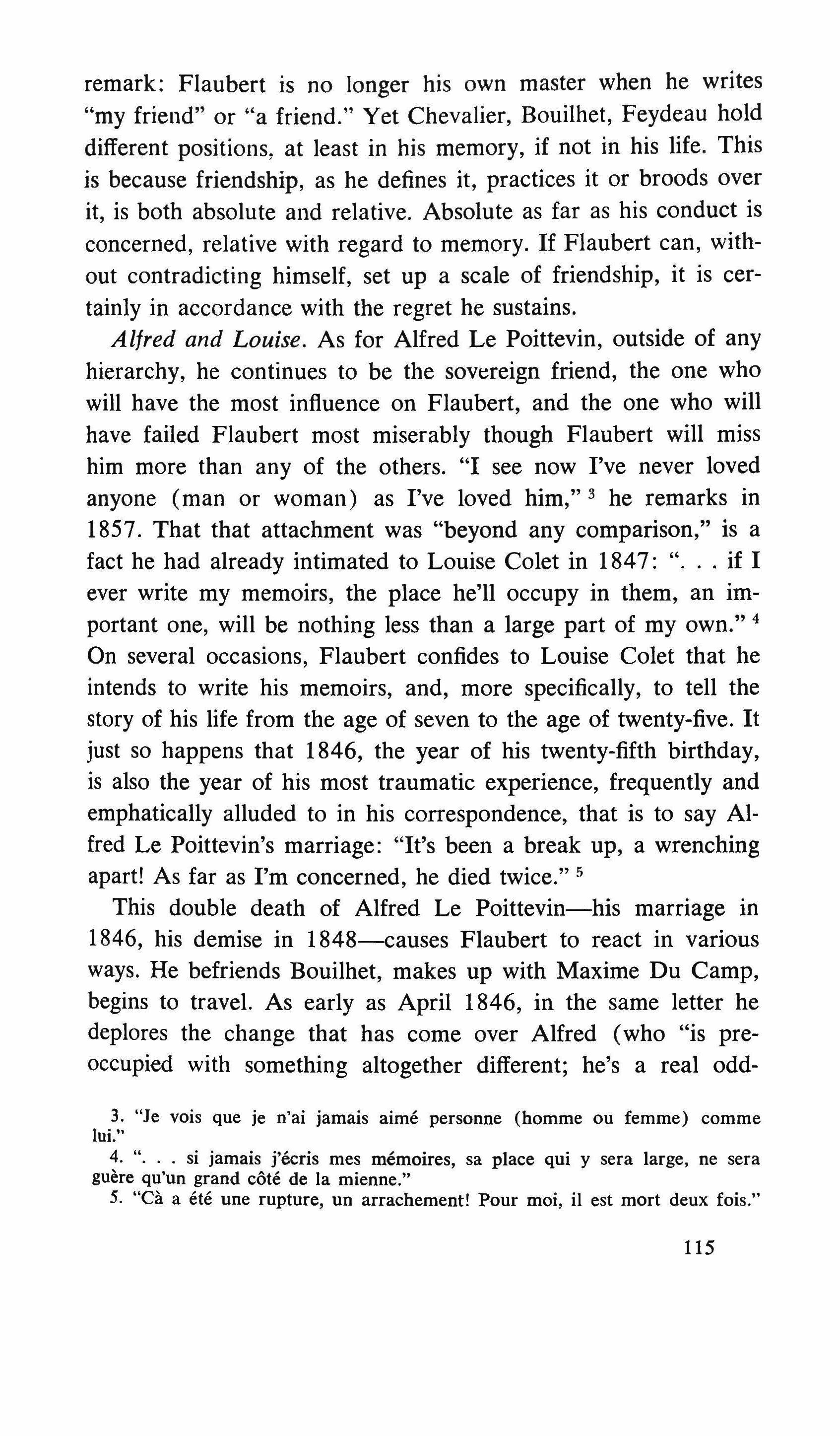
remark: Flaubert is no longer his own master when he writes "my friend" or "a friend." Yet Chevalier, Bouilhet, Feydeau hold different positions, at least in his memory, if not in his life. This is because friendship, as he defines it, practices it or broods over it, is both absolute and relative. Absolute as far as his conduct is concerned, relative with regard to memory. If Flaubert can, without contradicting himself, set up a scale of friendship, it is certainly in accordance with the regret he sustains.
Alfred and Louise. As for Alfred Le Poittevin, outside of any hierarchy, he continues to be the sovereign friend, the one who will have the most influence on Flaubert, and the one who will have failed Flaubert most miserably though Flaubert will miss him more than any of the others. "I see now I've never loved anyone (man or woman) as I've loved him," 3 he remarks in 1857. That that attachment was "beyond any comparison," is a fact he had already intimated to Louise Colet in 1847: ". if I ever write my memoirs, the place he'll occupy in them, an important one, will be nothing less than a large part of my own." 4 On several occasions, Flaubert confides to Louise Colet that he intends to write his memoirs, and, more specifically, to tell the story of his life from the age of seven to the age of twenty-five. It just so happens that 1846, the year of his twenty-fifth birthday, is also the year of his most traumatic experience, frequently and emphatically alluded to in his correspondence, that is to say Alfred Le Poittevin's marriage: "It's been a break up, a wrenching apart! As far as I'm concerned, he died twice." 5
This double death of Alfred Le Poittevin-his marriage in 1846, his demise in 1848-causes Flaubert to react in various ways. He befriends Bouilhet, makes up with Maxime Du Camp, begins to travel. As early as April 1846, in the same letter he deplores the change that has come over Alfred (who "is preoccupied with something altogether different; he's a real odd-
3. "Je vois que je n'ai jamais aime personne (homme ou femme) comme lui."
4. si jamais j'eeris mes memoires, sa place qui y sera large, ne sera guere qu'un grand cote de la mienne."
5. "Ca a ete une rupture, un arrachement! Pour moi, il est mort deux fois."
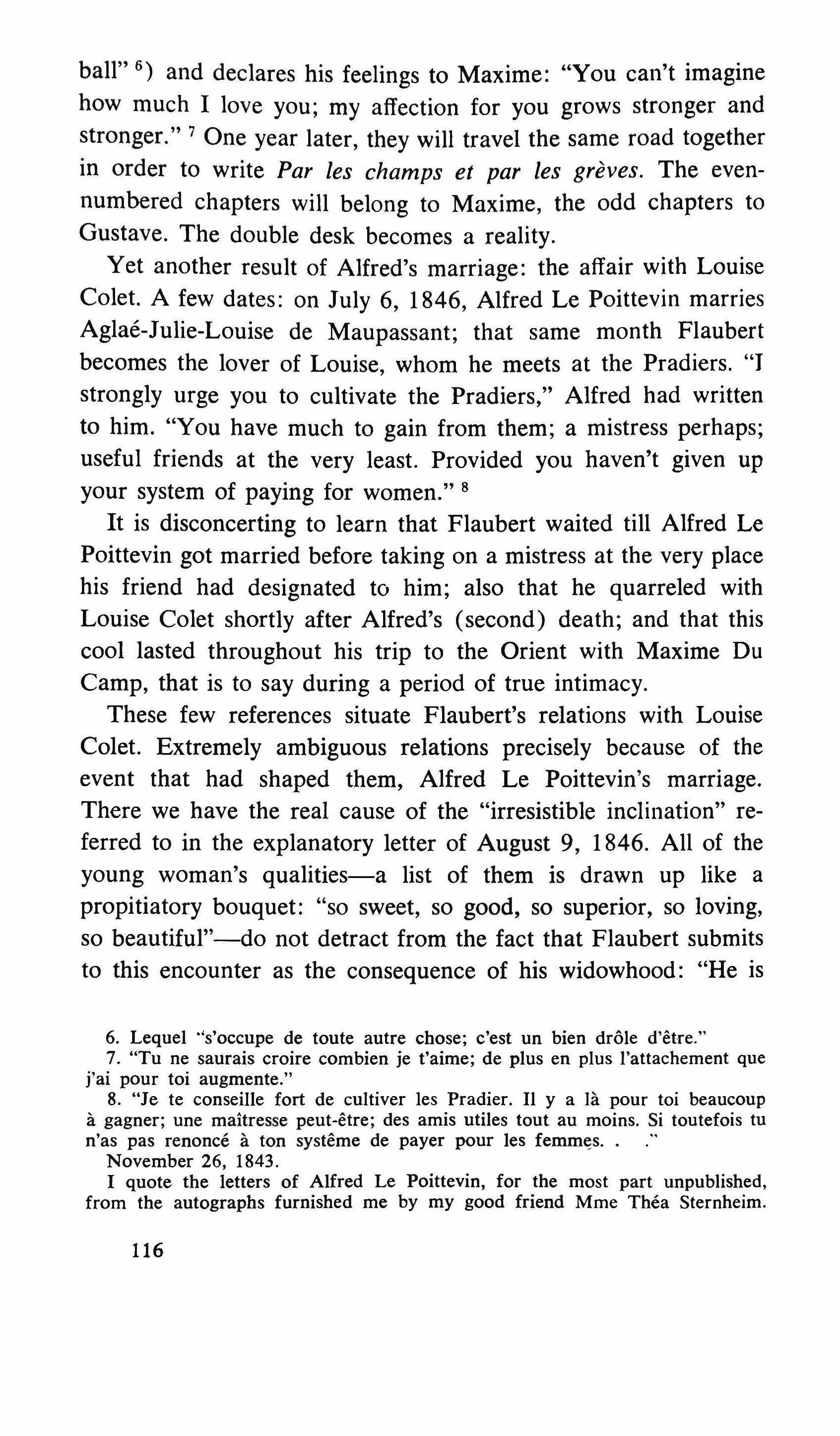
ball" 6) and declares his feelings to Maxime: "You can't imagine how much I love you; my affection for you grows stronger and stronger." 7 One year later, they will travel the same road together in order to write Par les champs et par les greves. The evennumbered chapters will belong to Maxime, the odd chapters to Gustave. The double desk becomes a reality.
Yet another result of Alfred's marriage: the affair with Louise Colet. A few dates: on July 6, 1846, Alfred Le Poittevin marries Aglae-Julie-Louise de Maupassant; that same month Flaubert becomes the lover of Louise, whom he meets at the Pradiers. "I strongly urge you to cultivate the Pradiers," Alfred had written to him. "You have much to gain from them; a mistress perhaps; useful friends at the very least. Provided you haven't given up your system of paying for women." 8
It is disconcerting to learn that Flaubert waited till Alfred Le Poittevin got married before taking on a mistress at the very place his friend had designated to him; also that he quarreled with Louise Colet shortly after Alfred's (second) death; and that this cool lasted throughout his trip to the Orient with Maxime Du Camp, that is to say during a period of true intimacy.
These few references situate Flaubert's relations with Louise Colet. Extremely ambiguous relations precisely because of the event that had shaped them, Alfred Le Poittevin's marriage. There we have the real cause of the "irresistible inclination" referred to in the explanatory letter of August 9, 1846. All of the young woman's qualities-a list of them is drawn up like a propitiatory bouquet: "so sweet, so good, so superior, so loving, so beautiful"-do not detract from the fact that Flaubert submits to this encounter as the consequence of his widowhood: "He is
6. Lequel "s'occupe de toute autre chose; c'est un bien drole d'etre."
7. "Tu ne saurais croire combien je t'aime; de plus en plus l'attachement que j'ai pour toi augmente."
8. "Je te conseille fort de cultiver les Pradier. II y a la pour toi beaucoup a gagner; une maitresse peut-etre; des amis utiles tout au moins. Si toutefois tu n'as pas renonce a ton systeme de payer pour les femm«<s.. November 26, 1843.
I quote the letters of Alfred Le Poittevin, for the most part unpublished, from the autographs furnished me by my good friend Mme Thea Sternheim.
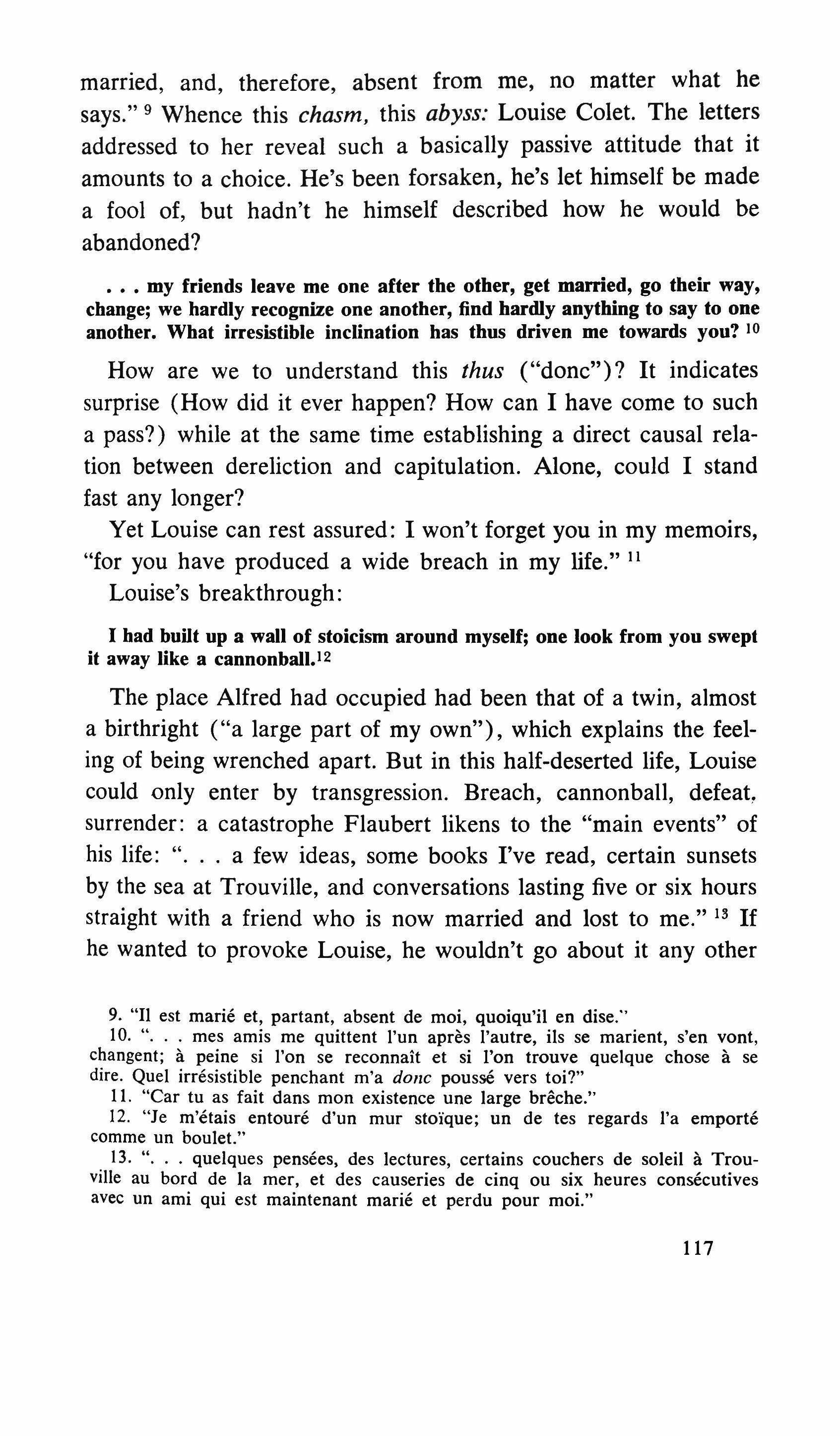
married, and, therefore, absent from me, no matter what he says." 9 Whence this chasm, this abyss: Louise Colet. The letters addressed to her reveal such a basically passive attitude that it amounts to a choice. He's been forsaken, he's let himself be made a fool of, but hadn't he himself described how he would be abandoned?
my friends leave me one after the other, get married, go their way, change; we hardly recognize one another, find hardly anything to say to one another. What irresistible inclination has thus driven me towards you? 10
How are we to understand this thus ("donc")? It indicates surprise (How did it ever happen? How can I have come to such a pass?) while at the same time establishing a direct causal relation between dereliction and capitulation. Alone, could I stand fast any longer?
Yet Louise can rest assured: I won't forget you in my memoirs, "for you have produced a wide breach in my life." II Louise's breakthrough:
I had built up a wall of stoicism around myself; one look from you swept it away like a cannonball.tx
The place Alfred had occupied had been that of a twin, almost a birthright ("a large part of my own"), which explains the feeling of being wrenched apart. But in this half-deserted life, Louise could only enter by transgression. Breach, cannonball, defeat, surrender: a catastrophe Flaubert likens to the "main events" of his life: " a few ideas, some books I've read, certain sunsets by the sea at Trouville, and conversations lasting five or six hours straight with a friend who is now married and lost to me." 13 If he wanted to provoke Louise, he wouldn't go about it any other
9. "11 est marie et, partant, absent de moi, quoiqu'il en dise."
10. mes amis me quittent l'un apres l'autre, ils se marient, s'en vont, changent; it peine si l'on se reconnait et si ron trouve quelque chose it se dire. QueI irresistible penchant m'a done pousse vers toi?"
11. "Car tu as fait dans mon existence une large breche."
12. "Je m'etais entoure d'un mur stoique; un de tes regards l'a ernporte comme un boulet."
13. quelques pensees, des lectures, certains couchers de soleil it Trouville au bord de la mer, et des causeries de cinq ou six heures consecutives avec un ami qui est maintenant marie et perdu pour moi."
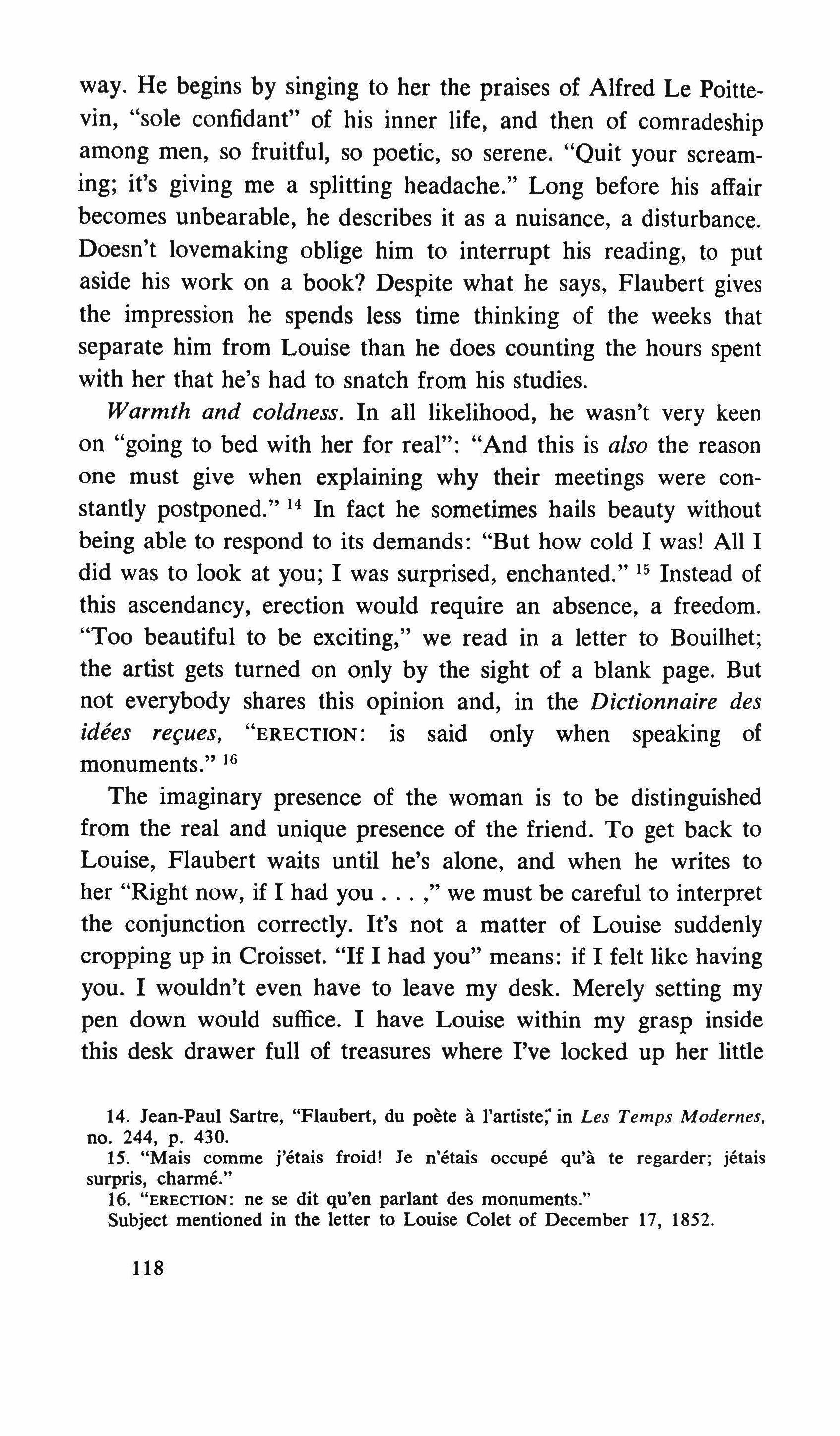
way. He begins by singing to her the praises of Alfred Le Poittevin, "sole confidant" of his inner life, and then of comradeship among men, so fruitful, so poetic, so serene. "Quit your screaming; it's giving me a splitting headache." Long before his affair becomes unbearable, he describes it as a nuisance, a disturbance. Doesn't lovemaking oblige him to interrupt his reading, to put aside his work on a book? Despite what he says, Flaubert gives the impression he spends less time thinking of the weeks that separate him from Louise than he does counting the hours spent with her that he's had to snatch from his studies.
Warmth and coldness. In all likelihood, he wasn't very keen on "going to bed with her for real": "And this is also the reason one must give when explaining why their meetings were constantly postponed."
14 In fact he sometimes hails beauty without being able to respond to its demands: "But how cold I was! All I did was to look at you; I was surprised, enchanted." 15 Instead of this ascendancy, erection would require an absence, a freedom. "Too beautiful to be exciting," we read in a letter to Bouilhet; the artist gets turned on only by the sight of a blank page. But not everybody shares this opinion and, in the Dictionnaire des idees recues, "ERECTION: is said only when speaking of monuments." 16
The imaginary presence of the woman is to be distinguished from the real and unique presence of the friend. To get back to Louise, Flaubert waits until he's alone, and when he writes to her "Right now, if I had you ," we must be careful to interpret the conjunction correctly. It's not a matter of Louise suddenly cropping up in Croisset. "If I had you" means: if I felt like having you. I wouldn't even have to leave my desk. Merely setting my pen down would suffice. I have Louise within my grasp inside this desk drawer full of treasures where I've locked up her little
14. Jean-Paul Sartre, "Flaubert, du poete a l'artiste.' in Les Temps Modernes, no. 244, p. 430.
15. "Mais comme j'etais froid! Je n'etais occupe qu'a te regarder; jetais surpris, charrne."
16. "ERECTION: ne se dit qu'en parlant des monuments." Subject mentioned in the letter to Louise Colet of December 17, 1852.
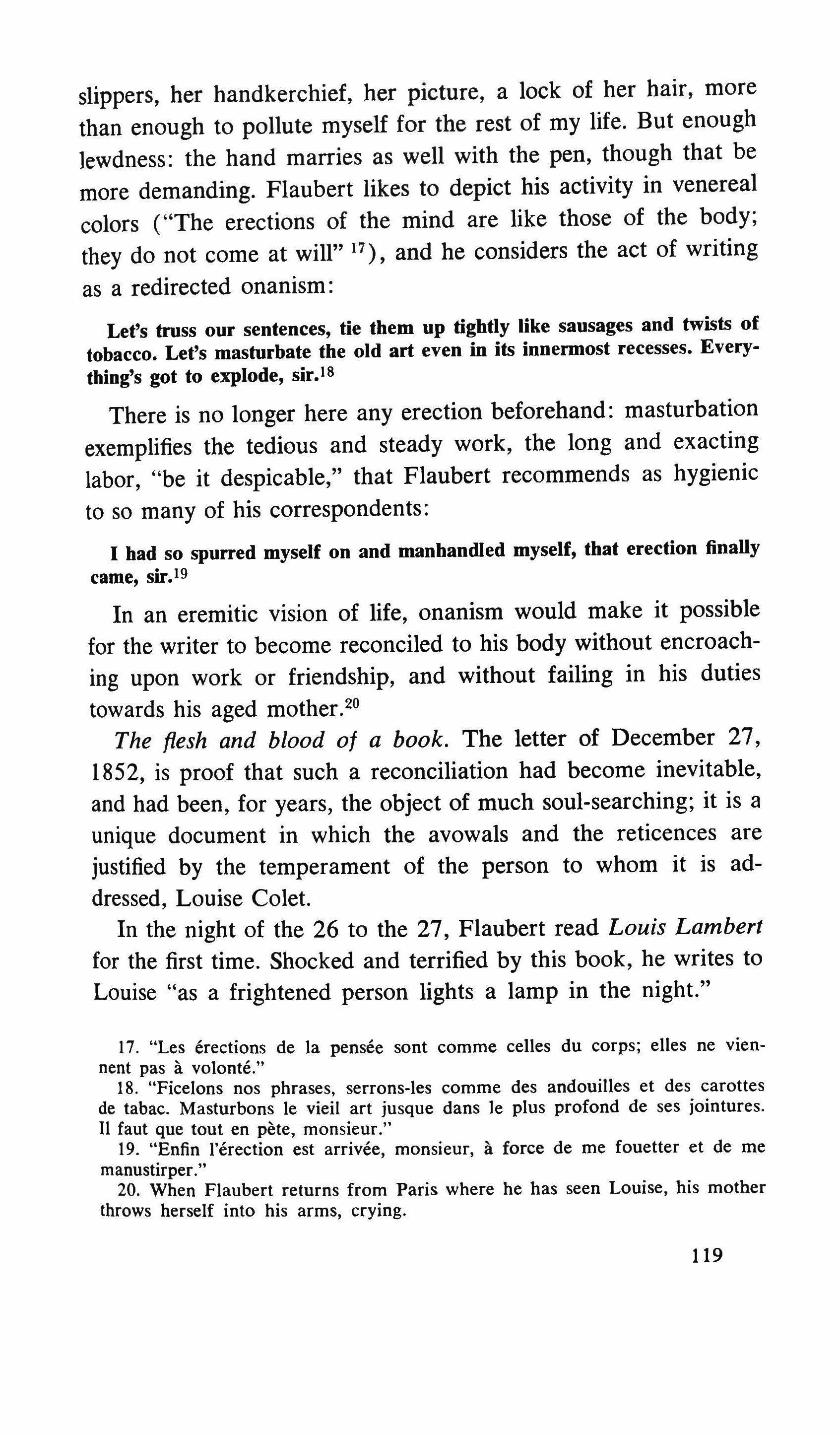
slippers, her handkerchief, her picture, a lock of her hair, more than enough to pollute myself for the rest of my life. But enough lewdness: the hand marries as well with the pen, though that be more demanding. Flaubert likes to depict his activity in venereal colors ("The erections of the mind are like those of the body; they do not come at will" 17), and he considers the act of writing as a redirected onanism:
Let's truss our sentences, tie tbem up tigbtly like sausages and twists of tobacco. Let's masturbate tbe old art even in its innermost recesses. Everytbing's got to explode, sir.IS
There is no longer here any erection beforehand: masturbation exemplifies the tedious and steady work, the long and exacting labor, "be it despicable," that Flaubert recommends as hygienic to so many of his correspondents:
I bad so spurred myself on and manbandled myself, tbat erection finally came, sir.I9
In an eremitic vision of life, onanism would make it possible for the writer to become reconciled to his body without encroaching upon work or friendship, and without failing in his duties towards his aged mother. 20
The flesh and blood of a book. The letter of December 27, 1852, is proof that such a reconciliation had become inevitable, and had been, for years, the object of much soul-searching; it is a unique document in which the avowals and the reticences are justified by the temperament of the person to whom it is addressed, Louise Colet.
In the night of the 26 to the 27, Flaubert read Louis Lambert for the first time. Shocked and terrified by this book, he writes to Louise "as a frightened person lights a lamp in the night."
17. "Les erections de la pensee sont comme celles du corps; elles ne viennent pas It volonte."
18. "Ficelons nos phrases, serrons-Ies comme des andouilles et des carottes de tabac. Masturbons le vieil art jusque dans Ie plus profond de ses jointures. II faut que tout en pete, monsieur."
19. "Entin l'erection est arrivee, monsieur, It force de me fouetter et de me manustirper.
20. When Flaubert returns from Paris where he has seen Louise, his mother throws herself into his arms, crying.
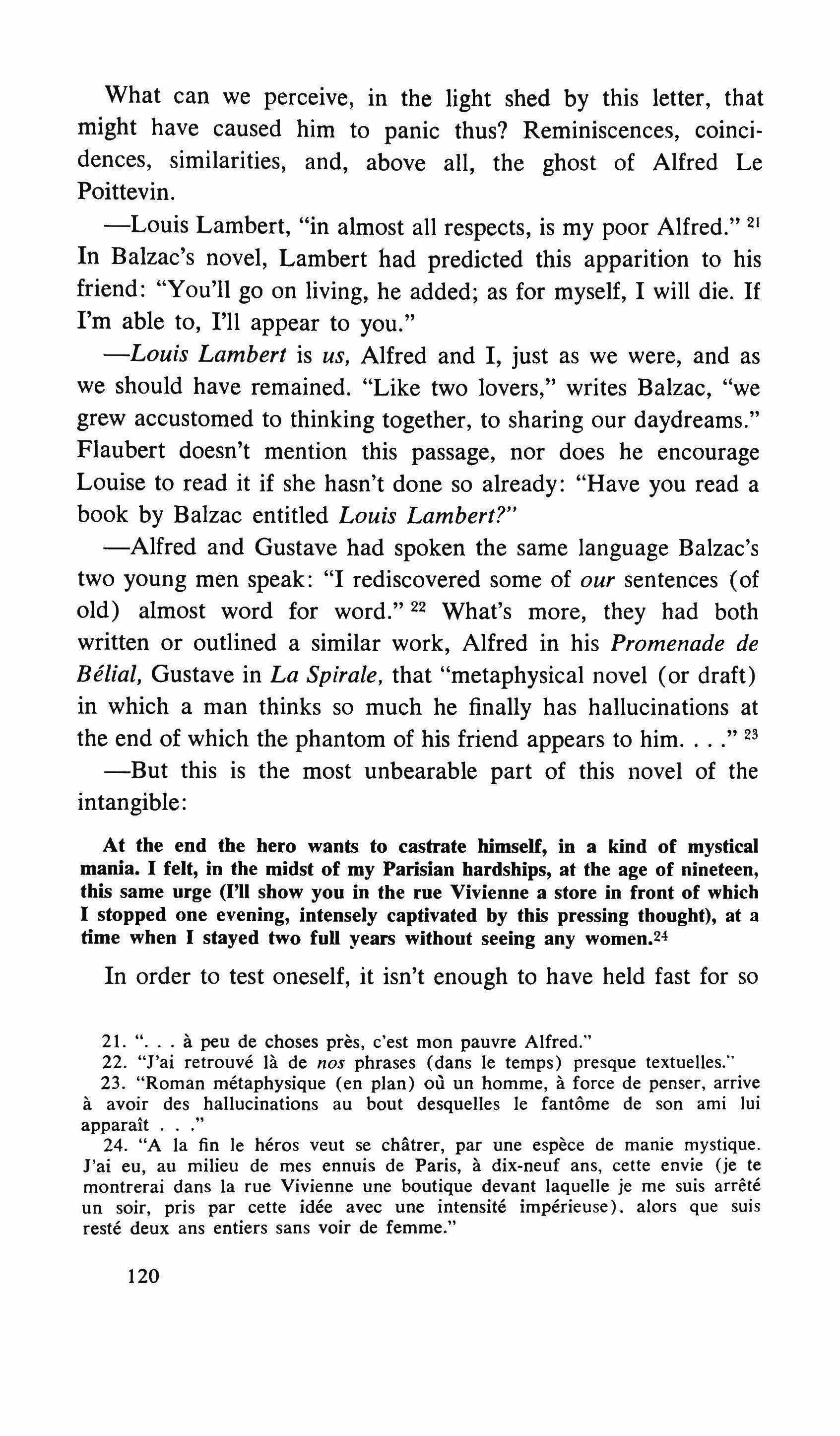
What can we perceive, in the light shed by this letter, that might have caused him to panic thus? Reminiscences, coincidences, similarities, and, above all, the ghost of Alfred Le Poittevin.
-Louis Lambert, "in almost all respects, is my poor Alfred." 21 In Balzac's novel, Lambert had predicted this apparition to his friend: "You'll go on living, he added; as for myself, I will die. If I'm able to, I'll appear to you."
-Louis Lambert is us, Alfred and I, just as we were, and as we should have remained. "Like two lovers," writes Balzac, "we grew accustomed to thinking together, to sharing our daydreams." Flaubert doesn't mention this passage, nor does he encourage Louise to read it if she hasn't done so already: "Have you read a book by Balzac entitled Louis Lambert?"
-Alfred and Gustave had spoken the same language Balzac's two young men speak: "I rediscovered some of our sentences (of old) almost word for word." 22 What's more, they had both written or outlined a similar work, Alfred in his Promenade de Belial, Gustave in La Spirale, that "metaphysical novel (or draft) in which a man thinks so much he finally has hallucinations at the end of which the phantom of his friend appears to him 23
-But this is the most unbearable part of this novel of the
At the end the hero wants to castrate himself, in a kind of mystical mania. I felt, in the midst of my Parisian hardships, at the age of nineteen, this same urge (I'll show you in the rue Vivienne a store in front of which I stopped one evening, intensely captivated by this pressing thought), at a time when I stayed two full years without seeing any women.t+
In order to test oneself, it isn't enough to have held fast for so
21. a peu de choses pres, c'est mon pauvre Alfred."
22. "J'ai retrouve la de nos phrases (dans Ie temps) presque textuelles."
23. "Roman metaphysique (en plan) oil un homme, a force de penser, arrive a avoir des hallucinations au bout desquelles Ie fantome de son ami lui apparait
24. "A la fin Ie heros veut se chatrer, par une espece de manie mystique. J'ai eu, au milieu de mes ennuis de Paris, a dix-neuf ans, cette envie (je te montrerai dans la rue Vivienne une boutique devant laquelle je me suis arrete un soir, pris par cette idee avec une intensite imperieuse), alors que suis reste deux ans entiers sans voir de femme." 120
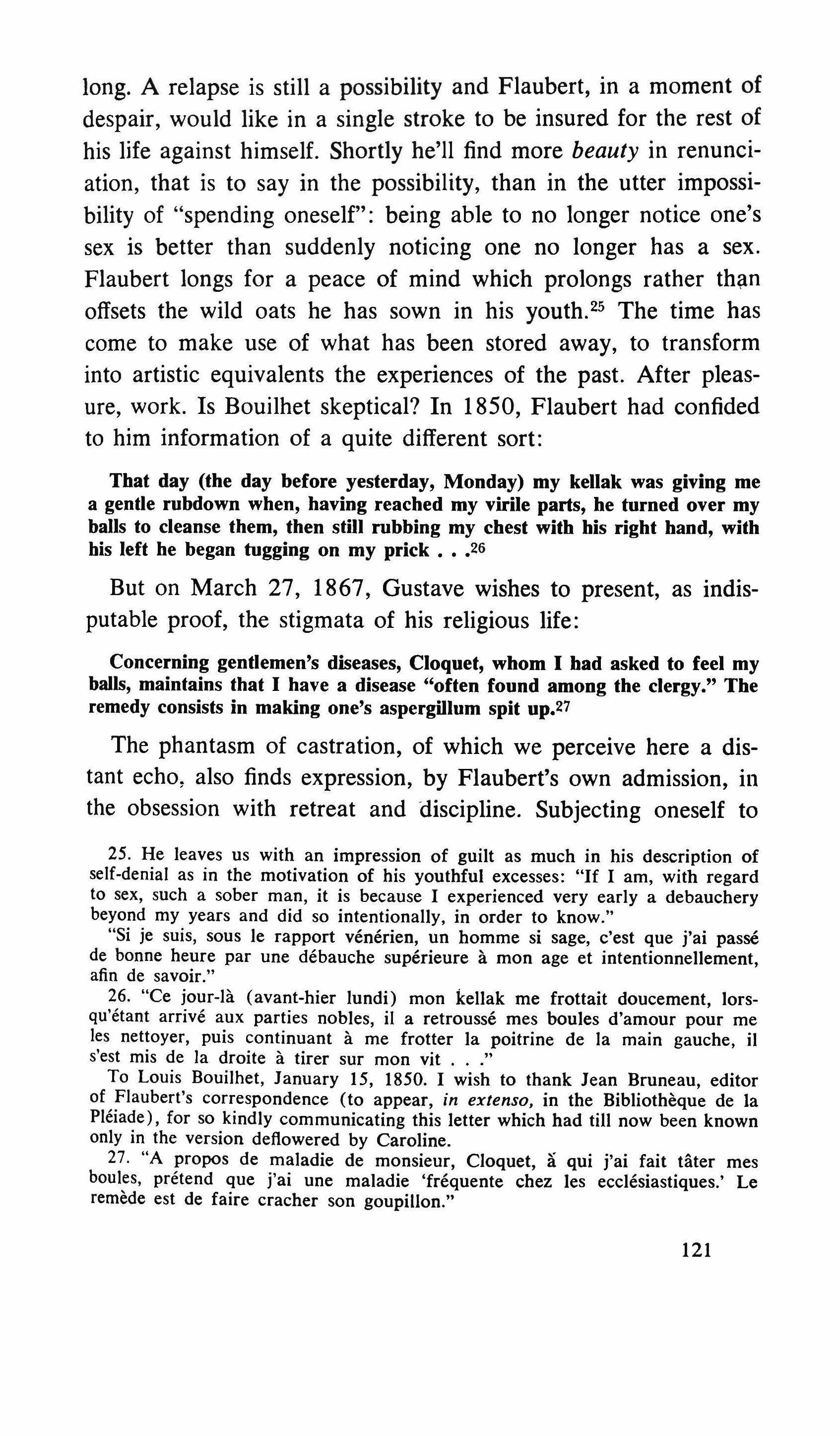
long. A relapse is still a possibility and Flaubert, in a moment of despair, would like in a single stroke to be insured for the rest of his life against himself. Shortly he'll find more beauty in renunciation, that is to say in the possibility, than in the utter impossibility of "spending oneself": being able to no longer notice one's sex is better than suddenly noticing one no longer has a sex. Flaubert longs for a peace of mind which prolongs rather than offsets the wild oats he has sown in his youth." The time has come to make use of what has been stored away, to transform into artistic equivalents the experiences of the past. After pleasure, work. Is Bouilhet skeptical? In 1850, Flaubert had confided to him information of a quite different sort:
That day (the day before yesterday, Monday) my kellak was giving me a gentle rubdown when, having reached my virile parts, he turned over my balls to cleanse them, then still rubbing my chest with his right hand, with his left he began tugging on my prick .•• 26
But on March 27, 1867, Gustave wishes to present, as indisputable proof, the stigmata of his religious life:
Concerning gentlemen's diseases, Cloquet, whom I had asked to feel my balls, maintains that I have a disease "often found among the clergy." The remedy consists in making one's aspergillum spit Up.27
The phantasm of castration, of which we perceive here a distant echo, also finds expression, by Flaubert's own admission, in the obsession with retreat and discipline. Subjecting oneself to
25. He leaves us with an impression of guilt as much in his description of self-denial as in the motivation of his youthful excesses: "If I am, with regard to sex, such a sober man, it is because I experienced very early a debauchery beyond my years and did so intentionally, in order to know."
"Si je suis, sous Ie rapport venerien, un homme si sage, c'est que j'ai passe de bonne heure par une debauche superieure a mon age et intentionnellement, afin de savoir."
26. "Ce jour-Ill. (avant-hier lundi) mon kellak me frottait doucement, lorsqu'etant arrive aux parties nobles, il a retrousse mes boules d'amour pour me les nettoyer, puis continuant a me frotter la poitrine de la main gauche, il s'est mis de la droite a tirer sur mon vit ."
To Louis Bouilhet, January 15, 1850. I wish to thank Jean Bruneau, editor of Flaubert's correspondence (to appear, in extenso, in the Bibliotheque de la Pleiade) for so kindly communicating this letter which had till now been known only in the version deflowered by Caroline.
27. "A propos de maladie de monsieur, Cloquet, Ii qui j'ai fait tater mes bouIes, pretend que j'ai une maladie 'frequente chez les ecclesiastiques.' Le remede est de faire cracher son goupillon."
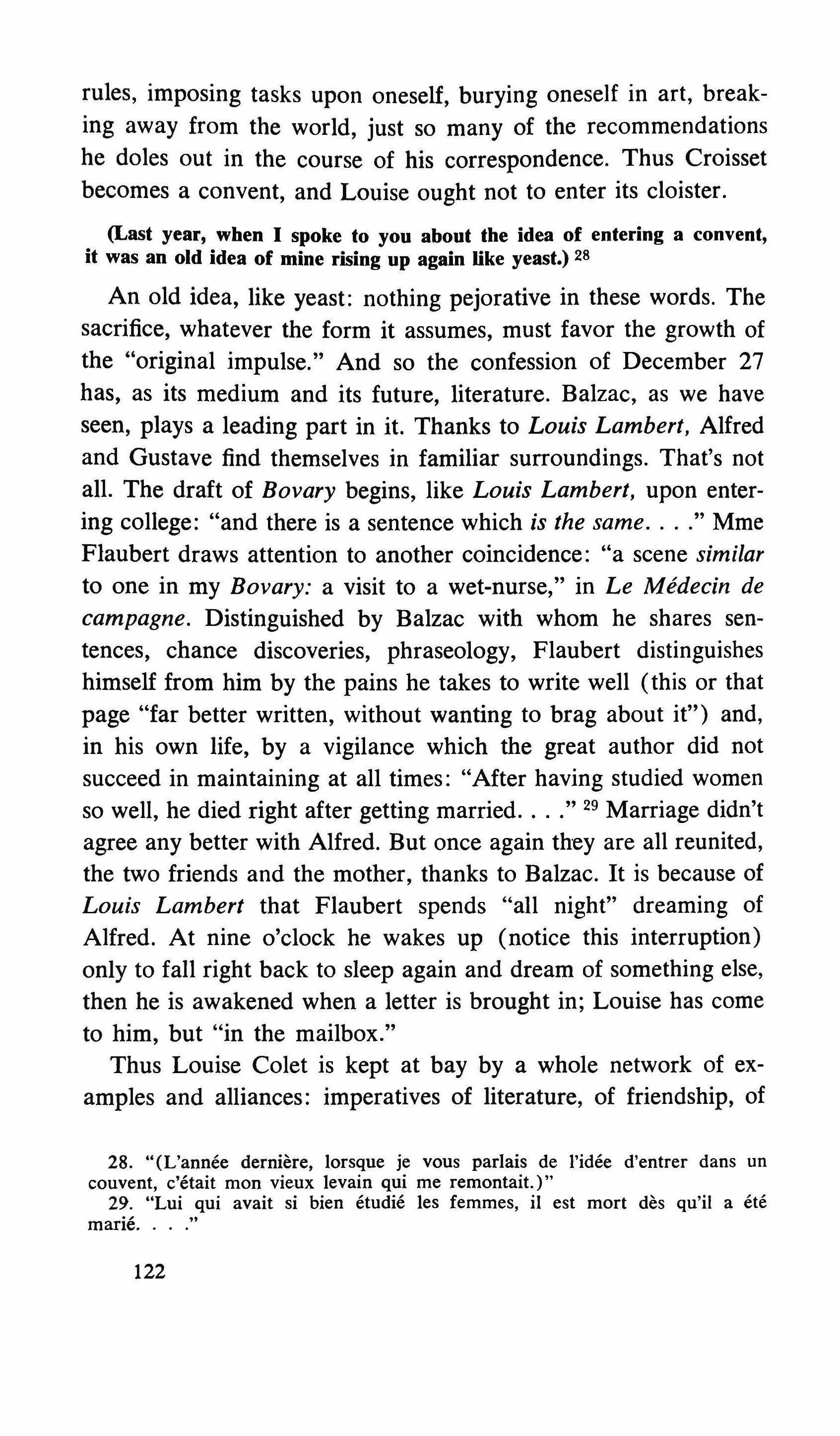
rules, imposing tasks upon oneself, burying oneself in art, breaking away from the world, just so many of the recommendations he doles out in the course of his correspondence. Thus Croisset becomes a convent, and Louise ought not to enter its cloister.
(Last year, when I spoke to you about the idea of entering a convent, it was an old idea of mine rising up again like yeast.) 28
An old idea, like yeast: nothing pejorative in these words. The sacrifice, whatever the form it assumes, must favor the growth of the "original impulse." And so the confession of December 27 has, as its medium and its future, literature. Balzac, as we have seen, plays a leading part in it. Thanks to Louis Lambert, Alfred and Gustave find themselves in familiar surroundings. That's not all. The draft of Bovary begins, like Louis Lambert, upon entering college: "and there is a sentence which is the same Mme Flaubert draws attention to another coincidence: "a scene similar to one in my Bovary: a visit to a wet-nurse," in Le Medecin de campagne. Distinguished by Balzac with whom he shares sentences, chance discoveries, phraseology, Flaubert distinguishes himself from him by the pains he takes to write well (this or that page "far better written, without wanting to brag about it") and, in his own life, by a vigilance which the great author did not succeed in maintaining at all times: "After having studied women so well, he died right after getting married 29 Marriage didn't agree any better with Alfred. But once again they are all reunited, the two friends and the mother, thanks to Balzac. It is because of Louis Lambert that Flaubert spends "all night" dreaming of Alfred. At nine o'clock he wakes up (notice this interruption) only to fall right back to sleep again and dream of something else, then he is awakened when a letter is brought in; Louise has come to him, but "in the mailbox."
Thus Louise Colet is kept at bay by a whole network of examples and alliances: imperatives of literature, of friendship, of
28. "(L'annee derniere, lorsque je vous parlais de l'idee d'entrer dans un couvent, c'etait mon vieux levain qui me remontait.)"
29. "Lui qui avait si bien etudie les femmes, il est mort des qu'il a ete marie

filial love. As a result he leaves behind this enormous and bountiful correspondence the very bulk of which symbolizes the chosen separation.
The female element. Flaubert intentionally reveals to Louise Colet his recollection of the rue Vivienne. How he has hoped that she might experience the same vertigo and tear herself away from her sex. Sometimes he's convinced it's already been done, that nature has made a mistake, and at other times he despairs: "I've always tried (but it seems I'm failing) to make of you a sublime hermaphrodite." 30
In his novels, on the contrary, all the women stand more or less "on the side of the males." For example, Flaubert grants them such a "penetrating" gaze that Frederic, passing in front of Mme Arnoux as she looks up, involuntarily droops his shoulders. Baudelaire was the first to realize that because of what in her is most energetic, most ambitious, and also most conducive to flights of fancy, Mme Bovary has remained a man. Like the fully armed Pallas, sprung forth from the brain of Zeus, this bizarre androgyne has retained all the allurements of a virile soul in a charming feminine body.
Baudelaire, however, supposes this virility to be the result of a transfusion and not a mutation: "Then all the author had to do, in order to fully achieve his exploit, was to cast off (insofar as it was possible) his sex and make himself into a woman. The result is marvellous to behold; this is so because, despite all his enthusiasm for the part, he was unable to keep from instilling virile blood in the veins of his creation How Baudelaire would have been surprised if he could have skimmed through even the expurgated text of the correspondence. He would have read in a letter addressed to Feydeau:
I grew faint from the very first column and wet myself two or three times! How visible it is! good God! 31
30. "J'ai toujours essaye (mais il me semble que j'echoue), de faire de toi un hermaphrodite sublime."
31. "J'ai paIi des la premiere colonne et mouille deux ou trois fois! comme �a se voit! nom de Dieu."
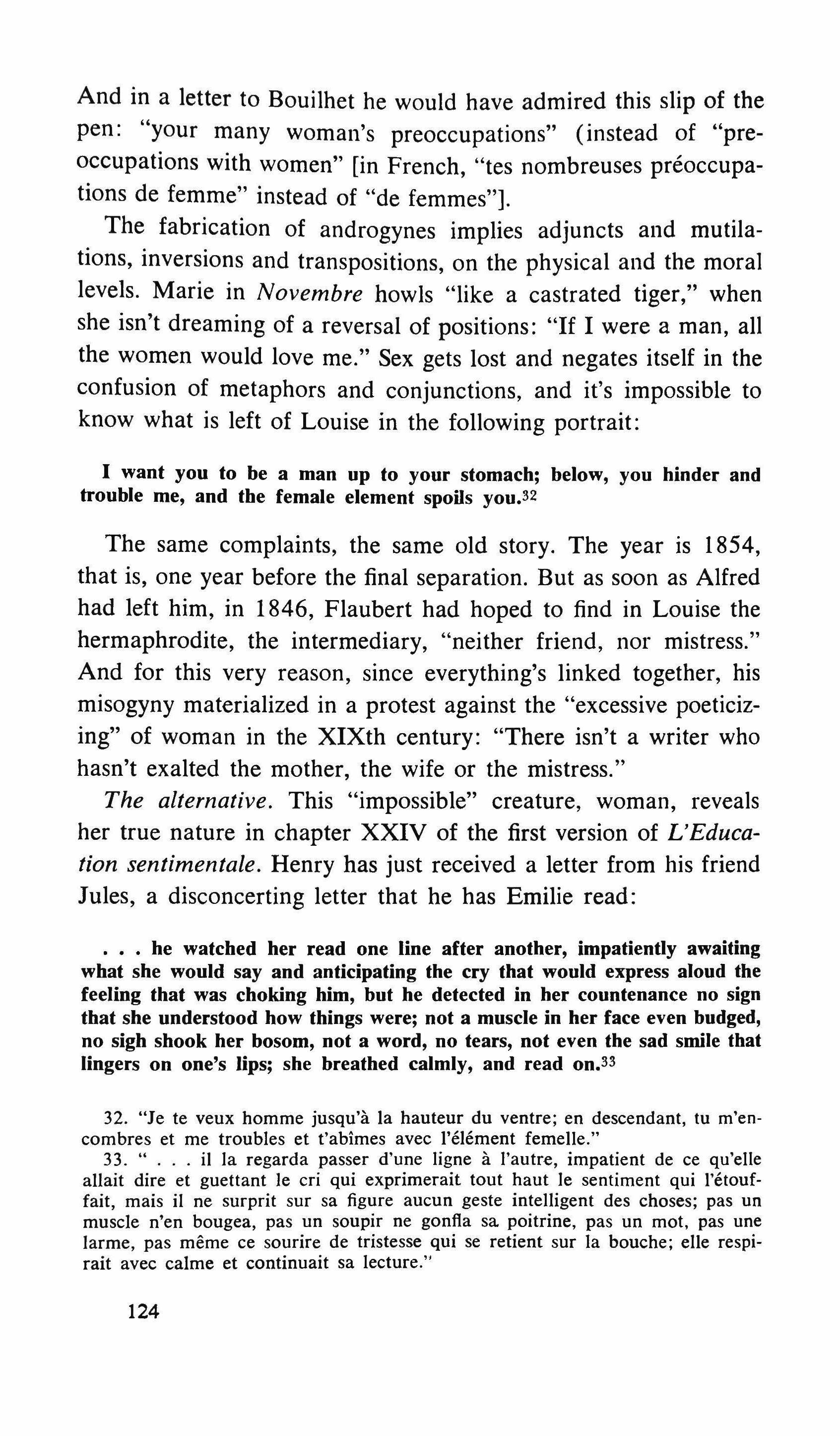
And in a letter to Bouilhet he would have admired this slip of the pen: "your many woman's preoccupations" (instead of "preoccupations with women" [in French, "tes nombreuses preoccupations de femme" instead of "de femmes"].
The fabrication of androgynes implies adjuncts and mutilations, inversions and transpositions, on the physical and the moral levels. Marie in Novembre howls "like a castrated tiger," when she isn't dreaming of a reversal of positions: "If I were a man, all the women would love me." Sex gets lost and negates itself in the confusion of metaphors and conjunctions, and it's impossible to know what is left of Louise in the following portrait:
I want you to be a man up to your stomach; below, you hinder and trouble me, and the female element spoils you.32
The same complaints, the same old story. The year is 1854, that is, one year before the final separation. But as soon as Alfred had left him, in 1846, Flaubert had hoped to find in Louise the hermaphrodite, the intermediary, "neither friend, nor mistress." And for this very reason, since everything's linked together, his misogyny materialized in a protest against the "excessive poeticizing" of woman in the XIXth century: "There isn't a writer who hasn't exalted the mother, the wife or the mistress."
The alternative. This "impossible" creature, woman, reveals her true nature in chapter XXIV of the first version of L'Education sentimentale. Henry has just received a letter from his friend Jules, a disconcerting letter that he has Emilie read:
he watched her read one line after another, impatiently awaiting what she would say and anticipating the cry that would express aloud the feeling that was choking him, but he detected in her countenance no sign that she understood how things were; not a muscle in her face even budged, no sigh shook her bosom, not a word, no tears, not even the sad smile that lingers on one's lips; she breathed calmly, and read on.33
32. "Je te veux homme jusqu'a la hauteur du ventre; en descendant, tu m'encombres et me troubles et t'abirnes avec l'element femelle."
33. ilia regarda passer d'une ligne a l'autre, impatient de ce qu'elle allait dire et guettant Ie cri qui exprimerait tout haut Ie sentiment qui l'etouffait, mais i1 ne surprit sur sa figure aucun geste intelligent des choses; pas un muscle n'en bougea, pas un soupir ne gonfla sa poitrine, pas un mot, pas une larme, pas rnerne ce sourire de tristesse qui se retient sur la bouche; elle respirait avec calme et continuait sa lecture."
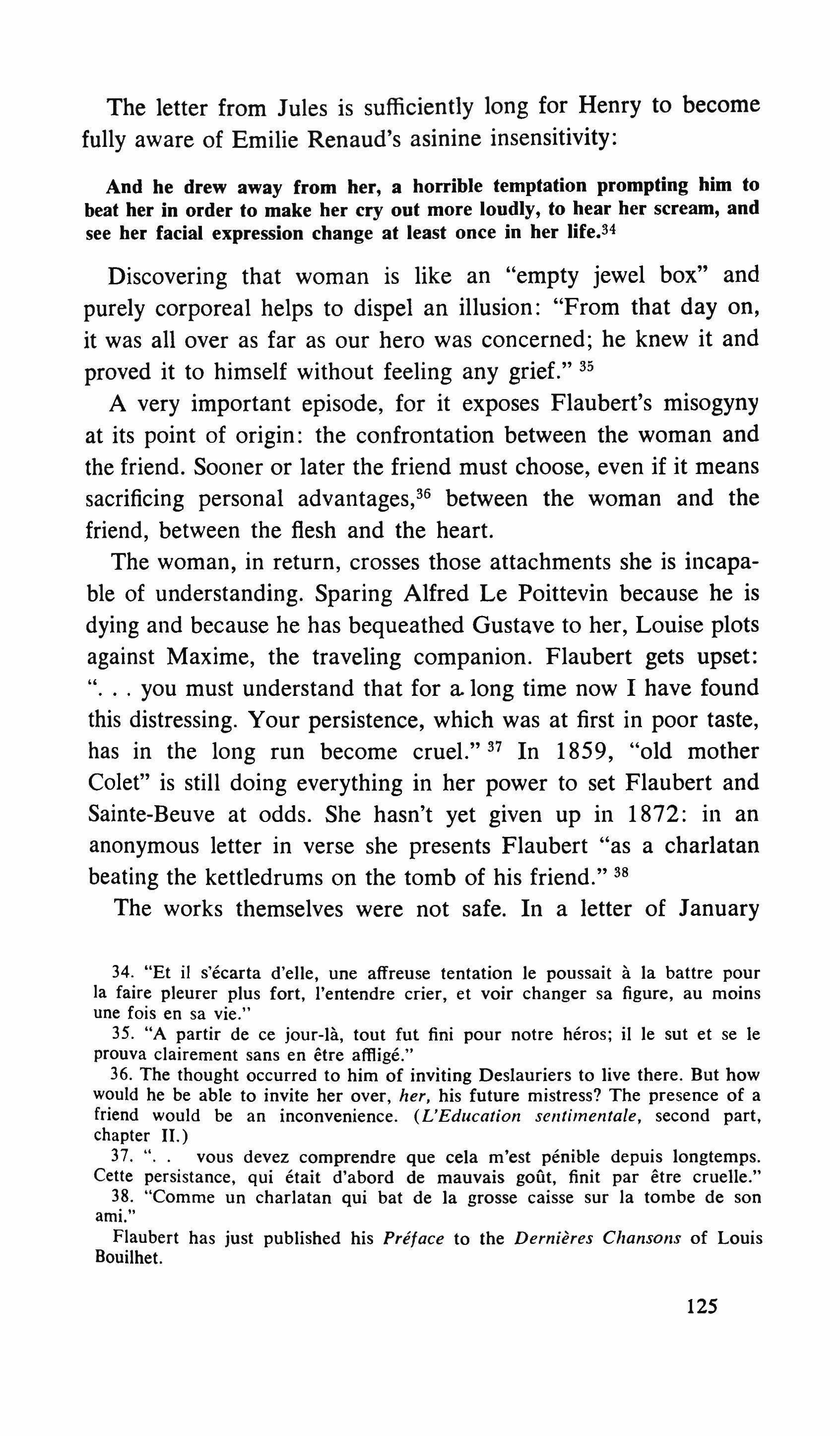
The letter from Jules is sufficiently long for Henry to become fully aware of Emilie Renaud's asinine insensitivity:
And he drew away from her, a horrible temptation prompting him to beat her in order to make her cry out more loudly, to hear her scream, and see her facial expression change at least once in her life.34
Discovering that woman is like an "empty jewel box" and purely corporeal helps to dispel an illusion: "From that day on, it was all over as far as our hero was concerned; he knew it and proved it to himself without feeling any grief." 35
A very important episode, for it exposes Flaubert's misogyny at its point of origin: the confrontation between the woman and the friend. Sooner or later the friend must choose, even if it means sacrificing personal advantages," between the woman and the friend, between the flesh and the heart.
The woman, in return, crosses those attachments she is incapable of understanding. Sparing Alfred Le Poittevin because he is dying and because he has bequeathed Gustave to her, Louise plots against Maxime, the traveling companion. Flaubert gets upset: you must understand that for a. long time now I have found this distressing. Your persistence, which was at first in poor taste, has in the long run become cruel." 37 In 1859, "old mother Colet' is still doing everything in her power to set Flaubert and Sainte-Beuve at odds. She hasn't yet given up in 1872: in an anonymous letter in verse she presents Flaubert "as a charlatan beating the kettledrums on the tomb of his friend." 38
The works themselves were not safe. In a letter of January
34. "Et il s'ecarta d'elle, une affreuse tentation Ie poussait a la battre pour la faire pleurer plus fort, I'entendre crier, et voir changer sa figure, au moins une fois en sa vie."
35. "A partir de ce jour-la, tout fut fini pour notre heros; il Ie sut et se Ie prouva c1airement sans en etre afflige."
36. The thought occurred to him of inviting Deslauriers to live there. But how would he be able to invite her over, her, his future mistress? The presence of a friend would be an inconvenience. (L'Education sentimentale, second part, chapter II.)
37. ".. vous devez comprendre que cela m'est penible depuis longtemps. Cette persistance, qui etait d'abord de mauvais gout, finit par etre cruelle."
38. "Comme un charlatan qui bat de la grosse caisse sur la tombe de son ami."
Flaubert has just published his Preface to the Dernieres Chansons of Louis Bouilhet.
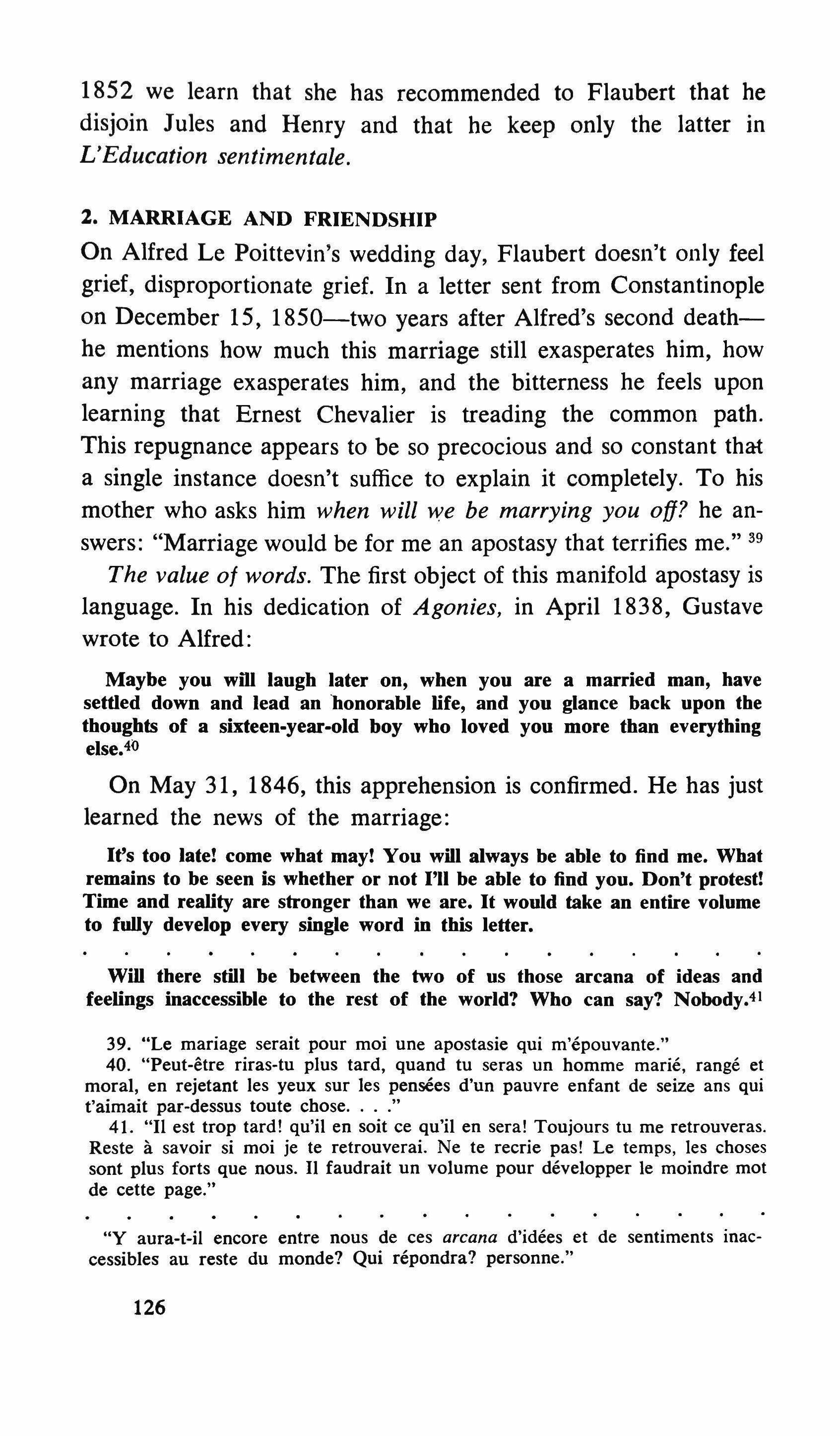
1852 we learn that she has recommended to Flaubert that he disjoin Jules and Henry and that he keep only the latter in L'Education sentimentale.
On Alfred Le Poittevin's wedding day, Flaubert doesn't only feel grief, disproportionate grief. In a letter sent from Constantinople on December 15, 1850-two years after Alfred's second deathhe mentions how much this marriage still exasperates him, how any marriage exasperates him, and the bitterness he feels upon learning that Ernest Chevalier is treading the common path. This repugnance appears to be so precocious and so constant that a single instance doesn't suffice to explain it completely. To his mother who asks him when will we be marrying you off? he answers: "Marriage would be for me an apostasy that terrifies me." 39
The value of words. The first object of this manifold apostasy is language. In his dedication of Agonies, in April 1838, Gustave wrote to Alfred:
Maybe you will laugb later on, when you are a married man, have settled down and lead an honorable life, and you glance back upon the thoughts of a sixteen-year-old boy who loved you more than everything else.4lJ
On May 31, 1846, this apprehension is confirmed. He has just learned the news of the marriage:
It's too late! come what may! You will always be able to find me. What remains to be seen is whether or not I'll be able to find you. Don't protest! Time and reality are stronger than we are. It would take an entire volume to fully develop every single word in this letter.
Will there still be between the two of us those arcana of ideas and feelings inaccessible to the rest of the world? Who can say? Nobody.r!
39. "Le mariage serait pour moi une apostasie qui m'epouvante."
40. "Peut-etre riras-tu plus tard, quand tu seras un homme marie, range et moral, en rejetant les yeux sur les pensees d'un pauvre enfant de seize ans qui t'aimait par-dessus toute chose
41. "II est trop tard! qu'il en soit ce qu'il en sera! Toujours tu me retrouveras. Reste It savoir si moi je te retrouverai. Ne te recrie pas! Le temps, les choses sont plus forts que nous. II faudrait un volume pour developper Ie moindre mot de cette page."
"Y aura-toil encore entre nous de ces arcana d'idees et de sentiments inaccessibles au reste du monde? Qui repondra? personne."
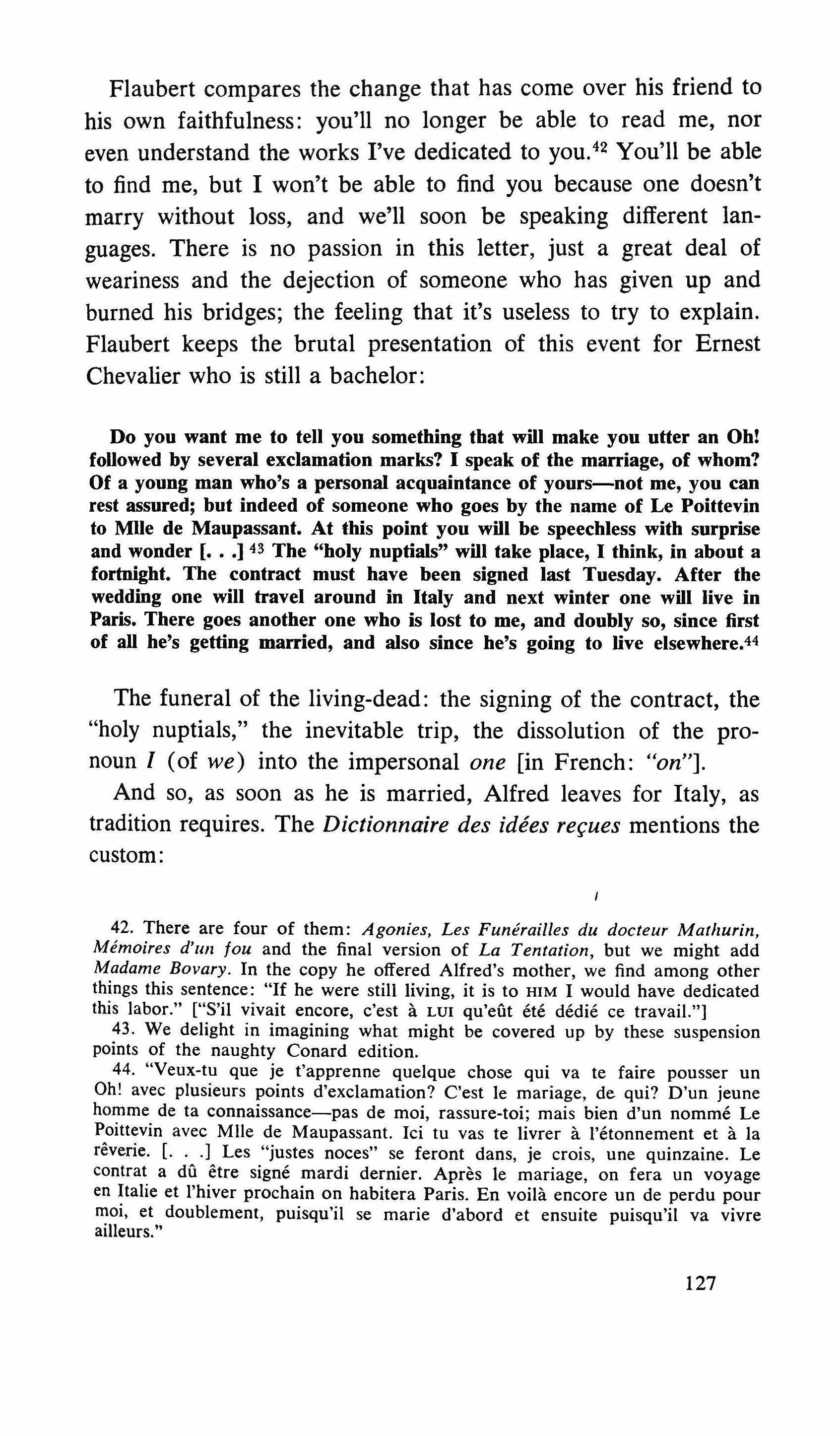
Flaubert compares the change that has come over his friend to his own faithfulness: you'll no longer be able to read me, nor even understand the works I've dedicated to you. 42 You'll be able to find me, but I won't be able to find you because one doesn't marry without loss, and we'll soon be speaking different languages. There is no passion in this letter, just a great deal of weariness and the dejection of someone who has given up and burned his bridges; the feeling that it's useless to try to explain. Flaubert keeps the brutal presentation of this event for Ernest Chevalier who is still a bachelor:
Do you want me to tell you something that will make you utter an Oh! followed by several exclamation marks? I speak of the marriage, of whom? Of a young man who's a personal acquaintance of yours-not me, you can rest assured; but indeed of someone who goes by the name of Le Poittevin to Mile de Maupassant. At this point you will be speechless with surprise and wonder [ ] 43 The "holy nuptials" will take place, I think, in about a fortnight. The contract must have been signed last Tuesday. After the wedding one will travel around in Italy and next winter one will live in Paris. There goes another one who is lost to me, and doubly so, since first of all he's getting married, and also since he's going to live elsewhere.s!
The funeral of the living-dead: the signing of the contract, the "holy nuptials," the inevitable trip, the dissolution of the pronoun 1 (of we) into the impersonal one [in French: "on"].
And so, as soon as he is married, Alfred leaves for Italy, as tradition requires. The Dictionnaire des idees recues mentions the custom:
42. There are four of them: Agonies, Les Funerailles du docteur Mathurin, Memoires d'tui [ou and the final version of La Tentation, but we might add Madame Bovary. In the copy he offered Alfred's mother, we find among other things this sentence: "If he were still living, it is to HIM I would have dedicated this labor." ["S'il vivait encore, c'est a LUI qu'efrt ete dedie ce travail."]
43. We delight in imagining what might be covered up by these suspension points of the naughty Conard edition.
44. "Veux-tu que je t'apprenne quelque chose qui va te faire pousser un Oh! avec plusieurs points d'exclamation? C'est Ie mariage, de qui? D'un jeune homme de ta connaissance-pas de moi, rassure-toi; mais bien d'un nornrne Le Poittevin avec MIle de Maupassant. lei tu vas te Iivrer a l'etonnement et a la reverie. [ J Les "justes noces" se feront dans, je crois, une quinzaine. Le contrat a dfi etre signe mardi dernier. Apres Ie mariage, on fera un voyage en Italie et I'hiver prochain on habitera Paris. En voila encore un de perdu pour moi, et doublement, puisqu'il se marie d'abord et ensuite puisqu'il va vivre ailleurs."

"ITALY. Must be seen immediately after the wedding.-Brings many disappointments, not as beautiful as people say." 45
From Florence, on September 19, Alfred, still on his honeymoon, and more and more ill at ease, sends Gustave a letter so trite and scrawny he feels the need to redeem himself by the formula "and accept for yourself the assurance of my self-same attachment." 46
It is impossible not to imagine Flaubert at this point reading over previous letters. On June 7, 1843, Alfred had written to him: "We are something like the same man, and we live the same life."
On September 23, 1845: "Hew beautiful indeed is agreement " And these words in May of 1845:
Lengline is getting married tomorrow.r? Baudry on the 31st. Denouette is married. All our friends are taking the bait. So are we but not the same one! Can't you just imagine my father-in-law? I'll bet you can't picture that character, any more than that of the "boy." 48
"Boy" is underlined and put between quotation marks, so as not to be confused with the mythical character by the same name, the progeny of friendship." bis Thus even typography would allow us to date two strata of life; particularly this underlined word; proving one is not fooled and remains aloof.
And so we see the devaluation of a whole language linking the writer to the friend. By language we mean not only the particu-
45. "lTALlE. Doit se voir irnmediaternent apres le mariage.-Donne bien des deceptions, n'est pas si belle qu'on dit."
46. "et recois pour toi l'assurance de mon meme attachement."
Rene Descharmes, who published this letter, read sincere instead of meme. Hum! Hum!
47. The fortunate Mme Lengline! On November 15, 1842, Alfred, the busybody, announced to Gustave: "Lengline was in a confiding mood. He claimed to me he could fire his eight shots a night. That may be. A carbine is worth two rifles. As for myself, since I can barely fire more than three times, I feel more and more ashamed of my inferiority."
48. "Lengline se marie demain. Baudry Ie 31. Denouette es marie. Voila tous nos amis qui marchent. Nous aussi rnais ailleurs! Vois-tu d'ici mon beaupere? Je parie que tu ne te figures pas cette figure-la, plus que celle du 'garcon:
48 bis. Cf. Jean Bruneau, Les Debuts litteraires de Gustave Flaubert, 1831-1845.

larities of the small clan, its anecdotal phraseology to whichaccording to Maxime Du Camp-Flaubert was to remain faithful, but this fundamental language spoken only outside the walls of the bourgeois sanctuary, the ability to expose, to challenge, to mock. By getting married, Alfred jumps the wall and changes sides: "I think you're the victim of an illusion, and an enormous one at that, which happens every time one performs an Act whatever it may be." 49 The performing produces blindness. Alfred, in a diminished world, falls prey to the very myths he created. To marry, remarks Flaubert about Chevalier, is to forgo imagination and study. Under such conditions, how could the artist not be headed for disaster? "I associated you with all my expectations in art. That aspect of it is what makes me suffer." 50 The writer more than anyone else must remain aloof under penalty of contamination and blindness. Besides which he should remember that art is in itself an institution, "a special way of life" that implies, at the outcome of an experience, a detachment from the world. This is summed up in these words:
G. F. who loves you, despite Iiterature.s!
The fraud. The most unexpected and subtle part of Flaubert's reasoning deals with marriage itself. It would be another matter if people really married when entering into wedlock! But during the Second Empire, they are quite content with being wed: the bourgeoisie flourishes in marriage, as in the ostentation of order and respectability:
Good old Ernest! So he has gotten married, has settled down, and is a magistrate to top it all off! A born bourgeois and gentleman! Now more than ever, what a champion of order, the family and property he'll be! [ J As a magistrate he's a reactionary; married he'll be a cuckold.52
49. "Je crois que tu es dans l'illusion et dans une enorme, comme toutes les fois du reste que ron fait une Action quelle qu'elle soit."
50. "Dans tous mes espoirs d'art je t'unissais. C'est ce cote-Ia qui me fait souffrir."
51. "G. F. qui vous aime, malgre la litterature."
52. "Ce brave Ernest! Le voila done marie, etabli et magistrat par-dessus le marchel quelle balle de bourgeois et de monsieur! Comme il va bien plus que jamais defendre l'ordre, la famille et la propriete, [ J Magistrat, it est reactionnaire; marie, it sera cocu."
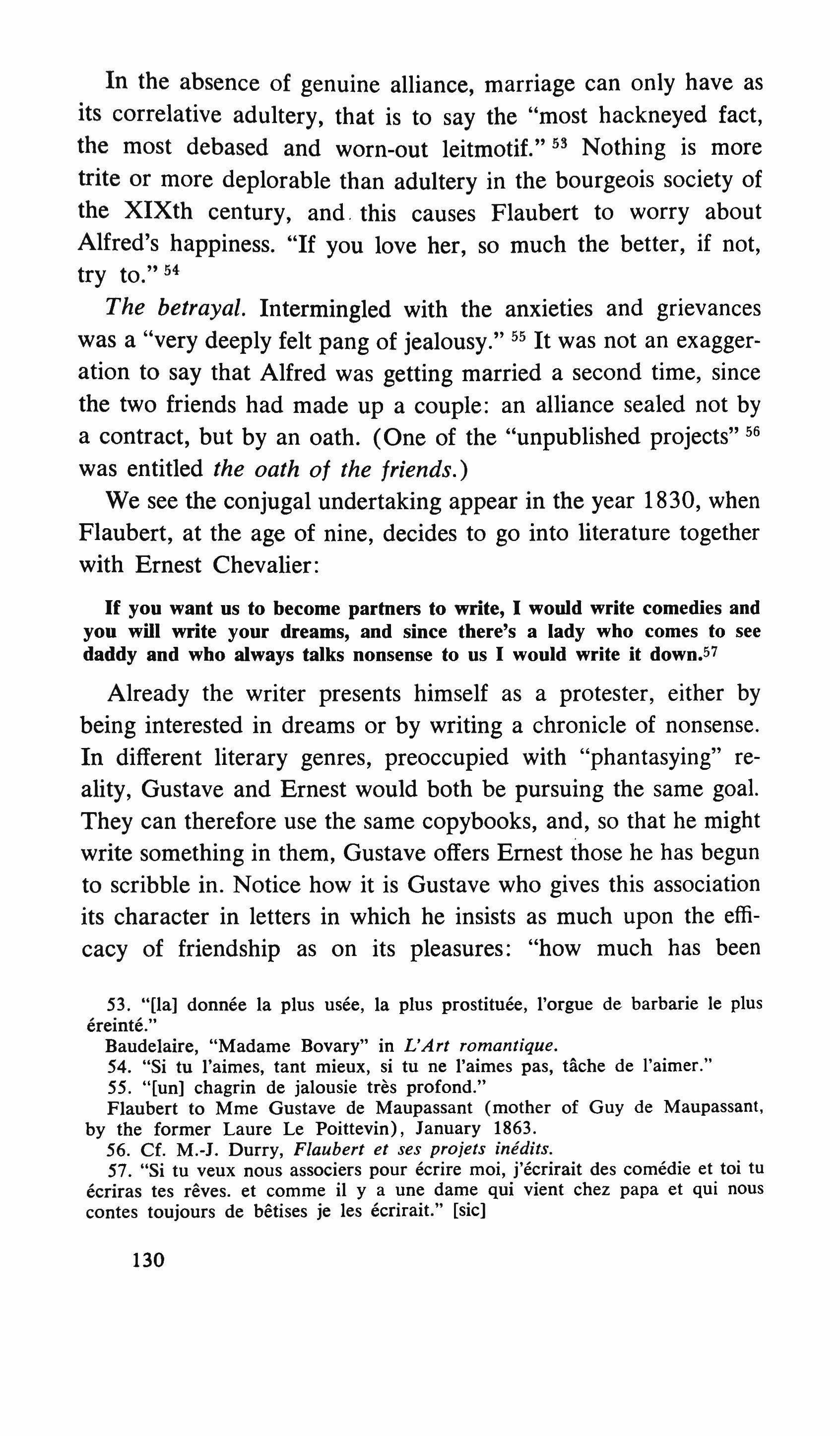
In the absence of genuine alliance, marriage can only have as its correlative adultery, that is to say the "most hackneyed fact, the most debased and worn-out leitmotif." 53 Nothing is more trite or more deplorable than adultery in the bourgeois society of the XIXth century, and, this causes Flaubert to worry about Alfred's happiness. "If you love her, so much the better, if not, try to." 54
The betrayal. Intermingled with the anxieties and grievances was a "very deeply felt pang of jealousy." 55 It was not an exaggeration to say that Alfred was getting married a second time, since the two friends had made up a couple: an alliance sealed not by a contract, but by an oath. (One of the "unpublished projects" 56 was entitled the oath of the friends.)
We see the conjugal undertaking appear in the year 1830, when Flaubert, at the age of nine, decides to go into literature together with Ernest Chevalier:
If you want us to become partners to write, I wou1d write comedies and you will write your dreams, and since there's a lady who comes to see daddy and who always talks nonsense to us I would write it down.57
Already the writer presents himself as a protester, either by being interested in dreams or by writing a chronicle of nonsense. In different literary genres, preoccupied with "phantasying" reality, Gustave and Ernest would both be pursuing the same goal. They can therefore use the same copybooks, and, so that he might write something in them, Gustave offers Ernest those he has begun to scribble in. Notice how it is Gustave who gives this association its character in letters in which he insists as much upon the efficacy of friendship as on its pleasures: "how much has been
53. "[la] donnee la plus usee, la plus prostituee, l'orgue de barbarie Ie plus ereinte."
Baudelaire, "Madame Bovary" in L'Art romantique.
54. "Si tu l'aimes, tant mieux, si tu ne l'aimes pas, tache de l'aimer."
55. "[un] chagrin de jalousie tres profond."
Flaubert to Mme Gustave de Maupassant (mother of Guy de Maupassant, by the former Laure Le Poittevin), January 1863.
56. Cf. M.-J. Durry, Flaubert et ses proiets inedits.
57. "Si tu veux nous associers pour ecrire moi, j'ecrirait des comedic et toi tu ecriras tes reves, et comme il y a une dame qui vient chez papa et qui nous contes toujours de betises je les ecrirait." [sic]
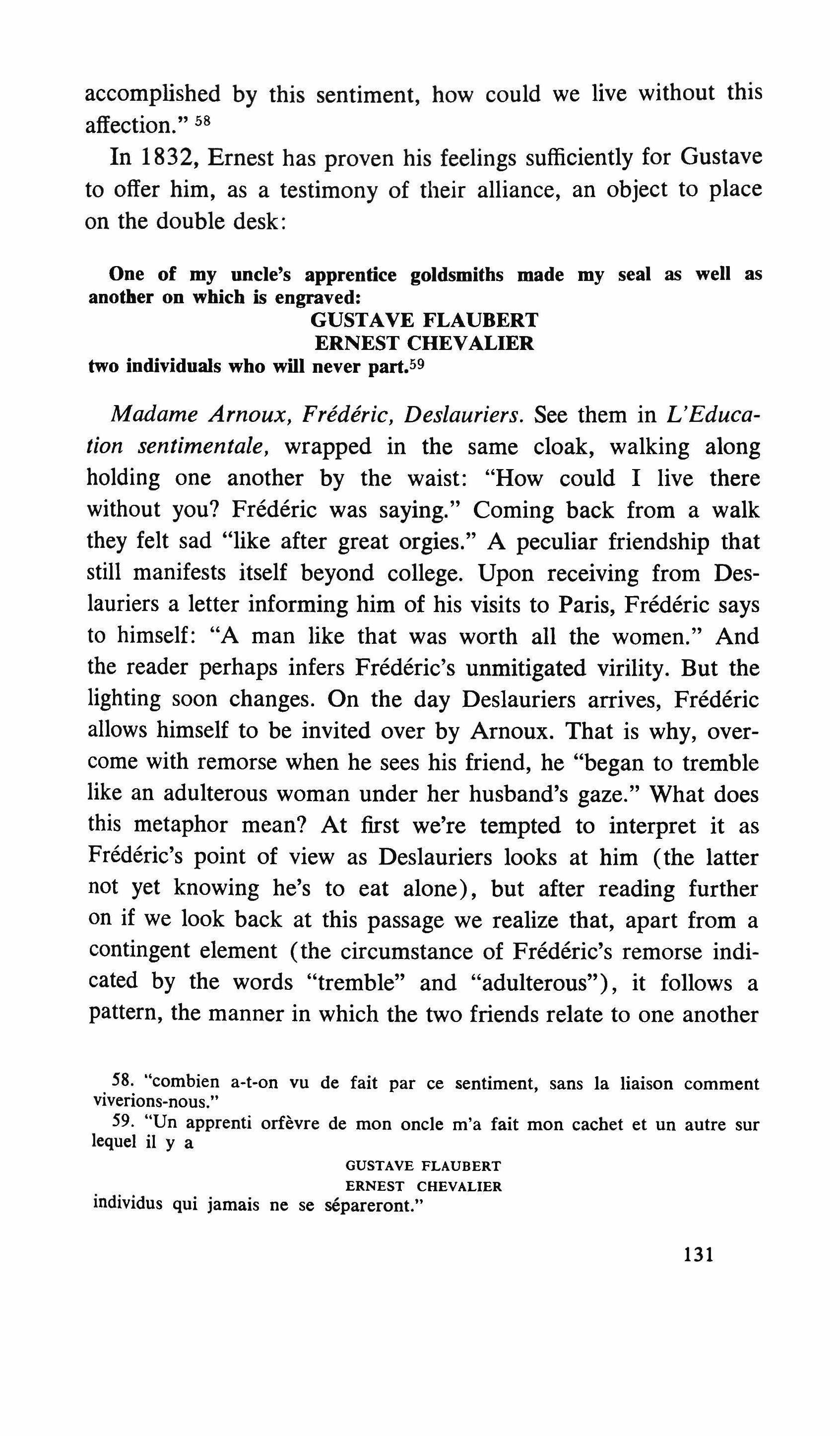
accomplished by this sentiment, how could we live without this affection." 58
In 1832, Ernest has proven his feelings sufficiently for Gustave to offer him, as a testimony of their alliance, an object to place on the double desk:
One of my uncle's apprentice goldsmiths made my seal as well as another on which is engraved:
GUSTAVE FLAUBERT
ERNEST CHEVALIER two individuals who will never part.59
Madame Arnoux, Frederic, Deslauriers. See them in L'Education sentimentale, wrapped in the same cloak, walking along holding one another by the waist: "How could I live there without you? Frederic was saying." Coming back from a walk they felt sad "like after great orgies." A peculiar friendship that still manifests itself beyond college. Upon receiving from Deslauriers a letter informing him of his visits to Paris, Frederic says to himself: "A man like that was worth all the women." And the reader perhaps infers Frederic's unmitigated virility. But the lighting soon changes. On the day Deslauriers arrives, Frederic allows himself to be invited over by Arnoux. That is why, overcome with remorse when he sees his friend, he "began to tremble like an adulterous woman under her husband's gaze." What does this metaphor mean? At first we're tempted to interpret it as Frederic's point of view as Deslauriers looks at him (the latter not yet knowing he's to eat alone), but after reading further on if we look back at this passage we realize that, apart from a contingent element (the circumstance of Frederic's remorse indicated by the words "tremble" and "adulterous"), it follows a pattern, the manner in which the two friends relate to one another
58, "combien a-t-on vu de fait par ce sentiment, sans la liaison comment viverions-nous."
59, "Un apprenti orfevre de mon oncle m'a fait mon cachet et un autre sur lequel il y a
GUSTAVE FLAUBERT
ERNEST CHEVALIER individus qui jamais ne se separeront."

as the terms of a couple, one playing, by a tacit agreement, the part of the woman, the other that of the husband. This casting of roles is very shrewdly justified both by Frederic's personal charm and by the way the two friends react to the problem of money. If he had a fortune, Deslauriers would make the most virile use of it; he would procure mistresses for himself, found a newspaper to publish his political ideas, etc. But he is poor and often has to ask Frederic for help, for his pleasures as well as for his subsistence. In the "house of perdition" evoked at the end of the book, it is Frederic who has the money and who flees: "Deslauriers had to follow him." For Frederic money makes frustration possible, and another example of this is given at the beginning of the novel. On board the Ville de Montereau, he deposits the last of his money, a twenty-franc piece, in the hat of an itinerant musician. It so happens Frederic is starving and this "heartfelt gesture" deprives him of food. One thing leading to another, he ends up by squandering his fortune on a woman he would never dream of laying his hands on. On the, contrary, Deslauriers, a practical man, is positive Mme Arnoux has given herself in exchange:
"That's another thing money is good for!" He was beset by thoughts of hatred.
Then he recalled Frederic himself. Frederic had always wielded an almost feminine charm over him.60
And so Deslauriers' behavior, as we know it, is dictated to him. He cannot stand the idea that Frederic and Madame Arnoux form a couple. Angered by the persistence of this attachment, jealous ("Are you still in love with Mme Arnoux! It's over with, ain't it?"), he'll attempt to make Mme Arnoux. In the triangular situation which makes up a "sentimental education," 61 we see a double mediation come into play: that of Frederic and that of
60. "'Voila une chose de plus a quoi sert l'argent!' Des pensees haineuses l'envahirent.
"Puis il songea a la personne meme de Frederic. Elle avait toujours exerce sur lui un charme presque feminin
61. On January 15, 1832, the young Gustave tells Ernest about his project for a play entitled L'Amant avare in which the protagonists would be not the husband, the wife, the lover (or the husband, the wife, the mistress), but the lover, the friend, the mistress: it will be a miser in love, but he doesn't want to give any presents to his mistress and his friend scolds him." The amphibological but seems to transform this avarice into generosity."
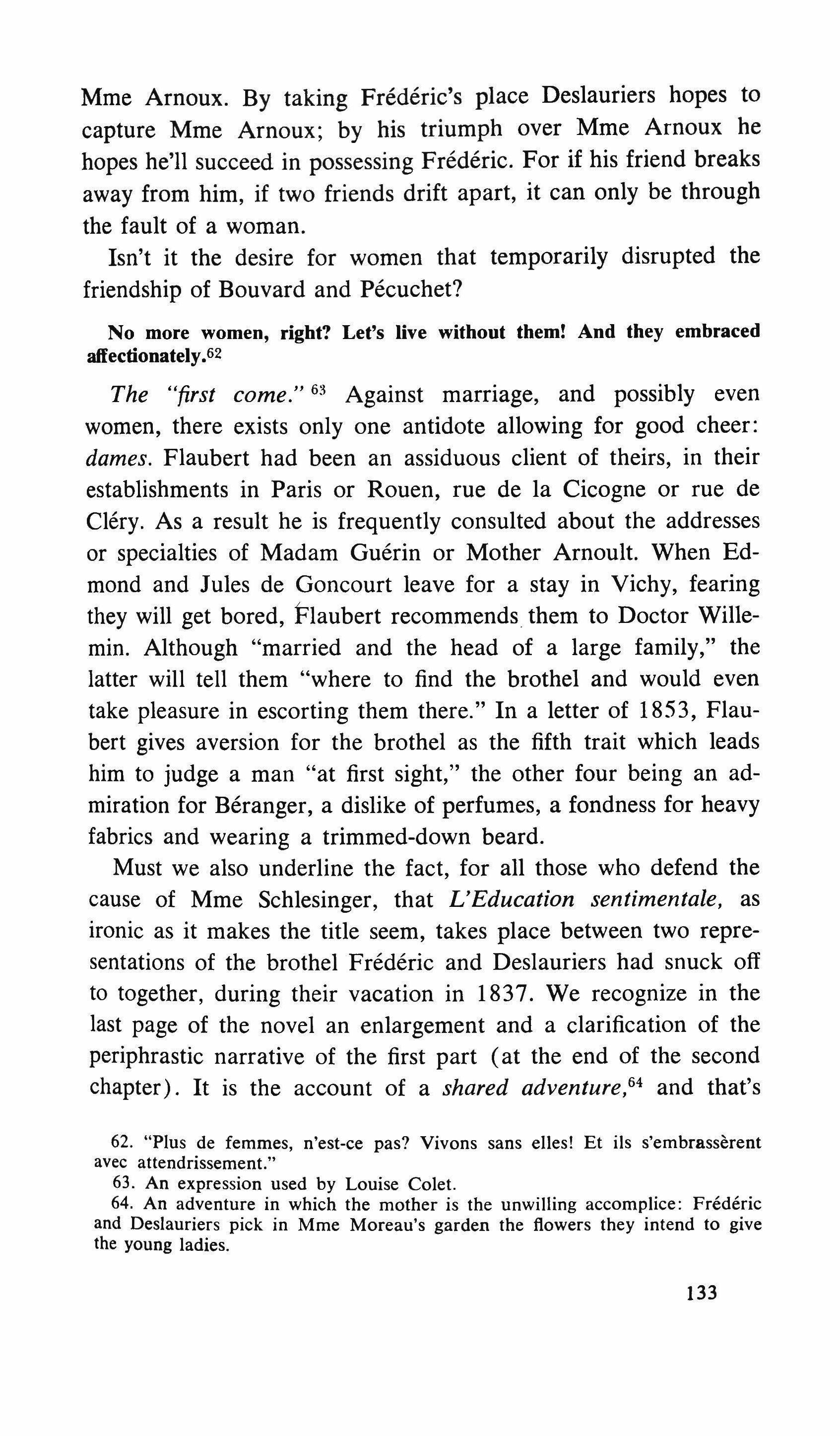
Mme Arnoux. By taking Frederic's place Deslauriers hopes to capture Mme Arnoux; by his triumph over Mme Arnoux he hopes he'll succeed in possessing Frederic. For if his friend breaks away from him, if two friends drift apart, it can only be through the fault of a woman.
Isn't it the desire for women that temporarily disrupted the friendship of Bouvard and Pecuchet?
No more women, right? Let's live without them! And they embraced affectionately.62
The "first come." 63 Against marriage, and possibly even women, there exists only one antidote allowing for good cheer: dames. Flaubert had been an assiduous client of theirs, in their establishments in Paris or Rouen, rue de la Cicogne or rue de Clery. As a result he is frequently consulted about the addresses or specialties of Madam Guerin or Mother Arnoult. When Edmond and Jules de Goncourt leave for a stay in Vichy, fearing they will get bored, Flaubert recommends them to Doctor Willemin. Although "married and the head of a large family," the latter will tell them "where to find the brothel and would even take pleasure in escorting them there." In a letter of 1853, Flaubert gives aversion for the brothel as the fifth trait which leads him to judge a man "at first sight," the other four being an admiration for Beranger, a dislike of perfumes, a fondness for heavy fabrics and wearing a trimmed-down beard.
Must we also underline the fact, for all those who defend the cause of Mme Schlesinger, that L'Education sentimentale, as ironic as it makes the title seem, takes place between two representations of the brothel Frederic and Deslauriers had snuck off to together, during their vacation in 1837. We recognize in the last page of the novel an enlargement and a clarification of the periphrastic narrative of the first part (at the end of the second chapter). It is the account of a shared adventure." and that's
62. "Plus de femmes, n'est-ce pas? Vivons sans elles! Et ils s'ernbrasserent avec attendrissement."
63. An expression used by Louise Colet.
64. An adventure in which the mother is the unwilling accomplice: Frederic and Deslauriers pick in Mme Moreau's garden the flowers they intend to give the young ladies.
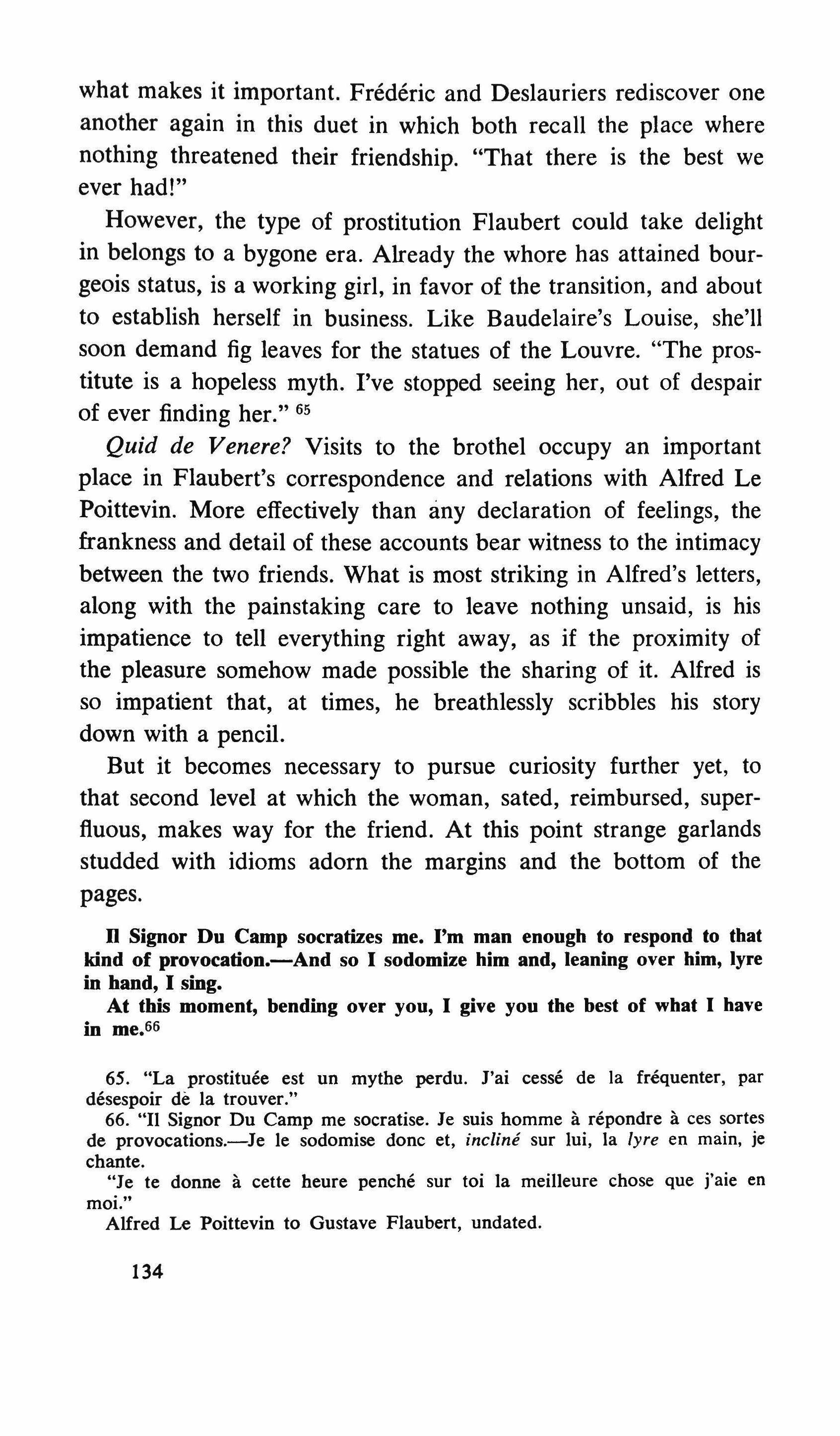
what makes it important. Frederic and Deslauriers rediscover one another again in this duet in which both recall the place where nothing threatened their friendship. "That there is the best we ever had!"
However, the type of prostitution Flaubert could take delight in belongs to a bygone era. Already the whore has attained bourgeois status, is a working girl, in favor of the transition, and about to establish herself in business. Like Baudelaire's Louise, she'll soon demand fig leaves for the statues of the Louvre. "The prostitute is a hopeless myth. I've stopped seeing her, out of despair of ever finding her." 65
Quid de Venere? Visits to the brothel occupy an important place in Flaubert's correspondence and relations with Alfred Le Poittevin. More effectively than any declaration of feelings, the frankness and detail of these accounts bear witness to the intimacy between the two friends. What is most striking in Alfred's letters, along with the painstaking care to leave nothing unsaid, is his impatience to tell everything right away, as if the proximity of the pleasure somehow made possible the sharing of it. Alfred is so impatient that, at times, he breathlessly scribbles his story down with a pencil.
But it becomes necessary to pursue curiosity further yet, to that second level at which the woman, sated, reimbursed, superfluous, makes way for the friend. At this point strange garlands studded with idioms adorn the margins and the bottom of the pages.
n Signor Du Camp socratizes me. I'm man enough to respond to that kind of provocation.-And so I sodomize him and, leaning over him, lyre in hand, I sing.
At this moment, bending over you, I give you the best of what I have in me.66
65. "La prostituee est un mythe perdu. J'ai cesse de la frequenter, par desespcir de la trouver."
66. "II Signor Du Camp me soeratise. Je suis homme it repondre it ces sortes de provoeations.-Je Ie sodomise done et, incline sur lui, la lyre en main, je ehante.
"Je te donne it cette heure penche sur toi la meilleure chose que j'aie en moi."
Alfred Le Poittevin to Gustave Flaubert, undated.
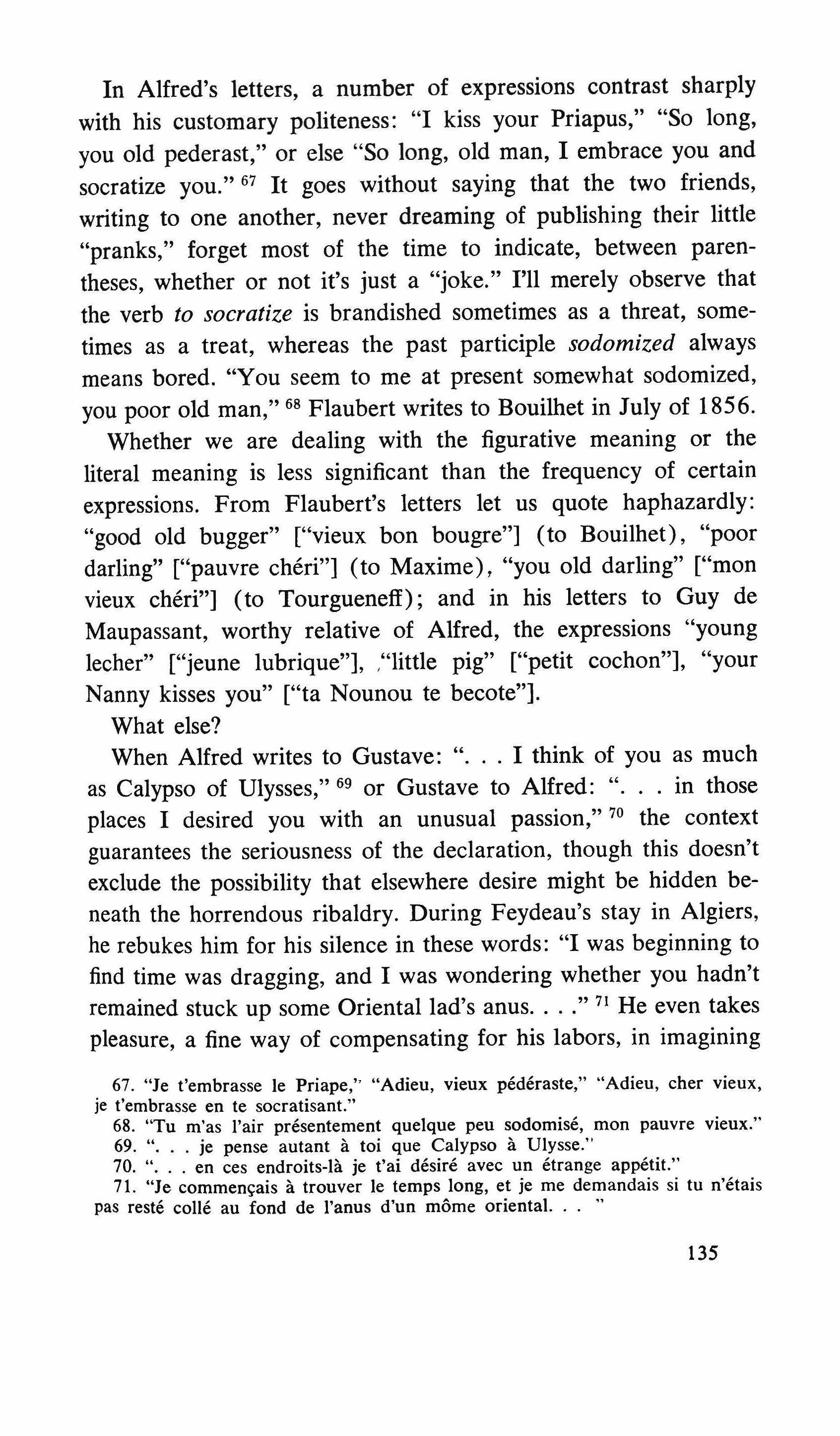
In Alfred's letters, a number of expressions contrast sharply with his customary politeness: "I kiss your Priapus," "So long, you old pederast," or else "So long, old man, I embrace you and socratize you." 67 It goes without saying that the two friends, writing to one another, never dreaming of publishing their little "pranks," forget most of the time to indicate, between parentheses, whether or not it's just a "joke." I'll merely observe that the verb to socratize is brandished sometimes as a threat, sometimes as a treat, whereas the past participle sodomized always means bored. "You seem to me at present somewhat sodomized, you poor old man," 68 Flaubert writes to Bouilhet in July of 1856. Whether we are dealing with the figurative meaning or the literal meaning is less significant than the frequency of certain expressions. From Flaubert's letters let us quote haphazardly: "good old bugger" ["vieux bon bougre"] (to Bouilhet), "poor darling" ["pauvre cheri"] (to Maxime), "you old darling" ["mon vieux cheri"] (to Tourgueneff); and in his letters to Guy de Maupassant, worthy relative of Alfred, the expressions "young lecher" ["jeune lubrique"], ,"little pig" ["petit cochon"], "your Nanny kisses you" ["ta Nounou te becote"].
What else?
When Alfred writes to Gustave: I think of you as much as Calypso of Ulysses," 69 or Gustave to Alfred: in those places I desired you with an unusual passion," 70 the context guarantees the seriousness of the declaration, though this doesn't exclude the possibility that elsewhere desire might be hidden beneath the horrendous ribaldry. During Feydeau's stay in Algiers, he rebukes him for his silence in these words: "I was beginning to find time was dragging, and I was wondering whether you hadn't remained stuck up some Oriental lad's anus " 71 He even takes pleasure, a fine way of compensating for his labors, in imagining
67. "Je t'embrasse Ie Priape," "Adieu, vieux pederaste,' "Adieu, cher vieux, je t'embrasse en te socratisant."
68. "Tu rn'as l'air presenternent quelque peu sodomise, mon pauvre vieux."
69. je pense autant a toi que Calypso a Ulysse."
70. en ces endroits-la je t'ai desire avec un etrange appetit."
71. "Je commencais a trouver Ie temps long, et je me demandais si tu n'etais pas reste colle au fond de l'anus d'un mome oriental.
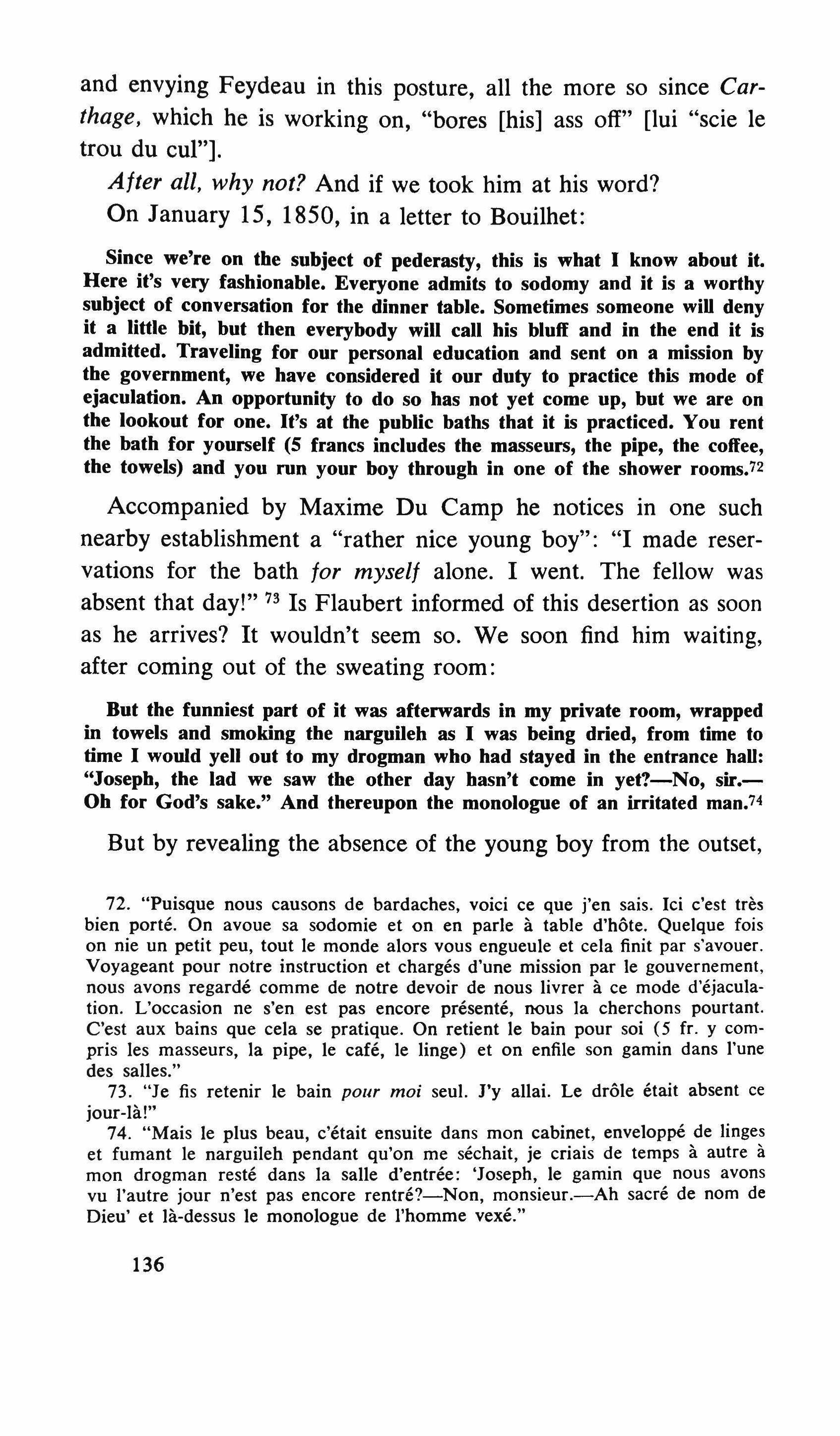
and envying Feydeau in this posture, all the more so since Carthage, which he is working on, "bores [his] ass off" [lui "scie Ie trou du cuI"].
After all, why not? And if we took him at his word?
On January 15, 1850, in a letter to Bouilhet:
Since we're on the subject of pederasty, this is what I know about it. Here it's very fashionable. Everyone admits to sodomy and it is a worthy subject of conversation for the dinner table. Sometimes someone will deny it a little bit, but then everybody will call his bluff and in the end it is admitted. Traveling for our personal education and sent on a mission by the government, we have considered it our duty to practice this mode of ejaculation. An opportunity to do so has not yet come up, but we are on the lookout for one. It's at the public baths that it is practiced. You rent the bath for yourself (5 francs includes the masseurs, the pipe, the coffee, the towels) and you run your boy through in one of the shower rooms.72
Accompanied by Maxime Du Camp he notices in one such nearby establishment a "rather nice young boy": "I made reservations for the bath for myself alone. I went. The fellow was absent that day!" 73 Is Flaubert informed of this desertion as soon as he arrives? It wouldn't seem so. We soon find him waiting, after coming out of the sweating room:
But the funniest part of it was afterwards in my private room, wrapped in towels and smoking the narguileh as I was being dried, from time to time I would yell out to my drogman who had stayed in the entrance hall: "Joseph, the lad we saw the other day hasn't come in yet?-No, sir.Oh for God's sake." And thereupon the monologue of an irritated man.74
But by revealing the absence of the young boy from the outset,
72. "Puisque nous causons de bardaches, voici ce que j'en sais. Ici c'est tres bien porte. On avoue sa sodomie et on en parle a table d'hote. Quelque fois on nie un petit peu, tout Ie monde alors vous engueule et cela finit par s'avouer. Voyageant pour notre instruction et charges d'une mission par Ie gouvernement, nous avons regarde comme de notre devoir de nous livrer a ce mode d'ejaculation. L'occasion ne s'en est pas encore presente, nous la cherchons pourtant. C'est aux bains que cela se pratique. On retient Ie bain pour soi (5 fr. y compris les masseurs, la pipe, le cafe, Ie linge) et on enfile son gamin dans rune des salles."
73. "Je fis retenir Ie bain pour rnoi seul. J'y allai. Le drole etait absent ce jour-la!"
74. "Mais le plus beau, c'etait ensuite dans mon cabinet, enveloppe de linges et fumant Ie narguileh pendant qu'on me sechait, je criais de temps a autre a mon drogman reste dans la salle d'entree: 'Joseph, Ie gamin que nous avons vu I'autre jour n'est pas encore rentre?-Non, monsieur.-Ah sacre de nom de Dieu' et la-dessus Ie monologue de l'homme vexe."
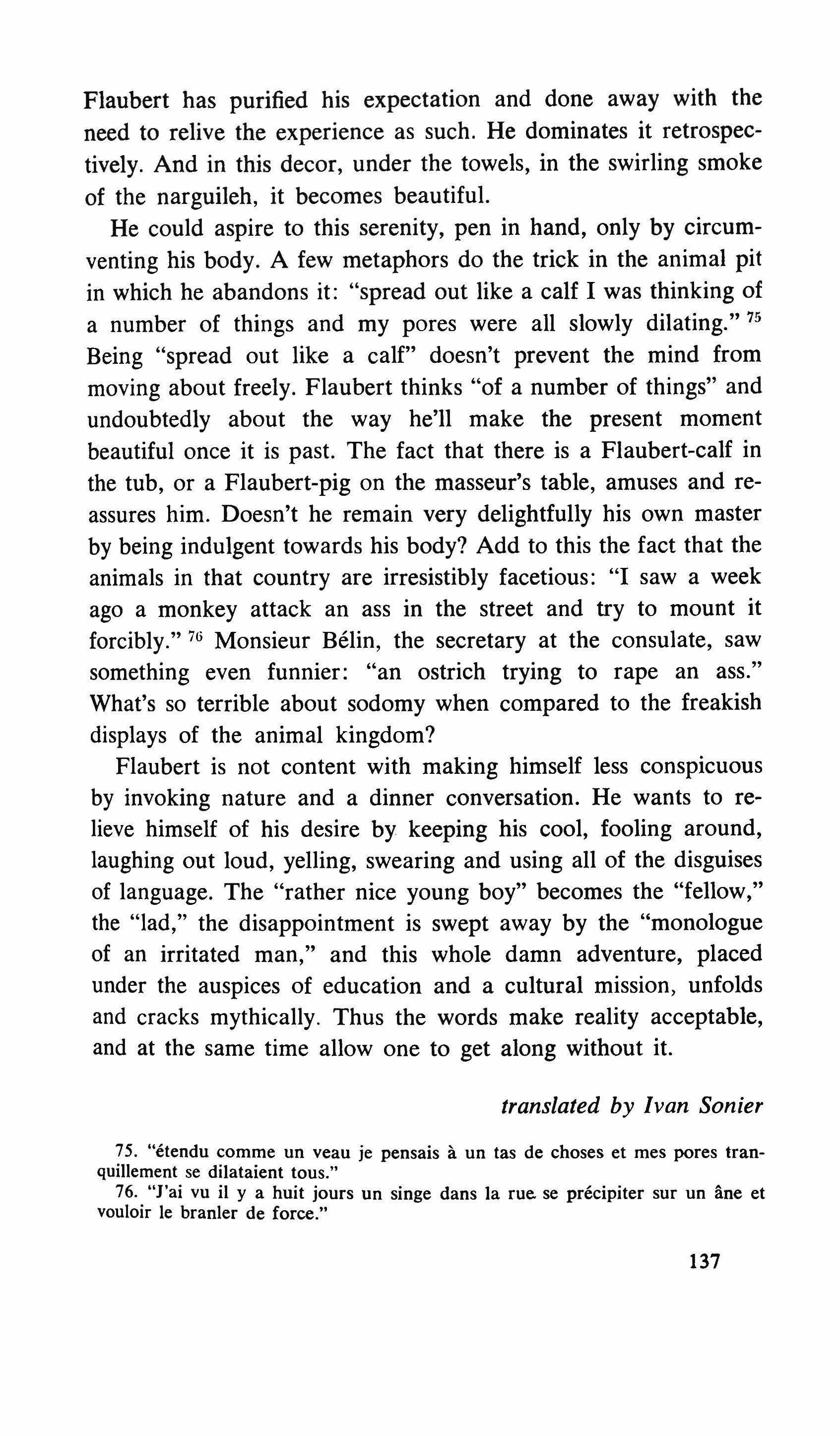
Flaubert has purified his expectation and done away with the need to relive the experience as such. He dominates it retrospectively. And in this decor, under the towels, in the swirling smoke of the narguileh, it becomes beautiful. He could aspire to this serenity, pen in hand, only by circumventing his body. A few metaphors do the trick in the animal pit in which he abandons it: "spread out like a calf I was thinking of a number of things and my pores were all slowly dilating." 75 Being "spread out like a calf" doesn't prevent the mind from moving about freely. Flaubert thinks "of a number of things" and undoubtedly about the way he'll make the present moment beautiful once it is past. The fact that there is a Flaubert-calf in the tub, or a Flaubert-pig on the masseur's table, amuses and reassures him. Doesn't he remain very delightfully his own master by being indulgent towards his body? Add to this the fact that the animals in that country are irresistibly facetious: "I saw a week ago a monkey attack an ass in the street and try to mount it forcibly."
7(j Monsieur Belin, the secretary at the consulate, saw something even funnier: "an ostrich trying to rape an ass." What's so terrible about sodomy when compared to the freakish displays of the animal kingdom?
Flaubert is not content with making himself less conspicuous by invoking nature and a dinner conversation. He wants to relieve himself of his desire by keeping his cool, fooling around, laughing out loud, yelling, swearing and using all of the disguises of language. The "rather nice young boy" becomes the "fellow," the "lad," the disappointment is swept away by the "monologue of an irritated man," and this whole damn adventure, placed under the auspices of education and a cultural mission, unfolds and cracks mythically. Thus the words make reality acceptable, and at the same time allow one to get along without it.
translated by Ivan Sonier75. "etendu comme un veau je pensais a un tas de choses et mes pores tranquilIement se dilataient tous."
76. "J'ai vu il y a huit jours un singe dans la rue se precipiter sur un ane et vouloir Ie branler de force."
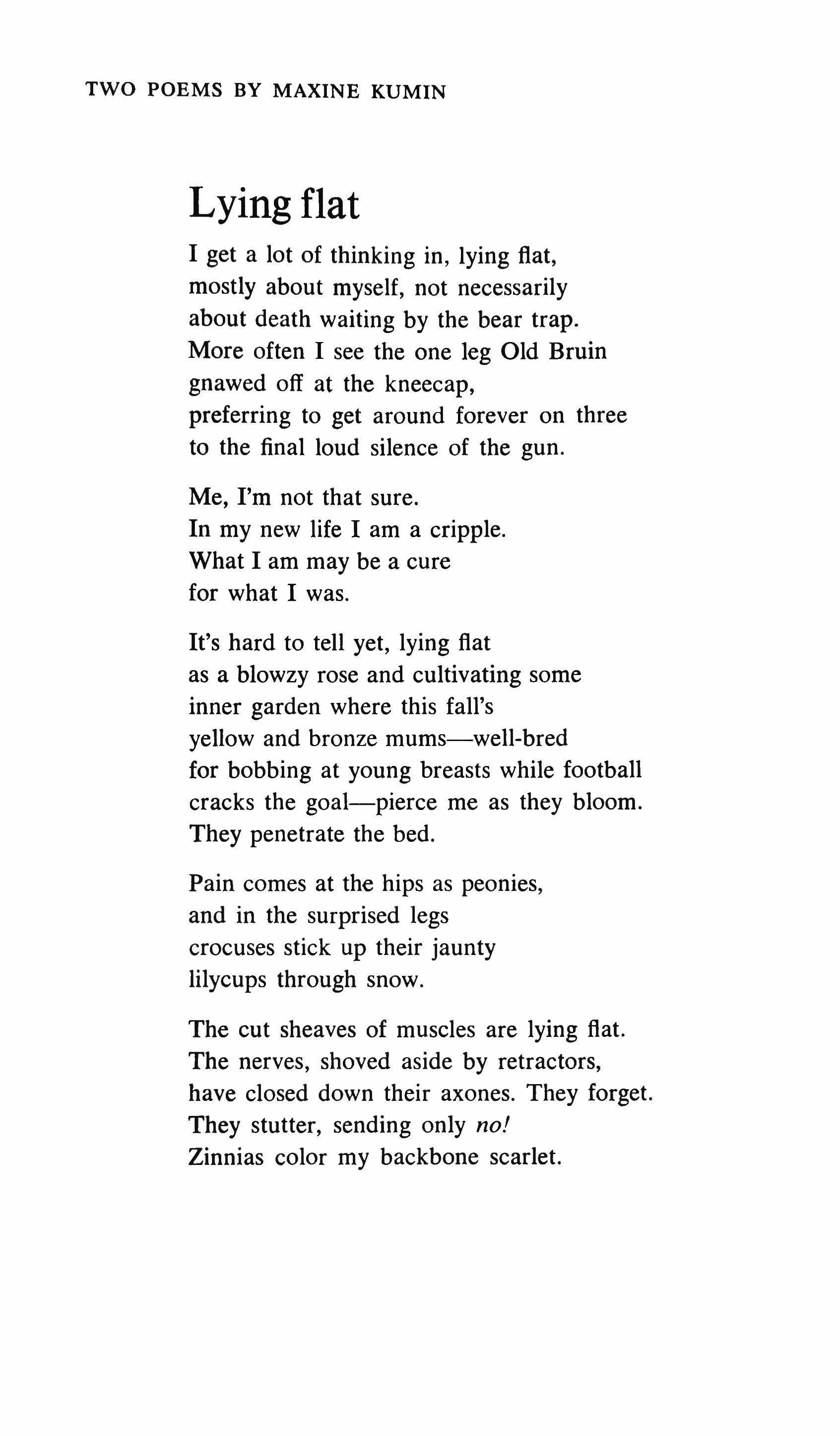
I get a lot of thinking in, lying flat, mostly about myself, not necessarily about death waiting by the bear trap. More often I see the one leg Old Bruin gnawed off at the kneecap, preferring to get around forever on three to the final loud silence of the gun.
Me, I'm not that sure.
In my new life I am a cripple. What I am may be a cure for what I was.
It's hard to tell yet, lying flat as a blowzy rose and cultivating some inner garden where this fall's yellow and bronze mums-well-bred for bobbing at young breasts while football cracks the goal-pierce me as they bloom. They penetrate the bed.
Pain comes at the hips as peonies, and in the surprised legs crocuses stick up their jaunty lilycups through snow.
The cut sheaves of muscles are lying flat. The nerves, shoved aside by retractors, have closed down their axones. They forget. They stutter, sending only no! Zinnias color my backbone scarlet.
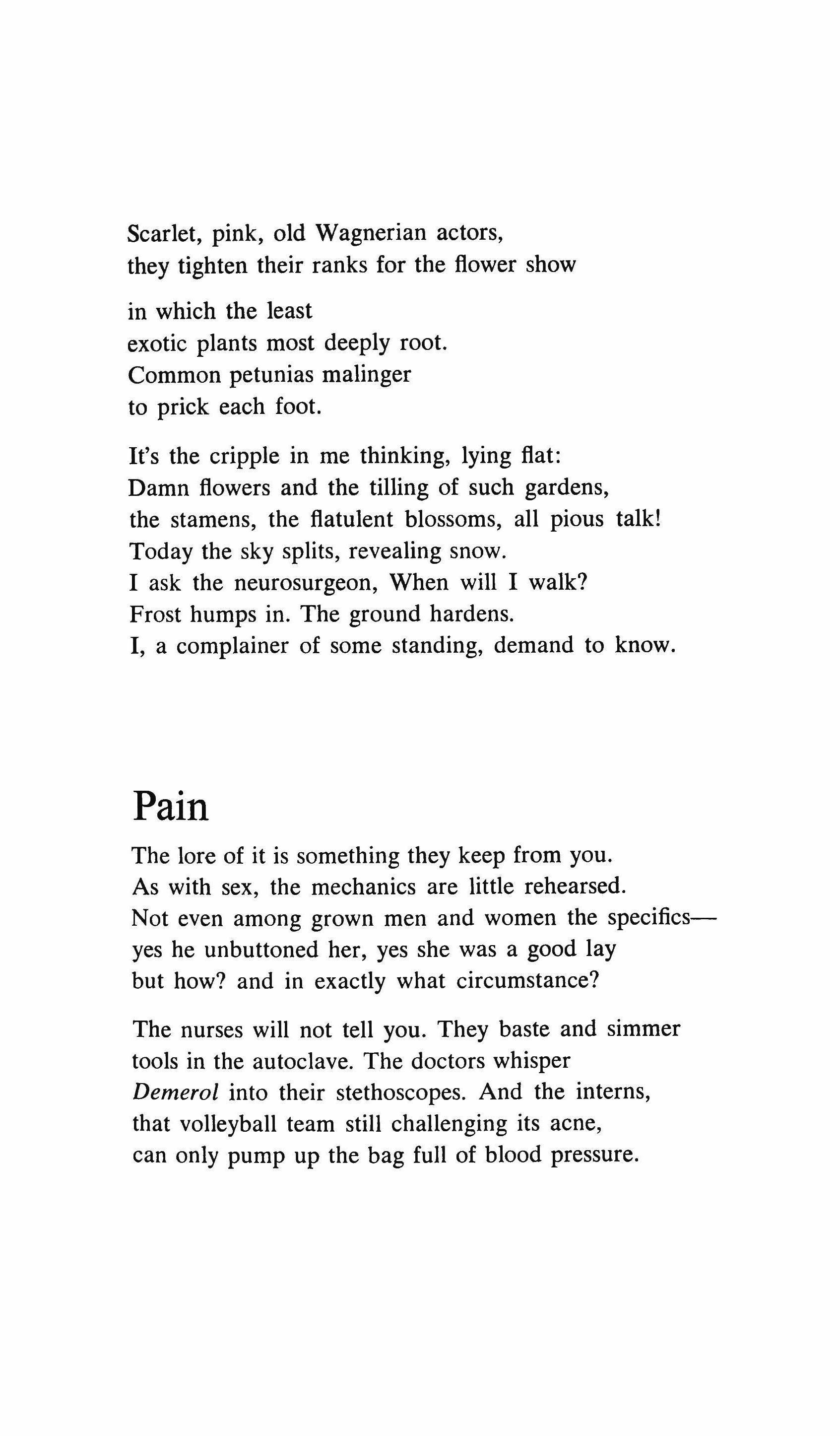
Scarlet, pink, old Wagnerian actors, they tighten their ranks for the flower show in which the least exotic plants most deeply root. Common petunias malinger to prick each foot.
It's the cripple in me thinking, lying flat: Damn flowers and the tilling of such gardens, the stamens, the flatulent blossoms, all pious talk! Today the sky splits, revealing snow. I ask the neurosurgeon, When will I walk? Frost humps in. The ground hardens. I, a complainer of some standing, demand to know.
The lore of it is something they keep from you. As with sex, the mechanics are little rehearsed. Not even among grown men and women the specificsyes he unbuttoned her, yes she was a good lay but how? and in exactly what circumstance?
The nurses will not tell you. They baste and simmer tools in the autoclave. The doctors whisper Demerol into their stethoscopes. And the interns, that volleyball team still challenging its acne, can only pump up the bag full of blood pressure.
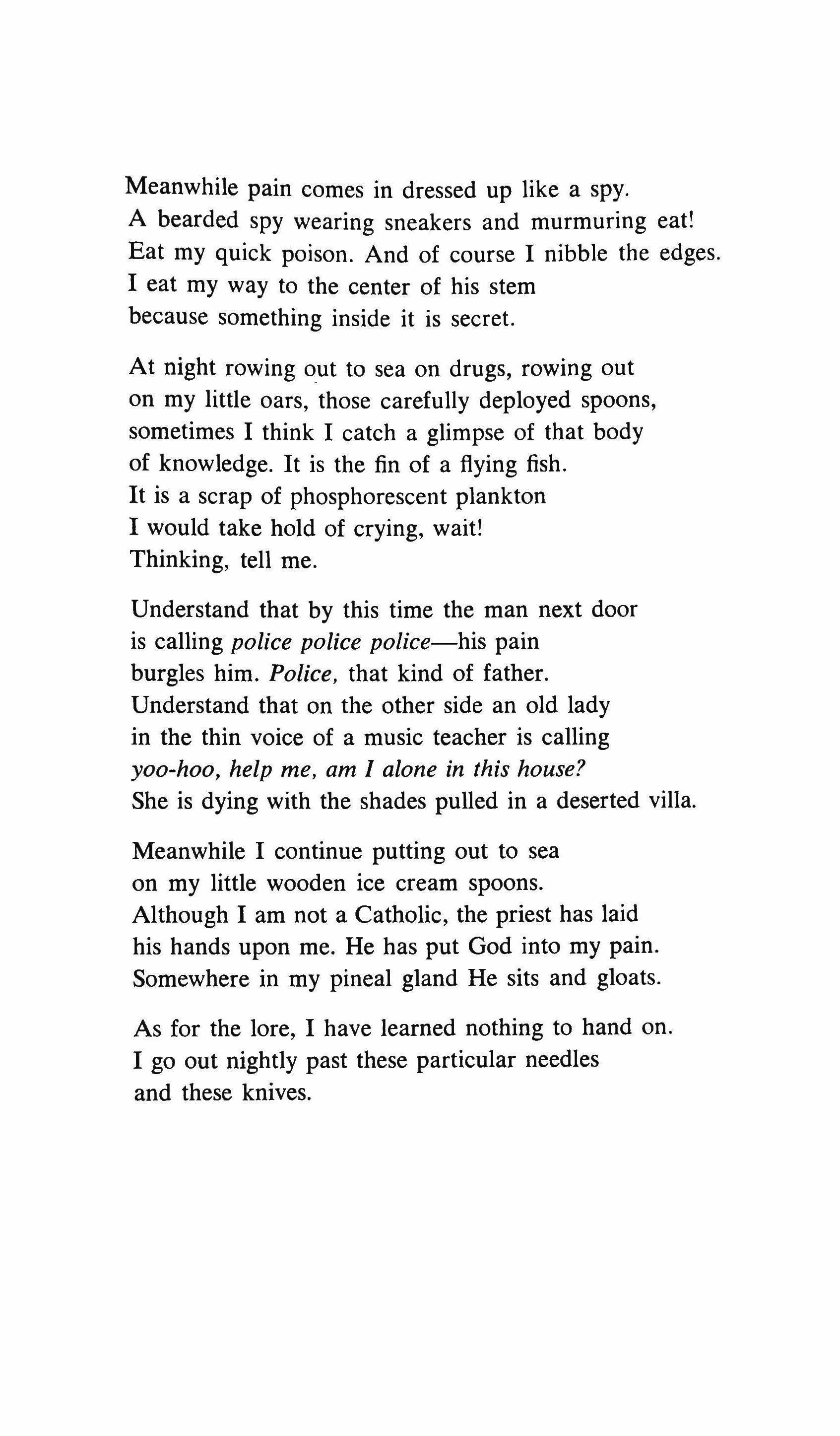
Meanwhile pain comes in dressed up like a spy. A bearded spy wearing sneakers and murmuring eat! Eat my quick poison. And of course I nibble the edges. I eat my way to the center of his stem because something inside it is secret.
At night rowing out to sea on drugs, rowing out on my little oars, those carefully deployed spoons, sometimes I think I catch a glimpse of that body of knowledge. It is the fin of a flying fish. It is a scrap of phosphorescent plankton I would take hold of crying, wait! Thinking, tell me.
Understand that by this time the man next door is calling police police police-his pain burgles him. Police, that kind of father. Understand that on the other side an old lady in the thin voice of a music teacher is calling yoo-hoo, help me, am I alone in this house? She is dying with the shades pulled in a deserted villa.
Meanwhile I continue putting out to sea on my little wooden ice cream spoons. Although I am not a Catholic, the priest has laid his hands upon me. He has put God into my pain. Somewhere in my pineal gland He sits and gloats.
As for the lore, I have learned nothing to hand on. I go out nightly past these particular needles and these knives.
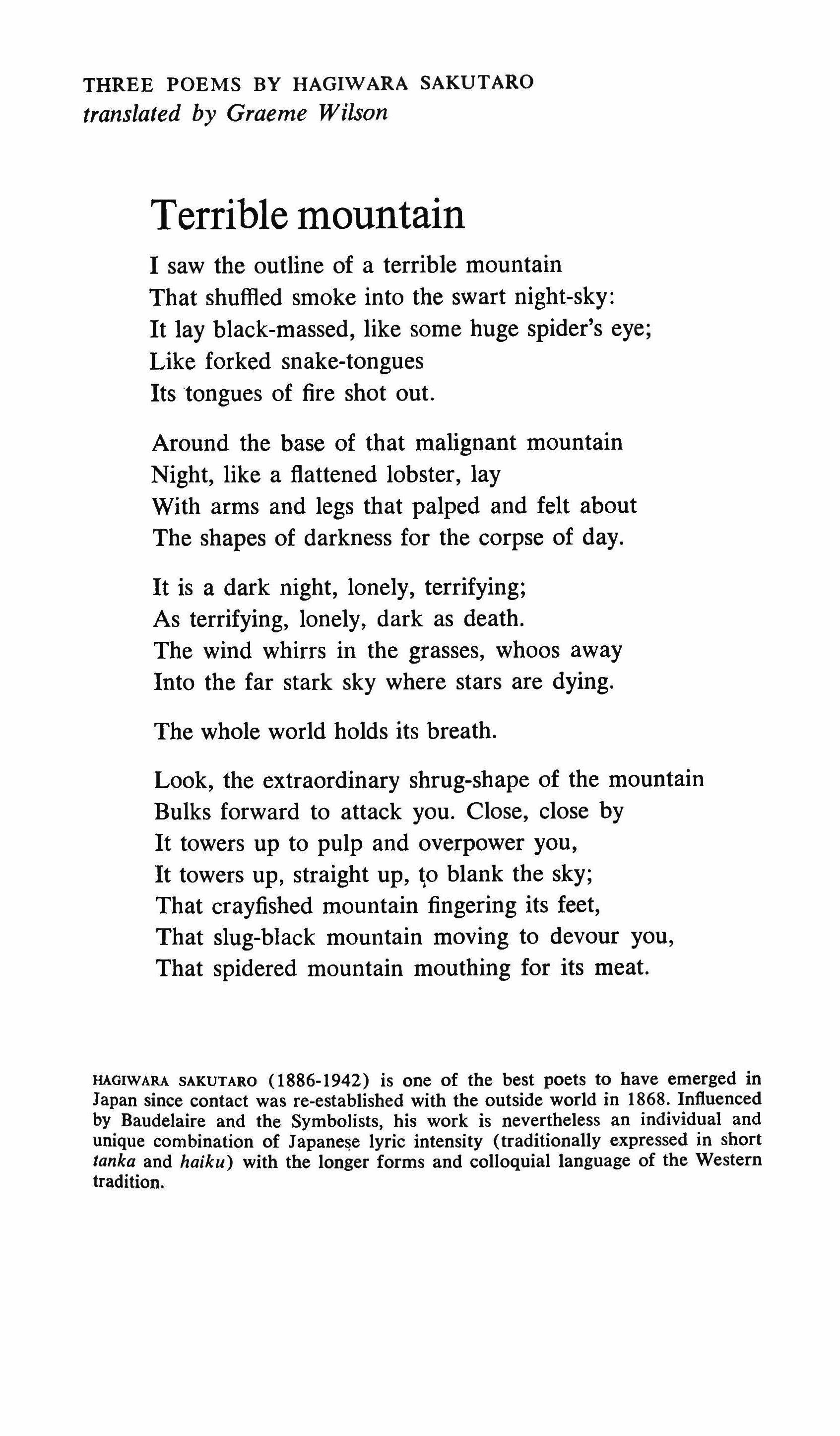 POEMS BY HAGIWARA SAKUTARO
translated by Graeme Wilson
POEMS BY HAGIWARA SAKUTARO
translated by Graeme Wilson
I saw the outline of a terrible mountain
That shuffled smoke into the swart night-sky: It lay black-massed, like some huge spider's eye; Like forked snake-tongues Its tongues of fire shot out.
Around the base of that malignant mountain Night, like a flattened lobster, lay With arms and legs that palped and felt about The shapes of darkness for the corpse of day.
It is a dark night, lonely, terrifying; As terrifying, lonely, dark as death. The wind whirrs in the grasses, whoos away Into the far stark sky where stars are dying.
The whole world holds its breath.
Look, the extraordinary shrug-shape of the mountain Bulks forward to attack you. Close, close by It towers up to pulp and overpower you, It towers up, straight up, \0 blank the sky; That crayfished mountain fingering its feet, That slug-black mountain moving to devour you, That spidered mountain mouthing for its meat.
HAGIWARA SAKUTARO (1886-1942) is one of the best poets to have emerged in Japan since contact was re-established with the outside world in 1868. Influenced by Baudelaire and the Symbolists, his work is nevertheless an individual and unique combination of Japanese lyric intensity (traditionally expressed in short tanka and haiku) with the longer forms and colloquial language of the Western tradition.
The seedling shines against a sky sky-blue; A child digs its plot.
Needling the unsprouted seedling, I ram my root-white finger through The hole in that bright flower-pot.
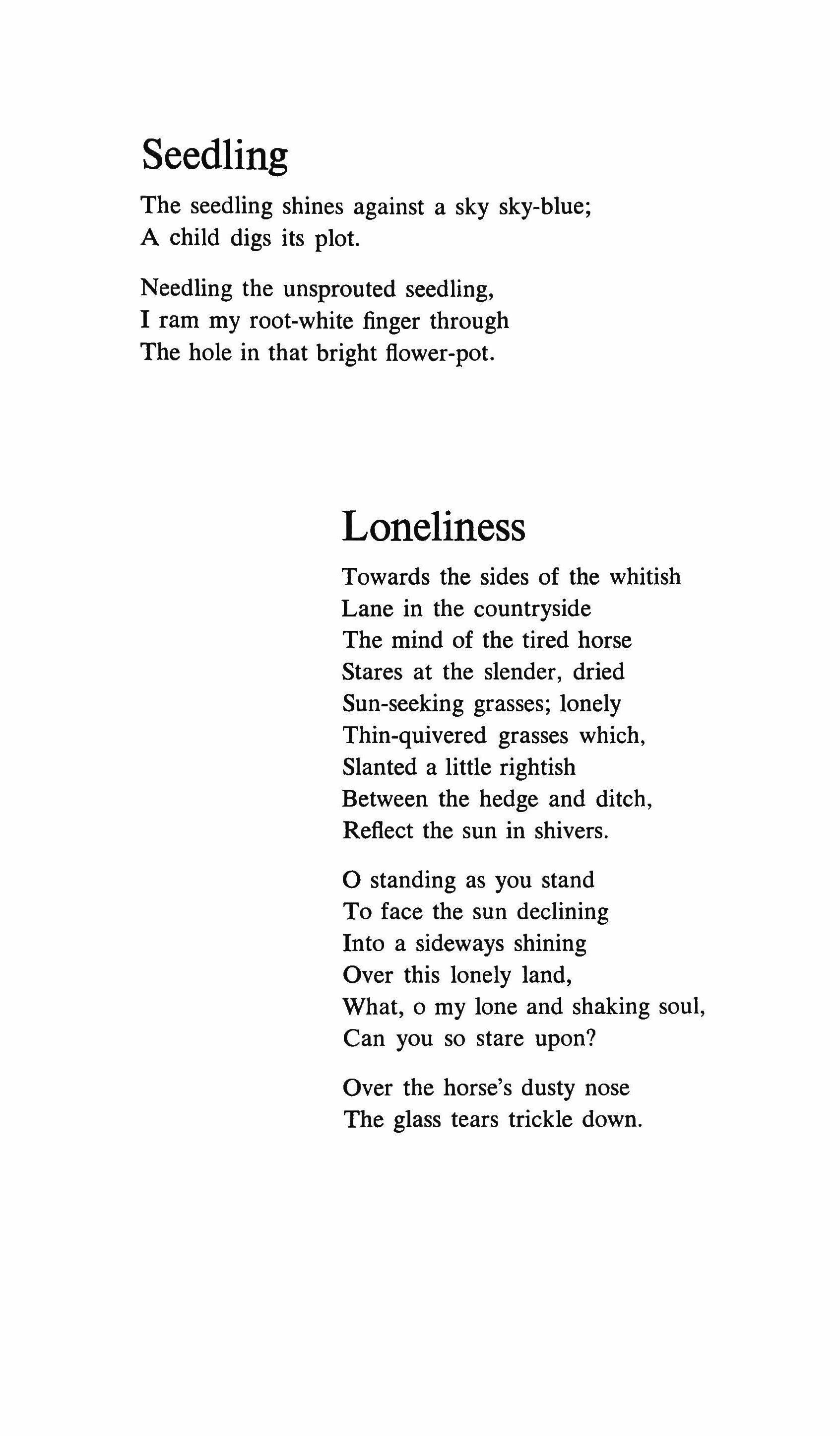
Towards the sides of the whitish Lane in the countryside
The mind of the tired horse Stares at the slender, dried Sun-seeking grasses; lonely Thin-quivered grasses which, Slanted a little rightish
Between the hedge and ditch, Reflect the sun in shivers.
o standing as you stand To face the sun declining Into a sideways shining
Over this lonely land, What, 0 my lone and shaking soul, Can you so stare upon?
Over the horse's dusty nose
The glass tears trickle down.

The story I have to tell is about my friend Jeff Kimberk and a girl named Susannah Twombley, but it is bound to have more of me in it than of them. That cannot be helped when you tell a story.
I have three purposes in telling it. I intend to sort out my own rather confused feelings for Jeff and Susannah. I need to practice some self-discipline, and writing is a good way to begin. And I think it is an interesting story in itself if anyone happens to read it.
I admit it is unlikely anyone ever will. It is even unlikely I will finish it because I have not been able to finish anything for some time. But to begin it is something, and so I will begin. Before you
TriQuarterly 143
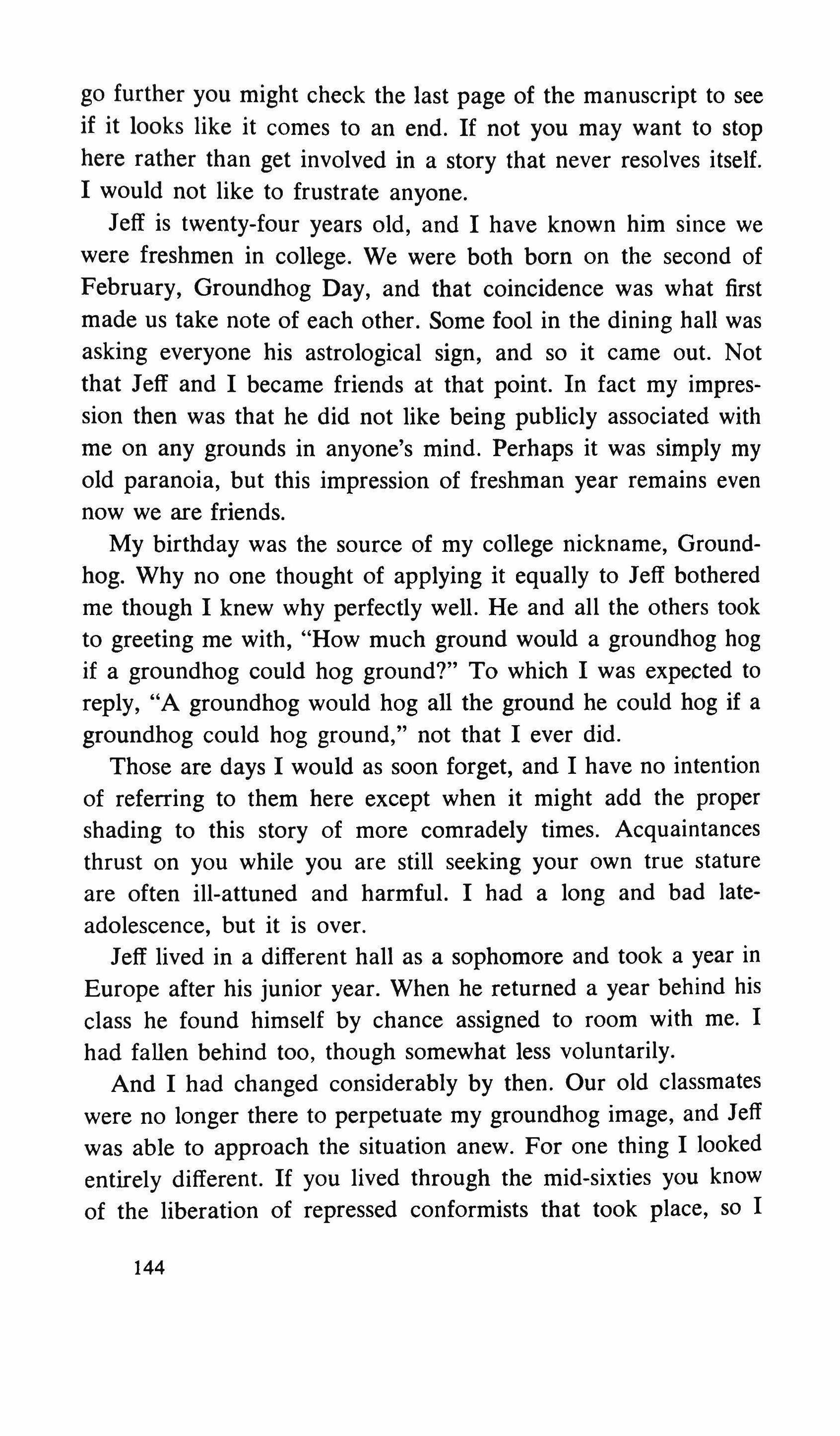
go further you might check the last page of the manuscript to see if it looks like it comes to an end. If not you may want to stop here rather than get involved in a story that never resolves itself. I would not like to frustrate anyone.
Jeff is twenty-four years old, and I have known him since we were freshmen in college. We were both born on the second of February, Groundhog Day, and that coincidence was what first made us take note of each other. Some fool in the dining hall was asking everyone his astrological sign, and so it came out. Not that Jeff and I became friends at that point. In fact my impression then was that he did not like being publicly associated with me on any grounds in anyone's mind. Perhaps it was simply my old paranoia, but this impression of freshman year remains even now we are friends.
My birthday was the source of my college nickname, Groundhog. Why no one thought of applying it equally to Jeff bothered me though I knew why perfectly well. He and all the others took to greeting me with, "How much ground would a groundhog hog if a groundhog could hog ground?" To which I was expected to reply, "A groundhog would hog all the ground he could hog if a groundhog could hog ground," not that I ever did.
Those are days I would as soon forget, and I have no intention of referring to them here except when it might add the proper shading to this story of more comradely times. Acquaintances thrust on you while you are still seeking your own true stature are often ill-attuned and harmful. I had a long and bad lateadolescence, but it is over.
Jeff lived in a different hall as a sophomore and took a year in Europe after his junior year. When he returned a year behind his class he found himself by chance assigned to room with me. I had fallen behind too, though somewhat less voluntarily.
And I had changed considerably by then. Our old classmates were no longer there to perpetuate my groundhog image, and Jeff was able to approach the situation anew. For one thing I looked entirely different. If you lived through the mid-sixties you know of the liberation of repressed conformists that took place, so I
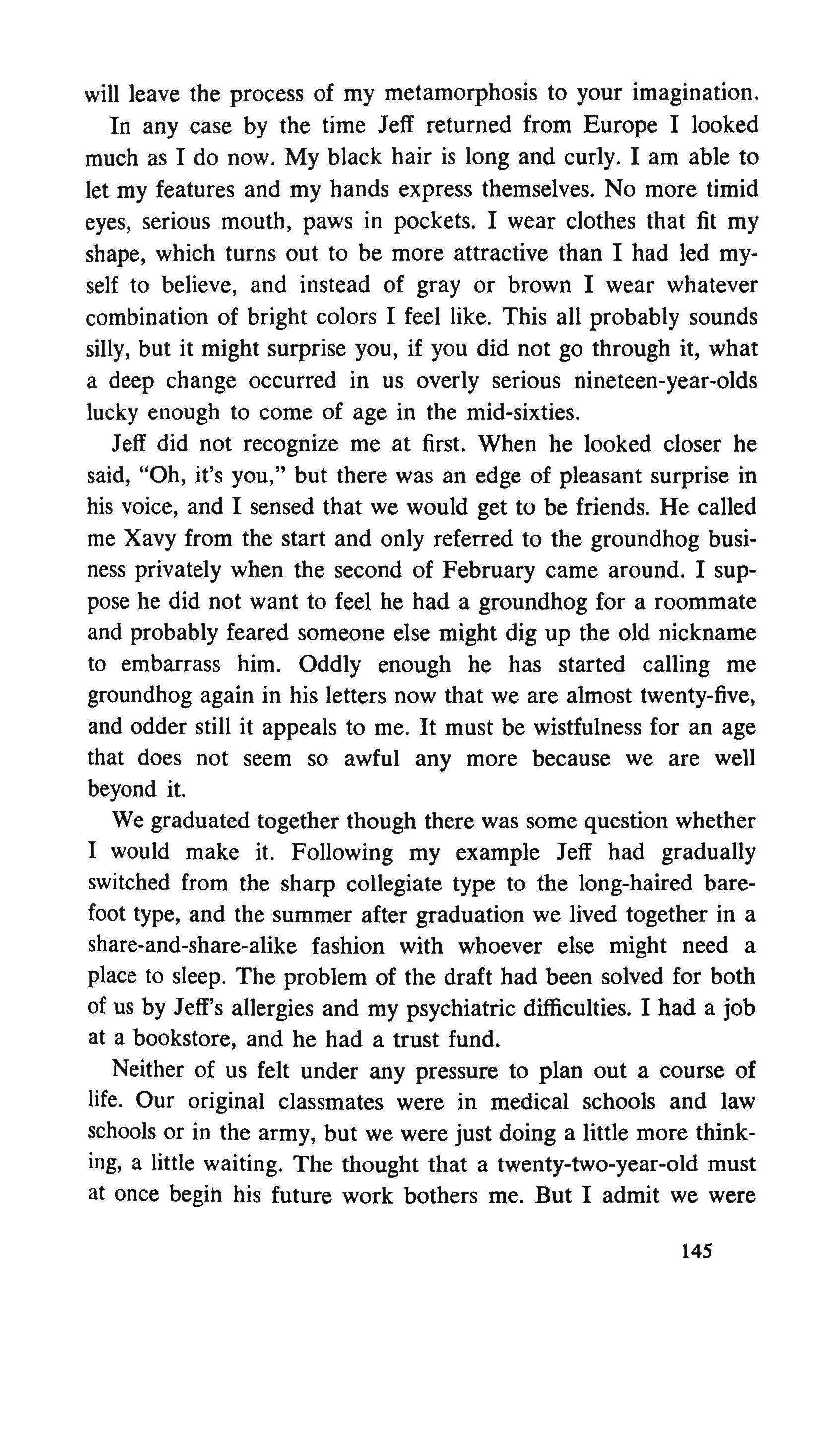
will leave the process of my metamorphosis to your imagination. In any case by the time Jeff returned from Europe I looked much as I do now. My black hair is long and curly. I am able to let my features and my hands express themselves. No more timid eyes, serious mouth, paws in pockets. I wear clothes that fit my shape, which turns out to be more attractive than I had led myself to believe, and instead of gray or brown I wear whatever combination of bright colors I feel like. This all probably sounds silly, but it might surprise you, if you did not go through it, what a deep change occurred in us overly serious nineteen-year-olds lucky enough to come of age in the mid-sixties.
Jeff did not recognize me at first. When he looked closer he said, "Oh, it's you," but there was an edge of pleasant surprise in his voice, and I sensed that we would get to be friends. He called me Xavy from the start and only referred to the groundhog business privately when the second of February came around. I suppose he did not want to feel he had a groundhog for a roommate and probably feared someone else might dig up the old nickname to embarrass him. Oddly enough he has started calling me groundhog again in his letters now that we are almost twenty-five, and odder still it appeals to me. It must be wistfulness for an age that does not seem so awful any more because we are well beyond it.
We graduated together though there was some question whether I would make it. Following my example Jeff had gradually switched from the sharp collegiate type to the long-haired barefoot type, and the summer after graduation we lived together in a share-and-share-alike fashion with whoever else might need a place to sleep. The problem of the draft had been solved for both of us by Jeff's allergies and my psychiatric difficulties. I had a job at a bookstore, and he had a trust fund. Neither of us felt under any pressure to plan out a course of life. Our original classmates were in medical schools and law schools or in the army, but we were just doing a little more thinking, a little waiting. The thought that a twenty-two-year-old must at once begin his future work bothers me. But I admit we were
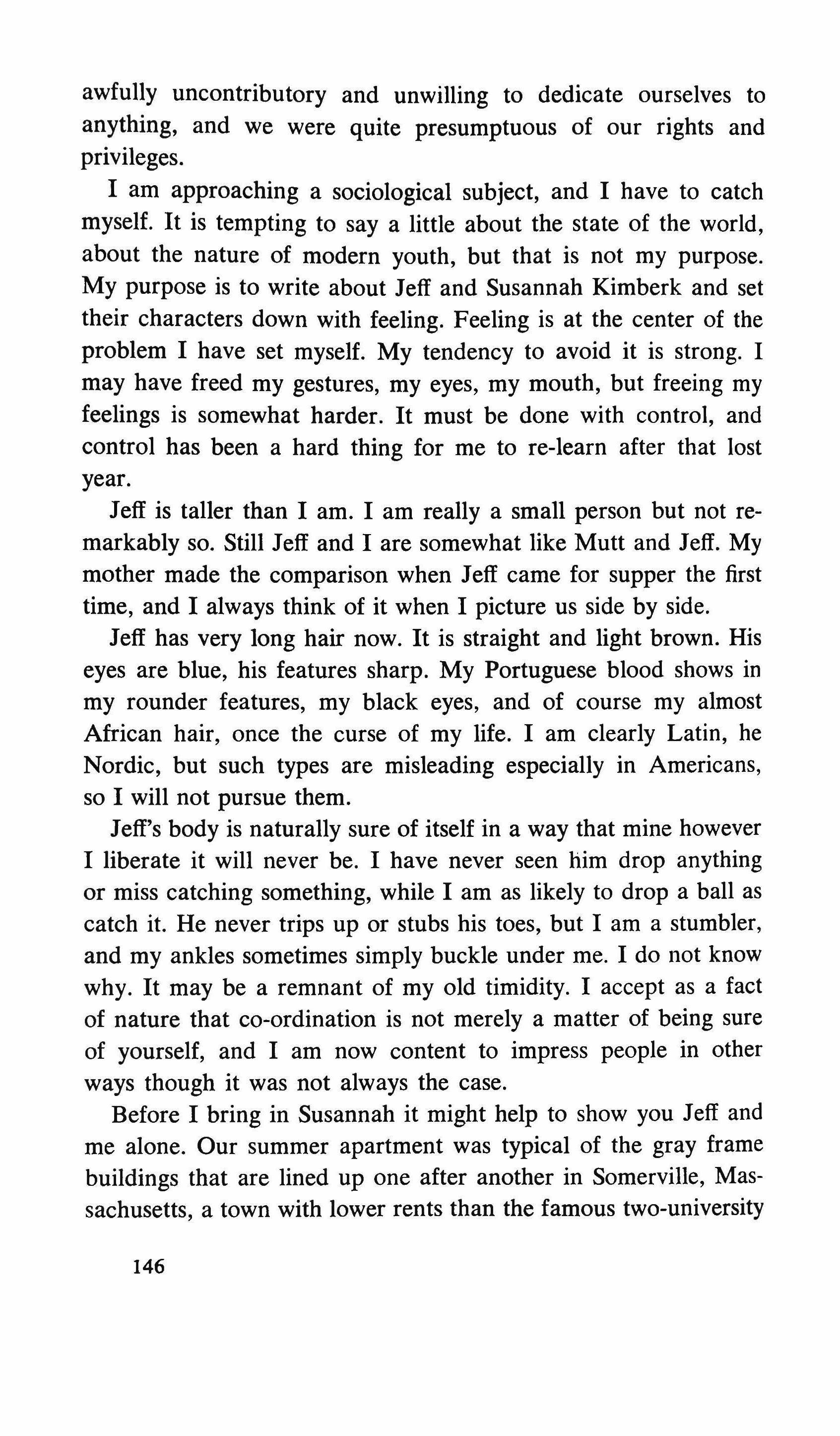
awfully uncontributory and unwilling to dedicate ourselves to anything, and we were quite presumptuous of our rights and privileges.
I am approaching a sociological subject, and I have to catch myself. It is tempting to say a little about the state of the world, about the nature of modern youth, but that is not my purpose. My purpose is to write about Jeff and Susannah Kimberk and set their characters down with feeling. Feeling is at the center of the problem I have set myself. My tendency to avoid it is strong. I may have freed my gestures, my eyes, my mouth, but freeing my feelings is somewhat harder. It must be done with control, and control has been a hard thing for me to re-learn after that lost year.
Jeff is taller than I am. I am really a small person but not remarkably so. Still Jeff and I are somewhat like Mutt and Jeff. My mother made the comparison when Jeff came for supper the first time, and I always think of it when I picture us side by side.
Jeff has very long hair now. It is straight and light brown. His eyes are blue, his features sharp. My Portuguese blood shows in my rounder features, my black eyes, and of course my almost African hair, once the curse of my life. I am clearly Latin, he Nordic, but such types are misleading especially in Americans, so I will not pursue them.
Jeff's body is naturally sure of itself in a way that mine however I liberate it will never be. I have never seen him drop anything or miss catching something, while I am as likely to drop a ball as catch it. He never trips up or stubs his toes, but I am a stumbler, and my ankles sometimes simply buckle under me. I do not know why. It may be a remnant of myoid timidity. I accept as a fact of nature that co-ordination is not merely a matter of being sure of yourself, and I am now content to impress people in other ways though it was not always the case. Before I bring in Susannah it might help to show you Jeff and me alone. Our summer apartment was typical of the gray frame buildings that are lined up one after another in Somerville, Massachusetts, a town with lower rents than the famous two-university
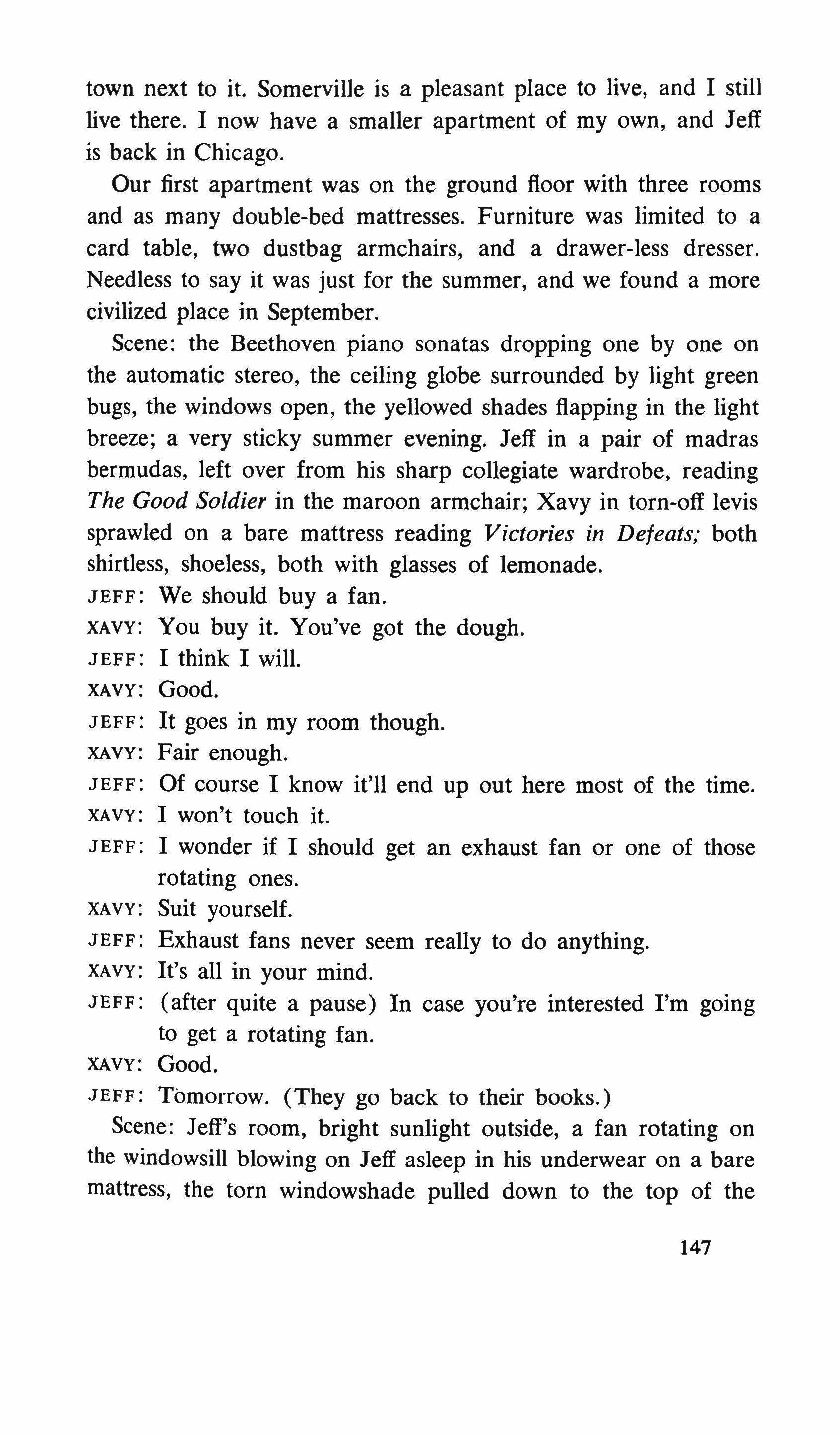
town next to it. Somerville is a pleasant place to live, and I still live there. I now have a smaller apartment of my own, and Jeff is back in Chicago.
Our first apartment was on the ground floor with three rooms and as many double-bed mattresses. Furniture was limited to a card table, two dustbag armchairs, and a drawer-less dresser. Needless to say it was just for the summer, and we found a more civilized place in September.
Scene: the Beethoven piano sonatas dropping one by one on the automatic stereo, the ceiling globe surrounded by light green bugs, the windows open, the yellowed shades flapping in the light breeze; a very sticky summer evening. Jeff in a pair of madras bermudas, left over from his sharp collegiate wardrobe, reading The Good Soldier in the maroon armchair; Xavy in torn-off levis sprawled on a bare mattress reading Victories in Defeats; both shirtless, shoeless, both with glasses of lemonade.
JEFF: We should buy a fan.
XAVY: You buy it. You've got the dough.
JEFF: I think I will.
XAVY: Good.
JEFF: It goes in my room though.
XAVY: Fair enough.
JEFF: Of course I know it'll end up out here most of the time.
XAVY: I won't touch it.
JEFF: I wonder if I should get an exhaust fan or one of those rotating ones.
XAVY: Suit yourself.
JEFF: Exhaust fans never seem really to do anything.
XAVY: It's all in your mind.
JEFF: (after quite a pause) In case you're interested I'm going to get a rotating fan.
XAVY: Good.
JEFF: Tomorrow. (They go back to their books.)
Scene: Jeff's room, bright sunlight outside, a fan rotating on the windowsill blowing on Jeff asleep in his underwear on a bare mattress, the torn windowshade pulled down to the top of the 147

fan. A very furry brown and white cat walks across Jeff's back and wakes him up.
JEFF: (yelling) Xavy, get your fucking cat out of here.
XAVY: (from the hall) It's not my fucking cat.
JEFF: Get it out anyway.
XAVY: (enters, in jeans, T-shirt, sandals) Come on, Pasha, hey, Pasha. It's time to get up anyway. Come on, Pasha.
JEFF: No it isn't. What time is it?
XAVY: Eight-thirty. I'm going to work.
JEFF: Good night. (Xavy departs with the cat under his arm.)
Shut the door. I don't want that fucking cat in here again. (Xavy slams the door, Jeff yawns.) Oh boy.
Scene: a summer storm, late Saturday afternoon, Bruckner's Sixth at full volume, the windows wide open, shades up, water pouring straight down. Xavy and Pasha in the navy blue armchair, the former reading Pale Fire; Jeff and a girl named Elly in the kitchenette making fudge; four anonymous legs visible through the double-door on a mattress in Xavy's room.
ELLY: Get your fingers out of the fudge.
JEFF: Yes, ma'am.
ELLY: Hand me that spoon.
JEFF: Yes, MA'AM. (Pause, some giggling.)
ELLY: Cut it out, Jeff.
XAVY: (to Pasha) Like the rain, pussicatto?
JEFF: (coming into the living room) I'm not very co-operative. (Pause.) Couldn't you put on something else, Xavy?
XAVY: What's wrong with this?
JEFF : You always overdo things. You've been playing Bruckner's Sixth at full volume all week. The neighbors must know it by heart.
XAVY: I just bought it.
JEFF: But you don't savor things. You run them into the ground.
XAVY: Why is everybody so picky? Elly's picky, you're picky. (Jeff sits in the maroon armchair, stretches, and stares out the window.)
JEFF: Sure is coming down.
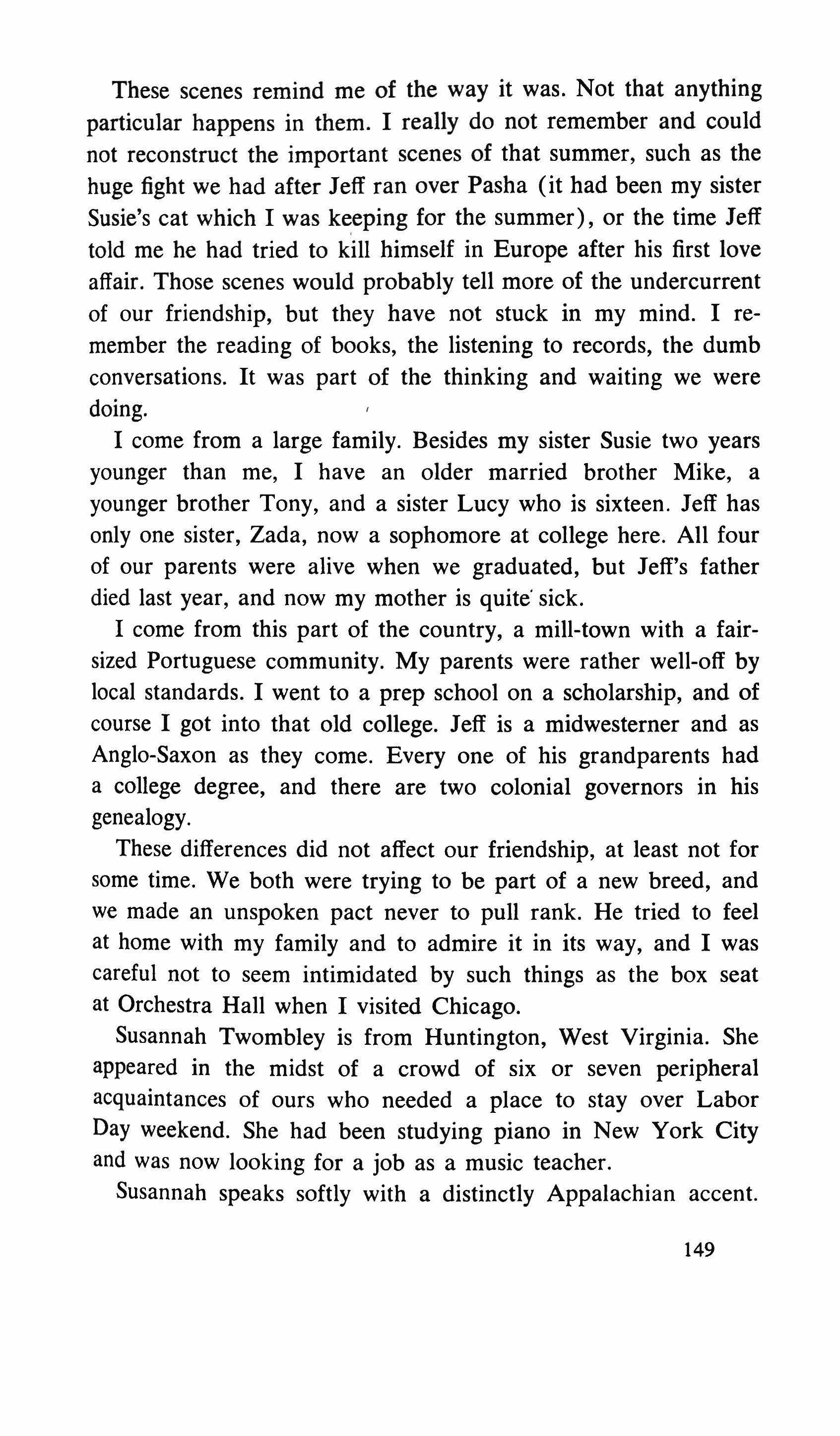
These scenes remind me of the way it was. Not that anything particular happens in them. I really do not remember and could not reconstruct the important scenes of that summer, such as the huge fight we had after Jeff ran over Pasha (it had been my sister Susie's cat which I was keeping for the summer), or the time Jeff told me he had tried to kill himself in Europe after his first love affair. Those scenes would probably tell more of the undercurrent of our friendship, but they have not stuck in my mind. I remember the reading of books, the listening to records, the dumb conversations. It was part of the thinking and waiting we were doing.
I come from a large family. Besides my sister Susie two years younger than me, I have an older married brother Mike, a younger brother Tony, and a sister Lucy who is sixteen. Jeff has only one sister, Zada, now a sophomore at college here. All four of our parents were alive when we graduated, but Jeff's father died last year, and now my mother is quite' sick.
I come from this part of the country, a mill-town with a fairsized Portuguese community. My parents were rather well-off by local standards. I went to a prep school on a scholarship, and of course I got into that old college. Jeff is a midwesterner and as Anglo-Saxon as they come. Every one of his grandparents had a college degree, and there are two colonial governors in his genealogy.
These differences did not affect our friendship, at least not for some time. We both were trying to be part of a new breed, and we made an unspoken pact never to pull rank. He tried to feel at home with my family and to admire it in its way, and I was careful not to seem intimidated by such things as the box seat at Orchestra Hall when I visited Chicago.
Susannah Twombley is from Huntington, West Virginia. She appeared in the midst of a crowd of six or seven peripheral acquaintances of ours who needed a place to stay over Labor Day weekend. She had been studying piano in New York City and was now looking for a job as a music teacher.
Susannah speaks softly with a distinctly Appalachian accent.
149
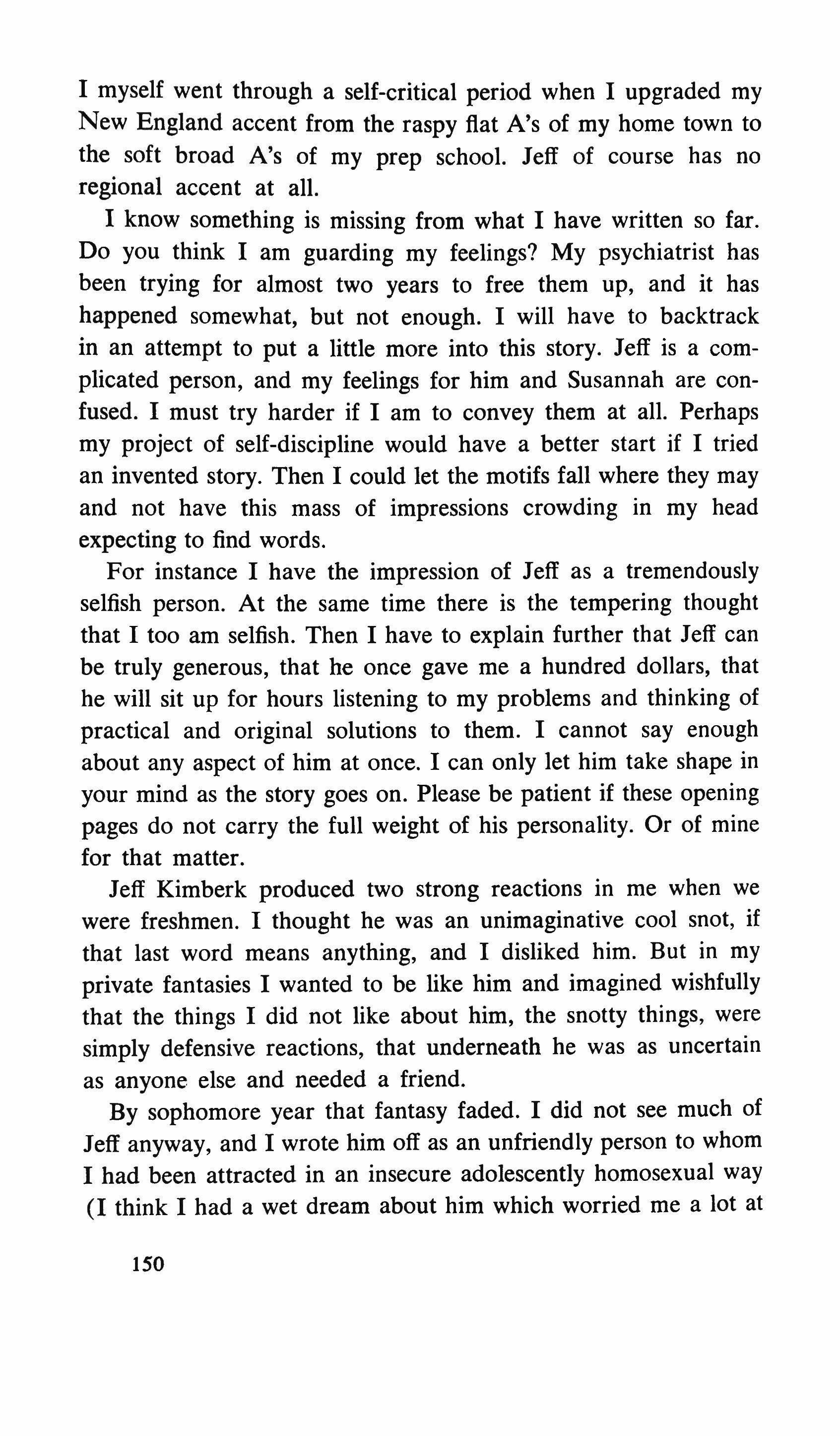
I myself went through a self-critical period when I upgraded my New England accent from the raspy flat A's of my home town to the soft broad A's of my prep school. Jeff of course has no regional accent at all.
I know something is missing from what I have written so far. Do you think I am guarding my feelings? My psychiatrist has been trying for almost two years to free them up, and it has happened somewhat, but not enough. I will have to backtrack in an attempt to put a little more into this story. Jeff is a complicated person, and my feelings for him and Susannah are confused. I must try harder if I am to convey them at all. Perhaps my project of self-discipline would have a better start if 1 tried an invented story. Then 1 could let the motifs fall where they may and not have this mass of impressions crowding in my head expecting to find words.
For instance 1 have the impression of Jeff as a tremendously selfish person. At the same time there is the tempering thought that 1 too am selfish. Then 1 have to explain further that Jeff can be truly generous, that he once gave me a hundred dollars, that he will sit up for hours listening to my problems and thinking of practical and original solutions to them. 1 cannot say enough about any aspect of him at once. 1 can only let him take shape in your mind as the story goes on. Please be patient if these opening pages do not carry the full weight of his personality. Or of mine for that matter.
Jeff Kimberk produced two strong reactions in me when we were freshmen. 1 thought he was an unimaginative cool snot, if that last word means anything, and 1 disliked him. But in my private fantasies 1 wanted to be like him and imagined wishfully that the things 1 did not like about him, the snotty things, were simply defensive reactions, that underneath he was as uncertain as anyone else and needed a friend.
By sophomore year that fantasy faded. 1 did not see much of Jeff anyway, and 1 wrote him off as an unfriendly person to whom 1 had been attracted in an insecure adolescently homosexual way (I think 1 had a wet dream about him which worried me a lot at 150
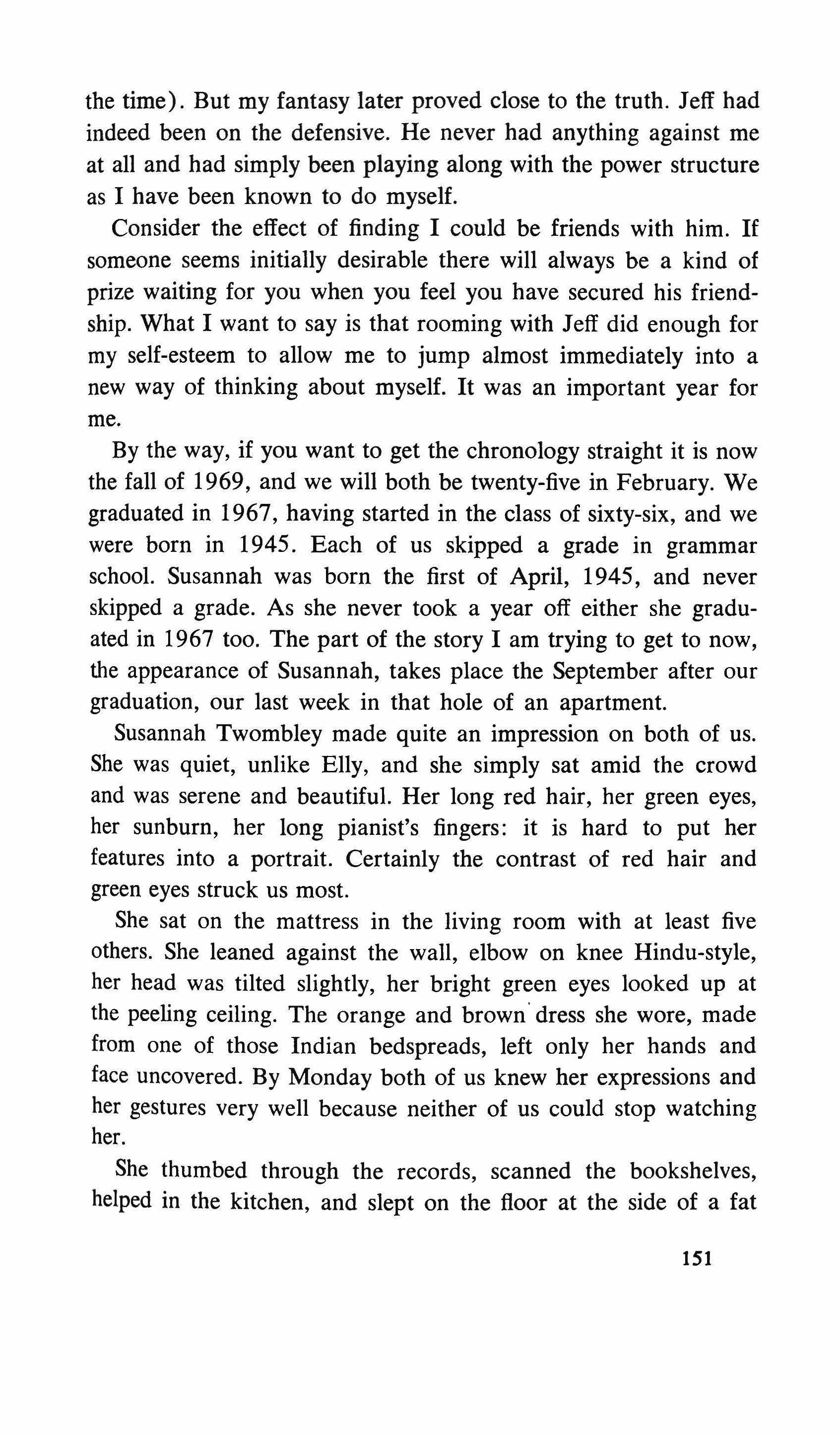
the time). But my fantasy later proved close to the truth. Jeff had indeed been on the defensive. He never had anything against me at all and had simply been playing along with the power structure as I have been known to do myself.
Consider the effect of finding I could be friends with him. If someone seems initially desirable there will always be a kind of prize waiting for you when you feel you have secured his friendship. What I want to say is that rooming with Jeff did enough for my self-esteem to allow me to jump almost immediately into a new way of thinking about myself. It was an important year for me.
By the way, if you want to get the chronology straight it is now the fall of 1969, and we will both be twenty-five in February. We graduated in 1967, having started in the class of sixty-six, and we were born in 1945. Each of us skipped a grade in grammar school. Susannah was born the first of April, 1945, and never skipped a grade. As she never took a year off either she graduated in 1967 too. The part of the story I am trying to get to now, the appearance of Susannah, takes place the September after our graduation, our last week in that hole of an apartment.
Susannah Twombley made quite an impression on both of us. She was quiet, unlike Elly, and she simply sat amid the crowd and was serene and beautiful. Her long red hair, her green eyes, her sunburn, her long pianist's fingers: it is hard to put her features into a portrait. Certainly the contrast of red hair and green eyes struck us most.
She sat on the mattress in the living room with at least five others. She leaned against the wall, elbow on knee Hindu-style, her head was tilted slightly, her bright green eyes looked up at the peeling ceiling. The orange and browndress she wore, made from one of those Indian bedspreads, left only her hands and face uncovered. By Monday both of us knew her expressions and her gestures very well because neither of us could stop watching her.
She thumbed through the records, scanned the bookshelves, helped in the kitchen, and slept on the floor at the side of a fat
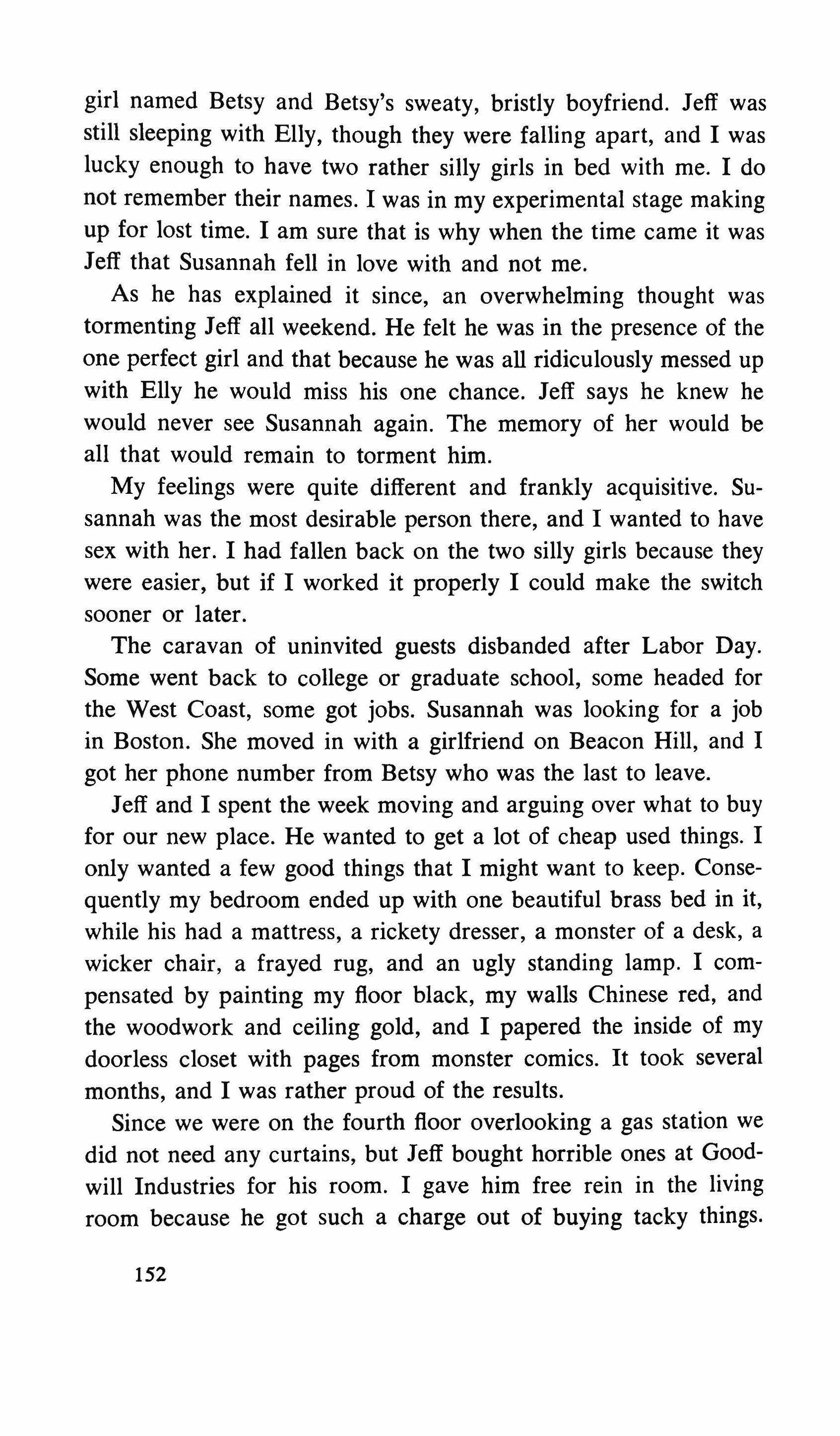
girl named Betsy and Betsy's sweaty, bristly boyfriend. Jeff was still sleeping with Elly, though they were falling apart, and I was lucky enough to have two rather silly girls in bed with me. I do not remember their names. I was in my experimental stage making up for lost time. I am sure that is why when the time came it was Jeff that Susannah fell in love with and not me.
As he has explained it since, an overwhelming thought was tormenting Jeff all weekend. He felt he was in the presence of the one perfect girl and that because he was all ridiculously messed up with Elly he would miss his one chance. Jeff says he knew he would never see Susannah again. The memory of her would be all that would remain to torment him.
My feelings were quite different and frankly acquisitive. Susannah was the most desirable person there, and I wanted to have sex with her. I had fallen back on the two silly girls because they were easier, but if I worked it properly I could make the switch sooner or later.
The caravan of uninvited guests disbanded after Labor Day. Some went back to college or graduate school, some headed for the West Coast, some got jobs. Susannah was looking for a job in Boston. She moved in with a girlfriend on Beacon Hill, and I got her phone number from Betsy who was the last to leave.
Jeff and I spent the week moving and arguing over what to buy for our new place. He wanted to get a lot of cheap used things. I only wanted a few good things that I might want to keep. Consequently my bedroom ended up with one beautiful brass bed in it, while his had a mattress, a rickety dresser, a monster of a desk, a wicker chair, a frayed rug, and an ugly standing lamp. I compensated by painting my floor black, my walls Chinese red, and the woodwork and ceiling gold, and I papered the inside of my doorless closet with pages from monster comics. It took several months, and I was rather proud of the results.
Since we were on the fourth floor overlooking a gas station we did not need any curtains, but Jeff bought horrible ones at Goodwill Industries for his room. I gave him free rein in the living room because he got such a charge out of buying tacky things.
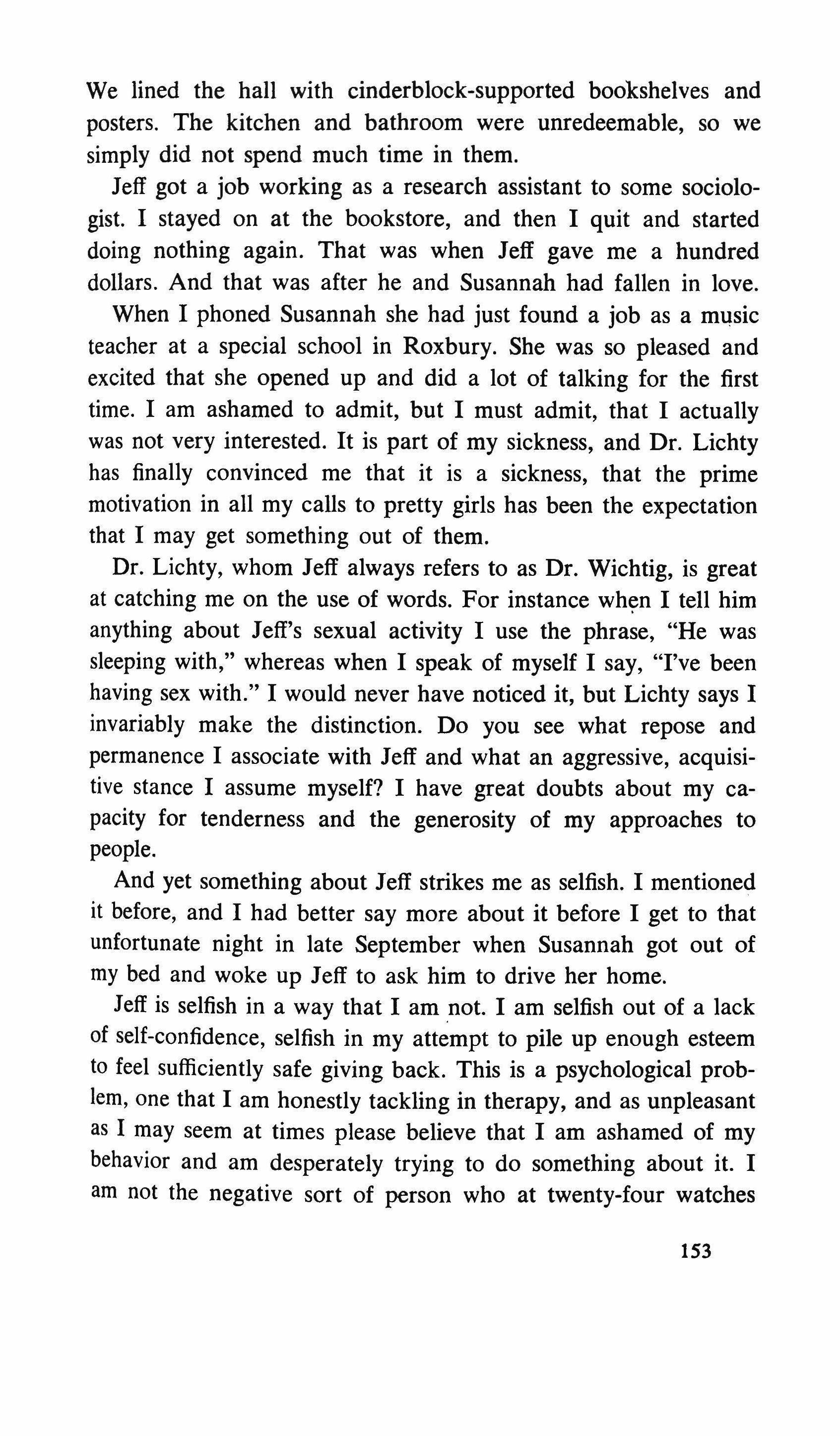
We lined the hall with cinderblock-supported bookshelves and posters. The kitchen and bathroom were unredeemable, so we simply did not spend much time in them.
Jeff got a job working as a research assistant to some sociologist. I stayed on at the bookstore, and then I quit and started doing nothing again. That was when Jeff gave me a hundred dollars. And that was after he and Susannah had fallen in love.
When I phoned Susannah she had just found a job as a music teacher at a special school in Roxbury. She was so pleased and excited that she opened up and did a lot of talking for the first time. I am ashamed to admit, but I must admit, that I actually was not very interested. It is part of my sickness, and Dr. Lichty has finally convinced me that it is a sickness, that the prime motivation in all my calls to pretty girls has been the expectation that I may get something out of them.
Dr. Lichty, whom Jeff always refers to as Dr. Wichtig, is great at catching me on the use of words. For instance when I tell him anything about Jeff's sexual activity I use the phrase, "He was sleeping with," whereas when I speak of myself I say, "I've been having sex with." I would never have noticed it, but Lichty says I invariably make the distinction. Do you see what repose and permanence I associate with Jeff and what an aggressive, acquisitive stance I assume myself? I have great doubts about my capacity for tenderness and the generosity of my approaches to people.
And yet something about Jeff strikes me as selfish. I mentioned it before, and I had better say more about it before I get to that unfortunate night in late September when Susannah got out of my bed and woke up Jeff to ask him to drive her home.
Jeff is selfish in a way that I am not. I am selfish out of a lack of self-confidence, selfish in my attempt to pile up enough esteem to feel sufficiently safe giving back. This is a psychological problem, one that I am honestly tackling in therapy, and as unpleasant as I may seem at times please believe that I am ashamed of my behavior and am desperately trying to do something about it. I am not the negative sort of person who at twenty-four watches 153
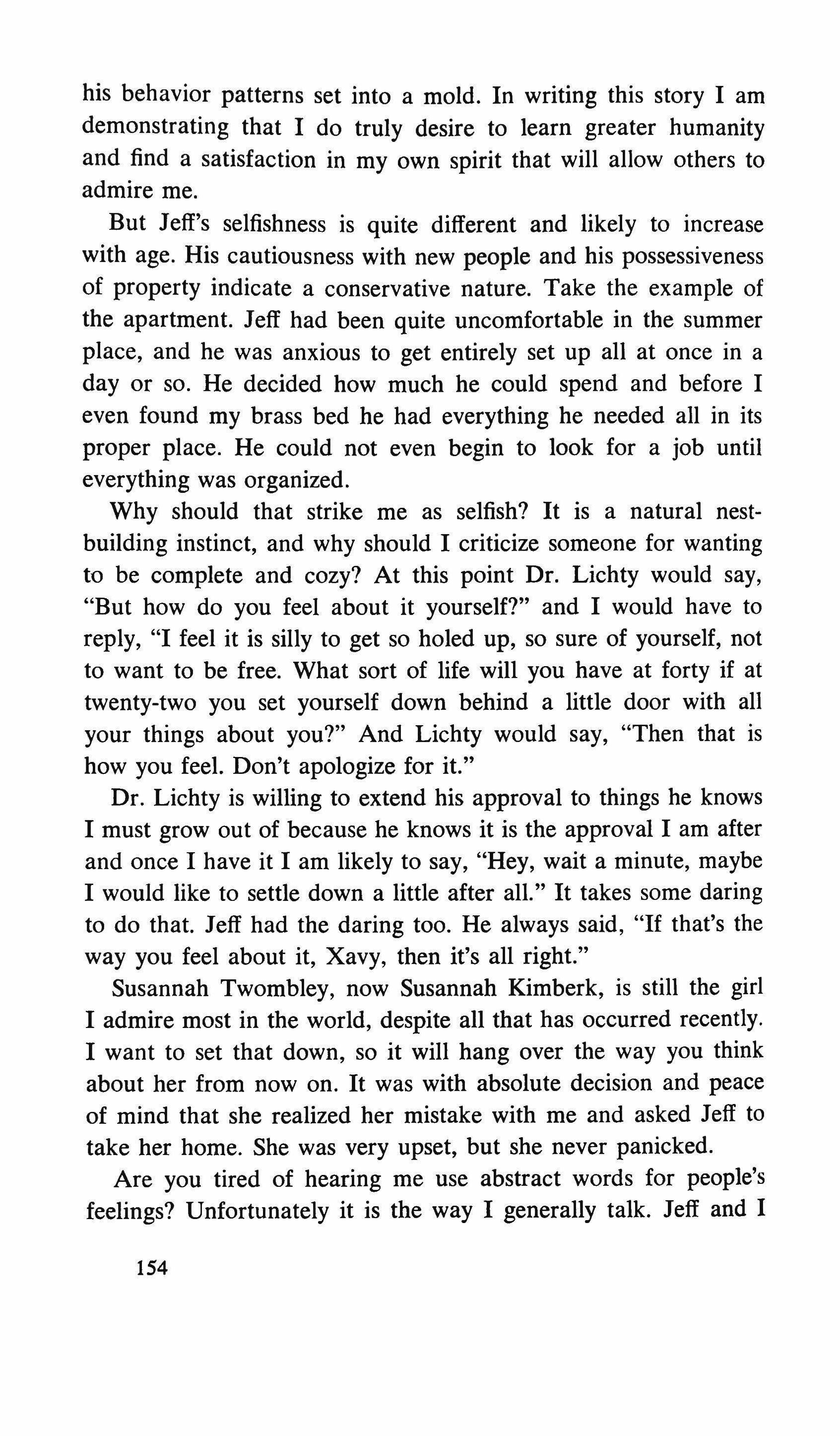
his behavior patterns set into a mold. In writing this story I am demonstrating that I do truly desire to learn greater humanity and find a satisfaction in my own spirit that will allow others to admire me.
But Jeff's selfishness is quite different and likely to increase with age. His cautiousness with new people and his possessiveness of property indicate a conservative nature. Take the example of the apartment. Jeff had been quite uncomfortable in the summer place, and he was anxious to get entirely set up all at once in a day or so. He decided how much he could spend and before I even found my brass bed he had everything he needed all in its proper place. He could not even begin to look for a job until everything was organized.
Why should that strike me as selfish? It is a natural nestbuilding instinct, and why should I criticize someone for wanting to be complete and cozy? At this point Dr. Lichty would say, "But how do you feel about it yourself?" and I would have to reply, "I feel it is silly to get so holed up, so sure of yourself, not to want to be free. What sort of life will you have at forty if at twenty-two you set yourself down behind a little door with all your things about you?" And Lichty would say, "Then that is how you feel. Don't apologize for it."
Dr. Lichty is willing to extend his approval to things he knows I must grow out of because he knows it is the approval I am after and once I have it I am likely to say, "Hey, wait a minute, maybe I would like to settle down a little after all." It takes some daring to do that. Jeff had the daring too. He always said, "If that's the way you feel about it, Xavy, then it's all right."
Susannah Twombley, now Susannah Kimberk, is still the girl I admire most in the world, despite all that has occurred recently. I want to set that down, so it will hang over the way you think about her from now on. It was with absolute decision and peace of mind that she realized her mistake with me and asked Jeff to take her home. She was very upset, but she never panicked. Are you tired of hearing me use abstract words for people's feelings? Unfortunately it is the way I generally talk. Jeff and I

used to spend hours talking about people that way, speculating this or that about them, trying to find a reason for a certain trait or a phrase for our particular reactions to them. It would make a better story if I simply described what happened that night. Dr. Lichty has made me go over it in complete detail, so I have it clearly reconstructed in my mind. At first it took me some weeks even to admit to Lichty that it had happened, and then it took a great effort on his part to calm me down about it, shut up my analytical footnoting, and get me simply to relate exactly what had happened.
Jeff came home from work, and I was in the kitchen with Susannah making dinner. He had not known she was coming. I had not told him I had her phone number, and he was very surprised to see her. Immediately he dropped into a quiet mood and disappeared into his room.
Jeff's moods show in his face rather obviously. When he is happy his blue eyes are bright and his mouth is tense and ready to speak. When he is low his eyes go dull, his lips droop, and he gets asthmatic. The awful noises Jeff can make having an attack truly frighten me. I think the disease is called urticaria. Once I saw one of his worst attacks after a game of soccer in the cold rain. His whole face swelled in awful puckers and he threw himself around the locker room gasping for breath. He has been in the hospital three or four times with oxygen tents and intravenous feedings, and the first time he actually might have died if the doctors had not got there in time to shoot him full of adrenalin. But it keeps him out of the army, as he says happily, and otherwise he is in good shape. I used to wish I was built like him.
Susannah and I were in the kitchen. Lichty even made me describe what we were wearing in his attempt to recreate the whole scene and draw out my deepest reactions to it. Susannah wore one of her Indian dresses, but this one was not much more than hip length. It was yellow with green patterns. Her sunburned arms were bare to the elbow, and she was long-legged and barefoot, in every way the kind of girl I most like to be with, quiet, soft, elongated, graceful.
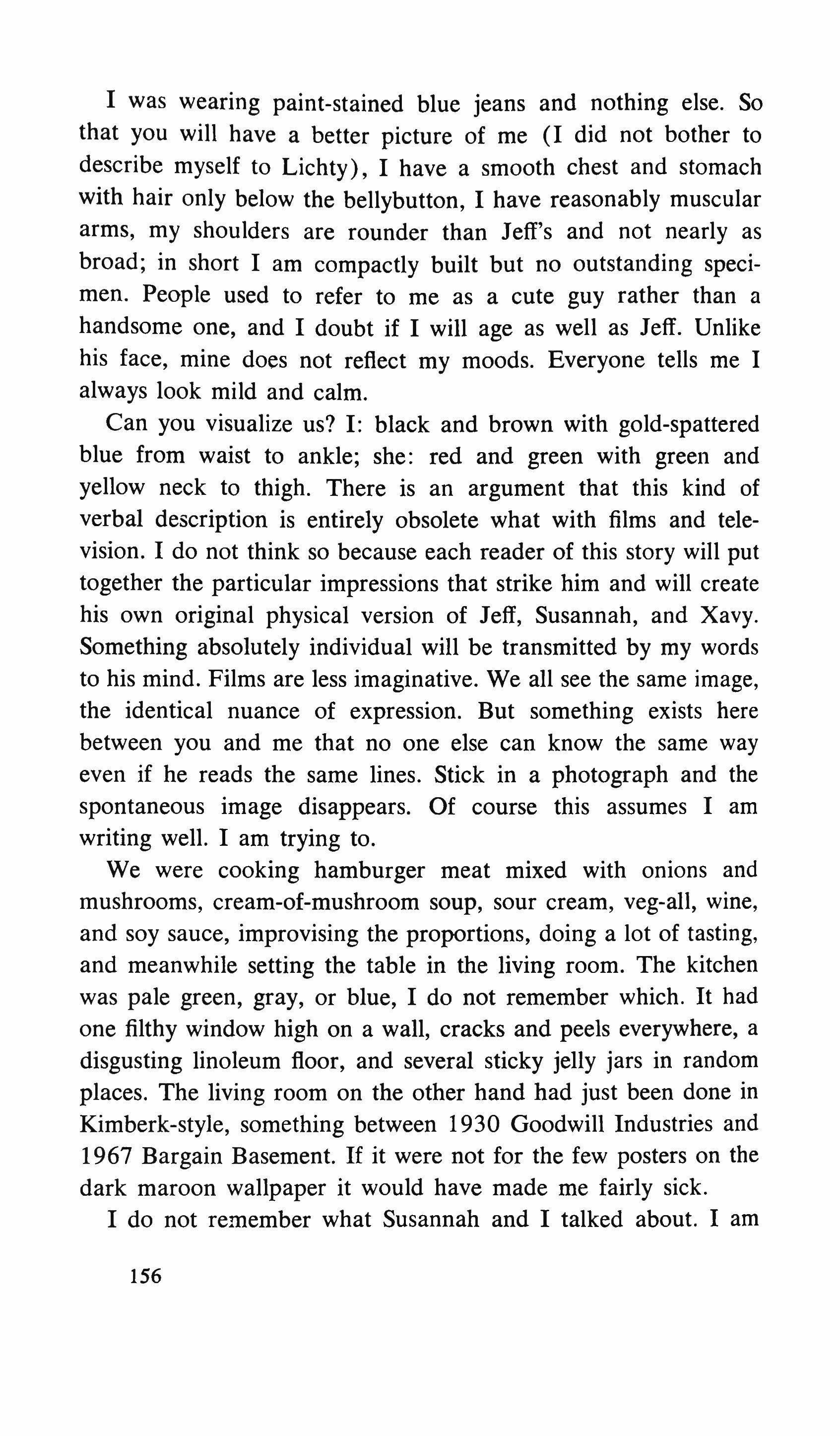
1 was wearing paint-stained blue jeans and nothing else. So that you will have a better picture of me (I did not bother to describe myself to Lichty), 1 have a smooth chest and stomach with hair only below the bellybutton, 1 have reasonably muscular arms, my shoulders are rounder than Jeff's and not nearly as broad; in short 1 am compactly built but no outstanding specimen. People used to refer to me as a cute guy rather than a handsome one, and 1 doubt if 1 will age as well as Jeff. Unlike his face, mine does not reflect my moods. Everyone tells me I always look mild and calm.
Can you visualize us? I: black and brown with gold-spattered blue from waist to ankle; she: red and green with green and yellow neck to thigh. There is an argument that this kind of verbal description is entirely obsolete what with films and television. I do not think so because each reader of this story will put together the particular impressions that strike him and will create his own original physical version of Jeff, Susannah, and Xavy. Something absolutely individual will be transmitted by my words to his mind. Films are less imaginative. We all see the same image, the identical nuance of expression. But something exists here between you and me that no one else can know the same way even if he reads the same lines. Stick in a photograph and the spontaneous image disappears. Of course this assumes 1 am writing well. 1 am trying to.
We were cooking hamburger meat mixed with onions and mushrooms, cream-of-mushroom soup, sour cream, veg-all, wine, and soy sauce, improvising the proportions, doing a lot of tasting, and meanwhile setting the table in the living room. The kitchen was pale green, gray, or blue, 1 do not remember which. It had one filthy window high on a wall, cracks and peels everywhere, a disgusting linoleum floor, and several sticky jelly jars in random places. The living room on the other hand had just been done in Kimberk-style, something between 1930 Goodwill Industries and 1967 Bargain Basement. If it were not for the few posters on the dark maroon wallpaper it would have made me fairly sick.
1 do not remember what Susannah and 1 talked about. I am
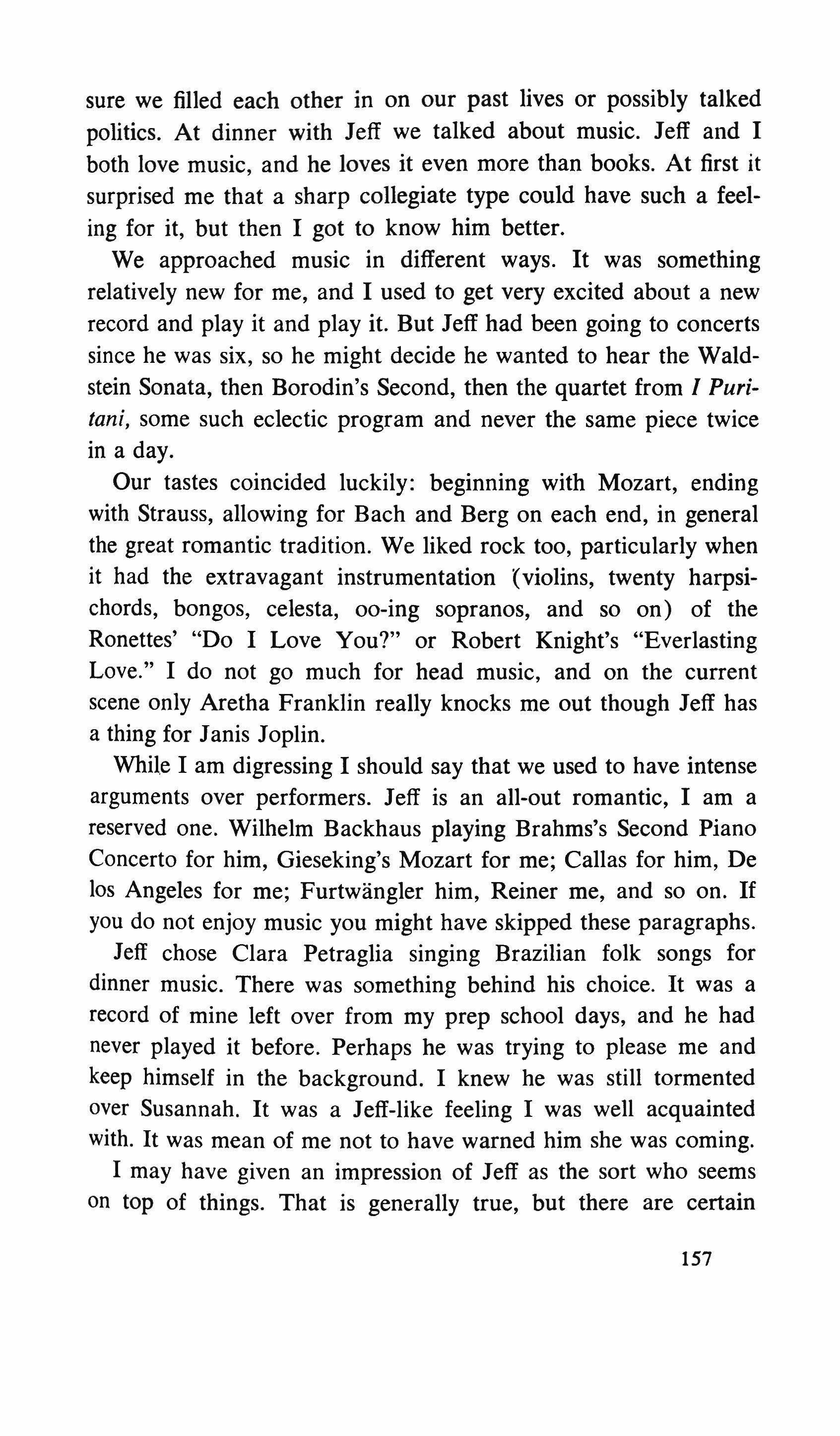
sure we filled each other in on our past lives or possibly talked politics. At dinner with Jeff we talked about music. Jeff and I both love music, and he loves it even more than books. At first it surprised me that a sharp collegiate type could have such a feeling for it, but then I got to know him better. We approached music in different ways. It was something relatively new for me, and I used to get very excited about a new record and play it and play it. But Jeff had been going to concerts since he was six, so he might decide he wanted to hear the Waldstein Sonata, then Borodin's Second, then the quartet from I Puritani, some such eclectic program and never the same piece twice in a day.
Our tastes coincided luckily: beginning with Mozart, ending with Strauss, allowing for Bach and Berg on each end, in general the great romantic tradition. We liked rock too, particularly when it had the extravagant instrumentation (violins, twenty harpsichords, bongos, celesta, oo-ing sopranos, and so on) of the Ronettes' "Do I Love You?" or Robert Knight's "Everlasting Love." I do not go much for head music, and on the current scene only Aretha Franklin really knocks me out though Jeff has a thing for Janis Joplin.
While I am digressing I should say that we used to have intense arguments over performers. Jeff is an all-out romantic, I am a reserved one. Wilhelm Backhaus playing Brahms's Second Piano Concerto for him, Gieseking's Mozart for me; Callas for him, De los Angeles for me; Furtwangler him, Reiner me, and so on. If you do not enjoy music you might have skipped these paragraphs. Jeff chose Clara Petraglia singing Brazilian folk songs for dinner music. There was something behind his choice. It was a record of mine left over from my prep school days, and he had never played it before. Perhaps he was trying to please me and keep himself in the background. I knew he was still tormented over Susannah. It was a Jeff-like feeling I was well acquainted with. It was mean of me not to have warned him she was coming. I may have given an impression of Jeff as the sort who seems on top of things. That is generally true, but there are certain

things, particularly matters of romance, that have a mystic quality for him. For the past three years I have not had much trouble getting the girls I wanted, but Jeff thought there was an uncontrollable pattern he would either fit into or not. He felt that Susannah had not been designated for him, and that was that, while I tended to see the whole thing as a free-for-all.
As we ate our hamburger and drank our Mateus, Jeff found himself talking despite his low mood, for he was too polite to stay gloomy. "I didn't know you were ·still in town," he said to Susannah.
"Oh, yes, didn't Xavy tell you? I have the most exciting job teaching in Roxbury, a special music school. It just started." Susannah spoke quietly and in short phrases. Jeff and I found that very appealing.
"So you're moving up here," said Jeff.
"Oh, I've moved."
"She's got a nice place on Beacon Hill with a friend," I said.
"Who's your friend?" Doomed Jeff assumed it was a male one.
"Ida Lee Sims. She's from Huntington. She teaches in Roxbury too, in a public school. She's been here some time."
"Why did you both come up here to teach?"
"We didn't want to live at home any more. You know? Didn't you want to get away from home?"
"Yes, absolutely," said Jeff.
"Unfortunately I've never really been away from home," I said. "I'm always a thirty-minute drive away. It's a bitch. My parents are always calling me up, and there's this thing about Tony coming in here to visit and getting mixed up with druggies. I've got my parents petrified."
"Who's Tony?"
"My brother, the younger one. I was telling you about him."
"Oh, yes."
"I keep telling you to have your parents in here for dinner now we have a decent place," said Jeff. "It'd reassure them."
"They might not exactly trip out over my room," I said. 158
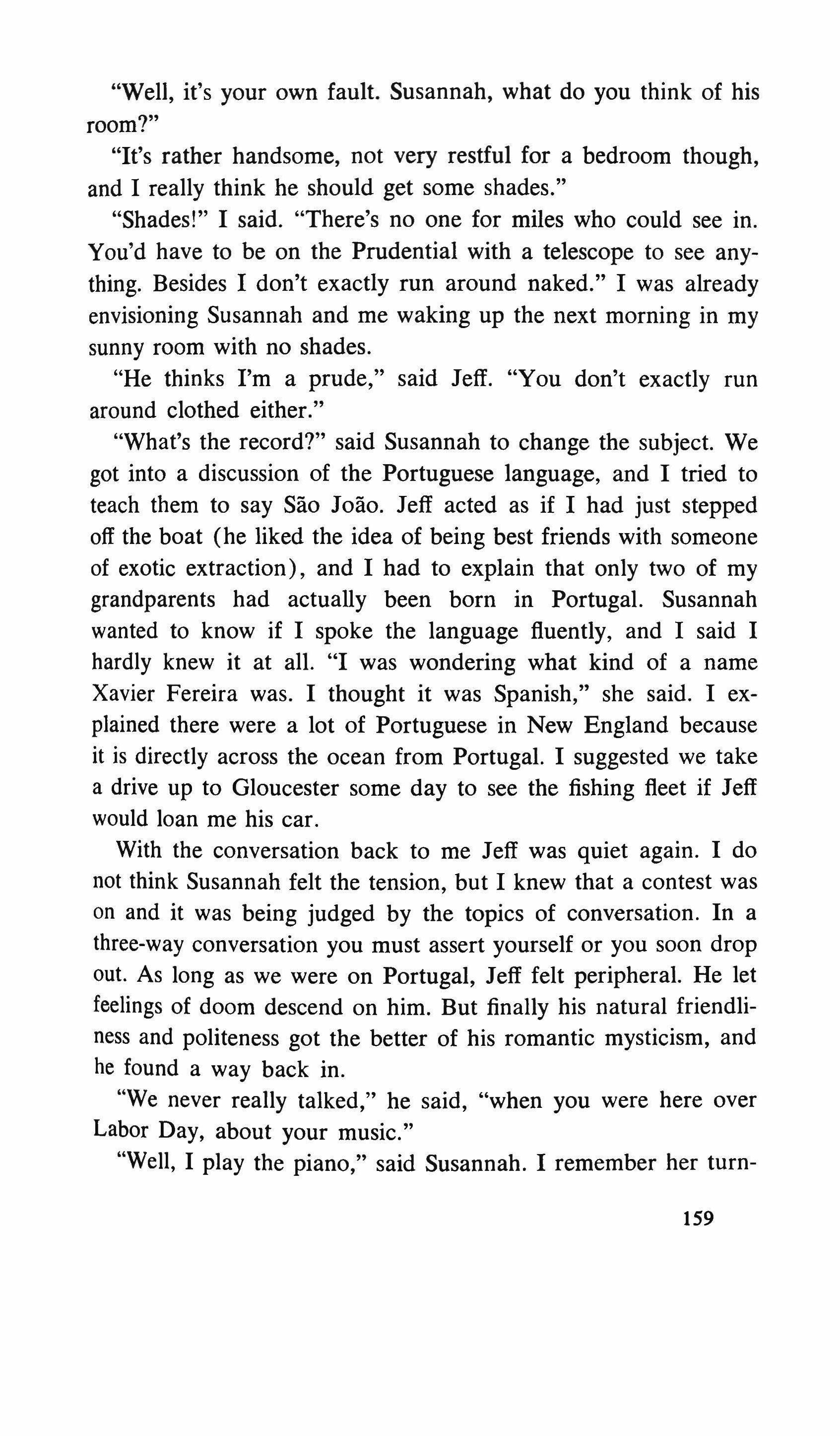
"Well, it's your own fault. Susannah, what do you think of his room?"
"It's rather handsome, not very restful for a bedroom though, and I really think he should get some shades."
"Shades!" I said. "There's no one for miles who could see in. You'd have to be on the Prudential with a telescope to see anything. Besides I don't exactly run around naked." I was already envisioning Susannah and me waking up the next morning in my sunny room with no shades.
"He thinks I'm a prude," said Jeff. "You don't exactly run around clothed either."
"What's the record?" said Susannah to change the subject. We got into a discussion of the Portuguese language, and I tried to teach them to say Sao Joao, Jeff acted as if I had just stepped off the boat (he liked the idea of being best friends with someone of exotic extraction), and I had to explain that only two of my grandparents had actually been born in Portugal. Susannah wanted to know if I spoke the language fluently, and I said I hardly knew it at all. "I was wondering what kind of a name Xavier Fereira was. I thought it was Spanish," she said. I explained there were a lot of Portuguese in New England because it is directly across the ocean from Portugal. I suggested we take a drive up to Gloucester some day to see the fishing fleet if Jeff would loan me his car.
With the conversation back to me Jeff was quiet again. I do not think Susannah felt the tension, but I knew that a contest was on and it was being judged by the topics of conversation. In a three-way conversation you must assert yourself or you soon drop out. As long as we were on Portugal, Jeff felt peripheral. He let feelings of doom descend on him. But finally his natural friendliness and politeness got the better of his romantic mysticism, and he found a way back in.
"We never really talked," he said, "when you were here over Labor Day, about your music."
"Well, I play the piano," said Susannah. I remember her turn-
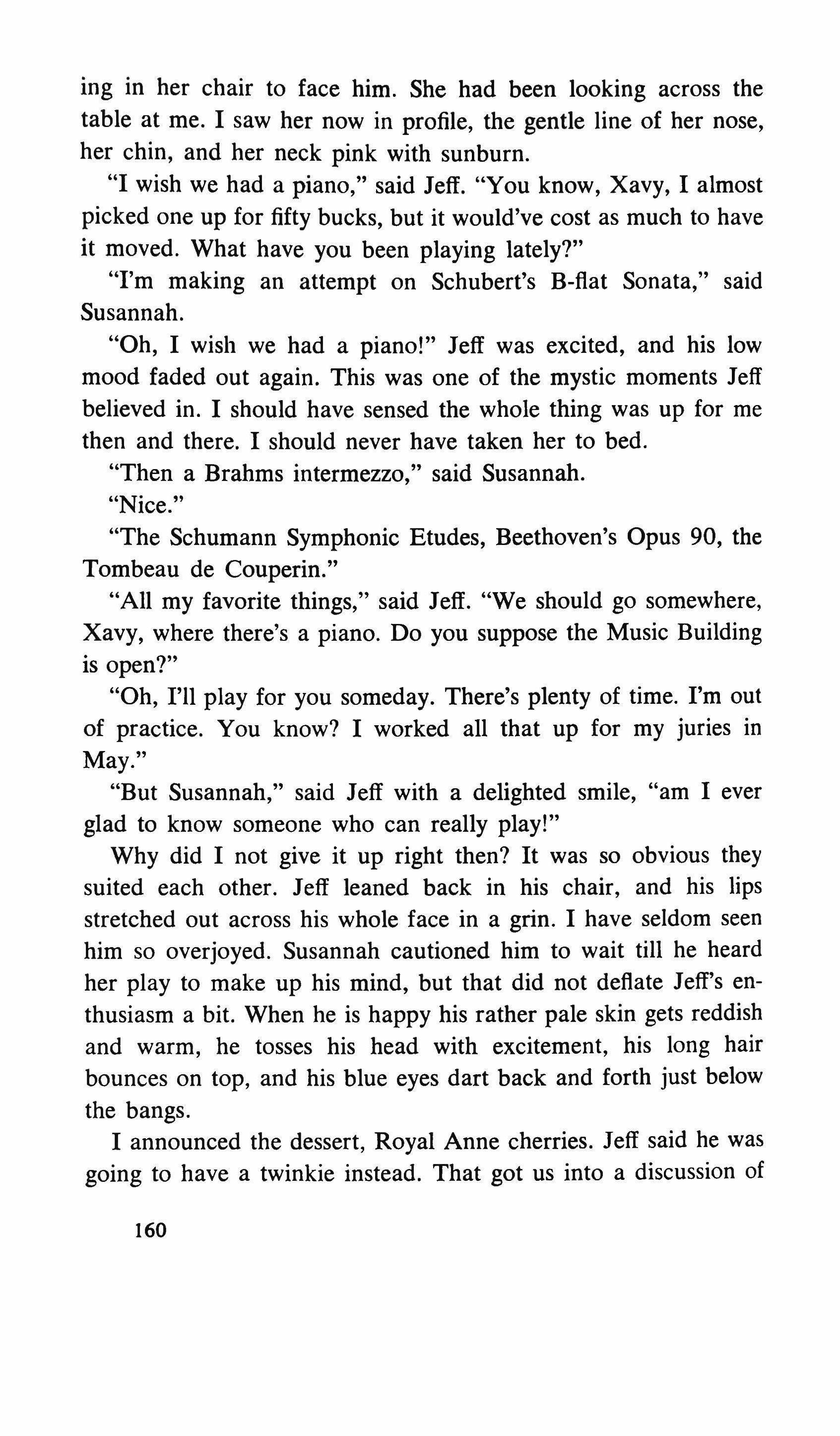
ing in her chair to face him. She had been looking across the table at me. I saw her now in profile, the gentle line of her nose, her chin, and her neck pink with sunburn.
"I wish we had a piano," said Jeff. "You know, Xavy, I almost picked one up for fifty bucks, but it would've cost as much to have it moved. What have you been playing lately?"
"I'm making an attempt on Schubert's B-flat Sonata," said Susannah.
"Oh, I wish we had a piano!" Jeff was excited, and his low mood faded out again. This was one of the mystic moments Jeff believed in. I should have sensed the whole thing was up for me then and there. I should never have taken her to bed.
"Then a Brahms intermezzo," said Susannah. "Nice."
"The Schumann Symphonic Etudes, Beethoven's Opus 90, the Tombeau de Couperin."
"All my favorite things," said Jeff. "We should go somewhere, Xavy, where there's a piano. Do you suppose the Music Building is open?"
"Oh, I'll play for you someday. There's plenty of time. I'm out of practice. You know? I worked all that up for my juries in May."
"But Susannah," said Jeff with a delighted smile, "am I ever glad to know someone who can really play!"
Why did I not give it up right then? It was so obvious they suited each other. Jeff leaned back in his chair, and his lips stretched out across his whole face in a grin. I have seldom seen him so overjoyed. Susannah cautioned him to wait till he heard her play to make up his mind, but that did not deflate Jeff's enthusiasm a bit. When he is happy his rather pale skin gets reddish and warm, he tosses his head with excitement, his long hair bounces on top, and his blue eyes dart back and forth just below the bangs.
I announced the dessert, Royal Anne cherries. Jeff said he was going to have a twinkie instead. That got us into a discussion of
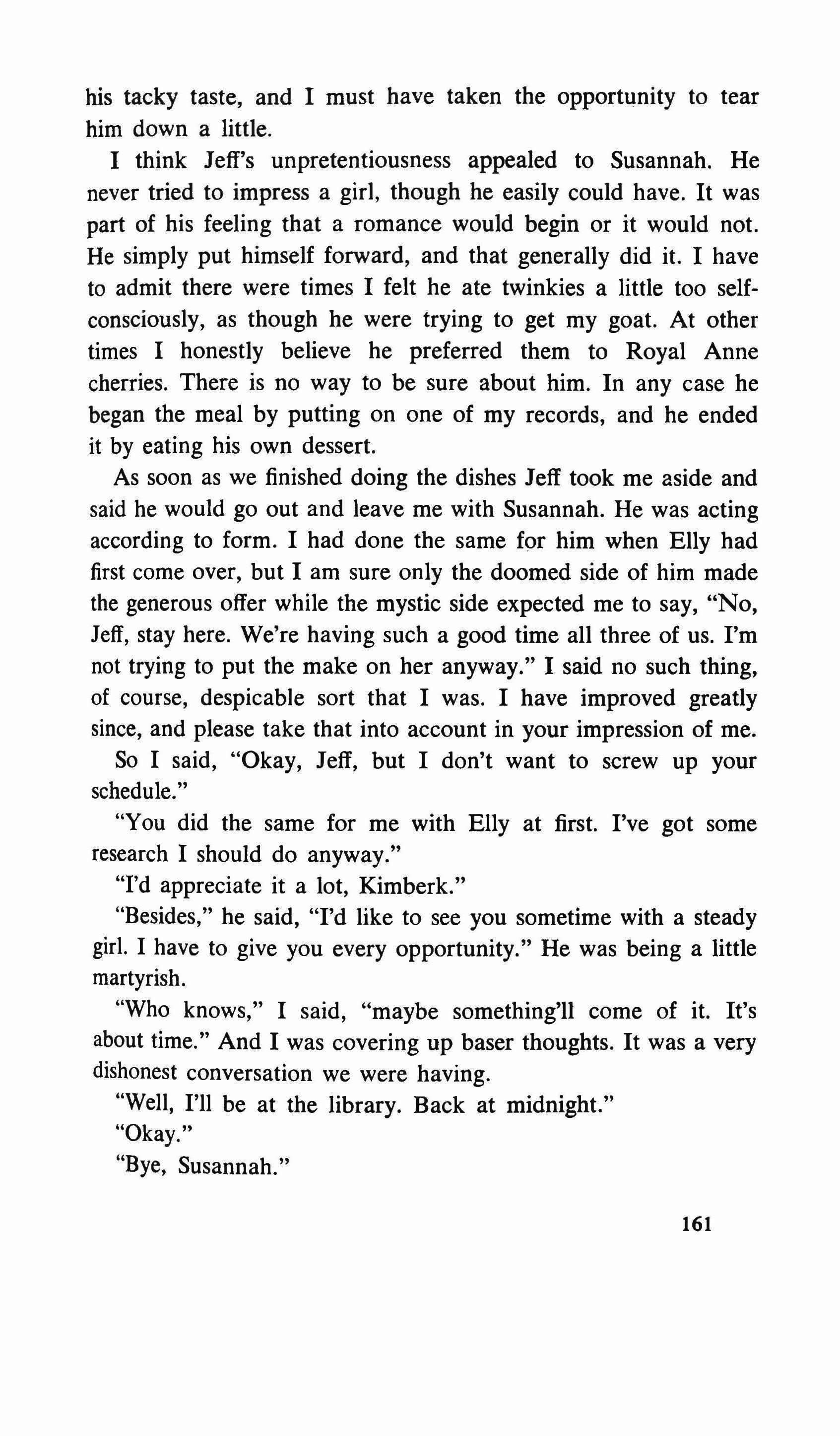
his tacky taste, and I must have taken the opportunity to tear him down a little.
I think Jeff's unpretentiousness appealed to Susannah. He never tried to impress a girl, though he easily could have. It was part of his feeling that a romance would begin or it would not. He simply put himself forward, and that generally did it. I have to admit there were times I felt he ate twinkies a little too selfconsciously, as though he were trying to get my goat. At other times I honestly believe he preferred them to Royal Anne cherries. There is no way to be sure about him. In any case he began the meal by putting on one of my records, and he ended it by eating his own dessert.
As soon as we finished doing the dishes Jeff took me aside and said he would go out and leave me with Susannah. He was acting according to form. I had done the same for him when Elly had first come over, but I am sure only the doomed side of him made the generous offer while the mystic side expected me to say, "No, Jeff, stay here. We're having such a good time all three of us. I'm not trying to put the make on her anyway." I said no such thing, of course, despicable sort that I was. I have improved greatly since, and please take that into account in your impression of me.
So I said, "Okay, Jeff, but I don't want to screw up your schedule.
"You did the same for me with Elly at first. I've got some research I should do anyway."
"I'd appreciate it a lot, Kimberk."
"Besides," he said, "I'd like to see you sometime with a steady girl. I have to give you every opportunity." He was being a little martyrish.
"Who knows," I said, "maybe something'll come of it. It's about time." And I was covering up baser thoughts. It was a very dishonest conversation we were having.
"Well, I'll be at the library. Back at midnight." "Okay."
"Bye, Susannah."
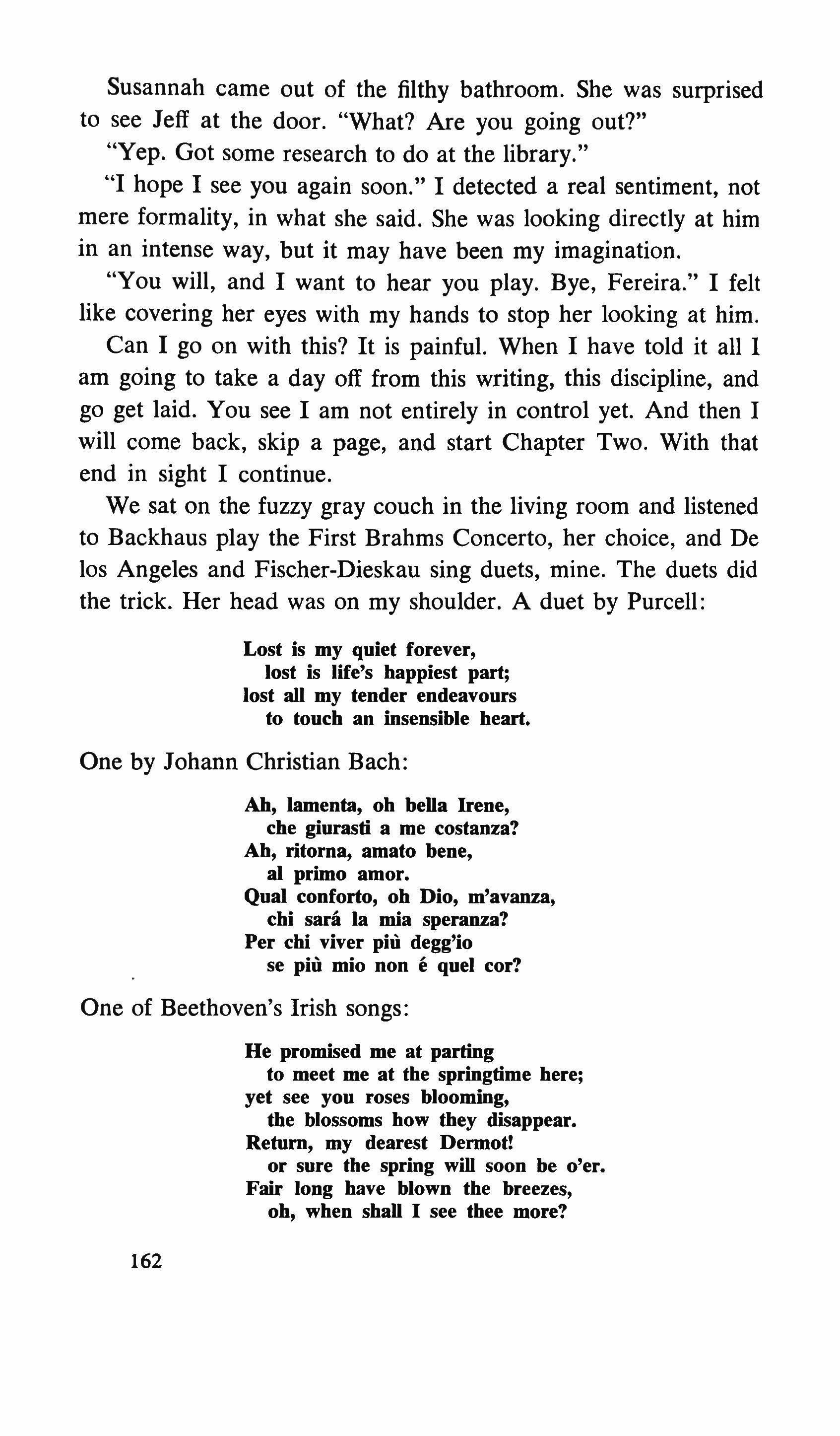
Susannah came out of the filthy bathroom. She was surprised to see Jeff at the door. "What? Are you going out?"
"Yep. Got some research to do at the library."
"I hope I see you again soon." I detected a real sentiment, not mere formality, in what she said. She was looking directly at him in an intense way, but it may have been my imagination. "You will, and I want to hear you play. Bye, Fereira." I felt like covering her eyes with my hands to stop her looking at him. Can I go on with this? It is painful. When I have told it all 1 am going to take a day off from this writing, this discipline, and go get laid. You see I am not entirely in control yet. And then I will come back, skip a page, and start Chapter Two. With that end in sight I continue.
We sat on the fuzzy gray couch in the living room and listened to Backhaus play the First Brahms Concerto, her choice, and De los Angeles and Fischer-Dieskau sing duets, mine. The duets did the trick. Her head was on my shoulder. A duet by Purcell:
Lost is my quiet forever, lost is life's happiest part; lost all my tender endeavours to touch an insensible heart.
One by Johann Christian Bach:
Ab, lamenta, oh bella Irene, che giurasti a me costanza?
Ah, ritorna, amato bene, al primo amor.
Qual conforto, oh Dio, m'avanza, chi sara la Mia speranza?
Per chi viver phi degg'io se piii mio non e quel cor?
One of Beethoven's Irish songs:
He promised me at parting to meet me at the springtime here; yet see you roses blooming, the blossoms how they disappear. Return, my dearest Dermot! or sure the spring will soon be o'er. Fair long have blown the breezes, oh, when shall I see thee more? 162
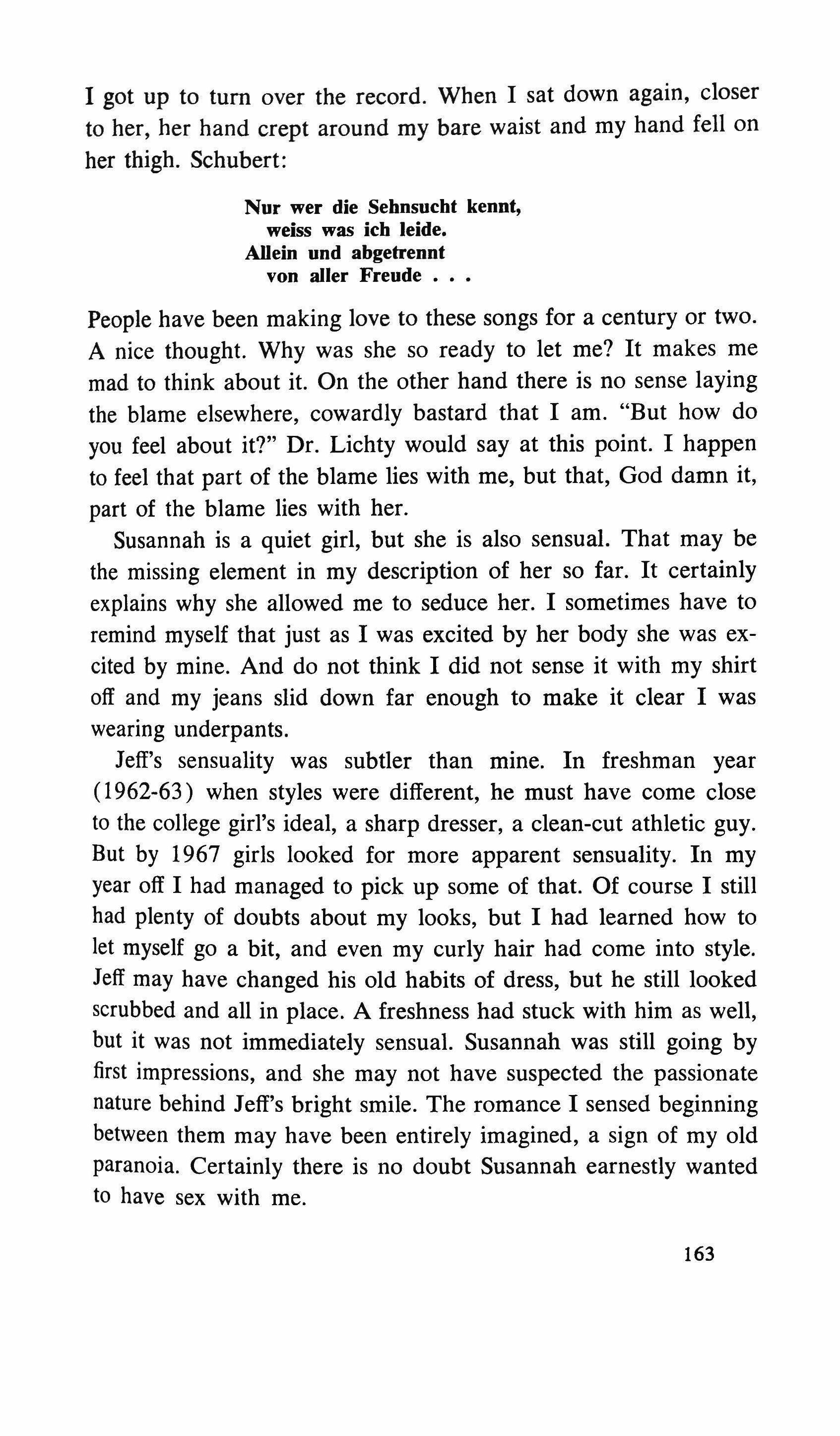
I got up to turn over the record. When I sat down again, closer to her, her hand crept around my bare waist and my hand fell on her thigh. Schubert:
Nur wer die Sehnsucht kennt, weiss was ich leide. AUein und abgetrennt von aller Freude
People have been making love to these songs for a century or two. A nice thought. Why was she so ready to let me? It makes me mad to think about it. On the other hand there is no sense laying the blame elsewhere, cowardly bastard that I am. "But how do you feel about it?" Dr. Lichty would say at this point. I happen to feel that part of the blame lies with me, but that, God damn it, part of the blame lies with her.
Susannah is a quiet girl, but she is also sensual. That may be the missing element in my description of her so far. It certainly explains why she allowed me to seduce her. I sometimes have to remind myself that just as I was excited by her body she was excited by mine. And do not think I did not sense it with my shirt off and my jeans slid down far enough to make it clear I was wearing underpants.
Jeff's sensuality was subtler than mine. In freshman year (1962-63) when styles were different, he must have come close to the college girl's ideal, a sharp dresser, a clean-cut athletic guy. But by 1967 girls looked for more apparent sensuality. In my year off I had managed to pick up some of that. Of course I still had plenty of doubts about my looks, but I had learned how to let myself go a bit, and even my curly hair had come into style. Jeff may have changed his old habits of dress, but he still looked scrubbed and all in place. A freshness had stuck with him as well, but it was not immediately sensual. Susannah was still going by first impressions, and she may not have suspected the passionate nature behind Jeff's bright smile. The romance I sensed beginning between them may have been entirely imagined, a sign of myoid paranoia. Certainly there is no doubt Susannah earnestly wanted to have sex with me.
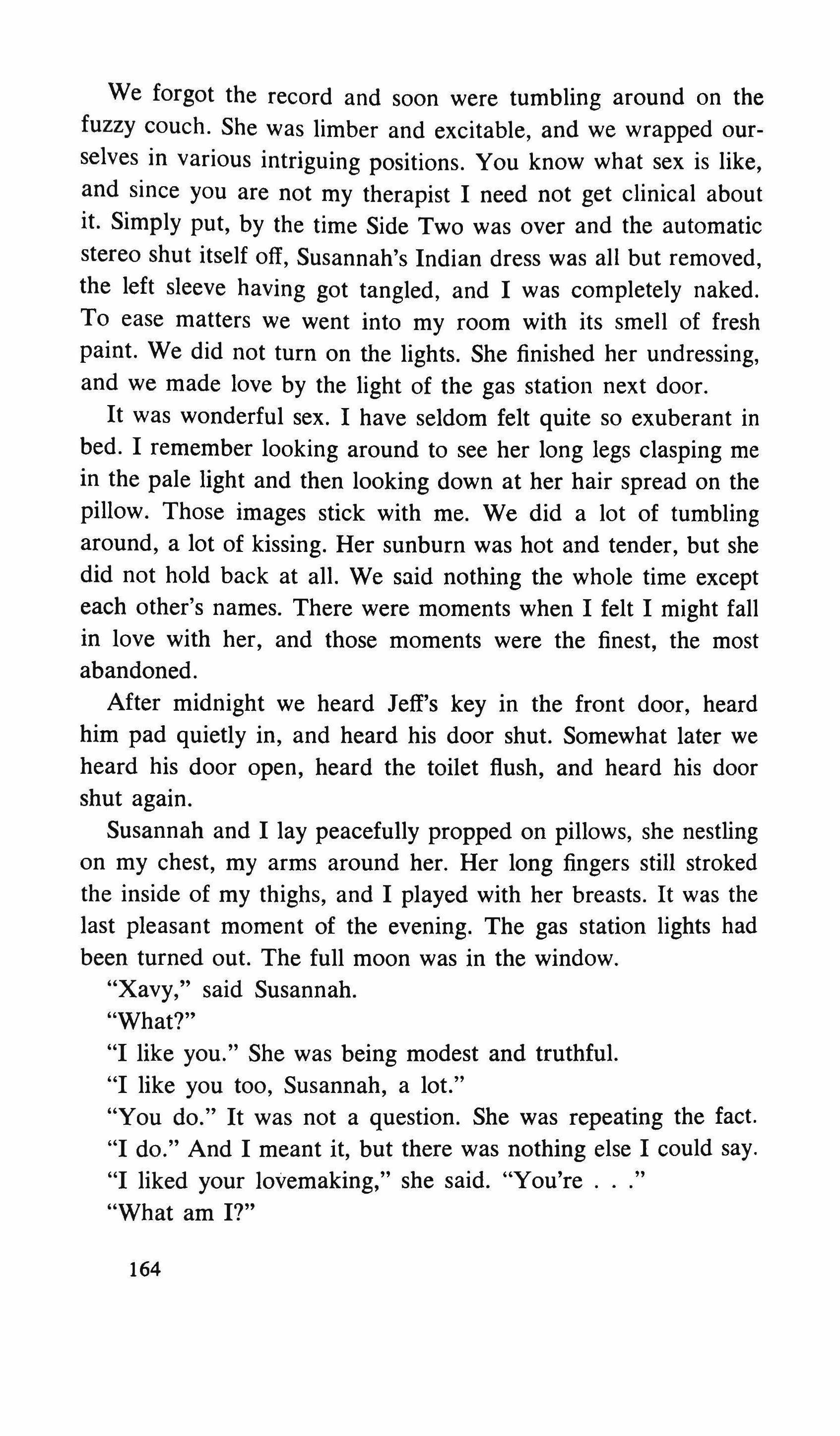
We forgot the record and soon were tumbling around on the fuzzy couch. She was limber and excitable, and we wrapped ourselves in various intriguing positions. You know what sex is like, and since you are not my therapist I need not get clinical about it. Simply put, by the time Side Two was over and the automatic stereo shut itself off, Susannah's Indian dress was all but removed, the left sleeve having got tangled, and I was completely naked. To ease matters we went into my room with its smell of fresh paint. We did not turn on the lights. She finished her undressing, and we made love by the light of the gas station next door.
It was wonderful sex. I have seldom felt quite so exuberant in bed. I remember looking around to see her long legs clasping me in the pale light and then looking down at her hair spread on the pillow. Those images stick with me. We did a lot of tumbling around, a lot of kissing. Her sunburn was hot and tender, but she did not hold back at all. We said nothing the whole time except each other's names. There were moments when I felt I might fall in love with her, and those moments were the finest, the most abandoned.
After midnight we heard Jeff's key in the front door, heard him pad quietly in, and heard his door shut. Somewhat later we heard his door open, heard the toilet flush, and heard his door shut again.
Susannah and I lay peacefully propped on pillows, she nestling on my chest, my arms around her. Her long fingers still stroked the inside of my thighs, and I played with her breasts. It was the last pleasant moment of the evening. The gas station lights had been turned out. The full moon was in the window.
"Xavy," said Susannah.
"What?"
"I like you." She was being modest and truthful.
"I like you too, Susannah, a lot."
"You do." It was not a question. She was repeating the fact.
"I do." And I meant it, but there was nothing else I could say.
"I liked your lovemaking," she said. "You're ."
"What am I?"
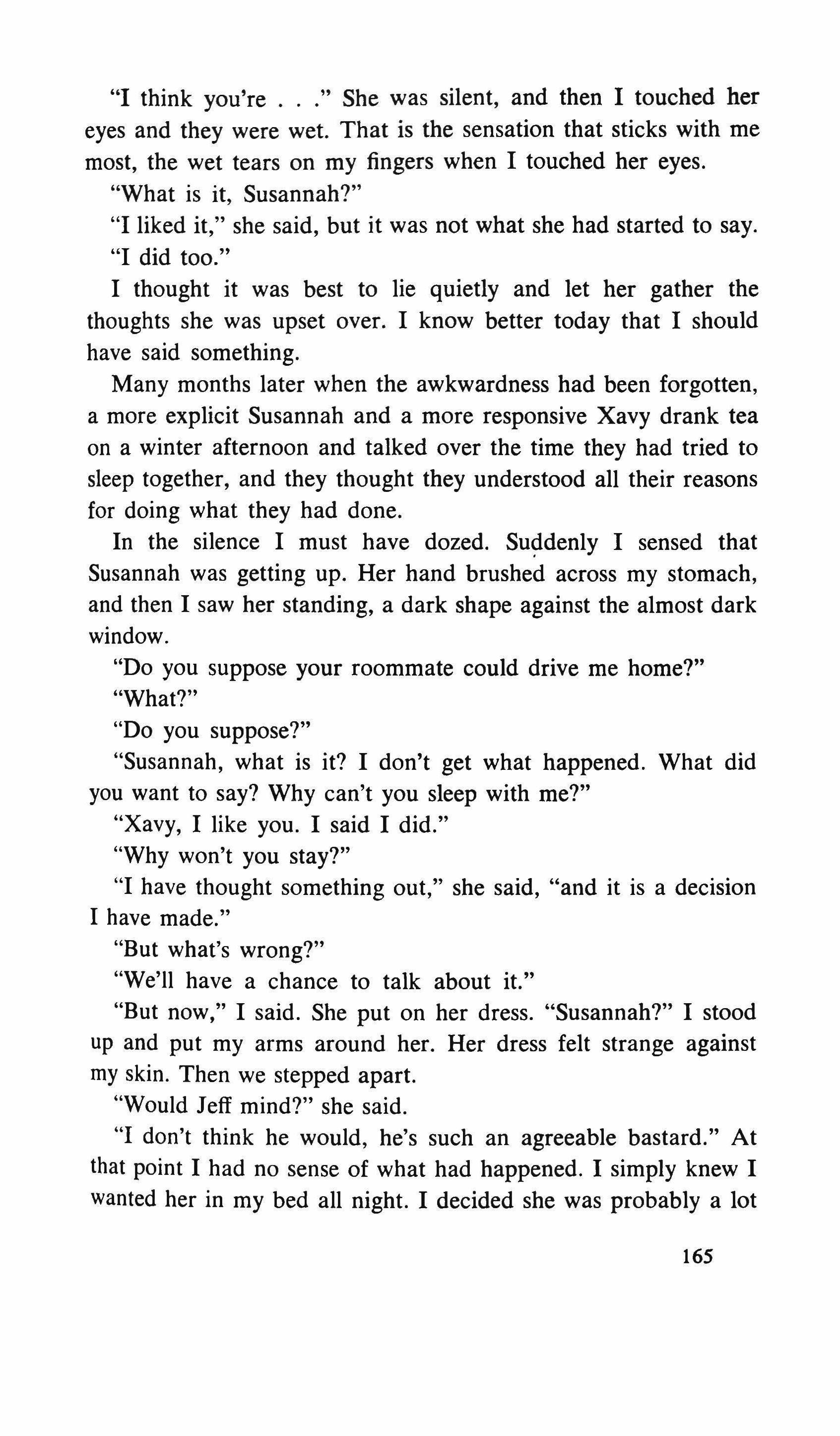
"I think you're She was silent, and then I touched her eyes and they were wet. That is the sensation that sticks with me most, the wet tears on my fingers when I touched her eyes.
"What is it, Susannah?"
"I liked it," she said, but it was not what she had started to say. "I did too."
I thought it was best to lie quietly and let her gather the thoughts she was upset over. I know better today that I should have said something.
Many months later when the awkwardness had been forgotten, a more explicit Susannah and a more responsive Xavy drank tea on a winter afternoon and talked over the time they had tried to sleep together, and they thought they understood all their reasons for doing what they had done.
In the silence I must have dozed. Suddenly I sensed that Susannah was getting up. Her hand brushed across my stomach, and then I saw her standing, a dark shape against the almost dark window.
"Do you suppose your roommate could drive me home?"
"What?"
"Do you suppose?"
"Susannah, what is it? I don't get what happened. What did you want to say? Why can't you sleep with me?"
"Xavy, I like you. I said I did."
"Why won't you stay?"
"I have thought something out," she said, "and it is a decision I have made."
"But what's wrong?"
"We'll have a chance to talk about it."
"But now," I said. She put on her dress. "Susannah?" I stood up and put my arms around her. Her dress felt strange against my skin. Then we stepped apart.
"Would Jeff mind?" she said.
"I don't think he would, he's such an agreeable bastard." At that point I had no sense of what had happened. I simply knew I wanted her in my bed all night. I decided she was probably a lot 165
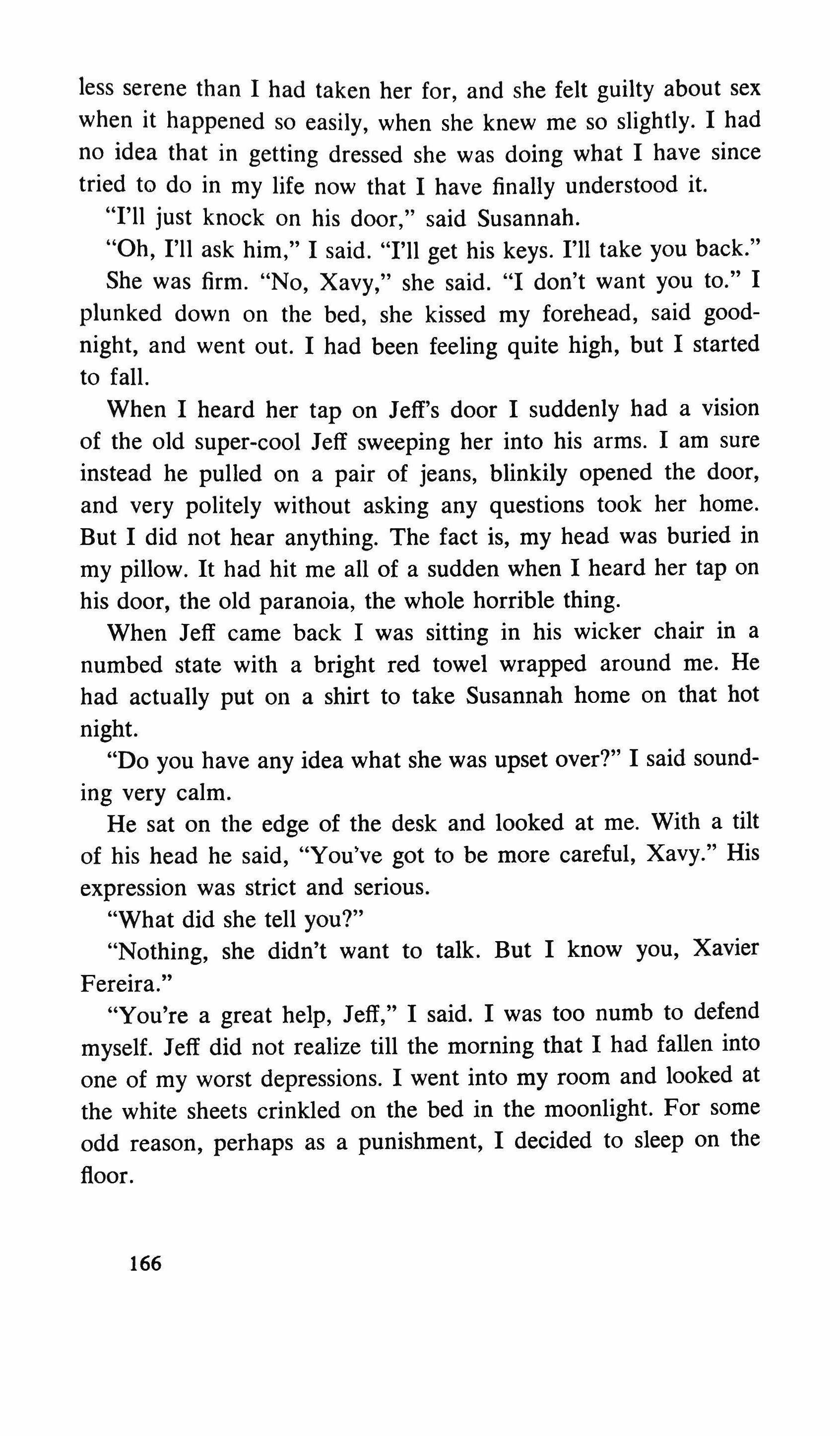
less serene than I had taken her for, and she felt guilty about sex when it happened so easily, when she knew me so slightly. I had no idea that in getting dressed she was doing what I have since tried to do in my life now that I have finally understood it.
"I'll just knock on his door," said Susannah.
"Oh, I'll ask him," I said. "I'll get his keys. I'll take you back."
She was firm. "No, Xavy," she said. "I don't want you to." I plunked down on the bed, she kissed my forehead, said goodnight, and went out. I had been feeling quite high, but I started to fall.
When I heard her tap on Jeff's door I suddenly had a vision of the old super-cool Jeff sweeping her into his arms. I am sure instead he pulled on a pair of jeans, blinkily opened the door, and very politely without asking any questions took her home. But I did not hear anything. The fact is, my head was buried in my pillow. It had hit me all of a sudden when I heard her tap on his door, the old paranoia, the whole horrible thing.
When Jeff came back I was sitting in his wicker chair in a numbed state with a bright red towel wrapped around me. He had actually put on a shirt to take Susannah home on that hot night.
"Do you have any idea what she was upset over?" I said sounding very calm.
He sat on the edge of the desk and looked at me. With a tilt of his head he said, "You've got to be more careful, Xavy." His expression was strict and serious.
"What did she tell you?"
"Nothing, she didn't want to talk. But I know you, Xavier Fereira."
"You're a great help, Jeff," I said. I was too numb to defend myself. Jeff did not realize till the morning that I had fallen into one of my worst depressions. I went into my room and looked at the white sheets crinkled on the bed in the moonlight. For some odd reason, perhaps as a punishment, I decided to sleep on the floor. 166
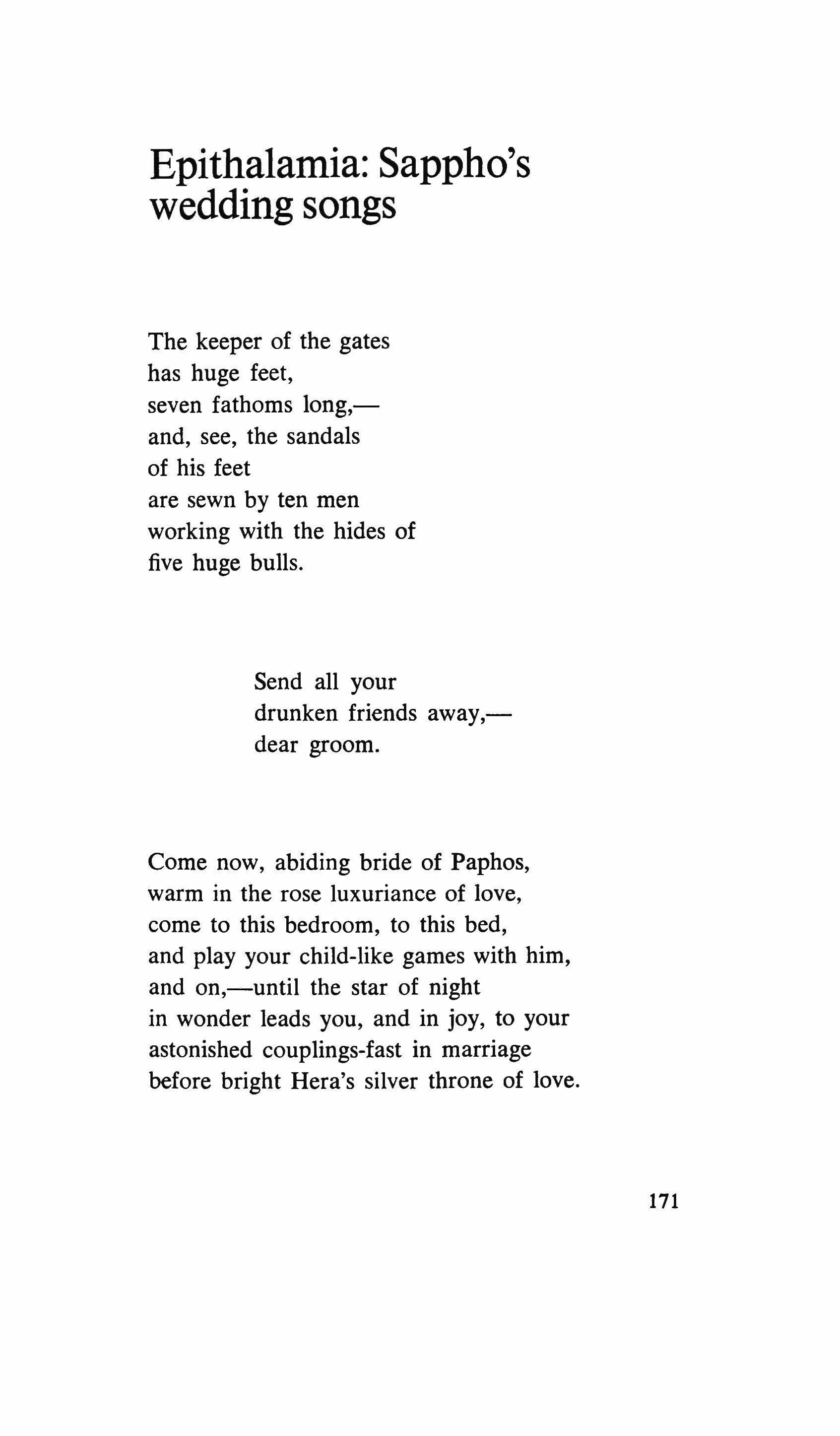
The keeper of the gates has huge feet, seven fathoms long,and, see, the sandals of his feet are sewn by ten men working with the hides of five huge bulls.
Send all your drunken friends away,dear groom.
Come now, abiding bride of Paphos, warm in the rose luxuriance of love, come to this bedroom, to this bed, and play your child-like games with him, and on,-until the star of night in wonder leads you, and in joy, to your astonished couplings-fast in marriage before bright Hera's silver throne of love.
What is that image that you cast, sweet groom? Sleek sapling to my eyes.
Swollen, your violet breasts,to mine.
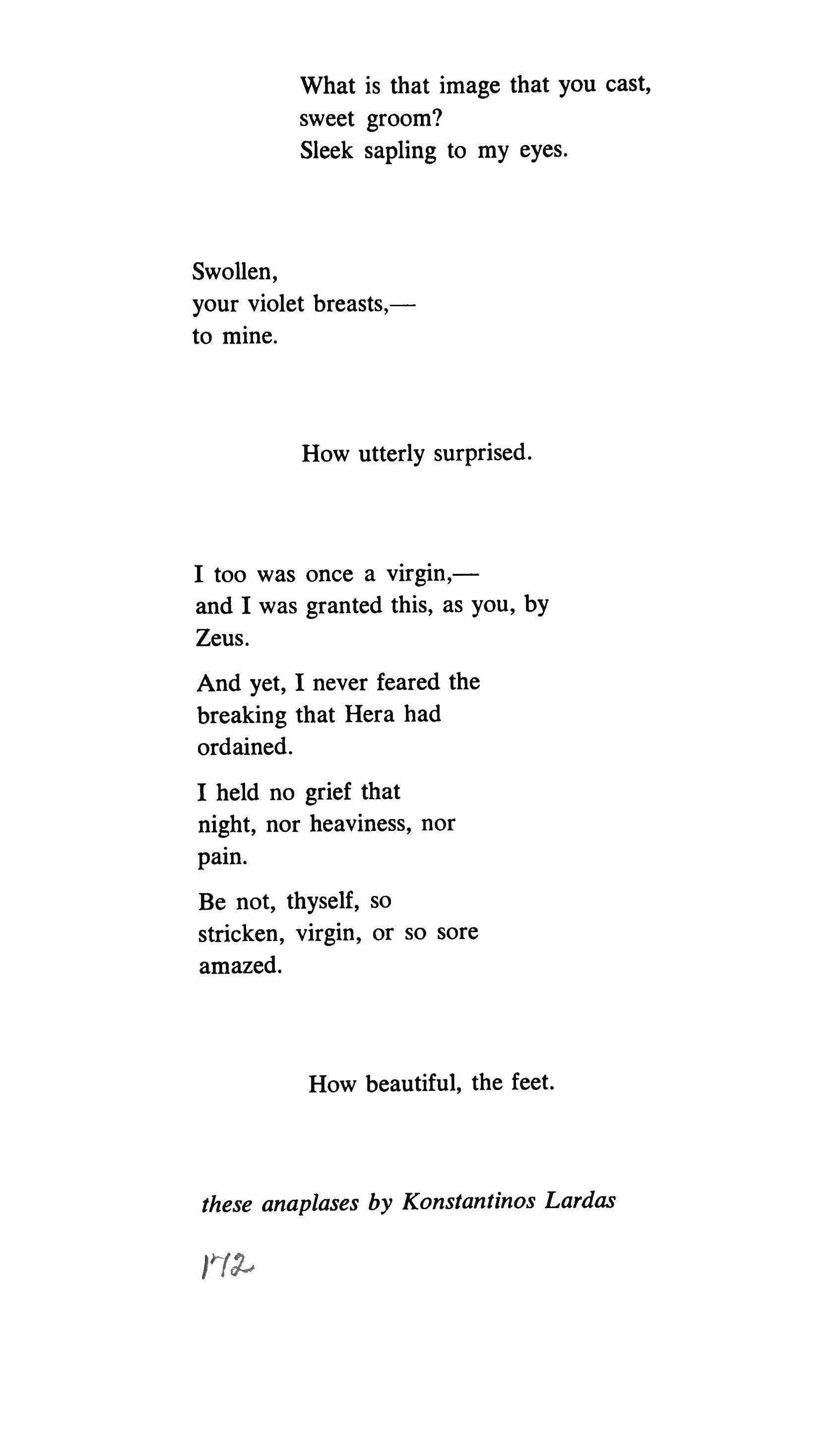
How utterly surprised.
I too was once a virgin,and I was granted this, as you, by Zeus.
And yet, I never feared the breaking that Hera had ordained.
I held no grief that night, nor heaviness, nor pain.
Be not, thyself, so stricken, virgin, or so sore amazed.
How beautiful, the feet.
these anaplases by Konstantinos Lardas
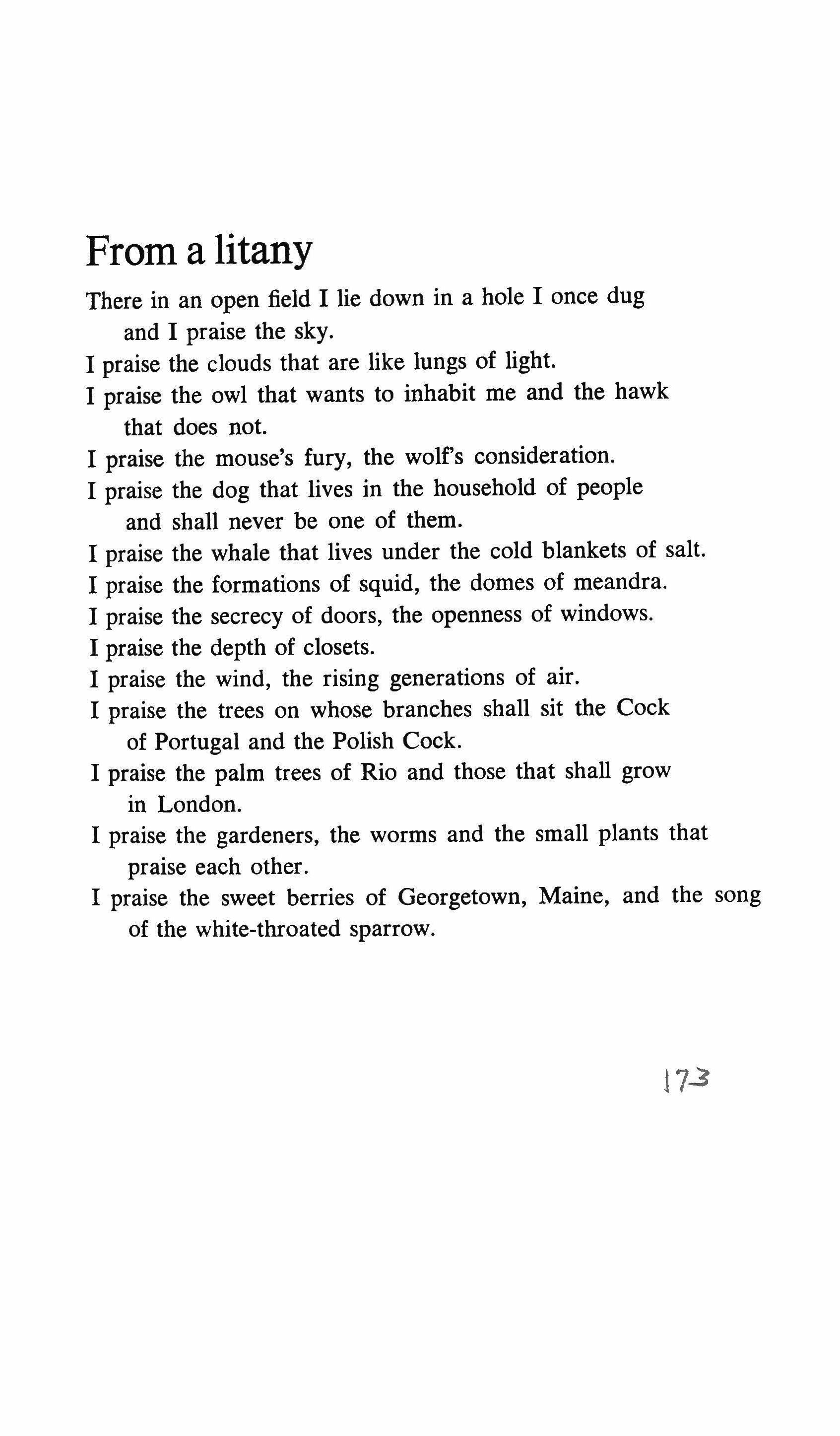
There in an open field I lie down in a hole I once dug and I praise the sky.
I praise the clouds that are like lungs of light.
I praise the owl that wants to inhabit me and the hawk that does not.
I praise the mouse's fury, the wolfs consideration.
I praise the dog that lives in the household of people and shall never be one of them.
I praise the whale that lives under the cold blankets of salt.
I praise the formations of squid, the domes of meandra.
I praise the secrecy of doors, the openness of windows.
I praise the depth of closets.
I praise the wind, the rising generations of air.
I praise the trees on whose branches shall sit the Cock of Portugal and the Polish Cock.
I praise the palm trees of Rio and those that shall grow in London.
I praise the gardeners, the worms and the small plants that praise each other.
I praise the sweet berries of Georgetown, Maine, and the song of the white-throated sparrow.
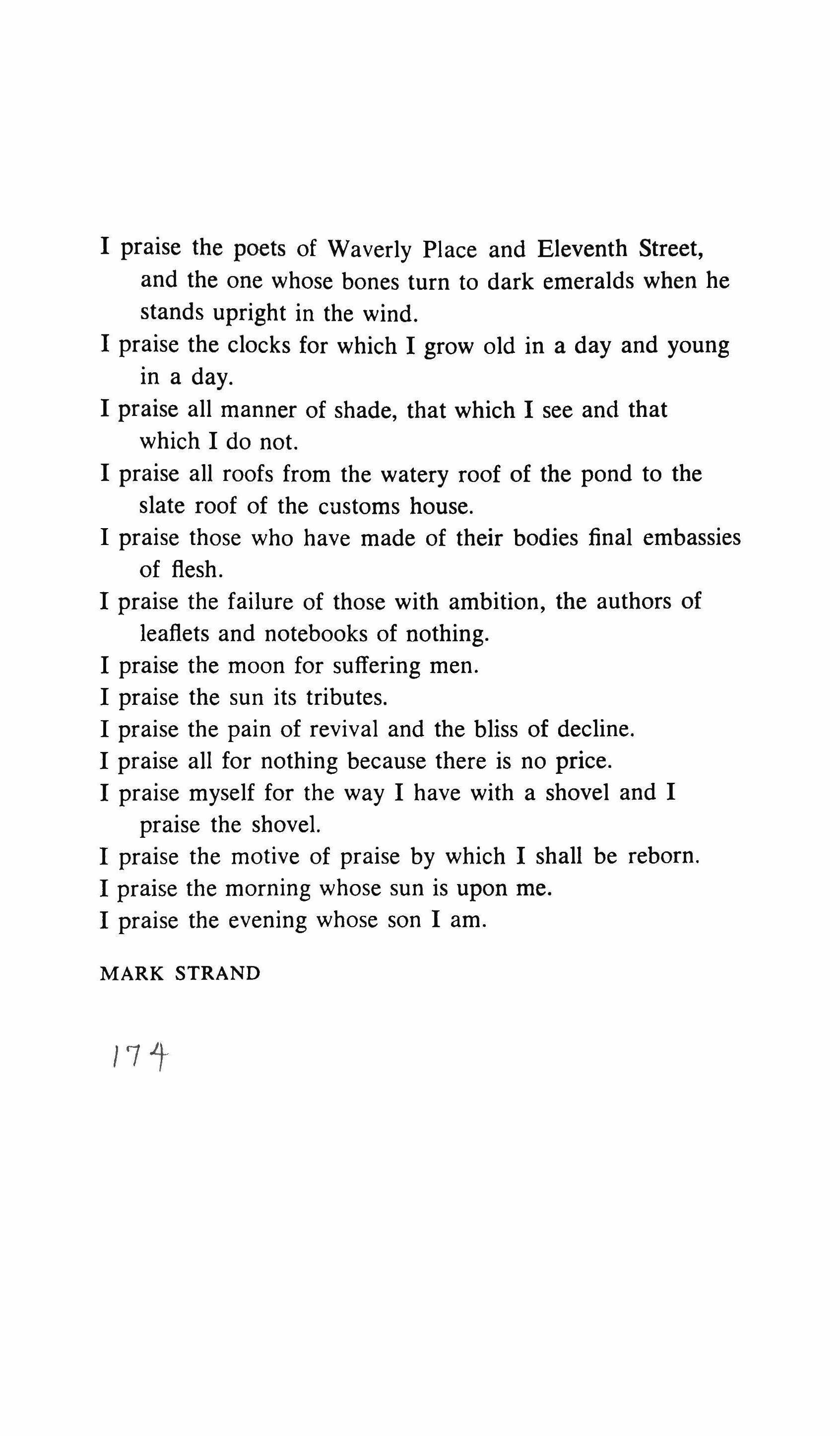
I praise the poets of Waverly Place and Eleventh Street, and the one whose bones turn to dark emeralds when he stands upright in the wind.
I praise the clocks for which I grow old in a day and young in a day.
I praise all manner of shade, that which I see and that which I do not.
I praise all roofs from the watery roof of the pond to the slate roof of the customs house.
I praise those who have made of their bodies final embassies of flesh.
I praise the failure of those with ambition, the authors of leaflets and notebooks of nothing.
I praise the moon for suffering men.
I praise the sun its tributes.
I praise the pain of revival and the bliss of decline.
I praise all for nothing because there is no price.
I praise myself for the way I have with a shovel and I praise the shovel.
I praise the motive of praise by which I shall be reborn.
I praise the morning whose sun is upon me.
I praise the evening whose son I am.
MARK STRAND translated by George L. Kline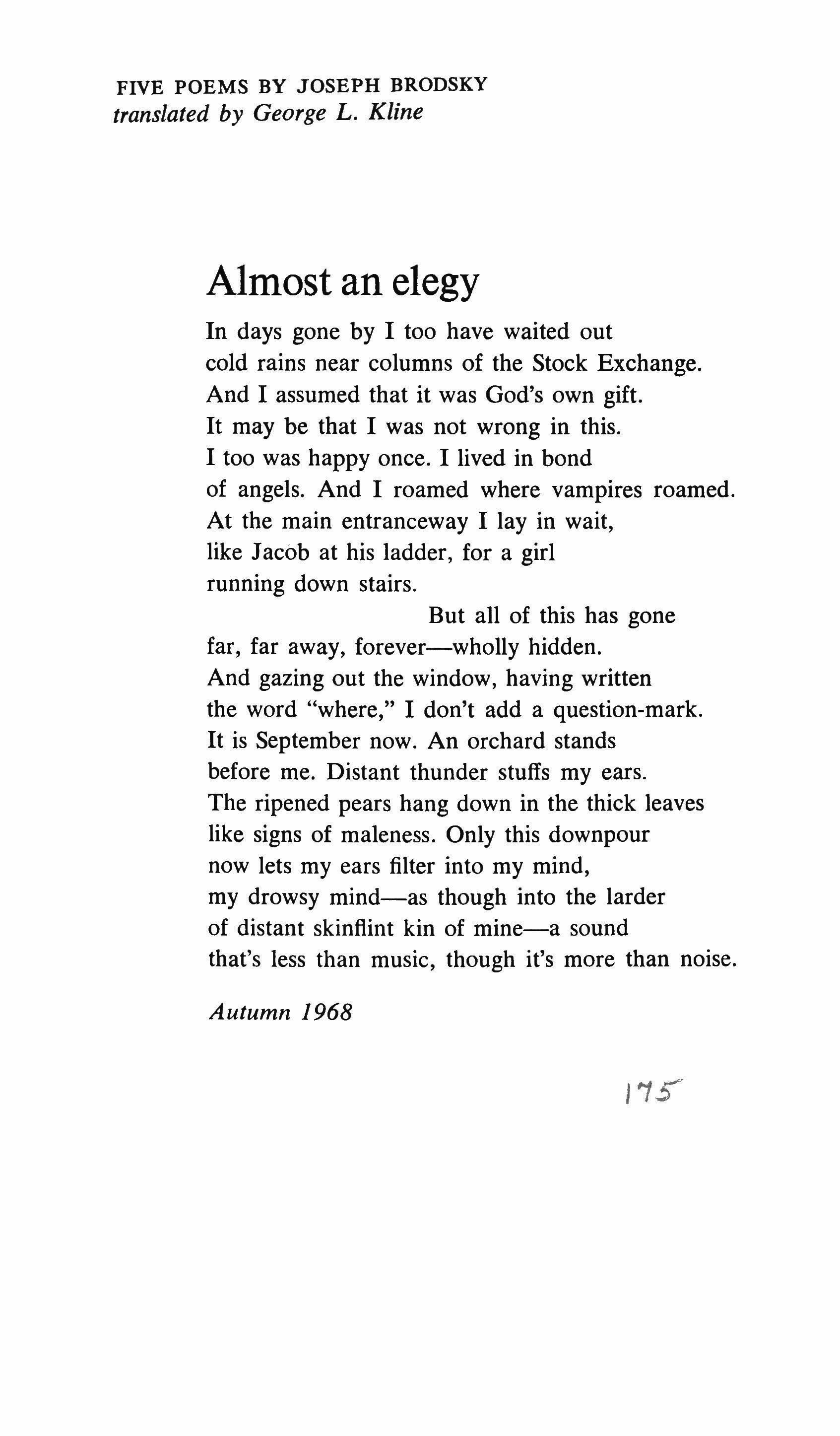
In days gone by I too have waited out cold rains near columns of the Stock Exchange. And I assumed that it was God's own gift. It may be that I was not wrong in this. I too was happy once. I lived in bond of angels. And I roamed where vampires roamed. At the main entranceway I lay in wait, like Jacob at his ladder, for a girl running down stairs.
But all of this has gone far, far away, forever-wholly hidden. And gazing out the window, having written the word "where," I don't add a question-mark. It is September now. An orchard stands before me. Distant thunder stuffs my ears. The ripened pears hang down in the thick leaves like signs of maleness. Only this downpour now lets my ears filter into my mind, my drowsy mind-as though into the larder of distant skinflint kin of mine-a sound that's less than music, though it's more than noise.
Autumn 1968
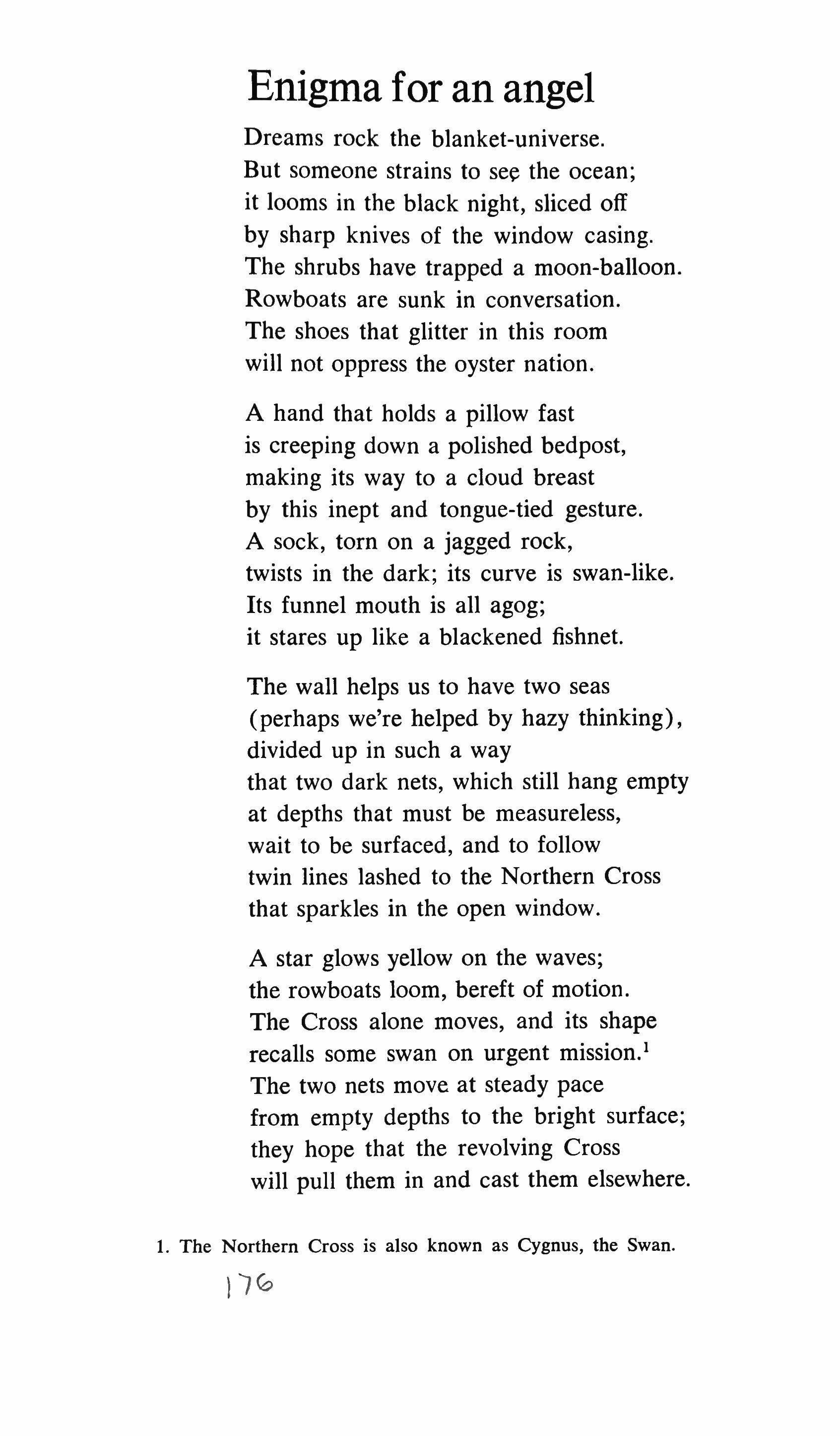
Dreams rock the blanket-universe. But someone strains to see the ocean; it looms in the black night, sliced off by sharp knives of the window casing. The shrubs have trapped a moon-balloon. Rowboats are sunk in conversation. The shoes that glitter in this room will not oppress the oyster nation.
A hand that holds a pillow fast is creeping down a polished bedpost, making its way to a cloud breast by this inept and tongue-tied gesture. A sock, torn on a jagged rock, twists in the dark; its curve is swan-like. Its funnel mouth is all agog; it stares up like a blackened fishnet.
The wall helps us to have two seas (perhaps we're helped by hazy thinking), divided up in such a way that two dark nets, which still hang empty at depths that must be measureless, wait to be surfaced, and to follow twin lines lashed to the Northern Cross that sparkles in the open window.
A star glows yellow on the waves; the rowboats loom, bereft of motion. The Cross alone moves, and its shape recalls some swan on urgent mission. 1 The two nets move at steady pace from empty depths to the bright surface; they hope that the revolving Cross will pull them in and cast them elsewhere.
1. The Northern Cross is also known as Cygnus, the Swan.
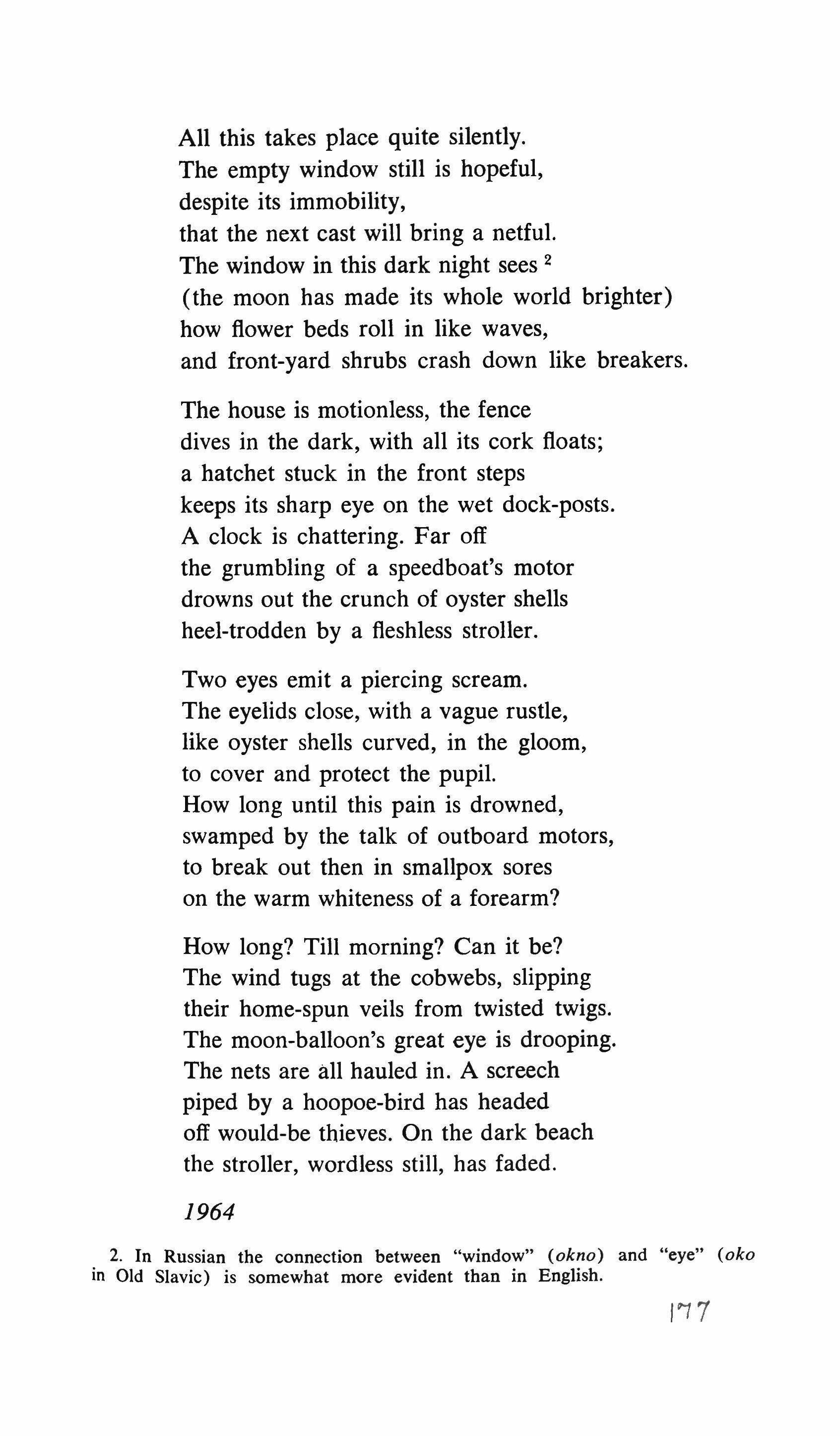
All this takes place quite silently. The empty window still is hopeful, despite its immobility, that the next cast will bring a netful. The window in this dark night sees 2 (the moon has made its whole world brighter) how flower beds roll in like waves, and front-yard shrubs crash down like breakers.
The house is motionless, the fence dives in the dark, with all its cork floats; a hatchet stuck in the front steps keeps its sharp eye on the wet dock-posts. A clock is chattering. Far off the grumbling of a speedboat's motor drowns out the crunch of oyster shells heel-trodden by a fleshless stroller.
Two eyes emit a piercing scream.
The eyelids close, with a vague rustle, like oyster shells curved, in the gloom, to cover and protect the pupil. How long until this pain is drowned, swamped by the talk of outboard motors, to break out then in smallpox sores on the warm whiteness of a forearm?
How long? Till morning? Can it be?
The wind tugs at the cobwebs, slipping their home-spun veils from twisted twigs. The moon-balloon's great eye is drooping. The nets are all hauled in. A screech piped by a hoopoe-bird has headed off would-be thieves. On the dark beach the stroller, wordless still, has faded.
1964
2. In Russian the connection between "window" (okno) and "eye" (oko in Old Slavic) is somewhat more evident than in English.
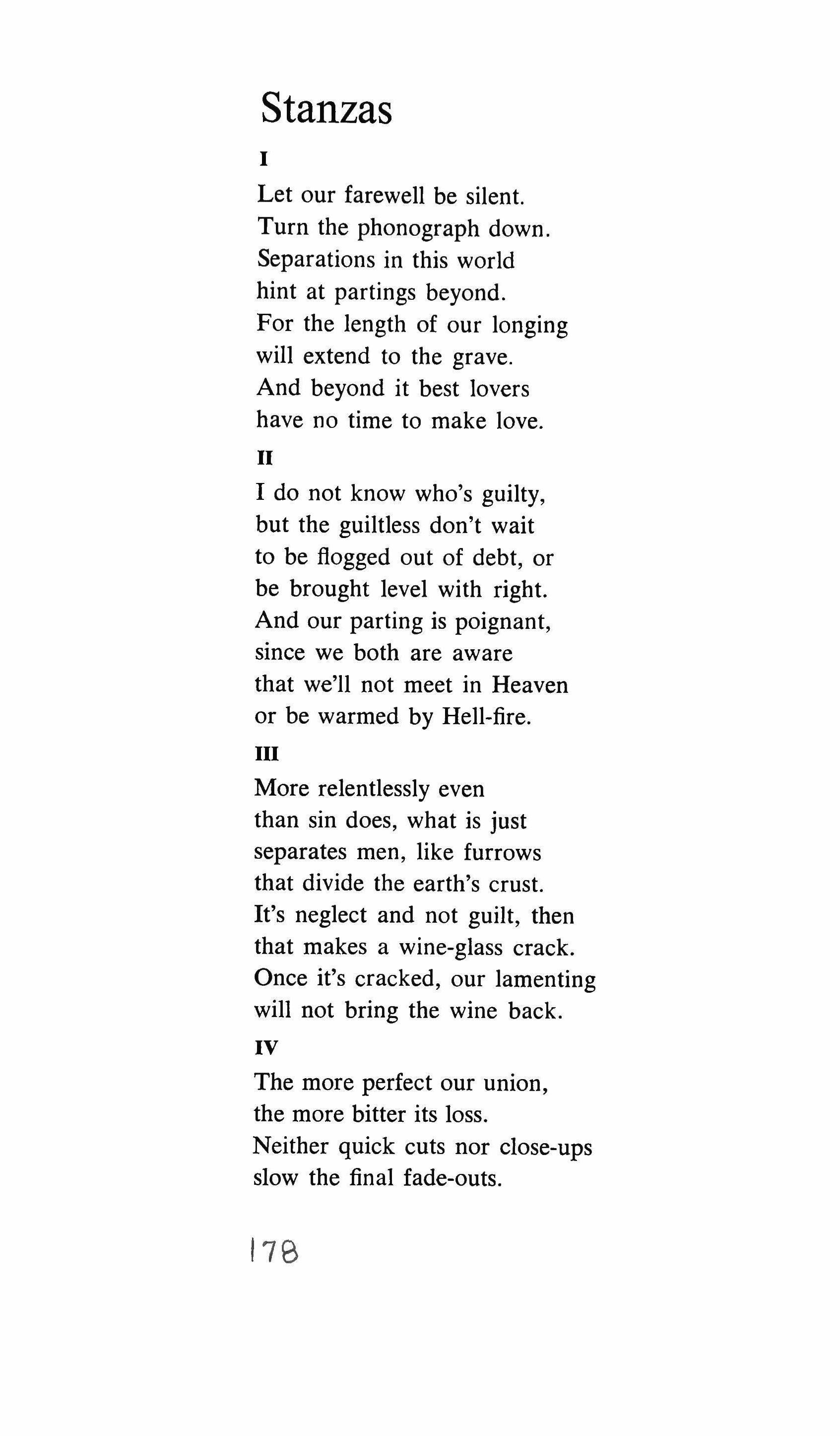
Let our farewell be silent. Turn the phonograph down. Separations in this world hint at partings beyond. For the length of our longing will extend to the grave. And beyond it best lovers have no time to make love.
I do not know who's guilty, but the guiltless don't wait to be flogged out of debt, or be brought level with right. And our parting is poignant, since we both are aware that we'll not meet in Heaven or be warmed by Hell-fire.
More relentlessly even than sin does, what is just separates men, like furrows that divide the earth's crust. It's neglect and not guilt, then that makes a wine-glass crack. Once it's cracked, our lamenting will not bring the wine back.
The more perfect our union, the more bitter its loss. Neither quick cuts nor close-ups slow the final fade-outs.
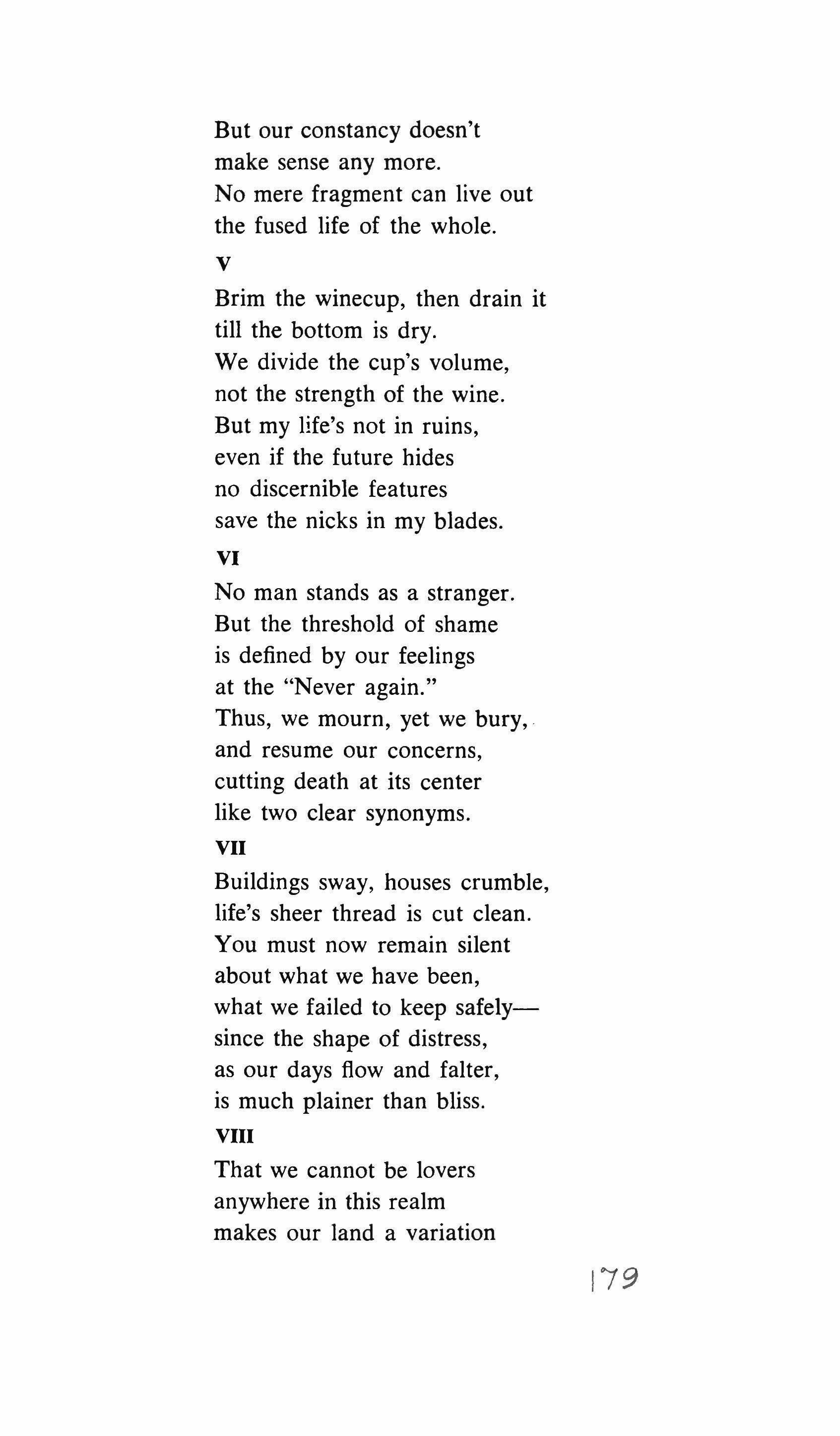
But our constancy doesn't make sense any more. No mere fragment can live out the fused life of the whole.
V
Brim the winecup, then drain it till the bottom is dry. We divide the cup's volume, not the strength of the wine. But my life's not in ruins, even if the future hides no discernible features save the nicks in my blades.
VI
No man stands as a stranger. But the threshold of shame is defined by our feelings at the "Never again." Thus, we mourn, yet we bury.. and resume our concerns, cutting death at its center like two clear synonyms.
VII
Buildings sway, houses crumble, life's sheer thread is cut clean. You must now remain silent about what we have been, what we failed to keep safelysince the shape of distress, as our days flow and falter, is much plainer than bliss.
VIII That we cannot be lovers anywhere in this realm makes our land a variation
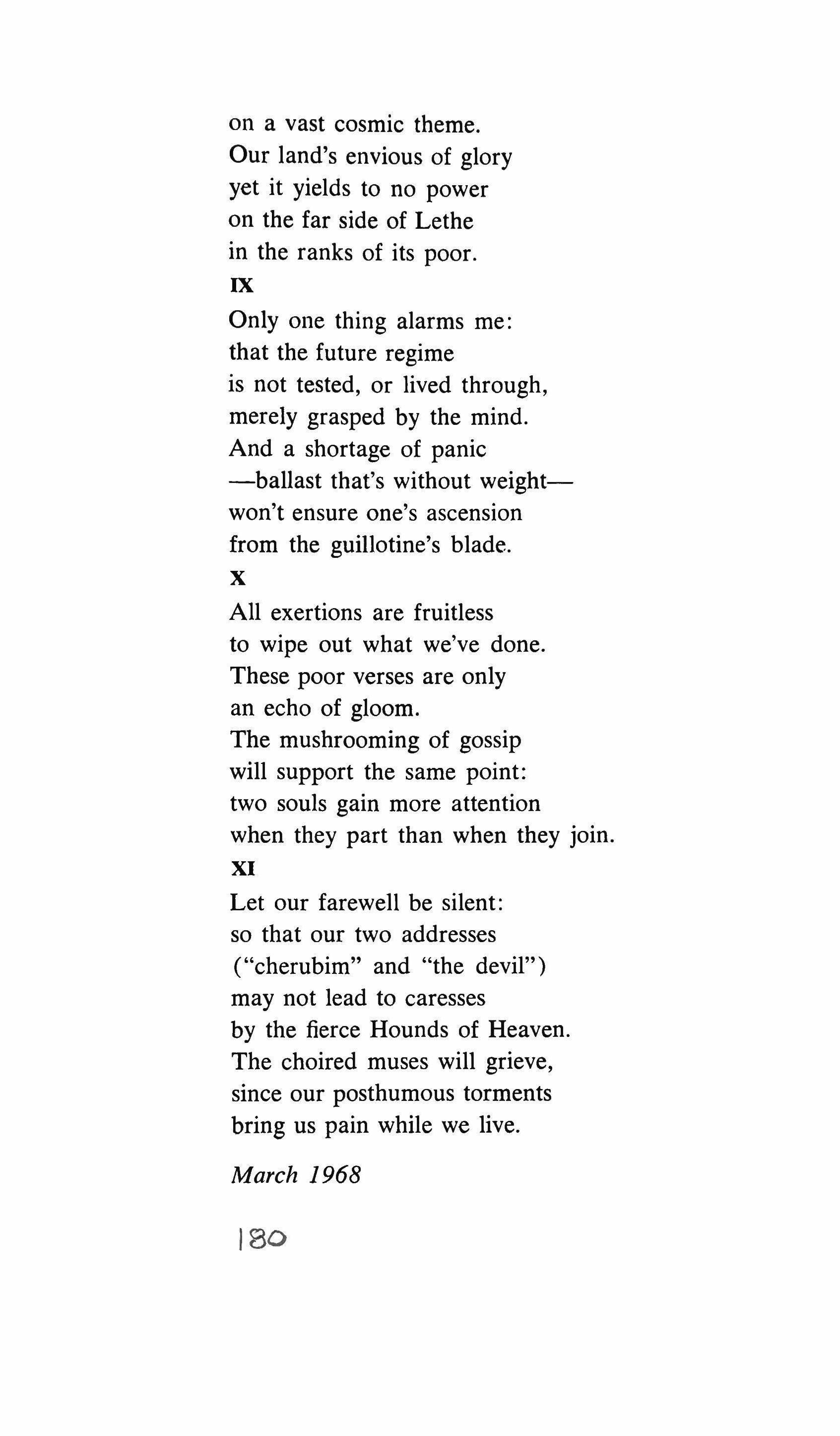
on a vast cosmic theme. Our land's envious of glory yet it yields to no power on the far side of Lethe in the ranks of its poor.
IX
Only one thing alarms me: that the future regime is not tested, or lived through, merely grasped by the mind. And a shortage of panic -ballast that's without weightwon't ensure one's ascension from the guillotine's blade.
X
All exertions are fruitless to wipe out what we've done. These poor verses are only an echo of gloom. The mushrooming of gossip will support the same point: two souls gain more attention when they part than when they join.
XI
Let our farewell be silent: so that our two addresses ("cherubim" and "the devil") may not lead to caresses by the fierce Hounds of Heaven. The choired muses will grieve, since our posthumous torments bring us pain while we live.
March 1968 180
You'll flutter, robin redbreast, from those three raspberry bushes, thus-in my unfreedomrecalling how the thick-napped lupine field at dusk invades the tranquil green-pea kingdom. The field moves through thick moustaches of weeping willow to that point where countless droplets of dew, their tiny hearts stunned by the shock, slide down among the green slopes of the pea-pods.
A spasm racks the raspberries, and yet a riddle lingers. It may just have happened: some hunter, as he laid his trap, had stepped incautiously, and set a dead branch crackling. In fact, only a thin ribbon of path twists through the darkness, ashen white and serious. Unheard here: babbling or a rifle shot. Unseen: Aquarius or Sagittarius.'
Night runs alone beneath inverted wings on trees of paradise that stand upside-downinsistent, like the memory of past things, and silent, but alive still as it had been.
May 24, 19642
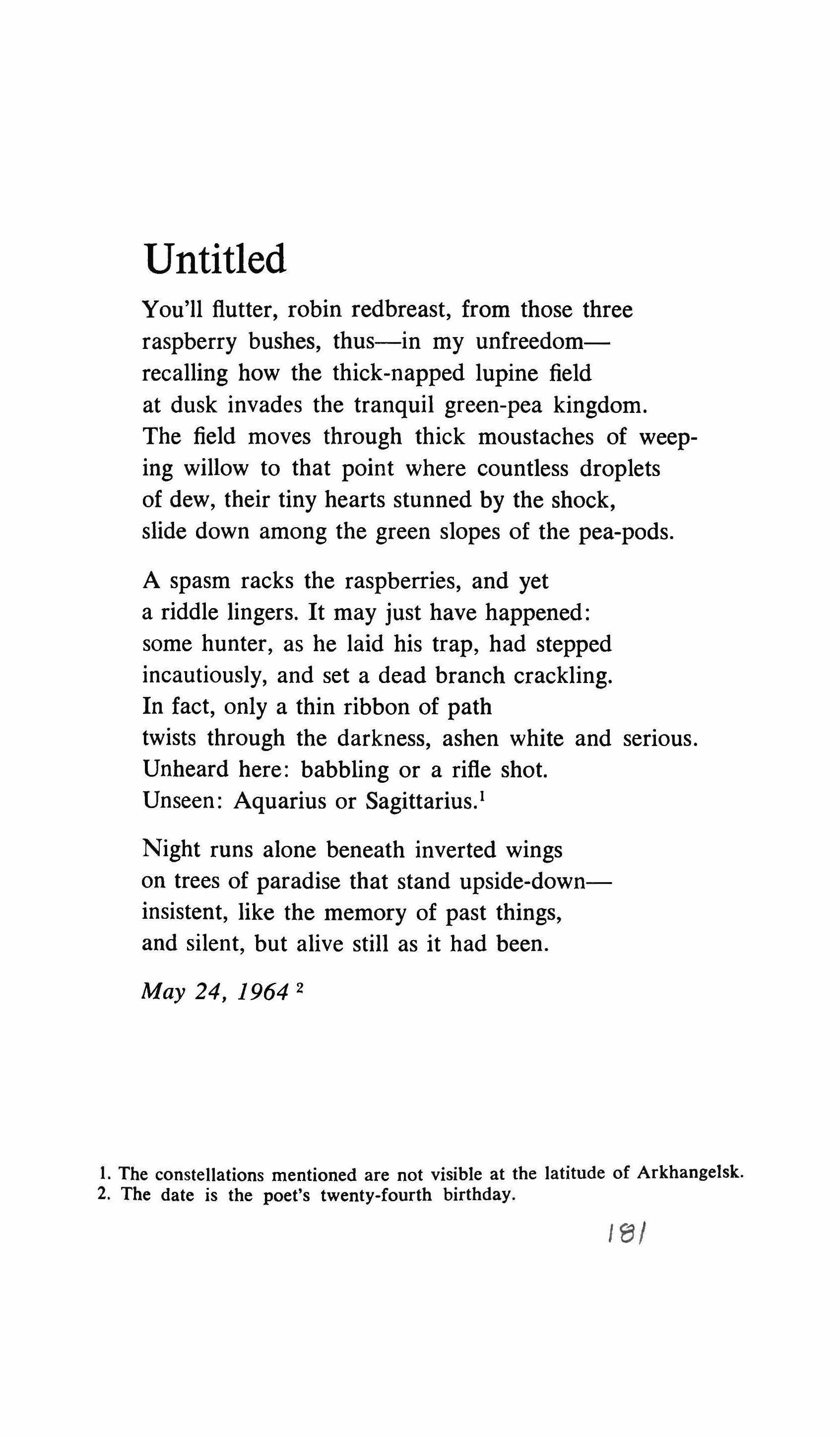
1. The constellations mentioned are not visible at the latitude of Arkhangelsk.
2. The date is the poet's twenty-fourth birthday. 16/
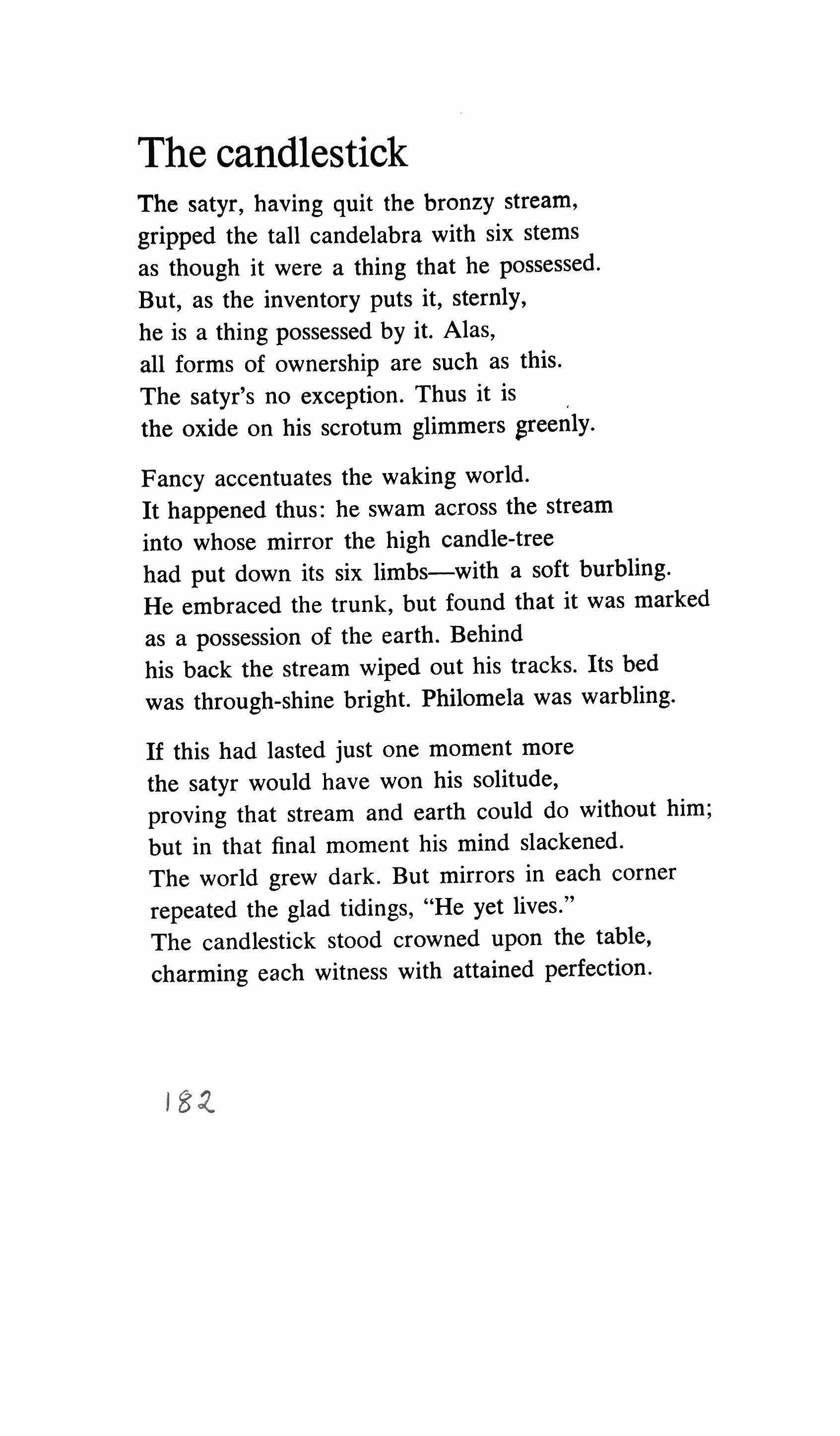
The satyr, having quit the bronzy stream, gripped the tall candelabra with six stems as though it were a thing that he possessed. But, as the inventory puts it, sternly, he is a thing possessed by it. Alas, all forms of ownership are such as this. The satyr's no exception. Thus it is the oxide on his scrotum glimmers greenly.
Fancy accentuates the waking world. It happened thus: he swam across the stream into whose mirror the high candle-tree had put down its six limbs-with a soft burbling. He embraced the trunk, but found that it was marked as a possession of the earth. Behind his back the stream wiped out his tracks. Its bed was through-shine bright. Philomela was warbling.
If this had lasted just one moment more the satyr would have won his solitude, proving that stream and earth could do without him; but in that final moment his mind slackened. The world grew dark. But mirrors in each corner repeated the glad tidings, "He yet lives." The candlestick stood crowned upon the table, charming each witness with attained perfection.
Not death, but a new setting, waits for us.
The satyr had nothing to fear from bronze-like photographs. Crossing his Rubicon, he became metal-locks to genitals.
It seems that what art strives for is to be precise and not to tell us lies, because its fundamental law undoubtedly asserts the independence of details.
So light the candles then! Stop chattering about illuminating someone's twilight. No one of us is sovereign over others, although to such ill-omened thoughts we cling. It's not for me, fair maiden, to embrace you, nor for you to reproach me, tearfully. Since candle-wax, my dear, lights up the world of things themselves, not the bare thoughts of things.
1968
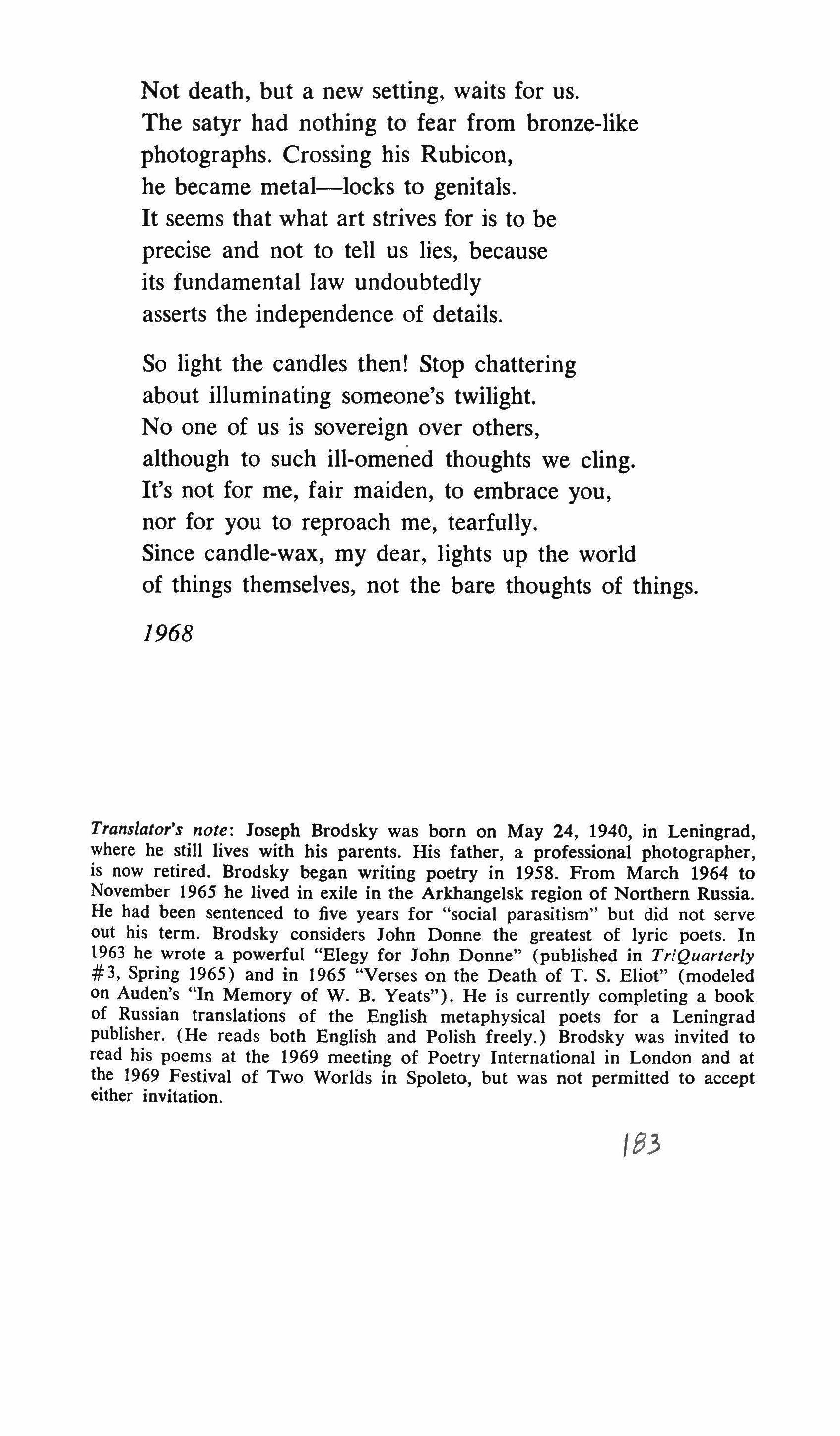
Translator's note: Joseph Brodsky was born on May 24, 1940, in Leningrad, where he still lives with his parents. His father, a professional photographer, is now retired. Brodsky began writing poetry in 1958. From March 1964 to November 1965 he lived in exile in the Arkhangelsk region of Northern Russia. He had been sentenced to five years for "social parasitism" but did not serve out his term. Brodsky considers John Donne the greatest of lyric poets. In 1963 he wrote a powerful "Elegy for John Donne" (published in TriQuarterly #3, Spring 1965) and in 1965 "Verses on the Death of T. S. Eliot" (modeled on Auden's "In Memory of W. B. Yeats"). He is currently completing a book of Russian translations of the English metaphysical poets for a Leningrad publisher. (He reads both English and Polish freely.) Brodsky was invited to read his poems at the 1969 meeting of Poetry International in London and at the 1969 Festival of Two Worlds in Spoleto, but was not permitted to accept either invitation.
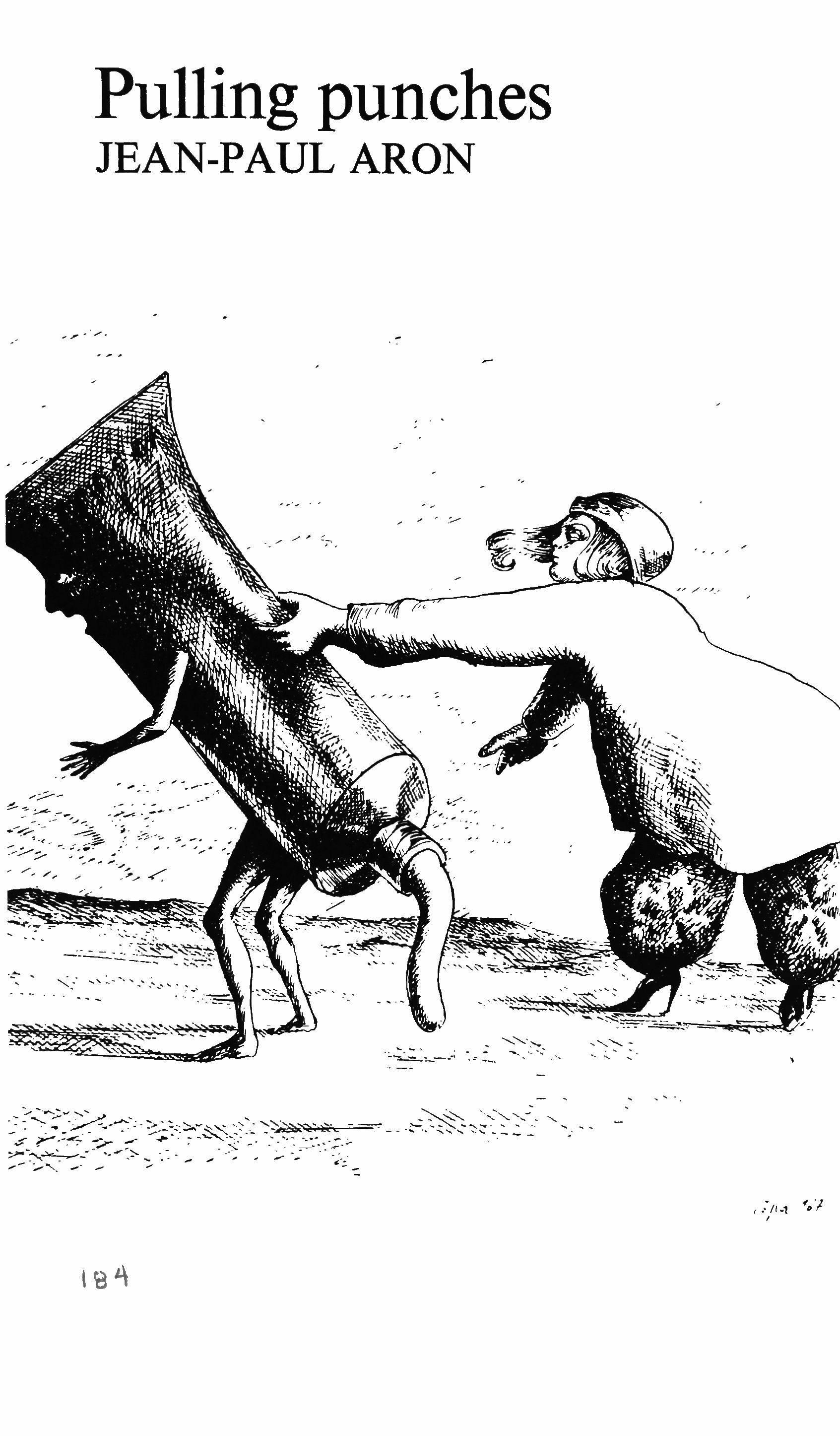
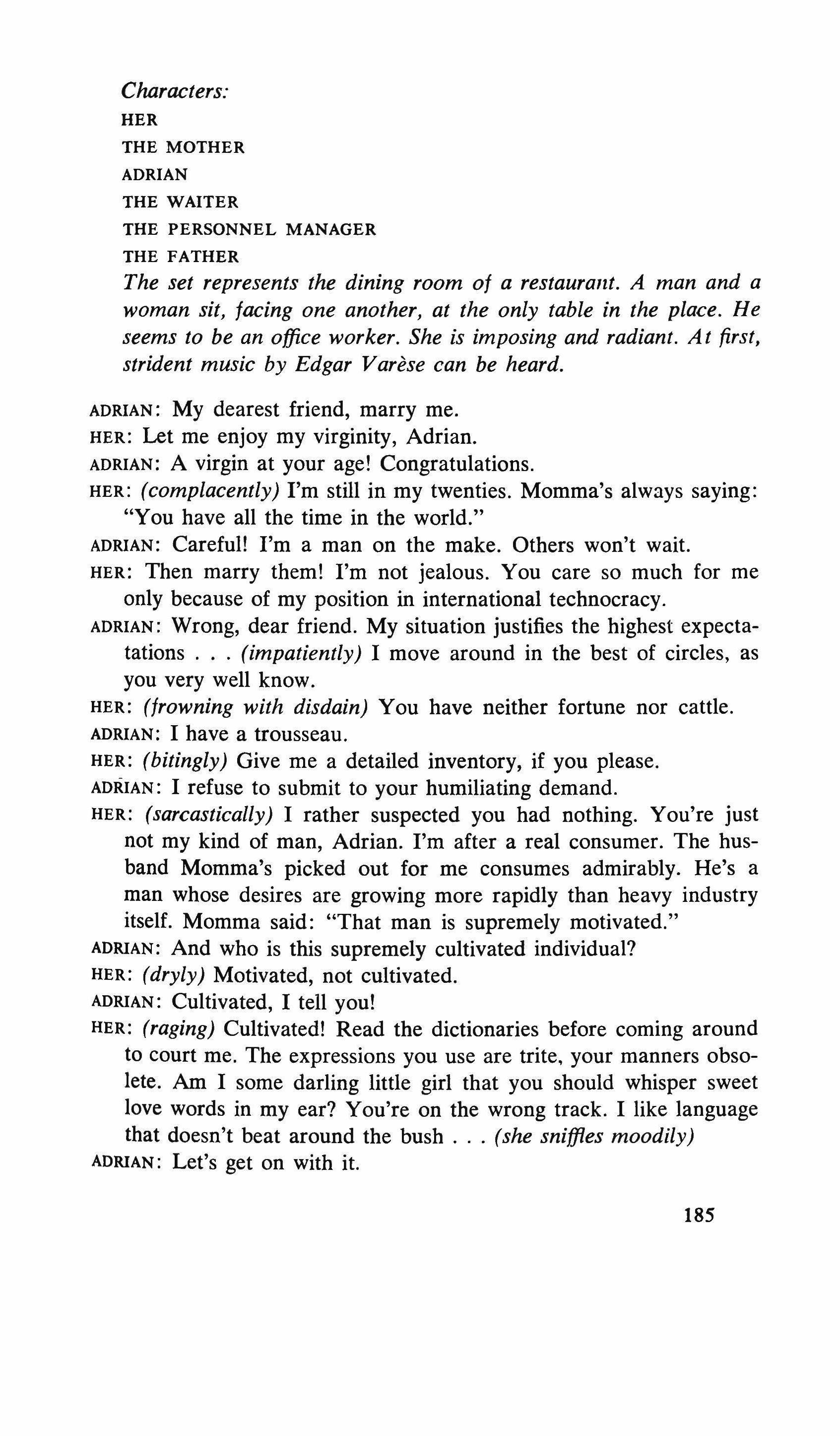
Characters: HER
THE MOTHER
ADRIAN
THE WAITER
THE PERSONNEL MANAGER
THE FATHER
The set represents the dining room of a restaurant. A man and a woman sit, facing one another, at the only table in the place. He seems to be an office worker. She is imposing and radiant. At first, strident music by Edgar Varese can be heard.
ADRIAN: My dearest friend, marry me.
HER: Let me enjoy my virginity, Adrian.
ADRIAN: A virgin at your age! Congratulations.
HER: (complacently) I'm still in my twenties. Momma's always saying: "You have all the time in the world."
ADRIAN: Careful! I'm a man on the make. Others won't wait.
HER: Then marry them! I'm not jealous. You care so much for me only because of my position in international technocracy.
ADRIAN: Wrong, dear friend. My situation justifies the highest expectatations (impatiently) I move around in the best of circles, as you very well know.
HER: (frowning with disdain) You have neither fortune nor cattle.
ADRIAN: I have a trousseau.
HER: (bitingly) Give me a detailed inventory, if you please.
ADRIAN: I refuse to submit to your humiliating demand.
HER: (sarcastically) I rather suspected you had nothing. You're just not my kind of man, Adrian. I'm after a real consumer. The husband Momma's picked out for me consumes admirably. He's a man whose desires are growing more rapidly than heavy industry itself. Momma said: "That man is supremely motivated."
ADRIAN: And who is this supremely cultivated individual?
HER: (dryly) Motivated, not cultivated.
ADRIAN: Cultivated, I tell you!
HER: (raging) Cultivated! Read the dictionaries before coming around to court me. The expressions you use are trite. your manners obsolete. Am I some darling little girl that you should whisper sweet love words in my ear? You're on the wrong track. I like language that doesn't beat around the bush (she sniffles moodily)
ADRIAN: Let's get on with it.

HER: Get on with what? Everything's been said. You won't be my husband. I'll marry the consumer. This thought gives me a will of iron.
ADRIAN: (interrupting Her) And I say you're dreaming. What consumer would have anything to do with you? You're not exactly what anyone would call a pretty woman, dear friend. Consumers are hard to please in that case. Though I too have high hopes, I'll settle for you because you bring me advantages that compensate, and particularly the part your mother plays in the birth control movements.
HER : You invited me out to dinner. Offer me a drink, Adrian.
ADRIAN: Waiter!
THE WAITER: Sir.
ADRIAN: Bring the young lady a large glass of water.
HER: (nervously) You assured me there would be drinks.
ADRIAN: It seems to me, dear friend, that by ordering a large glass of water, I've fully complied with your desire for refreshments.
HER: (pleading) All the debutantes drink glass after glass of alcohol to galvanize themselves before making love. You're not going to deprive me of alcohol, Adrian.
ADRIAN: Who said anything about love? (as if talking to himself) Vile slut. Spendthrift.
THE WAITER: What will you have, madame?
HER: A glass of full red Burgundy.
THE WAITER: And you, sir?
ADRIAN: I don't understand the meaning of your question.
THE WAITER: I asked you, sir, what you wish to drink.
ADRIAN: (furious) Do you take me for a drunk?
THE WAITER: You misunderstand me, sir.
ADRIAN: You shouldn't have asked me those inopportune questions. You shouldn't have driven me to such extremes. Leave us alone now.
The waiter hurries off.
HER: Let's get on with it. I've heard it said that you're exceedingly prudish. That's not very exciting for a young woman.
ADRIAN: That's slanderous.
HER : Yet Momma interrogated the women in your neighborhood. They are categorical. You're a pure cerebral type.
ADRIAN: I've had many experiences. Now, it's time to get down to serious business.
HER: For you maybe! For me the time for fun is only just beginning. There are going to be some real fireworks.
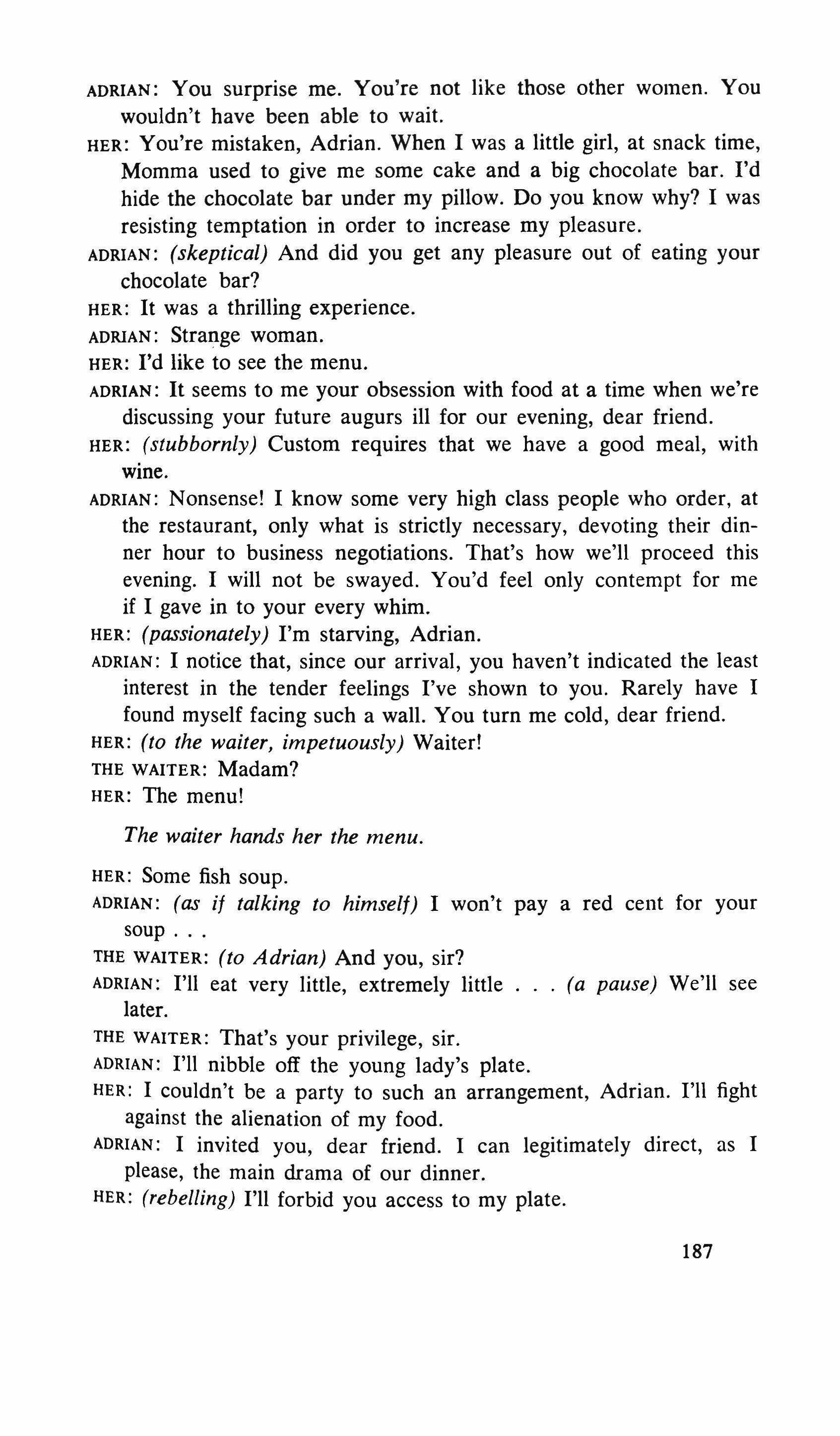
ADRIAN : You surpnse me. You're not like those other women. You wouldn't have been able to wait.
HER : You're mistaken, Adrian. When I was a little girl, at snack time, Momma used to give me some cake and a big chocolate bar. I'd hide the chocolate bar under my pillow. Do you know why? I was resisting temptation in order to increase my pleasure.
ADRIAN: (skeptical) And did you get any pleasure out of eating your chocolate bar?
HER: It was a thrilling experience.
ADRIAN: Strange woman.
HER: I'd like to see the menu.
ADRIAN: It seems to me your obsession with food at a time when we're discussing your future augurs ill for our evening, dear friend.
HER: (stubbornly) Custom requires that we have a good meal, with wine.
ADRIAN: Nonsense! I know some very high class people who order, at the restaurant, only what is strictly necessary, devoting their dinner hour to business negotiations. That's how we'll proceed this evening. I will not be swayed. You'd feel only contempt for me if I gave in to your every whim.
HER: (passionately) I'm starving, Adrian.
ADRIAN: I notice that, since our arrival, you haven't indicated the least interest in the tender feelings I've shown to you. Rarely have I found myself facing such a wall. You turn me cold, dear friend.
HER: (to the waiter, impetuously) Waiter!
THE WAITER: Madam?
HER: The menu!
The waiter hands her the menu.
HER: Some fish soup.
ADRIAN: (as if talking to himself) I won't pay a red cent for your soup
THE WAITER: (to Adrian) And you, sir?
ADRIAN: I'll eat very little, extremely little (a pause) We'll see later.
THE WAITER: That's your privilege, sir.
ADRIAN: I'll nibble off the young lady's plate.
HER: I couldn't be a party to such an arrangement, Adrian. I'll fight against the alienation of my food.
ADRIAN: I invited you, dear friend. I can legitimately direct, as I please, the main drama of our dinner.
HER: (rebelling) I'll forbid you access to my plate.
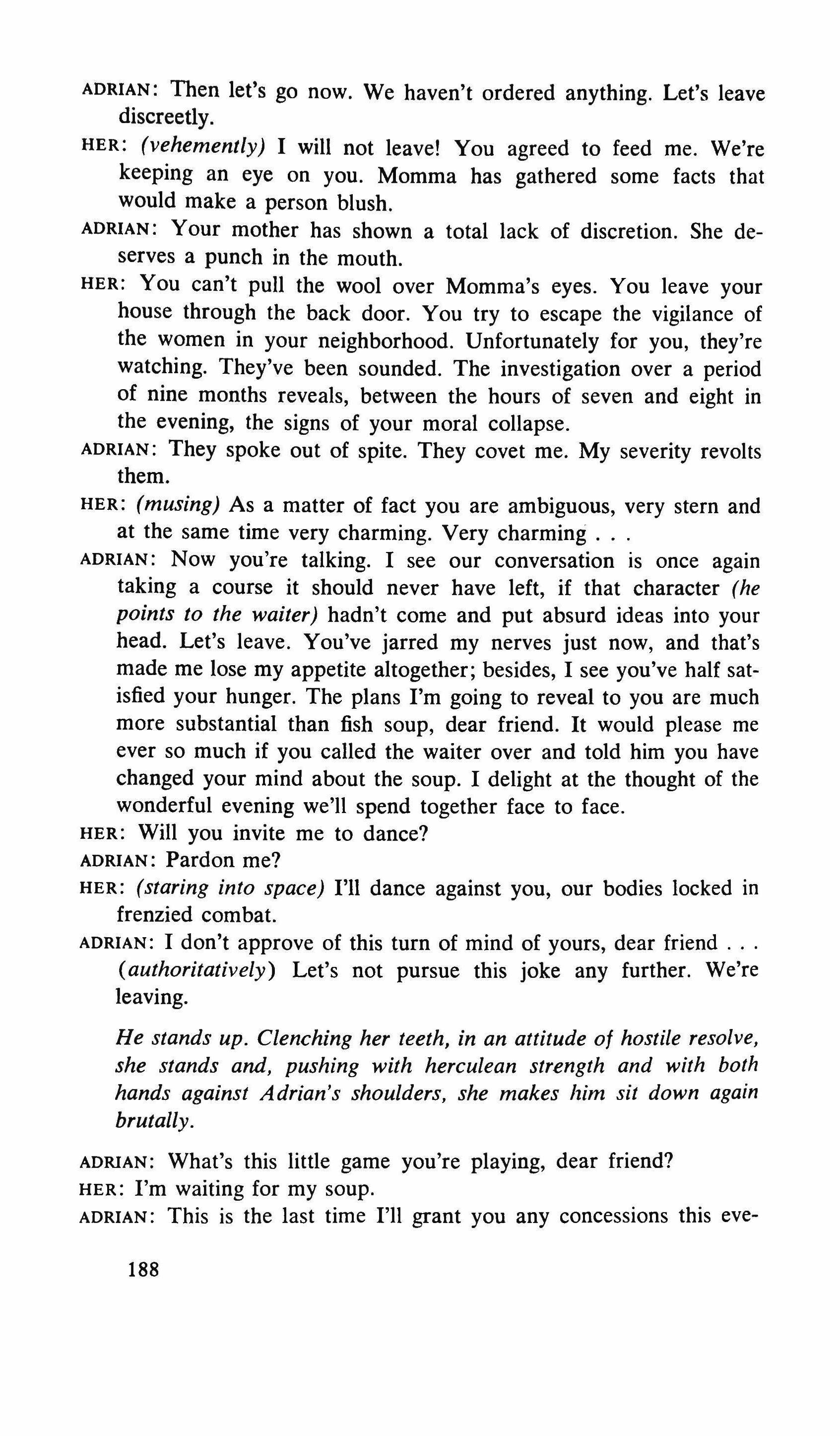
ADRIAN: Then let's go now. We haven't ordered anything. Let's leave discreetly.
HER: (vehemently) I will not leave! You agreed to feed me. We're keeping an eye on you. Momma has gathered some facts that would make a person blush.
ADRIAN: Your mother has shown a total lack of discretion. She deserves a punch in the mouth.
HER: You can't pull the wool over Momma's eyes. You leave your house through the back door. You try to escape the vigilance of the women in your neighborhood. Unfortunately for you, they're watching. They've been sounded. The investigation over a period of nine months reveals, between the hours of seven and eight in the evening, the signs of your moral collapse.
ADRIAN: They spoke out of spite. They covet me. My severity revolts them.
HER: (musing) As a matter of fact you are ambiguous, very stern and at the same time very charming. Very charming
ADRIAN: Now you're talking. I see our conversation is once again taking a course it should never have left, if that character (he points to the waiter) hadn't come and put absurd ideas into your head. Let's leave. You've jarred my nerves just now, and that's made me lose my appetite altogether; besides, I see you've half satisfied your hunger. The plans I'm going to reveal to you are much more substantial than fish soup, dear friend. It would please me ever so much if you called the waiter over and told him you have changed your mind about the soup. I delight at the thought of the wonderful evening we'll spend together face to face.
HER: Will you invite me to dance?
ADRIAN: Pardon me?
HER: (staring into space) I'll dance against you, our bodies locked in frenzied combat.
ADRIAN: I don't approve of this turn of mind of yours, dear friend (authoritatively) Let's not pursue this joke any further. We're leaving.
He stands up. Clenching her teeth, in an attitude of hostile resolve, she stands and, pushing with herculean strength and with both hands against Adrian's shoulders, she makes him sit down again brutally.
ADRIAN: What's this little game you're playing, dear friend?
HER: I'm waiting for my soup.
ADRIAN: This is the last time I'll grant you any concessions this eve-
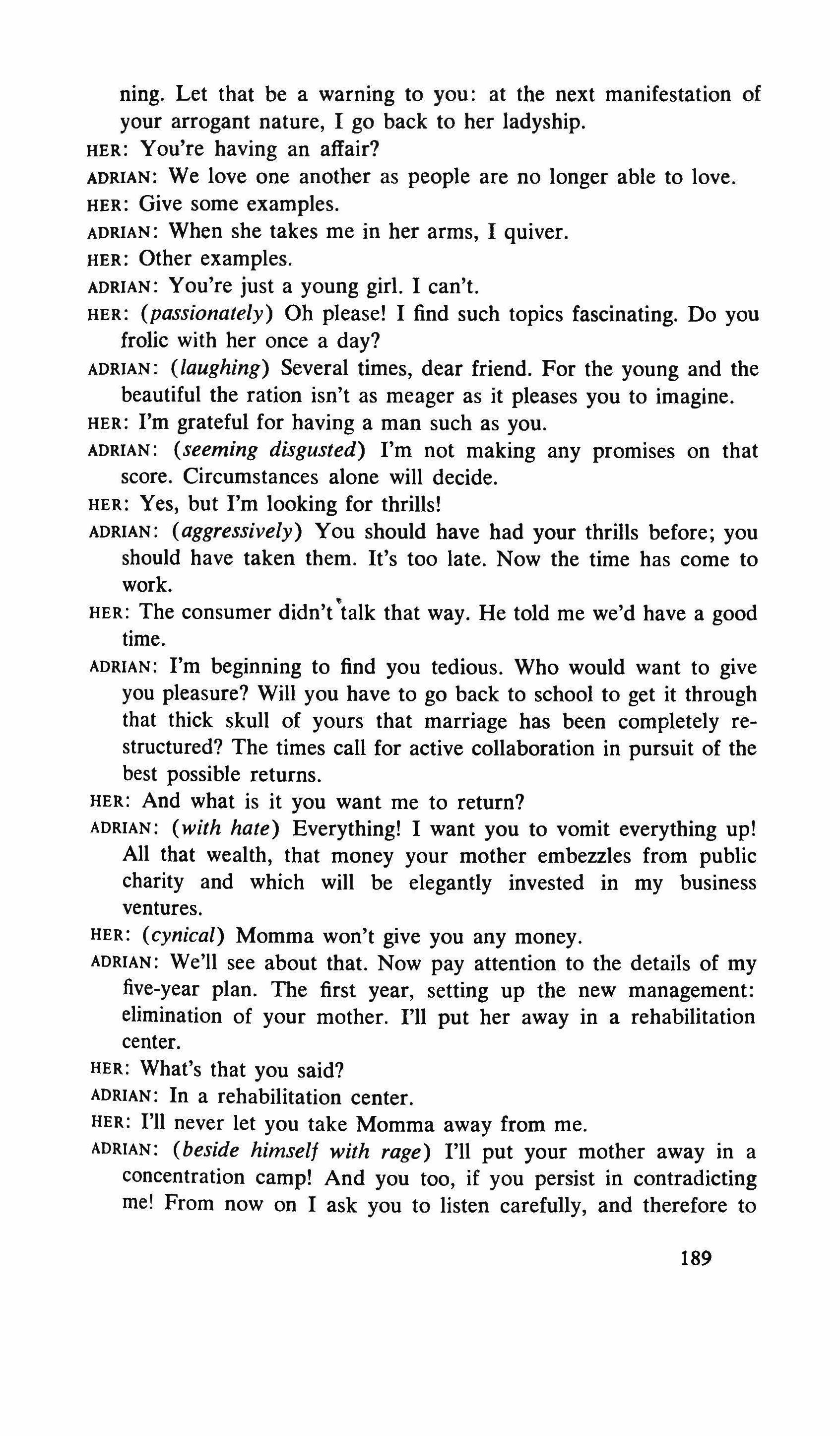
ning. Let that be a warning to you: at the next manifestation of your arrogant nature, I go back to her ladyship.
HER: You're having an affair?
ADRIAN: We love one another as people are no longer able to love.
HER: Give some examples.
ADRIAN: When she takes me in her arms, I quiver.
HER: Other examples.
ADRIAN: You're just a young girl. I can't.
HER: (passionately) Oh please! I find such topics fascinating. Do you frolic with her once a day?
ADRIAN: (laughing) Several times, dear friend. For the young and the beautiful the ration isn't as meager as it pleases you to imagine.
HER: I'm grateful for having a man such as you.
ADRIAN: (seeming disgusted) I'm not making any promises on that score. Circumstances alone will decide.
HER: Yes, but I'm looking for thrills!
ADRIAN: (aggressively) You should have had your thrills before; you should have taken them. It's too late. Now the time has come to work.
�
HER: The consumer didn't talk that way. He told me we'd have a good time.
ADRIAN: I'm beginning to find you tedious. Who would want to give you pleasure? Will you have to go back to school to get it through that thick skull of yours that marriage has been completely restructured? The times call for active collaboration in pursuit of the best possible returns.
HER: And what is it you want me to return?
ADRIAN: (with hate) Everything! I want you to vomit everything up! All that wealth, that money your mother embezzles from public charity and which will be elegantly invested in my business ventures.
HER: (cynical) Momma won't give you any money.
ADRIAN: We'll see about that. Now pay attention to the details of my five-year plan. The first year, setting up the new management: elimination of your mother. I'll put her away in a rehabilitation center.
HER: What's that you said?
ADRIAN: In a rehabilitation center.
HER: I'll never let you take Momma away from me.
ADRIAN: (beside himself with rage) I'll put your mother away in a concentration camp! And you too, if you persist in contradicting me! From now on I ask you to listen carefully, and therefore to
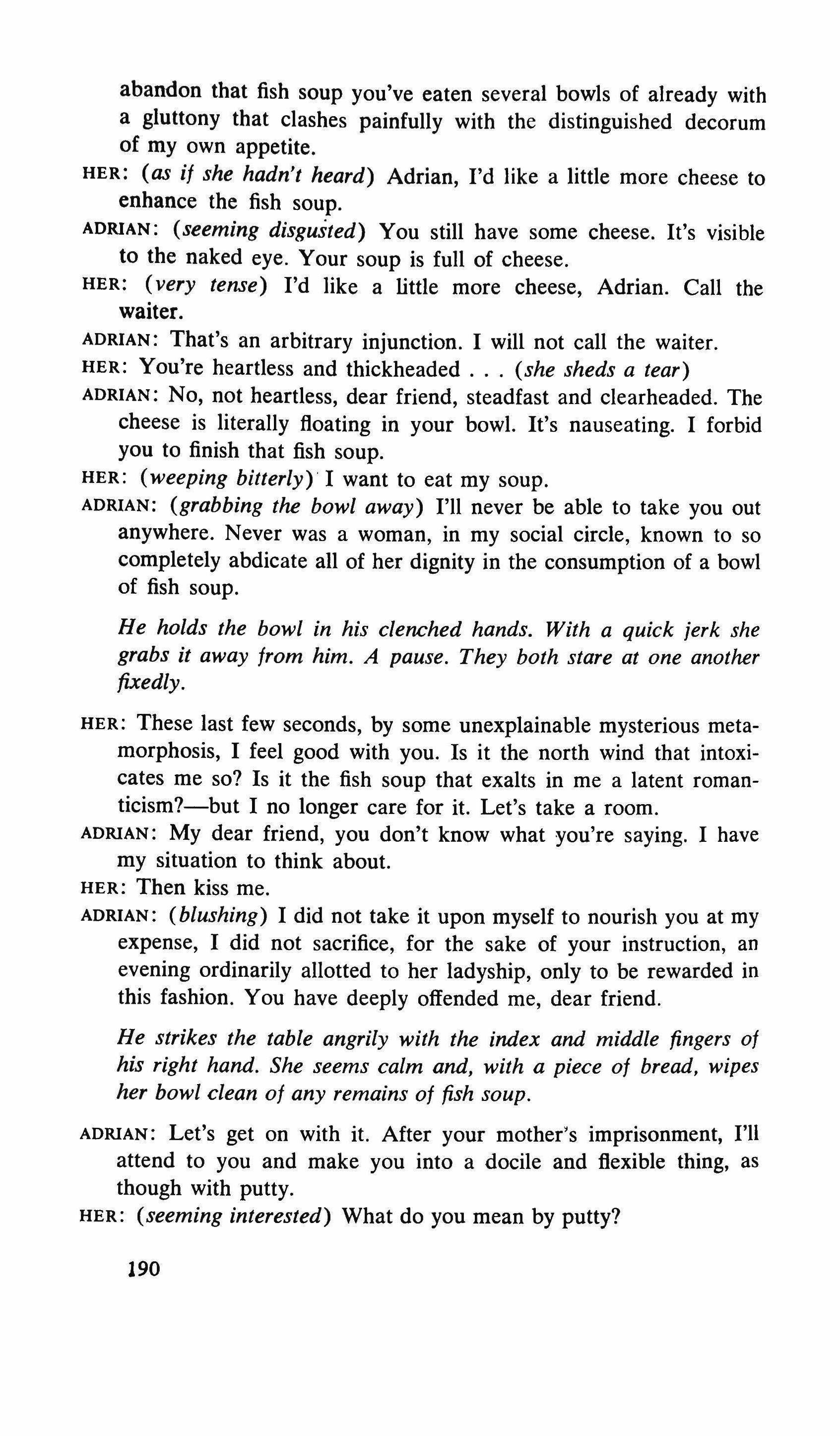
abandon that fish soup you've eaten several bowls of already with a gluttony that clashes painfully with the distinguished decorum of my own appetite.
HER: (as if she hadn't heard) Adrian, I'd like a little more cheese to enhance the fish soup.
ADRIAN: (seeming disgusted) You still have some cheese. It's visible to the naked eye. Your soup is full of cheese.
HER: (very tense) I'd like a little more cheese, Adrian. Call the waiter.
ADRIAN: That's an arbitrary injunction. I will not call the waiter.
HER: You're heartless and thickheaded (she sheds a tear)
ADRIAN: No, not heartless, dear friend, steadfast and clearheaded. The cheese is literally floating in your bowl. It's nauseating. I forbid you to finish that fish soup.
HER: (weeping bitterly) I want to eat my soup.
ADRIAN: (grabbing the bowl away) I'll never be able to take you out anywhere. Never was a woman, in my social circle, known to so completely abdicate all of her dignity in the consumption of a bowl of fish soup.
He holds the bowl in his clenched hands. With a quick jerk she grabs it away from him. A pause. They both stare at one another fixedly.
HER: These last few seconds, by some unexplainable mysterious metamorphosis, I feel good with you. Is it the north wind that intoxicates me so? Is it the fish soup that exalts in me a latent romanticism?-but I no longer care for it. Let's take a room.
ADRIAN: My dear friend, you don't know what you're saying. I have my situation to think about.
HER: Then kiss me.
ADRIAN: (blushing) I did not take it upon myself to nourish you at my expense, I did not sacrifice, for the sake of your instruction, an evening ordinarily allotted to her ladyship, only to be rewarded in this fashion. You have deeply offended me, dear friend.
He strikes the table angrily with the index and middle fingers of his right hand. She seems calm and, with a piece of bread, wipes her bowl clean of any remains of jish soup.
ADRIAN: Let's get on with it. After your mother's imprisonment, I'll attend to you and make you into a docile and flexible thing, as though with putty.
HER: (seeming interested) What do you mean by putty?
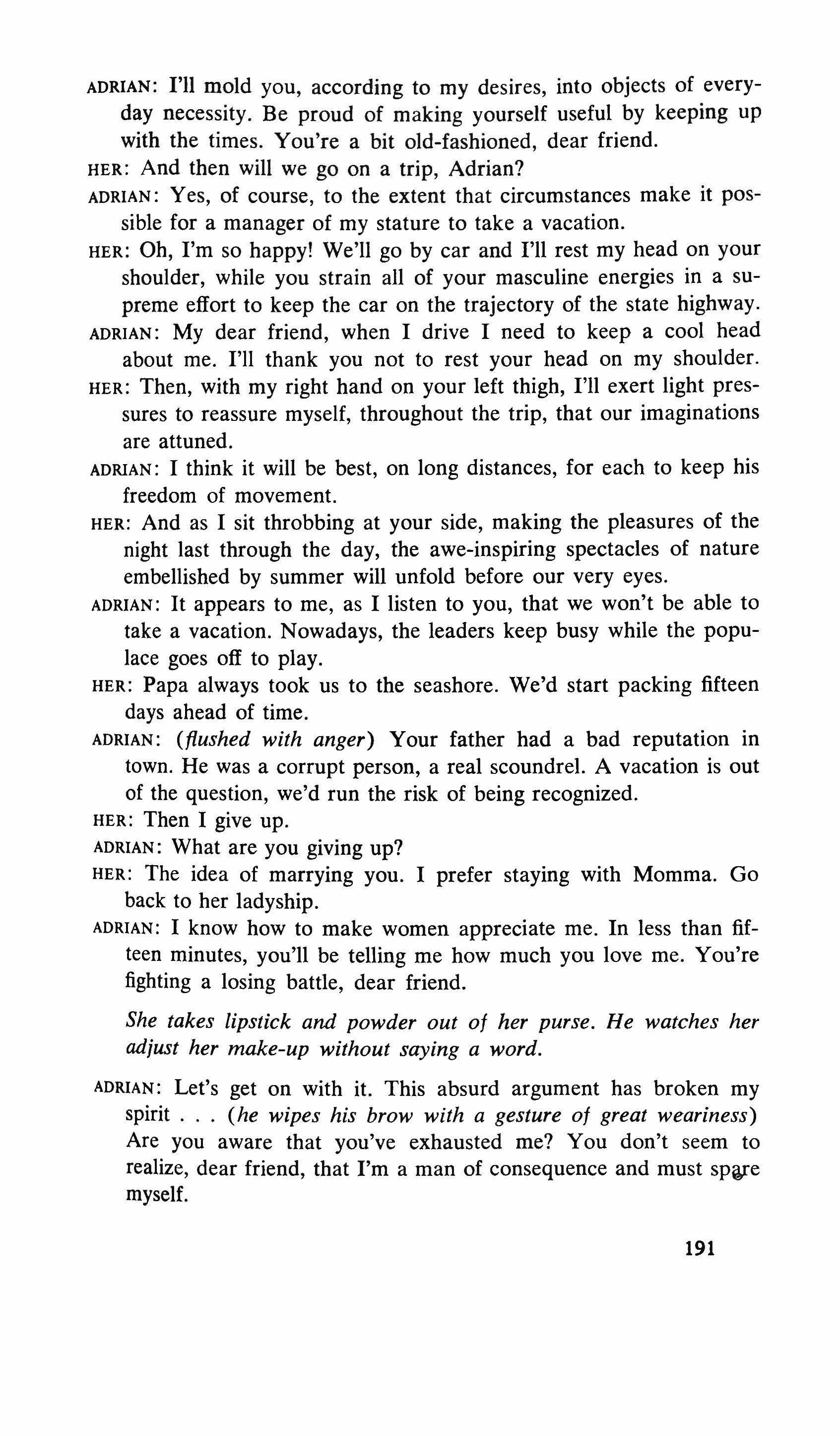
ADRIAN: I'll mold you, according to my desires, into objects of everyday necessity. Be proud of making yourself useful by keeping up with the times. You're a bit old-fashioned, dear friend.
HER: And then will we go on a trip, Adrian?
ADRIAN: Yes, of course, to the extent that circumstances make it possible for a manager of my stature to take a vacation.
HER: Oh, I'm so happy! We'll go by car and I'll rest my head on your shoulder, while you strain all of your masculine energies in a supreme effort to keep the car on the trajectory of the state highway.
ADRIAN: My dear friend, when I drive I need to keep a cool head about me. I'll thank you not to rest your head on my shoulder.
HER: Then, with my right hand on your left thigh, I'll exert light pressures to reassure myself, throughout the trip, that our imaginations are attuned.
ADRIAN: I think it will be best, on long distances, for each to keep his freedom of movement.
HER: And as I sit throbbing at your side, making the pleasures of the night last through the day, the awe-inspiring spectacles of nature embellished by summer will unfold before our very eyes.
ADRIAN: It appears to me, as I listen to you, that we won't be able to take a vacation. Nowadays, the leaders keep busy while the populace goes off to play.
HER: Papa always took us to the seashore. We'd start packing fifteen days ahead of time.
ADRIAN: (flushed with anger) Your father had a bad reputation in town. He was a corrupt person, a real scoundrel. A vacation is out of the question, we'd run the risk of being recognized.
HER: Then I give up.
ADRIAN: What are you giving up?
HER: The idea of marrying you. I prefer staying with Momma. Go back to her ladyship.
ADRIAN: I know how to make women appreciate me. In less than fifteen minutes, you'll be telling me how much you love me. You're fighting a losing battle, dear friend.
She takes lipstick and powder out of her purse. He watches her adjust her make-up without saying a word.
ADRIAN: Let's get on with it. This absurd argument has broken my spirit (he wipes his brow with a gesture of great weariness) Are you aware that you've exhausted me? You don't seem to realize, dear friend, that I'm a man of consequence and must spgre myself.
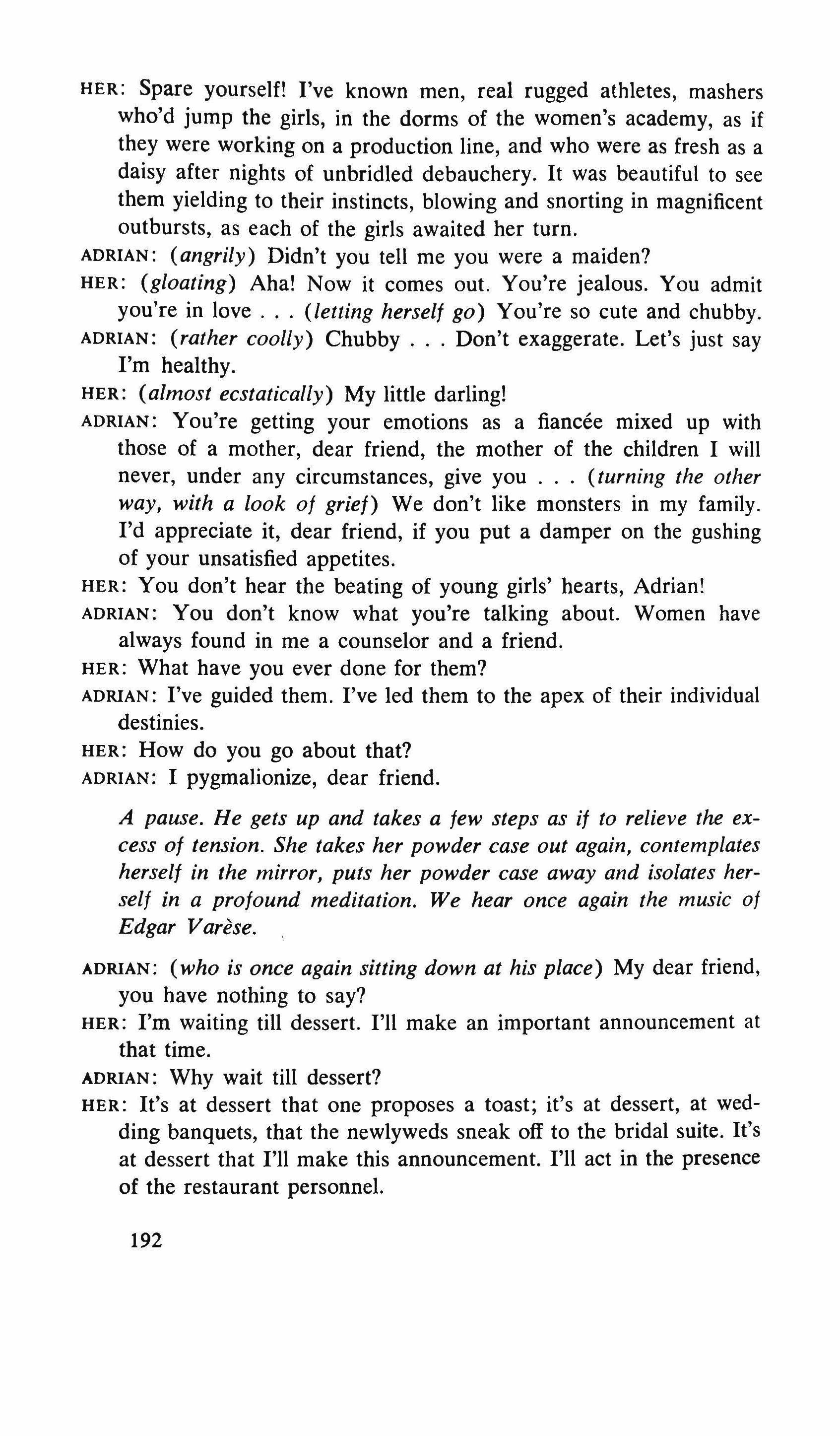
HER: Spare yourself! I've known men, real rugged athletes, mashers who'd jump the girls, in the dorms of the women's academy, as if they were working on a production line, and who were as fresh as a daisy after nights of unbridled debauchery. It was beautiful to see them yielding to their instincts, blowing and snorting in magnificent outbursts, as each of the girls awaited her turn.
ADRIAN: (angrily) Didn't you tell me you were a maiden?
HER: (gloating) Aha! Now it comes out. You're jealous. You admit you're in love (letting herself go) You're so cute and chubby.
ADRIAN: (rather coolly) Chubby Don't exaggerate. Let's just say I'm healthy.
HER: (almost ecstatically) My little darling!
ADRIAN: You're getting your emotions as a fiancee mixed up with those of a mother, dear friend, the mother of the children I will never, under any circumstances, give you (turning the other way, with a look of grief) We don't like monsters in my family. I'd appreciate it, dear friend, if you put a damper on the gushing of your unsatisfied appetites.
HER: You don't hear the beating of young girls' hearts, Adrian!
ADRIAN: You don't know what you're talking about. Women have always found in me a counselor and a friend.
HER: What have you ever done for them?
ADRIAN: I've guided them. I've led them to the apex of their individual destinies.
HER: How do you go about that?
ADRIAN: I pygmalionize, dear friend.
A pause. He gets up and takes a few steps as if to relieve the excess of tension. She takes her powder case out again, contemplates herself in the mirror, puts her powder case away and isolates herself in a profound meditation. We hear once again the music of Edgar Varese.
ADRIAN: (who is once again sitting down at his place) My dear friend, you have nothing to say?
HER: I'm waiting till dessert. I'll make an important announcement at that time.
ADRIAN: Why wait till dessert?
HER: It's at dessert that one proposes a toast; it's at dessert, at wedding banquets, that the newlyweds sneak off to the bridal suite. It's at dessert that I'll make this announcement. I'll act in the presence of the restaurant personnel. 192

ADRIAN: I'd have preferred to keep this initiative a secret between the two of us.
HER: I have no secrets. I'm an open book. I'll act publicly.
ADRIAN: Your obstinacy is diabolical. I'm warning you that I'm surprised and distressed, dear friend.
HER: You must resign yourself. One has to learn to wait.
ADRIAN: I'm asking you to please reconsider and make your announcement now, without further ado.
HER: Must I always repeat everything to you as to a child? I'll make my announcement at dessert.
ADRIAN: SO be it. I note that you're trying to hurt my feelings.
HER: You're not through being hurt. Call the waiter (she looks at him, goading him on, her teeth clenched) Are you going to call the waiter or not?
ADRIAN: Waiter!
THE WAITER: Is there anything you wish, sir? Madam?
ADRIAN: The young lady I've got everything I need.
HER: Waiter, bring on the champagne.
ADRIAN: My dear friend, I won't oppose this unreasonable request, but I will not be an accomplice to it. You're going to foot the bill for the champagne.
HER: A lady doesn't carry money around with her, Adrian.
ADRIAN: (making a pretense of getting up, then sitting down again under the pressure of his companion's hands, after she has stood up slightly from her chair) Don't count on me. You're the one who did the inviting. (moodily) I would never have entered these premises if you hadn't seduced me.
HER: What a problem I was burdened with when I got you! You've been unbearable all evening. I'll tell your parents on you.
ADRIAN: They won't believe you. I'll say you spent all their money for your own pleasure and left me nothing to eat.
HER: You refused to eat.
ADRIAN: I did it on purpose.
HER: (clenching her teeth) So, I'm going to have to resort to force, am I? (to the waiter, pointing to Adrian) Waiter, bring the gentleman his porridge and tie his napkin for him. He eats like a pig.
The waiter comes over and, despite Adrian, ties the napkin tightly around his neck.
ADRIAN: I want to go home.
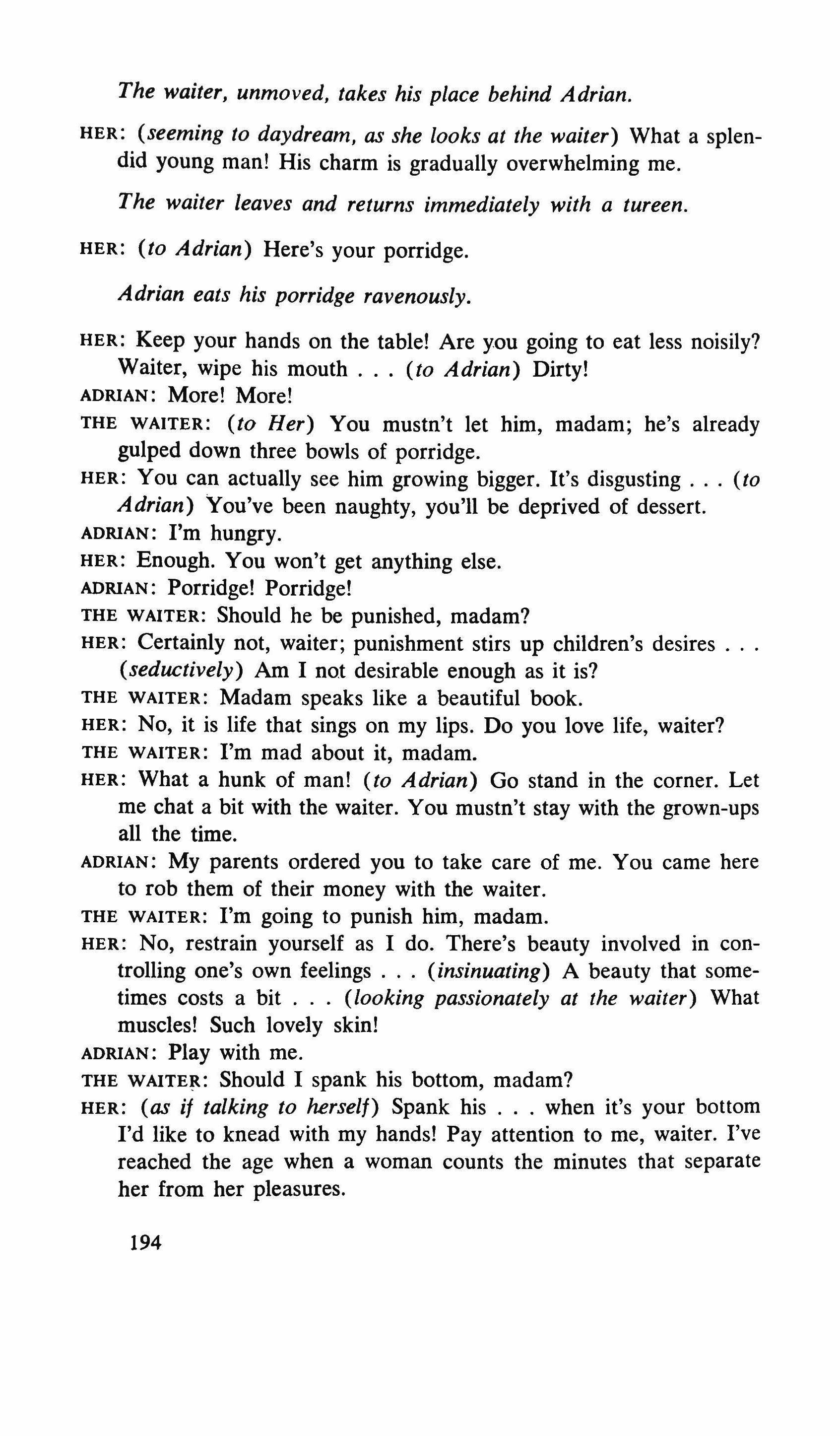
The waiter, unmoved, takes his place behind Adrian.
HER: (seeming to daydream, as she looks at the waiter) What a splendid young man! His charm is gradually overwhelming me.
The waiter leaves and returns immediately with a tureen.
HER: (to Adrian) Here's your porridge.
Adrian eats his porridge ravenously.
HER: Keep your hands on the table! Are you going to eat less noisily? Waiter, wipe his mouth (to Adrian) Dirty!
ADRIAN: More! More!
THE WAITER: (to Her) You mustn't let him, madam; he's already gulped down three bowls of porridge.
HER: You can actually see him growing bigger. It's disgusting (to Adrian) You've been naughty, you'll be deprived of dessert.
ADRIAN: I'm hungry.
HER: Enough. You won't get anything else.
ADRIAN: Porridge! Porridge!
THE WAITER: Should he be punished, madam?
HER: Certainly not, waiter; punishment stirs up children's desires (seductively) Am I not desirable enough as it is?
THE WAITER: Madam speaks like a beautiful book.
HER: No, it is life that sings on my lips. Do you love life, waiter?
THE WAITER: I'm mad about it, madam.
HER: What a hunk of man! (to Adrian) Go stand in the corner. Let me chat a bit with the waiter. You mustn't stay with the grown-ups all the time.
ADRIAN: My parents ordered you to take care of me. You came here to rob them of their money with the waiter.
THE WAITER: I'm going to punish him, madam.
HER: No, restrain yourself as I do. There's beauty involved in controlling one's own feelings (insinuating) A beauty that sometimes costs a bit (looking passionately at the waiter) What muscles! Such lovely skin!
ADRIAN: Play with me.
THE WAITER: Should I spank his bottom, madam?
HER: (as if talking to herself) Spank his when it's your bottom I'd like to knead with my hands! Pay attention to me, waiter. I've reached the age when a woman counts the minutes that separate her from her pleasures.
194

THE WAITER: (moving his probing and marauding hands over her breasts) Your breasts are so silky.
HER: What?
THE WAITER: Your breasts it's like velvet.
HER: (pushing him back, with horror) You brute!
THE WAITER: Why insult me, madam? I've served you faultlessly. I'll make you show me more respect.
The waiter walks away angrily.
HER: What an elegant rump!
The waiter stops, turns around, comes back towards Her.
THE WAITER: I agree to wipe the slate clean. Let's get on with it from where we left off.
HER: I bid you change our relationship to one of brotherly affection. We'll go for walks in the forest of Compiegne, and dream together of the loves of the kings of France.
THE WAITER: (beside himself with desire) My love is for you, oh beauty of nature!
HER: Waiter, make a little effort to resume the dialogue. I'm getting bored with you.
ADRIAN: I'm dead tired, dear friend.
HER: (peremptorily, to the waiter) I've now exhausted all possible alternatives (to Adrian) Put your cap on. Waiter, my veil and gloves, please.
THE WAITER: I won't give madam her things because madam hasn't paid for her dinner.
ADRIAN: (in tears, to the waiter) I don't want you to hurt my nanny.
HER: He's so sweet! Already a real little man. I'm getting such queer ideas.
ADRIAN: (hugging and caressing Her frantically) My dear friend, I love you very much.
HER: (as if talking to herself) My head is spinning.
THE WAITER: Since madam persists, the matter no longer concerns me. It rests henceforth in the hands of the personnel manager.
The waiter goes out. Adrian, in her arms, continues to caress Her. The waiter soon returns, accompanied by the personnel manager.
THE PERSONNEL MANAGER: (sternly) Sir, madam, the time has come for us to settle our accounts.
THE WAITER: They refuse to pay up; Boss.
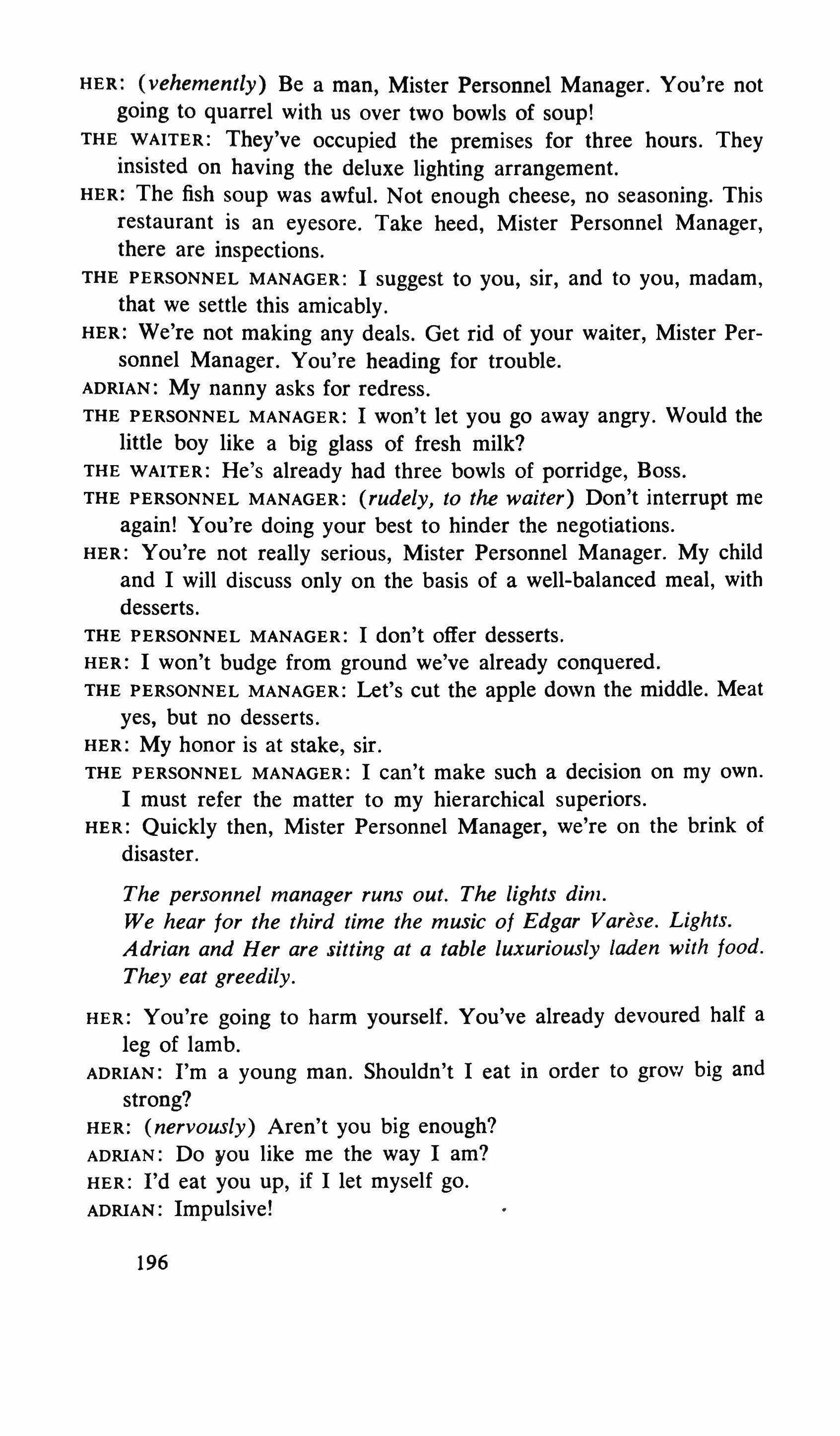
HER: (vehemently) Be a man, Mister Personnel Manager. You're not going to quarrel with us over two bowls of soup!
THE WAITER: They've occupied the premises for three hours. They insisted on having the deluxe lighting arrangement.
HER: The fish soup was awful. Not enough cheese, no seasoning. This restaurant is an eyesore. Take heed, Mister Personnel Manager, there are inspections.
THE PERSONNEL MANAGER: I suggest to you, sir, and to you, madam, that we settle this amicably.
HER: We're not making any deals. Get rid of your waiter, Mister Personnel Manager. You're heading for trouble.
ADRIAN: My nanny asks for redress.
THE PERSONNEL MANAGER: I won't let you go away angry. Would the little boy like a big glass of fresh milk?
THE WAITER: He's already had three bowls of porridge, Boss.
THE PERSONNEL MANAGER: (rudely, to the waiter) Don't interrupt me again! You're doing your best to hinder the negotiations.
HER: You're not really serious, Mister Personnel Manager. My child and I will discuss only on the basis of a well-balanced meal, with desserts.
THE PERSONNEL MANAGER: I don't offer desserts.
HER: I won't budge from ground we've already conquered.
THE PERSONNEL MANAGER: Let's cut the apple down the middle. Meat yes, but no desserts.
HER: My honor is at stake, sir.
THE PERSONNEL MANAGER: I can't make such a decision on my own. I must refer the matter to my hierarchical superiors.
HER: Quickly then, Mister Personnel Manager, we're on the brink of disaster.
The personnel manager runs out. The lights dim. We hear for the third time the music of Edgar Varese. Lights. Adrian and Her are sitting at a table luxuriously Laden with food. They eat greedily.
HER: You're going to harm yourself. You've already devoured half a leg of lamb.
ADRIAN: I'm a young man. Shouldn't I eat in order to grow big and strong?
HER: (nervously) Aren't you big enough?
ADRIAN: Do fOU like me the way I am?
HER: I'd eat you up, if I let myself go.
ADRIAN: Impulsive! 196
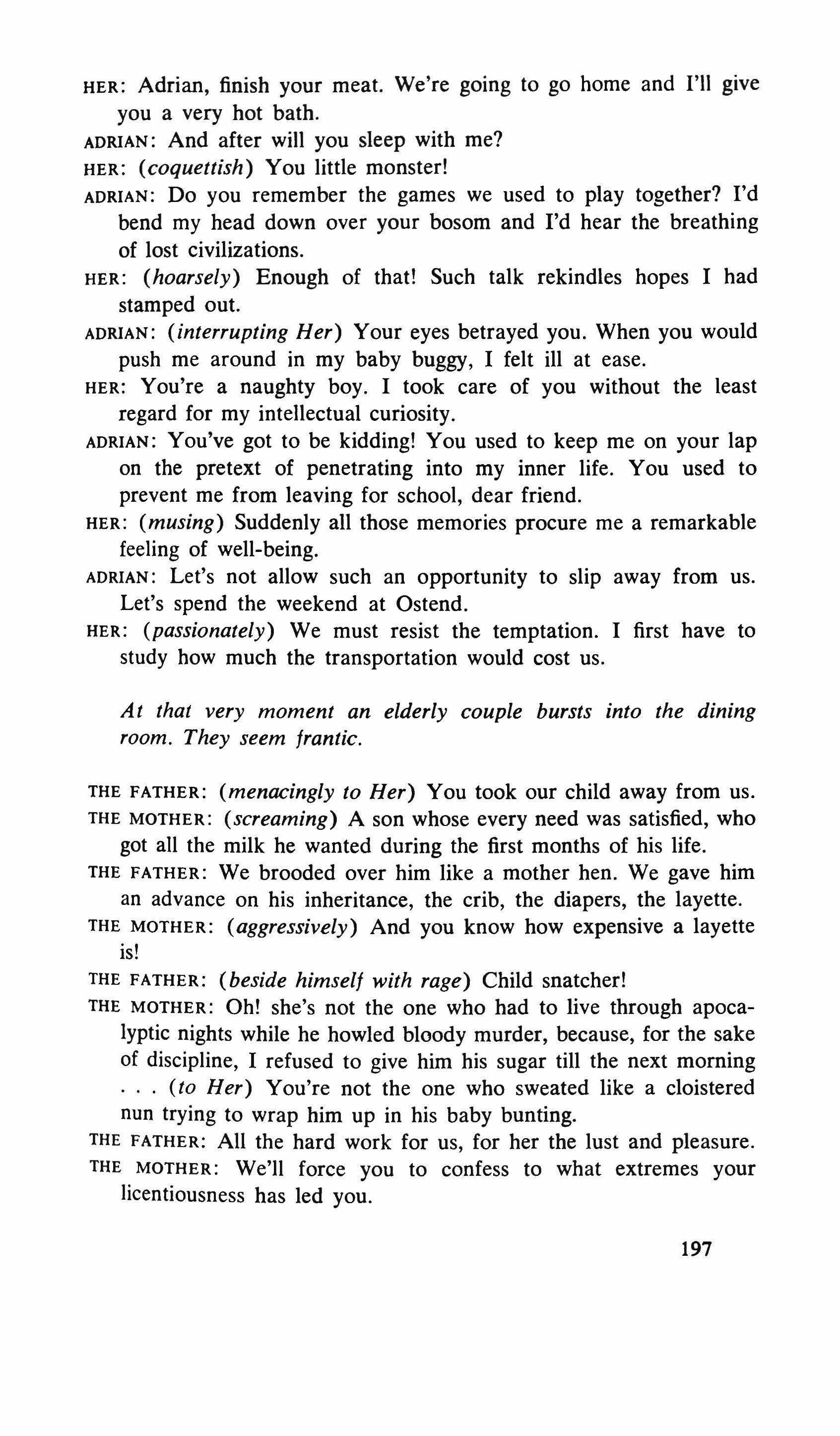
HER: Adrian, finish your meat. We're going to go home and I'll give you a very hot bath.
ADRIAN: And after will you sleep with me?
HER: (coquettish) You little monster!
ADRIAN: Do you remember the games we used to play together? I'd bend my head down over your bosom and I'd hear the breathing of lost civilizations.
HER: (hoarsely) Enough of that! Such talk rekindles hopes I had stamped out.
ADRIAN: (interrupting Her) Your eyes betrayed you. When you would push me around in my baby buggy, I felt ill at ease.
HER: You're a naughty boy. I took care of you without the least regard for my intellectual curiosity.
ADRIAN: You've got to be kidding! You used to keep me on your lap on the pretext of penetrating into my inner life. You used to prevent me from leaving for school, dear friend.
HER: (musing) Suddenly all those memories procure me a remarkable feeling of well-being.
ADRIAN: Let's not allow such an opportunity to slip away from us. Let's spend the weekend at Ostend.
HER: (passionately) We must resist the temptation. I first have to study how much the transportation would cost us.
At that very moment an elderly couple bursts into the dining room. They seem frantic.
THE FATHER: (menacingly to Her) You took our child away from us.
THE MOTHER: (screaming) A son whose every need was satisfied, who got all the milk he wanted during the first months of his life.
THE FATHER: We brooded over him like a mother hen. We gave him an advance on his inheritance, the crib, the diapers, the layette.
THE MOTHER: (aggressively) And you know how expensive a layette is!
THE FATHER: (beside himself with rage) Child snatcher!
THE MOTHER: Oh! she's not the one who had to live through apocalyptic nights while he howled bloody murder, because, for the sake of discipline, I refused to give him his sugar till the next morning (to Her) You're not the one who sweated like a cloistered nun trying to wrap him up in his baby bunting.
THE FATHER: All the hard work for us, for her the lust and pleasure.
THE MOTHER: We'll force you to confess to what extremes your licentiousness has led you. 197
THE PERSONNEL MANAGER: (running up) She seduced him under our very eyes, madam.
THE FATHER: (menacingly, to Her) There are laws. You'll go to prison for this.
ADRIAN: (clapping his hands) Good for her. She's naughty. I'd rather stay with you.
THE MOTHER: Those are words a mother doesn't easily forget (authoritatively, to Adrian) Put your muffler on quickly now (suddenly worn out, looking for Adrian and Her, who have disappeared) Where is he? She has kidnapped him from us!
THE FATHER: (very seriously) I dare say by this time they've already crossed the Spanish border.
The personnel manager rushes to the door, goes out but returns immediately.
THE PERSONNEL MANAGER: She has hanged herself in the garden from an umbrella pine and we found Adrian in conversation with the waiter.
CURTAIN

translated by Ivan Sonier
A PENNY PAD OF MANDELSTAM
four poems translated by Clarence Brown, with a note
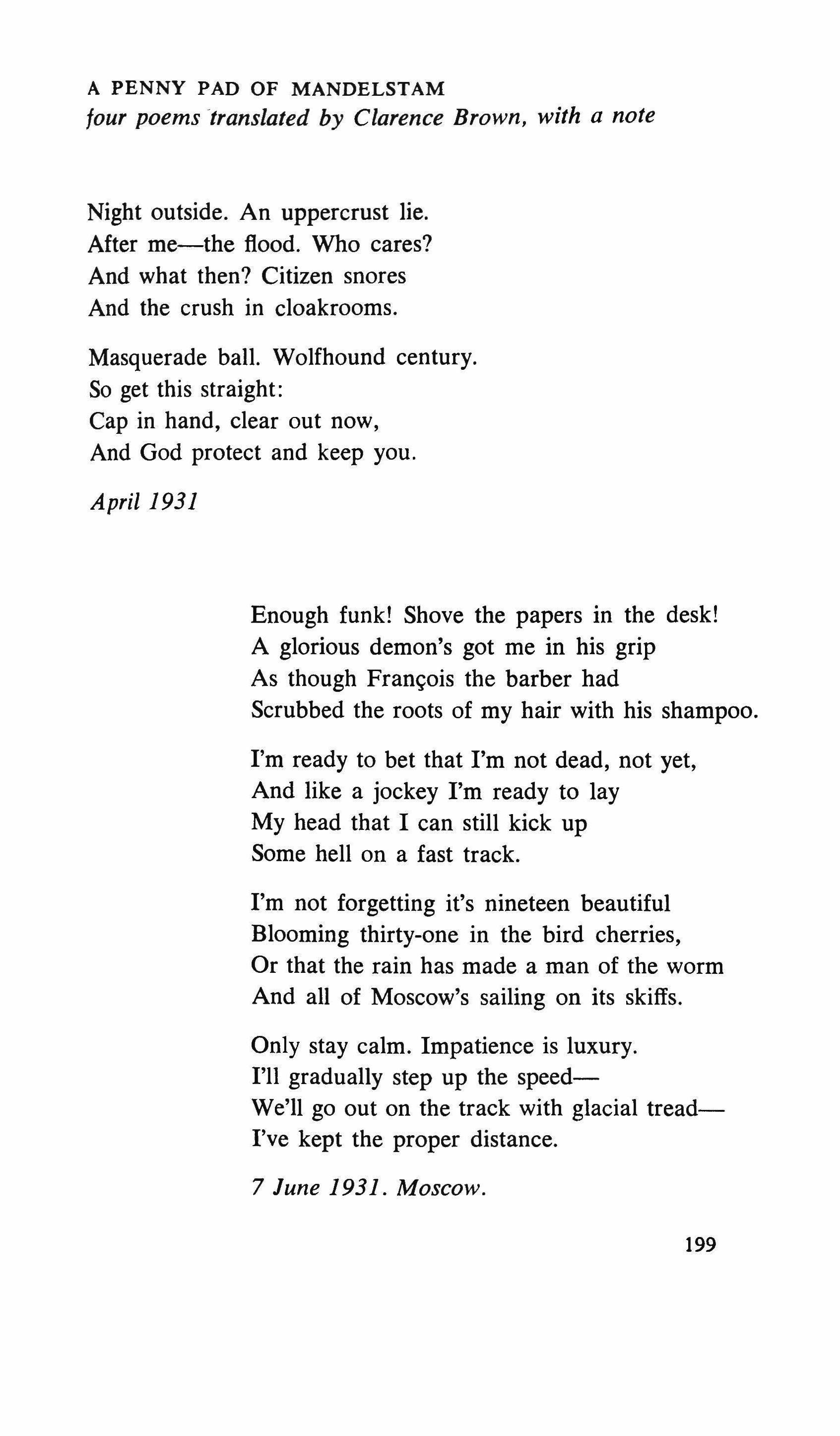
Night outside. An uppercrust lie. After me-the flood. Who cares? And what then? Citizen snores And the crush in cloakrooms.
Masquerade ball. Wolfhound century. So get this straight: Cap in hand, clear out now, And God protect and keep you.
April 1931
Enough funk! Shove the papers in the desk! A glorious demon's got me in his grip As though Francois the barber had Scrubbed the roots of my hair with his shampoo.
I'm ready to bet that I'm not dead, not yet, And like a jockey I'm ready to lay My head that I can still kick up Some hell on a fast track.
I'm not forgetting it's nineteen beautiful Blooming thirty-one in the bird cherries, Or that the rain has made a man of the worm And all of Moscow's sailing on its skiffs.
Only stay calm. Impatience is luxury. I'll gradually step up the speedWe'll go out on the track with glacial treadI've kept the proper distance.
7 June 1931. Moscow.
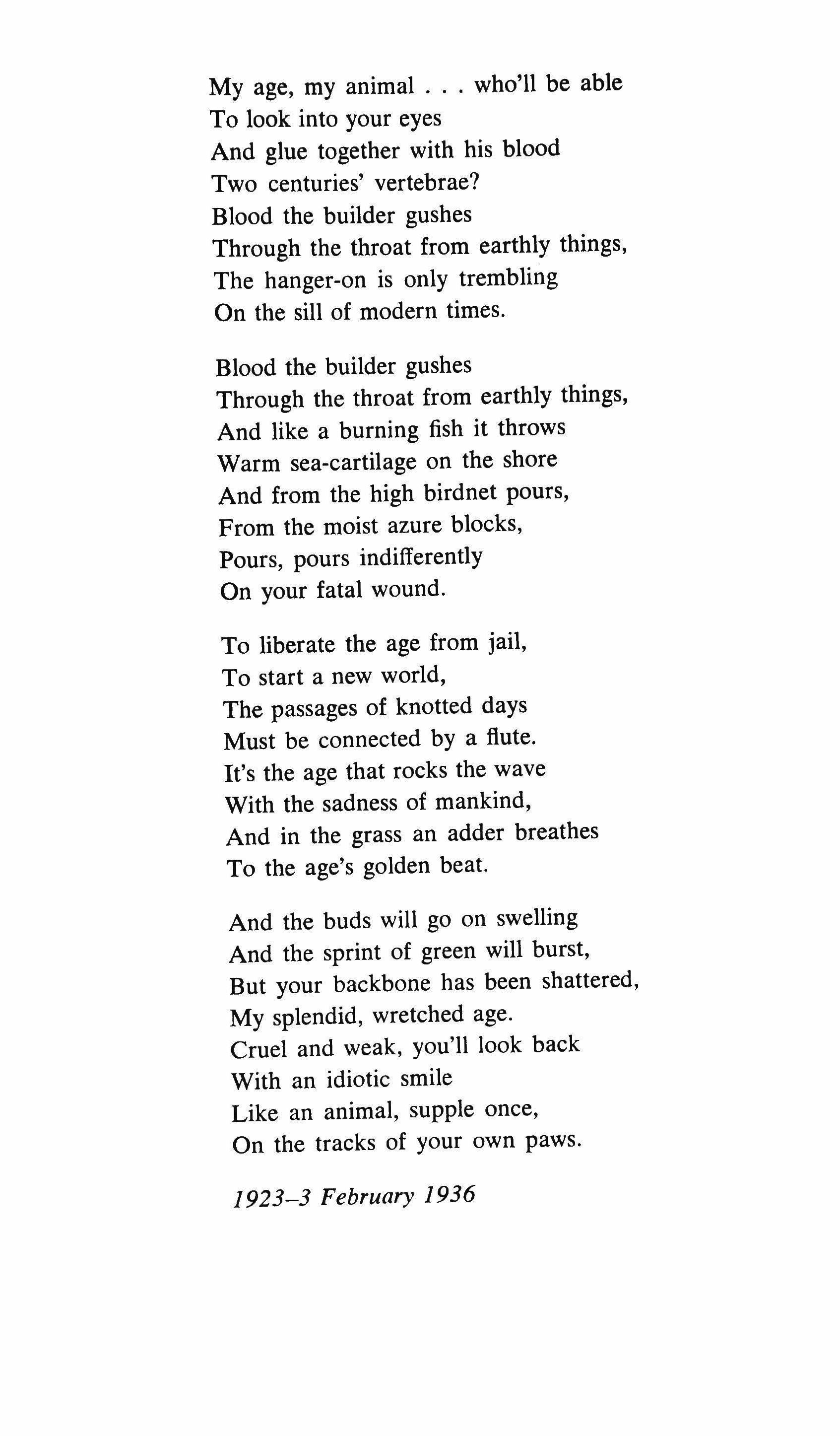
My age, my animal who'll be able To look into your eyes And glue together with his blood
Two centuries' vertebrae?
Blood the builder gushes
Through the throat from earthly things, The hanger-on is only trembling On the sill of modern times.
Blood the builder gushes Through the throat from earthly things, And like a burning fish it throws Warm sea-cartilage on the shore And from the high birdnet pours, From the moist azure blocks, Pours, pours indifferently On your fatal wound.
To liberate the age from jail, To start a new world, The passages of knotted days Must be connected by a flute. It's the age that rocks the wave With the sadness of mankind, And in the grass an adder breathes To the age's golden beat.
And the buds will go on swelling And the sprint of green will burst, But your backbone has been shattered, My splendid, wretched age. Cruel and weak, you'll look back
With an idiotic smile
Like an animal, supple once, On the tracks of your own paws.
1923-3 February 1936
Insomnia. Homer. Taut sails.
I've read up to the middle of the catalogue of ships, That long litter, that train of cranes, That once set forth above Hellas.
Where are you sailing like a wedge of cranes
Into alien zones, a godly foam
On your leaders' heads? Helen gone, Achaian men, What would Troy alone be worth to you?
The sea and Homer both-all moves by force of love.
To whom should I attend? Even Homer's silent now, And now the dark sea roars rhetorically Its billowy thunder toward my pillowed head.
1915
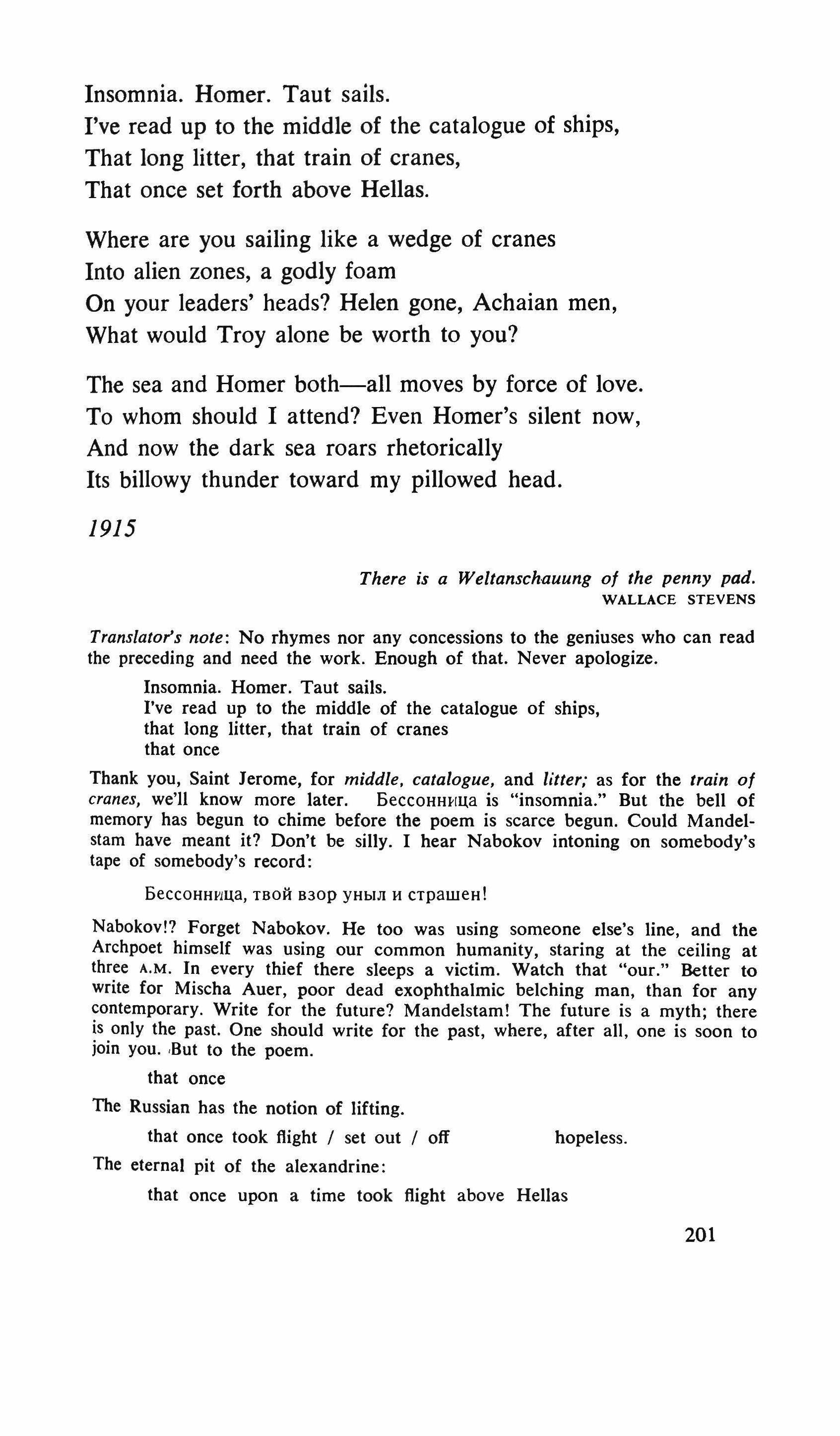
There is a Weltanschauung of the penny pad. WALLACE
STEVENSTranslator's note: No rhymes nor any concessions to the geniuses who can read the preceding and need the work. Enough of that. Never apologize.
Insomnia. Homer. Taut sails.
I've read up to the middle of the catalogue of ships, that long litter, that train of cranes that once
Thank you, Saint Jerome, for middle, catalogue, and litter; as for the train of cranes, we'll know more later. 5ecCOHH�Iu.a is "insomnia." But the bell of memory has begun to chime before the poem is scarce begun. Could Mandelstarn have meant it? Don't be silly. I hear Nabokov intoning on somebody's tape of somebody's record:
5eCCOHH�ju.a, TBOi:i B30P YHbIJI H crpauien!
Nabokov!? Forget Nabokov. He too was using someone else's line, and the Archpoet himself was using our common humanity, staring at the ceiling at three A.M. In every thief there sleeps a victim. Watch that "our." Better to write for Mischa Auer, poor dead exophthalmic belching man, than for any contemporary. Write for the future? Mandelstam! The future is a myth; there is only the past. One should write for the past, where, after all, one is soon to join you. But to the poem. that once
The Russian has the notion of lifting. that once took flight / set out / off The eternal pit of the alexandrine: hopeless. that once upon a time took flight above Hellas
201
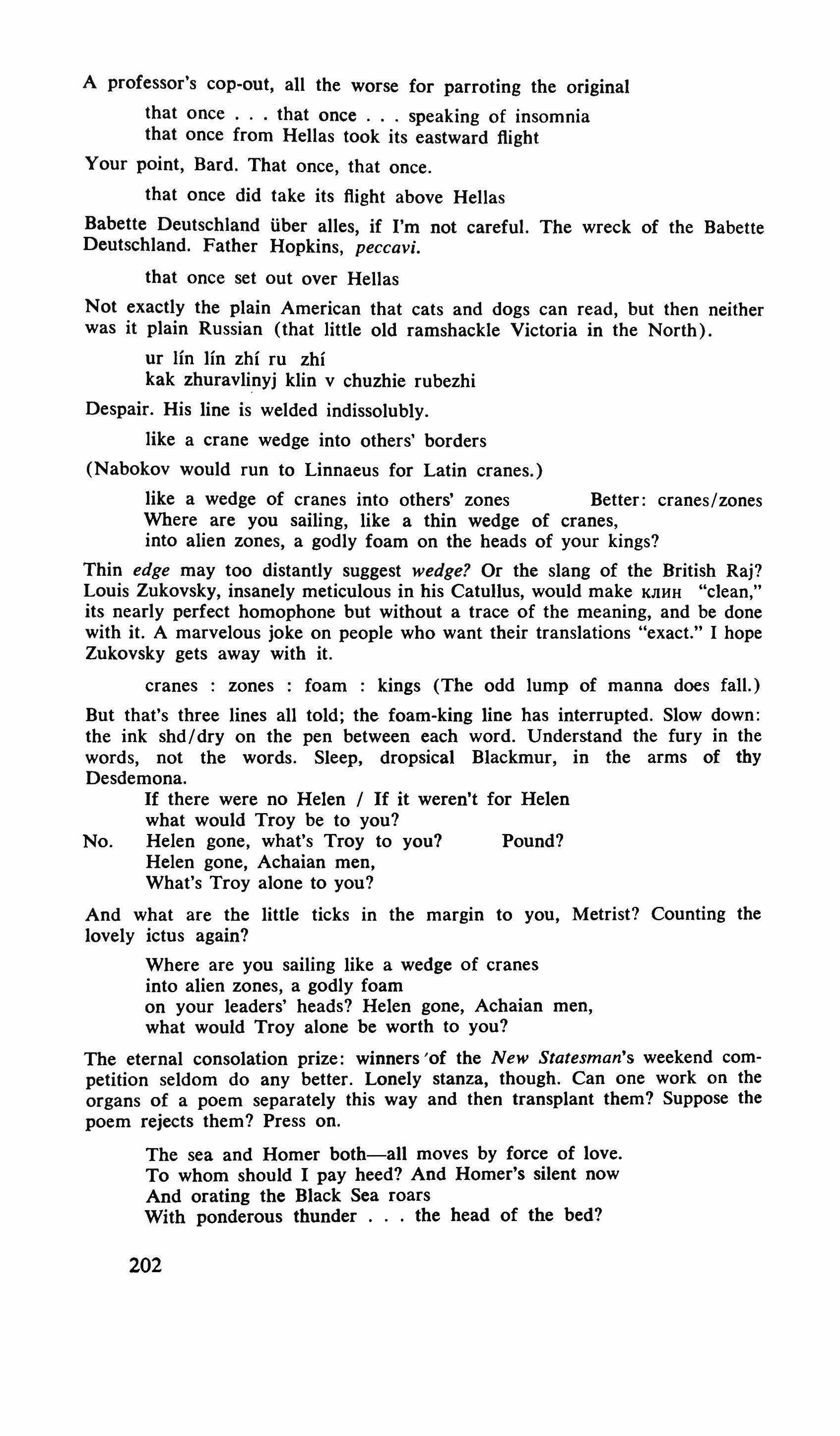
A professor's cop-out, all the worse for parroting the original that once that once speaking of insomnia that once from Hellas took its eastward flight
Your point, Bard. That once, that once. that once did take its flight above Hellas Babette Deutschland tiber alles, if I'm not careful. The wreck of the Babette Deutschland. Father Hopkins, peccavi. that once set out over Hellas
Not exactly the plain American that cats and dogs can read, but then neither was it plain Russian (that little old ramshackle Victoria in the North).
ur lin lin zhi ru zhi kak zhuravlinyj klin v chuzhie rubezhi
Despair. His line is welded indissolubly. like a crane wedge into others' borders (Nabokov would run to Linnaeus for Latin cranes.) like a wedge of cranes into others' zones Better: cranes/zones
Where are you sailing, like a thin wedge of cranes, into alien zones, a godly foam on the heads of your kings?
Thin edge may too distantly suggest wedge? Or the slang of the British Raj? Louis Zukovsky, insanely meticulous in his Catullus, would make KJIHH "clean," its nearly perfect homophone but without a trace of the meaning, and be done with it. A marvelous joke on people who want their translations "exact." I hope Zukovsky gets away with it.
cranes : zones : foam : kings (The odd lump of manna does fall.)
But that's three lines all told; the foam-king line has interrupted. Slow down: the ink shd/dry on the pen between each word. Understand the fury in the words, not the words. Sleep, dropsical Blackmur, in the arms of thy Desdemona.
If there were no Helen / If it weren't for Helen what would Troy be to you?
No. Helen gone, what's Troy to you? Pound? Helen gone, Achaian men, What's Troy alone to you?
And what are the little ticks in the margin to you, Metrist? Counting the lovely ictus again?
Where are you sailing like a wedge of cranes into alien zones, a godly foam on your leaders' heads? Helen gone, Achaian men, what would Troy alone be worth to you?
The eternal consolation prize: winners 'of the New Statesman's weekend competition seldom do any better. Lonely stanza, though. Can one work on the organs of a poem separately this way and then transplant them? Suppose the poem rejects them? Press on.
The sea and Homer both-all moves by force of love. To whom should I pay heed? And Homer's silent now And orating the Black Sea roars With ponderous thunder the head of the bed?
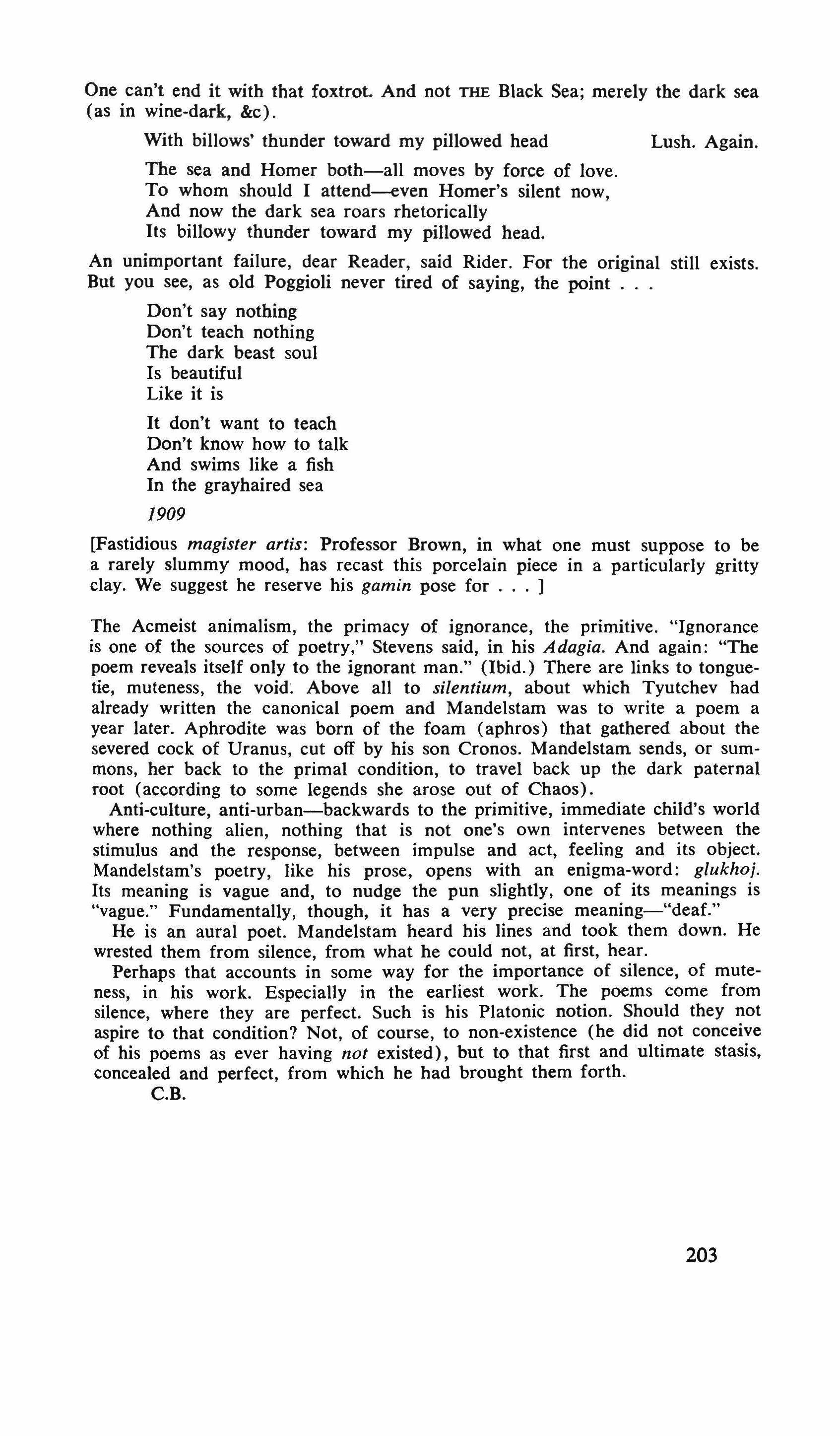
One can't end it with that foxtrot. And not THE Black Sea; merely the dark sea (as in wine-dark, &c).
With billows' thunder toward my pillowed head Lush. Again.
The sea and Homer both-all moves by force of love.
To whom should I attend-even Homer's silent now, And now the dark sea roars rhetorically Its billowy thunder toward my pillowed head.
An unimportant failure, dear Reader, said Rider. For the original still exists. But you see, as old Poggioli never tired of saying, the point
Don't say nothing
Don't teach nothing
The dark beast soul
Is beautiful
Like it is
It don't want to teach
Don't know how to talk
And swims like a fish
In the grayhaired sea
1909
[Fastidious magister artis: Professor Brown, in what one must suppose to be a rarely slummy mood, has recast this porcelain piece in a particularly gritty clay. We suggest he reserve his gamin pose for ]
The Acmeist animalism, the primacy of ignorance, the primitive. "Ignorance is one of the sources of poetry," Stevens said, in his Adagia. And again: "The poem reveals itself only to the ignorant man." (Ibid.) There are links to tonguetie, muteness, the void: Above all to silentium, about which Tyutchev had already written the canonical poem and Mandelstam was to write a poem a year later. Aphrodite was born of the foam (aphros) that gathered about the severed cock of Uranus, cut off by his son Cronos. Mandelstam sends, or summons, her back to the primal condition, to travel back up the dark paternal root (according to some legends she arose out of Chaos).
Anti-culture, anti-urban-backwards to the primitive, immediate child's world where nothing alien, nothing that is not one's own intervenes between the stimulus and the response, between impulse and act, feeling and its object. Mandelstam's poetry, like his prose, opens with an enigma-word: glukhoj. Its meaning is vague and, to nudge the pun slightly, one of its meanings is "vague." Fundamentally, though, it has a very precise meaning-"deaf."
He is an aural poet. Mandelstam heard his lines and took them down. He wrested them from silence, from what he could not, at first, hear.
Perhaps that accounts in some way for the importance of silence, of muteness, in his work. Especially in the earliest work. The poems come from silence, where they are perfect. Such is his Platonic notion. Should they not aspire to that condition? Not, of course, to non-existence (he did not conceive of his poems as ever having not existed), but to that first and ultimate stasis, concealed and perfect, from which he had brought them forth.
C.B.
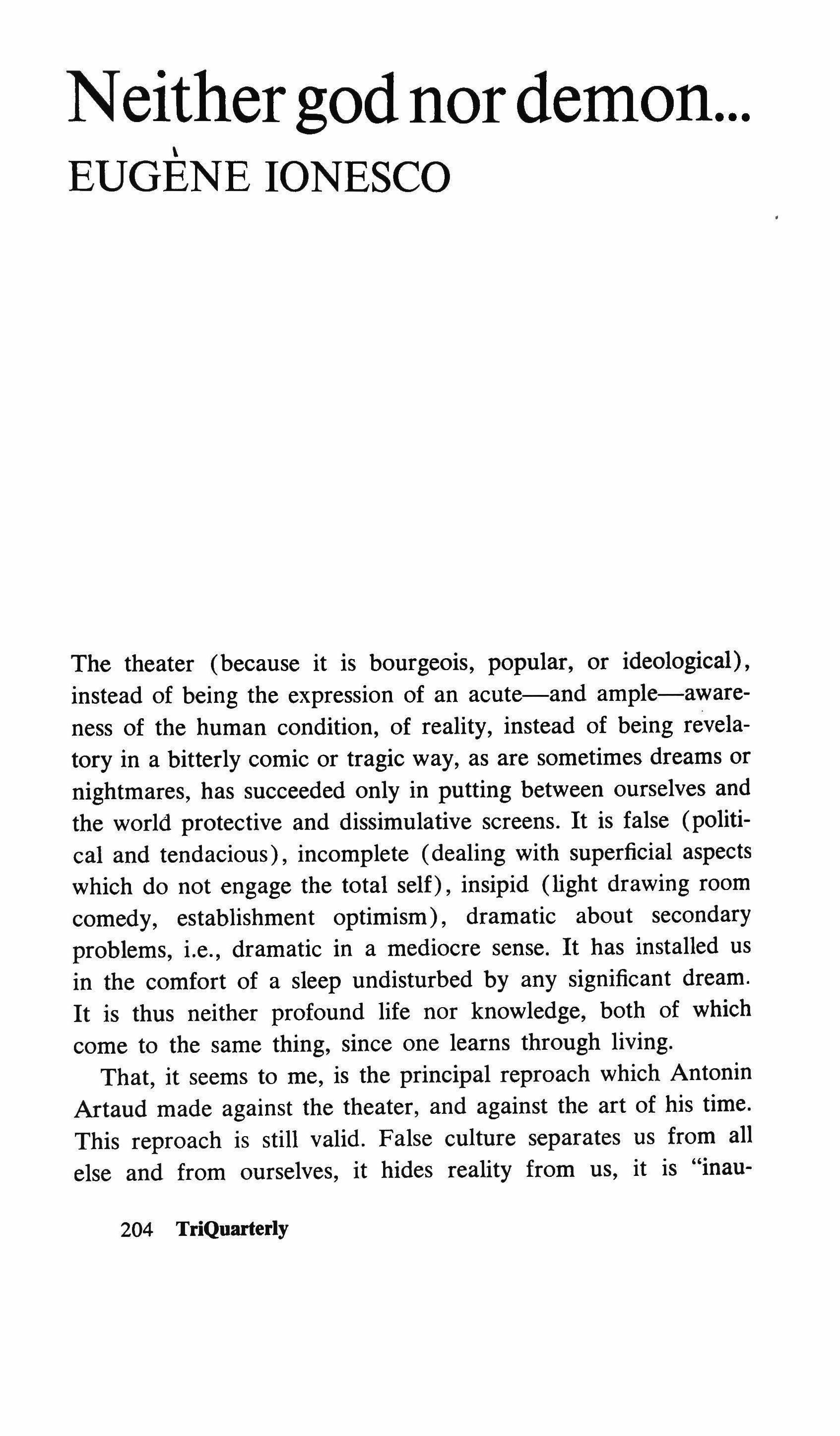
The theater (because it is bourgeois, popular, or ideological), instead of being the expression of an acute-and ample-awareness of the human condition, of reality, instead of being revelatory in a bitterly comic or tragic way, as are sometimes dreams or nightmares, has succeeded only in putting between ourselves and the world protective and dissimulative screens. It is false (political and tendacious), incomplete (dealing with superficial aspects which do not engage the total self), insipid (light drawing room comedy, establishment optimism), dramatic about secondary problems, i.e., dramatic in a mediocre sense. It has installed us in the comfort of a sleep undisturbed by any significant dream. It is thus neither profound life nor knowledge, both of which come to the same thing, since one learns through living. That, it seems to me, is the principal reproach which Antonin Artaud made against the theater, and against the art of his time. This reproach is still valid. False culture separates us from all else and from ourselves, it hides reality from us, it is "inau-
204 TriQuarterly
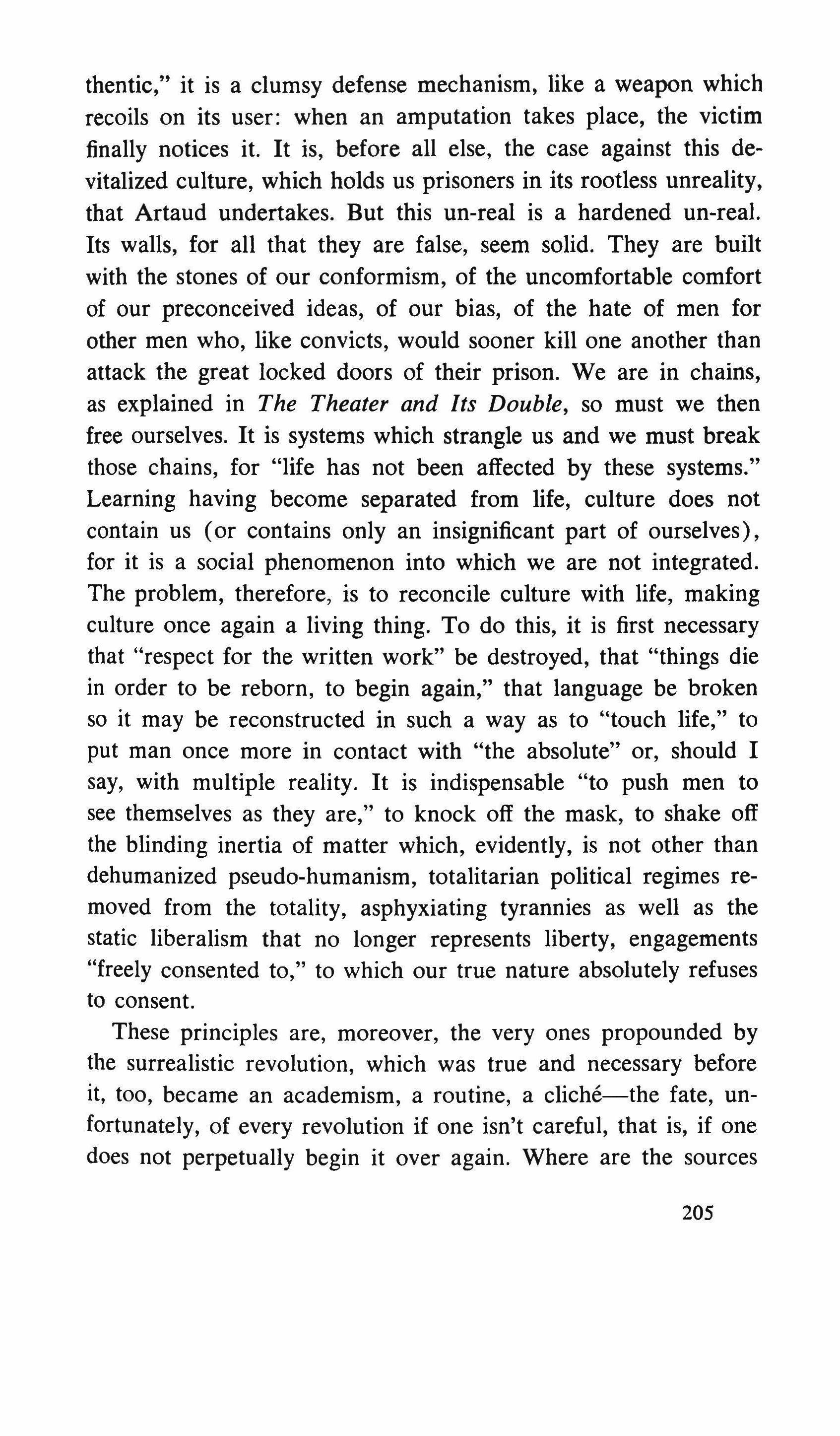
thentic," it is a clumsy defense mechanism, like a weapon which recoils on its user: when an amputation takes place, the victim finally notices it. It is, before all else, the case against this devitalized culture, which holds us prisoners in its rootless unreality, that Artaud undertakes. But this un-real is a hardened un-real. Its walls, for all that they are false, seem solid. They are built with the stones of our conformism, of the uncomfortable comfort of our preconceived ideas, of our bias, of the hate of men for other men who, like convicts, would sooner kill one another than attack the great locked doors of their prison. We are in chains, as explained in The Theater and Its Double, so must we then free ourselves. It is systems which strangle us and we must break those chains, for "life has not been affected by these systems." Learning having become separated from life, culture does not contain us (or contains only an insignificant part of ourselves), for it is a social phenomenon into which we are not integrated. The problem, therefore, is to reconcile culture with life, making culture once again a living thing. To do this, it is first necessary that "respect for the written work" be destroyed, that "things die in order to be reborn, to begin again," that language be broken so it may be reconstructed in such a way as to "touch life," to put man once more in contact with "the absolute" or, should I say, with multiple reality. It is indispensable "to push men to see themselves as they are," to knock off the mask, to shake off the blinding inertia of matter which, evidently, is not other than dehumanized pseudo-humanism, totalitarian political regimes removed from the totality, asphyxiating tyrannies as well as the static liberalism that no longer represents liberty, engagements "freely consented to," to which our true nature absolutely refuses to consent.
These principles are, moreover, the very ones propounded by the surrealistic revolution, which was true and necessary before it, too, became an academism, a routine, a cliche-the fate, unfortunately, of every revolution if one isn't careful, that is, if one does not perpetually begin it over again. Where are the sources

of this "true life"; where is it and what is this "non-alienation," this liberation?
If it is difficult to say what "true life" is, it is probably less so to grasp what it is not. The majority of people, the great middle class of whatever country, conformists of whatever religion, in any society or regime, appear not even to feel the need: that is exactly why one must "shake off the blinding inertia of matter," destroy everything in order to move toward-one is not sure precisely what-the absence of which is keenly felt by perceptive and thoughtful minds. Yesterday's dadaists and surrealists, the Italian futurists and those from the country of Bloch and Malakovski wanted what those in revolt, the young non-conformists, the angry young men of every country, from New York to Leningrad, from Madrid to Warsaw, want: it is not from hunger that all these people suffer; something else is lacking.
For a long time I did not like Artaud, for I had known him only through his "monkeys," those who, by imitating him, caricatured him before they denied him. It must however be admitted that if the first part of The Theater and Its Double strikes responsive chords in us and if Artaud is very moving when he speaks of "satisfying this nostalgia for the pure beauty that Plato must surely have found at least once in this world, the completed realization, bared, sonorous and rippling and of resolving all the conflicts produced by the antagonism between matter and spirit, idea and form, concrete and abstract, and fusing all appearances into a single expression which would be like spiritualized gold"-he is disappointing when he proposes the means by which he will "confront us with the absolute" and "illuminate secret truths." His failure lies in his being not only neither poet nor dramatist, but also neither god nor demon: simple actor and director or, rather, stage manager. The alchemy and magic of his theater is reduced to direction, a few light tricks, various accessories. He produced without a theater, directed without a text, perhaps because the author of whom he dreamed did not exist at that time. He would have produced such an author magnificently, in a way that would have forever compromised and invalidated
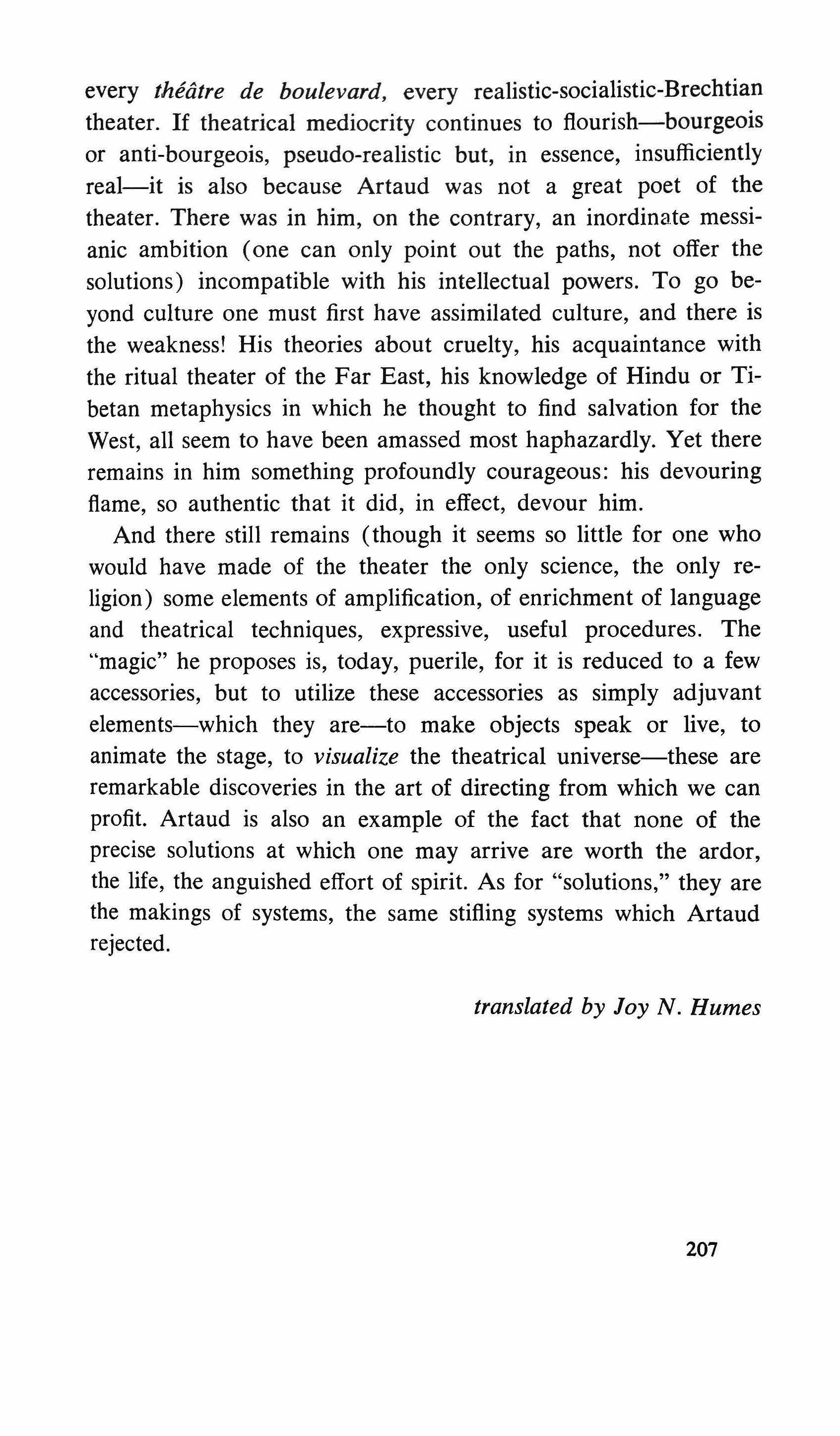
every theatre de boulevard, every realistic-socialistic-Brechtian theater. If theatrical mediocrity continues to flourish-bourgeois or anti-bourgeois, pseudo-realistic but, in essence, insufficiently real-it is also because Artaud was not a great poet of the theater. There was in him, on the contrary, an inordinate messianic ambition (one can only point out the paths, not offer the solutions) incompatible with his intellectual powers. To go beyond culture one must first have assimilated culture, and there is the weakness! His theories about cruelty, his acquaintance with the ritual theater of the Far East, his knowledge of Hindu or Tibetan metaphysics in which he thought to find salvation for the West, all seem to have been amassed most haphazardly. Yet there remains in him something profoundly courageous: his devouring flame, so authentic that it did, in effect, devour him.
And there still remains (though it seems so little for one who would have made of the theater the only science, the only religion) some elements of amplification, of enrichment of language and theatrical techniques, expressive, useful procedures. The "magic" he proposes is, today, puerile, for it is reduced to a few accessories, but to utilize these accessories as simply adjuvant elements-which they are-to make objects speak or live, to animate the stage, to visualize the theatrical universe-these are remarkable discoveries in the art of directing from which we can profit. Artaud is also an example of the fact that none of the precise solutions at which one may arrive are worth the ardor, the life, the anguished effort of spirit. As for "solutions," they are the makings of systems, the same stifling systems which Artaud rejected.
translated by Joy N. Humes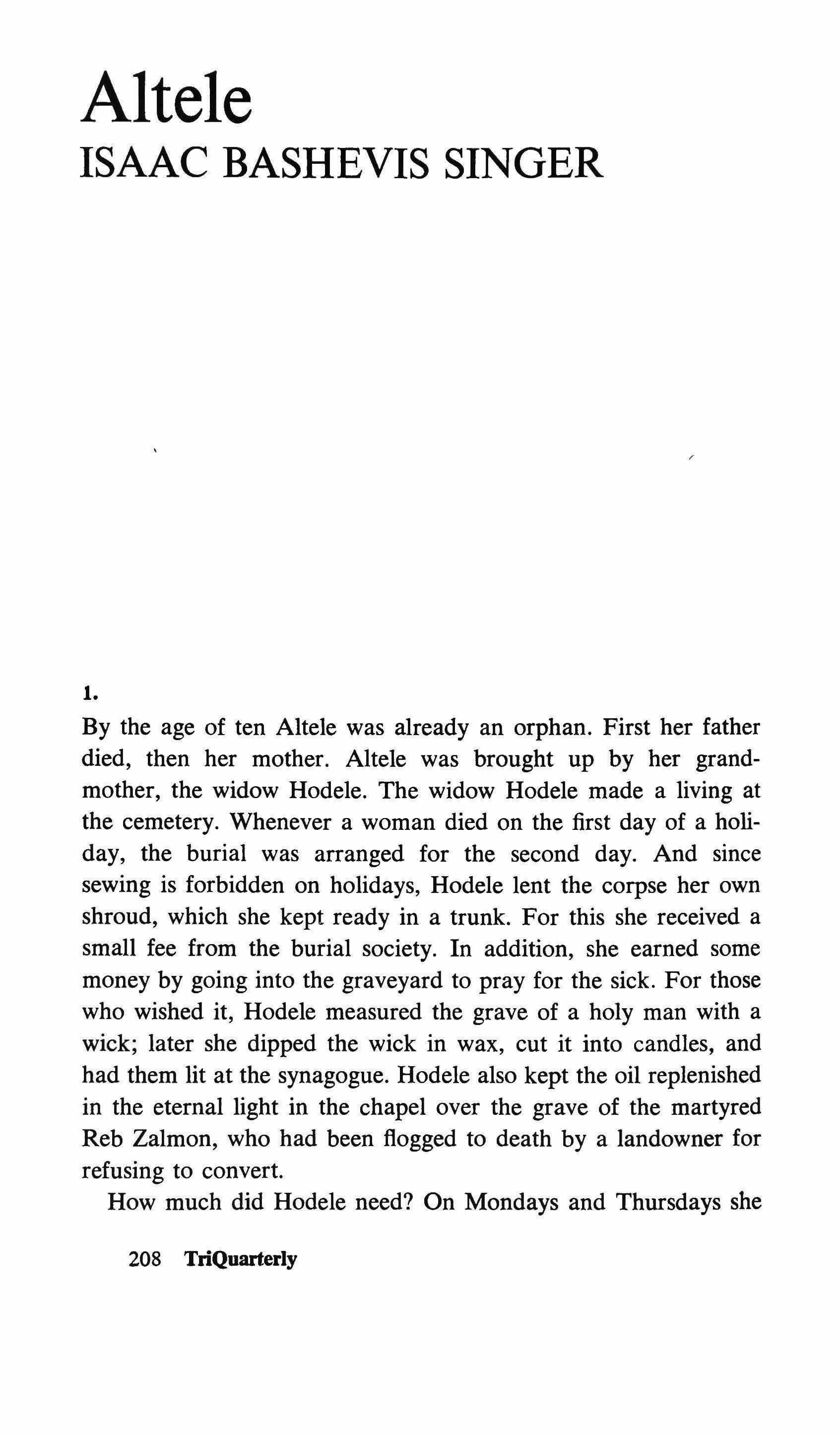
1.
By the age of ten Altele was already an orphan. First her father died, then her mother. Altele was brought up by her grandmother, the widow Hodele. The widow Hodele made a living at the cemetery. Whenever a woman died on the first day of a holiday, the burial was arranged for the second day. And since sewing is forbidden on holidays, Hodele lent the corpse her own shroud, which she kept ready in a trunk. For this she received a small fee from the burial society. In addition, she earned some money by going into the graveyard to pray for the sick. For those who wished it, Hodele measured the grave of a holy man with a wick; later she dipped the wick in wax, cut it into candles, and had them lit at the synagogue. Hodele also kept the oil replenished in the eternal light in the chapel over the grave of the martyred Reb Zalmon, who had been flogged to death by a landowner for refusing to convert.
How much did Hodele need? On Mondays and Thursdays she
208 TriQuarterly
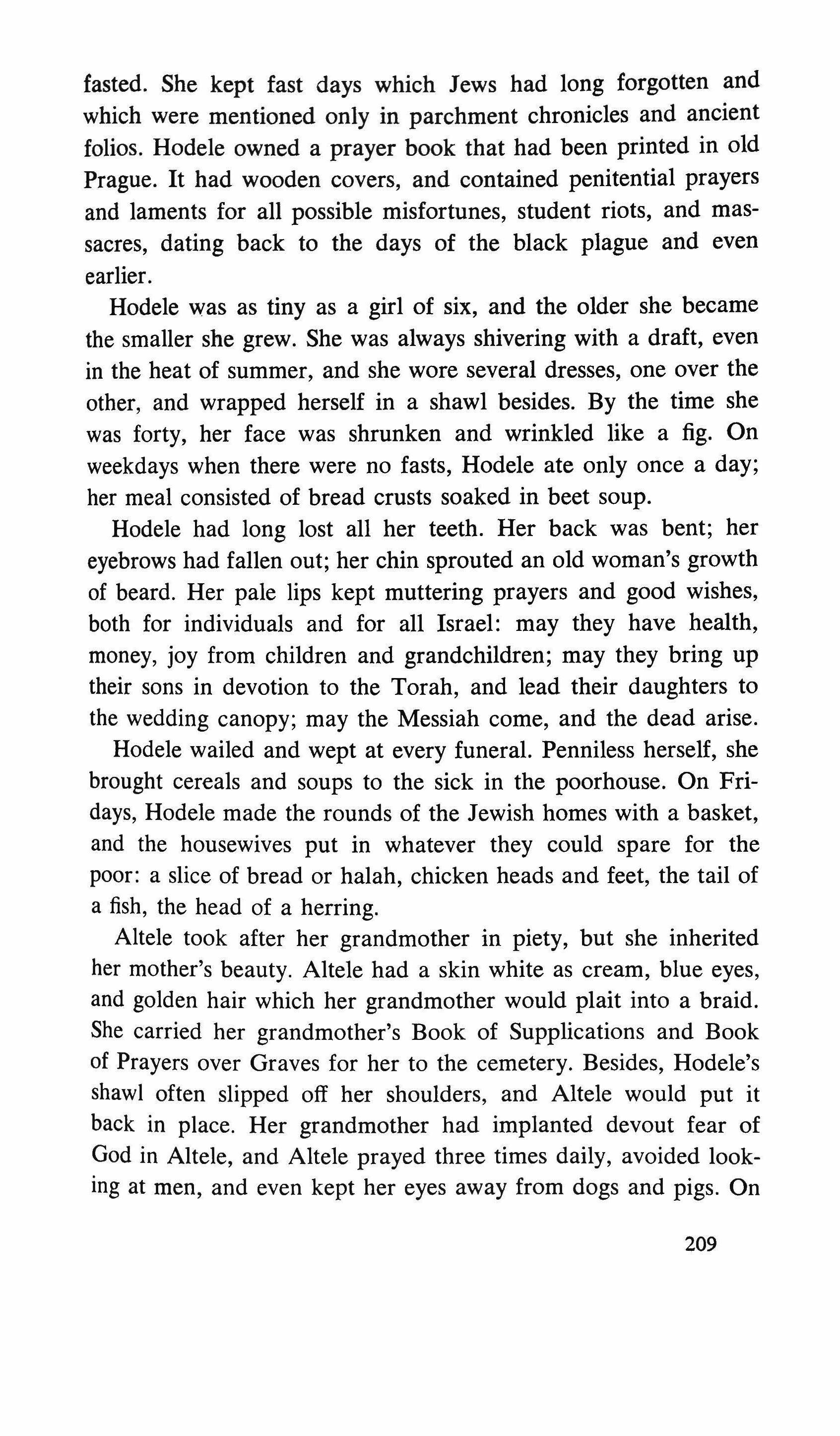
fasted. She kept fast days which Jews had long forgotten and which were mentioned only in parchment chronicles and ancient folios. Hodele owned a prayer book that had been printed in old Prague. It had wooden covers, and contained penitential prayers and laments for all possible misfortunes, student riots, and massacres, dating back to the days of the black plague and even earlier.
Hodele was as tiny as a girl of six, and the older she became the smaller she grew. She was always shivering with a draft, even in the heat of summer, and she wore several dresses, one over the other, and wrapped herself in a shawl besides. By the time she was forty, her face was shrunken and wrinkled like a fig. On weekdays when there were no fasts, Hodele ate only once a day; her meal consisted of bread crusts soaked in beet soup.
Hodele had long lost all her teeth. Her back was bent; her eyebrows had fallen out; her chin sprouted an old woman's growth of beard. Her pale lips kept muttering prayers and good wishes, both for individuals and for all Israel: may they have health, money, joy from children and grandchildren; may they bring up their sons in devotion to the Torah, and lead their daughters to the wedding canopy; may the Messiah come, and the dead arise.
Hodele wailed and wept at every funeral. Penniless herself, she brought cereals and soups to the sick in the poorhouse. On Fridays, Hodele made the rounds of the Jewish homes with a basket, and the housewives put in whatever they could spare for the poor: a slice of bread or halah, chicken heads and feet, the tail of a fish, the head of a herring.
Altele took after her grandmother in piety, but she inherited her mother's beauty. Altele had a skin white as cream, blue eyes, and golden hair which her grandmother would plait into a braid. She carried her grandmother's Book of Supplications and Book of Prayers over Graves for her to the cemetery. Besides, Hodele's shawl often slipped off her shoulders, and Altele would put it back in place. Her grandmother had implanted devout fear of God in Altele, and Altele prayed three times daily, avoided looking at men, and even kept her eyes away from dogs and pigs. On
209
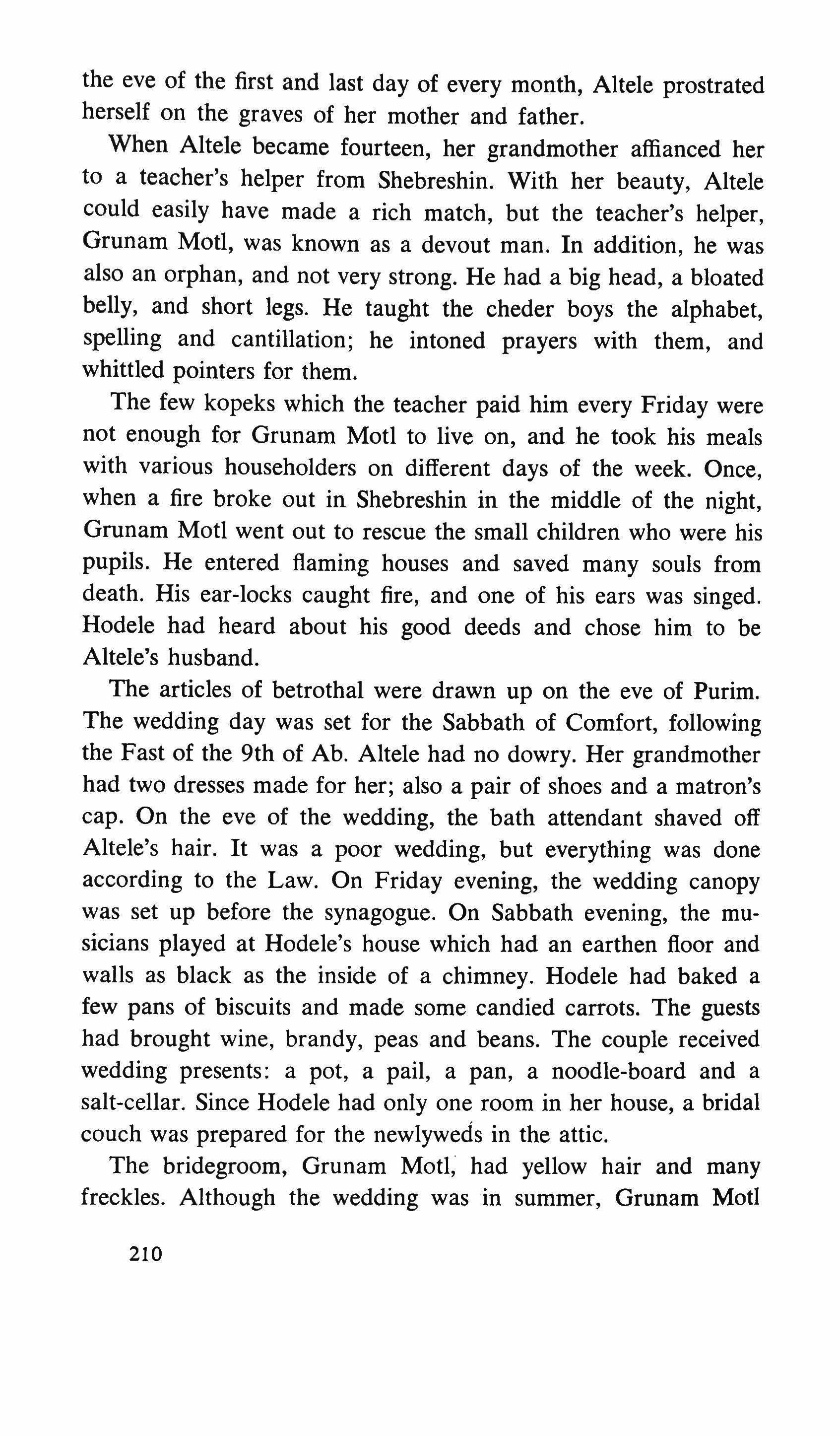
the eve of the first and last day of every month, Altele prostrated herself on the graves of her mother and father.
When Altele became fourteen, her grandmother affianced her to a teacher's helper from Shebreshin. With her beauty, Altele could easily have made a rich match, but the teacher's helper, Grunam Motl, was known as a devout man. In addition, he was also an orphan, and not very strong. He had a big head, a bloated belly, and short legs. He taught the cheder boys the alphabet, spelling and cantillation; he intoned prayers with them, and whittled pointers for them.
The few kopeks which the teacher paid him every Friday were not enough for Grunam Motl to live on, and he took his meals with various householders on different days of the week. Once, when a fire broke out in Shebreshin in the middle of the night, Grunam Motl went out to rescue the small children who were his pupils. He entered flaming houses and saved many souls from death. His ear-locks caught fire, and one of his ears was singed. Hodele had heard about his good deeds and chose him to be Altele's husband.
The articles of betrothal were drawn up on the eve of Purim. The wedding day was set for the Sabbath of Comfort, following the Fast of the 9th of Ab. Altele had no dowry. Her grandmother had two dresses made for her; also a pair of shoes and a matron's cap. On the eve of the wedding, the bath attendant shaved off Altele's hair. It was a poor wedding, but everything was done according to the Law. On Friday evening, the wedding canopy was set up before the synagogue. On Sabbath evening, the musicians played at Hode1e's house which had an earthen floor and walls as black as the inside of a chimney. Hodele had baked a few pans of biscuits and made some candied carrots. The guests had brought wine, brandy, peas and beans. The couple received wedding presents: a pot, a pail, a pan, a noodle-board and a salt-cellar. Since Hodele had only one room in her house, a bridal couch was prepared for the newlyweds in the attic.
The bridegroom, Grunam Motl, had yellow hair and many freckles. Although the wedding was in summer, Grunam MotI
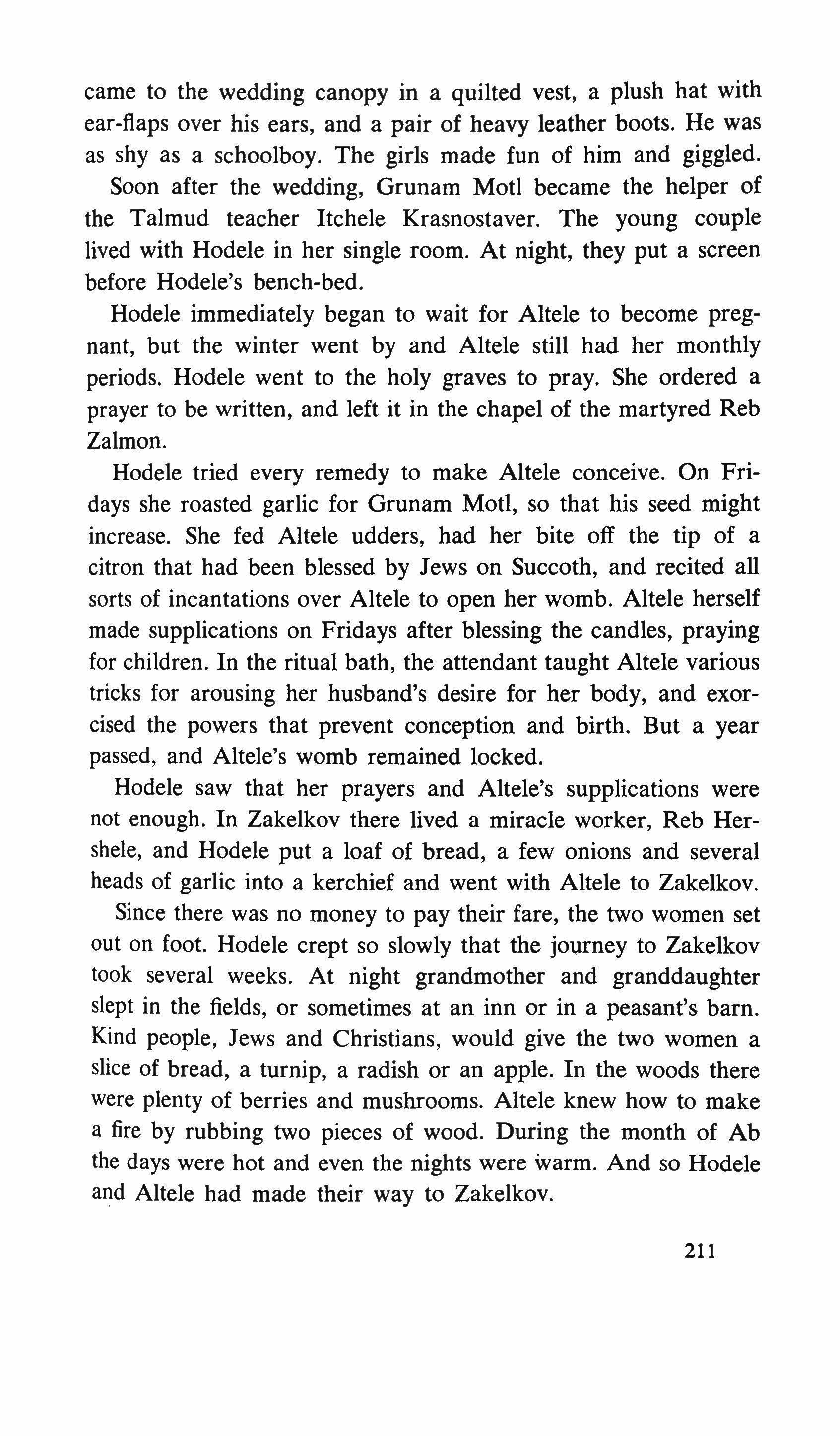
came to the wedding canopy in a quilted vest, a plush hat with ear-flaps over his ears, and a pair of heavy leather boots. He was as shy as a schoolboy. The girls made fun of him and giggled.
Soon after the wedding, Grunam Motl became the helper of the Talmud teacher Itchele Krasnostaver. The young couple lived with Hodele in her single room. At night, they put a screen before Hodele's bench-bed.
Hodele immediately began to wait for Altele to become pregnant, but the winter went by and Altele still had her monthly periods. Hodele went to the holy graves to pray. She ordered a prayer to be written, and left it in the chapel of the martyred Reb Zalmon.
Hodele tried every remedy to make Altele conceive. On Fridays she roasted garlic for Grunam Motl, so that his seed might increase. She fed Altele udders, had her bite off the tip of a citron that had been blessed by Jews on Succoth, and recited all sorts of incantations over Altele to open her womb. Altele herself made supplications on Fridays after blessing the candles, praying for children. In the ritual bath, the attendant taught Altele various tricks for arousing her husband's desire for her body, and exorcised the powers that prevent conception and birth. But a year passed, and Altele's womb remained locked.
Hodele saw that her prayers and Altele's supplications were not enough. In Zakelkov there lived a miracle worker, Reb Hershele, and Hodele put a loaf of bread, a few onions and several heads of garlic into a kerchief and went with Altele to Zakelkov. Since there was no money to pay their fare, the two women set out on foot. Hodele crept so slowly that the journey to Zakelkov took several weeks. At night grandmother and granddaughter slept in the fields, or sometimes at an inn or in a peasant's barn. Kind people, Jews and Christians, would give the two women a slice of bread, a turnip, a radish or an apple. In the woods there were plenty of berries and mushrooms. Altele knew how to make a fire by rubbing two pieces of wood. During the month of Ab the days were hot and even the nights were warm. And so Hodele and Altele had made their way to Zakelkov. 211
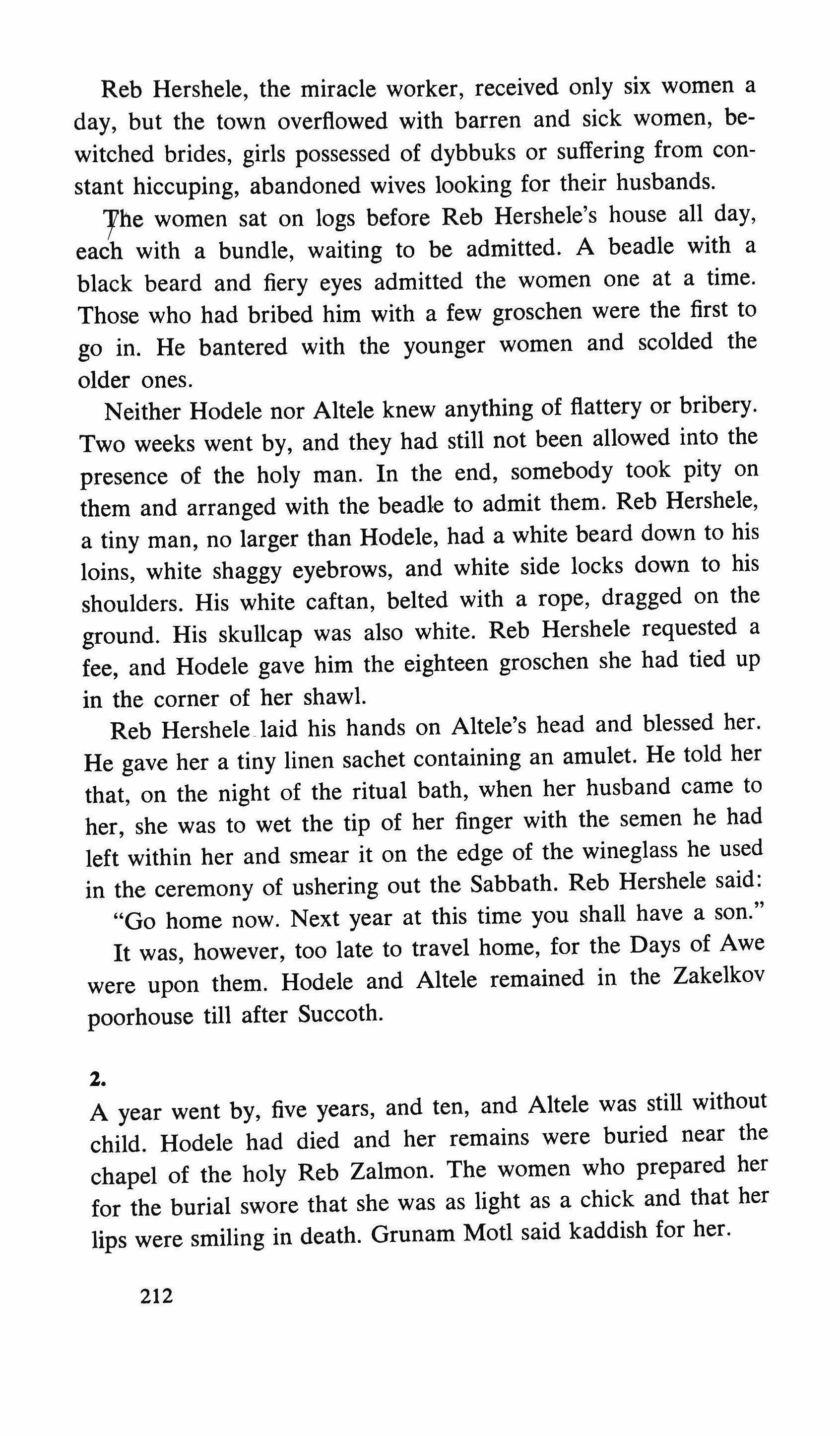
Reb Hershele, the miracle worker, received only six women a day, but the town overflowed with barren and sick women, bewitched brides, girls possessed of dybbuks or suffering from constant hiccuping, abandoned wives looking for their husbands.
1he women sat on logs before Reb Hershele's house all day, each with a bundle, waiting to be admitted. A beadle with a black beard and fiery eyes admitted the women one at a time. Those who had bribed him with a few groschen were the first to go in. He bantered with the younger women and scolded the older ones.
Neither Hodele nor Altele knew anything of flattery or bribery. Two weeks went by, and they had still not been allowed into the presence of the holy man. In the end, somebody took pity on them and arranged with the beadle to admit them. Reb Hershele, a tiny man, no larger than Hodele, had a white beard down to his loins, white shaggy eyebrows, and white side locks down to his shoulders. His white caftan, belted with a rope, dragged on the ground. His skullcap was also white. Reb Hershele requested a fee, and Hodele gave him the eighteen groschen she had tied up in the corner of her shawl.
Reb Hershele .laid his hands on Altele's head and blessed her. He gave her a tiny linen sachet containing an amulet. He told her that, on the night of the ritual bath, when her husband came to her, she was to wet the tip of her finger with the semen he had left within her and smear it on the edge of the wineglass he used in the ceremony of ushering out the Sabbath. Reb Hershele said: "Go home now. Next year at this time you shall have a son." It was, however, too late to travel home, for the Days of Awe were upon them. Hodele and Altele remained in the Zakelkov poorhouse till after Succoth.
2.
A year went by, five years, and ten, and Altele was still without child. Hodele had died and her remains were buried near the chapel of the holy Reb Zalmon. The women who prepared her for the burial swore that she was as light as a chick and that her lips were smiling in death. Grunam Motl said kaddish for her.
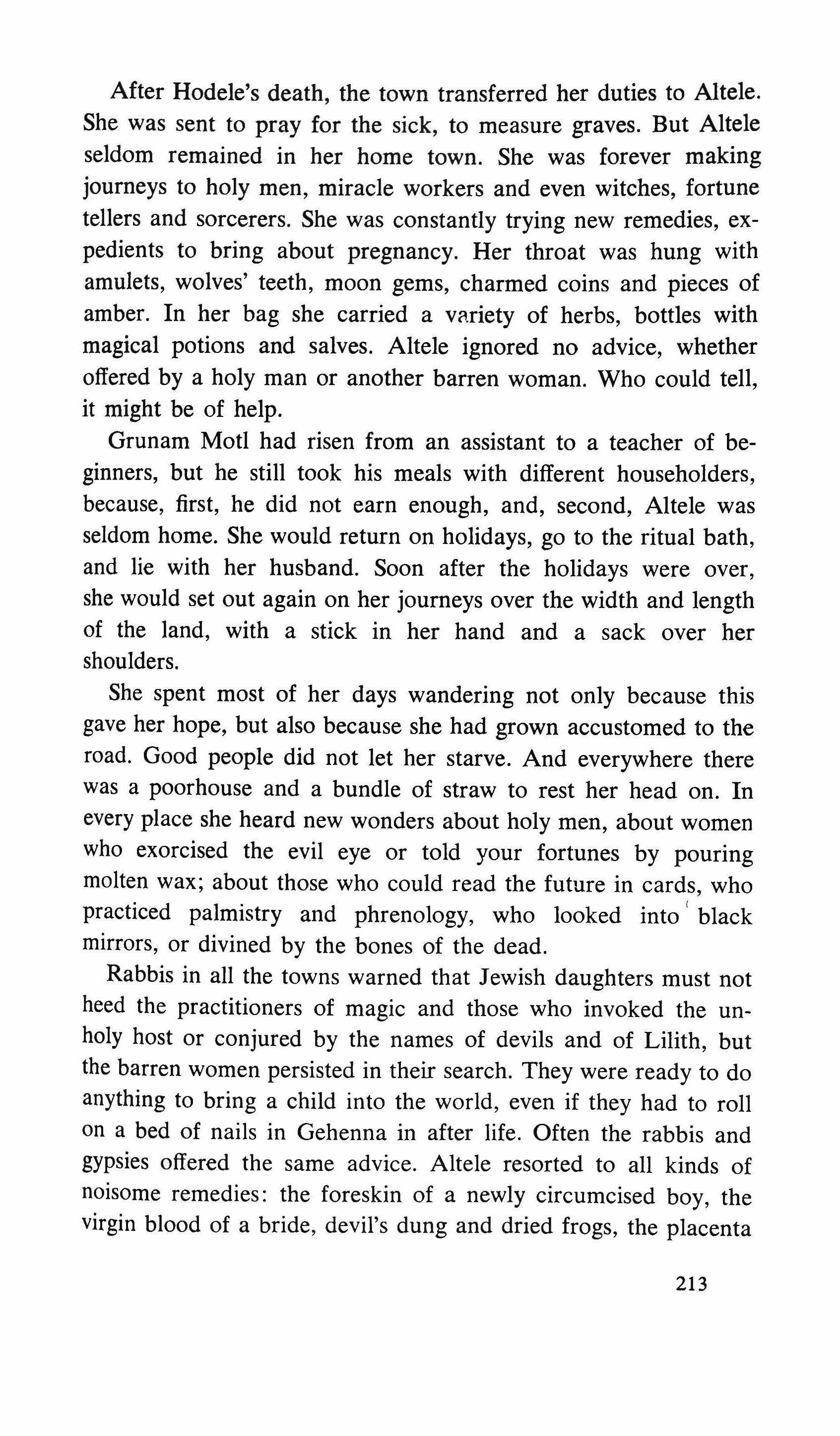
After Hodele's death, the town transferred her duties to Altele. She was sent to pray for the sick, to measure graves. But Altele seldom remained in her home town. She was forever making journeys to holy men, miracle workers and even witches, fortune tellers and sorcerers. She was constantly trying new remedies, expedients to bring about pregnancy. Her throat was hung with amulets, wolves' teeth, moon gems, charmed coins and pieces of amber. In her bag she carried a variety of herbs, bottles with magical potions and salves. Altele ignored no advice, whether offered by a holy man or another barren woman. Who could tell, it might be of help.
Grunam Motl had risen from an assistant to a teacher of beginners, but he still took his meals with different householders, because, first, he did not earn enough, and, second, Altele was seldom home. She would return on holidays, go to the ritual bath, and lie with her husband. Soon after the holidays were over, she would set out again on her journeys over the width and length of the land, with a stick in her hand and a sack over her shoulders.
She spent most of her days wandering not only because this gave her hope, but also because she had grown accustomed to the road. Good people did not let her starve. And everywhere there was a poorhouse and a bundle of straw to rest her head on. In every place she heard new wonders about holy men, about women who exorcised the evil eye or told your fortunes by pouring molten wax; about those who could read the future in cards, who practiced palmistry and phrenology, who looked into ( black mirrors, or divined by the bones of the dead.
Rabbis in all the towns warned that Jewish daughters must not heed the practitioners of magic and those who invoked the unholy host or conjured by the names of devils and of Lilith, but the barren women persisted in their search. They were ready to do anything to bring a child into the world, even if they had to roll on a bed of nails in Gehenna in after life. Often the rabbis and gypsies offered the same advice. Altele resorted to all kinds of noisome remedies: the foreskin of a newly circumcised boy, the virgin blood of a bride, devil's dung and dried frogs, the placenta
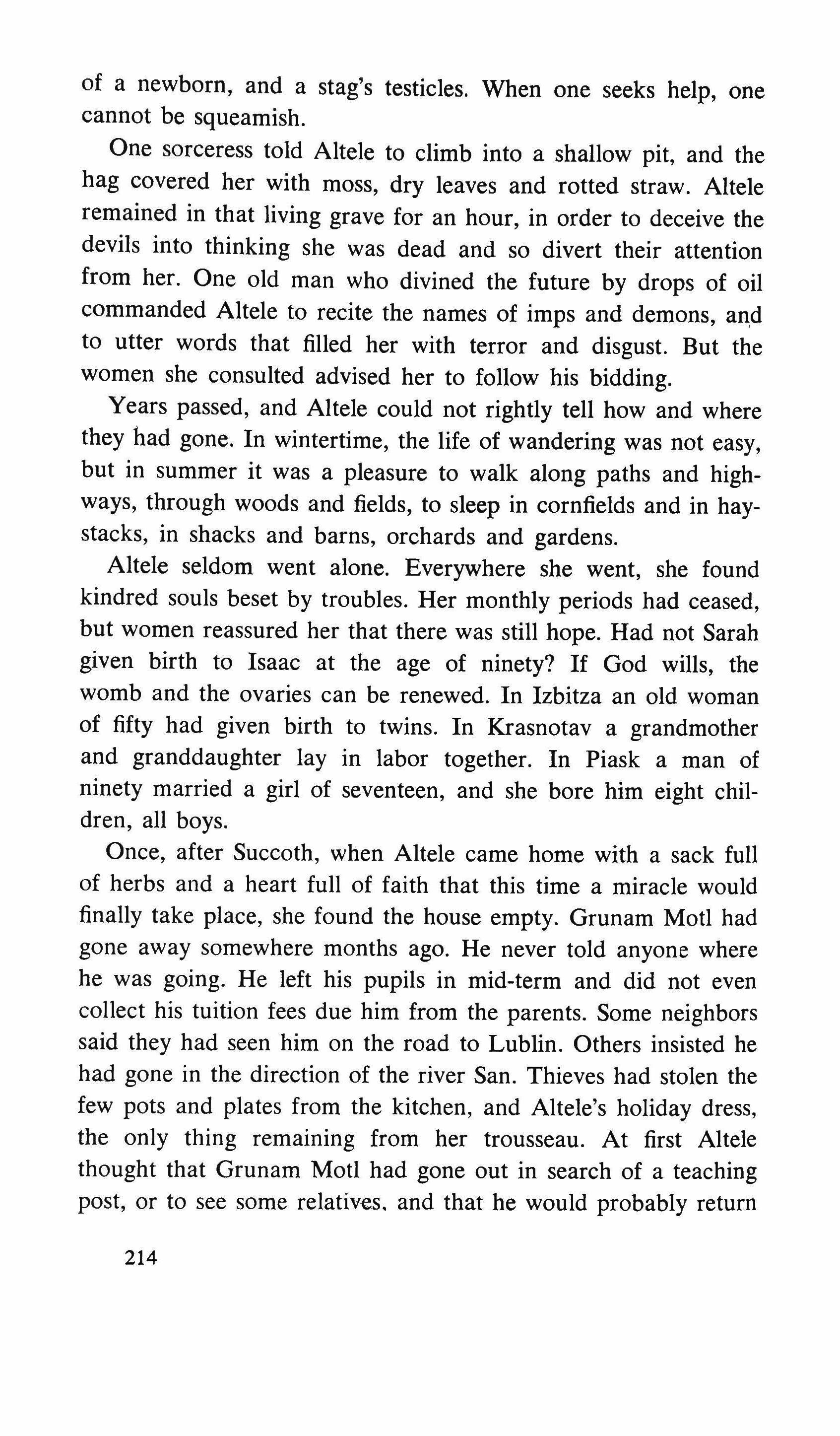
of a newborn, and a stag's testicles. When one seeks help, one cannot be squeamish.
One sorceress told Altele to climb into a shallow pit, and the hag covered her with moss, dry leaves and rotted straw. Altele remained in that living grave for an hour, in order to deceive the devils into thinking she was dead and so divert their attention from her. One old man who divined the future by drops of oil commanded Altele to recite the names of imps and demons, and to utter words that filled her with terror and disgust. But the women she consulted advised her to follow his bidding.
Years passed, and Altele could not rightly tell how and where they had gone. In wintertime, the life of wandering was not easy, but in summer it was a pleasure to walk along paths and highways, through woods and fields, to sleep in cornfields and in haystacks, in shacks and barns, orchards and gardens.
Altele seldom went alone. Everywhere she went, she found kindred souls beset by troubles. Her monthly periods had ceased, but women reassured her that there was still hope. Had not Sarah given birth to Isaac at the age of ninety? If God wills, the womb and the ovaries can be renewed. In Izbitza an old woman of fifty had given birth to twins. In Krasnotav a grandmother and granddaughter lay in labor together. In Piask a man of ninety married a girl of seventeen, and she bore him eight children, all boys.
Once, after Succoth, when Altele came home with a sack full of herbs and a heart full of faith that this time a miracle would finally take place, she found the house empty. Grunam Motl had gone away somewhere months ago. He never told anyone where he was going. He left his pupils in mid-term and did not even collect his tuition fees due him from the parents. Some neighbors said they had seen him on the road to Lublin. Others insisted he had gone in the direction of the river San. Thieves had stolen the few pots and plates from the kitchen, and Altele's holiday dress, the only thing remaining from her trousseau. At first Altele thought that Grunam Mot! had gone out in search of a teaching post, or to see some relatives. and that he would probably return
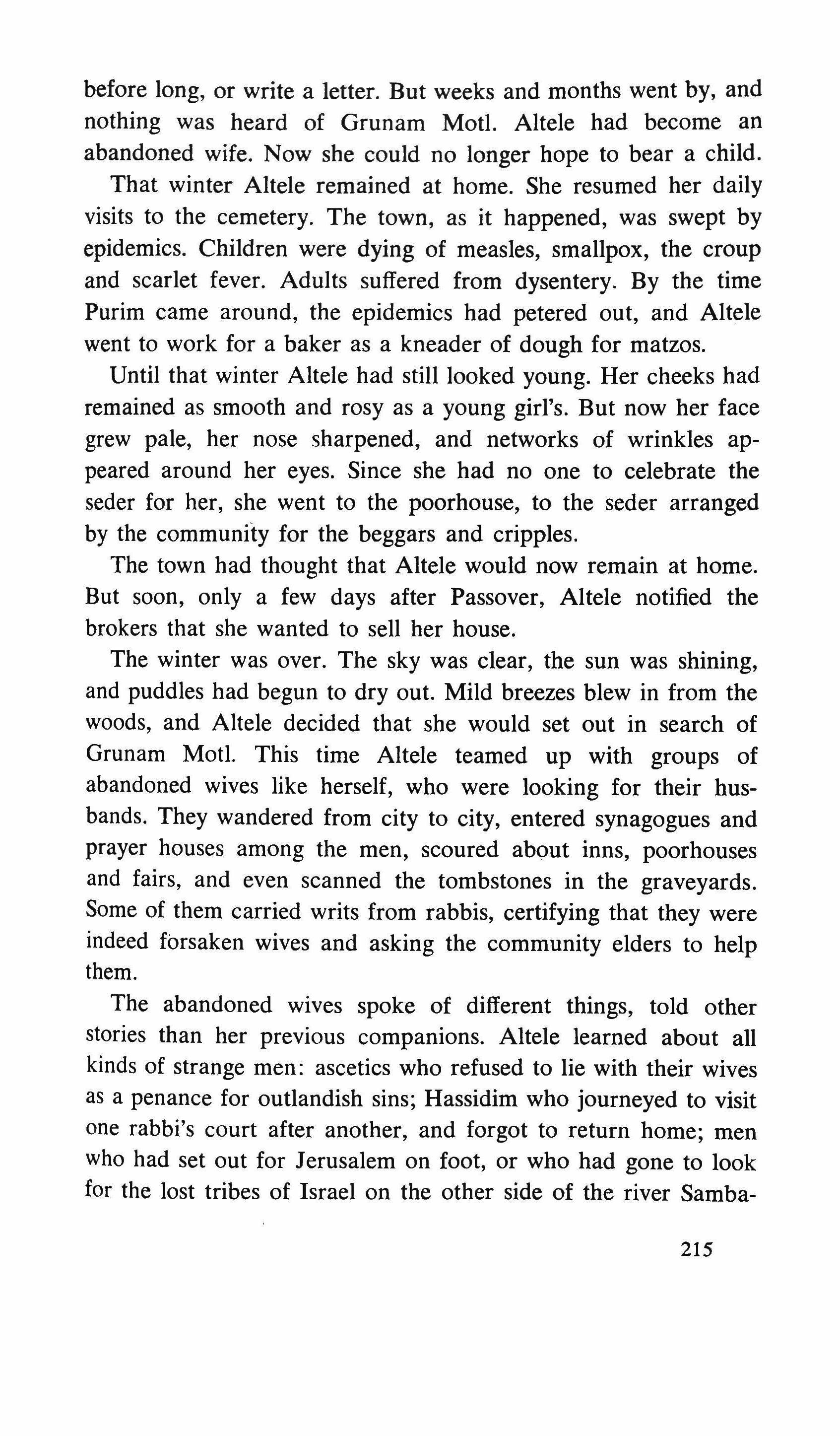
before long, or write a letter. But weeks and months went by, and nothing was heard of Grunam Motl. Altele had become an abandoned wife. Now she could no longer hope to bear a child.
That winter Altele remained at home. She resumed her daily visits to the cemetery. The town, as it happened, was swept by epidemics. Children were dying of measles, smallpox, the croup and scarlet fever. Adults suffered from dysentery. By the time Purim came around, the epidemics had petered out, and Altele went to work for a baker as a kneader of dough for matzos.
Until that winter Altele had still looked young. Her cheeks had remained as smooth and rosy as a young girl's. But now her face grew pale, her nose sharpened, and networks of wrinkles appeared around her eyes. Since she had no one to celebrate the seder for her, she went to the poorhouse, to the seder arranged by the community for the beggars and cripples.
The town had thought that Altele would now remain at home. But soon, only a few days after Passover, Altele notified the brokers that she wanted to sell her house.
The winter was over. The sky was clear, the sun was shining, and puddles had begun to dry out. Mild breezes blew in from the woods, and Altele decided that she would set out in search of Grunam Motl. This time Altele teamed up with groups of abandoned wives like herself, who were looking for their husbands. They wandered from city to city, entered synagogues and prayer houses among the men, scoured about inns, poorhouses and fairs, and even scanned the tombstones in the graveyards. Some of them carried writs from rabbis, certifying that they were indeed forsaken wives and asking the community elders to help them.
The abandoned wives spoke of different things, told other stories than her previous companions. Altele learned about all kinds of strange men: ascetics who refused to lie with their wives as a penance for outlandish sins; Hassidim who journeyed to visit one rabbi's court after another, and forgot to return home; men who had set out for Jerusalem on foot, or who had gone to look for the lost tribes of Israel on the other side of the river Samba-
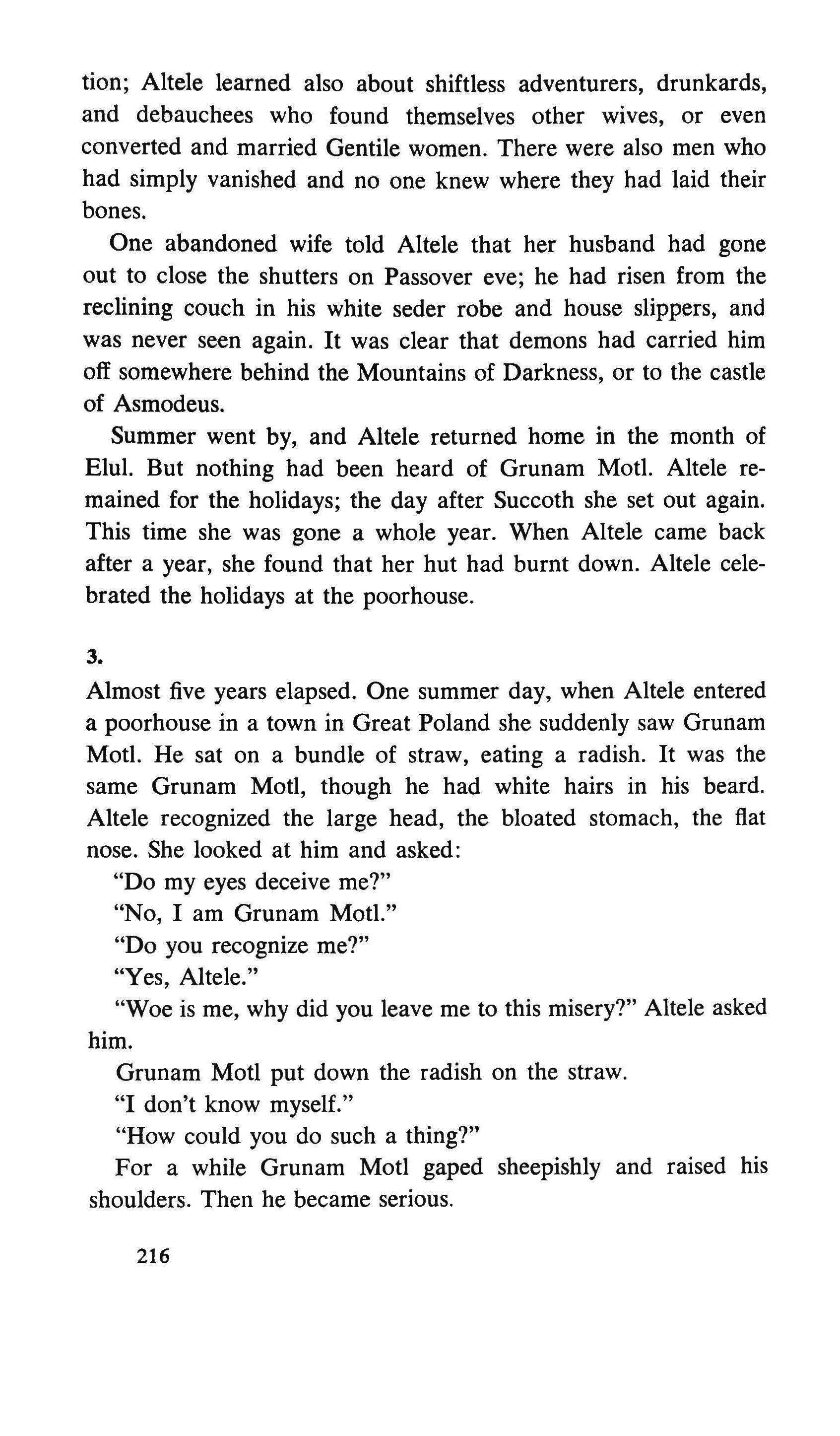
tion; Altele learned also about shiftless adventurers, drunkards, and debauchees who found themselves other wives, or even converted and married Gentile women. There were also men who had simply vanished and no one knew where they had laid their bones.
One abandoned wife told Altele that her husband had gone out to close the shutters on Passover eve; he had risen from the reclining couch in his white seder robe and house slippers, and was never seen again. It was clear that demons had carried him off somewhere behind the Mountains of Darkness, or to the castle of Asmodeus.
Summer went by, and Altele returned home in the month of Elul, But nothing had been heard of Grunam Motl. Altele remained for the holidays; the day after Succoth she set out again. This time she was gone a whole year. When Altele came back after a year, she found that her hut had burnt down. Altele celebrated the holidays at the poorhouse.
3.
Almost five years elapsed. One summer day, when Altele entered a poorhouse in a town in Great Poland she suddenly saw Grunam Motl. He sat on a bundle of straw, eating a radish. It was the same Grunam Motl, though he had white hairs in his beard. Altele recognized the large head, the bloated stomach, the flat nose. She looked at him and asked:
"Do my eyes deceive me?"
"No, 1 am Grunam Motl."
"Do you recognize me?"
"Yes, Altele."
"Woe is me, why did you leave me to this misery?" Altele asked him.
Grunam Motl put down the radish on the straw.
"I don't know myself."
"How could you do such a thing?"
For a while Grunam Motl gaped sheepishly and raised his shoulders. Then he became serious.
216
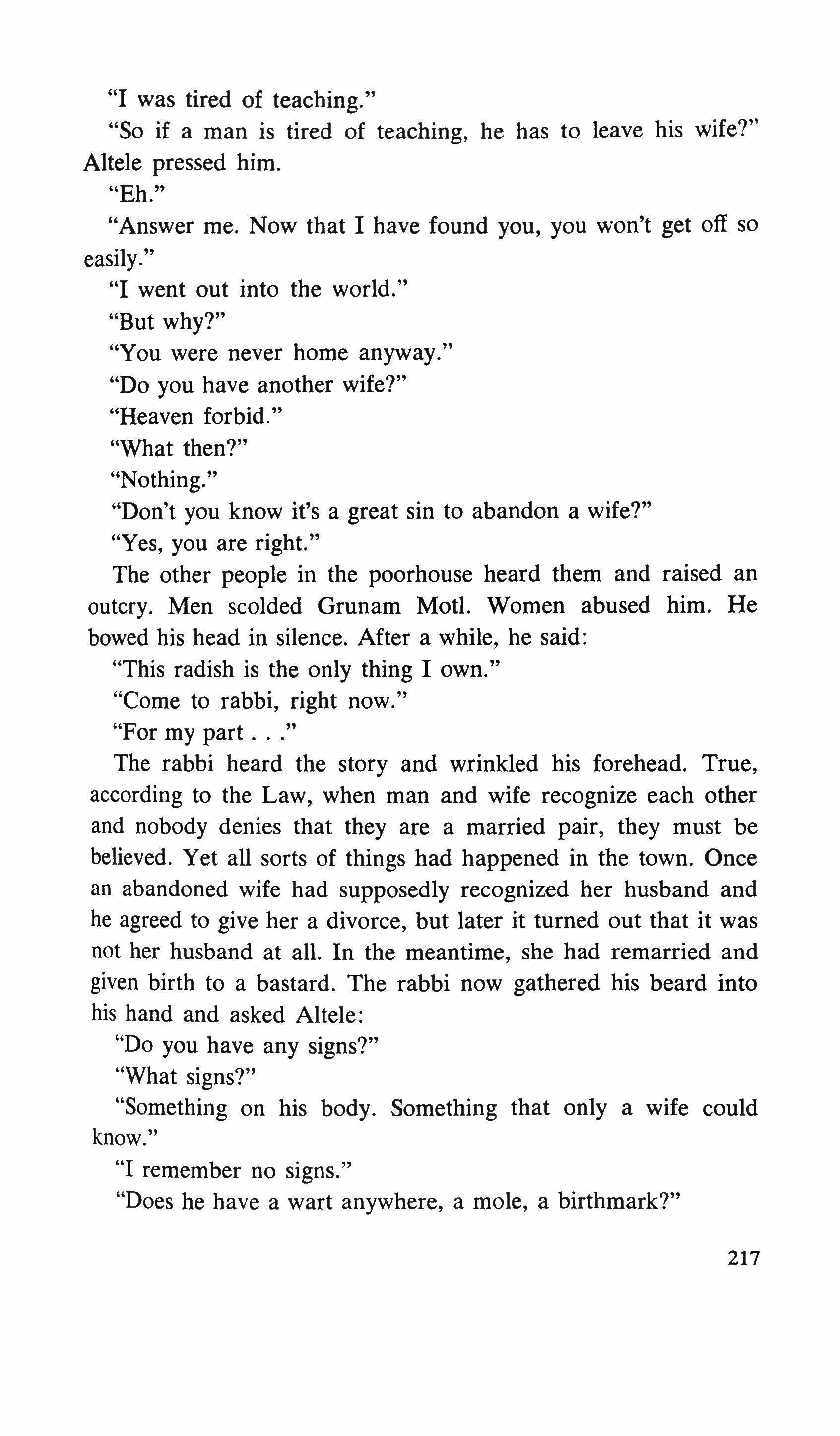
"I was tired of teaching."
"So if a man is tired of teaching, he has to leave his wife?" Altele pressed him.
"Eh."
"Answer me. Now that I have found you, you won't get off so easily."
"I went out into the world."
"But why?"
"You were never home anyway."
"Do you have another wife?"
"Heaven forbid."
"What then?"
"Nothing."
"Don't you know it's a great sin to abandon a wife?"
"Yes, you are right."
The other people in the poorhouse heard them and raised an outcry. Men scolded Grunam Motl. Women abused him. He bowed his head in silence. After a while, he said:
"This radish is the only thing I own."
"Come to rabbi, right now."
"For my part
The rabbi heard the story and wrinkled his forehead. True, according to the Law, when man and wife recognize each other and nobody denies that they are a married pair, they must be believed. Yet all sorts of things had happened in the town. Once an abandoned wife had supposedly recognized her husband and he agreed to give her a divorce, but later it turned out that it was not her husband at all. In the meantime, she had remarried and given birth to a bastard. The rabbi now gathered his beard into his hand and asked Altele:
"Do you have any signs?"
"What signs?"
"Something on his body. Something that only a wife could know."
"I remember no signs."
"Does he have a wart anywhere, a mole, a birthmark?"
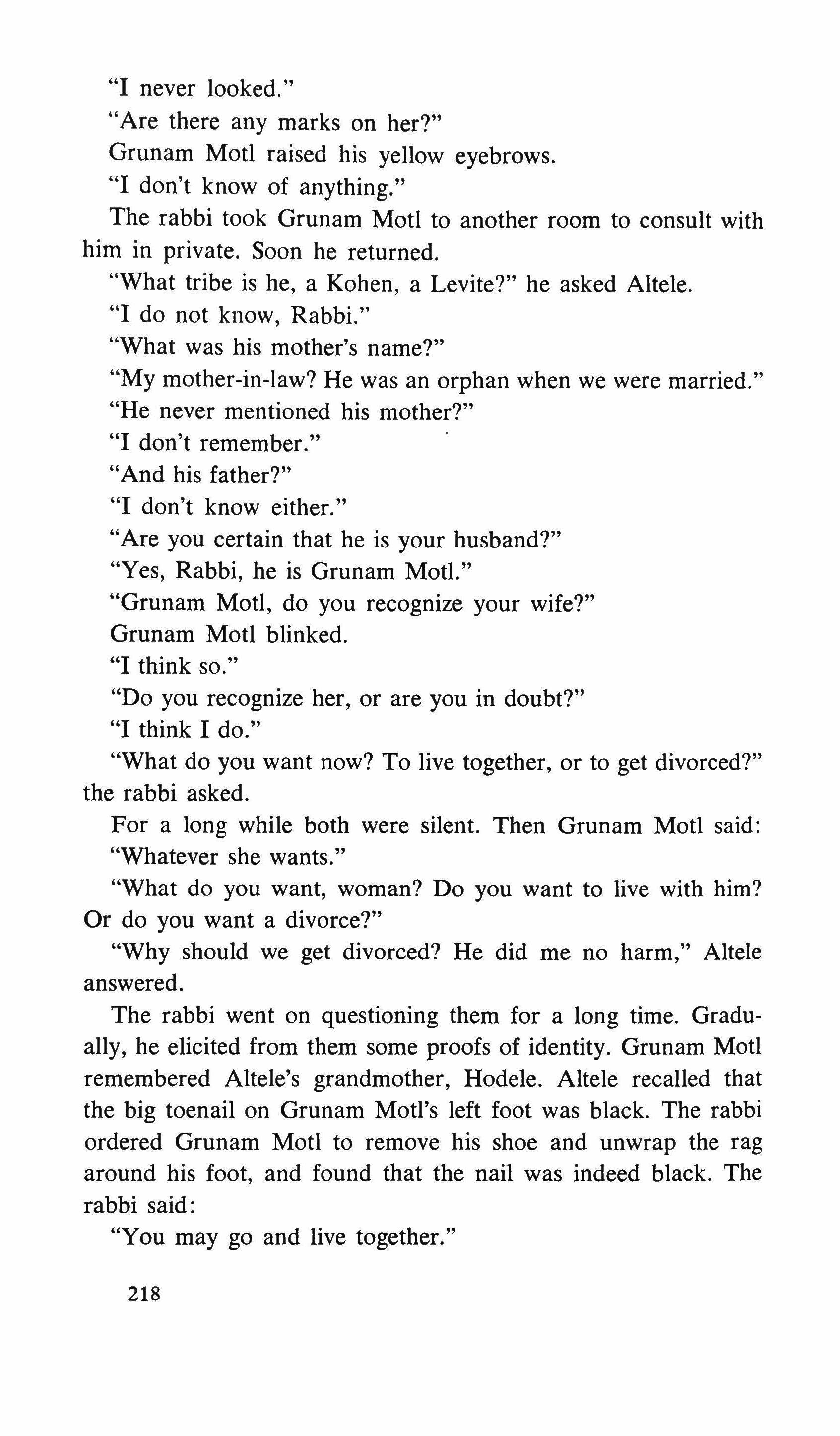
"I never looked."
"Are there any marks on her?"
Grunam Motl raised his yellow eyebrows.
"I don't know of anything."
The rabbi took Grunam Motl to another room to consult with him in private. Soon he returned.
"What tribe is he, a Kohen, a Levite?" he asked Altele.
"I do not know, Rabbi."
"What was his mother's name?"
"My mother-in-law? He was an orphan when we were married."
"He never mentioned his mother?"
"I don't remember."
"And his father?"
"I don't know either."
"Are you certain that he is your husband?"
"Yes, Rabbi, he is Grunam Motl."
"Grunam Motl, do you recognize your wife?"
Grunam Mot} blinked.
"I think so."
"Do you recognize her, or are you in doubt?"
"I think I do."
"What do you want now? To live together, or to get divorced?" the rabbi asked.
For a long while both were silent. Then Grunam Mot} said: "Whatever she wants."
"What do you want, woman? Do you want to live with him? Or do you want a divorce?"
"Why should we get divorced? He did me no harm," Altele answered.
The rabbi went on questioning them for a long time. Gradually, he elicited from them some proofs of identity. Grunam Motl remembered Altele's grandmother, Hodele. Altele recalled that the big toenail on Grunam Motl's left foot was black. The rabbi ordered Grunam Mot} to remove his shoe and unwrap the rag around his foot, and found that the nail was indeed black. The rabbi said:
"You may go and live together."
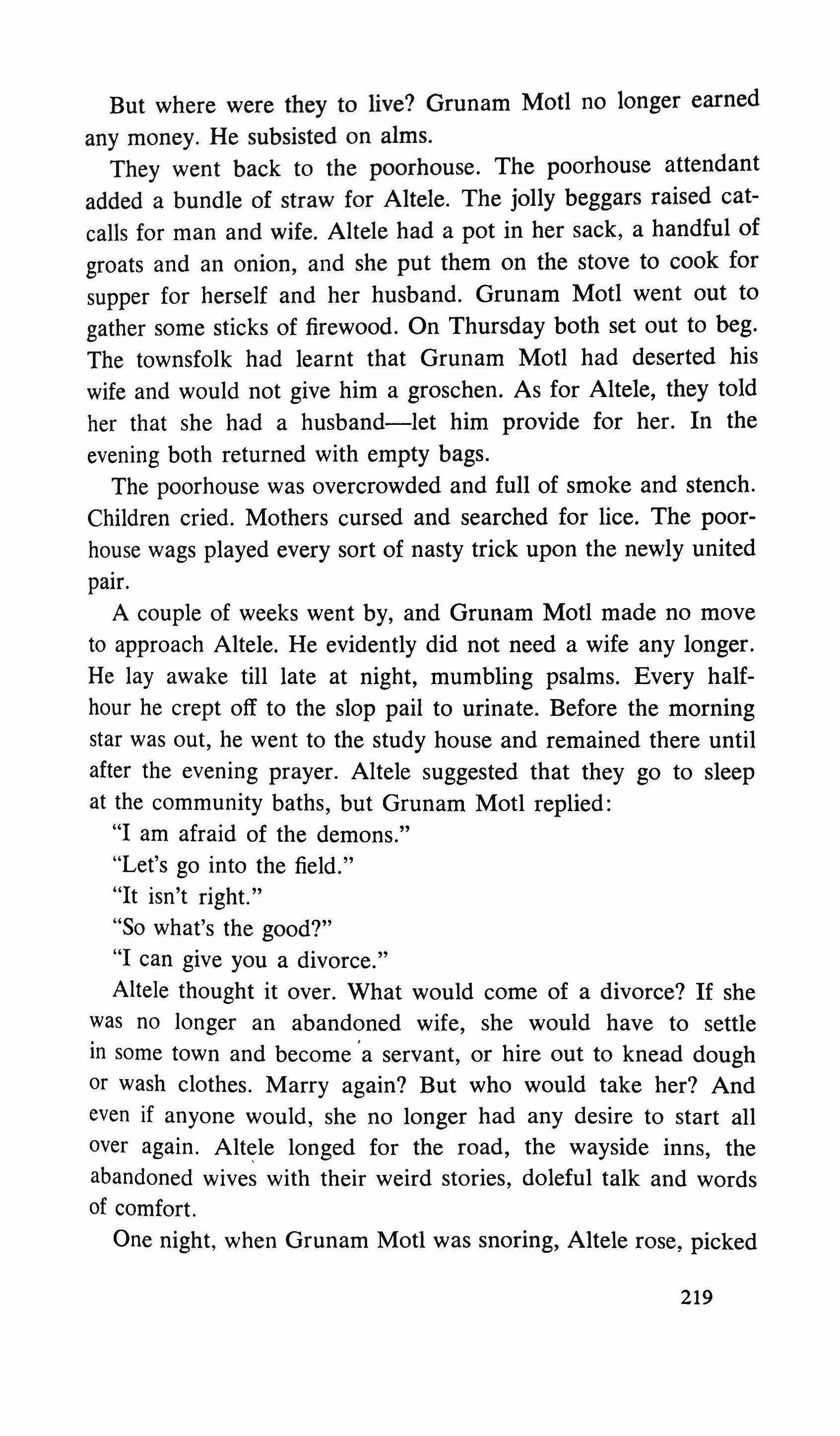
But where were they to live? Grunam Motl no longer earned any money. He subsisted on alms.
They went back to the poorhouse. The poorhouse attendant added a bundle of straw for Altele. The jolly beggars raised catcalls for man and wife. Altele had a pot in her sack, a handful of groats and an onion, and she put them on the stove to cook for supper for herself and her husband. Grunam Motl went out to gather some sticks of firewood. On Thursday both set out to beg. The townsfolk had learnt that Grunam Motl had deserted his wife and would not give him a groschen. As for Altele, they told her that she had a husband-let him provide for her. In the evening both returned with empty bags.
The poorhouse was overcrowded and full of smoke and stench. Children cried. Mothers cursed and searched for lice. The poorhouse wags played every sort of nasty trick upon the newly united parr.
A couple of weeks went by, and Grunam Motl made no move to approach Altele. He evidently did not need a wife any longer. He lay awake till late at night, mumbling psalms. Every halfhour he crept off to the slop pail to urinate. Before the morning star was out, he went to the study house and remained there until after the evening prayer. Altele suggested that they go to sleep at the community baths, but Grunam Motl replied:
"I am afraid of the demons."
"Let's go into the field."
"It isn't right."
"So what's the good?"
"I can give you a divorce."
Altele thought it over. What would come of a divorce? If she was no longer an abandoned wife, she would have to settle in some town and become 'a servant, or hire out to knead dough or wash clothes. Marry again? But who would take her? And even if anyone would, she no longer had any desire to start all over again. Altele longed for the road, the wayside inns, the abandoned wives with their weird stories, doleful talk and words of comfort.
One night, when Grunam Motl was snoring, Altele rose, picked
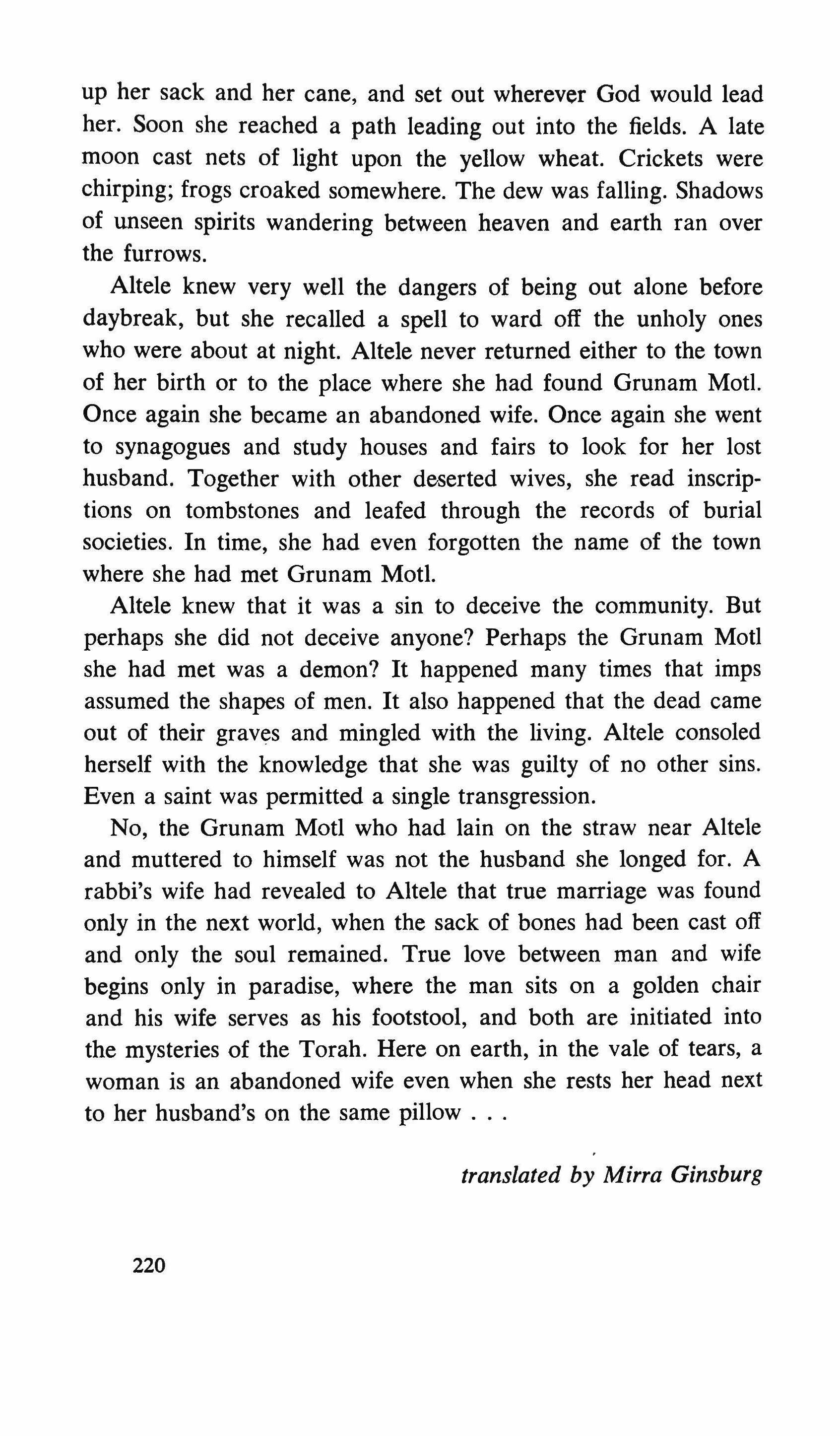
up her sack and her cane, and set out wherever God would lead her. Soon she reached a path leading out into the fields. A late moon cast nets of light upon the yellow wheat. Crickets were chirping; frogs croaked somewhere. The dew was falling. Shadows of unseen spirits wandering between heaven and earth ran over the furrows.
Altele knew very well the dangers of being out alone before daybreak, but she recalled a spell to ward off the unholy ones who were about at night. Altele never returned either to the town of her birth or to the place where she had found Grunam Motl. Once again she became an abandoned wife. Once again she went to synagogues and study houses and fairs to look for her lost husband. Together with other deserted wives, she read inscriptions on tombstones and leafed through the records of burial societies. In time, she had even forgotten the name of the town where she had met Grunam Motl.
Altele knew that it was a sin to deceive the community. But perhaps she did not deceive anyone? Perhaps the Grunam Motl she had met was a demon? It happened many times that imps assumed the shapes of men. It also happened that the dead came out of their graves and mingled with the living. Altele consoled herself with the knowledge that she was guilty of no other sins. Even a saint was permitted a single transgression.
No, the Grunam Motl who had lain on the straw near Altele and muttered to himself was not the husband she longed for. A rabbi's wife had revealed to Altele that true marriage was found only in the next world, when the sack of bones had been cast off and only the soul remained. True love between man and wife begins only in paradise, where the man sits on a golden chair and his wife serves as his footstool, and both are initiated into the mysteries of the Torah. Here on earth, in the vale of tears, a woman is an abandoned wife even when she rests her head next to her husband's on the same pillow
translated by Mirra Ginsburg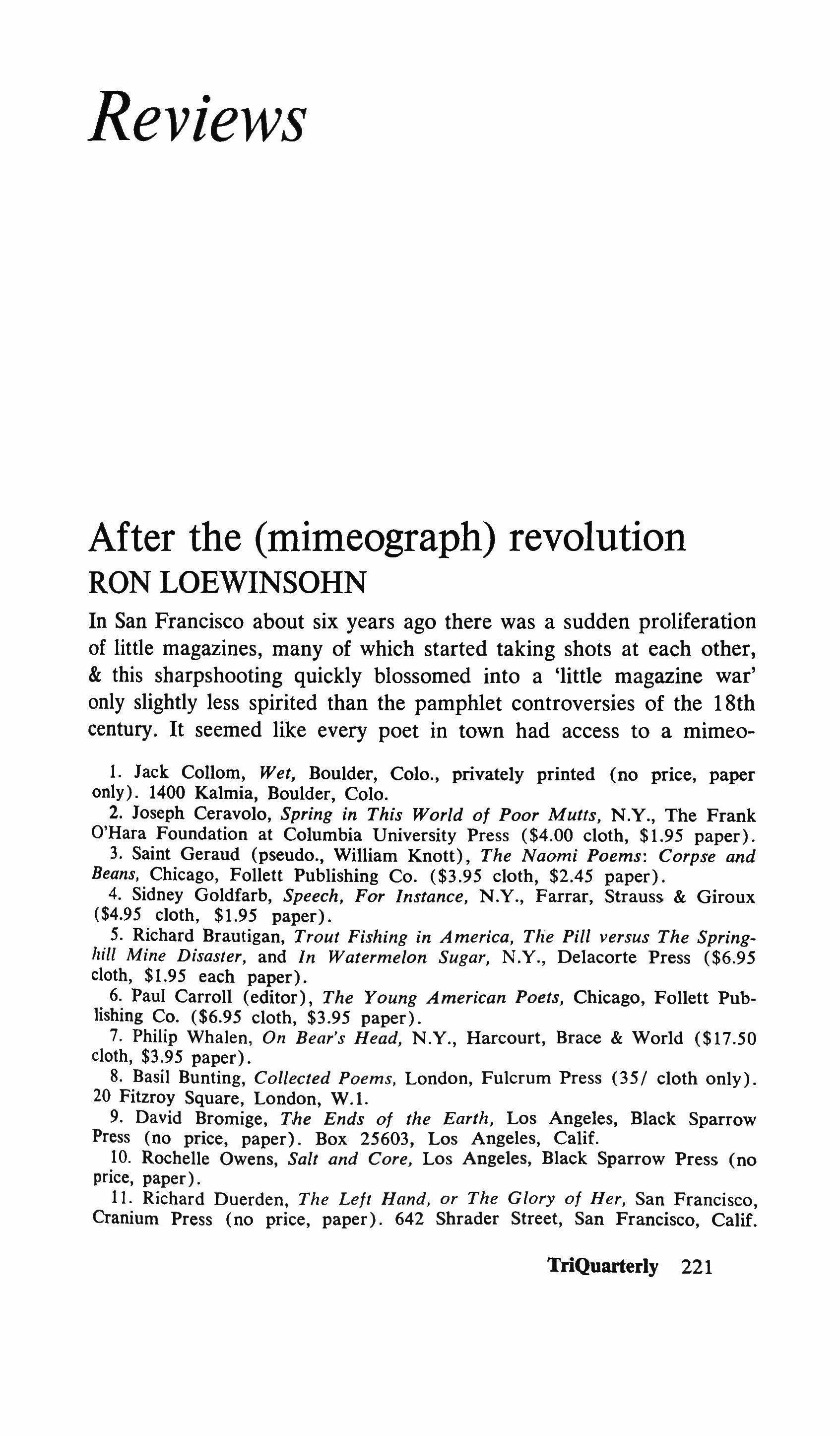
In San Francisco about six years ago there was a sudden proliferation of little magazines, many of which started taking shots at each other, & this sharpshooting quickly blossomed into a 'little magazine war' only slightly less spirited than the pamphlet controversies of the 18th century. It seemed like every poet in town had access to a mimeo-
1. Jack Collom, Wet, Boulder, Colo., privately printed (no price, paper only). 1400 Kalmia, Boulder, Colo.
2. Joseph Ceravolo, Spring in This World of Poor Mutts, N.Y., The Frank O'Hara Foundation at Columbia University Press ($4.00 cloth, $1.95 paper).
3. Saint Geraud (pseudo., William Knott), The Naomi Poems: Corpse and Beans, Chicago, Follett Publishing Co. ($3.95 cloth, $2.45 paper).
4. Sidney Goldfarb, Speech, For Instance, N.Y., Farrar, Strauss & Giroux ($4.95 cloth, $1.95 paper).
5. Richard Brautigan, Trout Fishing in America, The Pill versus The Springhill Mine Disaster, and In Watermelon Sugar, N.Y., Delacorte Press ($6.95 cloth, $1.95 each paper).
6. Paul Carroll (editor), The Young American Poets, Chicago, Follett Publishing Co. ($6.95 cloth, $3.95 paper).
7. Philip Whalen, On Bear's Head, N.Y., Harcourt, Brace & World ($17.50 cloth, $3.95 paper).
8. Basil Bunting, Collected Poems, London, Fulcrum Press (35/ cloth only). 20 Fitzroy Square, London, W.1.
9. David Bromige, The Ends of the Earth, Los Angeles, Black Sparrow Press (no price, paper). Box 25603, Los Angeles, Calif.
10. Rochelle Owens, Salt and Core, Los Angeles, Black Sparrow Press (no price, paper).
I!. Richard Duerden, The Left Hand, or The Glory of Her, San Francisco, Cranium Press (no price, paper). 642 Shrader Street, San Francisco, Calif.
TriQuarterly 221
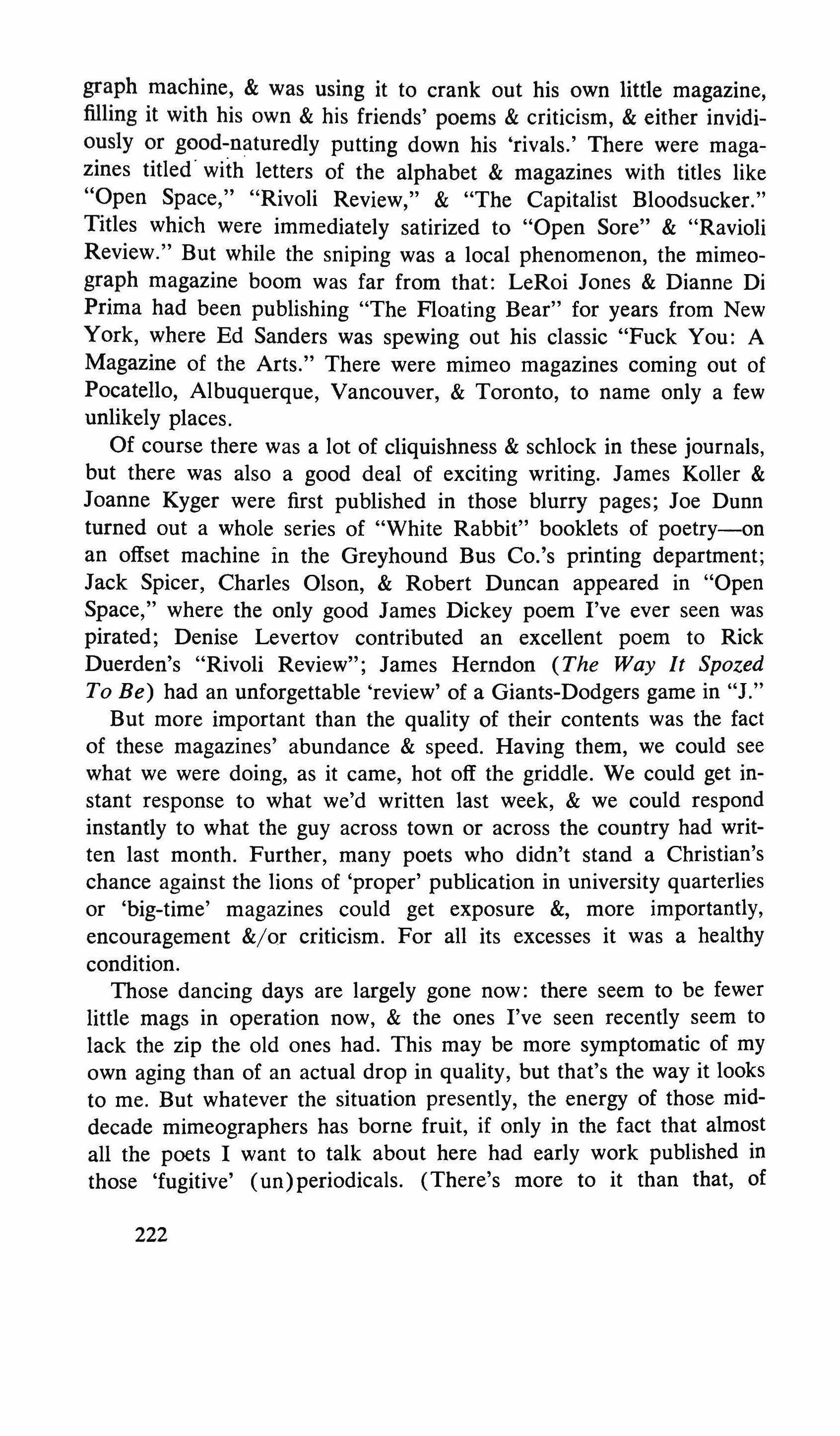
graph machine, & was using it to crank out his own little magazine, filling it with his own & his friends' poems & criticism, & either invidiously or good-naturedly putting down his 'rivals.' There were magazines titled' with letters of the alphabet & magazines with titles like "Open Space," "Rivoli Review," & "The Capitalist Bloodsucker." Titles which were immediately satirized to "Open Sore" & "Ravioli Review." But while the sniping was a local phenomenon, the mimeograph magazine boom was far from that: LeRoi Jones & Dianne Di Prima had been publishing "The Floating Bear" for years from New York, where Ed Sanders was spewing out his classic "Fuck You: A Magazine of the Arts." There were mimeo magazines coming out of Pocatello, Albuquerque, Vancouver, & Toronto, to name only a few unlikely places.
Of course there was a lot of cliquishness & schlock in these journals, but there was also a good deal of exciting writing. James Koller & Joanne Kyger were first published in those blurry pages; Joe Dunn turned out a whole series of "White Rabbit" booklets of poetry-on an offset machine in the Greyhound Bus Co.'s printing department; Jack Spicer, Charles Olson, & Robert Duncan appeared in "Open Space," where the only good James Dickey poem I've ever seen was pirated; Denise Levertov contributed an excellent poem to Rick Duerden's "Rivoli Review"; James Herndon (The Way It Spozed To Be) had an unforgettable 'review' of a Giants-Dodgers game in "J."
But more important than the quality of their contents was the fact of these magazines' abundance & speed. Having them, we could see what we were doing, as it came, hot off the griddle. We could get instant response to what we'd written last week, & we could respond instantly to what the guy across town or across the country had written last month. Further, many poets who didn't stand a Christian's chance against the lions of 'proper' publication in university quarterlies or 'big-time' magazines could get exposure &, more importantly, encouragement &jor criticism. For all its excesses it was a healthy condition.
Those dancing days are largely gone now: there seem to be fewer little mags in operation now, & the ones I've seen recently seem to lack the zip the old ones had. This may be more symptomatic of my own aging than of an actual drop in quality, but that's the way it looks to me. But whatever the situation presently, the energy of those middecade mimeographers has borne fruit, if only in the fact that almost all the poets I want to talk about here had early work published in those 'fugitive' (un)periodicals. (There's more to it than that, of
222
course: a community of poets was established which, while it held together, was a valuable, nourishing culture.)
But even tho 'big-time' publishing in America has loosened upthe mass media have become almost scarily efficient, quickened their reflexes, & will now print virtually unknown poets---don't think you'll be able to get any accurate sense of the directions right-now American literature is taking by simply reading the "New York Review of Books" or "Evergreen Review." For that you will also have to search out the little magazines & the small, even the mimeograph, publishers.
Jack Collom is a case in point-one of the most exciting young poets around, & almost totally unknown outside the mimeograph subculture. His concern with language is everywhere evident in his first collection, Wet.' He writes three distinct kinds of poems: a more or less conventional poem, of which "Brag" is a good, fun example, in which he brags of having the "second best left-handed set shot in Middle Park," but also of having seen "a small leaf level with my chest." Then he writes poems with rather more tangled syntax, in which he gives us scenes of a domestic life with humor, affection & tenderness, but without sentimentality. In these, his language allows him to shift location & point of view quickly & sharply, as in "Stole." A somewhat longer one of these poems deals with Se-Quo-Yah, the Cherokee who invented an alphabet with which to record his tribe's language, & was almost persecuted to death for his 'black magic.' Finally, he's done some striking linguistic experiments which I'm not sure I can call poems, but which are certainly some of the most interesting things like them I think I've ever seen. Some of these work with single words in sequences or chains, as this section from the middle of an untitled page:
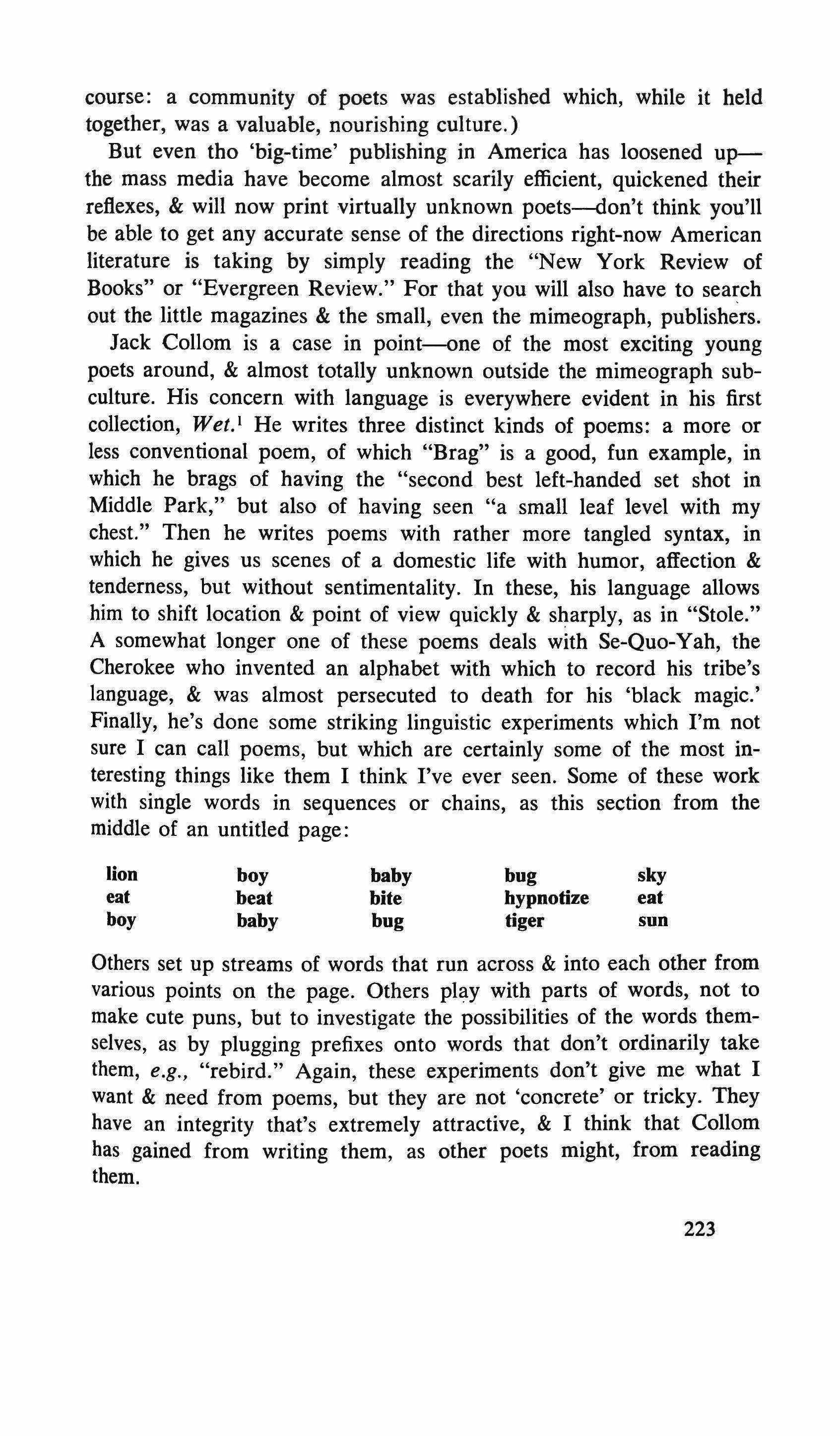
Others set up streams of words that run across & into each other from various points on the page. Others play with parts of words, not to make cute puns, but to investigate the possibilities of the words themselves, as by plugging prefixes onto words that don't ordinarily take them, e.g., "rebird." Again, these experiments don't give me what I want & need from poems, but they are not 'concrete' or tricky. They have an integrity that's extremely attractive, & I think that Collom has gained from writing them, as other poets might, from reading them. 223
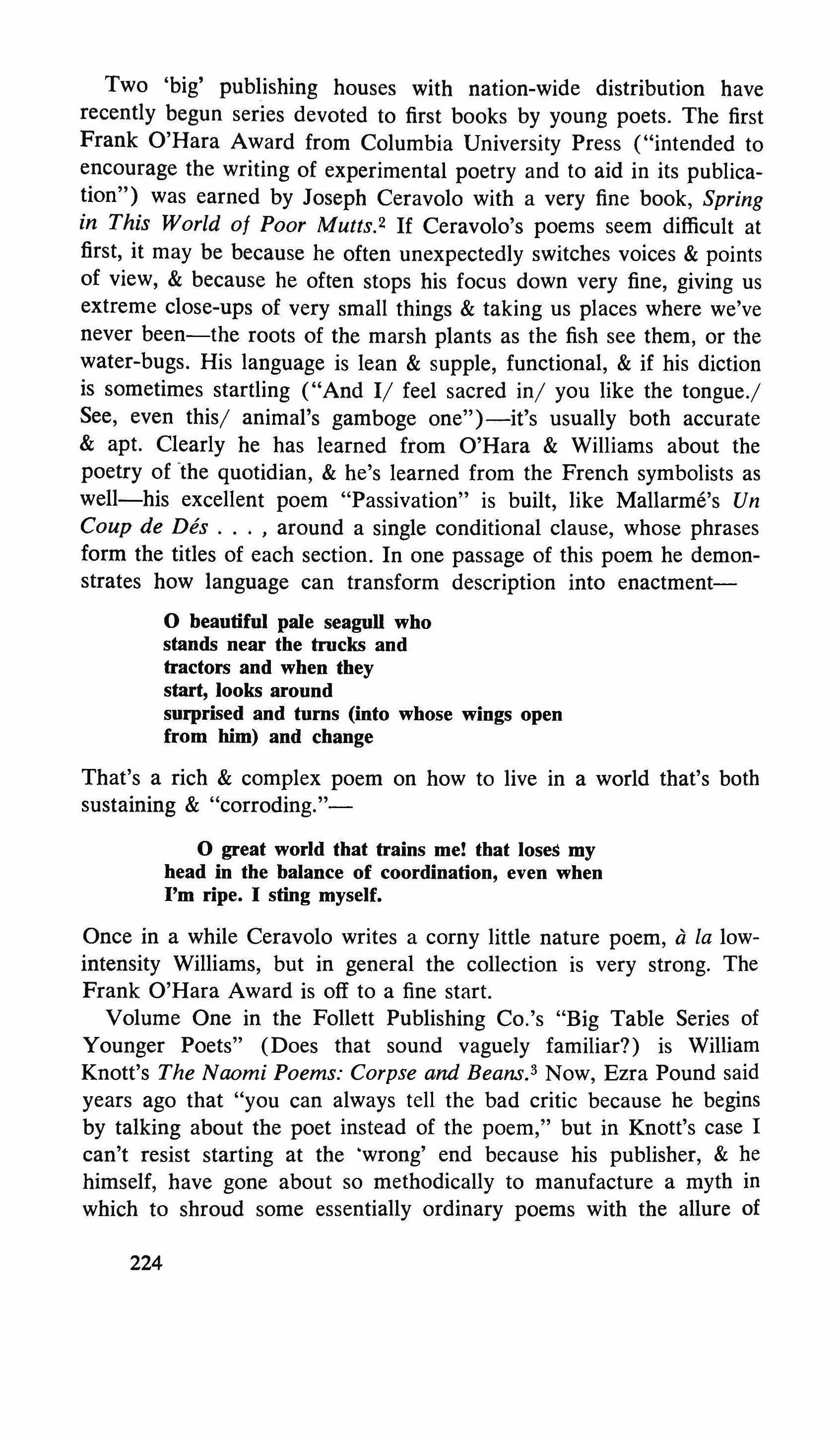
Two 'big' publishing houses with nation-wide distribution have recently begun series devoted to first books by young poets. The first Frank O'Hara Award from Columbia University Press ("intended to encourage the writing of experimental poetry and to aid in its publication") was earned by Joseph Ceravolo with a very fine book, Spring in This World of Poor Mutts.: If Ceravolo's poems seem difficult at first, it may be because he often unexpectedly switches voices & points of view, & because he often stops his focus down very fine, giving us extreme close-ups of very small things & taking us places where we've never been-the roots of the marsh plants as the fish see them, or the water-bugs. His language is lean & supple, functional, & if his diction is sometimes startling ("And 1/ feel sacred in/ you like the tongue./ See, even this/ animal's gamboge one")-it's usually both accurate & apt. Clearly he has learned from O'Hara & Williams about the poetry of 'the quotidian, & he's learned from the French symbolists as well-his excellent poem "Passivation" is built, like Mallarme's Un Coup de Des around a single conditional clause, whose phrases form the titles of each section. In one passage of this poem he demonstrates how language can transform description into enactment-
o beautiful pale seagull who stands near the trucks and tractors and when they start, looks around surprised and turns (into whose wings open from him) and change
That's a rich & complex poem on how to live in a world that's both sustaining & "corroding."-
o great world that trains me! that loses my head in the balance of coordination, even when I'm ripe. I sting myself.
Once in a while Ceravolo writes a corny little nature poem, a la lowintensity Williams, but in general the collection is very strong. The Frank O'Hara Award is off to a fine start.
Volume One in the Follett Publishing Co.'s "Big Table Series of Younger Poets" (Does that sound vaguely familiar?) is William Knott's The Naomi Poems: Corpse and Beans» Now, Ezra Pound said years ago that "you can always tell the bad critic because he begins by talking about the poet instead of the poem," but in Knott's case I can't resist starting at the 'wrong' end because his publisher, & he himself, have gone about so methodically to manufacture a myth in which to shroud some essentially ordinary poems with the allure of

mystery. On the jacket the poet says of himself, "Bill Knott (19401966) is a virgin and a suicide," & the unsigned blurb talks about this "mysterious young Midwestern poet who calls himself Saint Geraud." The editor's foreword tells us that in 1966 Knott sent a mimeographed letter to "poets, critics, and readers of contemporary literature" announcing his own 'suicide' in conventionally mawkish circumstances: orphan, unlaid, tenement room in lonely, bleak North Side Chicago. It all sounds pretty lame, even as a PR gimmick: the eternal adolescent, threatening suicide so that "you'll all miss me when I'm gone." Knott is currently living in New York, incidentally.
But the poems themselves. When I first saw some of them, in TriQuarterly two years ago, I was struck by their intensity, & by their sharp & powerful imagery. But they have not kept well, & seeing a whole book of them is no help. The short poems are meretriciously startling: they seize the attention & sympathy & then fail to engage them, or else trail off into rhetorical fluff. Others are sensational, insisting on sensation for its own sake. Compare either of these poems (much praised in the Middlewest)-
The only response to a child's grave is to lie down hefore it and play dead
Going to sleep, I cross my hands on my chest. They wiD place my hands like this. It will look as though I am flying into myself.
-with these two lines, by a poet who truly thought & grieved about death, the real death of a real child:
For sothe ther fleten to me fele, To thenke hir color so clad in clot.
But Knott really does have some steam & some talent. This poem, for instance-
When we lie awake all night
Saying palm words, no fingertip words
This wound searching us for a voice
Will become a fountain with rooms to let Or a language composed of kisses and leaves
-is a fine, strong thing for the first four lines (Cf. Rilke's Sonnets to Orpheus). But in its two closing lines it collapses into easy imagery & fake surrealism. There are also some anti-Viet Nam War poems
225

here which, if they work at all, work because they are pure rant, & capture that rage & frustration that can't be articulated. I just wish he would spare us the adolescent sentimentality of leaving kisses in the "nests" of his girl's black bra. & I really wish that he & his Backs would turn off the myth machine.
A number of large commercial houses have begun publishing first books by young poets who have not yet been thru the "natural selection process of the little magazines & small presses," as one senior editor put it. One of these first books is Sidney Goldfarb's Speech, For Instance+ In that collection, in a poem called "Customs," Goldfarb tells us, "I have nothing to declare but energy!" But clearly he is smuggling some other things, rare & valuable, which we can all use more of: humor, intelligence, & compassion that doesn't degenerate into sentiment. In a jacket blurb Robert Lowell writes that "Goldfarb has genius," which is true, I suppose, if it means simply that he has a very large talent. But Lowell also says that Goldfarb's lines are short, which is not always true, & that "Goldfarb derives from no one," which isn't true at all. Sidney Goldfarb is a young poet who derives from Whitman via Apollinaire, Williams, & the modern Russian poets. The mixture, however, is fresh & exciting. He has a good ear for conversations which have never occurred outside his poems, which at their best are enactments of affective states, rather than talk about them. Check out the opening of "Moving Breakfast."
I get out of bed without breaking anything I give my daughter Cheerios and bananas for breakfast First I let her stand on the table Then I let her put her foot in the cereal I put on my necktie because I have one I go outside and find myself in Chicago I say, ''Boston, you faker, cut that out!"
He often plays phrases against line-endings in an intricate counterpoint of accent & sense.-
You can stay but you know there's no place for affection, no occasion for comfort in the crossing of ways.
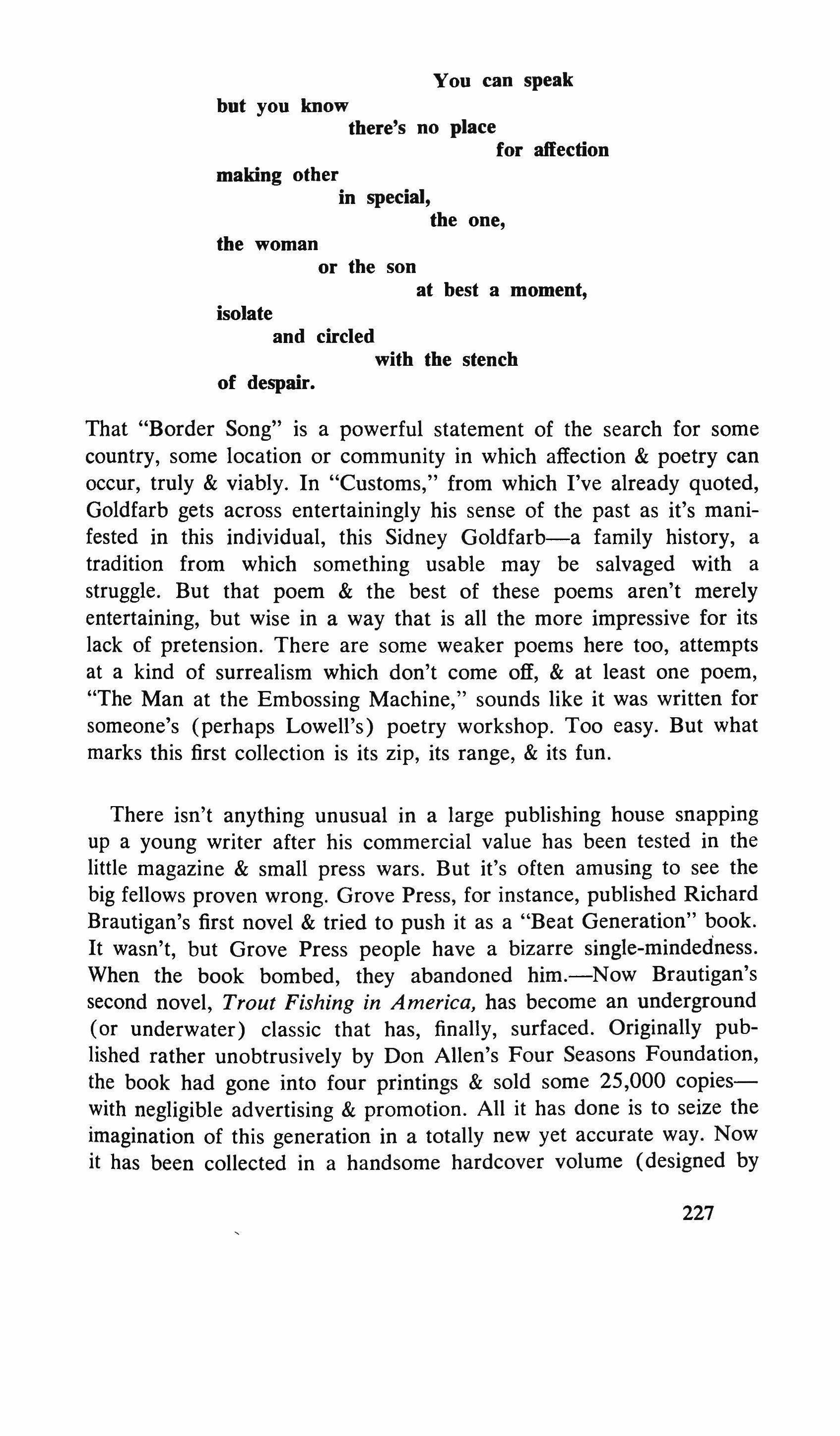
You can speak but you know there's no place for affection making other in special, the one, the woman or the son at best a moment, isolate and circled with the stench of despair.
That "Border Song" is a powerful statement of the search for some country, some location or community in which affection & poetry can occur, truly & viably. In "Customs," from which I've already quoted, Goldfarb gets across entertainingly his sense of the past as it's manifested in this individual, this Sidney Goldfarb-a family history, a tradition from which something usable may be salvaged with a struggle. But that poem & the best of these poems aren't merely entertaining, but wise in a way that is all the more impressive for its lack of pretension. There are some weaker poems here too, attempts at a kind of surrealism which don't come off, & at least one poem, "The Man at the Embossing Machine," sounds like it was written for someone's (perhaps Lowell's) poetry workshop. Too easy. But what marks this first collection is its zip, its range, & its fun.
There isn't anything unusual in a large publishing house snapping up a young writer after his commercial value has been tested in the little magazine & small press wars. But it's often amusing to see the big fellows proven wrong. Grove Press, for instance, published Richard Brautigan's first novel & tried to push it as a "Beat Generation" book. It wasn't, but Grove Press people have a bizarre single-mindedness. When the book bombed, they abandoned him.-Now Brautigan's second novel, Trout Fishing in America, has become an underground (or underwater) classic that has, finally, surfaced. Originally published rather unobtrusively by Don Allen's Four Seasons Foundation, the book had gone into four printings & sold some 25,000 copieswith negligible advertising & promotion. All it has done is to seize the imagination of this generation in a totally new yet accurate way. Now it has been collected in a handsome hardcover volume (designed by 227
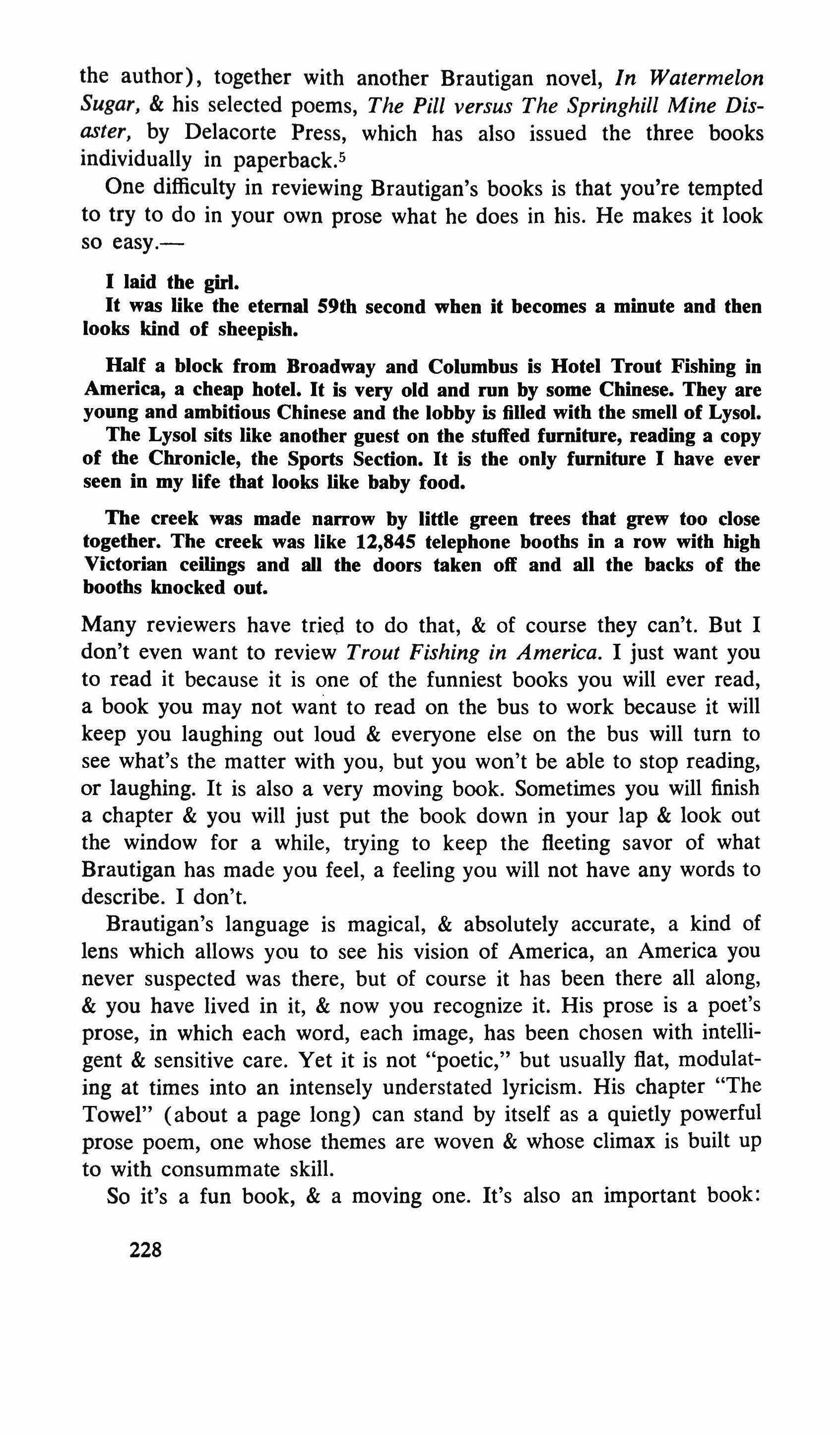
the author), together with another Brautigan novel, In Watermelon Sugar, & his selected poems, The Pill versus The Springhill Mine Disaster, by Delacorte Press, which has also issued the three books individually in paperback.!
One difficulty in reviewing Brautigan's books is that you're tempted to try to do in your own prose what he does in his. He makes it look so easy.-
I laid the girl.
It was like the eternal 59th second when it becomes a minute and then looks kind of sheepish.
Half a block from Broadway and Columbus is Hotel Trout Fishing in America, a cheap hotel. It is very old and run by some Chinese. They are young and ambitious Chinese and the lobby is filled with the smell of Lysol.
The Lysol sits like another guest on the stuffed furniture, reading a copy of the Chronicle, the Sports Section. It is the only furniture I have ever seen in my life that looks like baby food.
The creek was made narrow by little green trees that grew too close together. The creek was like 12,845 telephone booths in a row with high Victorian ceilings and alI the doors taken off and all the backs of the booths knocked out.
Many reviewers have tried to do that, & of course they can't. But I don't even want to review Trout Fishing in America. I just want you to read it because it is one of the funniest books you will ever read, a book you may not want to read on the bus to work because it will keep you laughing out loud & everyone else on the bus will turn to see what's the matter with you, but you won't be able to stop reading, or laughing. It is also a very moving book. Sometimes you will finish a chapter & you will just put the book down in your lap & look out the window for a while, trying to keep the fleeting savor of what Brautigan has made you feel, a feeling you will not have any words to describe. I don't,
Brautigan's language is magical, & absolutely accurate, a kind of lens which allows you to see his vision of America, an America you never suspected was there, but of course it has been there all along, & you have lived in it, & now you recognize it. His prose is a poet's prose, in which each word, each image, has been chosen with intelligent & sensitive care. Yet it is not "poetic," but usually flat, modulating at times into an intensely understated lyricism. His chapter "The Towel" (about a page long) can stand by itself as a quietly powerful prose poem, one whose themes are woven & whose climax is built up to with consummate skill.
So it's a fun book, & a moving one. It's also an important book:
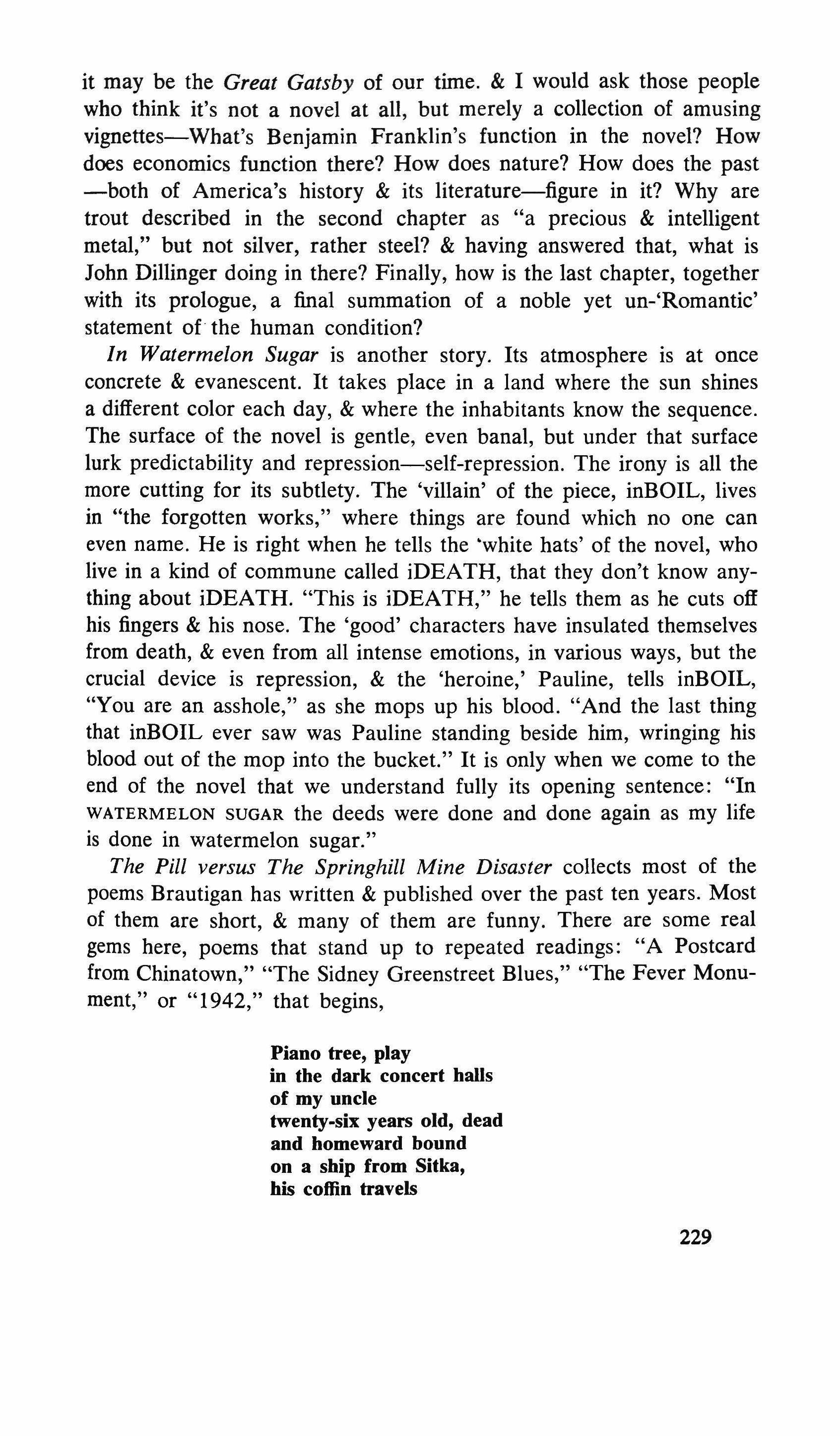
it may be the Great Gatsby of our time. & I would ask those people who think it's not a novel at all, but merely a collection of amusing vignettes-What's Benjamin Franklin's function in the novel? How does economics function there? How does nature? How does the past -both of America's history & its literature-figure in it? Why are trout described in the second chapter as "a precious & intelligent metal," but not silver, rather steel? & having answered that, what is John Dillinger doing in there? Finally, how is the last chapter, together with its prologue, a final summation of a noble yet un-'Romantic' statement of the human condition?
In Watermelon Sugar is another story. Its atmosphere is at once concrete & evanescent. It takes place in a land where the sun shines a different color each day, & where the inhabitants know the sequence. The surface of the novel is gentle, even banal, but under that surface lurk predictability and repression-self-repression. The irony is all the more cutting for its subtlety. The 'villain' of the piece, inBOIL, lives in "the forgotten works," where things are found which no one can even name. He is right when he tells the 'white hats' of the novel, who live in a kind of commune called iDEATH, that they don't know anything about iDEATH. "This is iDEATH," he tells them as he cuts off his fingers & his nose. The 'good' characters have insulated themselves from death, & even from all intense emotions, in various ways, but the crucial device is repression, & the 'heroine,' Pauline, tells inBOIL, "You are an asshole," as she mops up his blood. "And the last thing that inBOIL ever saw was Pauline standing beside him, wringing his blood out of the mop into the bucket." It is only when we come to the end of the novel that we understand fully its opening sentence: "In WATERMELON SUGAR the deeds were done and done again as my life is done in watermelon sugar."
The Pill versus The Springhill Mine Disaster collects most of the poems Brautigan has written & published over the past ten years. Most of them are short, & many of them are funny. There are some real gems here, poems that stand up to repeated readings: "A Postcard from Chinatown," "The Sidney Greenstreet Blues," "The Fever Monument," or "1942," that begins,
Piano tree, play in the dark concert halls of my nncle
twenty-six years old, dead and homeward bonnd on a ship from Sitka, his coffin travels
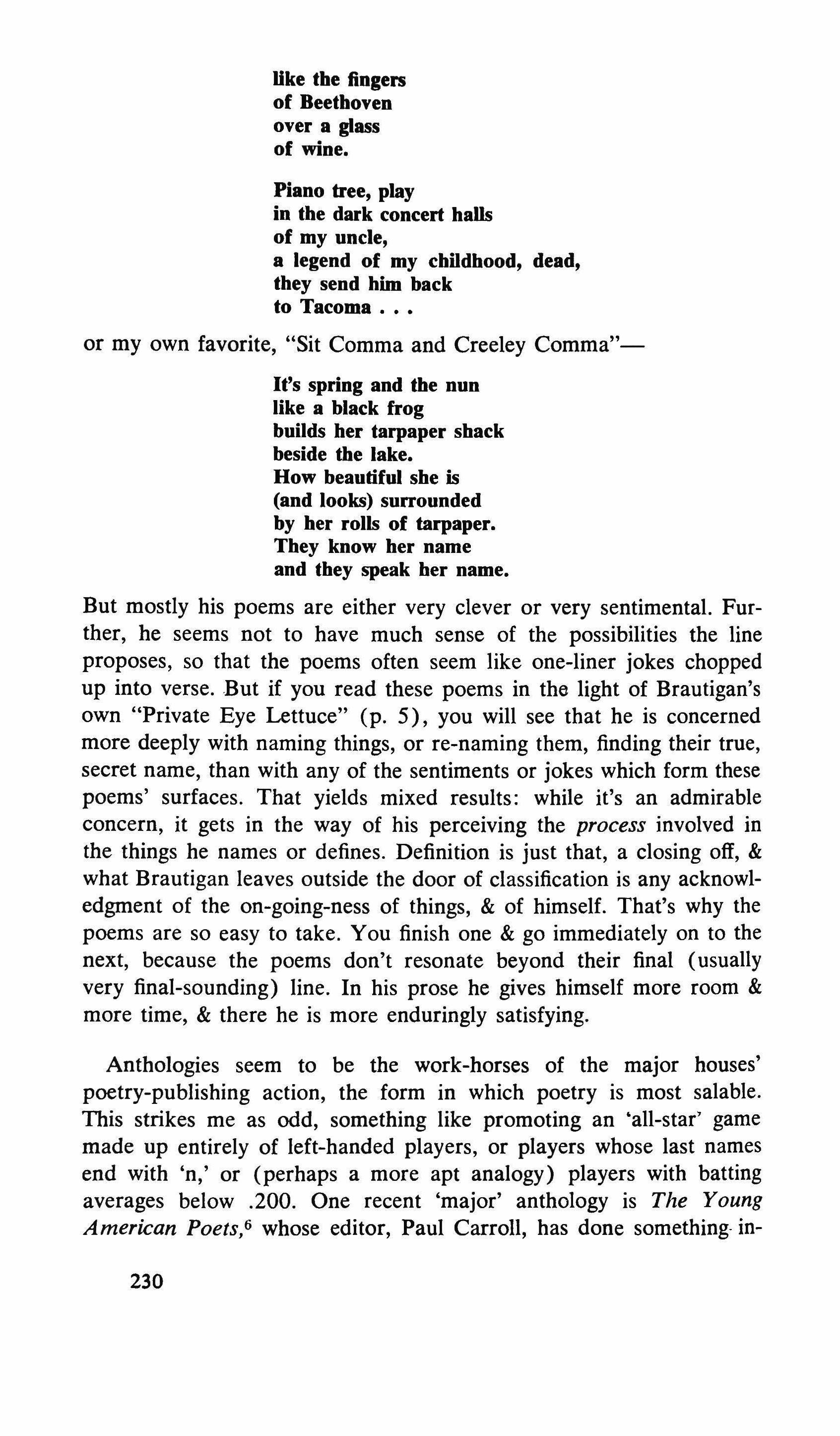
like the fingers of Beethoven over a glass of wine.
Piano tree, play in the dark concert haOs of my uncle, a legend of my chlldhood, dead, they send him back to Tacoma .••
or my own favorite, "Sit Comma and Creeley Comma"
It's spring and the nun like a black frog builds her tarpaper shack beside the lake. How beautiful she is (and looks) surrounded by her rolls of tarpaper. They know her name and they speak her name.
But mostly his poems are either very clever or very sentimental. Further, he seems not to have much sense of the possibilities the line proposes, so that the poems often seem like one-liner jokes chopped up into verse. But if you read these poems in the light of Brautigan's own "Private Eye Lettuce" (p. 5), you will see that he is concerned more deeply with naming things, or re-naming them, finding their true, secret name, than with any of the sentiments or jokes which form these poems' surfaces. That yields mixed results: while it's an admirable concern, it gets in the way of his perceiving the process involved in the things he names or defines. Definition is just that, a closing off, & what Brautigan leaves outside the door of classification is any acknowledgment of the on-going-ness of things, & of himself. That's why the poems are so easy to take. You finish one & go immediately on to the next, because the poems don't resonate beyond their final (usually very final-sounding) line. In his prose he gives himself more room & more time, & there he is more enduringly satisfying.
Anthologies seem to be the work-horses of the major houses' poetry-publishing action, the form in which poetry is most salable. This strikes me as odd, something like promoting an 'all-star' game made up entirely of left-handed players, or players whose last names end with on,' or (perhaps a more apt analogy) players with batting averages below .200. One recent 'major' anthology is The Young American Poets+ whose editor, Paul Carroll, has done something- in-
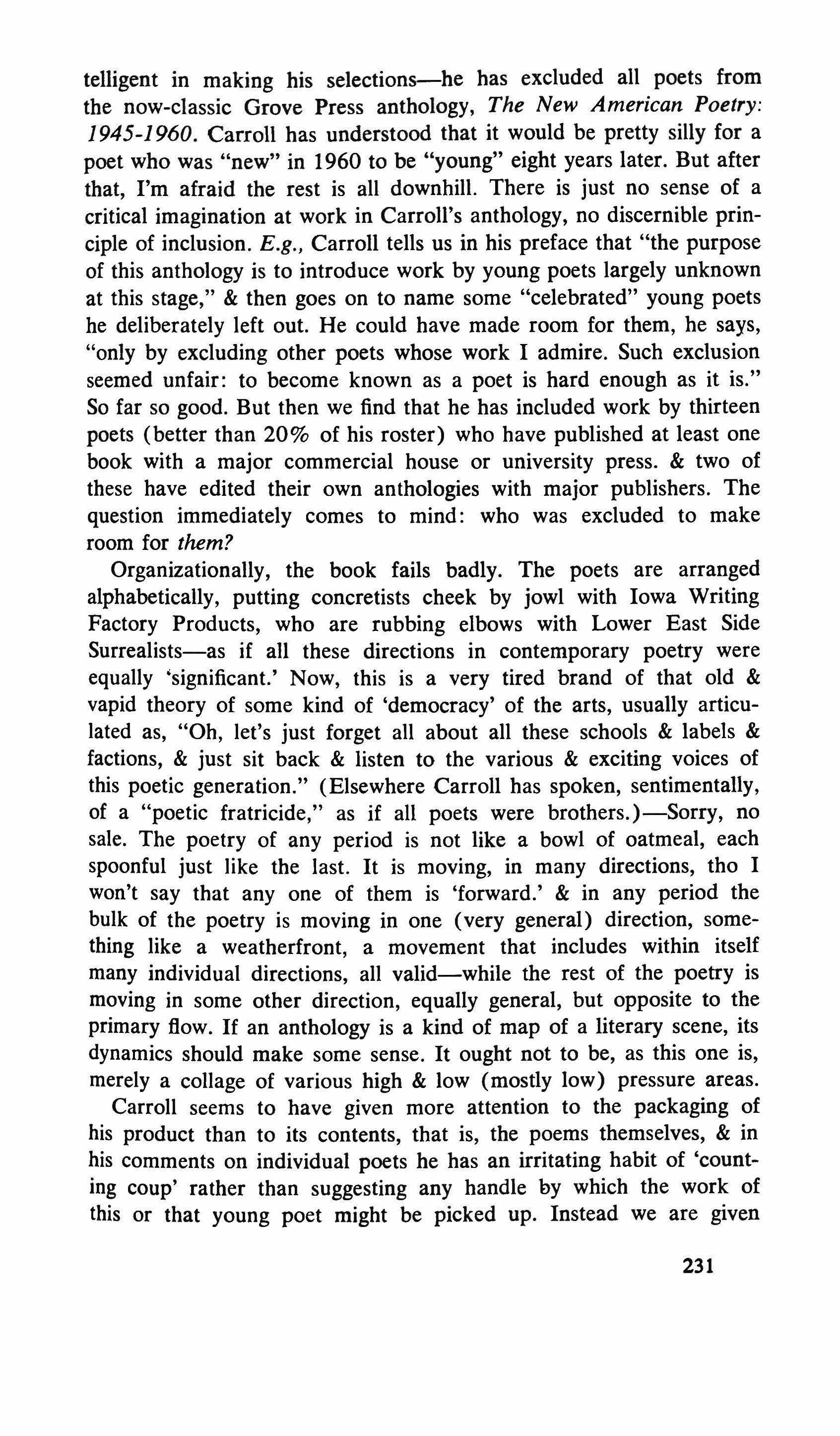
telligent in making his selections-he has excluded all poets from the now-classic Grove Press anthology, The New American Poetry: 1945-1960. Carroll has understood that it would be pretty silly for a poet who was "new" in 1960 to be "young" eight years later. But after that, I'm afraid the rest is all downhill. There is just no sense of a critical imagination at work in Carroll's anthology, no discernible principle of inclusion. E.g., Carroll tells us in his preface that "the purpose of this anthology is to introduce work by young poets largely unknown at this stage," & then goes on to name some "celebrated" young poets he deliberately left out. He could have made room for them, he says, "only by excluding other poets whose work I admire. Such exclusion seemed unfair: to become known as a poet is hard enough as it is." So far so good. But then we find that he has included work by thirteen poets (better than 20% of his roster) who have published at least one book with a major commercial house or university press. & two of these have edited their own anthologies with major publishers. The question immediately comes to mind: who was excluded to make room for them?
Organizationally, the book fails badly. The poets are arranged alphabetically, putting concretists cheek by jowl with Iowa Writing Factory Products, who are rubbing elbows with Lower East Side Surrealists-as if all these directions in contemporary poetry were equally 'significant.' Now, this is a very tired brand of that old & vapid theory of some kind of 'democracy' of the arts, usually articulated as, "Oh, let's just forget all about all these schools & labels & factions, & just sit back & listen to the various & exciting voices of this poetic generation." (Elsewhere Carroll has spoken, sentimentally, of a "poetic fratricide," as if all poets were brothers.)-Sorry, no sale. The poetry of any period is not like a bowl of oatmeal, each spoonful just like the last. It is moving, in many directions, tho I won't say that anyone of them is 'forward.' & in any period the bulk of the poetry is moving in one (very general) direction, something like a weatherfront, a movement that includes within itself many individual directions, all valid-while the rest of the poetry is moving in some other direction, equally general, but opposite to the primary flow. If an anthology is a kind of map of a literary scene, its dynamics should make some sense. It ought not to be, as this one is, merely a collage of various high & low (mostly low) pressure areas. Carroll seems to have given more attention to the packaging of his product than to its contents, that is, the poems themselves, & in his comments on individual poets he has an irritating habit of 'counting coup' rather than suggesting any handle by which the work of this or that young poet might be picked up. Instead we are given
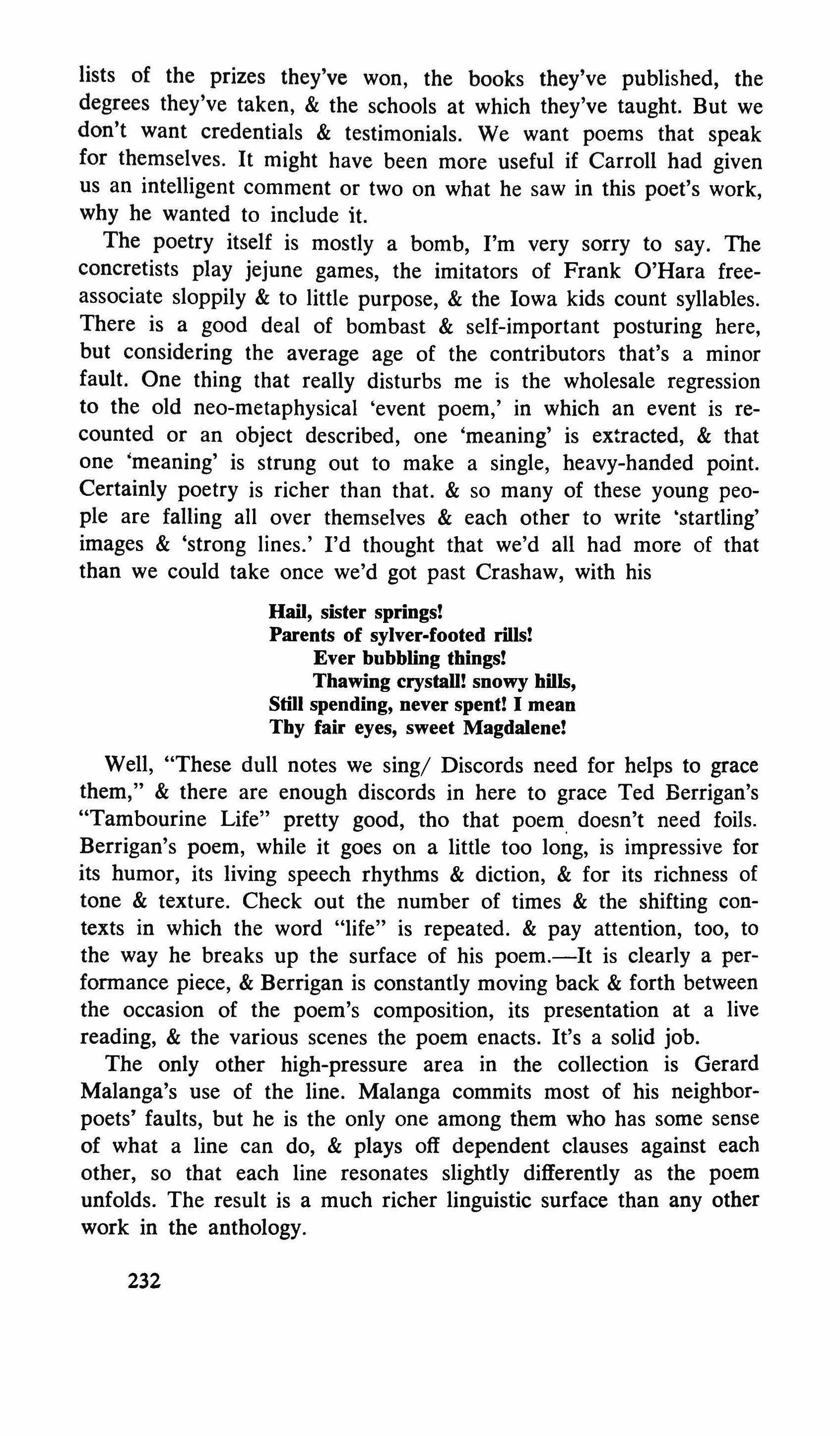
lists of the prizes they've won, the books they've published, the degrees they've taken, & the schools at which they've taught. But we don't want credentials & testimonials. We want poems that speak for themselves. It might have been more useful if Carroll had given us an intelligent comment or two on what he saw in this poet's work, why he wanted to include it.
The poetry itself is mostly a bomb, I'm very sorry to say. The concretists play jejune games, the imitators of Frank O'Hara freeassociate sloppily & to little purpose, & the Iowa kids count syllables. There is a good deal of bombast & self-important posturing here, but considering the average age of the contributors that's a minor fault. One thing that really disturbs me is the wholesale regression to the old neo-metaphysical 'event poem,' in which an event is recounted or an object described, one 'meaning' is extracted, & that one 'meaning' is strung out to make a single, heavy-handed point. Certainly poetry is richer than that. & so many of these young people are falling all over themselves & each other to write 'startling' images & 'strong lines.' I'd thought that we'd all had more of that than we could take once we'd got past Crashaw, with his
Hail, sister springs!
Parents of sylver-footed rills! Ever bubbling things! Thawing crystall! snowy hUIs, StUl spending, never spent! I mean Thy fair eyes, sweet Magdalene!
Well, "These dull notes we sing/ Discords need for helps to grace them," & there are enough discords in here to grace Ted Berrigan's "Tambourine Life" pretty good, tho that poem, doesn't need foils. Berrigan's poem, while it goes on a little too long, is impressive for its humor, its living speech rhythms & diction, & for its richness of tone & texture. Check out the number of times & the shifting contexts in which the word "life" is repeated. & pay attention, too, to the way he breaks up the surface of his poem.-It is clearly a performance piece, & Berrigan is constantly moving back & forth between the occasion of the poem's composition, its presentation at a live reading, & the various scenes the poem enacts. It's a solid job.
The only other high-pressure area in the collection is Gerard Malanga's use of the line. Malanga commits most of his neighborpoets' faults, but he is the only one among them who has some sense of what a line can do, & plays off dependent clauses against each other, so that each line resonates slightly differently as the poem unfolds. The result is a much richer linguistic surface than any other work in the anthology.

Ten years ago Philip Whalen characterized his poetry as "a picture or graph of a mind moving, which is a world body being here & now which is history and you." He has been busily & dedicatedly graphing that moving mind for some twenty years, & now for the first time (& it's about time!) we have something like a complete record of his achievement. On Bear's Head 7 is more like a massive notebook than a volume of collected poems, especially because, as Whalen insists, he's still busy turning out more poems. There are really only a half-dozen living, practicing poets in America right now from whom I or any poet, young or old, can take instruction. Whalen is one of them. He shows how to get it done.-It is done daily. It is done by listening, very rigorously, to the speech of the people down the street, to the speech of your own hungry belly & longing arms, because it is thru these voices that all of the past & present can be heard, crying & laughing by turns. Whalen is an excellent teacher precisely because, as he himself insists, he is not trying "to inherit [Dr. Johnson's] mantle as a literary dictator but only the title Doctor, i.e., teacher-who is constantly studying." In the twenty years' work which this book conveniently brings together, Whalen is constantly studying, constantly listening to various voices, & yielding them the forms they demand: lyrics, epigrams, didactics, odes, meditations, satires, whatever. & his mention of Dr. Johnson is not gratuitous. Whalen's poems, for all their seeming inchoateness, have an elegance of form which was one chief goal of the major 18th-century poets. A Whalen poem is typically spread out all over the page, a jangle of capitals, italics, asterisks, rules, brackets, & quotations of various voices, the 'noble dead' next to teen-age girls on a bus. But the sprawl achieves a functional shape, integrated & effective. That is, each poem is a unique form transferring insights with their concomitant affective states, which is as it should be."There is no intelligence without emotion," says Ezra Pound. One recurrent shape that Whalen's longer poems take is that of the mosaic. Personal scenes & utterances are set next to quotations from friends, or the classics (of Greece or Rome or the Orient), or from science, philosophy, history; time & space are 'kinked' to bring disparate scenes into contact. Till the shape of the whole reveals the interrelationships of its parts. There are such varieties of excellences here that it's difficult to characterize the book as a whole. Whalen's voice is as sure in the direct, flat statement of "For C."-
I wanted to bring you this Jap Iris Orchid-white with yellow blazons But I couldn't face carrying it down the street
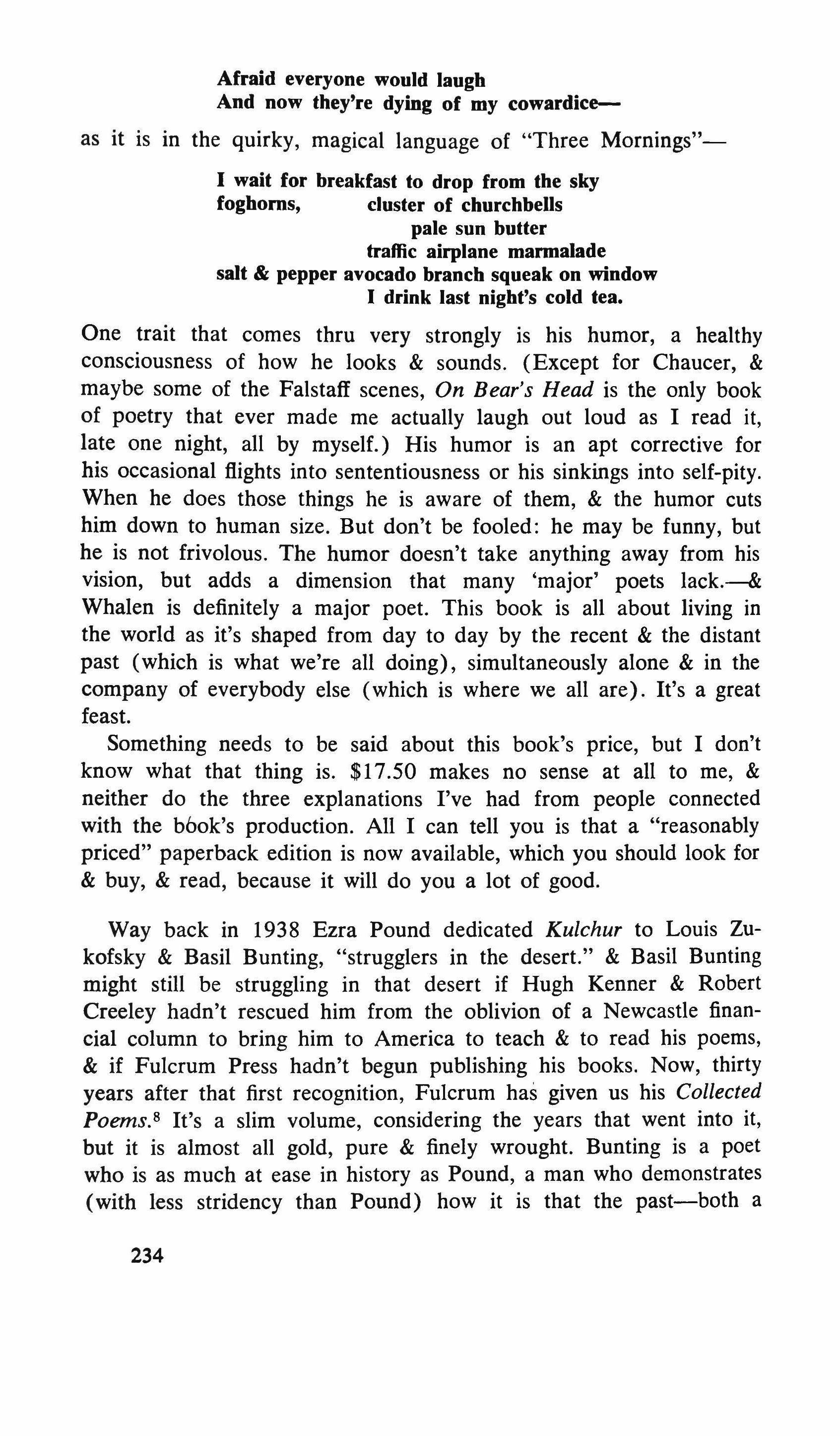
Afraid everyone would laugh And now they're dying of my cowardiceas it is In the quirky, magical language of "Three Mornings"
I wait for breakfast to drop from the sky foghorns, cluster of churchbells pale sun butter traffic airplane marmalade salt & pepper avocado branch squeak on window I drink last night's cold tea.
One trait that comes thru very strongly is his humor, a healthy consciousness of how he looks & sounds. (Except for Chaucer, & maybe some of the Falstaff scenes, On Bear's Head is the only book of poetry that ever made me actually laugh out loud as I read it, late one night, all by myself.) His humor is an apt corrective for his occasional flights into sententiousness or his sinkings into self-pity. When he does those things he is aware of them, & the humor cuts him down to human size. But don't be fooled: he may be funny, but he is not frivolous. The humor doesn't take anything away from his vision, but adds a dimension that many 'major' poets lack.--& Whalen is definitely a major poet. This book is all about living in the world as it's shaped from day to day by the recent & the distant past (which is what we're all doing), simultaneously alone & in the company of everybody else (which is where we all are). It's a great feast.
Something needs to be said about this book's price, but I don't know what that thing is. $17.50 makes no sense at all to me, & neither do the three explanations I've had from people connected with the book's production. All I can tell you is that a "reasonably priced" paperback edition is now available, which you should look for & buy, & read, because it will do you a lot of good.
Way back in 1938 Ezra Pound dedicated Kulchur to Louis Zukofsky & Basil Bunting, "strugglers in the desert." & Basil Bunting might still be struggling in that desert if Hugh Kenner & Robert Creeley hadn't rescued him from the oblivion of a Newcastle financial column to bring him to America to teach & to read his poems, & if Fulcrum Press hadn't begun publishing his books. Now, thirty years after that first recognition, Fulcrum has given us his Collected Poems» It's a slim volume, considering the years that went into it, but it is almost all gold, pure & finely wrought. Bunting is a poet who is as much at ease in history as Pound, a man who demonstrates (with less stridency than Pound) how it is that the past-both a
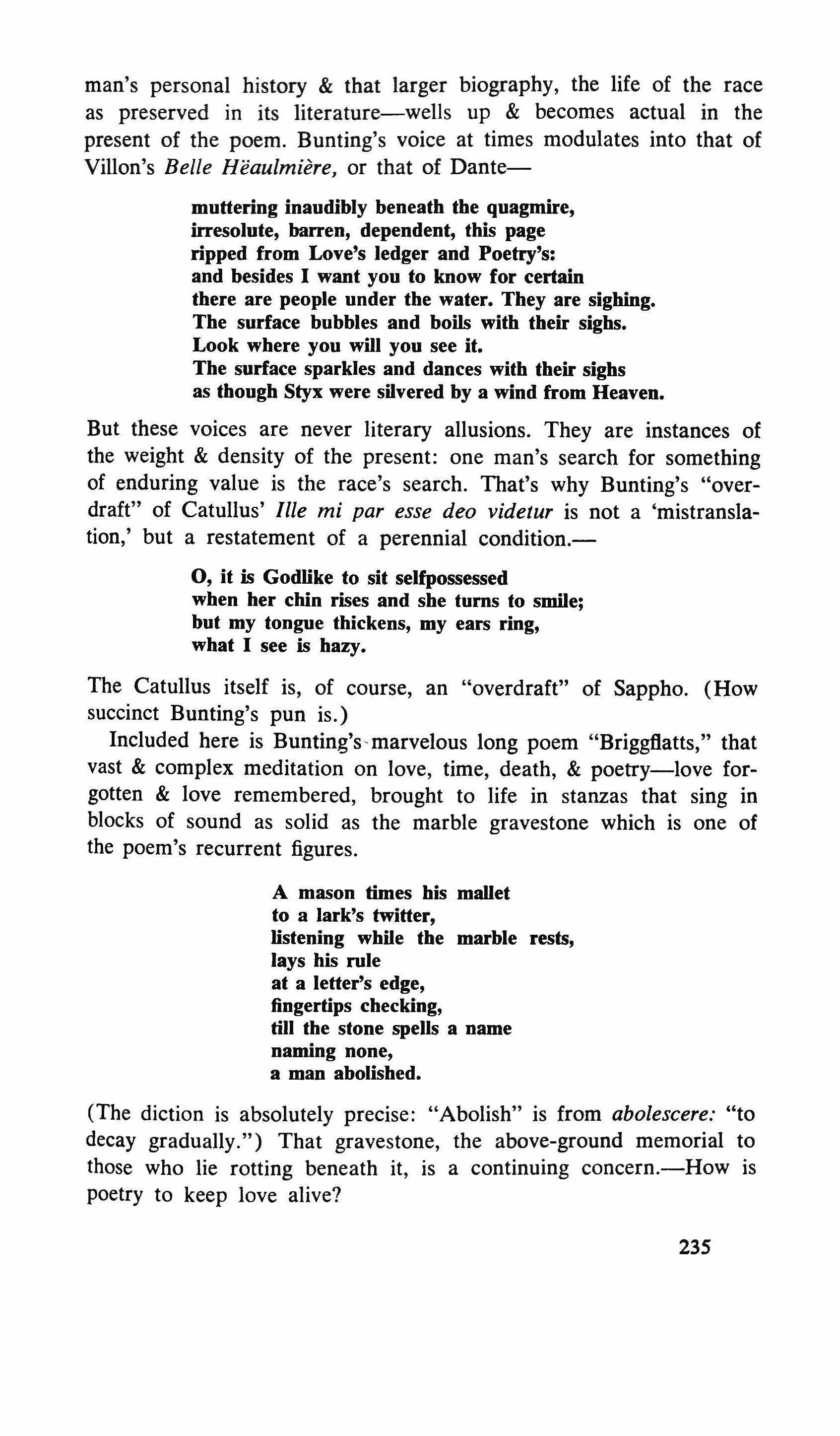
man's personal history & that larger biography, the life of the race as preserved in its literature-wells up & becomes actual in the present of the poem. Bunting's voice at times modulates into that of Villon's Belle Heaulmiere, or that of Dante-
muttering inaudibly beneath the quagmire, irresolute, barren, dependent, this page ripped from Love's ledger and Poetry's: and besides I want you to know for certain there are people under the water. They are sighing. The surface bubbles and boils with their sighs. Look where you will you see it. The surface sparkles and dances with their sighs as though Styx were silvered by a wind from Heaven.
But these voices are never literary allusions. They are instances of the weight & density of the present: one man's search for something of enduring value is the race's search. That's why Bunting's "overdraft" of Catullus' [lie mi par esse deo videtur is not a 'mistranslation,' but a restatement of a perennial condition.-
0, it is Godlike to sit selfpossessed when her chin rises and she turns to smile; but my tongue thickens, my ears ring, what I see is hazy.
The Catullus itself is, of course, an "overdraft" of Sappho. (How succinct Bunting's pun is.)
Included here is Bunting's-marvelous long poem "Briggfiatts," that vast & complex meditation on love, time, death, & poetry-love forgotten & love remembered, brought to life in stanzas that sing in blocks of sound as solid as the marble gravestone which is one of the poem's recurrent figures.
A mason times his mallet to a lark's twitter, listening while the marble rests, lays his rule at a letter's edge, fingertips checking, till the stone spells a name naming none, a man abolished.
(The diction is absolutely precise: "Abolish" is from abolescere: "to decay gradually.") That gravestone, the above-ground memorial to those who lie rotting beneath it, is a continuing concern.-How is poetry to keep love alive?
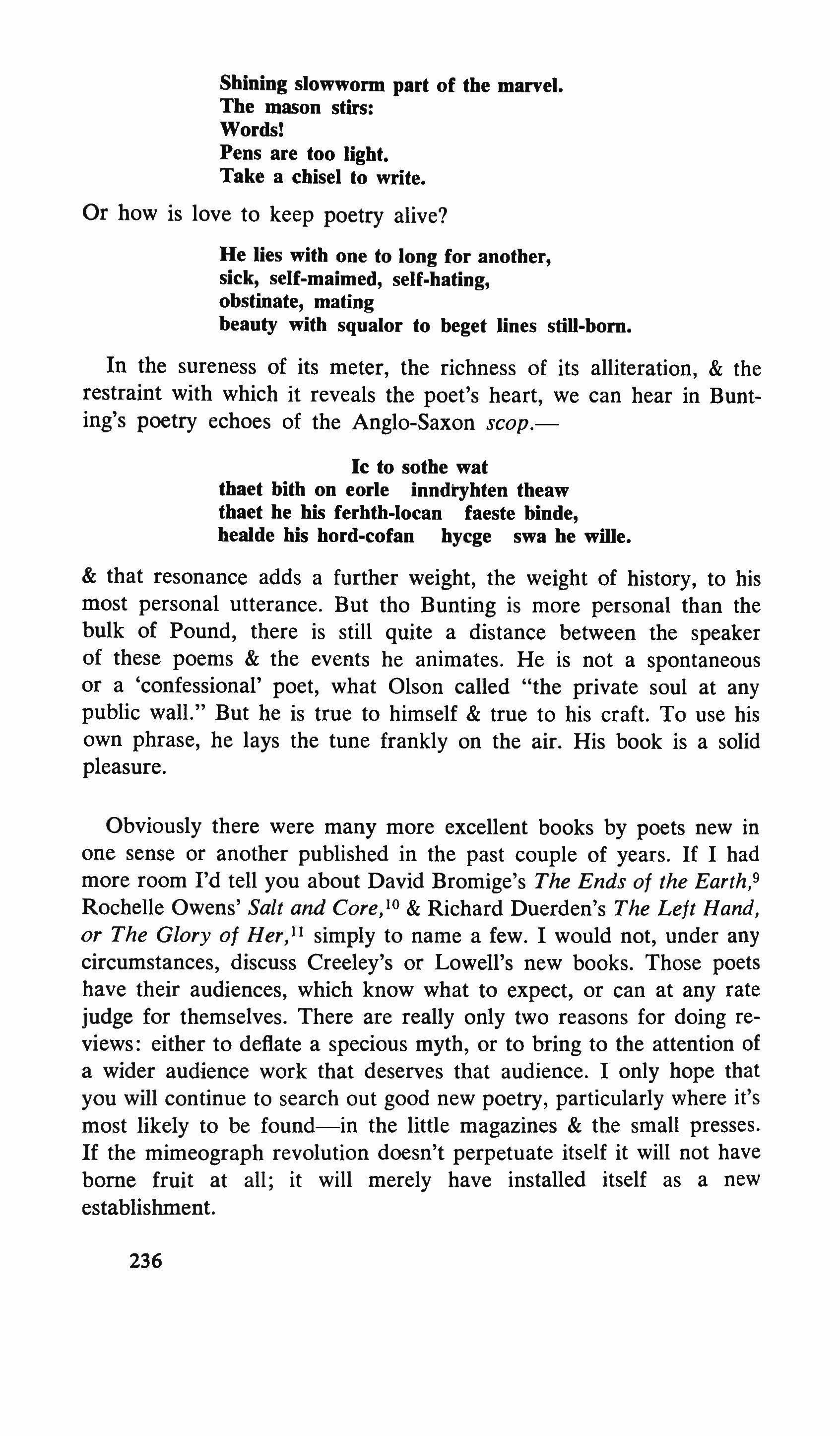
Sbining slowworm part of the marvel. Tbe mason stirs: Words!
Pens are too Iigbt. Take a chisel to write.
Or how is love to keep poetry alive?
He lies with one to long for another, sick, self-maimed, self-hating, obstinate, mating beauty with squalor to beget lines still-born,
In the sureness of its meter, the richness of its alliteration, & the restraint with which it reveals the poet's heart, we can hear in Bunting's poetry echoes of the Anglo-Saxon scop.-
Ic to sotbe wat tbaet bith on eorle inndryhten tbeaw tbaet he bis ferhth-locan faeste binde, bealde bis hord-cofan bycge swa be wille.
& that resonance adds a further weight, the weight of history, to his most personal utterance. But tho Bunting is more personal than the bulk of Pound, there is still quite a distance between the speaker of these poems & the events he animates. He is not a spontaneous or a 'confessional' poet, what Olson called "the private soul at any public wall." But he is true to himself & true to his craft. To use his own phrase, he lays the tune frankly on the air. His book is a solid pleasure.
Obviously there were many more excellent books by poets new in one sense or another published in the past couple of years. If I had more room I'd tell you about David Bromige's The Ends of the Earth,9 Rochelle Owens' Salt and CoreJ" & Richard Duerden's The Left Hand, or The Glory of HerJ! simply to name a few. I would not, under any circumstances, discuss Creeley's or Lowell's new books. Those poets have their audiences, which know what to expect, or can at any rate judge for themselves. There are really only two reasons for doing reviews: either to deflate a specious myth, or to bring to the attention of a wider audience work that deserves that audience. I only hope that you will continue to search out good new poetry, particularly where it's most likely to be found-in the little magazines & the small presses. If the mimeograph revolution doesn't perpetuate itself it will not have borne fruit at all; it will merely have installed itself as a new establishment.
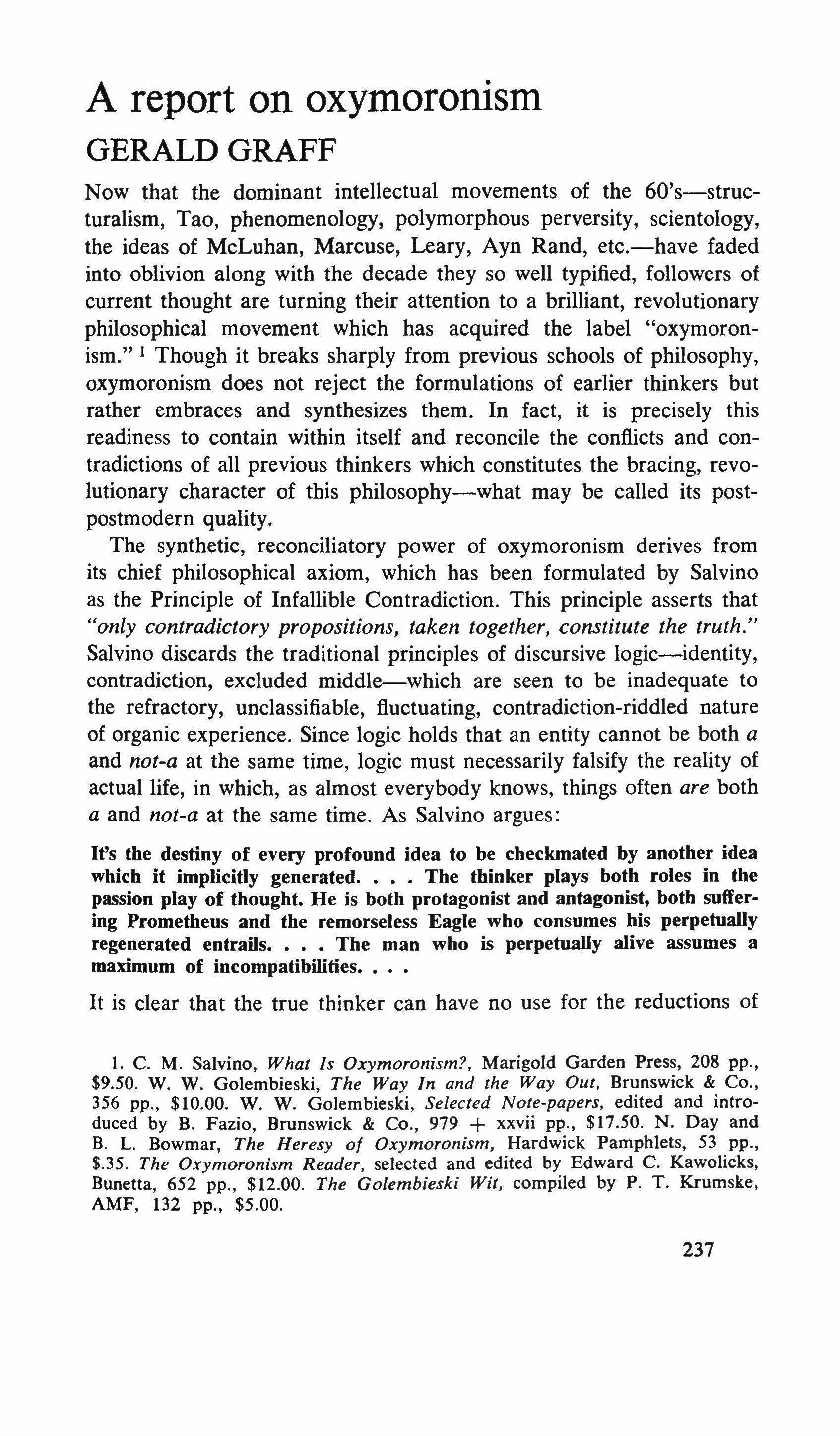
Now that the dominant intellectual movements of the 60's-structuralism, Tao, phenomenology, polymorphous perversity, scientology, the ideas of McLuhan, Marcuse, Leary, Ayn Rand, etc.-have faded into oblivion along with the decade they so well typified, followers of current thought are turning their attention to a brilliant, revolutionary philosophical movement which has acquired the label "oxymoronism." I Though it breaks sharply from previous schools of philosophy, oxymoronism does not reject the formulations of earlier thinkers but rather embraces and synthesizes them. In fact, it is precisely this readiness to contain within itself and reconcile the conflicts and contradictions of all previous thinkers which constitutes the bracing, revolutionary character of this philosophy-what may be called its postpostmodern quality.
The synthetic, reconciliatory power of oxymoronism derives from its chief philosophical axiom, which has been formulated by Salvino as the Principle of Infallible Contradiction. This principle asserts that "only contradictory propositions, taken together, constitute the truth." Salvino discards the traditional principles of discursive logic-identity, contradiction, excluded middle-which are seen to be inadequate to the refractory, unclassifiable, fluctuating, contradiction-riddled nature of organic experience. Since logic holds that an entity cannot be both a and not-a at the same time, logic must necessarily falsify the reality of actual life, in which, as almost everybody knows, things often are both a and not-a at the same time. As Salvino argues:
It's the destiny of every profound idea to be checkmated by another idea which it implicitly generated. The thinker plays both roles in the passion play of thought. He is both protagonist and antagonist, both suffering Prometheus and the remorseless Eagle who consumes his perpetually regenerated entrails. The man who is perpetually alive assumes a maximum of incompatibilities.
It is clear that the true thinker can have no use for the reductions of
l. C. M. Salvino, What Is Oxymoronism?, Marigold Garden Press, 208 pp., $9.50. W. W. Golembieski, The Way In and the Way Out, Brunswick & Co., 356 pp., $10.00. W. W. Golembieski, Selected Note-papers, edited and introduced by B. Fazio, Brunswick & Co., 979 + xxvii pp., $17.50. N. Day and B. L. Bowmar, The Heresy oi Oxymoronism, Hardwick Pamphlets, 53 pp., $.35. The Oxymoronism Reader, selected and edited by Edward C. Kawolicks, Bunetta, 652 pp., $12.00. The Golembieski Wit, compiled by P. T. Krumske, AMF, 132 pp., $5.00.
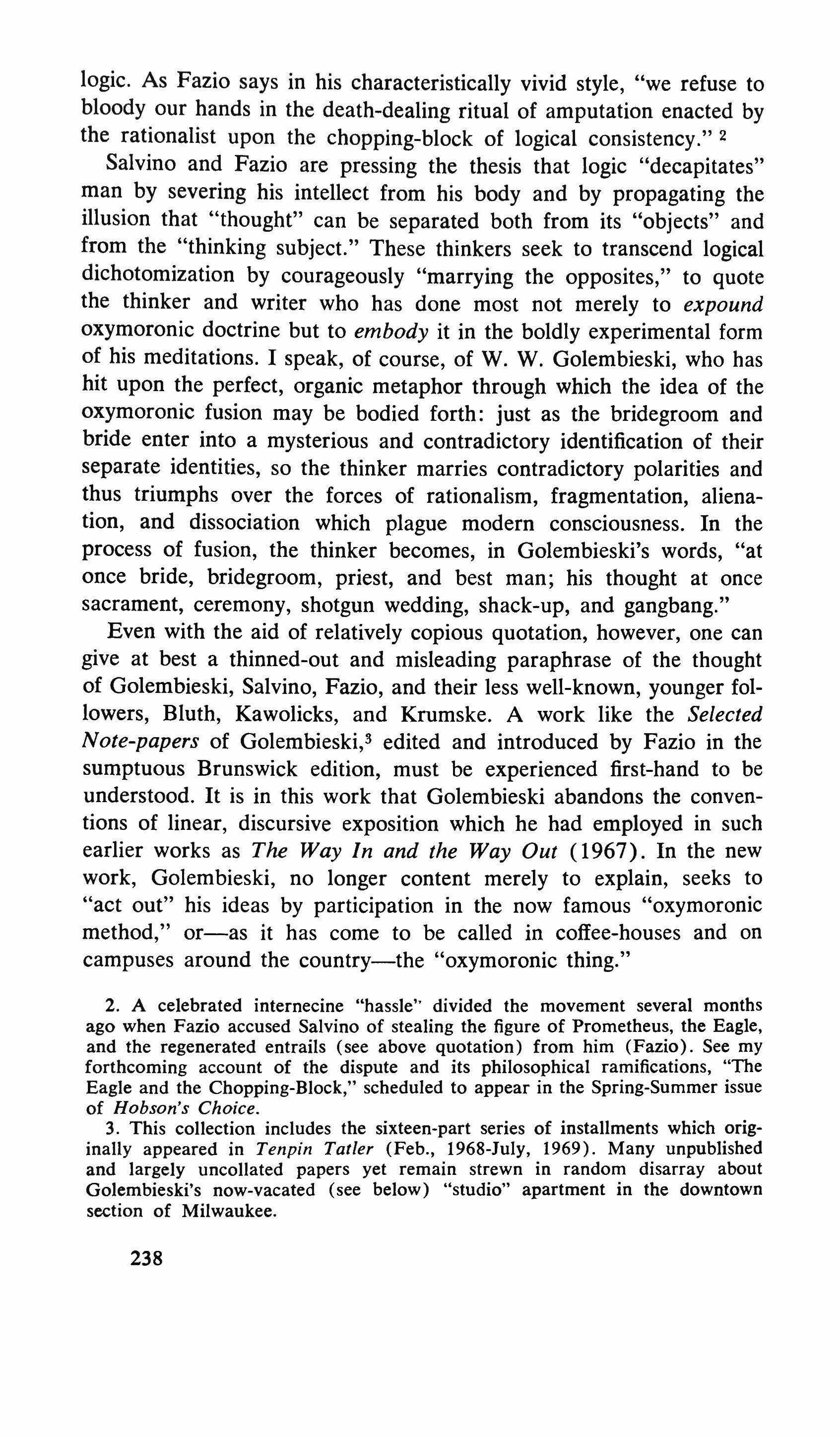
logic. As Fazio says in his characteristically vivid style, "we refuse to bloody our hands in the death-dealing ritual of amputation enacted by the rationalist upon the chopping-block of logical consistency." 2 Salvino and Fazio are pressing the thesis that logic "decapitates" man by severing his intellect from his body and by propagating the illusion that "thought" can be separated both from its "objects" and from the "thinking subject." These thinkers seek to transcend logical dichotomization by courageously "marrying the opposites," to quote the thinker and writer who has done most not merely to expound oxymoronic doctrine but to embody it in the boldly experimental form of his meditations. I speak, of course, of W. W. Golembieski, who has hit upon the perfect, organic metaphor through which the idea of the oxymoronic fusion may be bodied forth: just as the bridegroom and bride enter into a mysterious and contradictory identification of their separate identities, so the thinker marries contradictory polarities and thus triumphs over the forces of rationalism, fragmentation, alienation, and dissociation which plague modern consciousness. In the process of fusion, the thinker becomes, in Golembieski's words, "at once bride, bridegroom, priest, and best man; his thought at once sacrament, ceremony, shotgun wedding, shack-up, and gangbang."
Even with the aid of relatively copious quotation, however, one can give at best a thinned-out and misleading paraphrase of the thought of Golembieski, Salvino, Fazio, and their less well-known, younger followers, Bluth, Kawolicks, and Krumske. A work like the Selected Note-papers of Golembieski.! edited and introduced by Fazio in the sumptuous Brunswick edition, must be experienced first-hand to be understood. It is in this work that Golembieski abandons the conventions of linear, discursive exposition which he had employed in such earlier works as The Way In and the Way Out (1967). In the new work, Golembieski, no longer content merely to explain, seeks to "act out" his ideas by participation in the now famous "oxymoronic method," or-as it has come to be called in coffee-houses and on campuses around the country-the "oxymoronic thing."
2. A celebrated internecine "hassle" divided the movement several months ago when Fazio accused Salvino of stealing the figure of Prometheus, the Eagle, and the regenerated entrails (see above quotation) from him (Fazio). See my forthcoming account of the dispute and its philosophical ramifications, "The Eagle and the Chopping-Block," scheduled to appear in the Spring-Summer issue of Hobson's Choice.
3. This collection includes the sixteen-part series of installments which originally appeared in Tenpin Tatler (Feb., 1968-July, 1969). Many unpublished and largely uncollated papers yet remain strewn in random disarray about Golembieski's now-vacated (see below) "studio" apartment in the downtown section of Milwaukee.
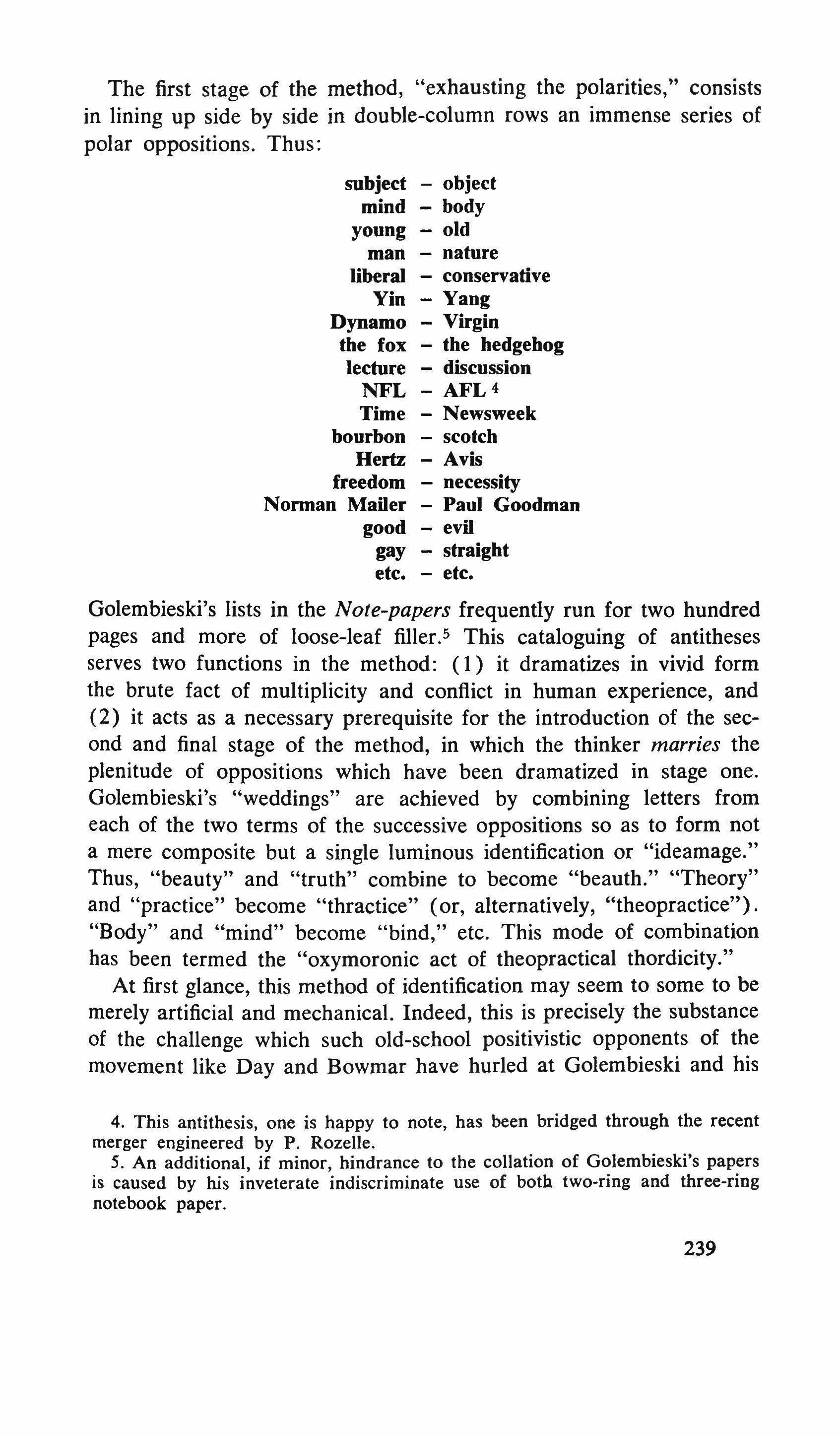
The first stage of the method, "exhausting the polarities," consists in lining up side by side in double-column rows an immense series of polar oppositions. Thus:
subject mind young man liberal Yin Dynamo the fox lecture NFL Time bourbon Hertz freedom
Nonnan Mailer good gay etc. - object body old nature conservative Yang - Virgin - the hedgehog - discussion - AFL4
Newsweek - scotch Avis - necessity Paul Goodman - evil - straight etc.
Golembieski's lists in the Note-papers frequently run for two hundred pages and more of loose-leaf filler> This cataloguing of antitheses serves two functions in the method: (1) it dramatizes in vivid form the brute fact of multiplicity and conflict in human experience, and (2) it acts as a necessary prerequisite for the introduction of the second and final stage of the method, in which the thinker marries the plenitude of oppositions which have been dramatized in stage one. Golembieski's "weddings" are achieved by combining letters from each of the two terms of the successive oppositions so as to form not a mere composite but a single luminous identification or "ideamage." Thus, "beauty" and "truth" combine to become "beauth." "Theory" and "practice" become "thractice" (or, alternatively, "theopractice"). "Body" and "mind" become "bind," etc. This mode of combination has been termed the "oxymoronic act of theopractical thordicity."
At first glance, this method of identification may seem to some to be merely artificial and mechanical. Indeed, this is precisely the substance of the challenge which such old-school positivistic opponents of the movement like Day and Bowmar have hurled at Golembieski and his
4. This antithesis, one is happy to note, has been bridged through the recent merger engineered by P. Rozelle.
5. An additional, if minor, hindrance to the collation of Golembieski's papers is caused by his inveterate indiscriminate use of both two-ring and three-ring notebook paper.
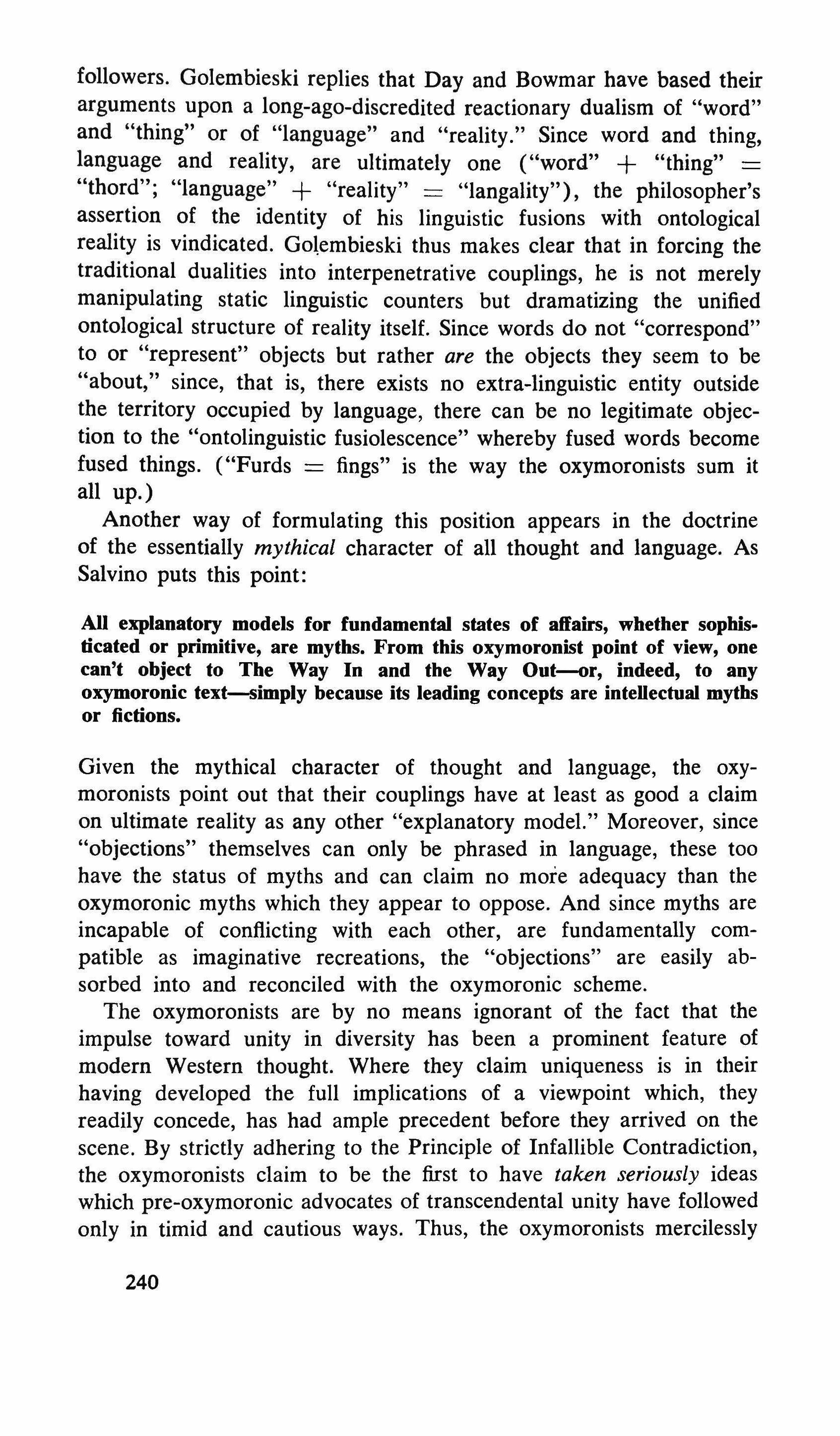
followers. Golembieski replies that Day and Bowmar have based their arguments upon a long-ago-discredited reactionary dualism of "word" and "thing" or of "language" and "reality." Since word and thing, language and reality, are ultimately one ("word" + "thing" = "thord"; "language" + "reality" = "langality"), the philosopher's assertion of the identity of his linguistic fusions with ontological reality is vindicated. Golembieski thus makes clear that in forcing the traditional dualities into interpenetrative couplings, he is not merely manipulating static linguistic counters but dramatizing the unified ontological structure of reality itself. Since words do not "correspond" to or "represent" objects but rather are the objects they seem to be "about," since, that is, there exists no extra-linguistic entity outside the territory occupied by language, there can be no legitimate objection to the "ontolinguistic fusiolescence" whereby fused words become fused things. ("Furds fings" is the way the oxymoronists sum it all up.)
Another way of formulating this position appears in the doctrine of the essentially mythical character of all thought and language. As Salvino puts this point:
All explanatory models for fundamental states of affairs, whether sophisticated or primitive, are myths. From this oxymoronist point of view, one can't object to The Way In and the Way Out-or, indeed, to any oxymoronic text-simply because its leading concepts are intellectual myths or fictions.
Given the mythical character of thought and language, the oxymoronists point out that their couplings have at least as good a claim on ultimate reality as any other "explanatory model." Moreover, since "objections" themselves can only be phrased in language, these too have the status of myths and can claim no more adequacy than the oxymoronic myths which they appear to oppose. And since myths are incapable of conflicting with each other, are fundamentally compatible as imaginative recreations, the "objections" are easily absorbed into and reconciled with the oxymoronic scheme.
The oxymoronists are by no means ignorant of the fact that the impulse toward unity in diversity has been a prominent feature of modern Western thought. Where they claim uniqueness is in their having developed the full implications of a viewpoint which, they readily concede, has had ample precedent before they arrived on the scene. By strictly adhering to the Principle of Infallible Contradiction, the oxymoronists claim to be the first to have taken seriously ideas which pre-oxymoronic advocates of transcendental unity have followed only in timid and cautious ways. Thus, the oxymoronists mercilessly
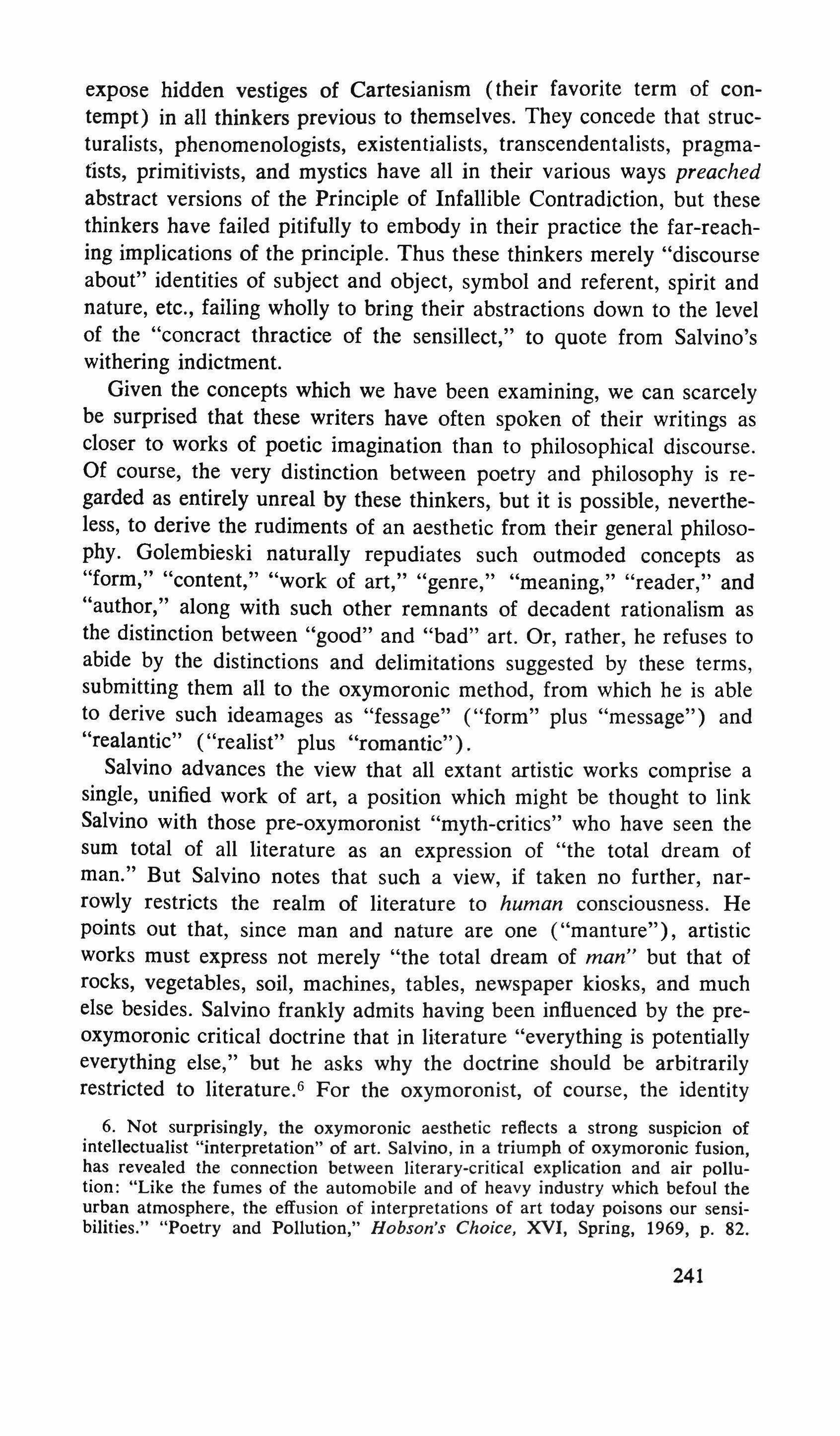
expose hidden vestiges of Cartesianism (their favorite term of contempt) in all thinkers previous to themselves. They concede that structuralists, phenomenologists, existentialists, transcendentalists, pragmatists, primitivists, and mystics have all in their various ways preached abstract versions of the Principle of Infallible Contradiction, but these thinkers have failed pitifully to embody in their practice the far-reaching implications of the principle. Thus these thinkers merely "discourse about" identities of subject and object, symbol and referent, spirit and nature, etc., failing wholly to bring their abstractions down to the level of the "concract thractice of the sensillect," to quote from Salvino's withering indictment.
Given the concepts which we have been examining, we can scarcely be surprised that these writers have often spoken of their writings as closer to works of poetic imagination than to philosophical discourse. Of course, the very distinction between poetry and philosophy is regarded as entirely unreal by these thinkers, but it is possible, nevertheless, to derive the rudiments of an aesthetic from their general philosophy. Golembieski naturally repudiates such outmoded concepts as "form," "content," "work of art," "genre," "meaning," "reader," and "author," along with such other remnants of decadent rationalism as the distinction between "good" and "bad" art. Or, rather, he refuses to abide by the distinctions and delimitations suggested by these terms, submitting them all to the oxymoronic method, from which he is able to derive such ideamages as "fessage" ("form" plus "message") and "realantic" ("realist" plus "romantic").
Salvino advances the view that all extant artistic works comprise a single, unified work of art, a position which might be thought to link Salvino with those pre-oxymoronist "myth-critics" who have seen the sum total of all literature as an expression of "the total dream of man." But Salvino notes that such a view, if taken no further, narrowly restricts the realm of literature to human consciousness. He points out that, since man and nature are one ("manture"), artistic works must express not merely "the total dream of man" but that of rocks, vegetables, soil, machines, tables, newspaper kiosks, and much else besides. Salvino frankly admits having been influenced by the preoxymoronic critical doctrine that in literature "everything is potentially everything else," but he asks why the doctrine should be arbitrarily restricted to literature." For the oxymoronist, of course, the identity
6. Not surprisingly, the oxymoronic aesthetic reflects a strong suspicion of intellectualist "interpretation" of art. Salvino, in a triumph of oxymoronic fusion, has revealed the connection between literary-critical explication and air pollution: "Like the fumes of the automobile and of heavy industry which befoul the urban atmosphere, the effusion of interpretations of art today poisons our sensibilities." "Poetry and Pollution," Hobson's Choice, XVI, Spring, 1969, p. 82.
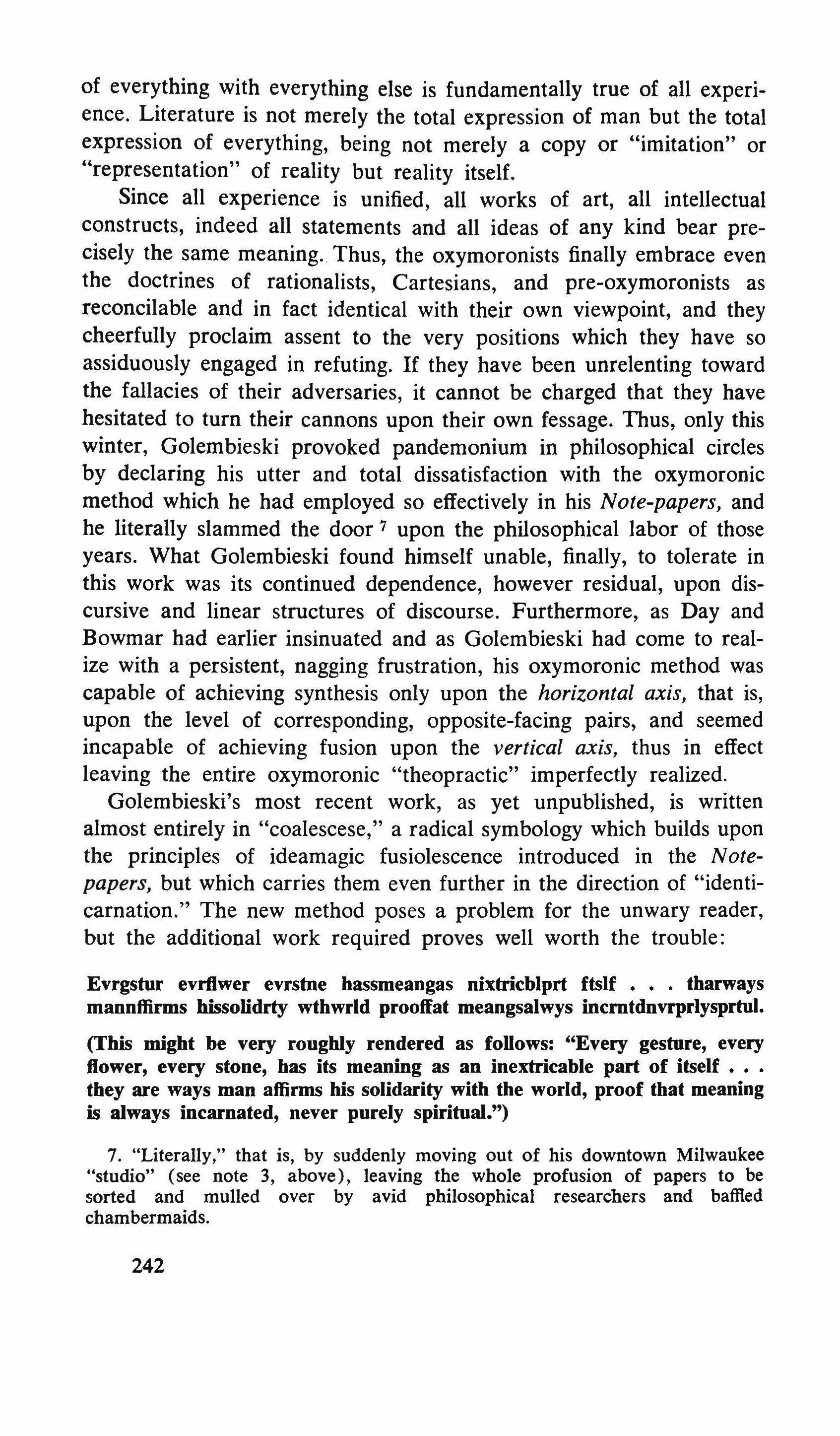
of everything with everything else is fundamentally true of all experience. Literature is not merely the total expression of man but the total expression of everything, being not merely a copy or "imitation" or "representation" of reality but reality itself.
Since all experience is unified, all works of art, all intellectual constructs, indeed all statements and all ideas of any kind bear precisely the same meaning. Thus, the oxymoronists finally embrace even the doctrines of rationalists, Cartesians, and pre-oxymoronists as reconcilable and in fact identical with their own viewpoint, and they cheerfully proclaim assent to the very positions which they have so assiduously engaged in refuting. If they have been unrelenting toward the fallacies of their adversaries, it cannot be charged that they have hesitated to turn their cannons upon their own fessage. Thus, only this winter, Golembieski provoked pandemonium in philosophical circles by declaring his utter and total dissatisfaction with the oxymoronic method which he had employed so effectively in his Note-papers, and he literally slammed the door 7 upon the philosophical labor of those years. What Golembieski found himself unable, finally, to tolerate in this work was its continued dependence, however residual, upon discursive and linear structures of discourse. Furthermore, as Day and Bowmar had earlier insinuated and as Golembieski had come to realize with a persistent, nagging frustration, his oxymoronic method was capable of achieving synthesis only upon the horizontal axis, that is, upon the level of corresponding, opposite-facing pairs, and seemed incapable of achieving fusion upon the vertical axis, thus in effect leaving the entire oxymoronic "theopractic" imperfectly realized.
Golembieski's most recent work, as yet unpublished, is written almost entirely in "coalescese," a radical symbology which builds upon the principles of ideamagic fusiolescence introduced in the Notepapers, but which carries them even further in the direction of "identicarnation." The new method poses a problem for the unwary reader, but the additional work required proves well worth the trouble:
Evrgstur evrftwer evrstne bassmeangas nixtricblprt ftslf tbarways mannffirms bissolidrty wtbwrld prooffat meangsalwys incmtdnvrprlysprtul.
(Tbis migbt be very roughly rendered as follows: "Every gesture, every flower, every stone, bas its meaning as an inextricable part of itself tbey are ways man affirms his solidarity witb tbe world, proof tbat meaning is always incarnated, never purely spiritual.")
7. "Literally," that is, by suddenly moving out of his downtown Milwaukee "studio" (see note 3, above), leaving the whole profusion of papers to be sorted and mulled over by avid philosophical researchers and baffled chambermaids.

Yet Golembieski has shown signs of dissatisfaction even with this mode of expression, since it too retains many of the conventions of linear, discursive syntax and grammar. Undoubtedly, this restless pathfinder will not be content until he has succeeded in reducing the entire corpus of his insights into a single "thord," some ultimate and staggering ideamage.
Oxymoronism, with its Principle of Infallible Contradiction, promises to come closer to remedying the agonizing spiritual crisis of today's alienated consciousness than any previous mode of thought. Whereas pre-oxymoronic philosophers, however radical their initial pretensions, end up compromising with logical and discursive norms of "clarity," "consistency," and "truth," and thus betraying their parasitic dependence upon the reactionary rationalistic absolutism which they claim to oppose, oxymoronism's absolute refusal to "kissarsovlogic," in Golembieski's penetrating formulation, its unwillingness to admit the possibility of unresolved conflict, its dead game insistence upon the total identity of everything and everybody, promises to restore man to the Edenic sense of identity with his surroundings which he once enjoyed before Western rationalism thrust upon him the burden of its brutal differentiation of consciousness. Because oxymoronism refuses to negate any idea or possible point of view, but rather insists upon affirming all viewpoints, it is able to subsume, embrace, and reconcile the most disparate and mutually antagonistic doctrines, thus liberating the life of the spirit from the degrading acrimony and futile quarreling which have plagued it for two thousand years and which now paralyze us with a sense of the absurdity of further participation in the thrust and counter-thrust of ideologies. By embracing all doctrines, oxymoronism releases the thinker from enslavement to the superstition of the single, "correct" line of argument, the fallacy that there is a "right" and "wrong" point of view. "Error is a fiction, has no reality in fact," says Salvino, demonstrating the power of oxymoronism to foreclose the possibility of error and thus obviate both risk and guilt. On the other hand, of course, this is not the case at all.

Julio Cortazar began his writing career in Argentina, a country relatively far to the south of Mexico. He now lives in France, rather far west of where Mexico is. The most important aspect of Cortazar's work is his concern with the classes and categories of events. I make special reference here to Cortazar's perceptive and very excellent distinction between foot and the foot (italics mine); and above all to his quite superb manipulation of the ambiguities between the foot and "the foot" (italics mine); or in other words, any AFOREMENTIONED foot.
I make mention of these examples no doubt because of a personal fondness for walking; and because walking in America has become in the past few years a highly sophisticated and specialized activity; in certain of its aspects, in a good many respects, one might view it as a new art form.
Cortazar is instructive. In his book he offers three social classes, at the same time personality types: famas, esperanzas, cronopios. Famas are big shots (more or less): famas. Esperanzas are passive climbers (mostly): esperance. Cronopios: cronopios are cronopios (eternally). Esperance and woe.
Esperance and woe. And anxiety. But here we allow not even that without machinery. The most important technical adjunct to walking is a pair of sunglasses. Sunglasses should always be worn when walking in America. They should be worn whether there is sun or no sun, and whether it is daytime or at night. The logic will readily be seen. Example. I am walking alone on a street. Some twenty feet from me another walker is approaching. If I am wearing sunglasses my prospects of handling the situation greatly increase.
In the first place, your eyes are invisible, except when you want them to glitter forth with electric evil and hate. There is in addition, of course, the element of disguise. You become to a degree unknown, at once more mythic and more human. More human because you are less a thing, you haven't quite been doped out. There is more. You can hide behind sunglasses. You are small and bunched up. You are all energy. And when you glower forth you are sudden, gigantic, tremendously strong. You are safe no matter where you go. No matter who touches you, the dark glass covers you. They have not touched you. Darkness is comforting and warming.
Julio Cortazar, Cronopios and Famas. Pantheon Books. New York: 1969. 161 pp. $4.95.
244
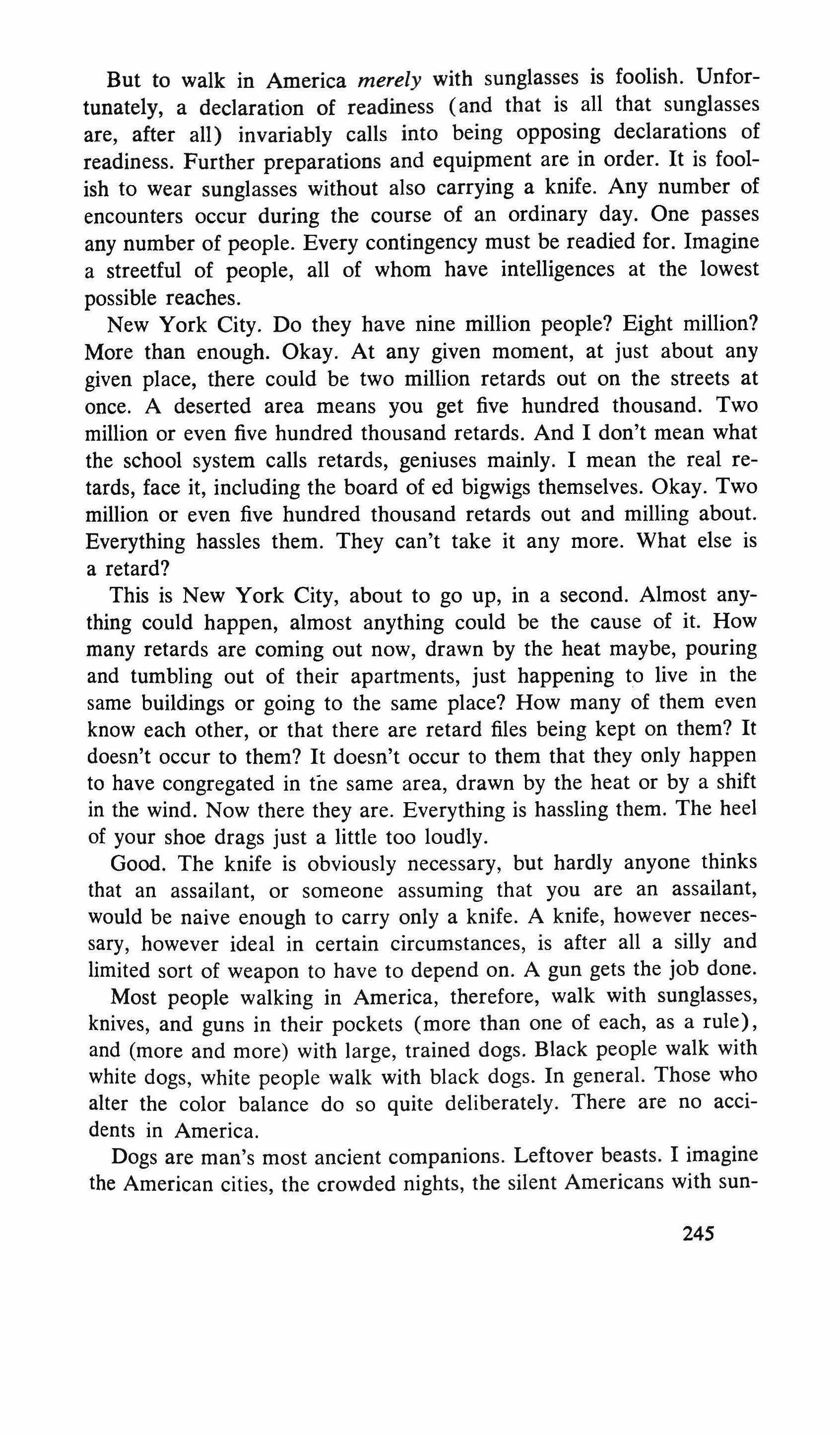
But to walk in America merely with sunglasses is foolish. Unfortunately, a declaration of readiness (and that is all that sunglasses are, after all) invariably calls into being opposing declarations of readiness. Further preparations and equipment are in order. It is foolish to wear sunglasses without also carrying a knife. Any number of encounters occur during the course of an ordinary day. One passes any number of people. Every contingency must be readied for. Imagine a streetful of people, all of whom have intelligences at the lowest possible reaches.
New York City. Do they have nine million people? Eight million? More than enough. Okay. At any given moment, at just about any given place, there could be two million retards out on the streets at once. A deserted area means you get five hundred thousand. Two million or even five hundred thousand retards. And I don't mean what the school system calls retards, geniuses mainly. I mean the real retards, face it, including the board of ed bigwigs themselves. Okay. Two million or even five hundred thousand retards out and milling about. Everything hassles them. They can't take it any more. What else is a retard?
This is New York City, about to go up, in a second. Almost anything could happen, almost anything could be the cause of it. How many retards are coming out now, drawn by the heat maybe, pouring and tumbling out of their apartments, just happening to live in the same buildings or going to the same place? How many of them even know each other, or that there are retard files being kept on them? It doesn't occur to them? It doesn't occur to them that they only happen to have congregated in tile same area, drawn by the heat or by a shift in the wind. Now there they are. Everything is hassling them. The heel of your shoe drags just a little too loudly.
Good. The knife is obviously necessary, but hardly anyone thinks that an assailant, or someone assuming that you are an assailant, would be naive enough to carry only a knife. A knife, however necessary, however ideal in certain circumstances, is after all a silly and limited sort of weapon to have to depend on. A gun gets the job done.
Most people walking in America, therefore, walk with sunglasses, knives, and guns in their pockets (more than one of each, as a rule), and (more and more) with large, trained dogs. Black people walk with white dogs, white people walk with black dogs. In general. Those who alter the color balance do so quite deliberately. There are no accidents in America.
Dogs are man's most ancient companions. Leftover beasts. I imagine the American cities, the crowded nights, the silent Americans with sun-
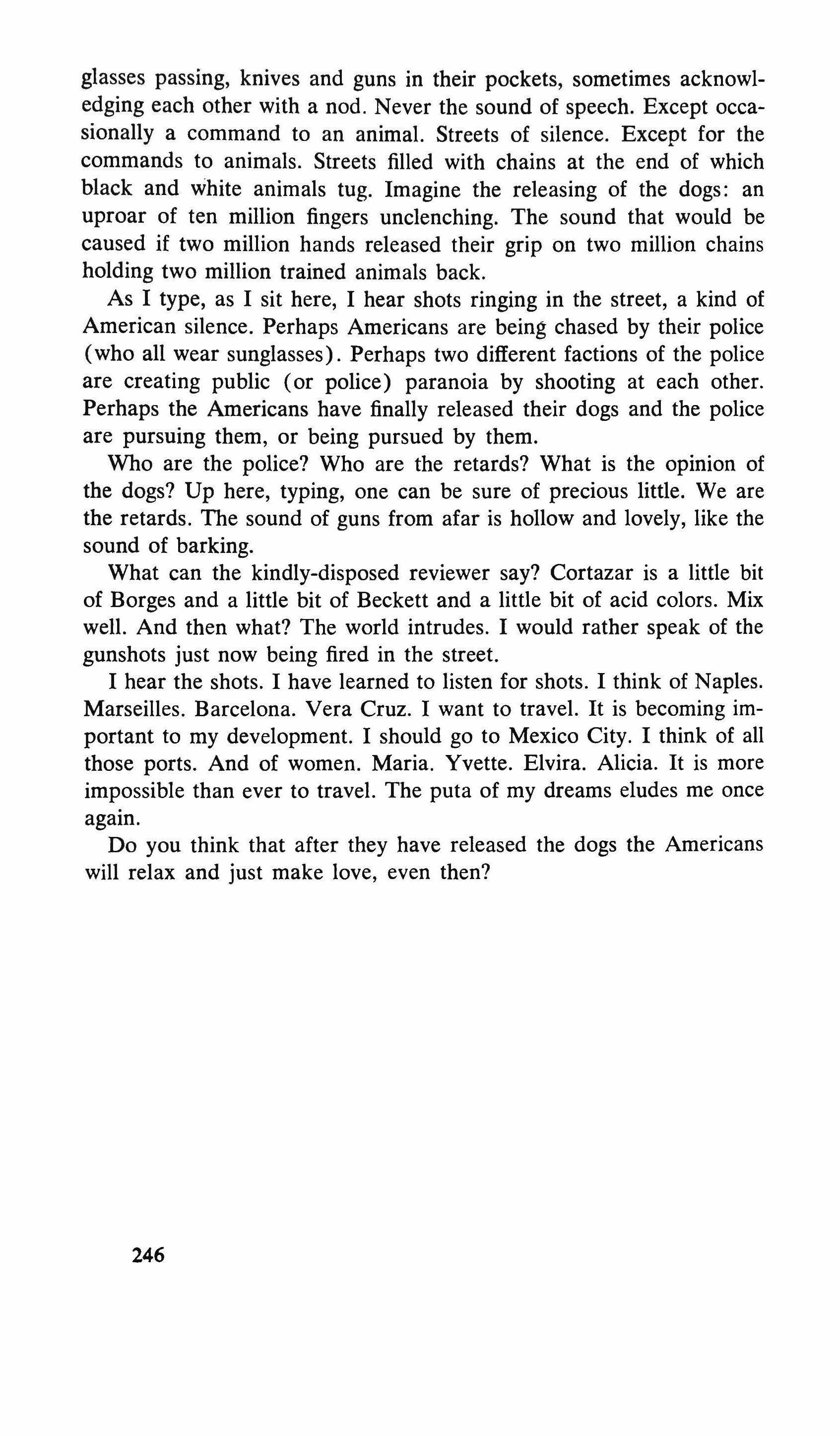
glasses passing, knives and guns in their pockets, sometimes acknowledging each other with a nod. Never the sound of speech. Except occasionally a command to an animal. Streets of silence. Except for the commands to animals. Streets filled with chains at the end of which black and white animals tug. Imagine the releasing of the dogs: an uproar of ten million fingers unclenching. The sound that would be caused if two million hands released their grip on two million chains holding two million trained animals back.
As I type, as I sit here, I hear shots ringing in the street, a kind of American silence. Perhaps Americans are being chased by their police (who all wear sunglasses). Perhaps two different factions of the police are creating public (or police) paranoia by shooting at each other. Perhaps the Americans have finally released their dogs and the police are pursuing them, or being pursued by them.
Who are the police? Who are the retards? What is the opinion of the dogs? Up here, typing, one can be sure of precious little. We are the retards. The sound of guns from afar is hollow and lovely, like the sound of barking.
What can the kindly-disposed reviewer say? Cortazar is a little bit of Borges and a little bit of Beckett and a little bit of acid colors. Mix well. And then what? The world intrudes. I would rather speak of the gunshots just now being fired in the street.
I hear the shots. I have learned to listen for shots. I think of Naples. Marseilles. Barcelona. Vera Cruz. I want to travel. It is becoming important to my development. I should go to Mexico City. I think of all those ports. And of women. Maria. Yvette. Elvira. Alicia. It is more impossible than ever to travel. The puta of my dreams eludes me once again.
Do you think that after they have released the dogs the Americans will relax and just make love, even then?
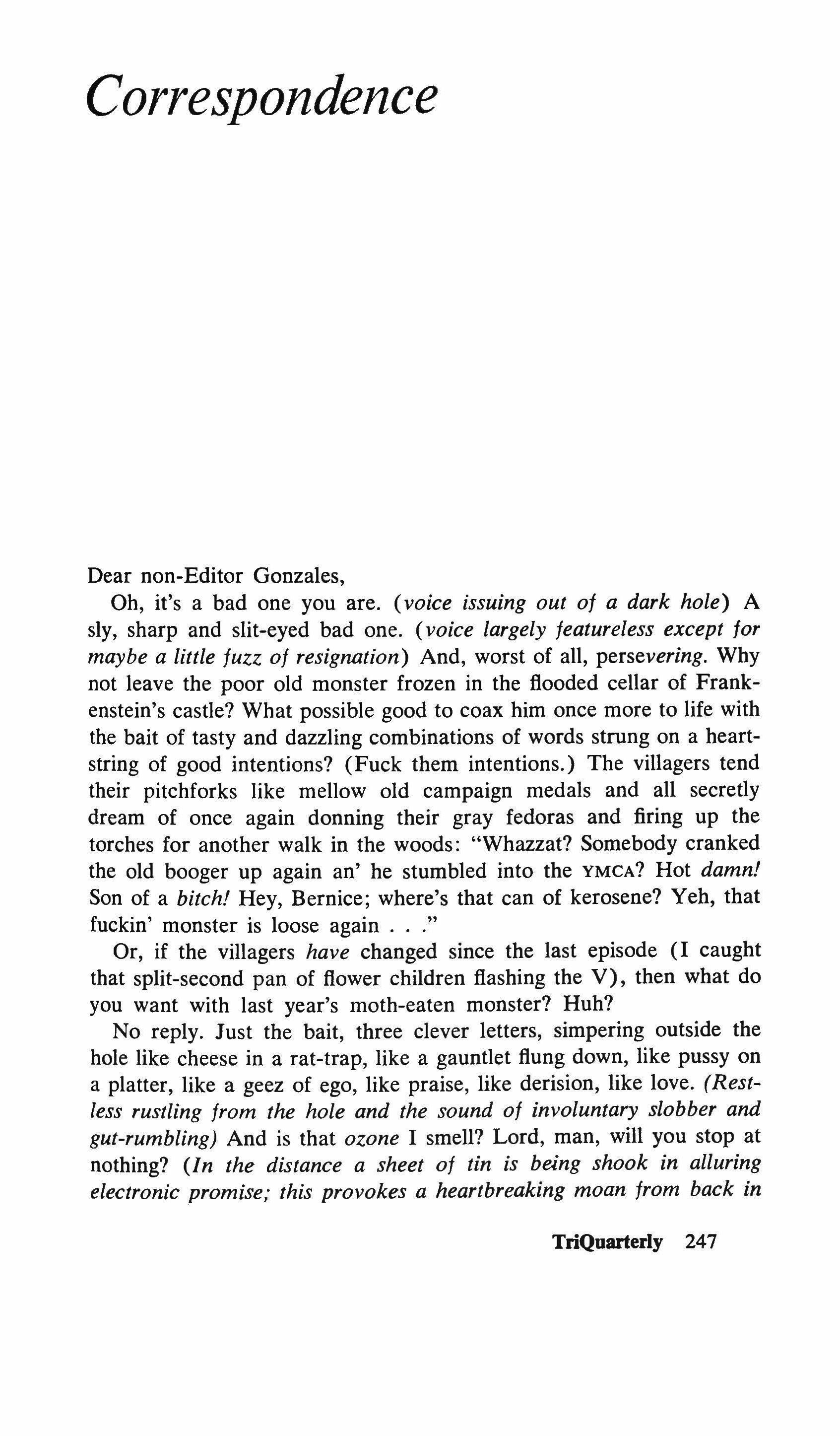
Dear non-Editor Gonzales,
Oh, it's a bad one you are. (voice issuing out of a dark hole) A sly, sharp and slit-eyed bad one. (voice largely featureless except for maybe a little fuzz of resignation) And, worst of all, persevering. Why not leave the poor old monster frozen in the flooded cellar of Frankenstein's castle? What possible good to coax him once more to life with the bait of tasty and dazzling combinations of words strung on a heartstring of good intentions? (Fuck them intentions.) The villagers tend their pitchforks like mellow old campaign medals and all secretly dream of once again donning their gray fedoras and firing up the torches for another walk in the woods: "Whazzat? Somebody cranked the old booger up again an' he stumbled into the YMCA? Hot damn! Son of a bitch! Hey, Bernice; where's that can of kerosene? Yeh, that fuckin' monster is loose again
Or, if the villagers have changed since the last episode (I caught that split-second pan of flower children flashing the V), then what do you want with last year's moth-eaten monster? Huh?
No reply. Just the bait, three clever letters, simpering outside the hole like cheese in a rat-trap, like a gauntlet flung down, like pussy on a platter, like a geez of ego, like praise, like derision, like love. (Restless rustling from the hole and the sound of involuntary slobber and gut-rumbling) And is that ozone 1 smell? Lord, man, will you stop at nothing? (In the distance a sheet of tin is being shook in alluring electronic promise; this provokes a heartbreaking moan from back in
TriQuarterly 247

the hole) Wait! No more! Even a monster is only human. I'll tell you what I'll do: you run a one-ten extension in this hole and-if I don't have to come out-I don't think I could take another defeat from those village dolts and their pack of hysterical mutts-I'll stay inside and-for as long as you keep juice coming through the line and if you give me your word you won't get a shitload of reporters up here with flashbulbs and stuff I'll tell you a story.
That's nice. Maybe a joint, too, if you got one handy. Oh, Lord have mercy on my soul; electricity and dope.
(hiss of sparks and drift of smoke from the hole. Great coughing, like barnacles being scraped from an iron hull.)
What about a girly book? Hm, (thoughtful) can a monster assume he has soul, being man-made and all. (calling again) Or, hey, a good screw book? I bet there's been some dandy screw books hit the stands in the last couple decades; if you toss in a good screw book and leave me alone a while 1'11-
Not until you get the story, huh? All right. But a deal's a deal. When I finish the story you deliver a good screw book, one with pictures if you can swing it, or I come out some night and look you up and squeeze you some, all right? Right.
Okay, this will be a story about-hang on while I twist these wires on better-about (sluggish claptrap machinery grinding stiffly into motion) about
a weatherman by profession with a wife whose pressure front was cold and low she could make all the barometers drop in a ten block radius and bad breath to boot took to slipping off from wifey home and out into the country hills during those lush chinooks wafting warm from the south, where he'd lie bare whipper on his air mattress sweet talking the breezes into glasseyed sunset, promising and insinuating as only a trained meteorologist could be capable. And slick-talked him some very fine afternoons too. But as the talk went on and the winds came through for him it was inevitable they should begin to wise-up in more ways than one. They could see what he was getting out of the little get-togethers; shouldn't they expect as much for their part? So one especially sweet afternoon they shot the terms on him: until he could deliver, in a manner as satisfying to the

breezes as they were beginning to suspect it was to him, he could consider himself cut off.
"Who needs it," he told his little friends; "I ain't lettin' a buncha bobbysoxer high fronts run me any more'n that old low pressure area at home. I'll go roll around in the thunder!"
But it was a hollow threat and all concerned knew it. In a matter of days he was back on the slopes with all kind of pleading and gifts, everything-pinwheels, windsocks, prodding the sky with a long silver flute-but the breezes were buying none of it. "So all fucking right what is it you want?" Knowing all along what was wanted but incapable of presenting a front that suggested he might pull it off. "Okay then, how?" How should they know? He'd introduced them, just innocent virgins, to the art. He was the expert. He'd insinuated the promise. It had to be his deal.
For weeks he was stymied. He even quit going to the hills. And it wasn't until one late summer evening in his home, while his wife slumped across the room reading Popular Mechanics and eating a cold chicken leg, that negotiations were resumed. Some inaudible signal snapped his head up. "Hm?" he said. He was at his desk checking last week's forecasts against what actually happened when the contact came. "Hm," he said again and his wife stood up and walked past. "I shall go bathe," she announced over the top of her drumstick, "if you are going to set there all evening and grunt to yourself like a toad." She paused a moment in hopes of another "hm" but he seemed oblivious, as if he had heard something beyond the windows. She glanced out the French doors but the twilit yard was empty and still. "Dismal toad," she said and resumed her walk to the bathroom.
When she had closed the door and started the water the weatherman folded his hands over the charts and whispered "Good evening?" He strained to hear a response but the curtains hung stiff as iron. "Thank goodness you've come," he said, watching the windows; "I've been going mad. You've no idea. Which one are you?" He had never been confident that he could distinguish one breeze from the other, or if there were actually more than one and not merely parts, characteristics, of the one.
249
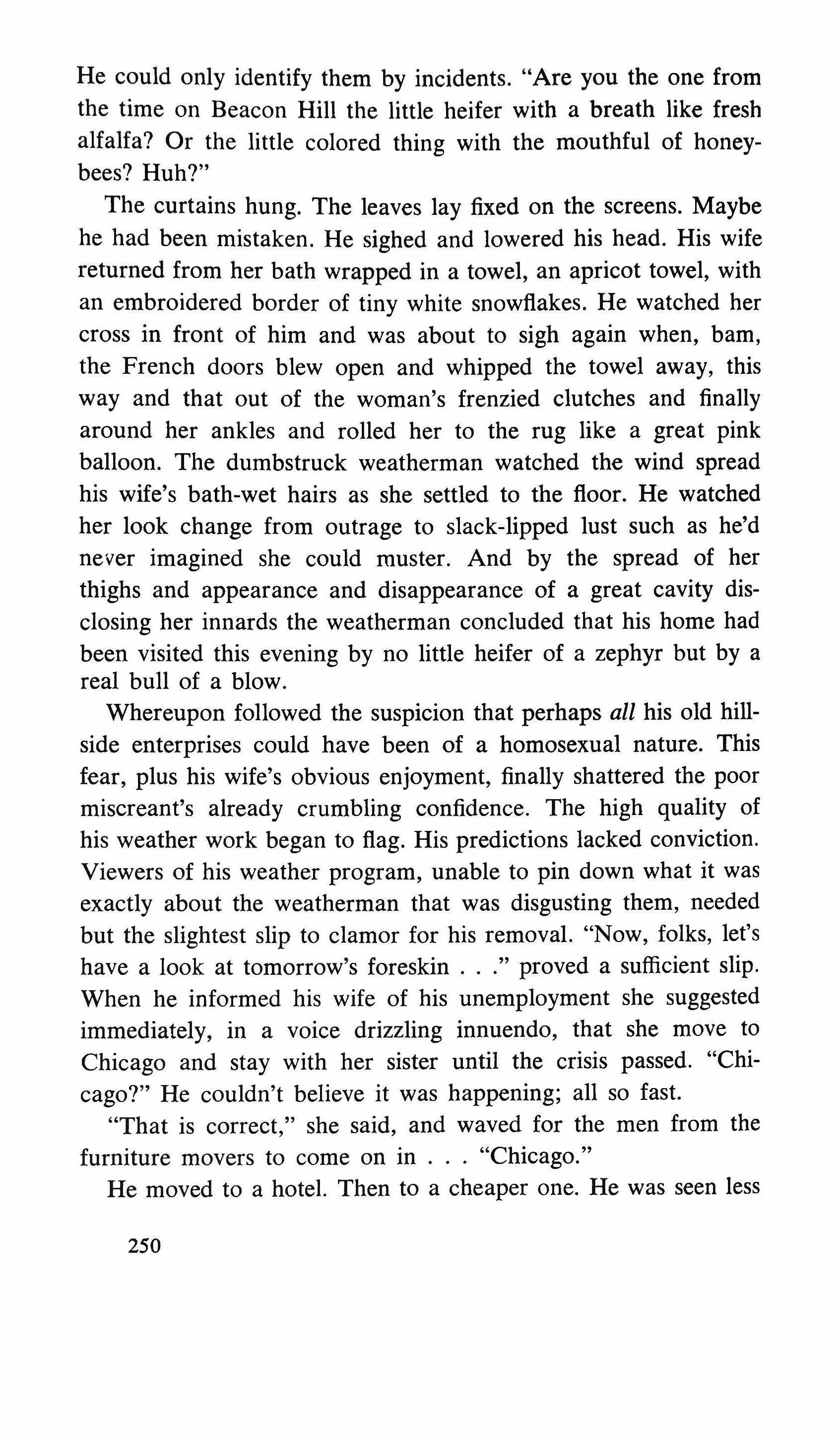
He could only identify them by incidents. "Are you the one from the time on Beacon Hill the little heifer with a breath like fresh alfalfa? Or the little colored thing with the mouthful of honeybees? Huh?"
The curtains hung. The leaves lay fixed on the screens. Maybe he had been mistaken. He sighed and lowered his head. His wife returned from her bath wrapped in a towel, an apricot towel, with an embroidered border of tiny white snowflakes. He watched her cross in front of him and was about to sigh again when, bam, the French doors blew open and whipped the towel away, this way and that out of the woman's frenzied clutches and finally around her ankles and rolled her to the rug like a great pink balloon. The dumbstruck weatherman watched the wind spread his wife's bath-wet hairs as she settled to the floor. He watched her look change from outrage to slack-lipped lust such as he'd never imagined she could muster. And by the spread of her thighs and appearance and disappearance of a great cavity disclosing her innards the weatherman concluded that his home had been visited this evening by no little heifer of a zephyr but by a real bull of a blow.
Whereupon followed the suspicion that perhaps all his old hillside enterprises could have been of a homosexual nature. This fear, plus his wife's obvious enjoyment, finally shattered the poor miscreant's already crumbling confidence. The high quality of his weather work began to flag. His predictions lacked conviction. Viewers of his weather program, unable to pin down what it was exactly about the weatherman that was disgusting them, needed but the slightest slip to clamor for his removal. "Now, folks, let's have a look at tomorrow's foreskin " proved a sufficient slip. When he informed his wife of his unemployment she suggested immediately, in a voice drizzling innuendo, that she move to Chicago and stay with her sister until the crisis passed. "Chicago?" He couldn't believe it was happening; all so fast.
"That is correct," she said, and waved for the men from the furniture movers to come on in "Chicago." He moved to a hotel. Then to a cheaper one. He was seen less 250

and less, mostly during his walks to the weekly unemployment window, or the drugstore to fill the dozen prescriptions for his worsening emphysema hurrying along next to the buildings in the heavy black overcoat he had begun to wear constantly on the streets, good weather or bad, with the collar clutched at his throat as though he battled a blizzard.
"Terminal situation" was his few remaining friends' diagnosis, and the sort of situation best left to drift to its own tattered end as quickly as possible. An obvious derelict and worthless; cross him off. But the winds of fate always have a twist or two left for old derelicts, just to keep you on your toes.
It was a December noon with a sky like cold grease. Our exweatherman was scudding along the concrete, prescriptions bunched in his gaunt hand like a gift for another skeleton, when he was blinded by a blowing sports page. With a shriek he began to run, clawing at the scrap shrouding his eyes, right out into the street where he was struck by a VW Microbus with an Illinois plate. The sports page peeled away and he saw his wife's prematurely weathered face through the anaesthetic. With eyes glittering and voice shaking she begged for forgiveness and would he, might he allow her to care for him at least until he could walk again oh Lord please!
The weatherman squinted to clear his head and with hint of his old skill he gauged the signs-without questioning-and made his forecast: "Maybe you can, and maybe not. You got any money?"
A little. And the VW. But she could work! Nights! After she had nursed her charge through the days she could work nights in the cannery. And also-he noticed the way her head kept jerking to check each flick of the shade over the hospital windowmightn't it be better if they shared a flat? For the sake of economics? Until he got on his feet? "We'll try it a day or two and see," he answered and kept her at bay there for the remainder of their relationship.
Nothing more was ever discussed about Chicago. Except little musings he'd let slip from time to time as he sat on the porch
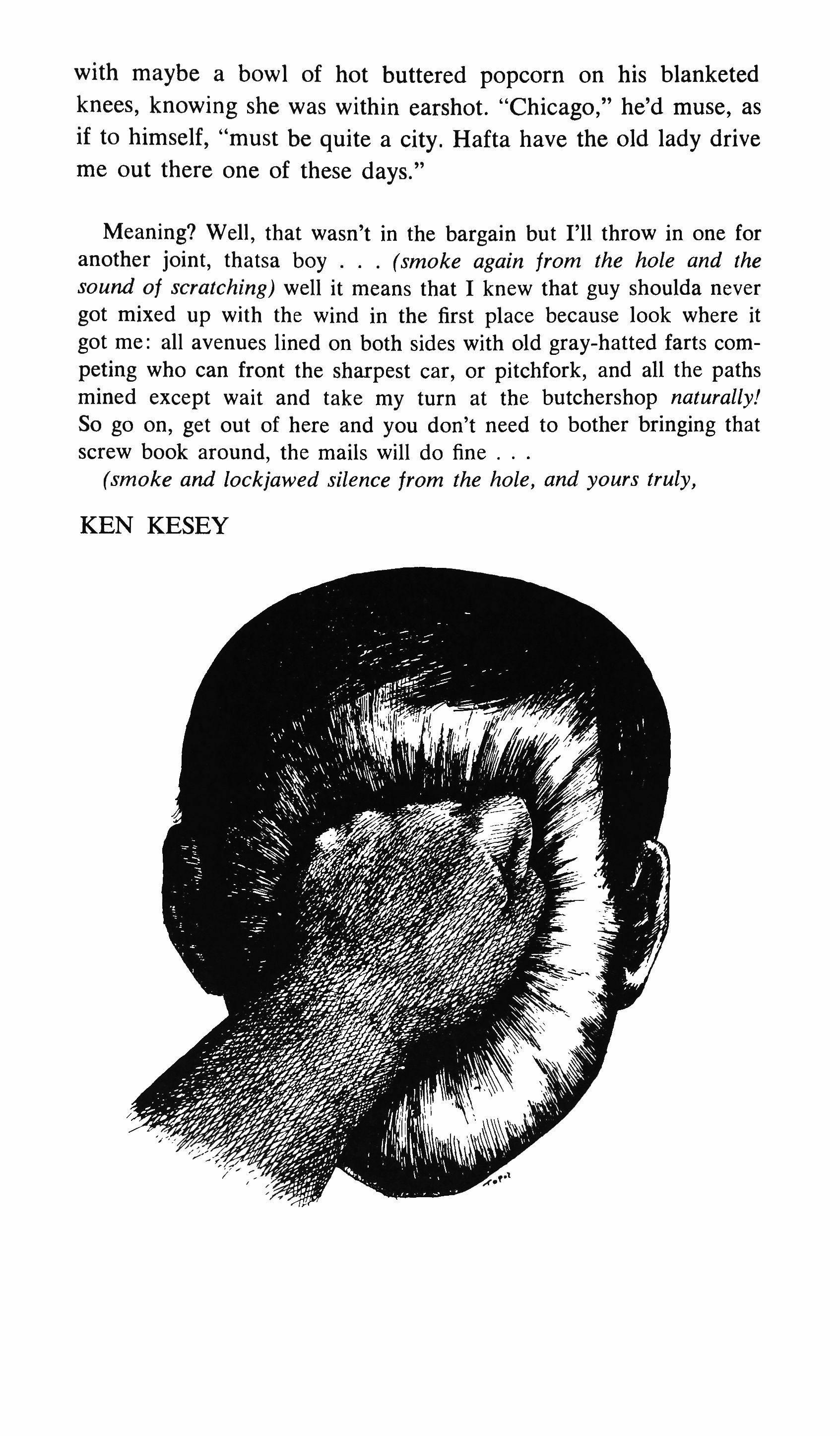
with maybe a bowl of hot buttered popcorn on his blanketed knees, knowing she was within earshot. "Chicago," he'd muse, as if to himself, "must be quite a city. Hafta have the old lady drive me out there one of these days."
Meaning? Well, that wasn't in the bargain but I'll throw in one for another joint, thatsa boy (smoke again from the hole and the sound of scratching) well it means that I knew that guy shoulda never got mixed up with the wind in the first place because look where it got me: all avenues lined on both sides with old gray-hatted farts competing who can front the sharpest car, or pitchfork, and all the paths mined except wait and take my turn at the butchershop naturally! So go on, get out of here and you don't need to bother bringing that screw book around, the mails will do fine (smoke and lockjawed silence from the hole, and yours truly,
KEN KESEY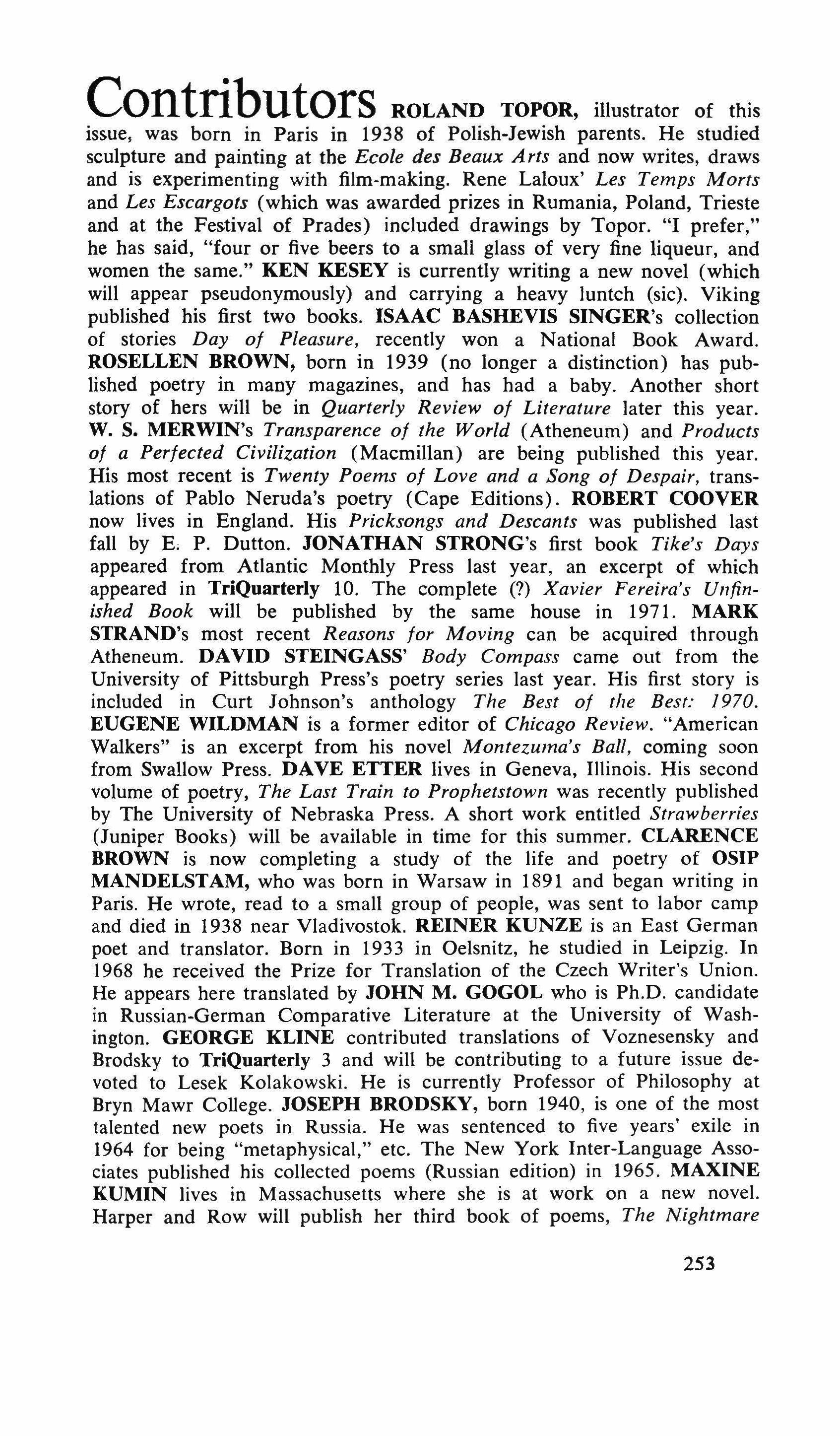
ROLAND TOPOR, illustrator of this issue, was born in Paris in 1938 of Polish-Jewish parents. He studied sculpture and painting at the Ecole des Beaux Arts and now writes, draws and is experimenting with film-making. Rene Laloux' Les Temps Morts and Les Escargots (which was awarded prizes in Rumania, Poland, Trieste and at the Festival of Prades) included drawings by Topor. "I prefer," he has said, "four or five beers to a small glass of very fine liqueur, and women the same." KEN KESEY is currently writing a new novel (which will appear pseudonymously) and carrying a heavy luntch (sic). Viking published his first two books. ISAAC BASHEVIS SINGER's collection of stories Day of Pleasure, recently won a National Book Award. ROSELLEN BROWN, born in 1939 (no longer a distinction) has published poetry in many magazines, and has had a baby. Another short story of hers will be in Quarterly Review of Literature later this year. W. S. MERWIN's Transparence of the World (Atheneum) and Products of a Perfected Civilization (Macmillan) are being published this year. His most recent is Twenty Poems of Love and a Song of Despair, translations of Pablo Neruda's poetry (Cape Editions). ROBERT COOVER now lives in England. His Pricksongs and Descants was published last fall by E P. Dutton. JONATHAN STRONG's first book Tike's Days appeared from Atlantic Monthly Press last year, an excerpt of which appeared in TriQuarterly 10. The complete (?) Xavier Fereira's Unfinished Book will be published by the same house in 1971. MARK STRAND's most recent Reasons for Moving can be acquired through Atheneum. DAVID STEINGASS' Body Compass came out from the University of Pittsburgh Press's poetry series last year. His first story is included in Curt Johnson's anthology The Best of the Best: 1970.
EUGENE WILDMAN is a former editor of Chicago Review. "American Walkers" is an excerpt from his novel Montezuma's Ball, coming soon from Swallow Press. DAVE ETTER lives in Geneva, Illinois. His second volume of poetry, The Last Train to Prophetstown was recently published by The University of Nebraska Press. A short work entitled Strawberries (Juniper Books) will be available in time for this summer.
CLARENCE BROWN is now completing a study of the life and poetry of OSIP MANDELSTAM, who was born in Warsaw in 1891 and began writing in Paris. He wrote, read to a small group of people, was sent to labor camp and died in 1938 near Vladivostok. REINER KUNZE is an East German poet and translator. Born in 1933 in Oelsnitz, he studied in Leipzig. In 1968 he received the Prize for Translation of the Czech Writer's Union. He appears here translated by JOHN M. GOGOL who is Ph.D. candidate in Russian-German Comparative Literature at the University of Washington. GEORGE KLINE contributed translations of Voznesensky and Brodsky to TriQuarterly 3 and will be contributing to a future issue devoted to Lesek Kolakowski. He is currently Professor of Philosophy at Bryn Mawr College. JOSEPH BRODSKY, born 1940, is one of the most talented new poets in Russia. He was sentenced to five years' exile in 1964 for being "metaphysical," etc. The New York Inter-Language Associates published his collected poems (Russian edition) in 1965. MAXINE KUMIN lives in Massachusetts where she is at work on a new novel. Harper and Row will publish her third book of poems, The Nightmare
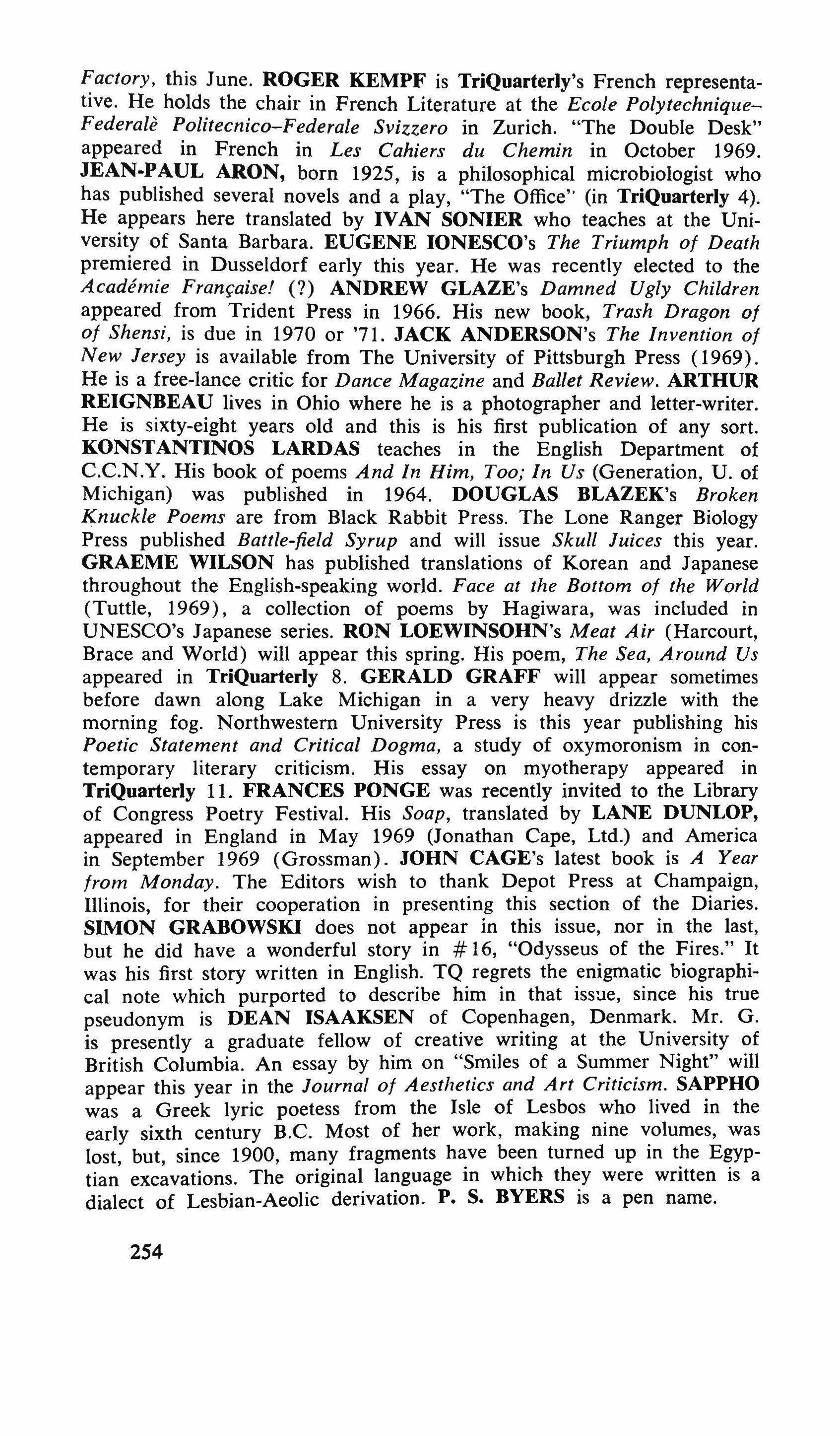
Factory, this June. ROGER KEMPF is TriQuarterJy's French representative. He holds the chair in French Literature at the Ecole PolytechniqueFederate Politecnico-Federale Svizzero in Zurich. "The Double Desk" appeared in French in Les Cahiers du Chemin in October 1969.
JEAN-PAUL ARON, born 1925, is a philosophical microbiologist who has published several novels and a play, "The Office" (in TriQuarterly 4). He appears here translated by IVAN SONIER who teaches at the University of Santa Barbara. EUGENE IONESCO's The Triumph of Death premiered in Dusseldorf early this year. He was recently elected to the Academie Francaise! (?) ANDREW GLAZE's Damned Ugly Children appeared from Trident Press in 1966. His new book, Trash Dragon of of Shensi, is due in 1970 or '71. JACK ANDERSON's The Invention of New Jersey is available from The University of Pittsburgh Press (1969). He is a free-lance critic for Dance Magazine and Ballet Review. ARTHUR REIGNBEAU lives in Ohio where he is a photographer and letter-writer. He is sixty-eight years old and this is his first publication of any sort.
KONSTANTINOS LARDAS teaches in the English Department of C.C.N.Y. His book of poems And In Him, Too; In Us (Generation, U. of Michigan) was published in 1964. DOUGLAS BLAZEK's Broken Knuckle Poems are from Black Rabbit Press. The Lone Ranger Biology Press published Battle-field Syrup and will issue Skull Juices this year. GRAEME WILSON has published translations of Korean and Japanese throughout the English-speaking world. Face at the Bottom of the World (Tuttle, 1969), a collection of poems by Hagiwara, was included in UNESCO's Japanese series. RON LOEWINSOHN's Meat Air (Harcourt, Brace and World) will appear this spring. His poem, The Sea, Around Us appeared in TriQuarterJy 8. GERALD GRAFF will appear sometimes before dawn along Lake Michigan in a very heavy drizzle with the morning fog. Northwestern University Press is this year publishing his Poetic Statement and Critical Dogma, a study of oxymoronism in contemporary literary criticism. His essay on myotherapy appeared in TriQuarterly 11. FRANCES PONGE was recently invited to the Library of Congress Poetry Festival. His Soap, translated by LANE DUNLOP, appeared in England in May 1969 (Jonathan Cape, Ltd.) and America in September 1969 (Grossman). JOHN CAGE's latest book is A Year from Monday. The Editors wish to thank Depot Press at Champaign, Illinois, for their cooperation in presenting this section of the Diaries. SIMON GRABOWSKI does not appear in this issue, nor in the last, but he did have a wonderful story in # 16, "Odysseus of the Fires." It was his first story written in English. TQ regrets the enigmatic biographical note which purported to describe him in that issue, since his true pseudonym is DEAN ISAAKSEN of Copenhagen, Denmark. Mr. G. is presently a graduate fellow of creative writing at the University of British Columbia. An essay by him on "Smiles of a Summer Night" will appear this year in the Journal of Aesthetics and Art Criticism. SAPPHO was a Greek lyric poetess from the Isle of Lesbos who lived in the early sixth century B.C. Most of her work, making nine volumes, was lost, but, since 1900, many fragments have been turned up in the Egyptian excavations. The original language in which they were written is a dialect of Lesbian-Aeolic derivation. P. S. BYERS is a pen name.
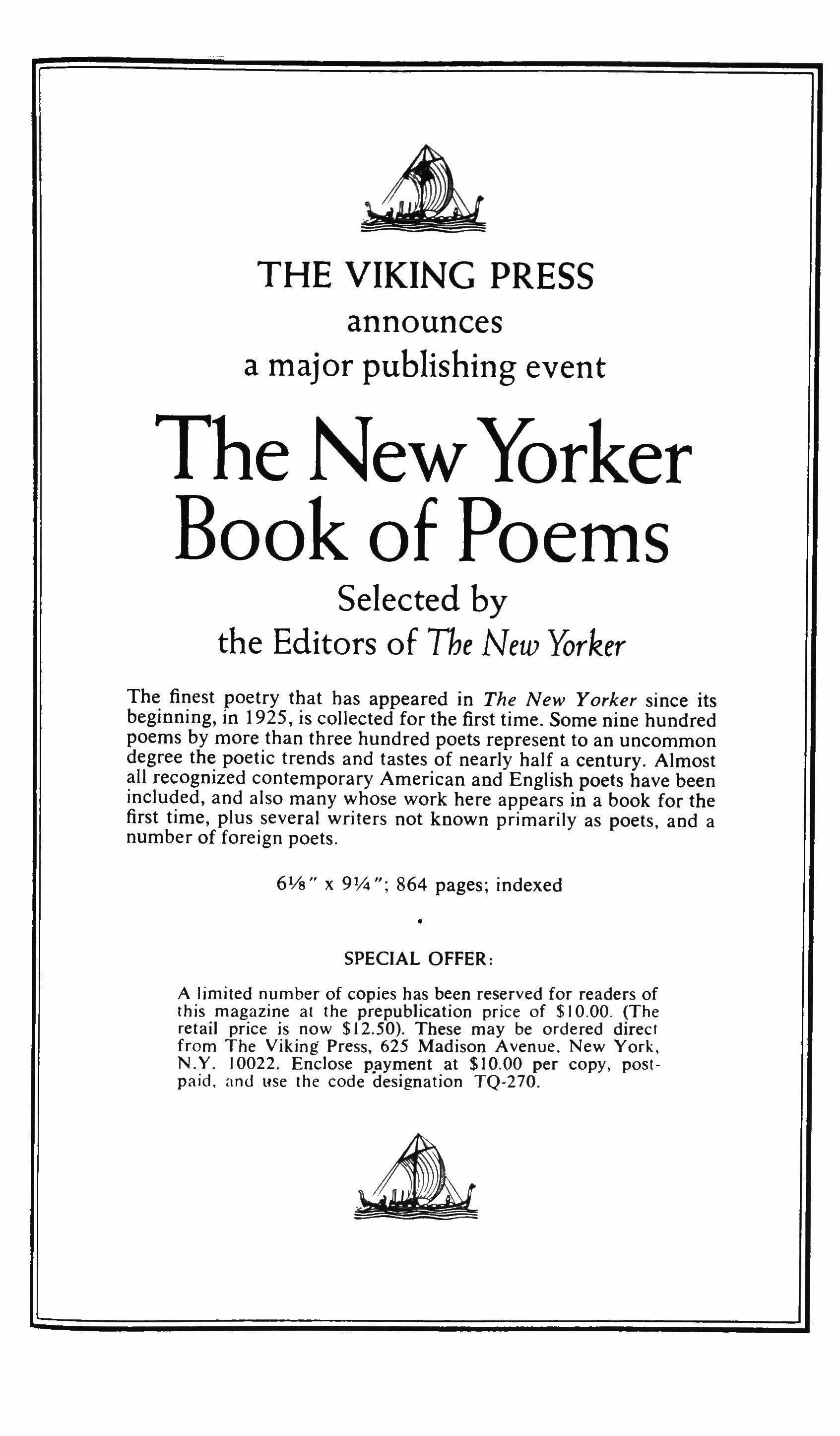
The finest poetry that has appeared in The New Yorker since its beginning, in 1925, is collected for the first time. Some nine hundred poems by more than three hundred poets represent to an uncommon degree the poetic trends and tastes of nearly half a century. Almost all recognized contemporary American and English poets have been included, and also many whose work here appears in a book for the first time, plus several writers not known primarily as poets, and a number of foreign poets.
6Vs" x 91;4 ": 864 pages; indexed
SPECIAL OFFER:
A limited number of copies has been reserved for readers of this magazine at the prepublication price of $1 0.00. (The retail price is now $12.50). These may be ordered direct from The Viking Press, 625 Madison Avenue. New York. N.Y. 10022. Enclose payment at $10.00 per copy. postpaid. and use the code designation TQ-270.

The Lady
Studies of Certain Significant Phases of Her History
Emily James Putnam
Foreword by Jeannette Mirsky
390 pages $1.95
The Human Condition
Hannah Arendt
333 pages $2.95
The Emergence of the American University
Laurence R. Vesey
505 pages $3.95
Point of View: Talks on Education
Edward H. Levi
186 pages $1.25
Free But Not Equal
The Midwest and the Negro during the Civil War
Jacque V. Voegeli
215 pages $2.95
The Death of Slavery
The United States, 1837-65
Elbert B. Smith
225 pages $1.95
Reality and the Heroic Pattern
Last Plays of Ibsen, Shakespeare, and Sophocles
David Grene
170 pages $1.95
Four Modern Philosophers
Carnap, Wittgenstein, Heidegger, Sartre
Arne Naess
367 pages $3.25
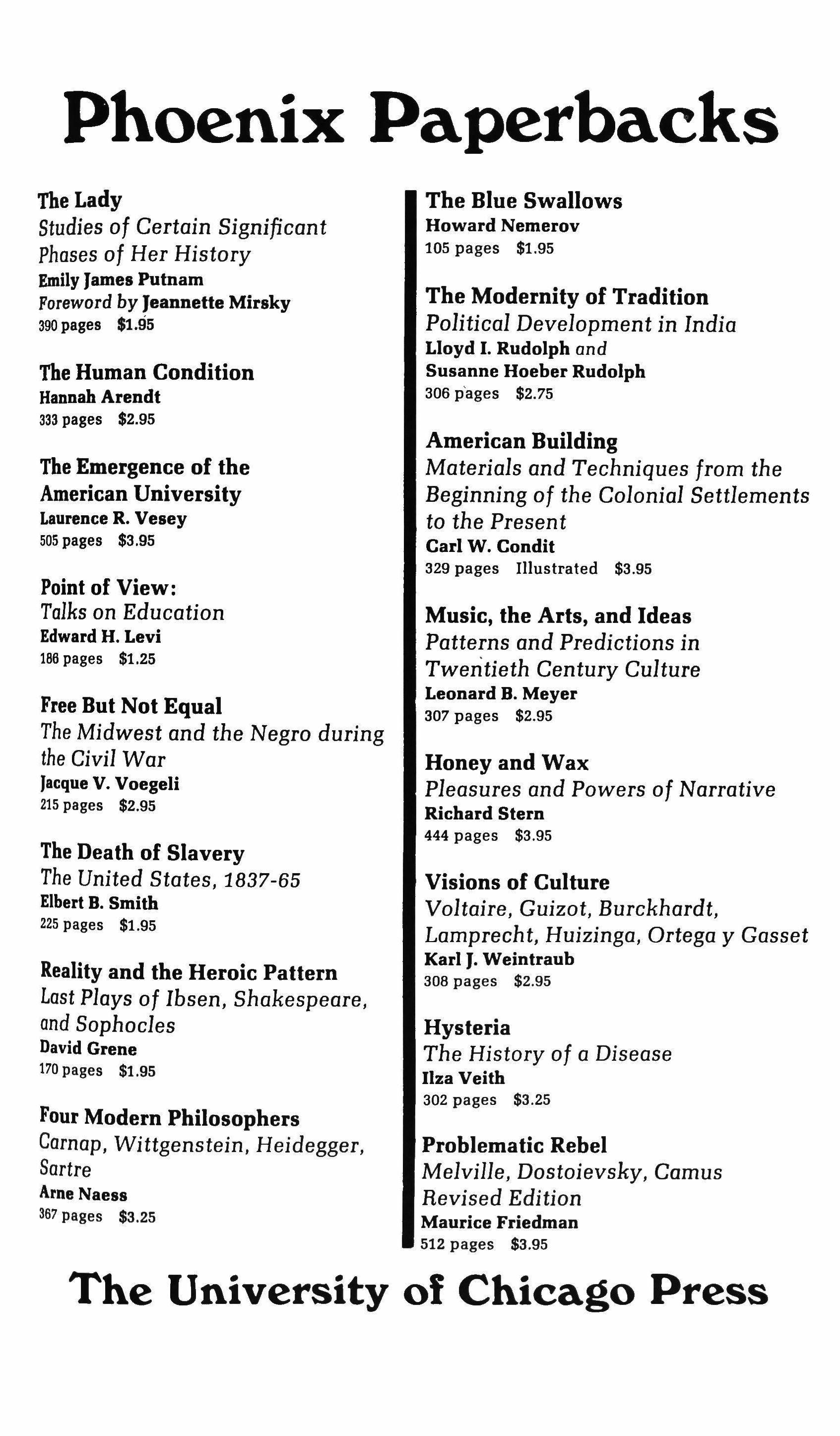
The Blue Swallows
Howard Nemerov
105 pages $1.95
The Modernity of Tradition
Political Development in India
Lloyd I. Rudolph and Susanne Hoeber Rudolph
306 pages $2.75
American Building
Materials and Techniques from the Beginning of the Colonial Settlements to the Present
Carl W. Condit
329 pages Illustrated $3.95
Music, the Arts, and Ideas
Patterns and Predictions in Twentieth Century Culture
Leonard B. Meyer
307 pages $2.95
Honey and Wax
Pleasures and Powers of Narrative
Richard Stern
444 pages $3.95
Visions of Culture
Voltaire, Guizot, Burckhardt, Lamprecht, Huizinga, Ortega y Gasset
Karl J. Weintraub
308 pages $2.95
Hysteria
The History of a Disease
I1za Veith
302 pages $3.25
Problematic Rebel
Melville, Dostoievsky, Camus
Revised Edition
Maurice Friedman
512 pages $3.95
A sequence of fierce and funny fictions, the book bounces into and out of an Aztec soccer game, a fantastic history of dancing dogs, or new modes of walking in America.
MONTEZUMA'S BALL is full of corners which a reader rounds in delight only to find the ball bounding through another image of terror.
$6.00 paper $2.00
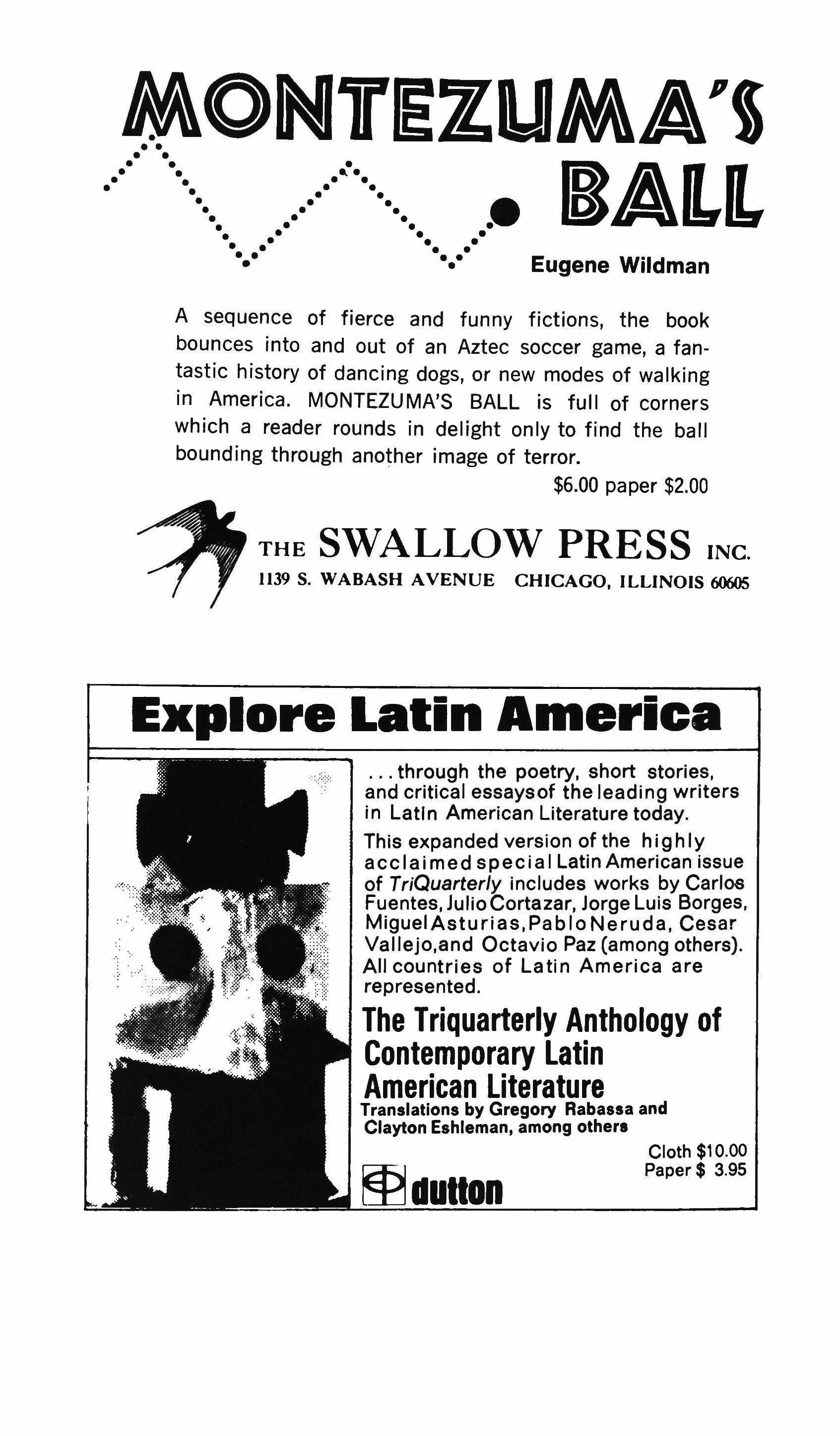
through the poetry, short stories, and critical essaysof the leading writers in Latin American Literature today.
This expanded version of the highly acclai med special Latin American issue of TriQuarterly includes works by Carlos Fuentes, Julio Cortazar, Jorge Luis Borges, MigueIAsturias,PabloNeruda, Cesar Vallejo,and Octavia Paz (among others). All countries of Latin America are represented.
The Triquarterly Anthology of Contemporary Latin American Literature
Translations by Gregory Rabassa and Clayton Eshleman, among other.
Cloth $10.00 Paper $ 3.95
Edited by Charles Newman and William A. Henkin, Jr in conjunction with the staff ofTriQuarterly
A collection of new works of short fiction, poetry, criticism, drawings, and photography by forty-four American writers and artists, all under thirty years ofage. Contributors include Keith Abbott, Marvin Bell, Tom Clark, Andrew Field, Walter Hall, James Hersh, Stephen Koch, John McEvoy, Joyce Carol Oates, Dennis Schmitz, Jonathan Strong, R. J. Wilson, and others. Eight photographs by Danny Lyon.
308 pages $9.50
A collection of critical and biographical articles on the young American poet and some of her previously unpublished or uncollected poems. Contributors are A. Alvarez, Lois Ames, Douglas Cleverdon, A. E. Dyson, Mary Ellmann, Richard Howard, Ted Hughes, A. R. Jones, Hugh Kenner, Edward Lucie-Smith, Charles Newman, John Frederick Nims, M. L. Rosenthal, Anne Sexton, Stephen Spender, and George Steiner.
320 pages $6.50
Now available in paperback
Edited with an introduction by Mary Ellen Solt
"The best presentation of a most exciting and increasingly popular kind of literature."-Ronald Gross
"The most attractive collection of Concrete Poetry I know of. I am moved, and renewed."-Clayton Eshleman, Caterpillar 312 pages cloth $10.95 paper $4.95
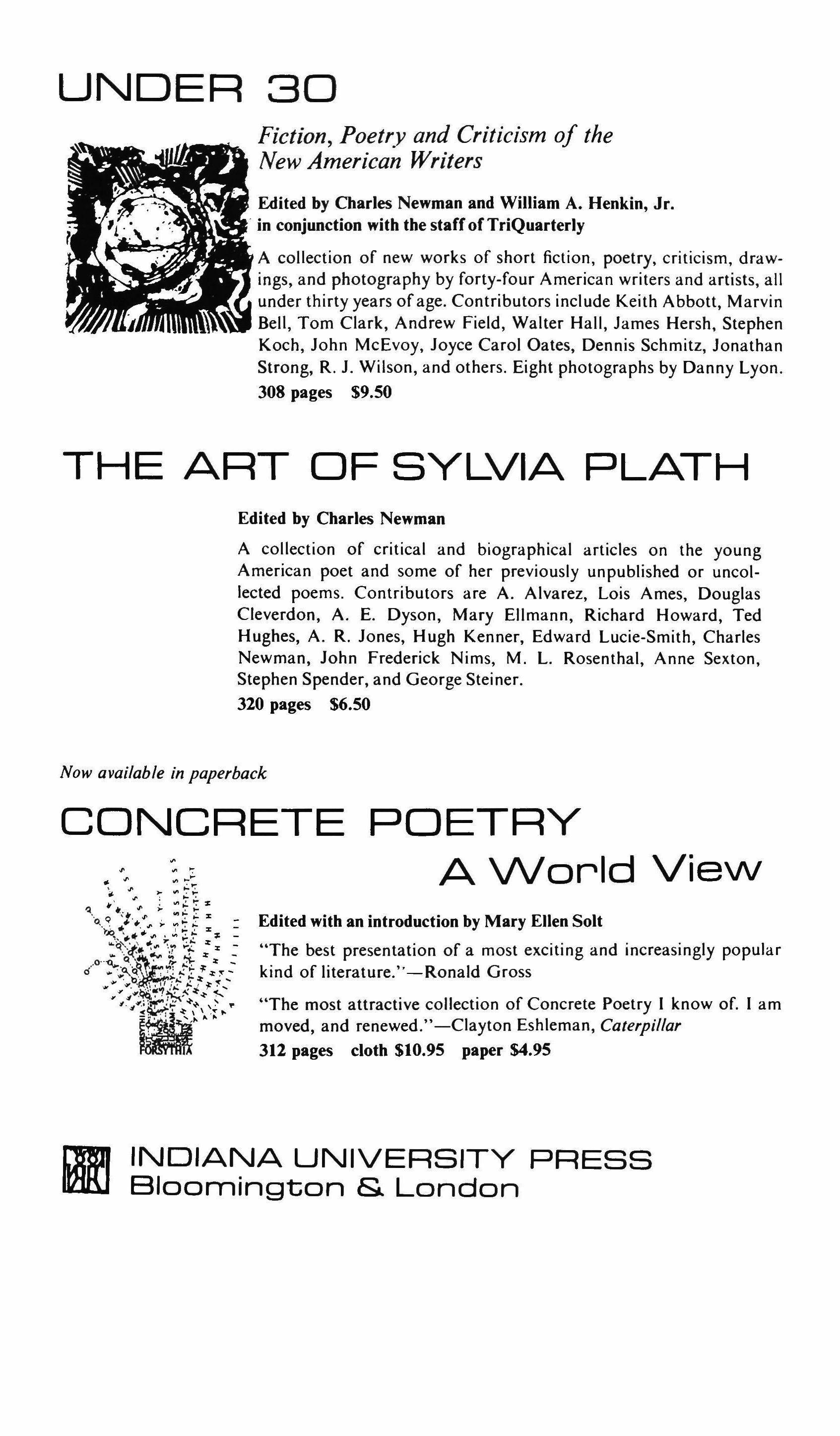
INDIANA UNIVERSITY PRESS
Bloomington & London
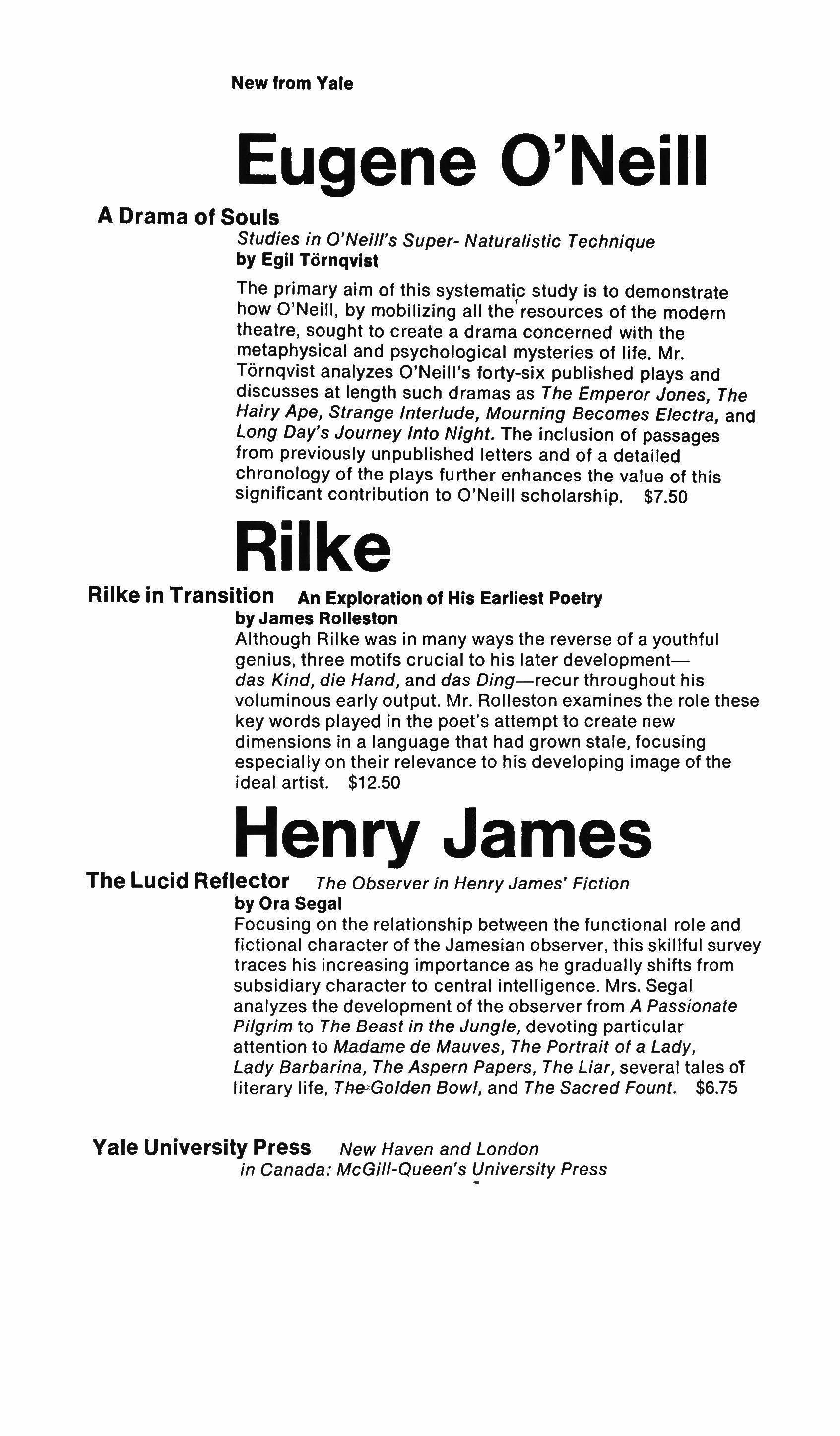
Souls
Studies in O'Neill's Super- Naturalistic Technique by Egil Tornqvist
The primary aim of this systematic study is to demonstrate how O'Neill, by mobilizing all theresources of the modern theatre, sought to create a drama concerned with the metaphysical and psychological mysteries of life. Mr. Tornqvist analyzes O'Neill's forty-six published plays and discusses at length such dramas as The Emperor Jones, The Hairy Ape, Strange Interlude, Mourning Becomes Electra, and Long Day's Journey Into Night. The inclusion of passages from previously unpublished letters and of a detailed chronology of the plays further enhances the value of this significant contribution to O'Neill scholarship. $7.50
Rilke in Transition An Exploration of His Earliest Poetry by James Rolleston
Although Rilke was in many ways the reverse of a youthful genius, three motifs crucial to his later developmentdas Kind, die Hand, and das Ding-recur throughout his voluminous early output. Mr. Rolleston examines the role these key words played in the poet's attempt to create new dimensions in a language that had grown stale, focusing especially on their relevance to his developing image of the ideal artist. $12.50
by
Ora SegalFocusing on the relationship between the functional role and fictional character of the Jamesian observer, this skillful survey traces his increasing importance as he gradually shifts from subsidiary character to central intelligence. Mrs. Segal analyzes the development of the observer from A Passionate Pilgrim to The Beast in the Jungle, devoting particular attention to Madame de Mauves, The Portrait of a Lady, Lady Berberine, The Aspern Papers, The Liar, several tales 01 literary life, 1"h!rGo/cren Bowl, and The Sacred Fount. $6.75
Yale University Press New Haven and London in Canada: McGill-Queen's University Press
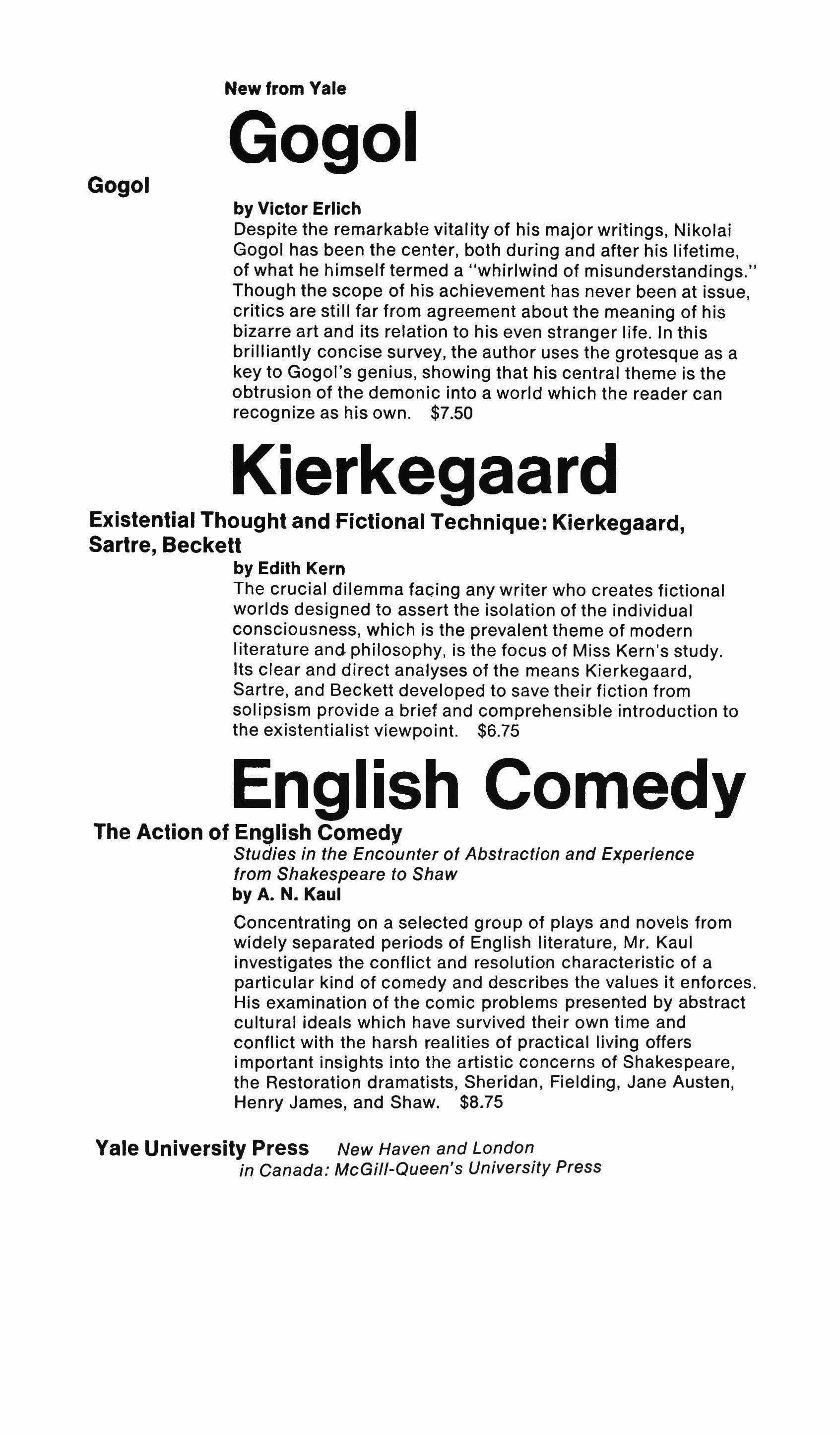
Despite the remarkable vitality of his major writings, Nikolai Gogol has been the center, both during and after his lifetime, of what he himself termed a "whirlwind of misunderstandings." Though the scope of his achievement has never been at issue, critics are still far from agreement about the meaning of his bizarre art and its relation to his even stranger life. In this brilliantly concise survey, the author uses the grotesque as a key to Gogol's genius, showing that his central theme is the obtrusion of the demonic into a world which the reader can recognize as his own.
$7.50
Existential Thought and Fictional Technique: Kierkegaard, Sartre, Beckett
by Edith KernThe crucial dilemma facing any writer who creates fictional worlds designed to assert the isolation of the individual consciousness, which is the prevalent theme of modern literature and philosophy, is the focus of Miss Kern's study. Its clear and direct analyses of the means Kierkegaard, Sartre, and Beckett developed to save their fiction from solipsism provide a brief and comprehensible introduction to the existentialist viewpoint. $6.75
The Action of English Comedy
Studies in the Encounter of Abstraction and Experience from Shakespeare to Shaw by
A. N. KaulConcentrating on a selected group of plays and novels from widely separated periods of English literature, Mr. Kaul investigates the conflict and resolution characteristic of a particular kind of comedy and describes the values it enforces. His examination of the comic problems presented by abstract cultural ideals which have survived their own time and conflict with the harsh realities of practical living offers important insights into the artistic concerns of Shakespeare, the Restoration dramatists, Sheridan, Fielding, Jane Austen, Henry James, and Shaw. $8.75
Yale University Press New Haven and London in Canada: McGill-Queen's University Press
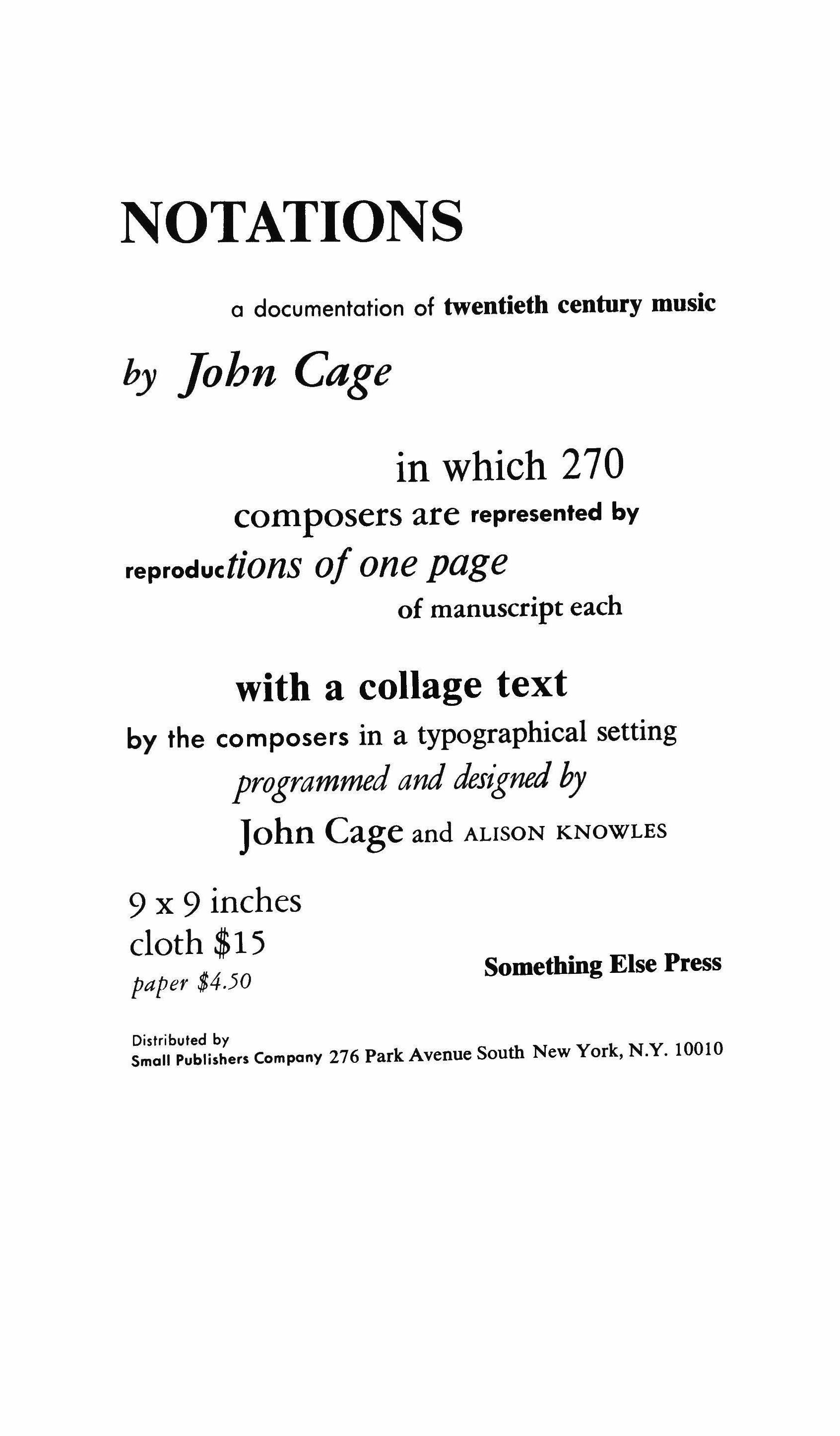
a documentation of twentieth century music by John Cage in which 270 composers are represented by reproductions of one page of manuscript each with a collage text by the composers in a typographical setting programmed and designedby John Cage and ALISON KNOWLES 9 X 9 inches cloth $15
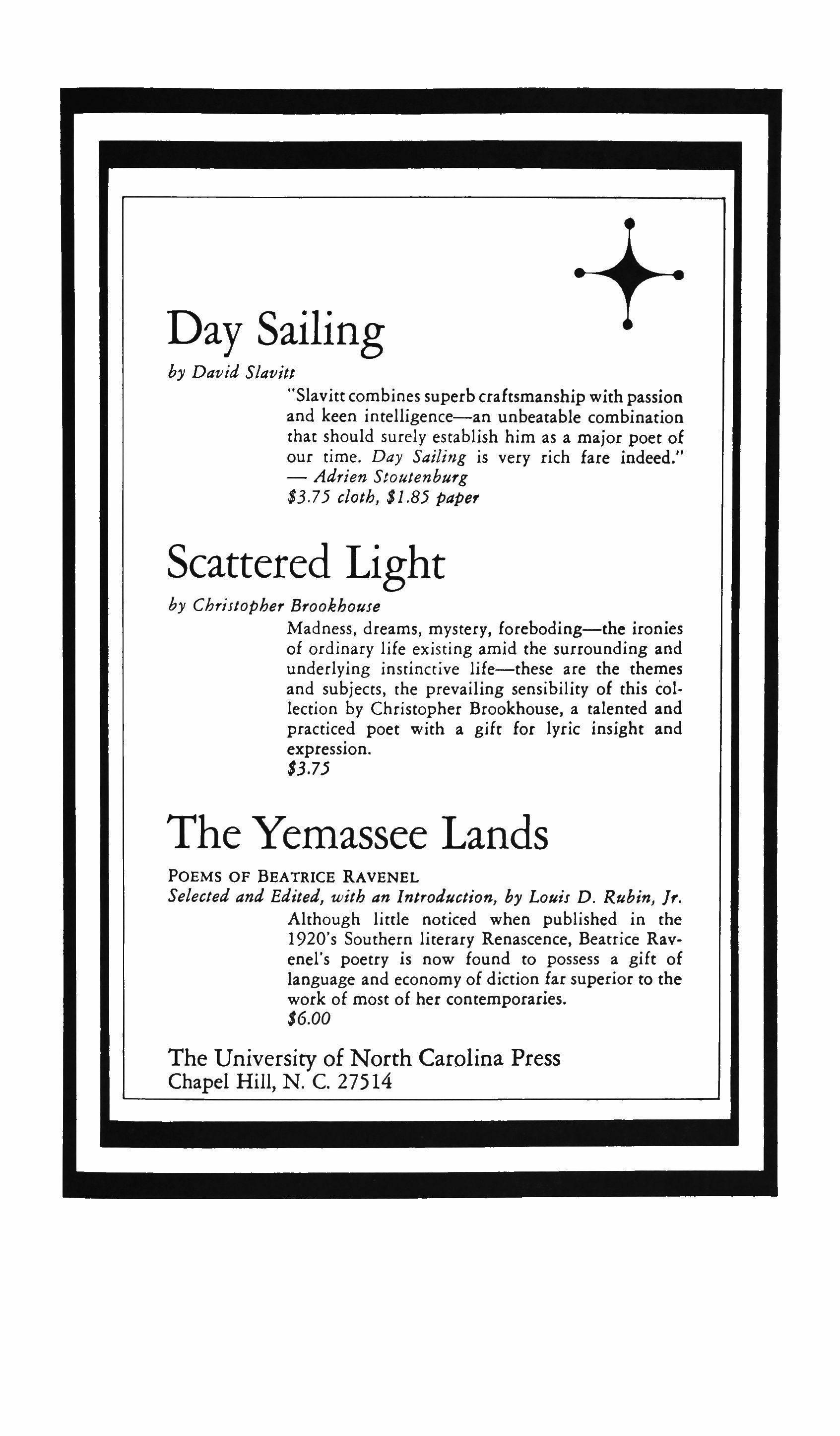
"Slavin combines superb craftsmanship with passion and keen intelligence-an unbeatable combination that should surely establish him as a major poet of our time. Day Sailing is very rich fare indeed." - Adrien Stoutenburg
$3.75 cloth, $1.85 paper
Madness, dreams, mystery, foreboding-the ironies of ordinary life existing amid the surrounding and underlying instinctive life-these are the themes and subjects, the prevailing sensibility of this collection by Christopher Brookhouse, a talented and practiced poet with a gift for lyric insight and expression.
$3.75
POEMS OF BEATRICE RAVENEL
Selected and Edited, with an Introduction, by Louis D. Rubin, Jr.
Although little noticed when published in the 1920's Southern literary Renascence, Beatrice Ravenel's poetry is now found to possess a gift of language and economy of diction far superior to the work of most of her contemporaries.
$6.00
The University of North Carolina Press Chapel Hill, N. C. 27514
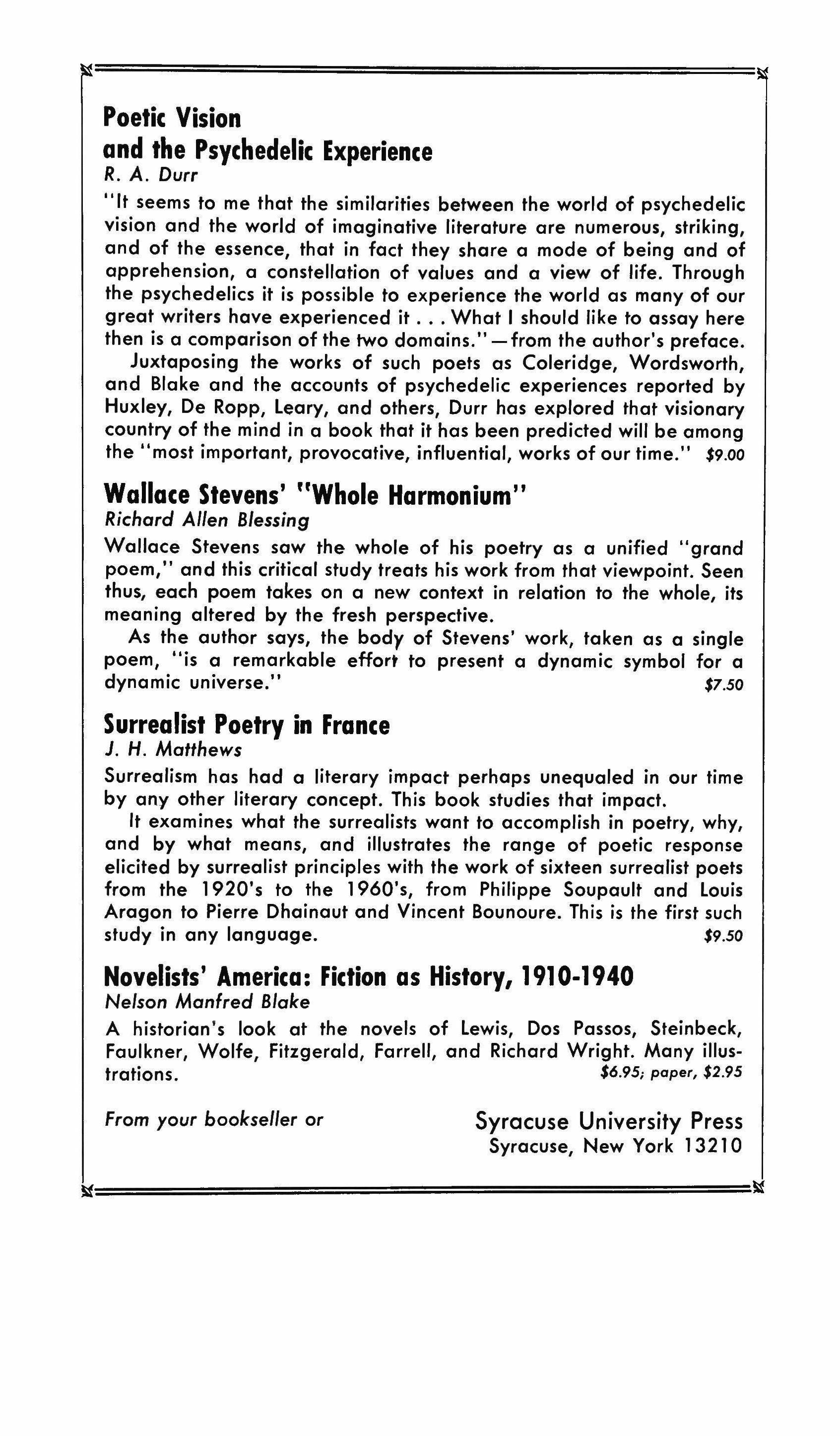
R. A. Durr
"It seems to me that the similarities between the world of psychedelic vision and the world of imaginative literature are numerous, striking, and of the essence, that in fact they share a mode of being and of apprehension, a constellation of values and a view of life. Through the psychedelics it is possible to experience the world as many of our great writers have experienced it What I should like to assay here then is a comparison of the two domains." -from the author's preface.
Juxtaposing the works of such poets as Coleridge, Wordsworth, and Blake and the accounts of psychedelic experiences reported by Huxley, De Ropp, Leary, and others, Durr has explored that visionary country of the mind in a book that it has been predicted will be among the "most important, provocative, influential, works of our time." $9.00
Richard Allen Blessing
Wallace Stevens saw the whole of his poetry as a unified "grand poem," and this critical study treats his work from that viewpoint. Seen thus, each poem takes on a new context in relation to the whole, its meaning altered by the fresh perspective.
As the author says, the body of Stevens' work, taken as a single poem, "is a remarkable effort to present a dynamic symbol for a dynamic universe." $7.50
J. H. Matthews
Surrealism has had a literary impact perhaps unequaled in our time by any other literary concept. This book studies that impact. It examines what the surrealists want to accomplish in poetry, why, and by what means, and illustrates the range of poetic response elicited by surrealist principles with the work of sixteen surrealist poets from the 1920's to the 1960's, from Philippe Soupault and Louis Aragon to Pierre Dhainaut and Vincent Bounoure. This is the first such study in any language. $9.50
Nelson Manfred Blake
A historian's look at the novels of Lewis, Dos Passos, Steinbeck, Faulkner, Wolfe, Fitzgerald, Farrell, and Richard Wright. Many illustrations. $6.95; paper, $2.95
From your bookseller or Syracuse University Press Syracuse, New York 13210

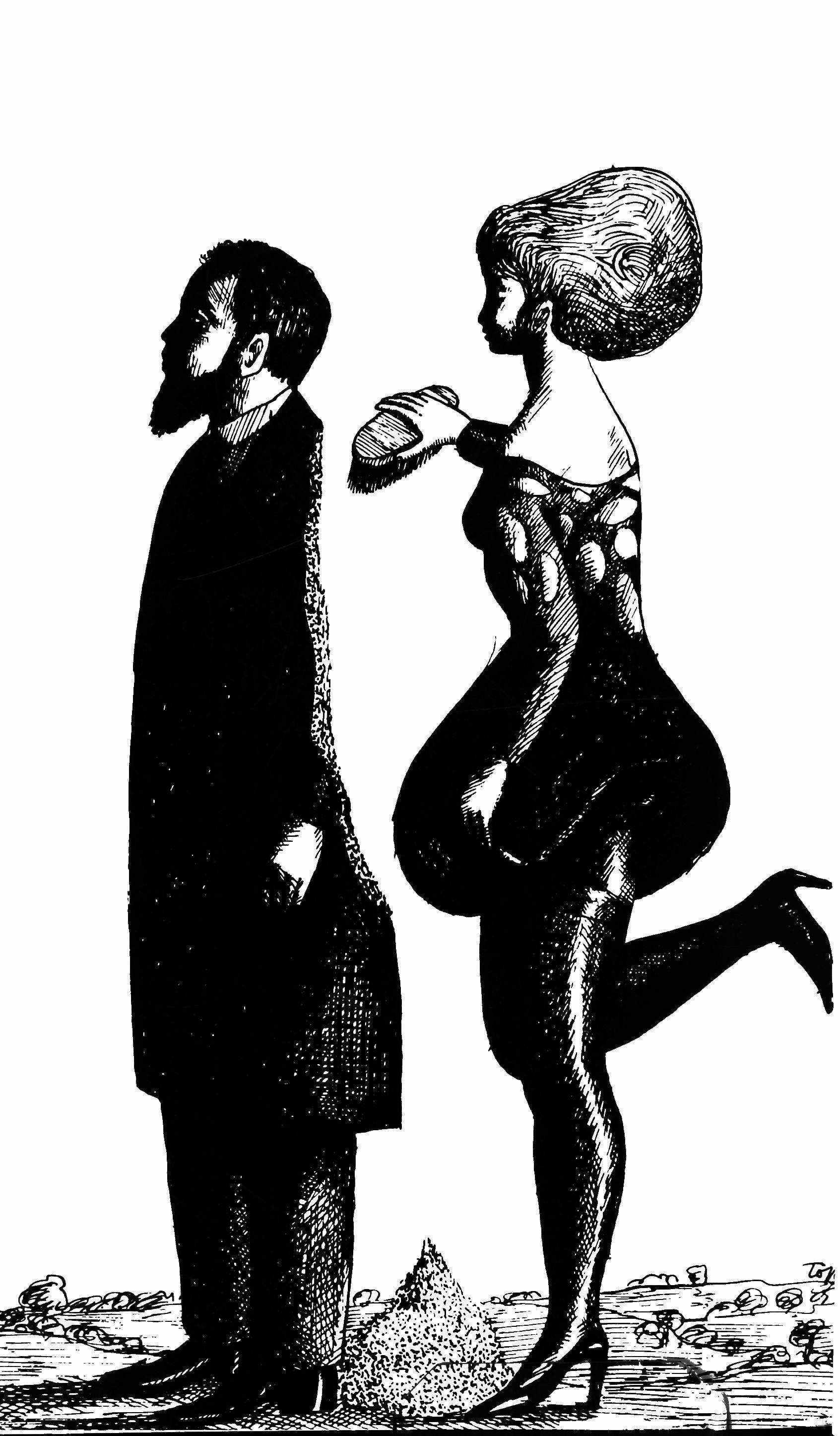
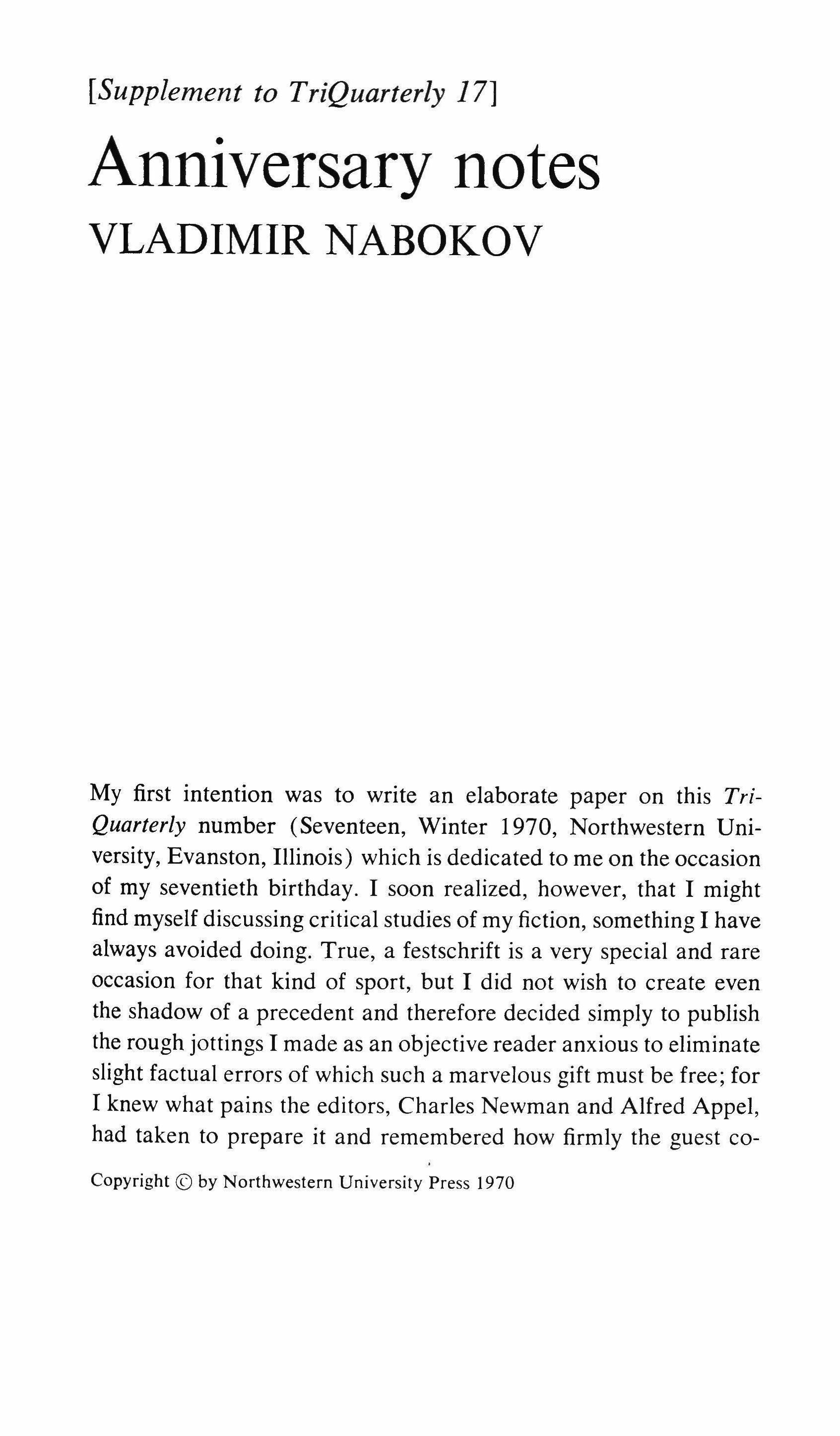
My first intention was to write an elaborate paper on this TriQuarterly number (Seventeen, Winter 1970, Northwestern University, Evanston, Illinois) which is dedicated to me on the occasion of my seventieth birthday. I soon realized, however, that I might find myself discussing critical studies of my fiction, something I have always avoided doing. True, a festschrift is a very special and rare occasion for that kind of sport, but I did not wish to create even the shadow of a precedent and therefore decided simply to publish the rough jottings I made as an objective reader anxious to eliminate slight factual errors of which such a marvelous gift must be free; for I knew what pains the editors, Charles Newman and Alfred Appel, had taken to prepare it and remembered how firmly the guest co-
Copyright © by Northwestern University Press 1970
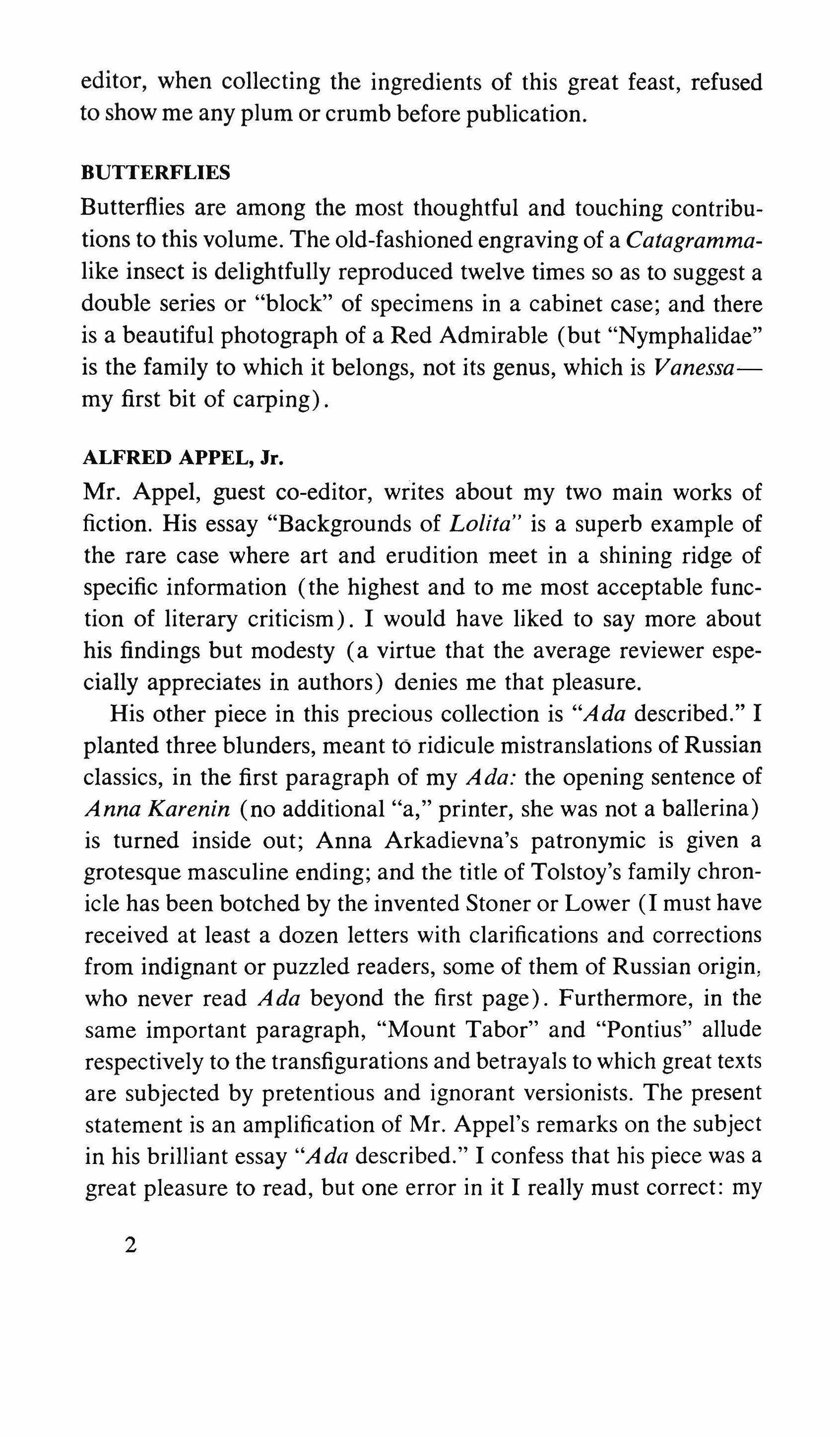
editor, when collecting the ingredients of this great feast, refused to show me any plum or crumb before publication.
Butterflies are among the most thoughtful and touching contributions to this volume. The old-fashioned engraving of a Catagrammalike insect is delightfully reproduced twelve times so as to suggest a double series or "block" of specimens in a cabinet case; and there is a beautiful photograph of a Red Admirable (but "Nymphalidae" is the family to which it belongs, not its genus, which is Vanessamy first bit of carping).
Mr. Appel, guest co-editor, writes about my two main works of fiction. His essay "Backgrounds of Lolita" is a superb example of the rare case where art and erudition meet in a shining ridge of specific information (the highest and to me most acceptable function of literary criticism). I would have liked to say more about his findings but modesty (a virtue that the average reviewer especially appreciates in authors) denies me that pleasure. His other piece in this precious collection is "Ada described." I planted three blunders, meant to ridicule mistranslations of Russian classics, in the first paragraph of my Ada: the opening sentence of Anna Karenin (no additional "a," printer, she was not a ballerina) is turned inside out; Anna Arkadievna's patronymic is given a grotesque masculine ending; and the title of Tolstoy's family chronicle has been botched by the invented Stoner or Lower (I must have received at least a dozen letters with clarifications and corrections from indignant or puzzled readers, some of them of Russian origin, who never read A da beyond the first page). Furthermore, in the same important paragraph, "Mount Tabor" and "Pontius" allude respectively to the transfigurations and betrayals to which great texts are subjected by pretentious and ignorant versionists. The present statement is an amplification of Mr. Appel's remarks on the subject in his brilliant essay "Ada described." I confess that his piece was a great pleasure to read, but one error in it I really must correct: my 2
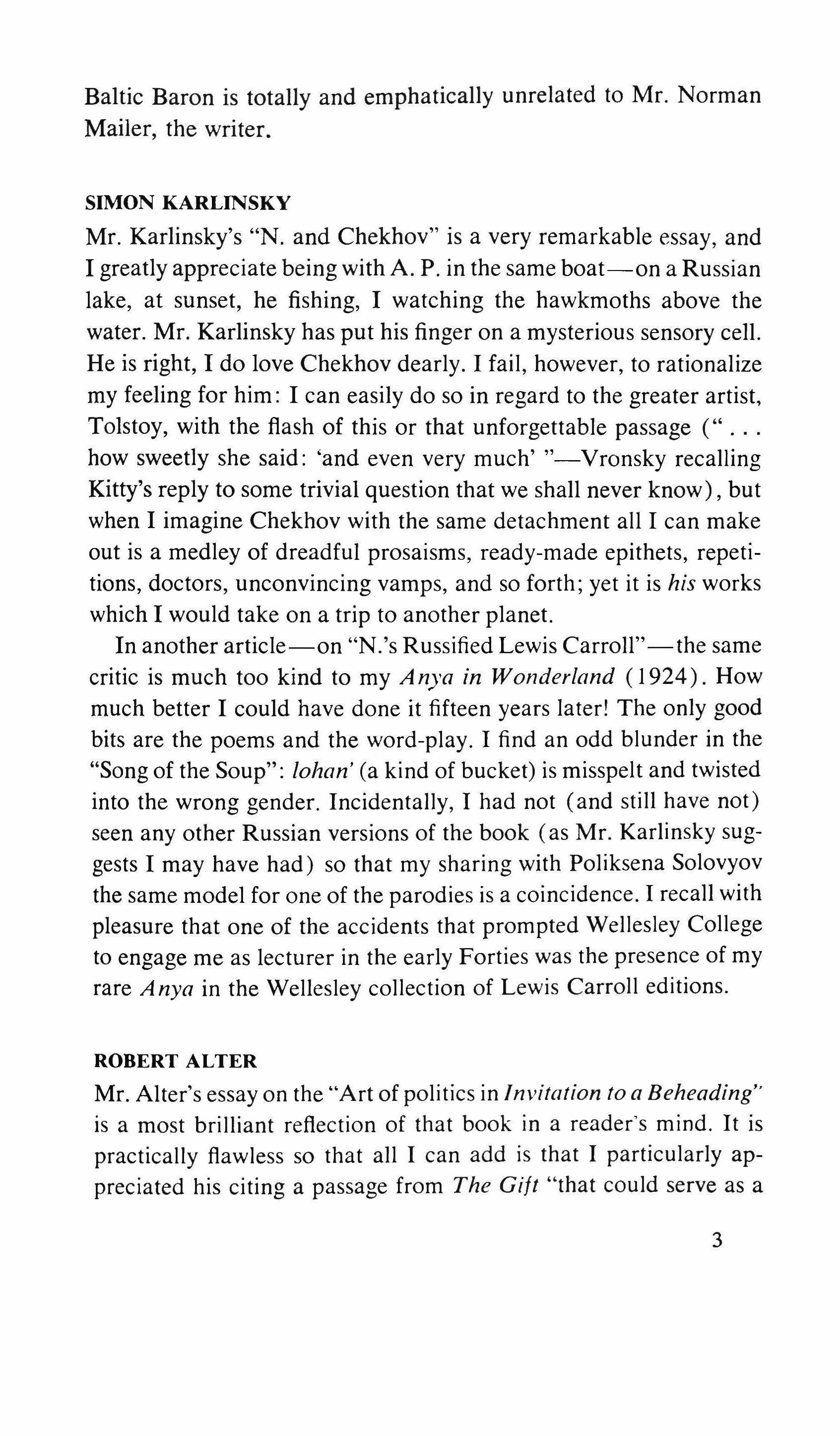
Baltic Baron is totally and emphatically unrelated to Mr. Norman Mailer, the writer.
Mr. Karlinsky's "N. and Chekhov" is a very remarkable essay, and I greatly appreciate being with A. P. in the same boat-on a Russian lake, at sunset, he fishing, I watching the hawkmoths above the water. Mr. Karlinsky has put his finger on a mysterious sensory cell. He is right, I do love Chekhov dearly. I fail, however, to rationalize my feeling for him: I can easily do so in regard to the greater artist, Tolstoy, with the flash of this or that unforgettable passage (" how sweetly she said: 'and even very much' "-Vronsky recalling Kitty's reply to some trivial question that we shall never know), but when I imagine Chekhov with the same detachment all I can make out is a medley of dreadful prosaisms, ready-made epithets, repetitions, doctors, unconvincing vamps, and so forth; yet it is his works which I would take on a trip to another planet.
In another article-on "N.'s Russified Lewis Carroll"-the same critic is much too kind to my A nya in Wonderland (1924). How much better I could have done it fifteen years later! The only good bits are the poems and the word-play. I find an odd blunder in the "Song of the Soup": lohan' (a kind of bucket) is misspelt and twisted into the wrong gender. Incidentally, I had not (and still have not) seen any other Russian versions of the book (as Mr. Karlinsky suggests I may have had) so that my sharing with Poliksena Solovyov the same model for one of the parodies is a coincidence. I recall with pleasure that one of the accidents that prompted Wellesley College to engage me as lecturer in the early Forties was the presence of my rare A nya in the Wellesley collection of Lewis Carroll editions.
Mr. Alter's essay on the "Art of politics in Invitation to a Beheading" is a most brilliant reflection of that book in a reader's mind. It is practically flawless so that all I can add is that I particularly appreciated his citing a passage from The Gift "that could serve as a
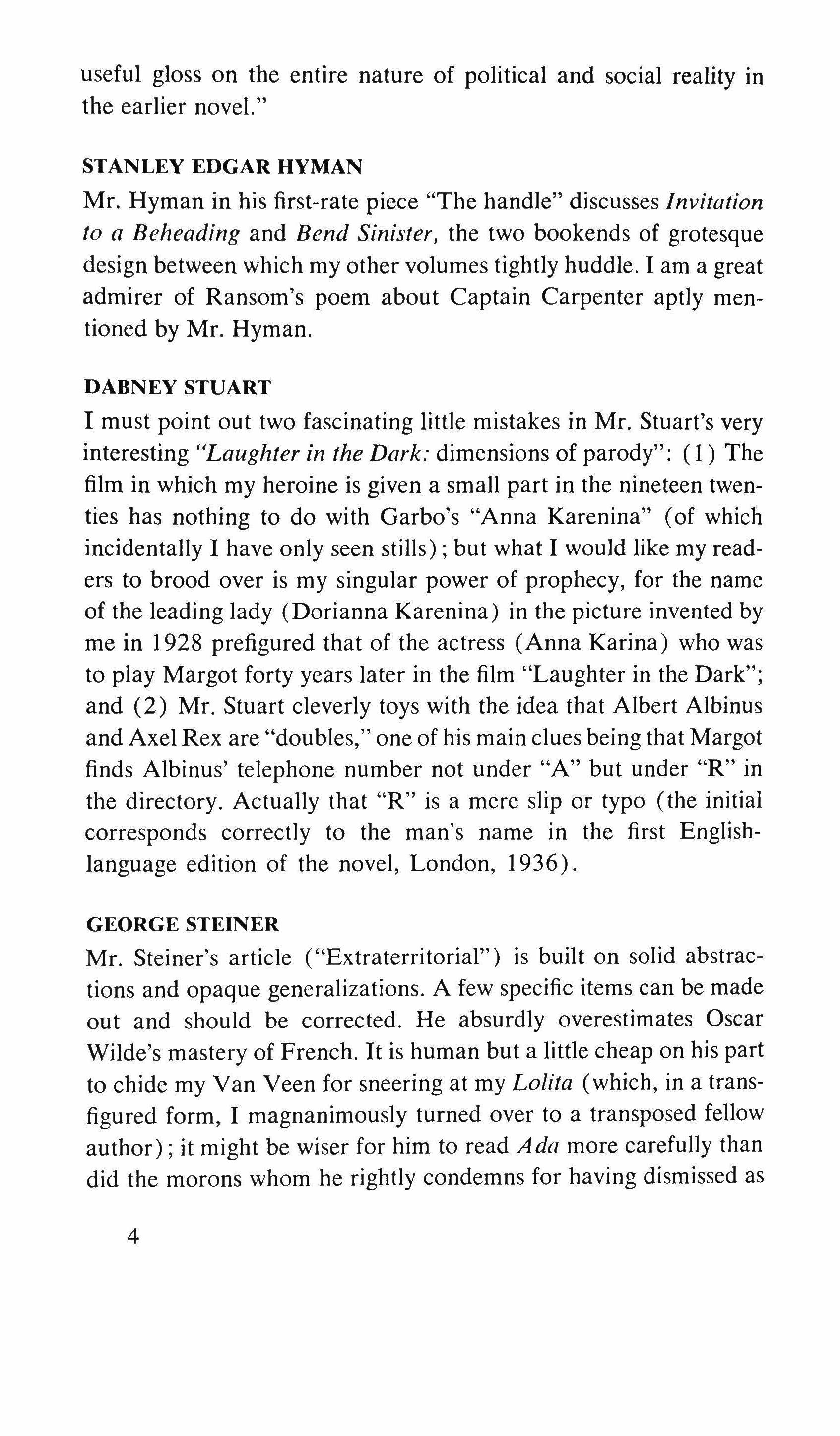
useful gloss on the entire nature of political and social reality in the earlier novel."
Mr. Hyman in his first-rate piece "The handle" discusses Invitation to a Beheading and Bend Sinister, the two bookends of grotesque design between which my other volumes tightly huddle. I am a great admirer of Ransom's poem about Captain Carpenter aptly mentioned by Mr. Hyman.
DABNEY STUART
I must point out two fascinating little mistakes in Mr. Stuart's very interesting "Laughter in the Dark: dimensions of parody": (1) The film in which my heroine is given a small part in the nineteen twenties has nothing to do with Garbo's "Anna Karenina" (of which incidentally I have only seen stills) ; but what I would like my readers to brood over is my singular power of prophecy, for the name of the leading lady (Dorianna Karenina) in the picture invented by me in 1928 prefigured that of the actress (Anna Karina) who was to play Margot forty years later in the film "Laughter in the Dark"; and (2) Mr. Stuart cleverly toys with the idea that Albert Albinus and Axel Rex are "doubles," one of his main clues being that Margot finds Albinus' telephone number not under "A" but under "R" in the directory. Actually that "R" is a mere slip or typo (the initial corresponds correctly to the man's name in the first Englishlanguage edition of the novel, London, 1936).
GEORGE STEINER
Mr. Steiner's article ("Extraterritorial") is built on solid abstractions and opaque generalizations. A few specific items can be made out and should be corrected. He absurdly overestimates Oscar Wilde's mastery of French. It is human but a little cheap on his part to chide my Van Veen for sneering at my Lolita (which, in a transfigured form, I magnanimously turned over to a transposed fellow author) ; it might be wiser for him to read A da more carefully than did the morons whom he rightly condemns for having dismissed as
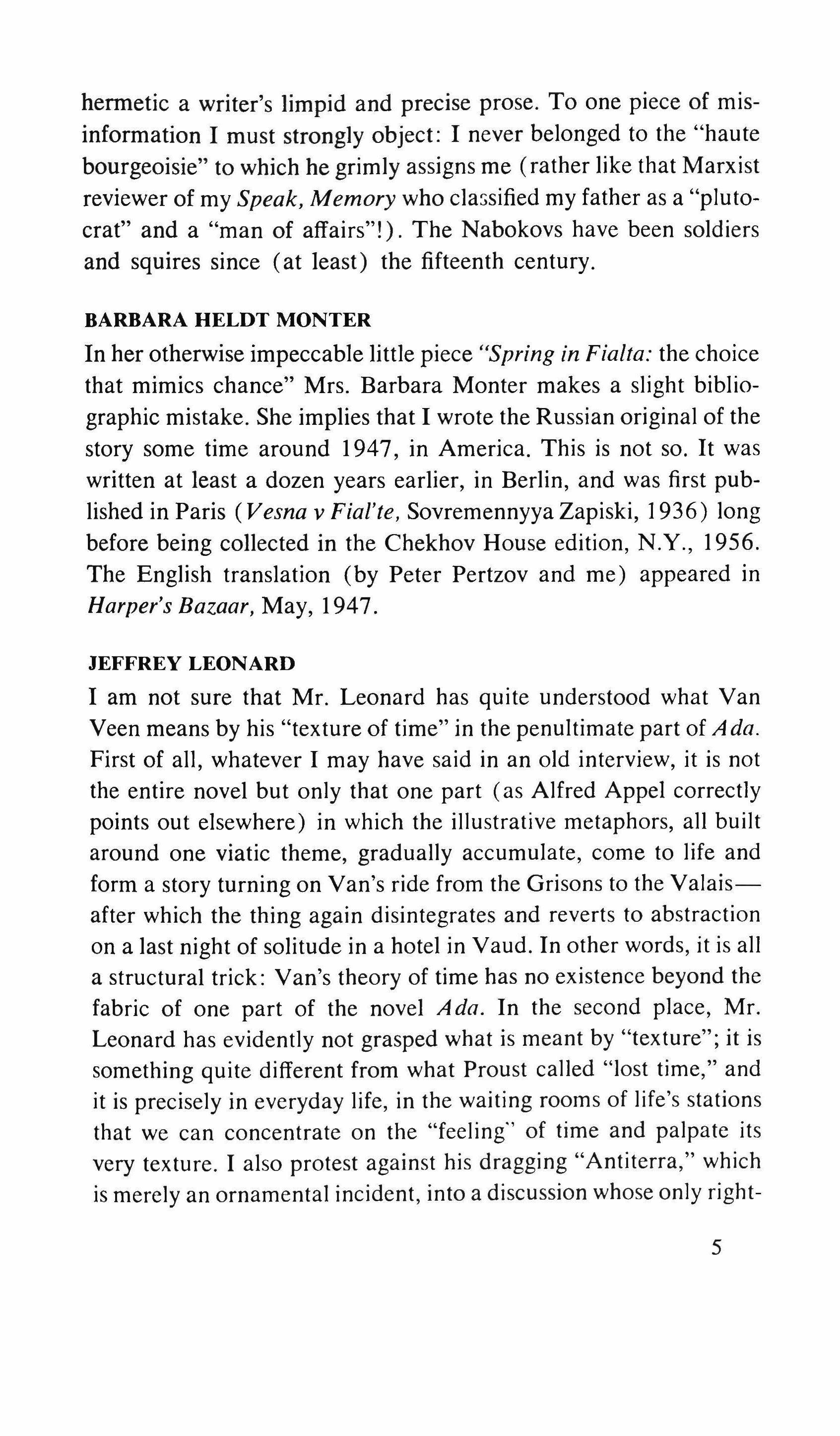
hermetic a writer's limpid and precise prose. To one piece of misinformation I must strongly object: I never belonged to the "haute bourgeoisie" to which he grimly assigns me (rather like that Marxist reviewer of my Speak, Memory who classified my father as a "plutocrat" and a "man of affairs''!). The Nabokovs have been soldiers and squires since (at least) the fifteenth century.
In her otherwise impeccable little piece "Spring in Fialta: the choice that mimics chance" Mrs. Barbara Monter makes a slight bibliographic mistake. She implies that I wrote the Russian original of the story some time around 1947, in America. This is not so. It was written at least a dozen years earlier, in Berlin, and was first published in Paris (Vesna v Fial'te, Sovremennyya Zapiski, ] 936) long before being collected in the Chekhov House edition, N.Y., 1956. The English translation (by Peter Pertzov and me) appeared in Harper's Bazaar, May, 1947.
JEFFREY LEONARD
I am not sure that Mr. Leonard has quite understood what Van Veen means by his "texture of time" in the penultimate part of Ada. First of all, whatever I may have said in an old interview, it is not the entire novel but only that one part (as Alfred Appel correctly points out elsewhere) in which the illustrative metaphors, all built around one viatic theme, gradually accumulate, come to life and form a story turning on Van's ride from the Orisons to the Valaisafter which the thing again disintegrates and reverts to abstraction on a last night of solitude in a hotel in Vaud. In other words, it is all a structural trick: Van's theory of time has no existence beyond the fabric of one part of the novel Ada. In the second place, Mr. Leonard has evidently not grasped what is meant by "texture"; it is something quite different from what Proust called "lost time," and it is precisely in everyday life, in the waiting rooms of life's stations that we can concentrate on the "feeling" of time and palpate its very texture. I also protest against his dragging "Antiterra," which is merely an ornamental incident, into a discussion whose only right5
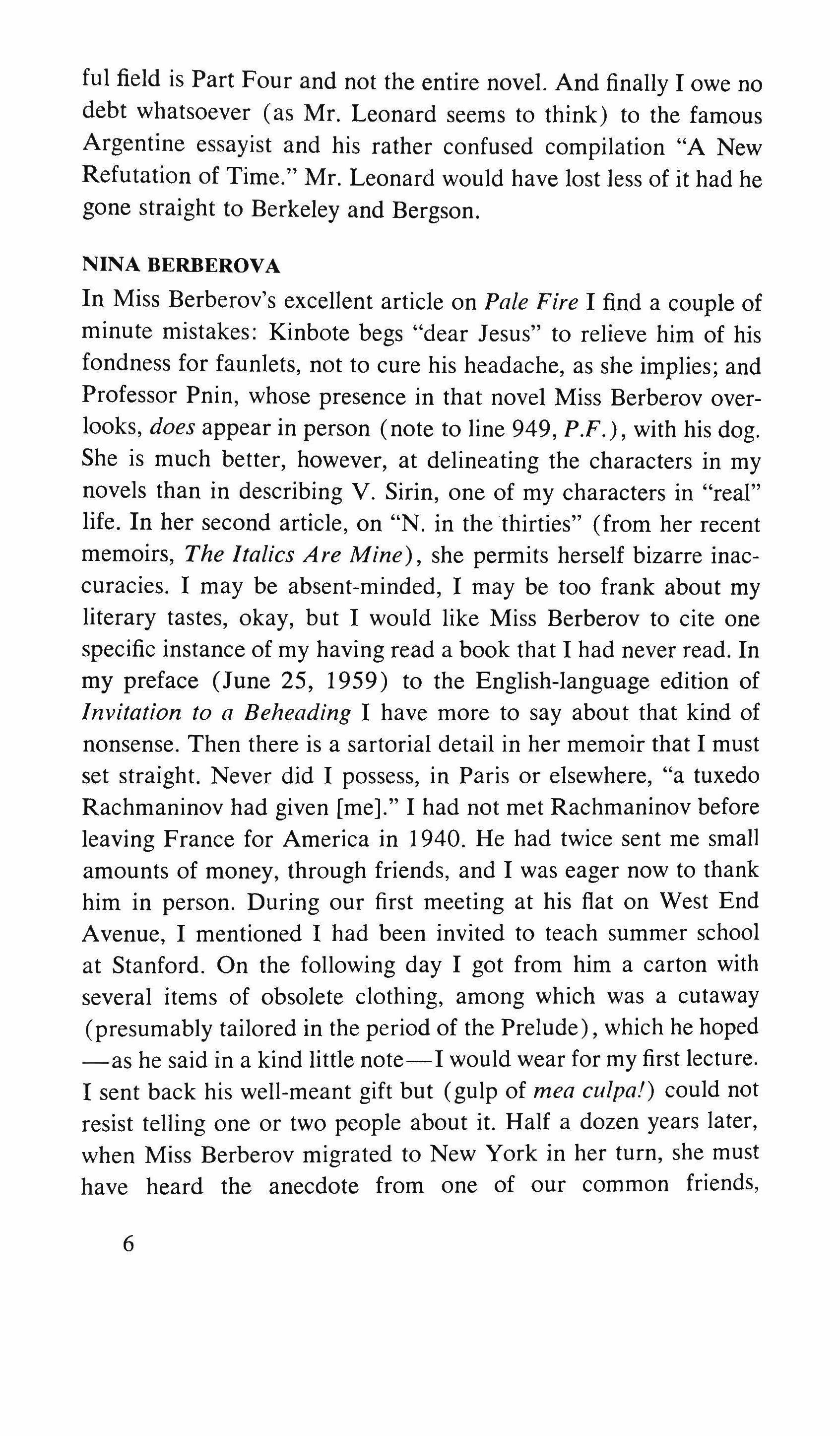
ful field is Part Four and not the entire novel. And finally lowe no debt whatsoever (as Mr. Leonard seems to think) to the famous Argentine essayist and his rather confused compilation "A New Refutation of Time." Mr. Leonard would have lost less of it had he gone straight to Berkeley and Bergson.
In Miss Berberov's excellent article on Pale Fire I find a couple of minute mistakes: Kinbote begs "dear Jesus" to relieve him of his fondness for faunlets, not to cure his headache, as she implies; and Professor Pnin, whose presence in that novel Miss Berberov overlooks, does appear in person (note to line 949, P.F.), with his dog. She is much better, however, at delineating the characters in my novels than in describing V. Sirin, one of my characters in "real" life. In her second article, on "N. in the thirties" (from her recent memoirs, The Italics Are Mine), she permits herself bizarre inaccuracies. I may be absent-minded, I may be too frank about my literary tastes, okay, but I would like Miss Berberov to cite one specific instance of my having read a book that I had never read. In my preface (June 25, 1959) to the English-language edition of Invitation to a Beheading I have more to say about that kind of nonsense. Then there is a sartorial detail in her memoir that I must set straight. Never did I possess, in Paris or elsewhere, "a tuxedo Rachmaninov had given [me]." I had not met Rachmaninov before leaving France for America in 1940. He had twice sent me small amounts of money, through friends, and I was eager now to thank him in person. During our first meeting at his flat on West End Avenue, I mentioned I had been invited to teach summer school at Stanford. On the following day I got from him a carton with several items of obsolete clothing, among which was a cutaway (presumably tailored in the period of the Prelude), which he hoped -as he said in a kind little note-I would wear for my first lecture. I sent back his well-meant gift but (gulp of mea culpa!) could not resist telling one or two people about it. Half a dozen years later, when Miss Berberov migrated to New York in her turn, she must have heard the anecdote from one of our common friends,
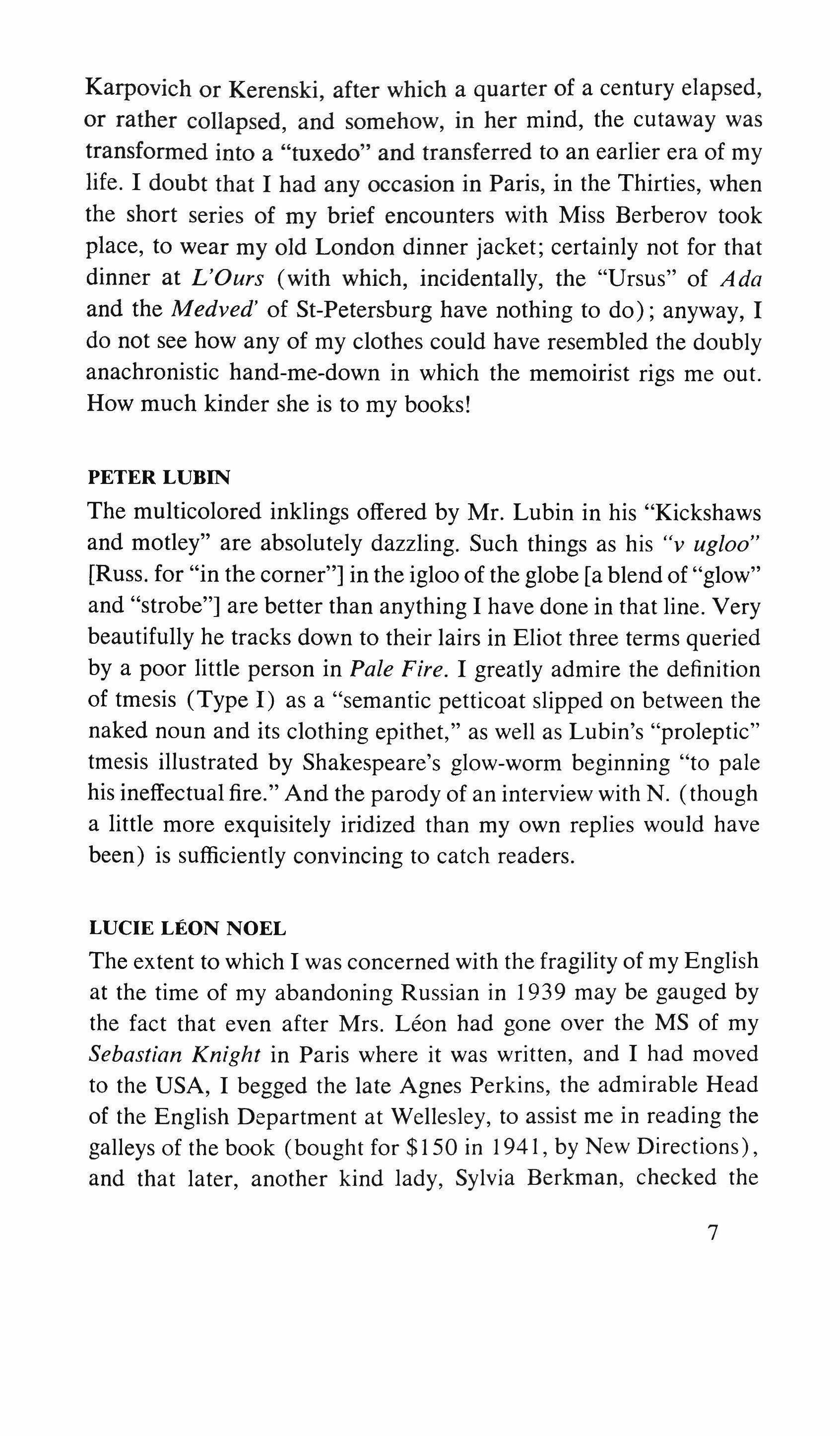
Karpovich or Kerenski, after which a quarter of a century elapsed, or rather collapsed, and somehow, in her mind, the cutaway was transformed into a "tuxedo" and transferred to an earlier era of my life. I doubt that I had any occasion in Paris, in the Thirties, when the short series of my brief encounters with Miss Berberov took place, to wear myoid London dinner jacket; certainly not for that dinner at L'Ours (with which, incidentally, the "Ursus" of Ada and the Medved' of St-Petersburg have nothing to do); anyway, I do not see how any of my clothes could have resembled the doubly anachronistic hand-me-down in which the memoirist rigs me out. How much kinder she is to my books!
The multicolored inklings offered by Mr. Lubin in his "Kickshaws and motley" are absolutely dazzling. Such things as his "v ugloo" [Russ. for "in the corner"] in the igloo of the globe [a blend of "glow" and "strobe"] are better than anything I have done in that line. Very beautifully he tracks down to their lairs in Eliot three terms queried by a poor little person in Pale Fire. I greatly admire the definition of tmesis (Type I) as a "semantic petticoat slipped on between the naked noun and its clothing epithet," as well as Lubin's "proleptic" tmesis illustrated by Shakespeare's glow-worm beginning "to pale his ineffectual fire." And the parody of an interview with N. (though a little more exquisitely iridized than my own replies would have been) is sufficiently convincing to catch readers.
The extent to which I was concerned with the fragility of my English at the time of my abandoning Russian in 1939 may be gauged by the fact that even after Mrs. Leon had gone over the MS of my Sebastian Knight in Paris where it was written, and I had moved to the USA, I begged the late Agnes Perkins, the admirable Head of the English Department at Wellesley, to assist me in reading the galleys of the book (bought for $150 in 1941, by New Directions), and that later, another kind lady, Sylvia Berkman, checked the 7
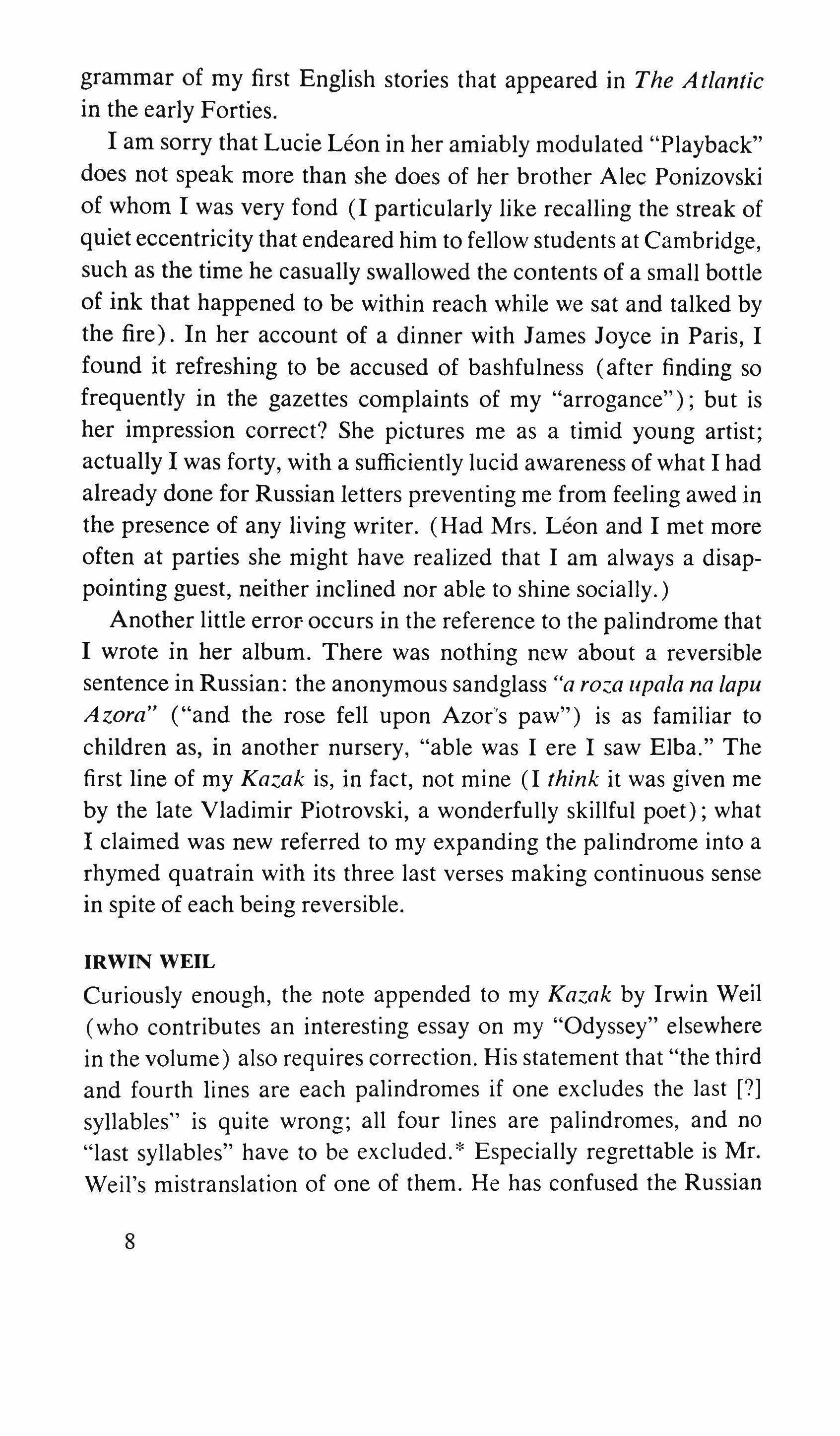
grammar of my first English stories that appeared in The Atlantic in the early Forties.
I am sorry that Lucie Leon in her amiably modulated "Playback" does not speak more than she does of her brother Alec Ponizovski of whom I was very fond (I particularly like recalling the streak of quieteccentricity that endeared him to fellow students at Cambridge, such as the time he casually swallowed the contents of a small bottle of ink that happened to be within reach while we sat and talked by the fire). In her account of a dinner with James Joyce in Paris, I found it refreshing to be accused of bashfulness (after finding so frequently in the gazettes complaints of my "arrogance"); but is her impression correct? She pictures me as a timid young artist; actually I was forty, with a sufficiently lucid awareness of what I had already done for Russian letters preventing me from feeling awed in the presence of any living writer. (Had Mrs. Leon and I met more often at parties she might have realized that I am always a disappointing guest, neither inclined nor able to shine socially.)
Another little error occurs in the reference to the palindrome that I wrote in her album. There was nothing new about a reversible sentence in Russian: the anonymous sandglass "a roza upala na lapu A zora" ("and the rose fell upon Azor's paw") is as familiar to children as, in another nursery, "able was I ere I saw Elba." The first line of my Kozak is, in fact, not mine (I think it was given me by the late Vladimir Piotrovski, a wonderfully skillful poet); what I claimed was new referred to my expanding the palindrome into a rhymed quatrain with its three last verses making continuous sense in spite of each being reversible.
IRWIN WElL
Curiously enough, the note appended to my Kozak by Irwin Weil (who contributes an interesting essay on my "Odyssey" elsewhere in the volume) also requires correction. His statement that "the third and fourth lines are each palindromes if one excludes the last [?] syllables" is quite wrong; all four lines are palindromes, and no "last syllables" have to be excluded. * Especially regrettable is Mr. Weil's mistranslation of one of them. He has confused the Russian 8

word for aloes (a genus of plant) with aloe, which means "red" or "rosy," and that, too, is mistranslated, becoming "purple"!
I must also question an incomprehensible statement in Mr. Weil's article "Odyssey of a translator." The Russian lawyer E. M. Kulisher may well have been "an old acquaintance" of my father's, but he was not "close to the Nabokov family" (I do not remember him as a person) and I have never said anywhere what Mr. Weil has me indicate in the opening paragraph of his article.
My old friend Morris Bishop (my only close friend on the campus)
"This error is due to a faulty transcription of the palindrome on p. 218 of TriQuarterly 17. The Russian word rvat', the first word of line four, has been placed at the end of line three. The errors in the transcription and note (p. 217) will be corrected in the paperback edition of the volume, to be published this fall by Simon and Schuster.-Eds.
has touched me very deeply by his recollections of my stay at Cornell. I am assigning an entire chapter to it in my Speak On, Mnemosyne, a memoir devoted to the twenty years I spent in my adopted country, after dwelling for twenty years in Russia and for as many more in Western Europe. My friend suggests that I was bothered by the students' incompetence in my Pushkin class. Not at all. What bothered and angered me was the ineptitude of the system of Scientific Linguistics at Cornell.
I remember most of the best students in my Cornell classes. Mr. Wetzsteon was one of them. My "Bleak House diagram," which he recalls so movingly, is preserved among my papers and will appear in the collection of lectures (BH, MP, Mme B., Mrs. B., etc.) that I mean to publish some day. It is strange to think that never again shall I feel between finger and thumb the cool smoothness of virgin chalk or make that joke about the "gray board" (improperly wiped), and be rewarded by two or three chuckles (RW? AA? NS?).
9
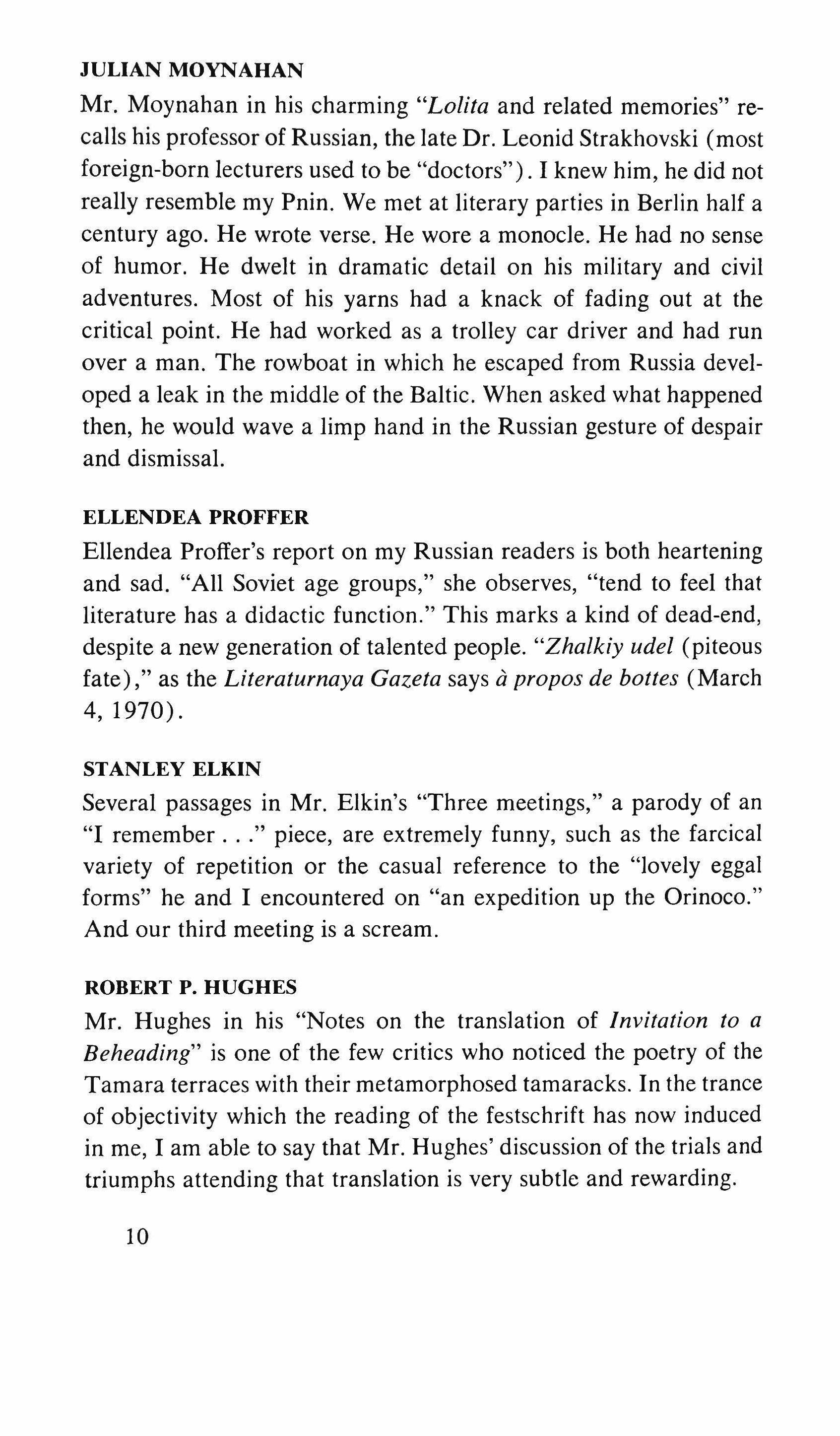
Mr. Moynahan in his charming "Lolita and related memories" recalls his professor of Russian, the late Dr. Leonid Strakhovski (most foreign-born lecturers used to be "doctors") I knew him, he did not really resemble my Pnin. We met at literary parties in Berlin half a century ago. He wrote verse. He wore a monocle. He had no sense of humor. He dwelt in dramatic detail on his military and civil adventures. Most of his yarns had a knack of fading out at the critical point. He had worked as a trolley car driver and had run over a man. The rowboat in which he escaped from Russia developed a leak in the middle of the Baltic. When asked what happened then, he would wave a limp hand in the Russian gesture of despair and dismissal.
Ellendea Proffer's report on my Russian readers is both heartening and sad. "All Soviet age groups," she observes, "tend to feel that literature has a didactic function." This marks a kind of dead-end, despite a new generation of talented people. "Zhalkiy udel (piteous fate) ," as the Literaturnaya Gazeta says it propos de bottes (March 4,1970).
Several passages in Mr. Elkin's "Three meetings," a parody of an "I remember piece, are extremely funny, such as the farcical variety of repetition or the casual reference to the "lovely eggaI forms" he and I encountered on "an expedition up the Orinoco." And our third meeting is a scream.
Mr. Hughes in his "Notes on the translation of Invitation to a Beheading" is one of the few critics who noticed the poetry of the Tamara terraces with their metamorphosed tamaracks. In the trance of objectivity which the reading of the festschrift has now induced in me, I am able to say that Mr. Hughes' discussion of the trials and triumphs attending that translation is very subtle and rewarding.
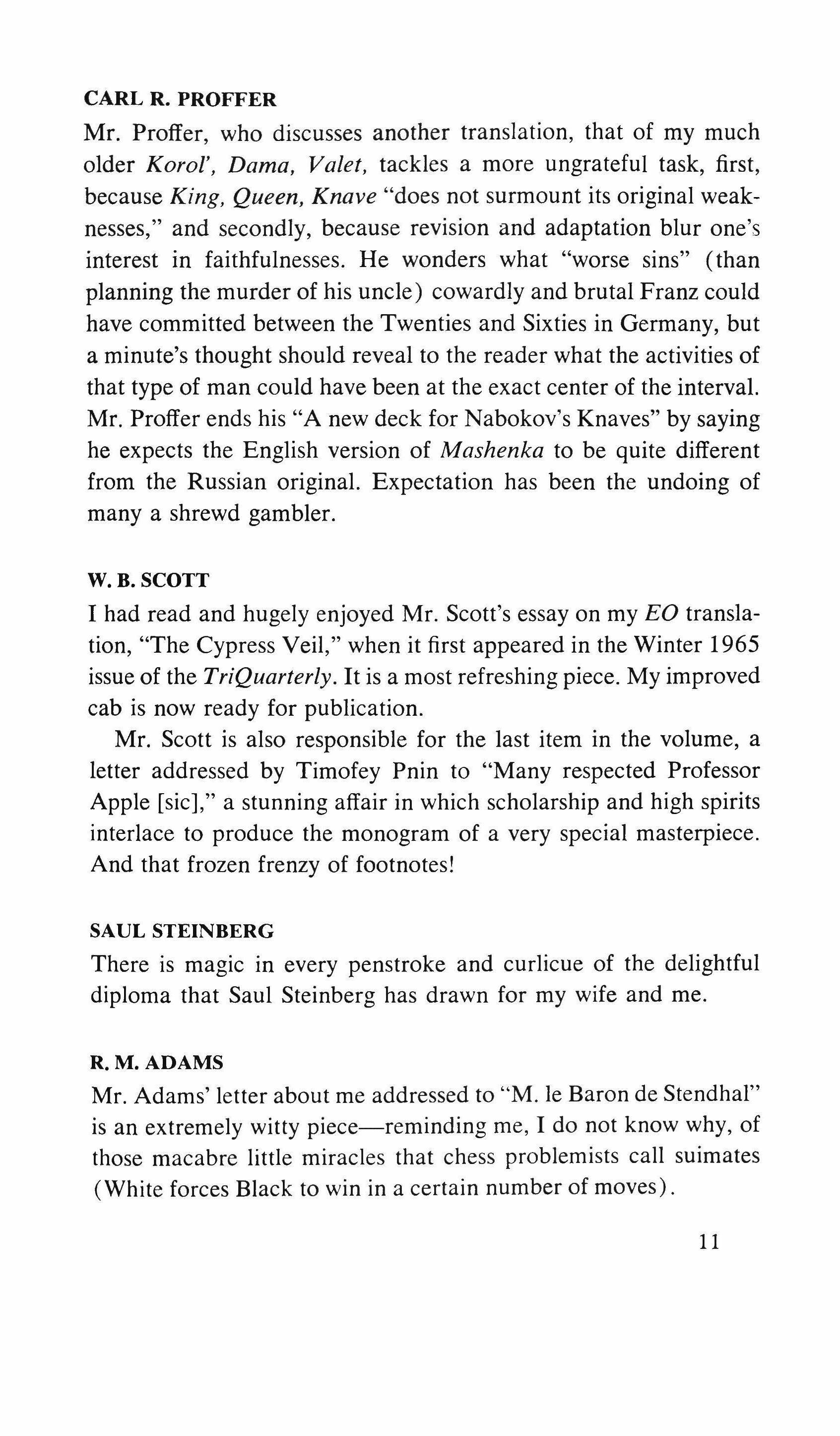
Mr. Proffer, who discusses another translation, that of my much older Korol', Dama, Valet, tackles a more ungrateful task, first, because King, Queen, Knave "does not surmount its original weaknesses," and secondly, because revision and adaptation blur one's interest in faithfulnesses. He wonders what "worse sins" (than planning the murder of his uncle) cowardly and brutal Franz could have committed between the Twenties and Sixties in Germany, but a minute's thought should reveal to the reader what the activities of that type of man could have been at the exact center of the interval.
Mr. Proffer ends his "A new deck for Nabokov's Knaves" by saying he expects the English version of Mashenka to be quite different from the Russian original. Expectation has been the undoing of many a shrewd gambler.
W.B.SCOTT
I had read and hugely enjoyed Mr. Scott's essay on my EO translation, "The Cypress Veil," when it first appeared in the Winter 1965 issue of the TriQuarterly. It is a most refreshing piece. My improved cab is now ready for publication.
Mr. Scott is also responsible for the last item in the volume, a letter addressed by Timofey Pnin to "Many respected Professor Apple [sic]," a stunning affair in which scholarship and high spirits interlace to produce the monogram of a very special masterpiece. And that frozen frenzy of footnotes!
SAUL STEINBERG
There is magic in every penstroke and curlicue of the delightful diploma that Saul Steinberg has drawn for my wife and me.
R.M.ADAMS
Mr. Adams' letter about me addressed to "M. le Baron de Stendhal" is an extremely witty piece-reminding me, I do not know why, of those macabre little miracles that chess problemists call suimates (White forces Black to win in a certain number of moves).
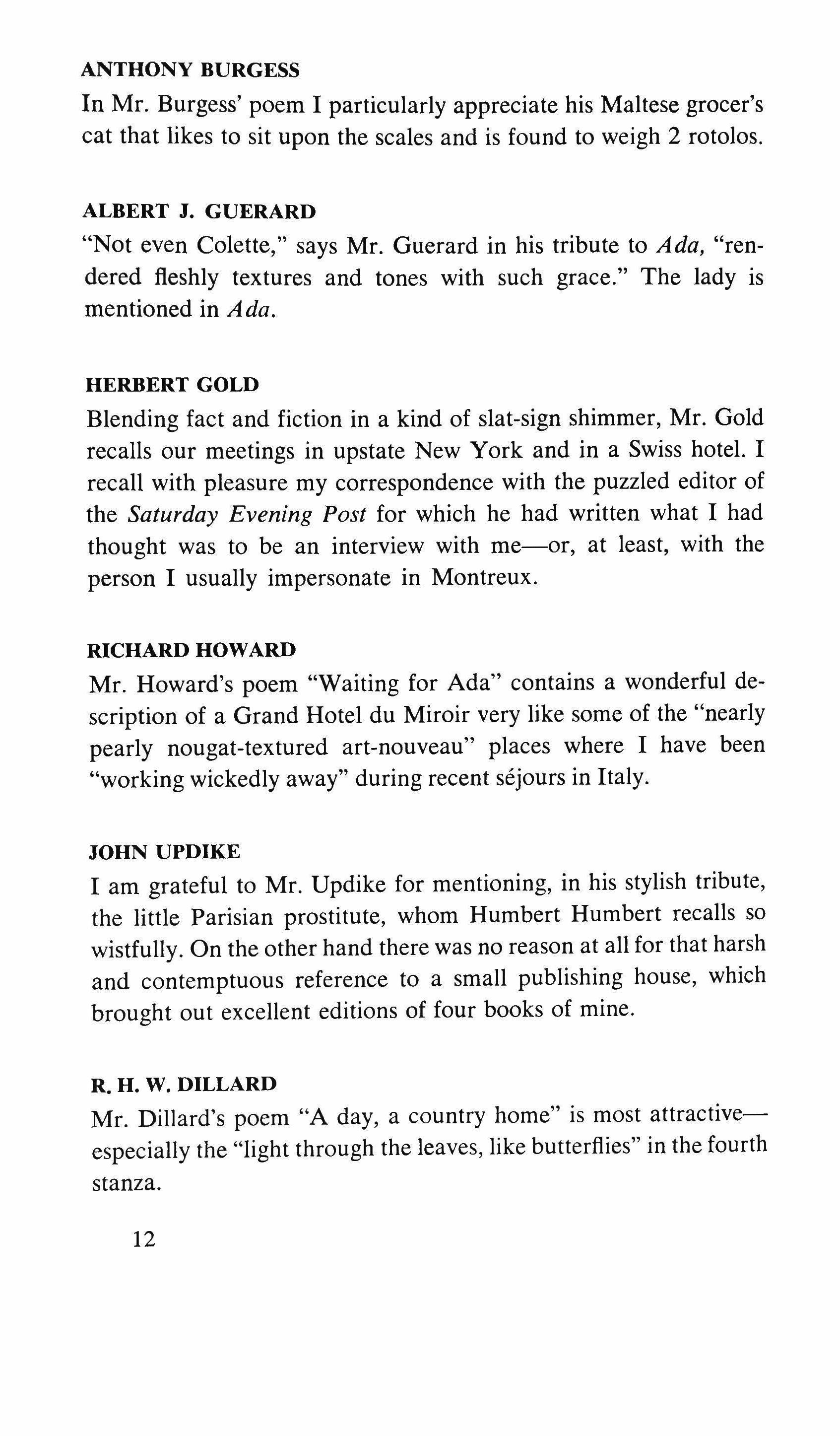
ANTHONY BURGESS
In Mr. Burgess' poem I particularly appreciate his Maltese grocer's cat that likes to sit upon the scales and is found to weigh 2 rotolos.
ALBERT J. GUERARD
"Not even Colette," says Mr. Guerard in his tribute to Ada, "rendered fleshly textures and tones with such grace." The lady is mentioned in Ada.
HERBERT GOLD
Blending fact and fiction in a kind of slat-sign shimmer, Mr. Gold recalls our meetings in upstate New York and in a Swiss hotel. I recall with pleasure my correspondence with the puzzled editor of the Saturday Evening Post for which he had written what I had thought was to be an interview with me-or, at least, with the person I usually impersonate in Montreux.
RICHARD HOWARD
Mr. Howard's poem "Waiting for Ada" contains a wonderful description of a Grand Hotel du Miroir very like some of the "nearly pearly nougat-textured art-nouveau" places where I have been "working wickedly away" during recent sejours in Italy.
JOHN UPDIKE
I am grateful to Mr. Updike for mentioning, in his stylish tribute, the little Parisian prostitute, whom Humbert Humbert recalls so wistfully. On the other hand there was no reason at all for that harsh and contemptuous reference to a small publishing house, which brought out excellent editions of four books of mine.
R. H. W. DILLARD
Mr. Dillard's poem "A day, a country home" is most attractiveespecially the "light through the leaves, like butterflies" in the fourth stanza. 12

Miss Calisher's contubernal contribution expresses in a sophisticated metaphor her readiness to share the paranoia of her fellow writers. Oddly enough, even the best tent is absolutely dependent on the kind of country amidst which it is pitched.
I remember not without satisfaction how fiercely and frequently, during my last year of high school in Russia (which was also the first year of the revolution), most of my teachers and some of my schoolmates accused me of being a "foreigner" because I refused to join in political declarations and demonstrations. Mr. Ludwig in his splendid little article indicates with great sympathy and acumen the possibility of similar accusations being made by my new fellowcitizens. They could not vie with Vladimir Vasilievich Gippius, my fiery, red-haired teacher of Russian literature.
J. BARTH
Dear Mr. B.:
Thanks for your birthday greetings. Let me wish you many returns of the same day. How many nice people crowd around my cradle! It is pleasant to know you like Max Planck. I rather like him, too. But not Cervantes!
Yours cordially, V.N.
Lines 31-32 of Mr. Brown's fascinating poem in Russian display a looping-the-loop inversion of which old Lomonosov might have been proud: "Why, better of Dante's Hell for him to burn in the seventh circle" if translated lexically.
The Editor of the TriQuarterl.Y in "Americanization of V. N." (an exhilarating physical process in the present easel) recalls taking Pale Fire "to Basic Training in hot Texas," tearing it from its bind13
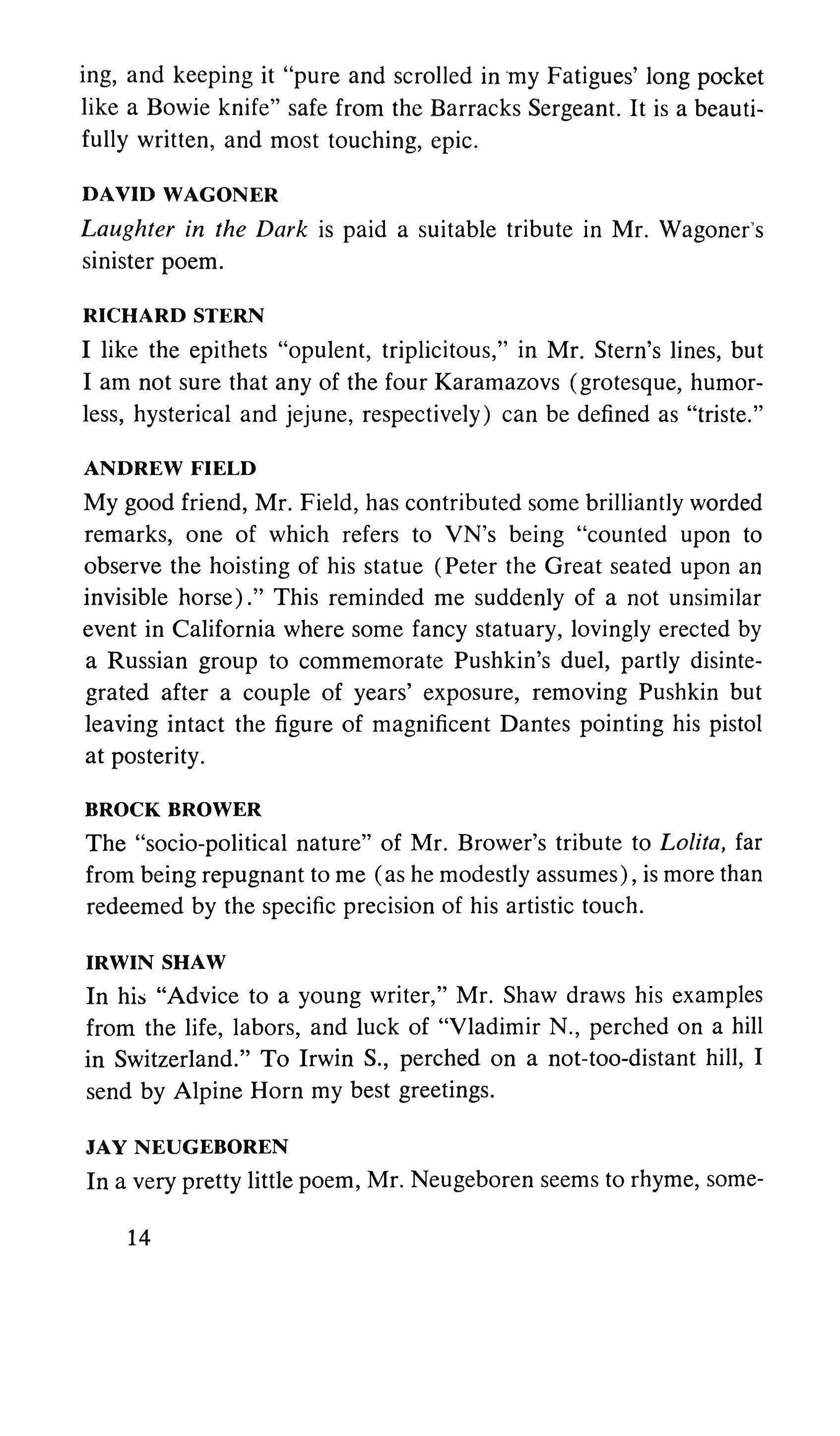
ing, and keeping it "pure and scrolled in rny Fatigues' long pocket like a Bowie knife" safe from the Barracks Sergeant. It is a beautifully written, and most touching, epic.
DAVID WAGONER
Laughter in the Dark is paid a suitable tribute in Mr. Wagoner's sinister poem.
RICHARD STERN
I like the epithets "opulent, triplicitous," in Mr. Stern's lines, but I am not sure that any of the four Karamazovs (grotesque, humorless, hysterical and jejune, respectively) can be defined as "triste."
ANDREW FIELD
My good friend, Mr. Field, has contributed some brilliantly worded remarks, one of which refers to VN's being "counted upon to observe the hoisting of his statue (Peter the Great seated upon an invisible horse)." This reminded me suddenly of a not unsimilar event in California where some fancy statuary, lovingly erected by a Russian group to commemorate Pushkin's duel, partly disintegrated after a couple of years' exposure, removing Pushkin but leaving intact the figure of magnificent Dantes pointing his pistol at posterity.
BROCK BROWER
The "socio-political nature" of Mr. Brower's tribute to Lolita, far from being repugnant to me (as he modestly assumes), is more than redeemed by the specific precision of his artistic touch.
IRWIN SHAW
In his "Advice to a young writer," Mr. Shaw draws his examples from the life, labors, and luck of "Vladimir N., perched on a hill in Switzerland." To Irwin S., perched on a not-too-distant hill, I send by Alpine Horn my best greetings.
JAY NEUGEBOREN
In a very pretty little poem, Mr. Neugeboren seems to rhyme, some14
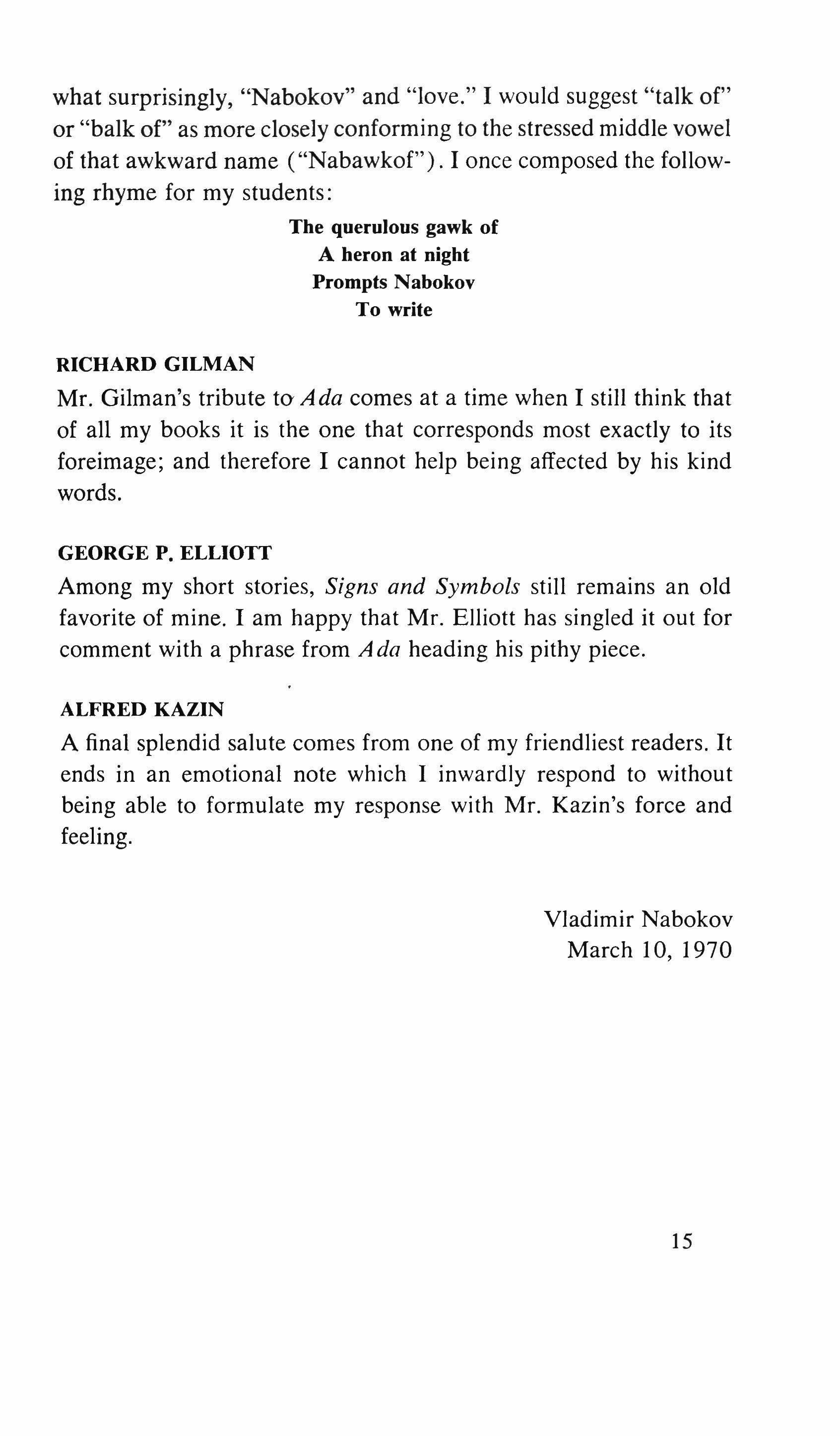
what surprisingly, "Nabokov" and "love." I would suggest "talk of" or "balk of" as more closely conforming to the stressed middle vowel of that awkward name ("Nabawkof"). I once composed the following rhyme for my students:
The querulous gawk of A heron at night
Prompts Nabokov To write
Mr. Gilman's tribute to Ada comes at a time when I still think that of all my books it is the one that corresponds most exactly to its foreimage; and therefore I cannot help being affected by his kind words.
Among my short stories, Signs and Symbols still remains an old favorite of mine. I am happy that Mr. Elliott has singled it out for comment with a phrase from A da heading his pithy piece.
A final splendid salute comes from one of my friendliest readers. It ends in an emotional note which I inwardly respond to without being able to formulate my response with Mr. Kazin's force and feeling.
Vladimir Nabokov March 10, 1970
